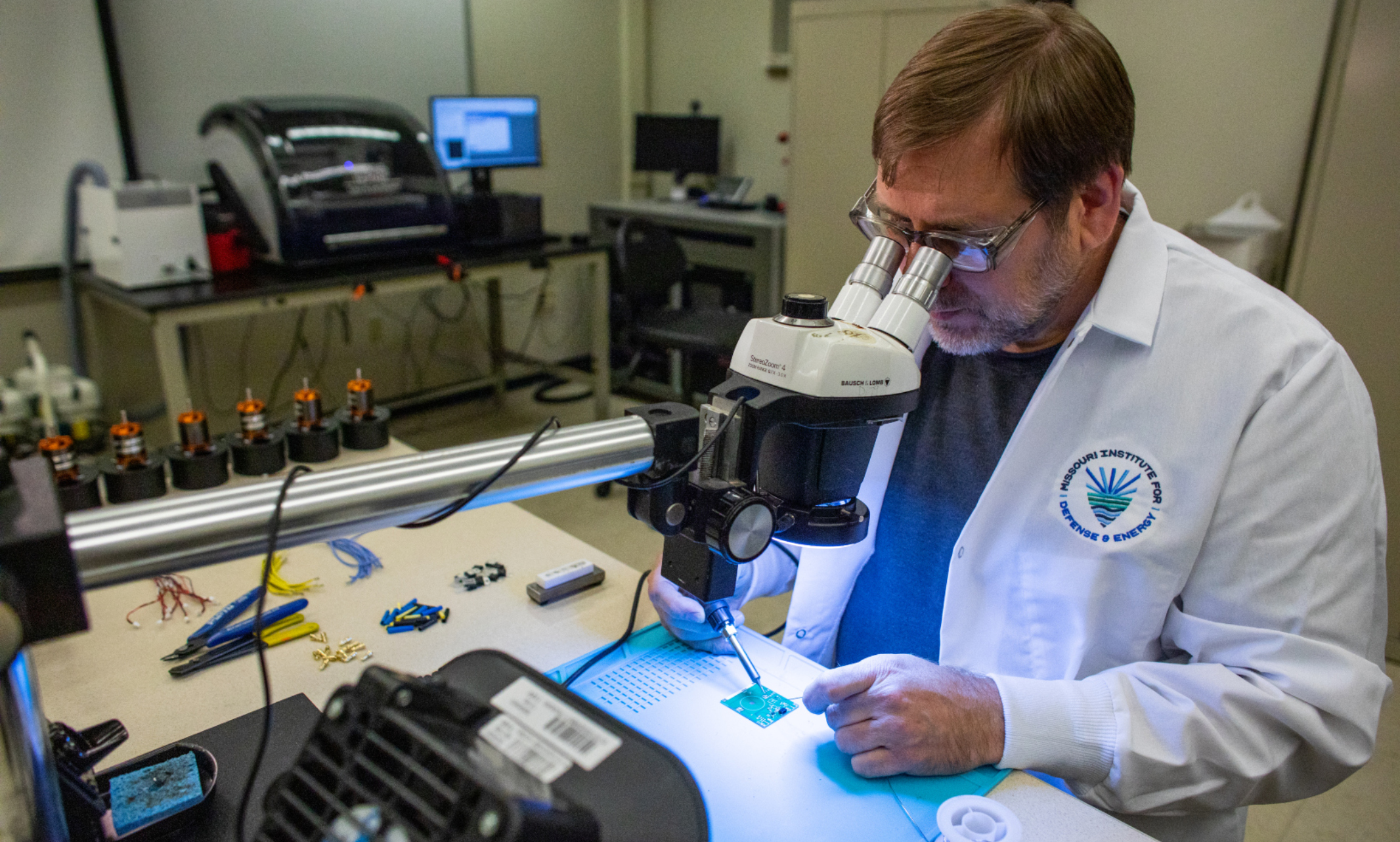
Critical Materials Crossroads, on behalf of UMKC, advances as finalist for National Science Foundation award of up to $160 million over decade
In May 2023, the University of Missouri-Kansas City, on behalf of the University of Missouri System, received a $1 million 24-month federal cooperative agreement to lead the development of an energy materials ecosystem in Kansas City.
The $999,480 award from the National Science Foundation Regional Innovation Engines Program is funded through the CHIPS and Science Act, signed into law in 2022, to significantly boost U.S. production of microchips and tackle supply chain vulnerabilities to revitalize Americas scientific research and technological leadership.
Since that award, the UMKC Critical Materials Crossroads has been building momentum on the development of an energy materials campus that would produce midstream materials for energy generation, storage and distribution in the Kansas City area to promote technical and economic development and prosperity in the Kansas City region. As part of this project, the Critical Materials Crossroads will create a highly trained workforce skilled in advanced manufacturing and automation.
In October 2024, the Critical Materials Crossroads team officially advanced as a finalist for the National Science Foundation Regional Innovation Engines Type 2 award. The full proposal is due in February 2025 and could lead to $160 million in additional funding over the next 10 years to help launch new businesses and educate the future critical-materials workforce.
Economic Impact Analysis for Critical Materials Crossroads Energy Materials Ecosystem (PDF)
Governor Mike Parson congratulated the four Missouri higher education institutions, including UMKC, for advancing to the next stage. The other three advancing institutions include the Missouri University of Science and Technology, University of Missouri–St. Louis and Washington University in St. Louis.
"We are excited that out of 71 teams advancing in this national competition, Missouri is home to four of them," Parson said. "Missouri's technology sector is budding and growing, and these teams will help us continue the exceptional work we have done to develop our workforce, strengthen our infrastructure and emerge as a technological leader. We congratulate our higher education institutions, as well as their application partners, on the incredible work that has gotten them to this point, and we trust that Missouri innovation will win the day, potentially securing these National Science Foundation Engine designations for our state."
This collective will leverage partnerships with universities, businesses, industry, nonprofits and state, local and federal government institutions in Kansas and Missouri to drive the growth needed for this new hub. To do this, manufacturers will be equipped with the necessary workforce, materials and innovation to develop domestically sustainable and profitable critical goods.
Goals for the collective include:
Coordinate, facilitate and mentor the creation of 70 small businesses in Missouri and Kansas
Increase Gross Domestic Product to the Kansas City Metropolitan Statistical Area by more than 5.5% ($17 Billion) by 2035, creating an average of 1,000 new jobs per year from 2026-2035 (10,000 jobs total).
Become a national thought leader in the Kansas City region on energy materials
Secure a sustainable, competitive and complete U.S.-based supply chain for energy materials processing and manufacturing
Create and maintain a pipeline of targeted degree/certificate holders to meet workforce needs
Be the catalyst and trusted partner for U.S. energy material processing and manufacturing that drives innovation
Develop a technology maturation network that rapidly scales new technologies from lab-scale to full-scale by providing centralized business support services and funding for startups and new innovations
“UMKC is proud to take the lead on behalf of the University of Missouri System and its four universities on this exciting effort to create a new industrial base in our region focused on computer chips and other microelectronics,” said UMKC Chancellor Mauli Agrawal. “The potential for business formation and job creation is extraordinary, and we’ll be working with partners throughout Missouri and Kansas to make it happen.”
Anthony Caruso, Vice Chancellor for Strategic Initiatives and Curators' Distinguished Professor of Physics and Electrical Engineering, is the principal investigator for the grant.
“Our goal is to realize a self-sustaining Kansas-Missouri microelectronics industrial base that will become profitable without the need for government subsidy,” Caruso said. “That requires reinventing manufacturing practices. To meet this grand challenge, the team will focus on synergistic and symbiotic partnerships that leverage the unique natural resources, manufacturing and transportation capacity of Missouri and Kansas. The ultimate goal is to develop marked improvements in regional educational attainment and economic growth.”
Energy materials underpin many aspects of day-to-day life, including medical equipment, cars, industrial machinery and consumer electronics. U.S. manufacturing has declined significantly since the early 1990s, leaving the country reliant on imported critical materials which many see as a threat to both economic growth and national security. The Critical Materials Crossroads aims to reshore these manufacturing jobs and provide a sustainable pathway to develop these critical goods and materials domestically, lowering our reliance on foreign entities of concern and increasing national and economic security.
The team includes institutions of higher education, representation from local and state governments, industry and business partners, national labs, nonprofits and civic organizations across the Kansas City area and Missouri and Kansas.
Jan 17, 2025

The Kansas City native was also a recent UMKC Commencement speaker
Each year, the UMKC Alumni Association recognizes the achievements of outstanding alumni with an awards celebration. The university and the association are honoring Rhiannon Ally (B.A. ’05) with the Class of 2024 Alumna of the Year Award.
As the co-anchor of the national ABC News program, “World News Now” and “America This Morning” and a frequent correspondent on "Good Morning America" and “Nightline”, Ally’s questions have taken her far, but her path had not been clear until she came to UMKC. Ally took a journalism class taught by Pulitzer-Prize-winning journalist Bob Unger as an elective, which changed the course of her life. “I remember him telling us that journalists question everything around them. Even if your own mother tells you something, do some digging and get another source,” said Ally. “That class got me thinking maybe I should be a journalist.” That’s exactly what she did. Ally’s nearly 20-year career has taken her to Miami, New Orleans, Las Angeles, London and Las Vegas. She has interviewed renowned celebrities including Madonna, Denzel Washington, Caroline Kennedy and Gloria Steinem. Ally has had a front row seat to history, documenting events including the Boston Marathon bombing, the war in Ukraine, Hurricane Katrina and the Ghislaine Maxwell trial. But the local stories have had the greatest impact on Ally. She recalled a time she interviewed a couple celebrating their 50th wedding anniversary. Both were Holocaust survivors and Ally still keeps in touch with their adult children. “When people tell you their story, it becomes a part of you. And the community does as well. I have been fortunate to be part of some incredible communities in my career. None as special as telling stories in my hometown of Kansas City,” said Ally. The Raytown native co-anchored the 5 p.m. and Emmy-Award-winning 10 p.m. news for Kansas City’s NBC affiliate KSHB-TV alongside her husband, Mike Marza (B.A. ‘04), whom she met at UMKC. In Kansas City, Ally anchored breaking news coverage of a massive fire that destroyed several city blocks, severe weather outbreaks and the Royals World Series Championship parade and rally. “Most of my family and many of my close friends are still in Kansas City,” said Ally. “People don’t realize how much KC has to offer, but the thing that stands out the most is always the people. The people here are always so supportive and friendly and really have followed me through my entire career.” While her career as a journalist is impressive, Ally said her proudest professional accomplishment has been publishing her children’s book, “Mommy, Please Don’t Go to Work!”, which was inspired by her experience as a mom, often hearing her three kids utter the phrase. “Writing a book was a lifelong dream. The day I saw my book published was one of the best days of my career,” said Ally.
Mar 15, 2024
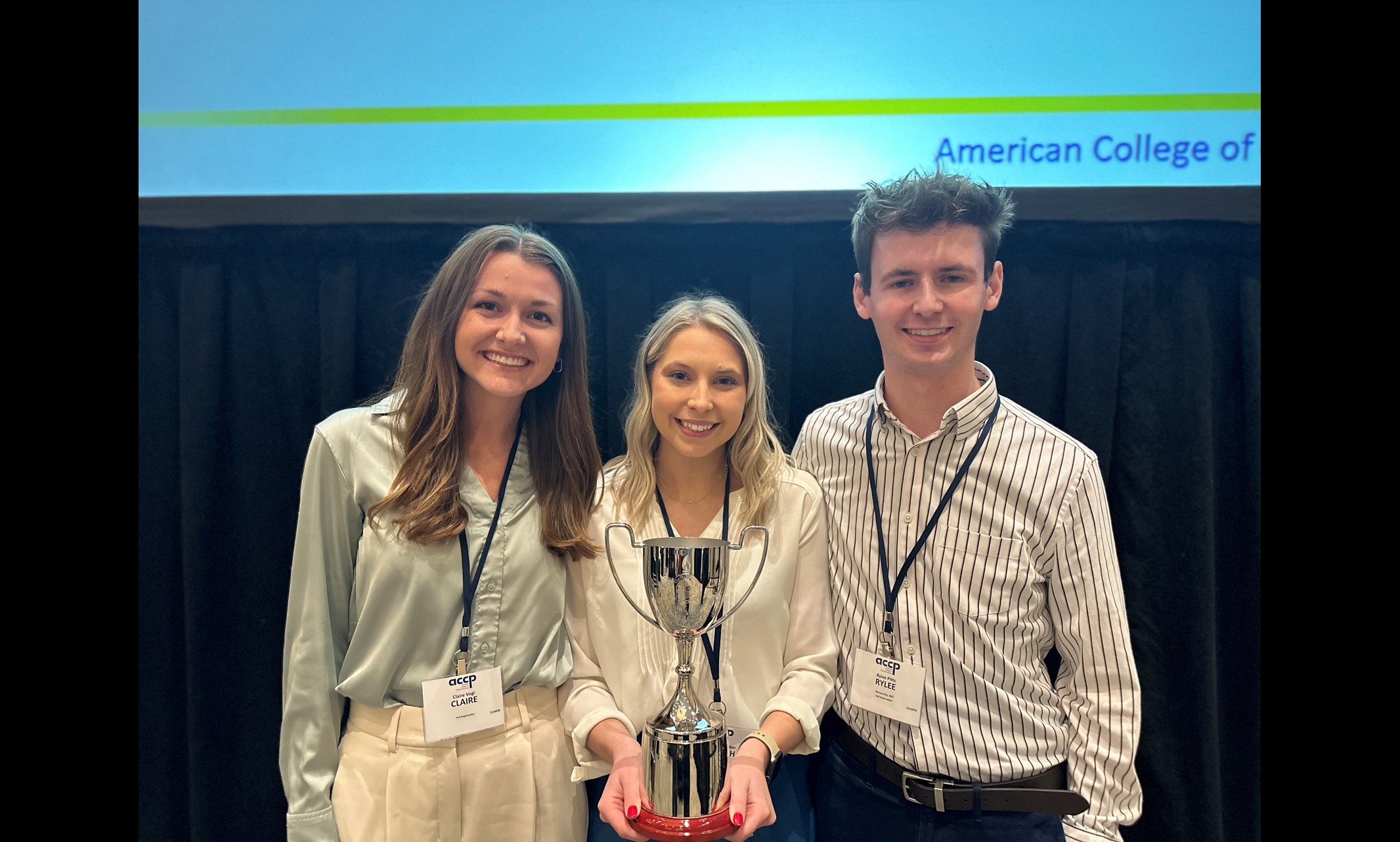
Three UMKC Pharmacy students beat out more than 100 teams to win top title.
Fourth-year School of Pharmacy students Hannah Kempker, Claire Vogl and Rylee Pitts have been hard at work since September preparing and competing in the American College of Clinical Pharmacy’s 2023 ACCP Clinical Pharmacy Challenge.
The competition spanned several months with multiple rounds and culminated in UMKC going head-to-head with the University of Arkansas in the championship round in Dallas, Texas. After a tight race, UMKC won on the final question and took home $1,500 in prize money and a commemorative trophy.
Known for its “quiz-bowl” style, the challenge included rounds featuring general pharmacy trivia, a clinical case study and final jeopardy. Teams began their journey with virtual rounds, and only the top eight travelled to Dallas to compete during the annual ACCP Conference in November.
Once there, the competition heated up. Teams were expected to answer questions quickly, using a buzzer and going head to head.
“Online versus in-person rounds are a different game,” Kempker said. “Online rounds you have more time to think critically and reason through a question. In person, you have to rely on all knowledge from didactic coursework and rotations to quickly come up with an answer and stick with it.”
No stone was left unturned by the team during preparation for the competition, and it was an all-hands-on-deck effort.
“Generally, we looked through the ACCP pocket guide, the APhA review book and our old pharmacotherapy notes,” Vogl said. “We also tried to look at specific jeopardy categories as the rounds progressed, focusing on categories we hadn’t seen yet to prepare for the next round.”
Kempker added, “I think the biggest thing we did to prepare was to talk aloud our strategy.”
The three students keyed in on their blind spots and worked to fill in any gaps in expertise to be as prepared as possible.
“Because we are all close, we also know each other’s tendencies and hesitations, so that helped when we moved into the live buzzer rounds,” Vogl said. “One person might buzz for the other because we knew they might be more hesitant.”
Elizabeth Englin Pharm.D., served as the faculty mentor and traveled with the team to the Dallas competition rounds.
“It was so fun to watch them, and they were so strategic in their play,” Englin said. “You could tell that they were friends, and they work so well as a team…They’re just wonderful students all around.”
After the competition, Englin reflected on the high level of sportsmanship the team possessed.
“They did really well with the other teams,” she said. “They were congratulating, wishing luck and really got to connect with the other schools.”
The competition is just a feather in the cap of the students, who in their final year of pharmacy school are preparing for what’s next.
“I felt pharmacy gave me the best opportunity to combine my desire to impact others with a career that aligned with my personal interests and curiosity,” Pitts said.
Dec 20, 2023
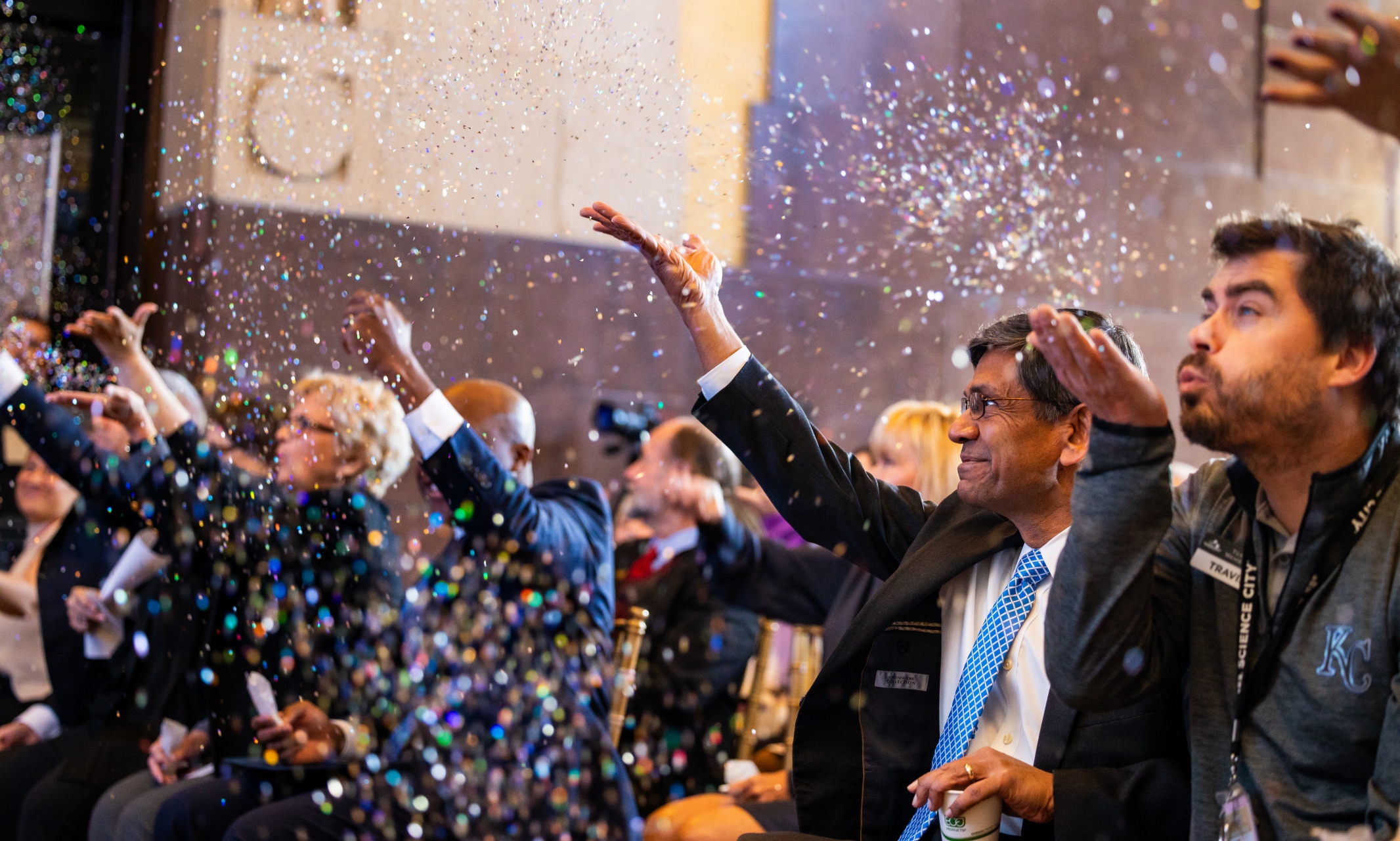
Visuals that capture the year
UMKC photographers Brandon Parigo and Patrick Oliverio captured many moments on and off campus this year. They selected a few of their favorite images that show what it looks like to be part of Kansas City's university.
Union Station was illuminated Roo blue and gold for UMKC Engagement Month in October. | Photo by Brandon Parigo, UMKC
Conservatory Professor JoDee Davis stands in the middle of her students at the UMKC Trombone Studio. | Photo by Patrick Oliverio, UMKC
Dancers perform at Crescendo, the UMKC Conservatory signature event held annually at the Kauffman Center for the Performing Arts. It raises funds for student scholarships. | Photo by Brandon Parigo, UMKC
The Roo statue in silhouette on the UMKC Volker Campus. | Photo by Brandon Parigo, UMKC
UMKC cheering at a soccer game. Roo up! | Photo by Patrick Oliverio, UMKC
Making a splash at the Swinney Center pool. | Photo by Brandon Parigo, UMKC
Durwood Stadium at dusk during a soccer game at Welcome Week. | Photo by Brandon Parigo, UMKC
I (heart) UMKC always. | Photo by Brandon Parigo, UMKC
Streamers and confetti help celebrate graduates at Spring Commencement at the T-Mobile Center. | Photo by Brandon Parigo, UMKC
Dec 19, 2023
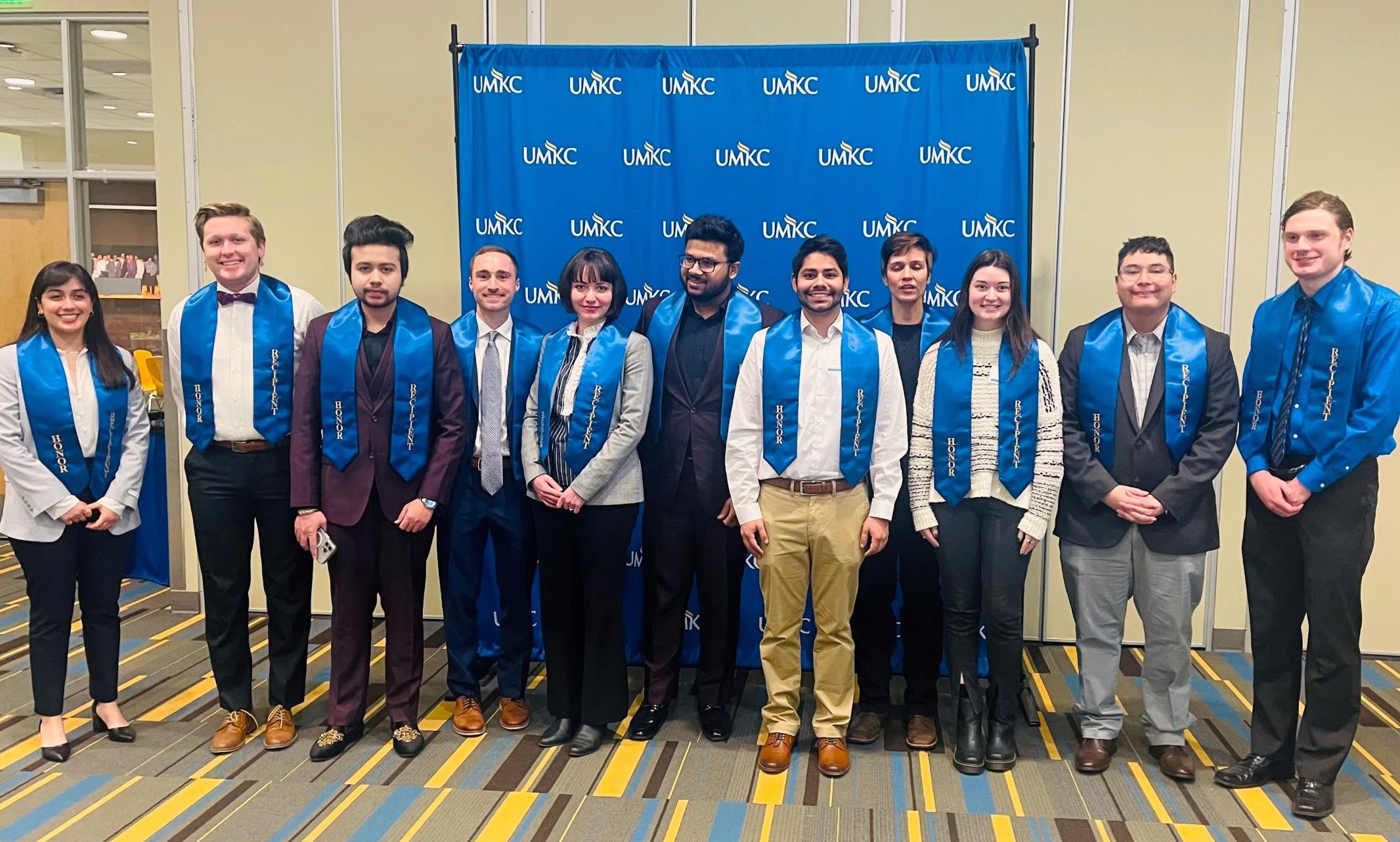
Graduating students are recognized for their outstanding academics, leadership and service
Fifteen UMKC students have been named Dean of Students Honor Recipients in recognition of their accomplishments on campus and in the community.
Every semester, exceptional graduating students are honored with this designation. These students maintain excellent academic standards while actively participating in university activities and community service outside of the classroom.
The Fall 2023 honorees’ accomplishments include helping international students settle into the university life, volunteering with the families of homicide victims, organizing a conference celebrating the LGBTQIA+ community, working on the Lucerna research journal, volunteering with Operation Breakthrough and more.
“These students embody what it means to be a Roo with their dedication to academics, service and community," said Michele D. Smith, Ph.D., vice provost for student affairs and dean of students. “I am thrilled to recognize them for their many accomplishments and look forward to the bright futures ahead of them.”
Students shared reflections on their time at UMKC at a special breakfast celebration in their honor. Some excerpts:
Emma Sauer: “As a transfer student, I’ve only spent two years at UMKC, but my experience has shaped who I am. My time here has exposed me to all kinds of people, ideas and perspectives I would never have found anywhere else and really inspired me to take a more active role in my local community.”
Matthew Grimaldi: “My time at UMKC has been truly memorable, and as a Kansas City native, the best part has been experiencing the school’s connection with the surrounding community. During my time here, I’ve been able to intern with a federal judge, work with underserved clients and meet with prospective students. UMKC is more than just a place of higher education, it is a community institution.”
Paige Lyell: “UMKC has given me the gift of a lifetime – not only has the university provided me with an amazing education, but it also gave me some of the best years of my life. I feel honored to forever be a part of such an inclusive and compassionate group of people. I leave here with a stronger sense of community, respect and integrity.”
Congratulations to the Fall 2023 Dean of Students Honor Recipients!
Scott Cameron, School of Humanities and Social Sciences
Paige Eickhoff, School of Medicine
Alejandra Frias-Fraire, School of Science and Engineering
Matthew Grimaldi, School of Law
Natasha Hillard, School of Nursing and Health Studies
Mufrad Islam, School of Science and Engineering
Mustavi Islam, School of Science and Engineering
Marco Loaiza, School of Humanities and Social Sciences
Paige Lyell, School of Medicine
Marisa McKay, School of Humanities and Social Sciences
Elliot Mejia, Bloch School of Management
Jonah Petitjean, School of Humanities and Social Sciences
Emma Sauer, School of Humanities and Social Sciences
Olga Shupyatskaya , School of Law
Ben Wilson, Bloch School of Management
Dec 19, 2023
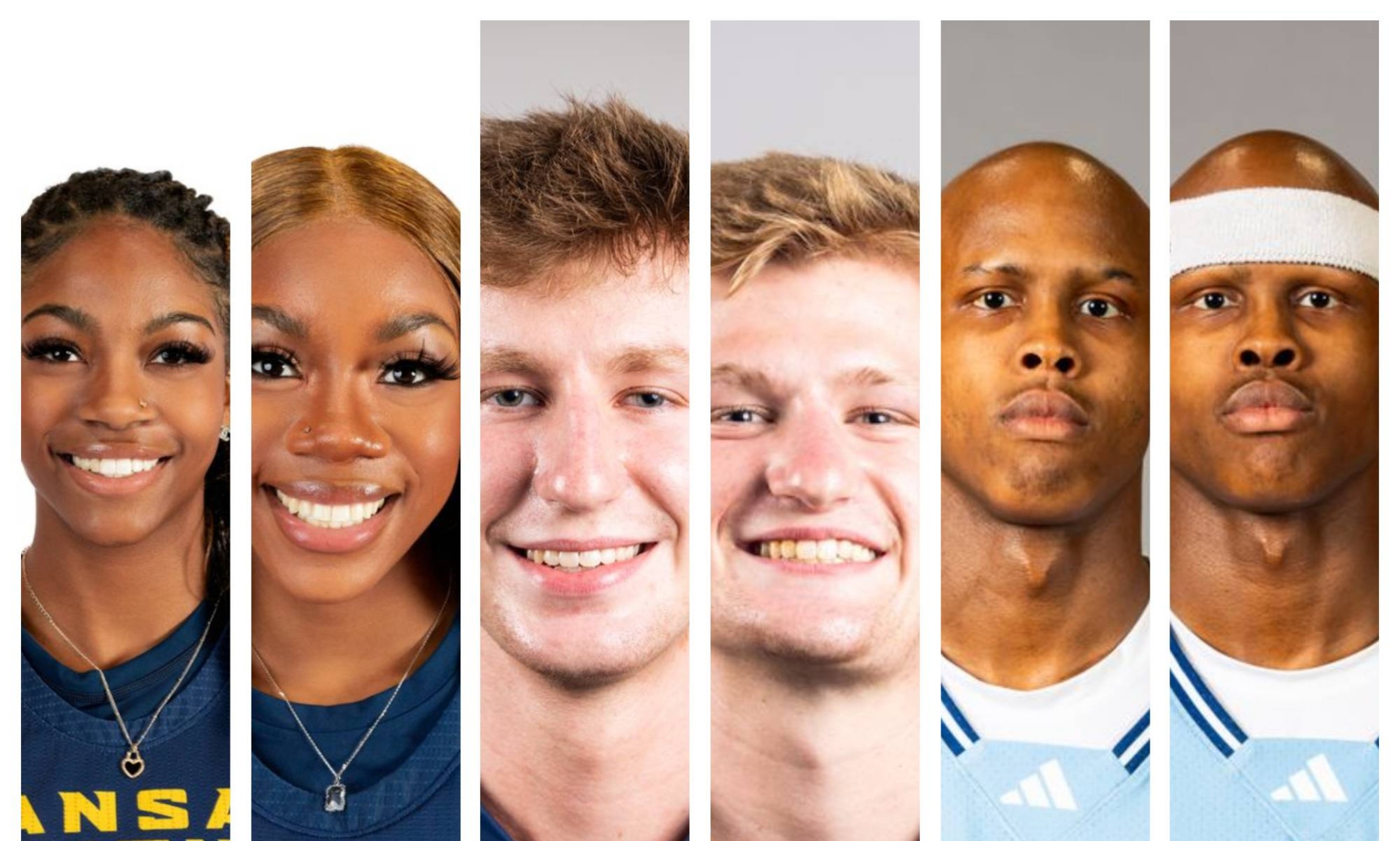
Seeing double on the court and track
Last year, 3,664,292 people were born. It’s estimated just 3 percent of those born were twins. So it’s safe to say giving birth to twins is rare.
What’s even more rare is three sets of twins ending up on the same college campus as student-athletes. Right now at UMKC, there are roughly 220 student-athletes competing on various teams. Among them are six twins who make up just 2 percent of that total.
For Precious and Promise Idiaru, Elauni and Emani Bennett, and Jack and Bret Beard, UMKC always felt like the right place to be.
“Being so close to home is one of the main reasons we chose UMKC,” said freshman Emani Bennett. “Our high school teammates, high school coaches and AAU coaches still get to come and see us play.”
Elauni and Emani BennettFreshmen | UMKC Women’s Basketball
If you’re in need of a quick way to tell these two apart, just look at their jump shot.
“I’m a lefty and Emani’s a righty,” said Elauni Bennett.
The two freshmen guards didn’t have to travel far to join the UMKC women’s basketball team. Just seven months removed from their high school graduation at Lee’s Summit North, these young student-athletes are already adjusted to college life. It’s something they attribute to having each other.
“Coming into college is an adjustment for all freshmen, but we have each other so it makes it a lot easier,” Elauni said
Off the court, the Bennetts bring impressive high school resumes with them to UMKC and despite being identical twins, the two sisters have different interests when it comes to their education.
“We’re different in a lot of ways, and that’s something our coach was big on is celebrating our individuality,” said Emani.
Emani is majoring in psychology, while Elauni plans to pursue a future in health sciences.
Precious and Promise IdiaruSophomores | UMKC Men’s Basketball
Unlike the Bennett twins, Precious and Promise traveled a long way to land on the UMKC men’s basketball team: 4,743 miles, to be exact. The brothers call Speyer, Germany, home just an hour south of Frankfurt, but being in the U.S. is nothing new to them. The Idiaru brothers came to the U.S. as high schoolers, competing in Los Angeles,.
"Precious and Promise were available late in the recruiting process, which ended up being a huge plus for Kansas City Basketball,” said head coach Marvin Menzies. “The twins are very high in character and in talent.”
Now in their second season with the Roos, both Precious and Promise say there have been challenges being twins on a new team.
“The coaches had trouble telling us apart,” said Promise. “To make it easier on them we decided that Precious would start wearing a headband.”
Even with their headband idea, it wasn’t an instant fix.
“There was an incident last year at LSU where the coaches had difficulties telling us apart even with the headband and accidentally kept yelling out the wrong names to each twin.”
While telling them apart on the court may be difficult for new eyes, things might be easier for their UMKC professors. Like the Bennett sisters, Precious and Promise have chosen different paths for their education. Precious intends to study nutrition, while Promise has his sights set on a career in business and marketing.
Jack and Bret BeardSophomores | UMKC Track and Field
Blink and you might miss this set of twins. Jack and Bret Beard are coming off a successful freshmen season at UMKC, one in which they both made strong showings at the Summit League Championships.
Being a college athlete also runs in the family. Their father was an All-American kicker at Friends University. Their older brother Braedan played Division I soccer at both Creighton and Drake Universities.
Like the Bennett sisters, Jack and Bret are competing for UMKC with a hometown crowd nearby. The Olathe Northwest graduates say their decision to come to UMKC can be attributed to the coaching staff, led by head coach Benaud Shirley, and being close to family.
"I love that my parents are able to come and support us and watch us compete," said Jack. "It gives us added motivation when they are at our meets."
When it comes to identifying them on the track, Bret says there is still the occasional confusion among their coaches. Whether they get mixed up or not, Bret admits it's special being able to compete alongside his brother.
"We don’t always compete in the same event but when we do I love being able to compete alongside my brother because we are creating life long memories together."
Both Beards are studying business administration at the Henry W. Bloch School of Management.
Dec 18, 2023
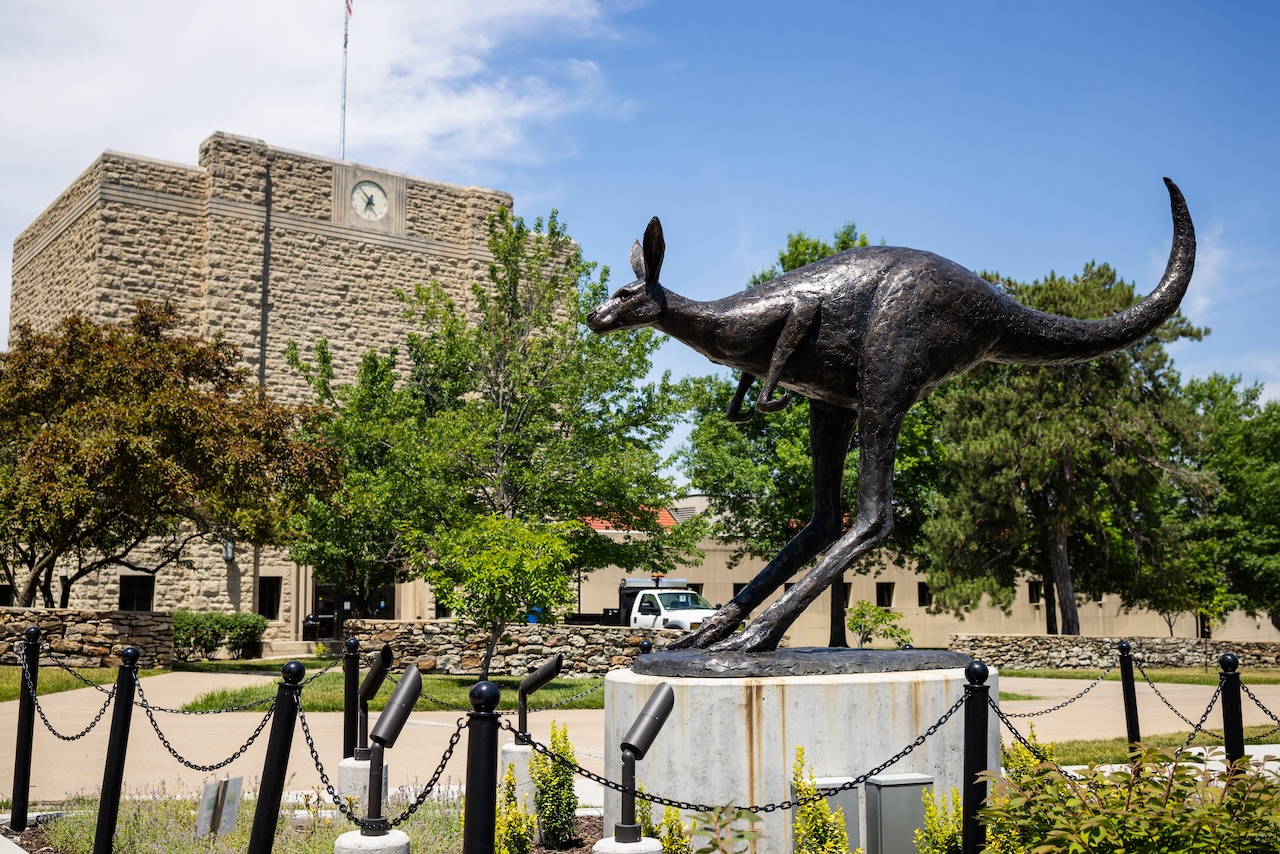
A groundbreaking year filled with excitement and many firsts for the university
The year 2023 saw rapid growth for Kansas City and its university. UMKC continues to reach new heights as an institution of higher education. With our students, faculty and staff at the forefront of our accomplishments in deep partnership with the community, it has never been a more exciting time to be a Roo.
Here are the Top 10 stories of 2023 at UMKC.
Roos in Flight: UMKC Community Involved in Creation of New Airport Terminal
In February, the new KCI Airport terminal opened to travelers and UMKC students, alumni and faculty helped make it happen. Together, Roos from communication, design, engineering, consulting and art backgrounds were involved throughout the largest infrastructure project in the history of the city.
UMKC Student Opportunities with the Kansas City Chiefs
UMKC announced that it is an official higher education partner of the Kansas City Chiefs, the 2022 World Champions. The five-year partnership between UMKC and the Kansas City Chiefs focuses on student success and recruitment efforts. Opportunities for UMKC students include scholarships as well as leadership, mentorship and career-shadowing within the Chiefs organization. Events for prospective students include stadium tours and other programs.
Revealing the Future of the UMKC Health Sciences District
The university revealed the design of its largest capital investment to date: the $120 million Healthcare Delivery and Innovation Building. With key funding from the state of Missouri and visionary Kansas City donors, the building will enable the university to provide state-of-the-art education, find newer and better ways to serve patients in need, strengthen collaborations with surrounding neighborhoods and facilitate greater interdisciplinary partnerships to fuel innovation and research.
UMKC Announces $10 Million Transportation Grant During Pete Buttigieg Visit
U.S. Secretary of Transportation Pete Buttigieg visited UMKC to discuss a new $10 million federal grant awarded to the School of Science and Engineering to develop innovative approaches to improve the sustainability and equity of transportation infrastructure. UMKC was among 20 selected from 169 universities to lead Tier 1 University Transportation Centers for underserved and disadvantaged populations.
Greater Kansas City and Missouri Named Tech Hubs
The U.S. Economic Development Administration has named the KC region and Missouri “Tech Hubs” as part of a historic investment to strengthen the U.S. economy and national security - and UMKC played a significant role in this recognition. "The new Tech Hubs designation provides great scope for innovation in Kansas City – and I can envision all the groundbreaking advancements to come as our UMKC students, faculty and staff work in collaboration with the many fantastic organizations in the greater Kansas City area," said UMKC Chancellor Mauli Agrawal. "We at UMKC could not be more excited."
UMKC is Now a First Scholars Institution!
This new designation from the NASPA Center for First-Generation Student Success recognizes our efforts in supporting students with programs such as First Gen Roo Scholars. About half our students are first-generation students, and those who participate in the program have higher GPAs and are more likely to complete their degree than those who don't take part.
New UMKC School of Medicine Building Will Transform Health-Care Access in Missouri
UMKC broke ground on a new $14.5 million medical building for the School of Medicine campus in St. Joseph. With nearly half of rural counties in Missouri lacking adequate health-care access, this 22,000-square-foot building will transform access by training future health care providers who are committed to rural medicine, supporting research and providing care to people in St. Joseph and the surrounding area.
UMKC Divine Nine Garden Deepens Community Connections
UMKC paid tribute to the contributions and presence of the Divine Nine fraternities and sororities with a ceremonial unveiling in the heart of campus. Hundreds of people from across the Kansas City region representing the Divine Nine Black Greek organizations that make up the National Pan-Hellenic Council gathered to celebrate.
What Do UMKC and the Kansas City Zoo Have in Common? Kangaroos
UMKC and the Kansas City Zoo & Aquarium announced a five-year partnership centered around their shared love of kangaroos. The relationship between the two Kansas City institutions dates back almost 90 years. Next time you find yourself at the zoo, venture into the Australia section to learn how the Roo came to be the mascot of UMKC.
Taylor Swift Eras Tour is Part of This UMKC Dance Alum's Resume
It's definitely been the year of T Swift, and Conservatory alumnus Kameron Saunders has enjoyed the excitement. He had the chance to "make the whole place shimmer" in Kansas City as a backup dancer on the Eras tour with Taylor Swift. Although originally from St. Louis, Saunders considers Kansas City a second home.
Dec 16, 2023
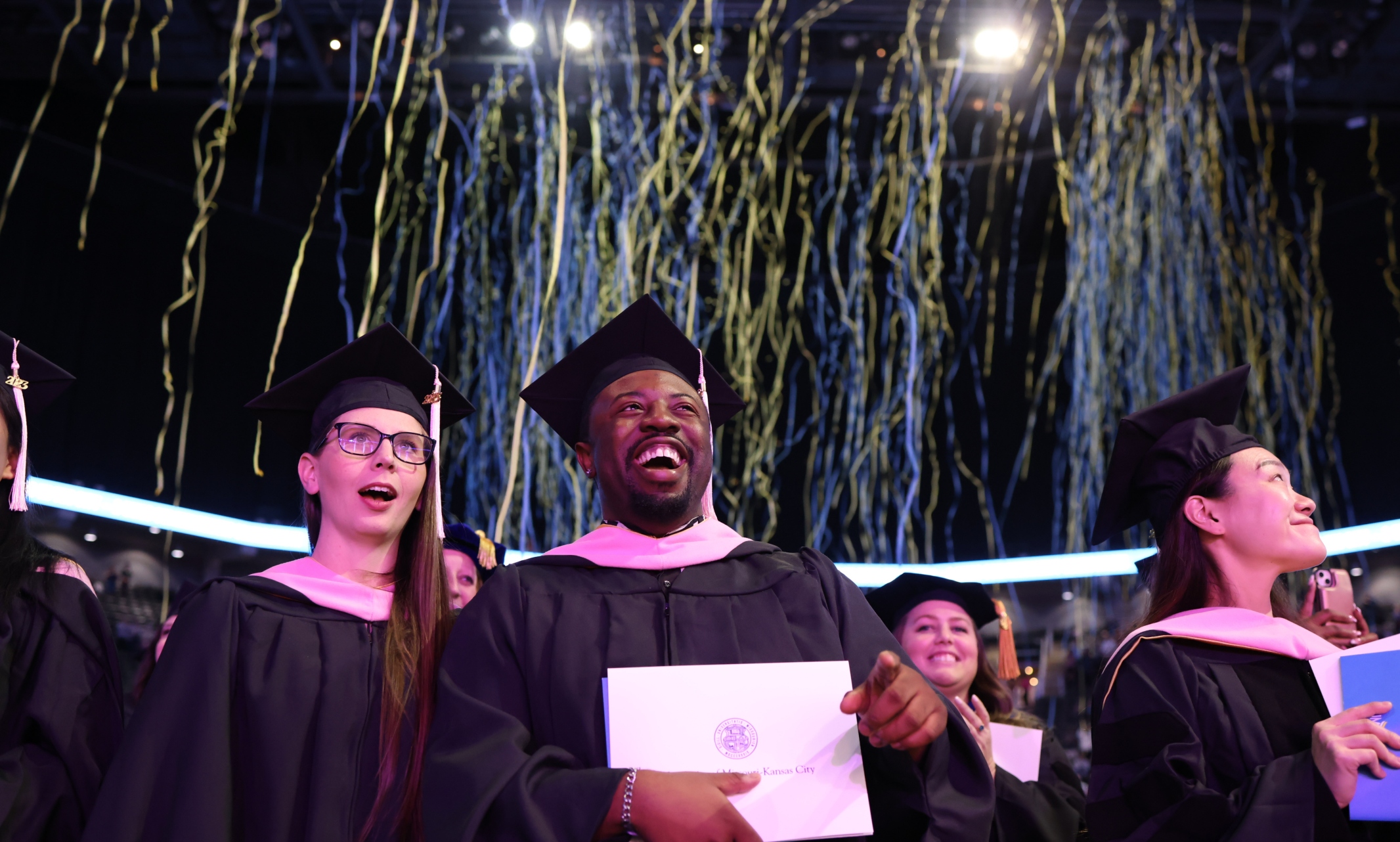
Kansas City’s university held its annual Mid-Year Commencement at the T-Mobile Center in downtown Kansas City
UMKC graduates and their loved ones filled the T-Mobile Center as more than 1,000 degrees were conferred.
“I know you are a remarkable group of people,” said Chancellor Mauli Agrawal. “I am proud to be here today to celebrate this momentous occasion with you.”
UMKC alumna Esther George (MBA ’00) was the keynote speaker. George was the first woman president and chief executive officer of the Federal Reserve Bank of Kansas City. “Keep learning and remember this, the degree UMKC is about to confer upon you today does not represent what you know, but what you are capable of learning,” George said. “Let curiosity lead you to places of knowledge that you might not have considered.”
Kansas City Mayor Quinton Lucas also addressed the graduates, encouraging them to push through challenges many face in their careers and in life. “I know as you’ve gone through your journey many things have changed, but you have persevered,” Lucas said. “Be ambitious, courageous and bold…You should continuously strive to be famously excellent in all you do.”Following the addresses, the graduates were recognized and the Class of 2023 moved their tassels from the right to the left side of their caps, symbolizing their status as graduates. The celebration concluded with confetti, streamers and sparklers.
Dec 15, 2023
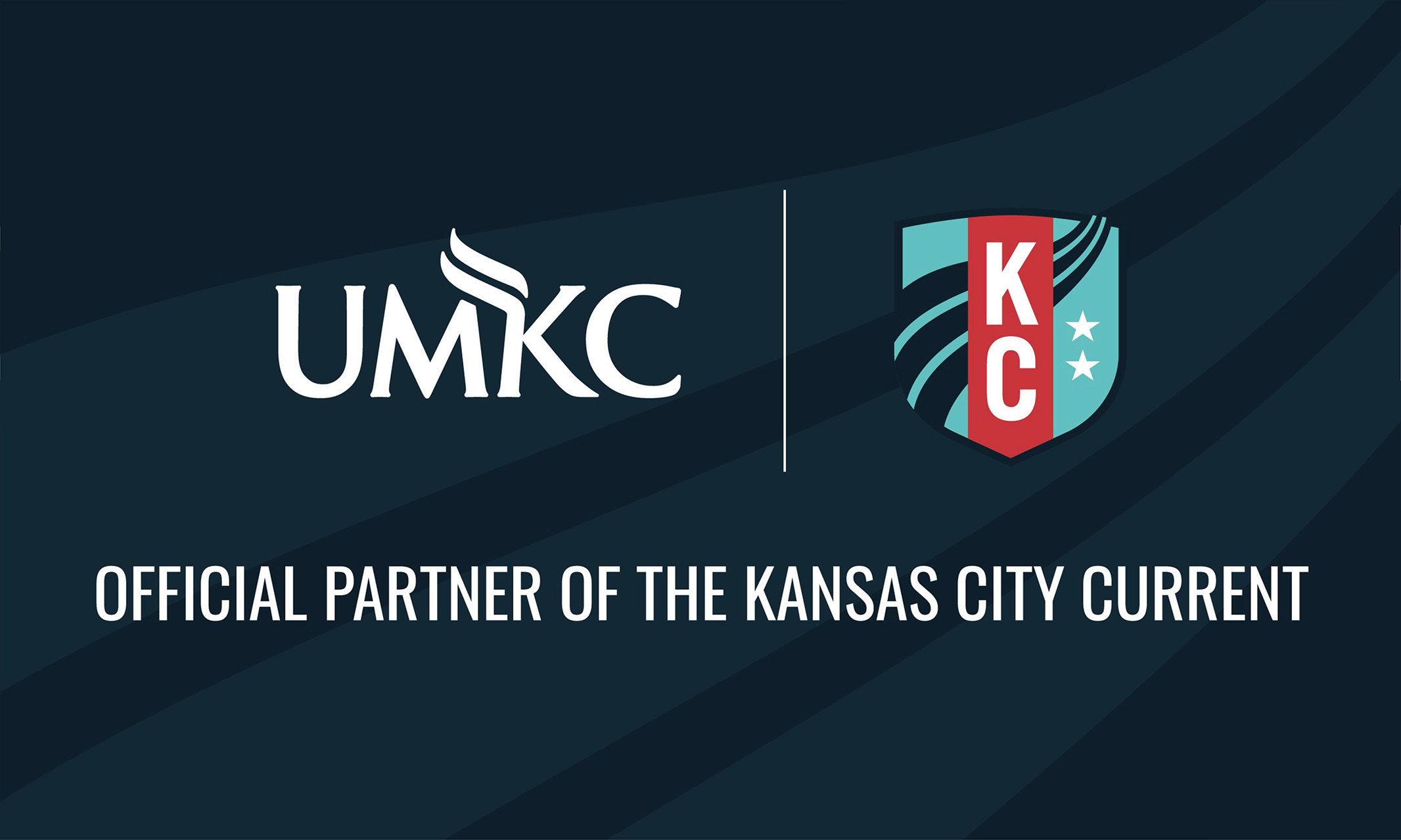
Kansas City’s university will provide undergraduate and graduate opportunities to Current players
The Kansas City Current announces a multi-year partnership with the University of Missouri-Kansas City as the Official Higher Education Partner, beginning in the 2024 NWSL preseason.
UMKC will provide first-of-its-kind undergraduate and graduate opportunities to players actively on the Current roster. The Current will provide player and coach mentorship as well as access to Current facilities for preseason training and a match.
“We are so thrilled to announce this new partnership with UMKC,” said Current co-owner Angie Long. “We want to provide every opportunity to our players to continue their higher education. We think this relationship will present groundbreaking opportunities and educational access for our athletes as well as the Roos scholar-athletes. We are proud to partner with UMKC and eager to provide a unique education opportunity that can complement the demanding schedules of our professional athletes as they build the skills they need to succeed off the pitch.”
This partnership focuses on elevating education on multiple levels. UMKC will provide educational opportunities for KC Current athletes through its robust academic programs. The Current will use its platform to elevate UMKC and its women’s soccer program, allowing scholar-athletes to connect with KC Current players for leadership and mentorship. The Roos will host one pre-season and one regular season match at the Sports Complex in Riverside, Missouri on the Championship Field in 2024.
UMKC will also be able to share the excitement of KC Current soccer on campus, when it brings its Teal Mobile takeovers to students, with team spirit and merch opportunities.
“Kansas City’s groundbreaking team is partnering with Kansas City’s groundbreaking university,” said UMKC Chancellor Mauli Agrawal, Ph.D. “Both of our institutions are breaking barriers and we intend to keep breaking them.”
The Kansas City Current announced plans for the first stadium purpose-built for a professional women’s soccer team with expected completion in 2024. | Photo courtesy of the Current.
UMKC has a host of unique programs to elevate students across various professions. UMKC’s top-ranked School of Medicine innovated a combined six-year B.A./M.D. program, different from the traditional eight-year program. UMKC founded Supplemental Instruction, a peer-tutoring system now used at hundreds of colleges around the world because it boosts letter grades and retains students through reinforced learning. Just this month, the NASPA Center for First-Generation Student Success designated UMKC a First Scholars Institution, recognizing the university’s unique methods of helping first-generation students succeed in college, earning higher GPAs and retention rates when compared with their peers.
The UMKC Division I Athletics program is also exceptional, with students exceling on and off the field. Players on the women’s soccer team have a cumulative 3.63 GPA. This year, the Summit League recognized Roos Women’s Soccer Coach Jess Smith as its Coach of the Year. Smith also is a coach for the KC Current Summer Camp.
“We are fortunate and grateful to partner with the KC Current organization,” said Brandon Martin, Ph.D., UMKC vice chancellor and director of Athletics. “Our mission, goals and priorities are aligned, and we look forward to immediate championship-level synergy. This partnership not only elevates our women’s soccer program but propels our effort to advance Kansas City.”
Roos Women's Soccer Coach Jess Smith won the Summit League Coach of the Year. | Photo courtesy of UMKC Athletics.
These two groundbreaking Kansas City institutions share other deep connections.
UMKC alumni serve as top KC Current leaders: Monica Ngo as Vice President of Human Resources for the Current and Maggie Walters as General Counsel.
UMKC faculty Meg Gibson, M.D., is a physician for the Current.
Current founders and co-owners Angie Long and Chris Long were named Kansas City Entrepreneurs of the Year by UMKC for their leadership roles at Palmer Square Capital Management and their work with the Current, two powerful platforms that are leading the way in making positive change on a global basis.
It’s that worldwide emphasis that also makes this partnership groundbreaking in nature. UMKC attracts students from more than 75 countries and the Current’s fanbase spans the globe. The Current roster features international players from France, Canada, Sweden, Brazil and Denmark. Kansas City’s university and the Current align in their missions to be the best in the world while also being pillars of the Kansas City community.
Crowds line up for the KC Current's Teal Mobile for team spirit and merch. | Photo courtesy of KC Current
About the Kansas City Current
Founded in December 2020, the Kansas City Current is led by the ownership group of Angie Long, Chris Long, Brittany Mahomes and Patrick Mahomes. The team competes in the National Women’s Soccer League (NWSL). The Kansas City Current announced plans for the first stadium purpose-built for a professional women’s soccer team with expected completion in 2024. To receive periodic updates on the new Kansas City Current Stadium at Berkley Riverfront Park, visit here to sign up for more information or to stay connected.
About the University of Missouri-Kansas City
The University of Missouri-Kansas City is a public research university with more than 15,300 students and more than 125 academic programs. Its two main campuses are in the heart of Kansas City, providing students with unparalleled access to jobs and internships. UMKC is dedicated to providing a quality education to everyone with one of the largest percentages of Pell-Grant-eligible students in the nation and in-state tuition scholarships to students in all 50 states.
Dec 13, 2023
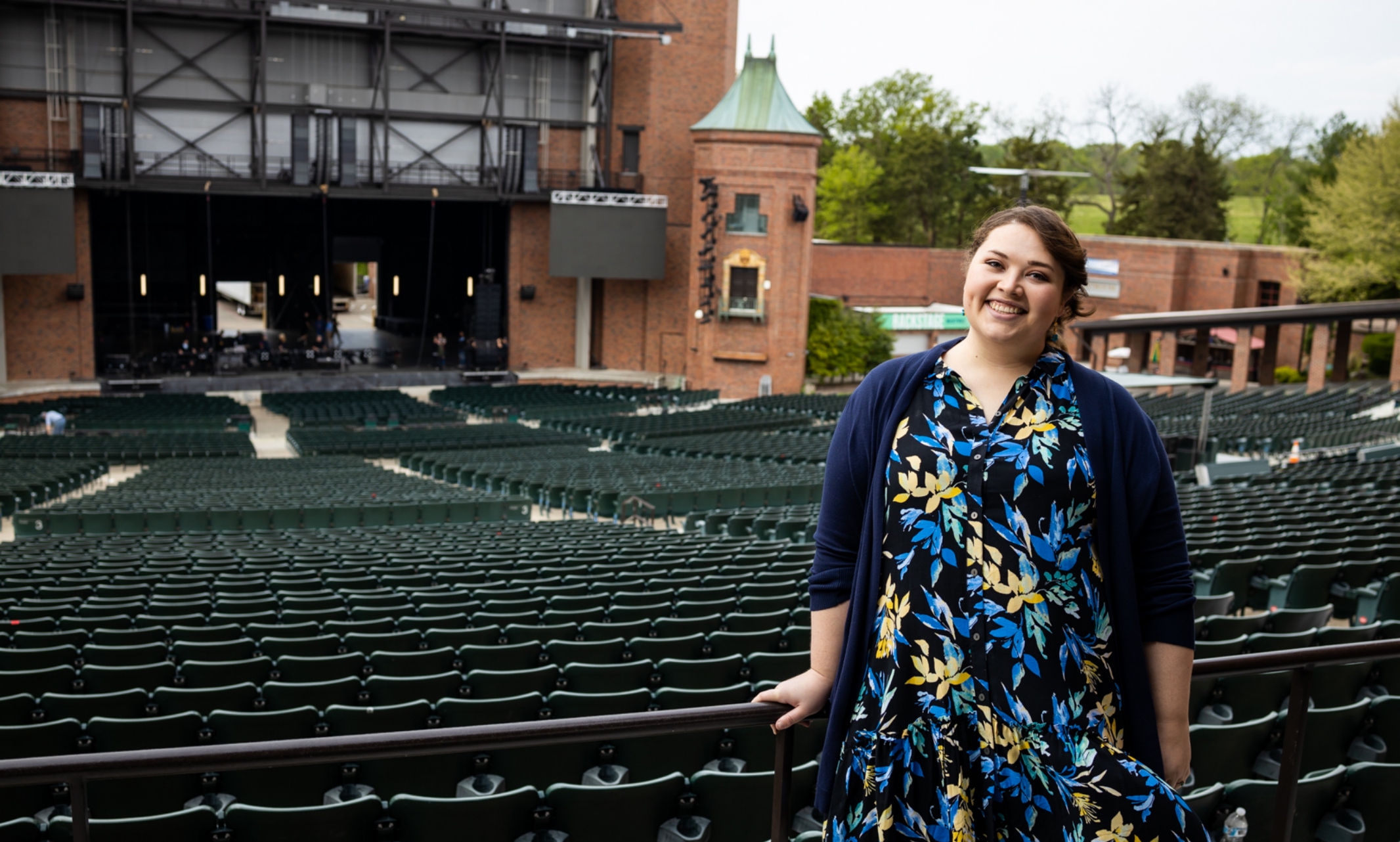
Kansas City’s outdoor/indoor performing arts venue was the opening number for a career in arts marketing
Roslinde Rivera has been going to Starlight since she was a child, but now her view of the stage is a little different.
Rivera, who is pursuing her MBA and graduate certificates in performance and performing arts management, was a marketing intern for Starlight.
Rivera was interested in arts administration and knew the UMKC performance arts management certificate would be a perfect fit for her career goals. When she met with faculty member Lisa Anderson Bongers, they narrowed down Rivera’s focus to find an internship to jumpstart her career path.“I’m interested in marketing and development, so we had a conversation about what places would be best for me to start in marketing,” Rivera said. “When Starlight came up on that list, I was very interested.”“Having that connection to Starlight and able to come back to a place I love, that was really important to me,” Rivera said.
Working at Starlight gave Rivera the opportunity to hone her marketing skills in a supportive environment. She put together press kits, wrote blog posts, managed social media and worked with outside partners.
“One thing that I always look for in a workplace is great community,” Rivera said. “Being at Starlight has really shown me what a good community looks like in how people treated each other.”Starlight is a natural fit for Rivera, a singer and performer.
Rivera knew her hometown had endless opportunities, both as a student and beyond.“Being able to go to a local university that has so many connections is incredible,” Rivera said. “Kansas City has so many opportunities, and I don’t think a lot of people realize the connections, especially if you’re wanting to go and perform.”
“There are people in all different paths of life and they’re all working toward something,” Rivera said. “If you’re starting out and you’re terrified and you don’t know what to do, you have people that you can look up to. And I think that’s just really invaluable.”
Dec 05, 2023
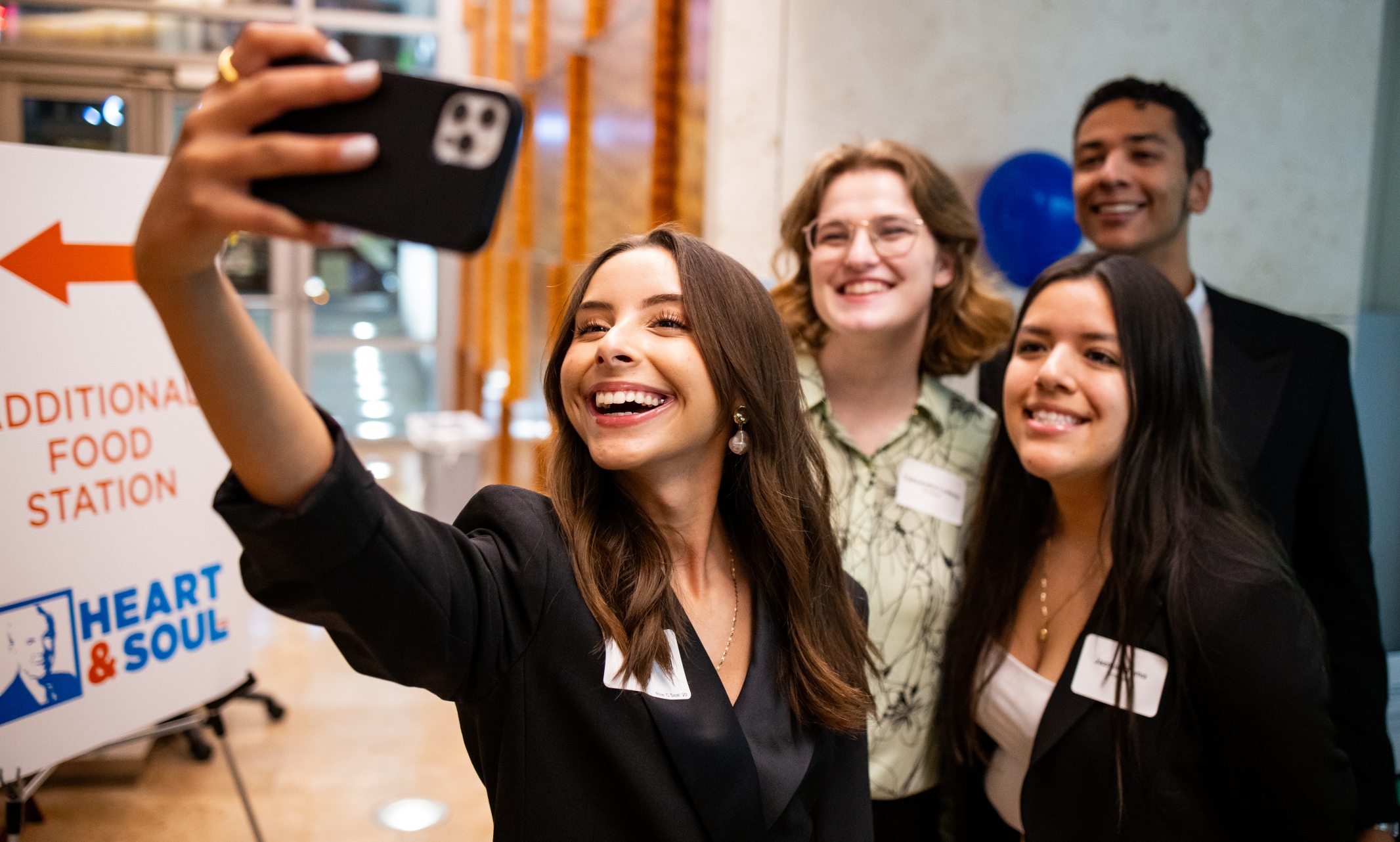
Sports are a common thread and include KC Current and Chicken N Pickle
Five game-changing entrepreneurs were awarded during the Henry W. Bloch School of Management Regnier Institute’s 37th annual Entrepreneur of the Year Awards.
Started in 1985, the event celebrates the contributions of entrepreneurs in Kansas City and beyond by recognizing the work of students as well as local, national and global-industry entrepreneurs and leaders.
This year’s event was held at the H&R Block headquarters - the industry-shaping business entrepreneurs Henry Bloch and his brother, Richard Bloch, founded.
Prior to the awards ceremony, attendees learned about business ventures by students from Bloch and the Kansas City Art Institute at the Student Venture Showcase.
“Their dedication and passion is truly inspiring,” said UMKC Chancellor Mauli Agrawal. “Celebrating risk takers and innovators is one of the reasons I look forward to this event.”
The 2023 awardees:
Henry W. Bloch International Entrepreneur of the Year and Entrepreneur Hall of Fame Inductee
Marcelo Claure, Founder and CEO of Claure Group and Founder of Brightstar
Claure is a global entrepreneur and the founder and CEO of Claure Group, a multi-billion-dollar global investment firm. He is a well-known entrepreneur and operator after building Brightstar from a small local distributor to the world’s largest global wireless distribution and services company.
As an investor, Claure was also the CEO of SoftBank Group International where he launched SoftBank’s $8 billion Latin America Funds and had direct oversight for SoftBank's operating companies like ARM, SB Energy, WeWork and others. Claure also helped orchestrate Sprint's $195 billion merger with T-Mobile, creating what is now one of the most valuable telecommunications companies in the world.
"The journey of an entrepreneur is never a straight line," said Claure, who delievered remarks via video. "My goal is to continue innovating, lead with integrity and inspire future entrepreneurs."
Claure owns Club Bolívar, Bolivia's largest professional soccer team, and is a co-owner of Spain's Girona FC, in partnership with City Football Group.
Claure was inducted into the Entrepreneur Hall of Fame. Located on the main level of the UMKC Bloch Executive Hall for Entrepreneurship and Innovation, the hall of fame gives students and the community a peek inside the journeys of Kansas City’s entrepreneurial stars. The dedicated gallery space was the vision of Joe and Judy Roetheli, creators of Greenies dog treats. Their goal is to honor entrepreneurs and inspire students. Exhibits of the hall include an interactive touchscreen featuring inductee biographies, artifacts from their lives and words of inspiration from the entrepreneurs themselves.
Kansas City Entrepreneurs of the Year
Chris Long, Founder of Palmer Square Capital Management
Angie Long, Chief Investment Officer of Palmer Square Capital Management
Chris Long founded Palmer Square Capital Management, an approximately $27 billion asset manager focused on corporate and structured credit with offices in Kansas City and London, in June 2009. Currently, he serves as chairman, CEO and portfolio manager. He serves on the Board of Directors of the KC Sports Commission and Greater Kansas City Community Foundation and in many roles related to Princeton University.
Angie Long is chief investment officer and one of two principal owners for Palmer Square Capital Management. Her career includes experience at JPMorgan Chase & Co. where she was named a managing director at age 29 and held many senior roles. She serves on the Board of Directors of Union Station as well as the KC 2026 World Cup Board. She is a member of the 100 Women in Finance and is a CFA charter holder.
Along with co-owner Brittany Mahomes, the Longs brought a National Women’s Soccer League franchise back to Kansas City. The Kansas City Current has built the only training facility in the world with a women’s professional team as the sole tenant. They are also building the world’s first stadium devoted to a women’s professional soccer team.
"We get to lead two amazing organizations - both of which have powerful platforms to be a positive force on a global basis," the Longs said at the event. "It is a privilege we do not take lightly. We are fortunate to work with some of the most talented, passionate people in both the investment world and the sports business. Together, and as a result of the hard work, innovation and leadership of these organizations, it is exciting to look at the impact."
Marion and John Kreamer Award for Social Entrepreneurship
David Johnson, Founder of Chicken N Pickle and CEO of Maxus Realty Trust
Johnson had already founded and developed a successful real estate management company when he created Chicken N Pickle in 2017. The concept burst onto the scene, and now has eight venues open, with seven more announced across several states.
Community engagement is at the core of the Chicken N Pickle culture, with programs that provide strong support for 2,029 charitable organizations in the surrounding areas where each of the Chicken N Pickle locations are based. Extra money is raised for charities through their cup sales, and more than $100,000 was donated just through those extra dollars to support the community.
"My team embraces the community everywhere they go, and they deserve all the credit," Johnson said. "We've found that by doing good, good things happen to us."
Johnson is currently on the board of Verimore Bank, KC Crime Commission, MU Dean’s Board and Kansas City Chamber of Commerce.
Student Entrepreneur of the Year
Lesly Romo
Romo is a business administration student and bilingual real estate professional. Over the past year, she has achieved more than $2 million in sales and possesses a comprehensive understanding of the real estate industry. Currently, Romo holds the role of vice president of projects for UMKC Enactus, where she takes the helm of multiple innovative initiatives that leverage social entrepreneurship to drive meaningful change.
Romo is working to establish a nonprofit organization dedicated to promoting financial literacy in the Hispanic community. She is also looking to construct a multifaceted soccer facility. The aim is to create an inclusive space for soccer enthusiasts of all backgrounds.
"This serves as a commitment to turn my wildest dreams into action," Romo said."We will unite people through their love of soccer as they come to Kansas City for the World Cup (in 2026)."
All proceeds from the event directly benefit the Regnier Institute for Entrepreneurship and Innovation’s student and community programs. The Regnier Institute at the Bloch School focuses on connecting students and community members with a comprehensive combination of world-class research, renowned faculty, cutting-edge curriculum and experimental programs driven to deliver results and nurture the next generation of entrepreneurs.
Dec 01, 2023
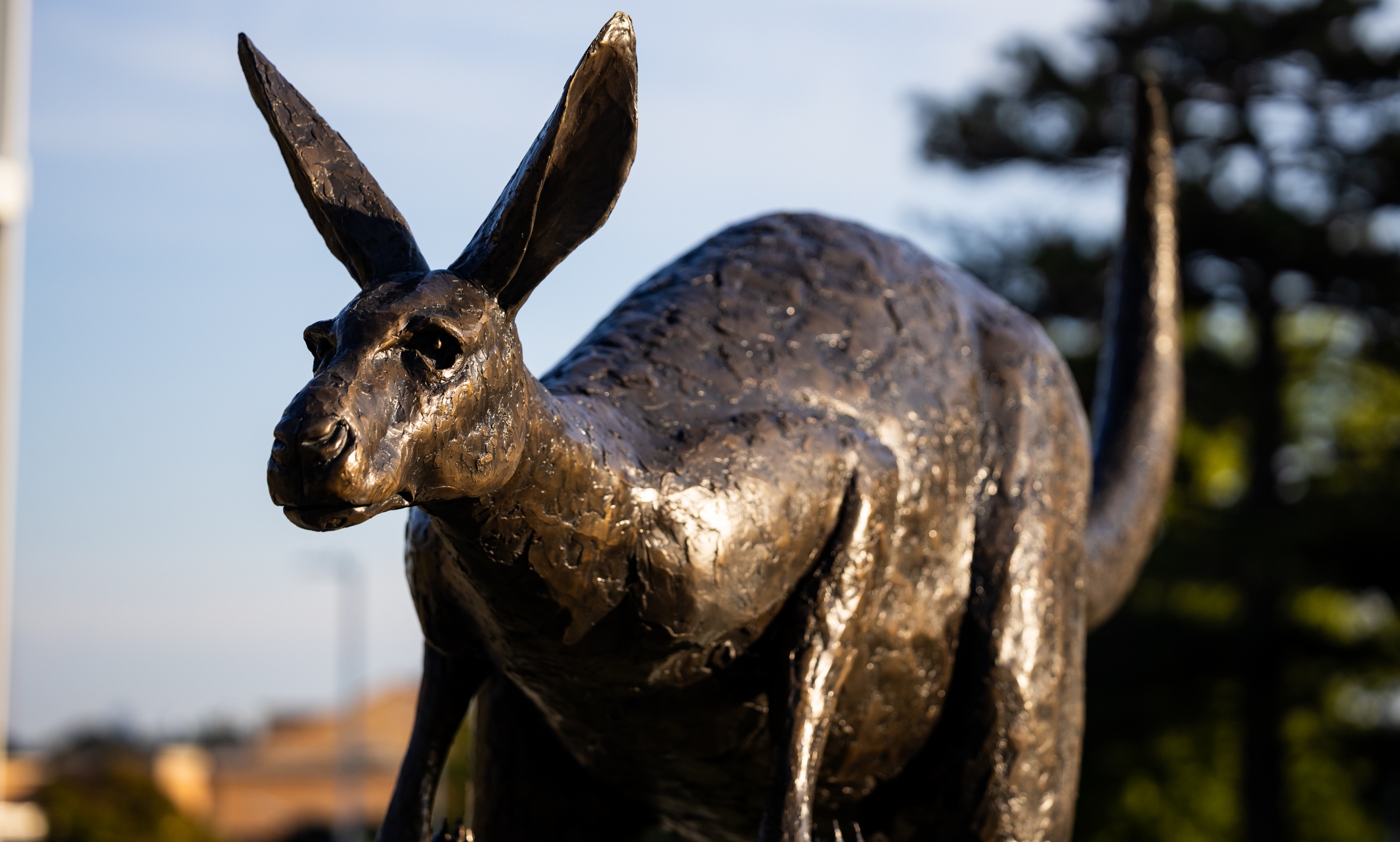
The new process will make the form simpler, more streamlined
The U.S. Department of Education is making changes to the Free Application for Federal Student Aid (FAFSA), which students should fill out each year.
The changes are the result of the FAFSA Simplification Act. Here are the top five things you need to know about the change.
1. The FAFSA will be available later than usual.
The FAFSA forms are typically available Oct. 1 of each year. This year, they will be available later than that. The Department of Education has announced the application is expected to be open by Dec. 31.Every student should fill out the FAFSA every year. UMKC students should file by the April 1 priority deadline to increase their chances of receiving grants and scholarships.
2. Your parent or spouse will need their own StudentAid.gov login.
Spouses and parents who provide information in the FAFSA will be called contributors. They’ll also be required to create their own logins. If your parent or spouse will be a contributor, encourage them to create an ID now to ensure they’re able to fill out their portion of your FAFSA quickly.
3. The application will have fewer questions.
The updated FAFSA is much shorter and can pull information directly from your income tax return. To pull from your income tax return, you’ll need to consent via your FSA ID. If you do not have an FSA ID, you can create one now so you’re ready when the FAFSA is available. Other helpful information to gather includes:
Legal Name
Date of birth
Social security number (if applicable)
Mailing address
Email address
Note the UMKC FAFSA code: 002518
4. The new form uses different terminology.
The 2024-25 form has new terminology that may replace older terms you’re familiar with. Notably, the Student Aid Index (SAI) will replace the term “Expected Family Contribution” (EFC). This term refers to a student’s approximate financial resources available to contribute to their education.
5. The change will expand access to federal Pell Grants.
More students will be eligible for Pell Grants. Eligibility will be linked to family size and the federal poverty level.
Nov 21, 2023
Esther George’s (MBA ’00) journey is one marked by leadership, accomplishment and breaking glass ceilings.
In 2011, she became the first woman president and chief executive officer of the Federal Reserve Bank of Kansas City. For more than 10 years, George led a workforce of 2,100 Federal Reserve employees serving seven states from the bank’s headquarters in Kansas City. She had a major influence on our nation’s banking system, and was actively involved in the Federal Reserve’s work to ensure the smooth and efficient functioning of the nation’s payment system, including leading the effort to establish instant retail payments known as the FedNow Service.
“Great cities have great universities, and I see Kansas City as poised to build on its momentum with UMKC at its center.” — Esther George (MBA ’00), retired president and CEO of the Kansas City Federal Reserve Bank
But before all of that, she was a student at the UMKC Henry W. Bloch School of Management, a choice she credits with preparing her for the role.“Education is such an important investment, and I consider UMKC and the Bloch School as playing a key role in my leadership development that ultimately led to my appointment as president and CEO of the Kansas City Fed,” George said. George enrolled at the Bloch school as a full-time employee and mother to two young children. Being able to go to a renowned institution that fit into her life was a key part of her decision of where to receive her master’s degree.“The proximity of the master’s program at the Bloch School and the quality of the curriculum made it a perfect choice,” George said. George said she made faculty connections at UMKC that have lasted throughout her career, and that she even keeps in touch with some today. “Their enthusiasm for the subjects they taught was infectious and effective,” George said.George said the impact of connecting has been impactful for her career, and advised future female leaders to look for people who can help them grow. “As women invest in their education and pursue a given career path, it can be helpful to rely on mentors,” George said. “I benefited from looking to people with more experience, with different experiences to help me think about my personal effectiveness.” A Kansas City leader, George serves on the boards of the Hallmark Corporation, the Ewing Marion Kauffman Foundation, the Peterson Institute for International Economics and the Kansas City 2026 World Cup.
Nov 15, 2023
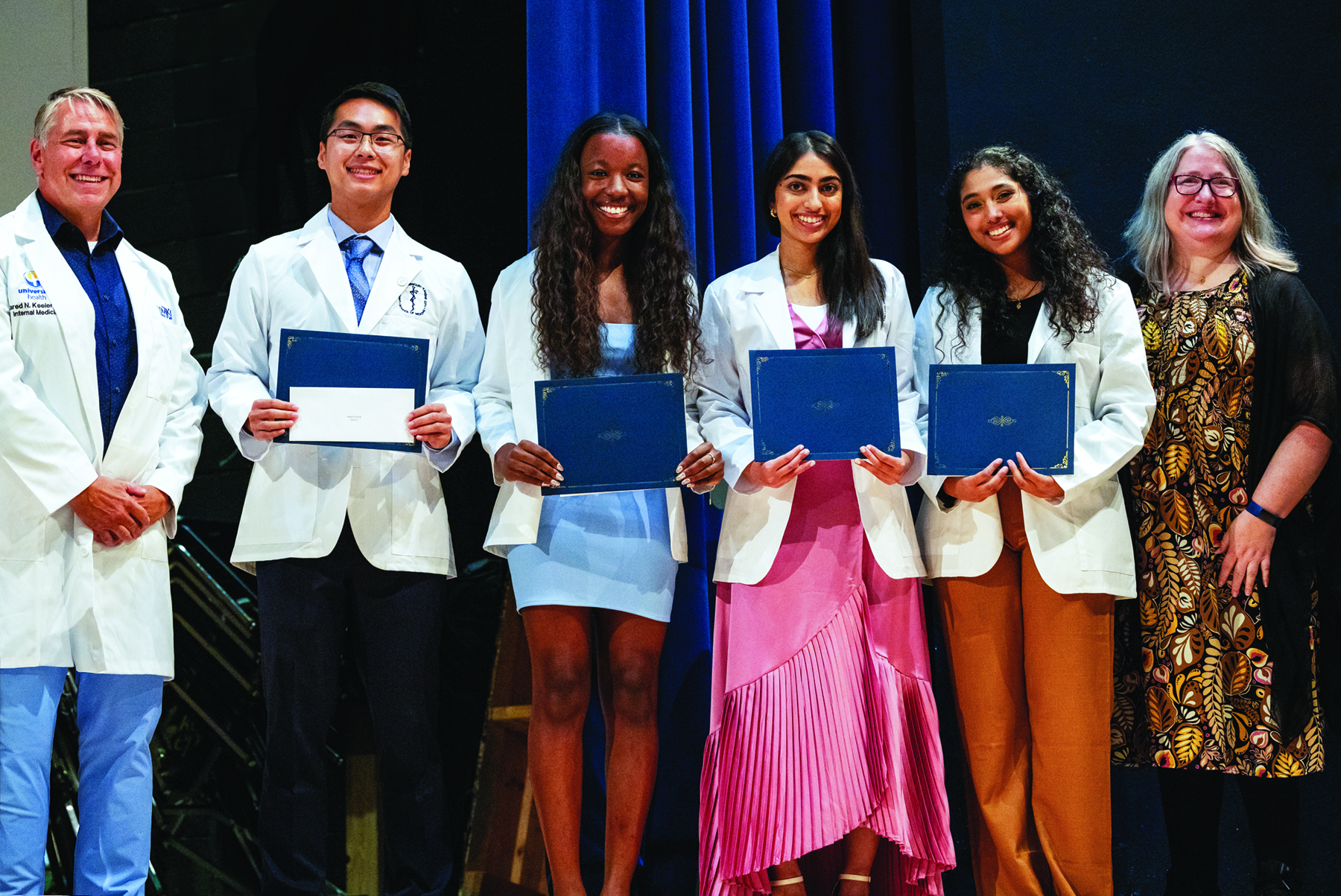
The school received the award from INSIGHT Into Diversity magazine
The University of Missouri-Kansas City School of Medicine has received the 2023 Health Professionals Higher Education Excellence in Diversity (HEED) award from INSIGHT Into Diversity magazine.
In a letter to 2023 winners, INSIGHT Into Diversity magazine said the school’s efforts "significantly advance" the core values of diversity, equity and inclusion as evidenced through mentoring, teaching, research, hiring and promotion, recruitment, retention and many other campus priorities deserving of this national recognition.
"As an institution we continue to strive to create a learning and clinical environment that is diverse, equitable and inclusive to all graduate and medical students, residents, fellows, staff and faculty members,” said Tyler Smith, M.D., M.P.H., associate dean of Diversity, Equity and Inclusion. “These core values guide the School of Medicine’s Office of Diversity, Equity and Inclusion. While managing the evolving landscape of diversity, equity, and inclusion in higher education, UMKC SOM continues to uphold the vision, mission, goals and values in place since the institution’s founding.”
The school has introduced the next generation of providers to DEI values through strategic initiatives and leadership that champions the success of all students, including its anti-racism and cultural bias program that prepares medical students for a career where these principles are incorporated. Students complete this program before going through clinical rotations, helping to ensure that all students are giving the highest level of care from day one.
Other School of Medicine initiatives — such as specialized care for students at academic risk, the Multicultural Advisory Committee of Students and the Summer Success Seminar Series — provide opportunities for future medical providers.
“I am so proud of our incredible faculty, staff and students who work tirelessly to expand the DEI work that our medical school takes such great pride in," said Mary Anne Jackson, M.D., dean of the School of Medicine. "A lot of that work includes recruiting and retaining students from different backgrounds who share different beliefs, attitudes and experiences. This is especially important, because as our students graduate and join the health-care team, we know a more diverse workforce promotes better care for diverse populations. It improves access, quality of care and health outcomes.”
This is not the first time that UMKC has been recognized for its DEI efforts. INSIGHT Into Diversity magazine also recognized the School of Medicine with the award in 2022 and 2018.
Nov 15, 2023
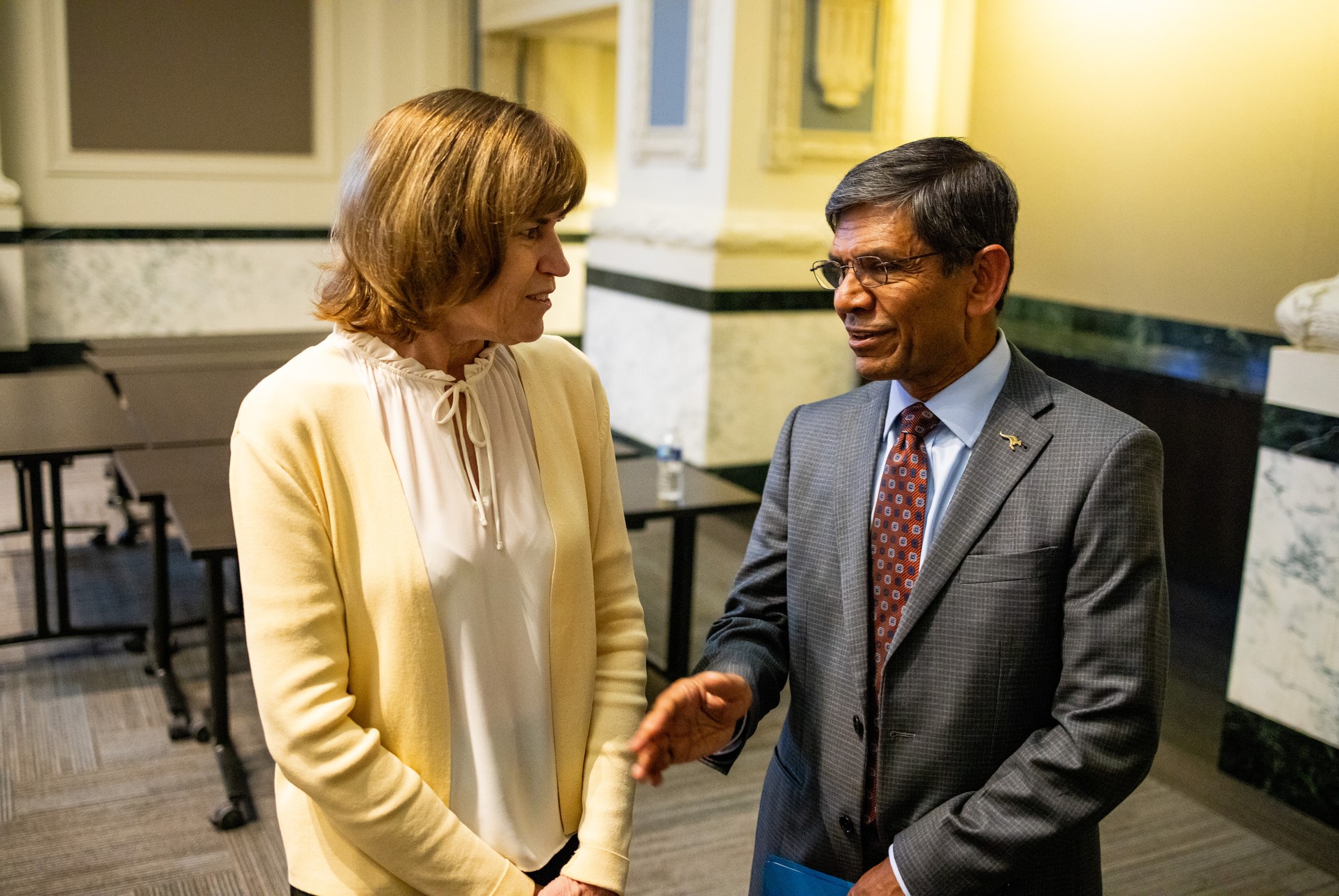
Partners include BioNexus KC, KC Digital Drive and Pipeline Entrepreneurs
The University of Missouri-Kansas City was awarded a $2 million Build to Scale grant along with partners BioNexus KC, KC Digital Drive and Pipeline Entrepreneurs to advance Digital Health KC from the Economic Development Administration.
The Ewing Marion Kauffman Foundation will match the award, totaling $4 million, to build upon existing digital health strengths in the KC region.
Digital Health KC will create ideal conditions for a vibrant ecosystem, catalyze collaboration and connect critical elements such as ideas, talent, companies, capital and customers. This funding will fuel Digital Health KC to support health-care technology entrepreneurs, foster innovation, build and strengthen the region’s talent pool and inspire economic growth.
“Our ecosystem is rich in talent and ideas but requires additional financial and industry-specific support," said Dick Flanigan, CEO of Digital Health KC. "Solving health care’s most significant challenges involves people, processes and technology, all aligned to provide solutions. Digital health offerings are among the most promising solutions seeking to improve access and quality while addressing the ever-increasing cost of care. This grant will increase our resources for funding, mentorship, connectivity and guidance to attract and grow companies in the KC region.”
Over the next three years, Digital Health KC and partners will advance early-stage digital health companies with programming to increase understanding of the unique aspects of building health-care solutions, executing a go-to-market plan and identifying and providing industry-specific mentors and business acumen support.
This investment will result in more than 20 new startups for a regional total of 120+ companies, 15 completed beta customer projects, $45 million in debt and equity investment and 500 new jobs for the KC region.
“Ecosystem building is a team sport, and it starts with community organizations uniting for a common purpose – to build a thriving digital health network with intentionality,” said Maria Meyers, executive director of the UMKC Innovation Center. “We are pleased to partner and grateful to the Kauffman Foundation for providing needed matching funds to bring this federal investment to the region. Our collective commitment to digital health will catapult the KC region and profoundly impact our community.”
Initially funded by the Patterson Family Foundation, Digital Health KC was launched in March 2023 by BioNexus KC, a life-sciences nonprofit creating opportunities at the nexus of human and animal health. UMKC is a BioNexus KC stakeholder.
The community heavily supported the EDA Build to Scale proposal, including industry, health-care providers and payers, investors, economic development organizations, workforce, government and nonprofit organizations in the KC region.
Nov 14, 2023
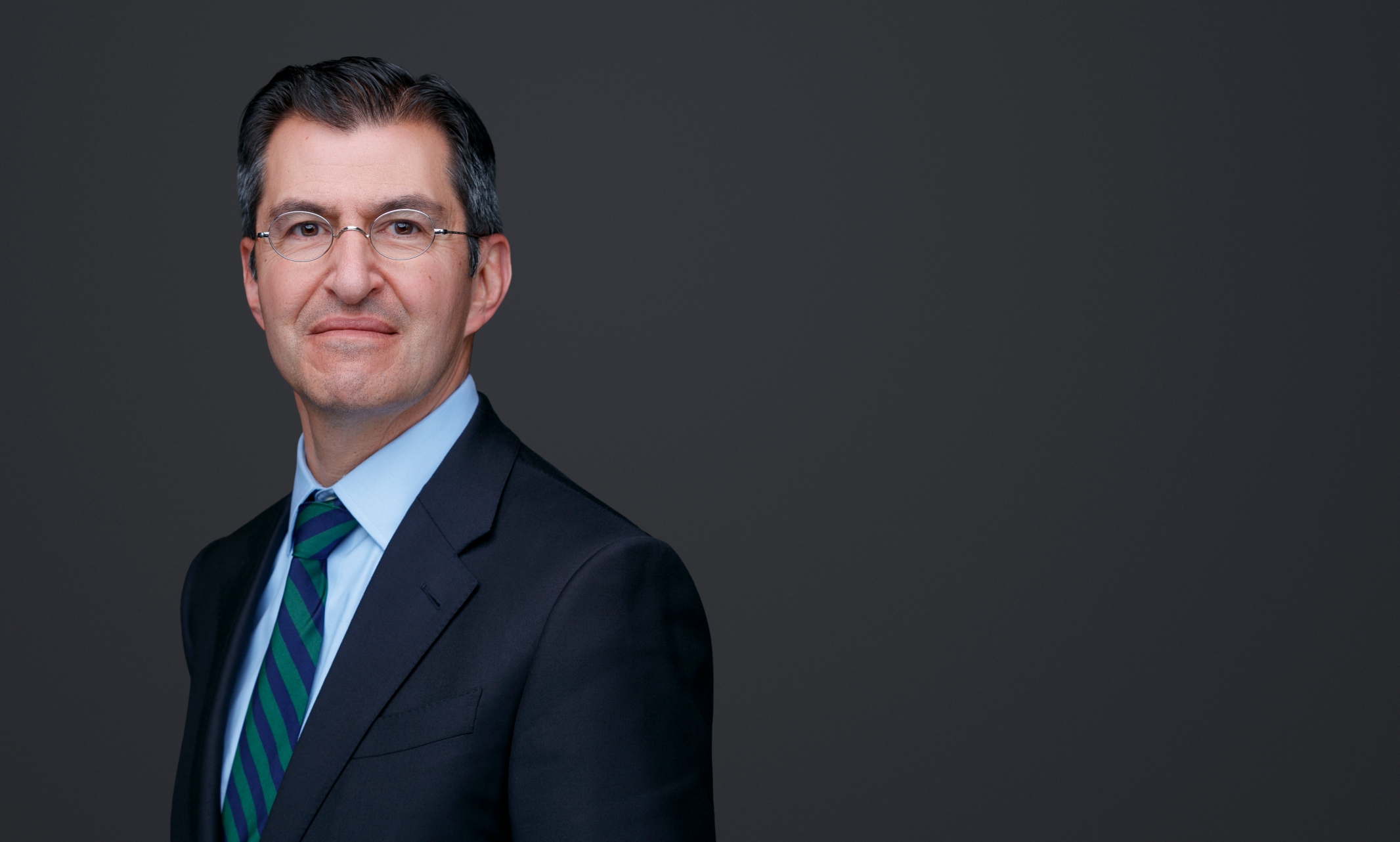
Alexander Norbash has a background in research and health-care collaboration
Alumnus Alexander Norbash, M.D., M.S., FACR, has been named the new dean of the University of Missouri-Kansas City School of Medicine. He will begin March 11.
Norbash will be coming from the University of California San Diego (UCSD) where he serves as chair and professor of radiology at the School of Medicine. His personal and professional experiences uniquely position him to lead the School of Medicine during this time of rapid advancement in the health-care enterprise at UMKC.
“I am thrilled to be returning to my hometown of Kansas City and my alma mater where I received an innovative and exceptional medical education at the UMKC School of Medicine,” Norbash said. “It is an exciting time for the school and the UMKC Health Sciences District, and I hope to enhance and contribute to UMKC’s upward trajectory. We commit to educating our future health-care leaders, fostering and implementing advances in clinical care, facilitating research and discovery, with the goal of creating great outcomes in our service to the community.”
Prior to UCSD, Norbash held multiple academic and leadership appointments, including at Stanford University School of Medicine, Harvard University School of Medicine and Boston University School of Medicine.
Norbash grew up in Platte City, the son of a rural doctor. He discovered the innovative UMKC School of Medicine and graduated in 1986 from the combined six-year B.A./M.D. program. From there he went on to further training in radiology and embarked on a career rich in clinical work, research and innovation. Along the way, he received a master’s degree in health-care management from the Harvard School of Public Health in 2004 and combined his clinical and research acumen to drive excellence, innovation and collaboration at top universities and hospitals across the country.
“Dr. Norbash has the ideal set of work and life experiences to help UMKC achieve its vision of continued excellence for our School of Medicine and growing our UMKC Health Sciences district into a preeminent academic medical center,” said UMKC Chancellor Mauli Agrawal, Ph.D. “He represents two passions that have been the hallmarks of our healthcare tradition at UMKC – pursuing equitable health care for all and harnessing innovation and technology to improve medical care. Those traits in him will be important assets in his new role.”
The School of Medicine is expanding in profound ways, both in medical education and the research enterprise and also in its physical footprint with a $120 million Healthcare Delivery and Innovation Building set to break ground in 2024 and a new $14.5 million medical education building underway on its St. Joseph campus.
“While interviewing Dr. Norbash, it became clear that he will bring an abundance of new ideas and experiences to propel the work being done at the School of Medicine,” said UMKC Provost and Executive Vice Chancellor Jenny Lundgren, Ph.D.
He will succeed Dean Mary Anne Jackson, M.D., another proud UMKC School of Medicine alum, who just this past month won national honors with the Association of American Medical Colleges Spencer Foreman Award for Outstanding Community Engagement. Jackson will continue as a faculty member and as a special advisor to the Chancellor on health affairs.
The UMKC School of Medicine, the top public medical school in Missouri for primary care, opened in 1971 to meet the heath-care needs of the state and the nation. Using an innovative approach, the school accepts students directly out of high school for the combined B.A./M.D. program that allows students to graduate in six years – vs. eight – with their medical degrees. The school also offers a traditional four-year program as well as four master’s degree programs in anesthesia, physician assistant, bioinformatics, and health professions education.
UMKC is one of only 20 universities in the U.S. to offer medical education along with dentistry, nursing and pharmacy on one campus. Combined with Children’s Mercy, University Health and city, county and state health organizations, it offers a unique UMKC Health Sciences District.
Nov 13, 2023
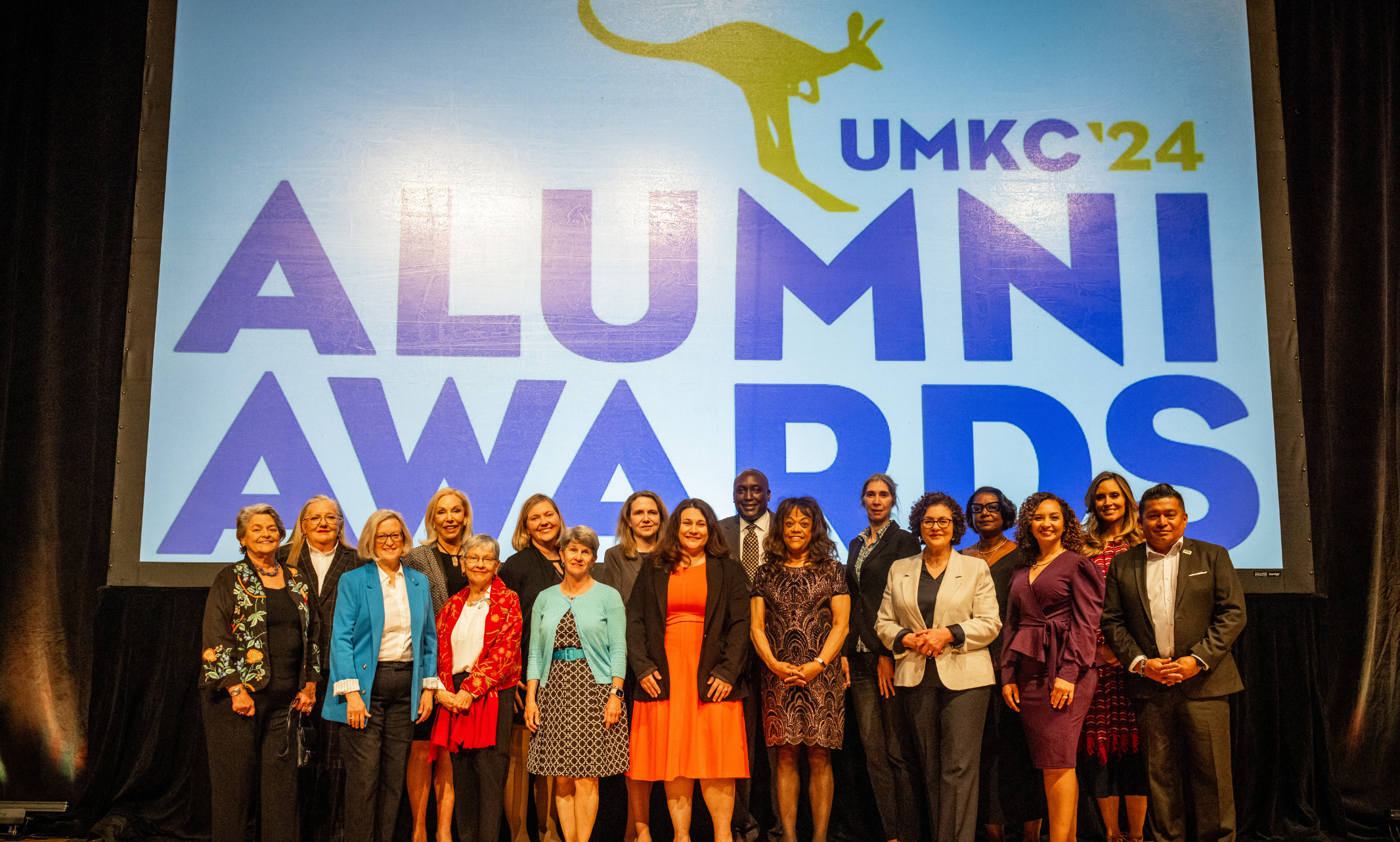
14 alumni and one family were honored April 5
The University of Missouri-Kansas City Class of 2024 Alumni Achievement Award recipients include a national ABC News anchor, a nonprofit founder and Kansas City trailblazers.
Each year, UMKC recognizes a select group of alumni for their inspirational accomplishments. The event offers a chance to celebrate the achievements and successes of graduates UMKC sends out into the world each year at Commencement, and raises funds to support their fellow Roos.
The Class of 2024 awardees were honored at a celebration on April 5 at the White Recital Hall in the James C. Olson Performing Arts Center.
University-Wide Alumni Awardees
Alumna of the Year
Rhiannon Ally (B.A. ’05) is a national anchor for ABC News’ “World News Now” and “America This Morning” and is a correspondent on “Good Morning America.” She also made her author debut with the children’s book, “Mommy, Please Don’t Go to Work!” The Raytown native co-anchored the Emmy-Award-winning 10 p.m. newscast for Kansas City’s NBC affiliate KSHB-TV alongside her husband, Mike Marusarz (B.A. ‘04), whom she met at UMKC.
Ally’s nearly 20-year career has taken her to Miami, New York, Los Angeles, London and Las Vegas. She has interviewed renowned celebrities including Madonna, Denzel Washington, Caroline Kennedy and Gloria Steinem. Ally also has had a front row seat to history, documenting events including the Boston Marathon bombing, the war in Ukraine, Hurricane Katrina and the Ghislaine Maxwell trial.
Spotlight Award
Carmaletta Williams (B.A. ’84, M.A. ’87, Ph.D.) is the Chief Executive Officer of the Black Archives of Mid-America in Kansas City. In this role, she plays a part in preserving and celebrating the role that Black Kansas Citians played in shaping, growing and enriching the Kansas City area. She also worked on a booklet titled ‘Kansas City Black History: The African American Story of History and Culture in our Community,’ which acknowledges, memorializes and documents the impact of exceptional leaders, artists, businesspeople and athletes from Kansas City’s Black communities.
The Bill French Alumni Service Award
As a member of the UMKC Board of Trustees and Trustees’ Scholars Committee, Suzanne Shank (J.D., MPA ’82) demonstrates an unwavering dedication to the university’s advancement.
She has also actively participated in numerous nonprofit associations, showcasing her commitment to philanthropy and community development. Her leadership roles in local organizations such as the KC Ballet, the UMKC Friends of the Conservatory, the Symphony League and the Lyric Opera, have contributed significantly to the cultural and artistic fabric of Kansas City.
Defying the Odds Award
Henry W. Wash (B.A., MPA) is the founder of High Aspirations, a proactive mentoring program for Black males ages 8 to 18 that emphasizes social, emotional, academic and spiritual growth. Over the last decade, this nonprofit has impacted thousands of young Black men’s lives. It is a nurturing program for Black males that increases social capacity and leads to a better quality of life for all.
Wash faced adversity early in his life. Abandoned by his mother at 3 months, he grew up in the foster-care system. He credits the mentorship he received from two prominent Kansas Citians, Henry W. Bloch and Thurman N. Mitchell, in helping him overcome his circumstances. Wash proceeded to get his undergraduate and MPA degrees from UMKC.
Legacy Award
The Tedrow/Selders/Hogerty Family's legacy at UMKC dates back generations. Joseph Herbert Tedrow graduated from the Kansas City School of Law in 1922.
His granddaughter, Martha Hogerty, earned her B.A. from UMKC in 1975 and her J.D. in 1979. She then served as Missouri Public Counsel for 12 years, where she advocated for Missouri residents and small businesses and represented Missourians in utility regulation cases.
Her daughter, Mary Needham, earned her B.A. from UMKC in 1988. Needham works at the UMKC Foundation as the director of development for the School of Humanities and Social Sciences.
School Alumni Achievement Awardees
Conservatory: Dina Thomas (MFA ’11)
Actor
School of Dentistry: Laila Hishaw (D.D.S. ’00)
Founding Partner, Tucson Smiles Pediatric Dentistry
School of Education, Social Work and Psychological Sciences: Donna Bushur (B.A. ’86, MSW ’06)
Health Forward Foundation, Impact Strategist
Henry W. Bloch School of Management: Julia Terenjuk (MBA ’00)
Founder and CEO, Creative Capsule
School of Humanities and Social Sciences: Daniel Silva (B.A. ’00)
President and CEO, Kansas City, Kansas Chamber of Commerce
School of Law: Allison Murdock (J.D. ’88)
Managing Partner, Stinson LLP
School of Medicine: Michael Monaco (B.A. ’84, M.D. ’87)
Internal Medicine Physician, Empower Preventive Care PA
School of Nursing and Health Studies: Lori Erickson (BSN ’06, MSN ’09, Ph.D. ’20)
Director, Remote Health Solutions, Children’s Mercy
School of Pharmacy: Crystal Riggs (Pharm.D. ’03)
Senior Vice President, Pharmacy Services, Curative
School of Science and Engineering: Amy Manning-Bog (Ph.D. ’99)
Chief Innovation Officer, MRI Global
If you were unable to attend the event but would like to donate to student scholarships, you can make a contribution online on the UMKC Alumni Association website.
The Alumni Awards ceremony is one of the university's largest events to support student scholarships. In the last decade, the Alumni Awards event has garnered more than $1 million in scholarships and immediate aid for UMKC students.
Nov 09, 2023
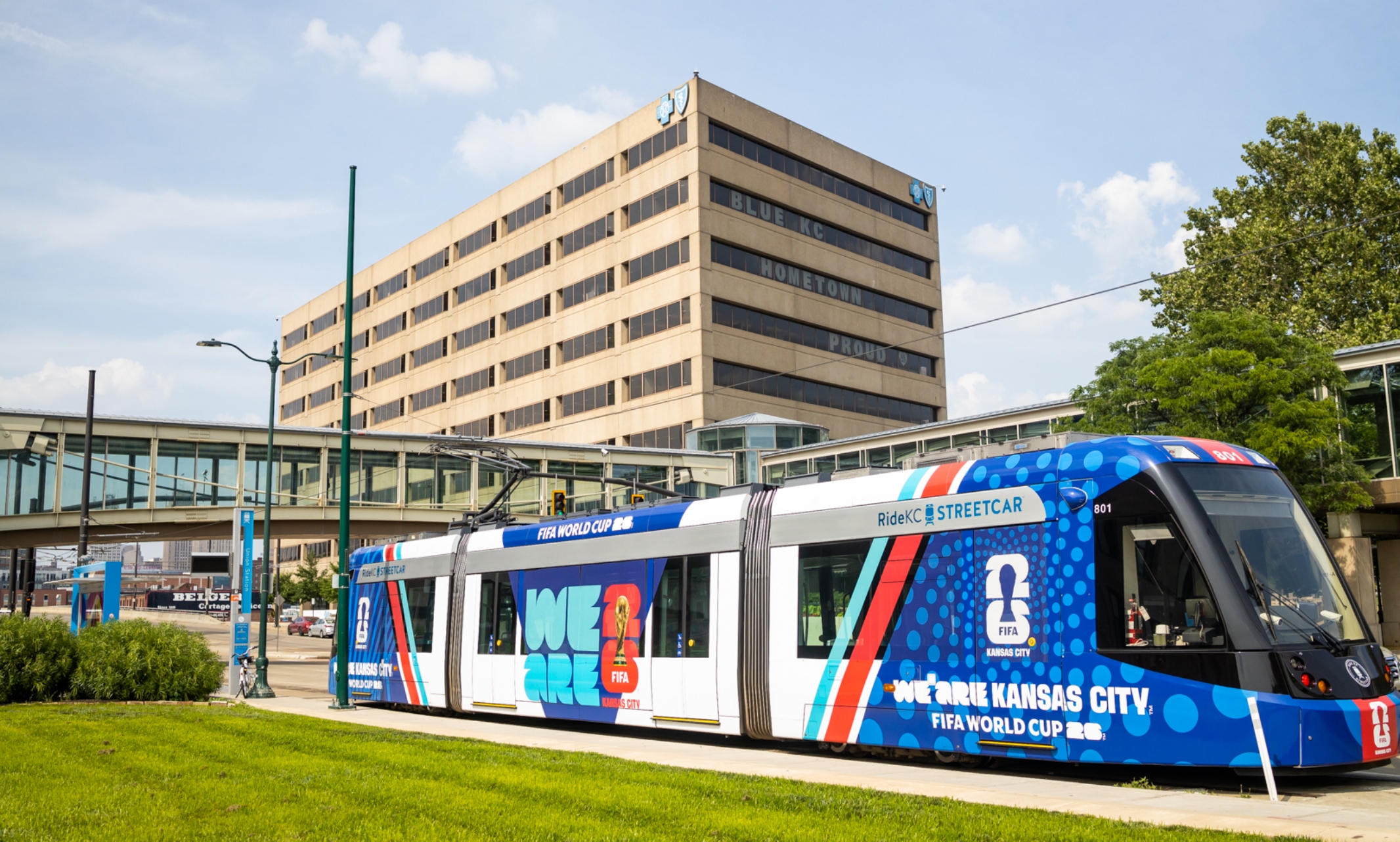
UMKC location paved the way for students to make a professional difference in the community.
Iain Blair (B.S.Ci.E. '23) got to give back to the city he calls home by applying science to the real world to make a positive difference.
“I chose to study at UMKC because I live in Kansas City and Kansas City's my home,” Blair said.
Blair chose to focus on two distinct fields, majoring in civil engineering and minoring in environmental sustainability. The pairing provided him the opportunity to learn the interesting crossroads of designing systems to account for the climate crisis.
“Engineers are the ones that create the systems that our society is built on," he said. "By adding environmental sustainability, it adds this extra nuance of how we design our systems intelligently to accommodate for a growing population.”
Blair is now a transportation planner at HDR, which he describes as a dual role where he’s part engineer and part transportation and community planner.
“Going to school in a university inside of the city, there's just so much more opportunity and employment available than a college town,” Blair said.
Bill Yord, who is an adjunct professor at the School of Science and Engineering and a senior project manager at the Kansas City Area Transportation Authority, said that as the utility manager for the KC Streetcar south line extension, he was able to loop UMKC students into being part of the project.
“The students provided a voice for UMKC with the streetcar extension,” Yord said.
The ability for students to be involved in a significant city project such as the streetcar extension had its benefits, especially when it comes to preparing students for real-world experiences.
“Engineering is a team sport," Yord said. "It’s designing the project but it’s also who you are designing the project for and the larger community and so the students got a real-world experience of what engineering really is.”
There’s also benefits to studying engineering specifically in Kansas City.“We have a lot of engineering power in Kansas City, and students have the benefit for that community for jobs, guidance and opportunities,” Yord said.
As a result of these experiences, students are able to learn important skills crucial to their careers outside the classroom.
“With our senior design project, we worked with KCATA, and the great thing about it was that we got to work with our client and interact with them directly, which provided a lot of really great real-world experience as opposed to just theoretical classroom experience,” Blair said.
“I really am proud to be a Roo," Blair said. "I'm proud to graduate from Kansas City and I'm really proud to know that I'm making a difference in the city that I live in and love so much.”
Nov 07, 2023
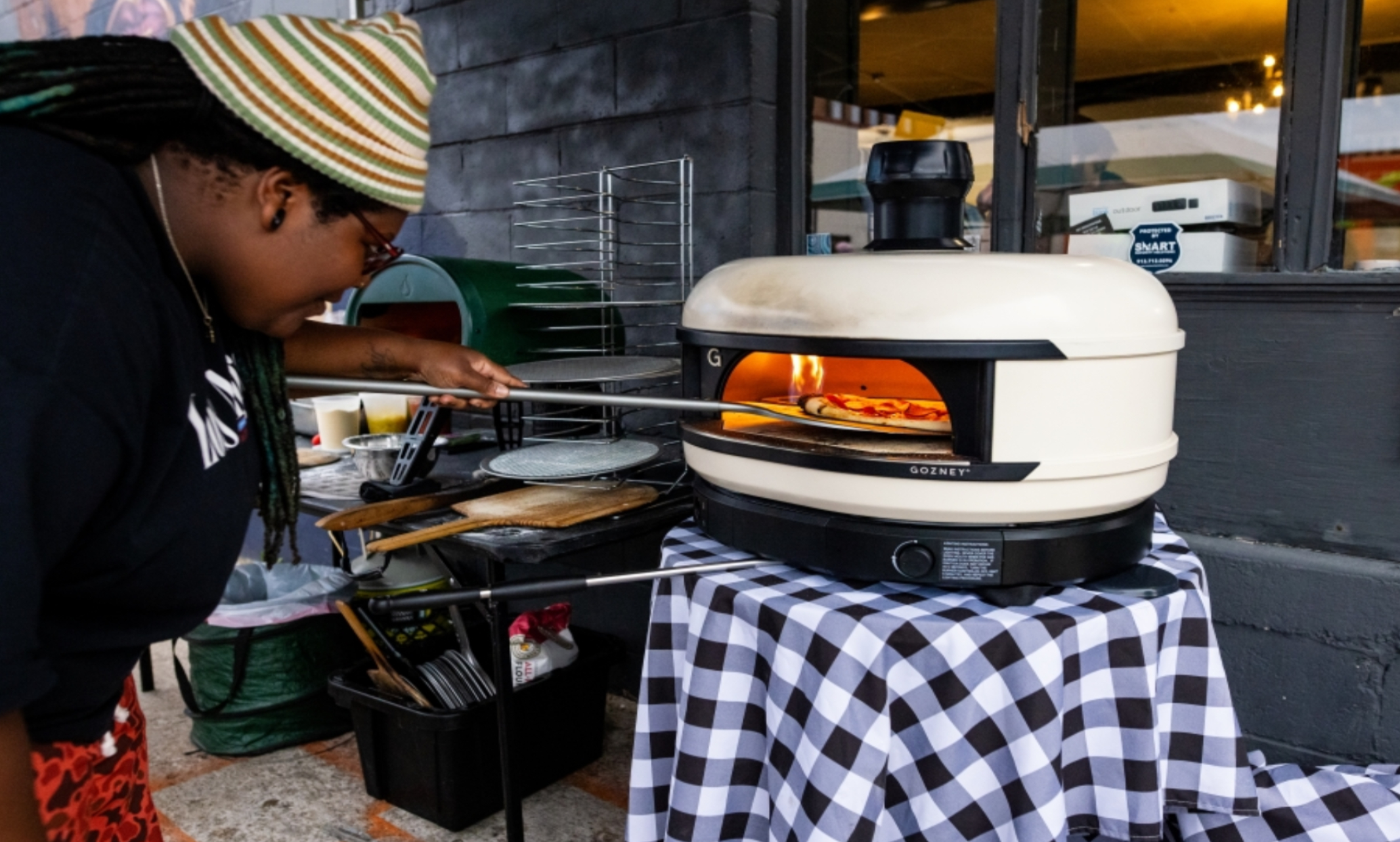
UMKC alum's senior project kicked off the pop-up pizzeria concept
When Jhy Coutler (B.A. '17) turned in her design senior project in 2017, there was no way of knowing the concept would be brought to life just four years later. What initially started as slinging pizzas in her backyard has turned into a pop-up pizzeria that can be spotted at various Kansas City businesses, including the recent Roos Mobb event at MADE MOBB.
We talked to Coutler about Devoured’s journey, from winning a Hulu cooking show competition to her new brick-and-mortar concept.
What did you study at UMKC and how has that helped you with creating Devoured Pizza?
I studied studio art with an emphasis in graphic design . For our senior project, we were asked to create our own magazine. I decided to create a foodie magazine concept and named it Devoured. Once I graduated, I decided to start an Instagram account with the concept, Devoured Magazine, to bring the concept to life. I cooked different foods and shared it on the account to highlight what I was making.
In 2019, I won a pizza oven and that helped me to decide to dive into the pop-up the business with Devoured Pizza. It also helped that I had the experience, as I used to work at a local pizzeria in town during my time at UMKC.
It is funny how my senior project helped kickstart the whole concept of Devoured. It was like a blessing in disguise. My experiences at UMKC also helped me feel confident enough to continue my journey in design. Right now, I still do all the marketing and design for Devoured.
You were recently on Hulu’s “Best in Dough” pizza making competition show (Episode 5: “Pop Goes the Pizza”). What was that experience like?
It was incredible. Honestly, I am still in shock that it happened and that I actually won both rounds. It was my first time being on TV like that, so it was slightly nerve wracking. I grew up watching Food Network and Chopped as a kid, but the experience made me realize how intense it was. For the first round, we only had 20 minutes to make a pizza! But, I had so much fun, and I would love to be on another show. It was just a thrilling experience overall.
Tell us more about your new brick-and-mortar called Orange By: Devoured.
I like to think of Devoured as a concept umbrella and Orange By: Devoured as a micro-concept under it. It is a small shop that feels like a community hub. I chose Orange as it’s a vibrant and positive color and I want people to feel that way when they visit. I also like that it is not a typical pizza shop name, as we plan to serve tapas and other small plates. I’m excited for people to come in and try new things.
Orange By: Devoured will be located at Martini Corner and will be slinging pizzas from Aug 15.
Nov 07, 2023
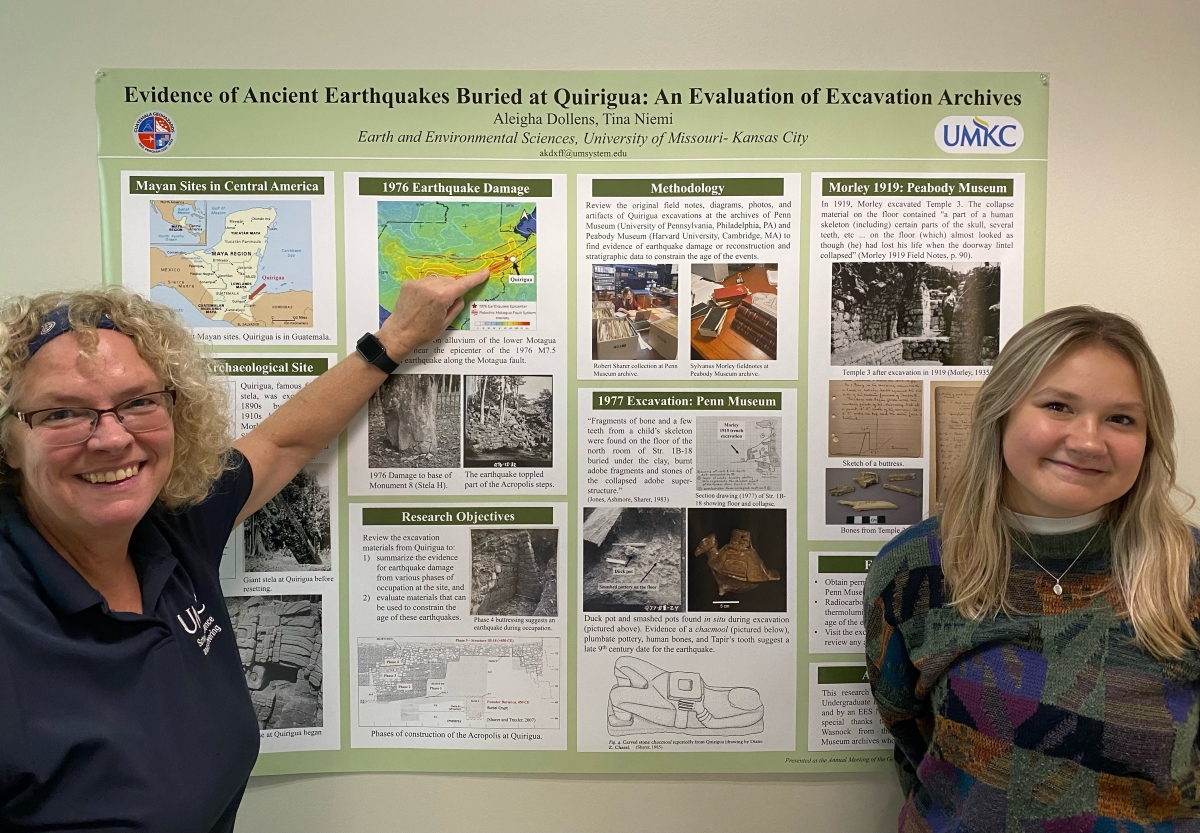
Undergraduate research funding provided opportunity to conduct archival research on Mayan archeological site
Earth and environmental science student Aleigha Dollens recently won the 2023 Richard Hay Award from the Geoarchaeology Division of the Geological Society of America (GSA) for her research on evidence of earthquakes at the Mayan archaeological site of Quirigua in Guatemala. The award supports travel to the GSA annual meeting and recognizes meritorious student research.
This was especially good news to Dollens’ mentor, Tina Niemi, Ph.D., as the Curators’ Distinguished Teaching Professor was the first recipient of this award 34 years ago.
Niemi has taught geology at UMKC since 1995 and has personally mentored more than 60 undergraduate research projects with student funding from SEARCH, SUROP and NSF-funded research experience grants.
“For my MS research, I reconstructed the paleoenvironmental history of a submerged classical archaeological site along the central coast of Greece,” Niemi said. “It was the presentation of that research at the annual meeting of the GSA in 1989 that won me the first-granted Richard Hay award. I am very proud of Aleigha and her achievements and thrilled that she has followed in my footsteps with this well-deserved award. The dedication of UMKC and its leaders to support undergraduate research is phenomenal.”
Dollens and Niemi visited the University of Pennsylvania and Harvard University this past summer to search museum archives for excavation documents and artifacts that can help constrain the date of the earthquake that occurred during the final occupation of the Quirigua site.
“Winning the Richard Hay Award from the Geoarchaeology Division of the Geological Society of America is an honor like no other, especially since Dr. Tina Niemi was the first-ever recipient,” Dollens said. “She is one of my greatest supporters and pushes me to be a better geoscientist and a better person. It is an honor to get to work with such a strong woman in the geosciences field and I would not be where I am today if it weren’t for her ongoing support.”
The research was funded by the UMKC Undergraduate Research Program through SUROP and SEARCH awards and by the Earth and Environmental Science Newcomb Research Grant.
Nov 01, 2023
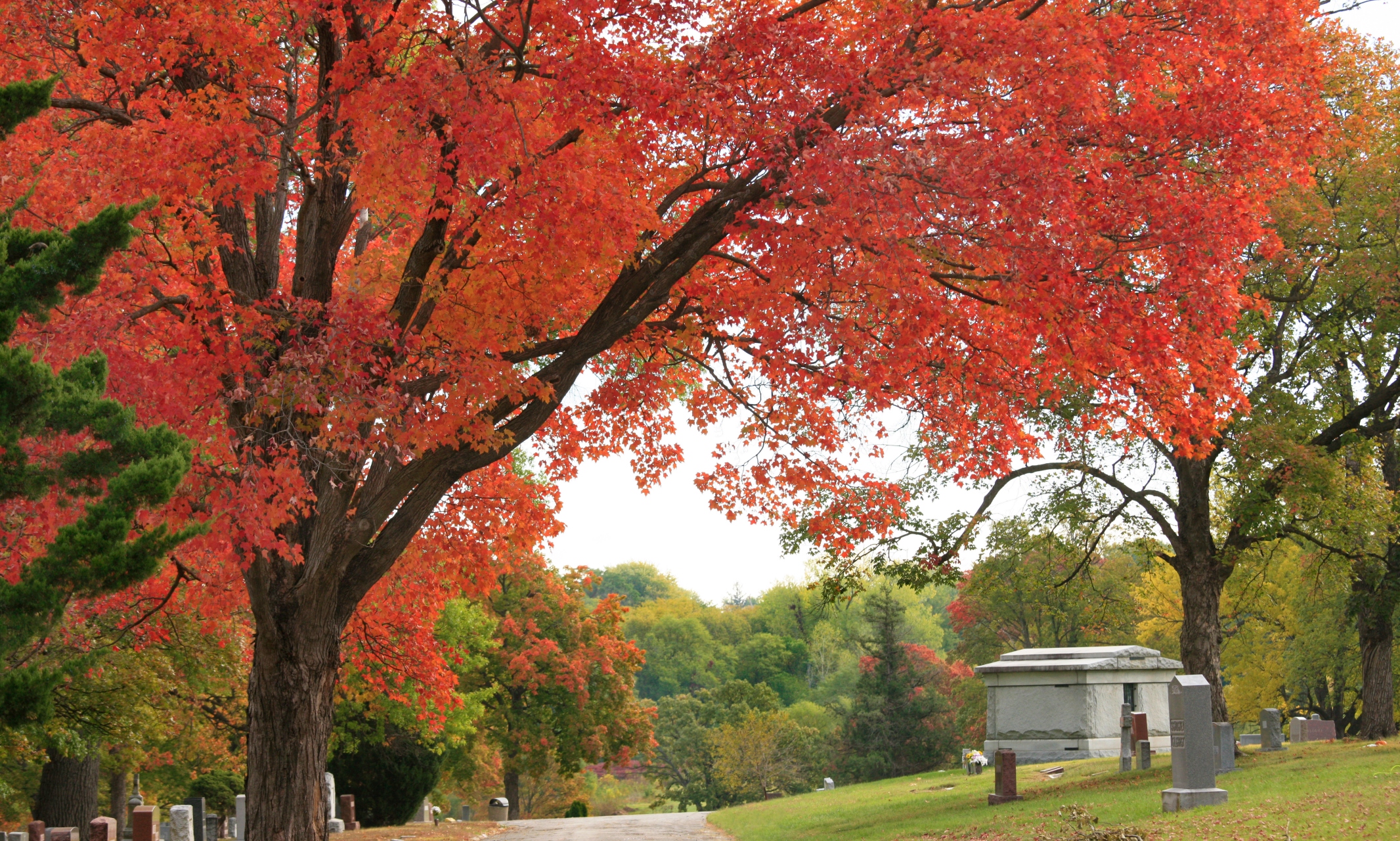
Tina Lasater discovered UMKC history at Forest Hill Calvary Cemetery
While starting work at Forest Hill Calvary Cemetery one morning a few years ago, Tina Lasater (B.L.A. ’03) made a discovery.
Behind a desk, she spied a thick sheaf of parchment papers stuffed into a leather binder. Her find turned out to be a collection of designs and plans created by the cemetery’s architect more than 125 years earlier.
“I was so intrigued,” said Lasater, a client counselor at the cemetery. “When I showed it to my manager, she took me to an area where even more documents were stored.”
Since finding this treasure, Lasater has delved into the cemetery history and the UMKC stories associated with it. Just three miles from the Volker Campus, Forest Hill Calvary Cemetery at 69th Street and Troost Avenue, shares more than a geographical proximity with the university. Many founders and benefactors who established the university and forged its future have their final resting place at the cemetery, established in 1888.
Its 160 acres of rolling hills include unique monuments, grave markers and tributes to those buried and interred there. In addition to being a resting place for those who contributed so much to UMKC and beyond, the cemetery is also a tribute to the present. More than a hundred species of trees from around the world line its winding roads and beautify its graceful landscape.
George Kessler, who served as the landscape architect when the cemetery was created, is recognized for designing the city’s renowned boulevards and parks. Sid Hare, who served as the first superintendent of the cemetery, oversaw the original plantings. Hare challenged the idea of how burial grounds should look and saw the potential for them to be not just a resting place for those who have passed, but a botanical garden for the living.
“When I first saw Forest Hill about 15 years ago, I thought it was so beautiful," Lasater said. "As a UMKC graduate, I love the history of our school and alumni here."
Following are some of those who have made extraordinary contributions to the past, present and future of UMKC.
L.P. Cookingham
From 1940-1959, Cookingham was city manager of Kansas City, Missouri. In 1979, UMKC conferred upon him the honorary degree of Doctor of Humane Letters and later named the L.P. Cookingham Institute of Urban Affairs at the Henry W. Bloch School of Management after him.
Oliver Hayes “O. H.” Dean
A lawyer and judge, Dean was also a founder of the Kansas City School of Law in 1895. He served as the school’s vice president from 1895-1902 and president for the next 25 years. He added the post-graduate program and oversaw construction of the law school in 1926, to which he donated his personal law library.
Tatiana Dokoudovska
A world-renowned ballerina, Dokoudovska joined the Conservatory of Music in 1954 as head of the ballet department, a position she held until her retirement in 1989. She initiated UMKC’s bachelor’s degree in dance at a time when few such programs were available in the United States. A choreographer and artistic director, she founded the Kansas City Civic Ballet, which later became the Kansas City Ballet.
An outgrowth of the Conservatory of Music’s recital program, she developed the Ballet from its humble beginnings to a nationally recognized company.
Uriah Spray “U.S.” Epperson
Banker, industrialist and philanthropist, Epperson hired eccentric French architect Horace LaPierre to design a monumental mansion at 52nd and Cherry streets for himself and his wife, Mary Elizabeth Weaver Epperson. Construction on the house began in 1919 and was completed in 1923 at a cost of nearly $500,000. The four-story Tudor-Gothic structure contained 54 rooms, including six bathrooms, elevators, a swimming pool, billiard room, barbershop and a custom organ. After the death of Mary Epperson, the home was donated to what is now UMKC.
Since that time, the house has been rumored to be haunted by Harriet Barse, an organ instructor at the Conservatory who lived with the Eppersons. Reports of the haunting include the appearance of Barse’s ghost and organ music coming from the mansion’s basement.
Lena Haag
Born in 1864, Haag left home in 1879 to attend the Moravian Seminary for Young Ladies in Pennsylvania. An exceptional pianist, her interest in art and music developed at the school. After graduation, she returned to Kansas City and continued her studies in art. In 1936, she made an anonymous donation of $225,000 to the university. This donation, kept anonymous until her death in 1951, provided funding for the construction of Haag Hall, endowment and student loan funds and the fine arts program.
Herbert F. and Linda Hall
Herbert and Linda Hall lived in a 1913 mansion at 51st and Cherry streets. Upon her death in 1938, Linda Hall established an endowment for a free, specialized library. Her husband left additional millions of dollars for the library, which he instructed be named for his wife. In 1946, the Linda Hall Library opened in the couple’s mansion. In 1964, the library relocated to a new structure next to the Hall’s home. Independently funded and operated, Linda Hall Library provides resources to researchers around the world.
Charles Francis Horner
In response to area demand for musical education, Horner founded the Horner Institute of Fine Arts in 1914, which he headed until 1934, eight years after it became the Kansas City Conservatory of Music.
Ernest Newcomb
Founder of the University of Kansas City, Newcomb wrote the school's charter, hired faculty, outlined the courses and opened the university. While establishing the school, Newcomb collaborated with businessman and philanthropist, William Volker, who donated the land for the campus. Newcomb left the school in 1938 but was publicly acknowledged as the father of the university in 1977.
Elmer F. Pierson
Founder of Vendo, a vending machine manufacturer, Pierson donated $250,000 for Pierson Auditorium and established the John B. Gage Lecture and Fellowship Fund.
Kenneth Aldred and Helen E. Foresman Spencer
Kenneth Spencer was a third-generation coal mine owner and one of the original founders of MRIGlobal. Generous philanthropists, he and his wife, Helen Spencer, provided the financial gift for the Spencer Theatre, the original home of the Missouri Repertory Theatre.
Edward F. Swinney
A Kansas City School Board member and president of the American Bankers Association and the First National Bank of Kansas City, Swinney established the Edward F. Swinney Trust, and the Swinney Recreation Center bears his name.
William Volker
Businessman and philanthropist, Volker’s generosity left an enduring impact across UMKC and the Kansas City community. He donated 40 acres and a house to launch the University of Kansas City (now UMKC) and contributed more than $2.5 million for its campus and structures. The Volker Campus is named after him. Known as “Mr. Anonymous of Bell Street,” Volker also quietly provided assistance for those in need across the city, along with millions of dollars in gifts to philanthropic organizations and projects.
Hazel Browne Williams
The first African American full-time professor at UMKC, Williams became an associate professor at the School of Education in 1958 and was a full professor in secondary education in 1960. She retired in 1976, after serving on the faculty for 18 years, and was granted emeritus status — the first Back person to receive this honor from UMKC.
Oct 31, 2023
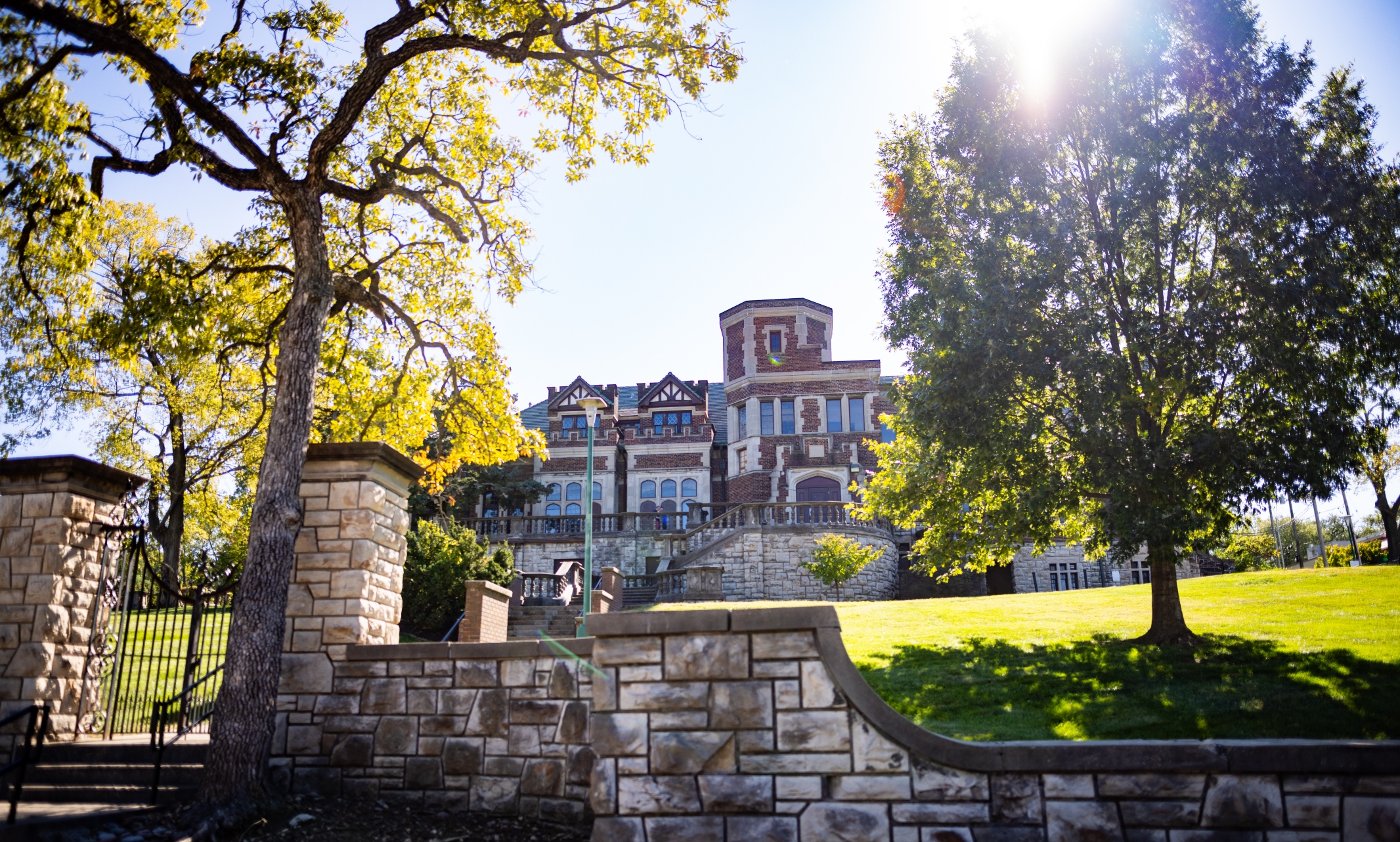
The historic building is said to have a haunted past
For decades, UMKC faculty, students, staff, even police officers, have shared history and folklore of the mysterious Epperson House
In November 2023, the university issued a request for proposal for a potential public-private partnership to restore and repurpose the home.
While its haunted past is a topic for debate, one thing is for sure, it’s a storied tribute to Kansas City’s history, but few have had a look inside its walls. Below are details of the home’s origin and owners, campus legend and a rare look inside one of the most captivating buildings on campus.
Built in 1920, Epperson House was the home of Kansas City insurance tycoon Uriah Epperson and his wife, Mary. The 54-room mansion cost $500,000 and was a blend of a castle and Tudor-style home.
The Eppersons were patrons of music and the arts. Among the charities they supported was the Kansas City Conservatory, now-known as the UMKC Conservatory. Their grand home included a Great Hall, where they would host friends and included a stage, where they would arrange for performances.
Above the Great Hall, sits a custom organ loft. Though childless, the Eppersons befriended Harriet Barse, an organ instructor from the Conservatory whom they regarded as their adopted daughter. Barse even moved into Epperson home. She commissioned the organ and intended to entertain guests, but she fell ill and died before the organ was installed. While she never played the organ during her lifetime, it is the topic of strange encounters reported in the home, with reports of organ music coming from the basement.
Following the death of Uriah and Mary Epperson, the home was donated to the university. Its first use was as a dormitory for Navy air cadets during WWII. The cadets reported seeing a ghostly woman in a white gown walking the halls of the home.
Throughout the decades following the war, the home was used as a residence hall and in the 70s, a practice space for the UMKC Conservatory. It was during this time that stories of strange phenomena inside Epperson House increased.
Students reported hearing footsteps in empty parts of the home. And the light at the top of the home’s tower would turn on by itself even though the tower had been sealed off decades before.
A custodian had a close call when a chandelier came loose in the living room, narrowly missing the staffer. And a police officer reported being at Epperson House when his patrol car was hit. He got out to find skid marks, but not another car in sight.
These days, there is no access to Epperson House and the building is in need of repair. However, the university is hopeful about potential for Epperson House’s reuse.
Oct 31, 2023
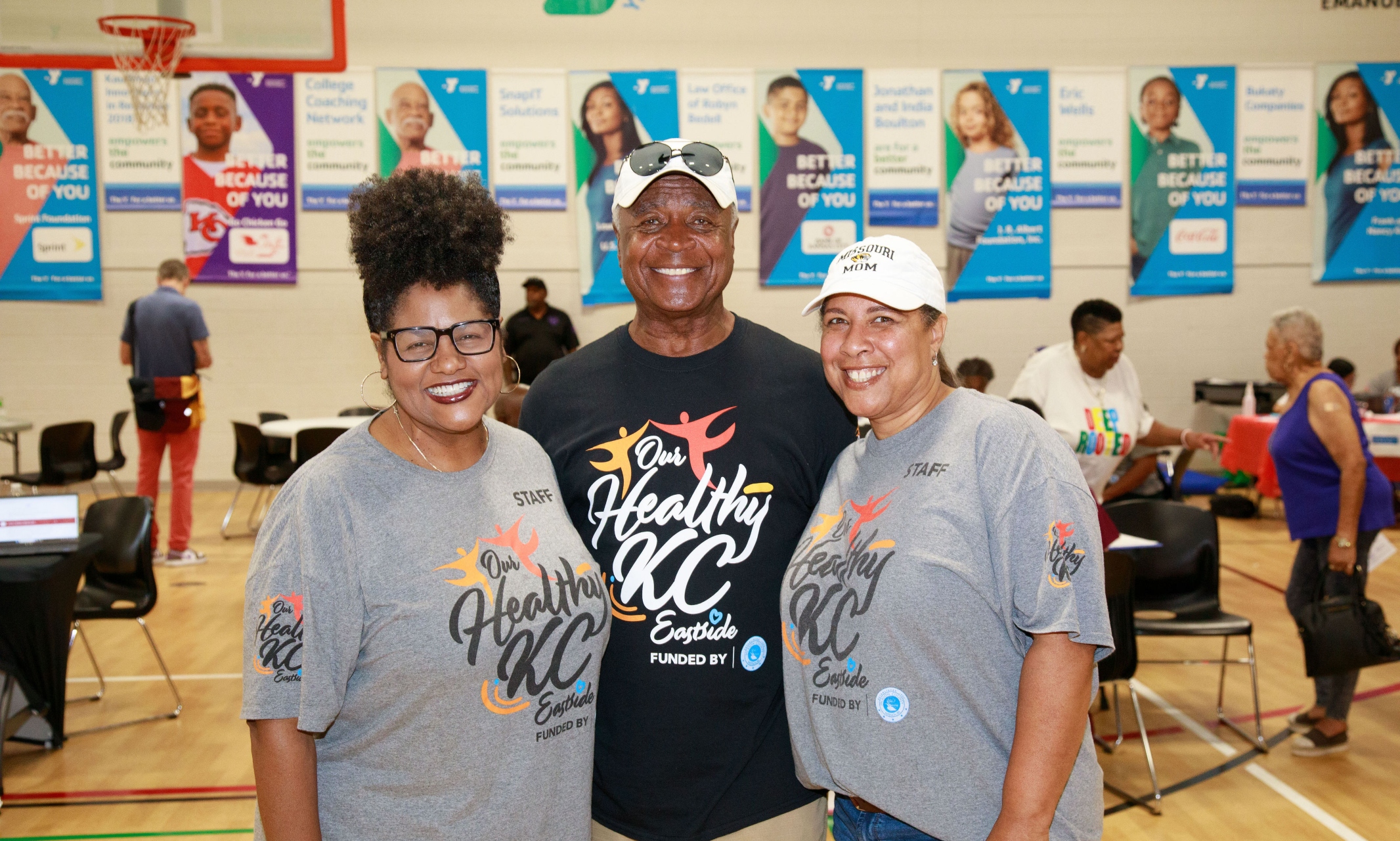
Association of American Medical Colleges recognizes service to Kansas City area
The University of Missouri-Kansas City School of Medicine has received the prestigious Spencer Foreman Award for Outstanding Community Engagement from the Association of American Medical Colleges.
The award highlights the university’s longstanding commitment to supporting the Kansas City area and its underserved populations. According to the AAMC, UMKC has displayed unwavering dedication to reaching community members through nontraditional avenues of health care with low- and no-cost clinics, community events, education opportunities and more.
The School of Medicine is the only recipient of this award in 2023, further cementing its reputation of inclusion and community success. To School of Medicine Dean Mary Anne Jackson, M.D., this award is a checkpoint, rather than a finish line.
“We are honored to receive this award, not only for the recognition of our hardworking students, staff and faculty, but for the visibility this brings to schools of medicine, like ours, that seek to better the community,” Jackson said. “Being a medical professional and working with wonderful collaborators at the School of Medicine and our affiliates is choosing every day to deliver the highest level of care to all people, regardless of who they are or where they come from. Connecting with the community through our many outreach efforts is teaching our students that optimizing care for all can occur in real time, and I can’t wait to see what more we can accomplish together.”
More than 60 key community partnerships help make university outreach successful. Strong bonds among UMKC and businesses, faith groups, neighborhood organizations, youth groups and local leaders have all played a key role in identifying areas of need and how UMKC can best serve.
One of the champions of community engagement, Jannette Berkley-Patton, Ph.D., director of the UMKC Health Equity Institute, has been spearheading these efforts throughout her career at the university.
“We’ve received this honor because of our stellar community partners, staff and students who are committed to improving the health of Kansas Citians,” Berkley-Patton said. “We are being recognized on a national level because of their desire to make the world a better place, and I am honored to have a part in this community engagement journey. Thank you to everyone involved who has made this work possible.”
Jackson County Executive Frank White Jr. has played a key role in Our Healthy Jackson County’s success.
“This award is a special opportunity for our community to recognize all the hard work that UMKC and their community partners, staff and students do to bring health care to Jackson County," White said. "Seeing the community become healthier together is proof that the Our Healthy Jackson County program needs and deserves the county’s investment now and in the future. With the support of UMKC, we are truly making a difference in our residents’ lives and it’s rewarding to know that our work is being recognized on a national level for others to follow."
In an online award presentation Oct. 25, the AAMC noted that the impact of the university is “Evident in its outcomes,” citing the success of Our Health Jackcon County and the university’s partnership with KC Faith Community Action Board.
Jackson and Berkley-Patton will accept the award Nov. 5 at an AAMC conference in Seattle.
AAMC presenters said: “Community engagement at UMKC has a profound impact on learners, helping them to become more compassionate practitioners. When sharing his experience with the Community Health Research Group and the Health Equity Institute, led by Dr. Jannette Berkley-Patton, fourth-year medical student Alex Geyer notes, ‘engaging with the community face-to-face, outside of the clinical setting, will help me be a physician worthy of my patients’ trust and serve as a role model for future budding physicians.”
Oct 30, 2023
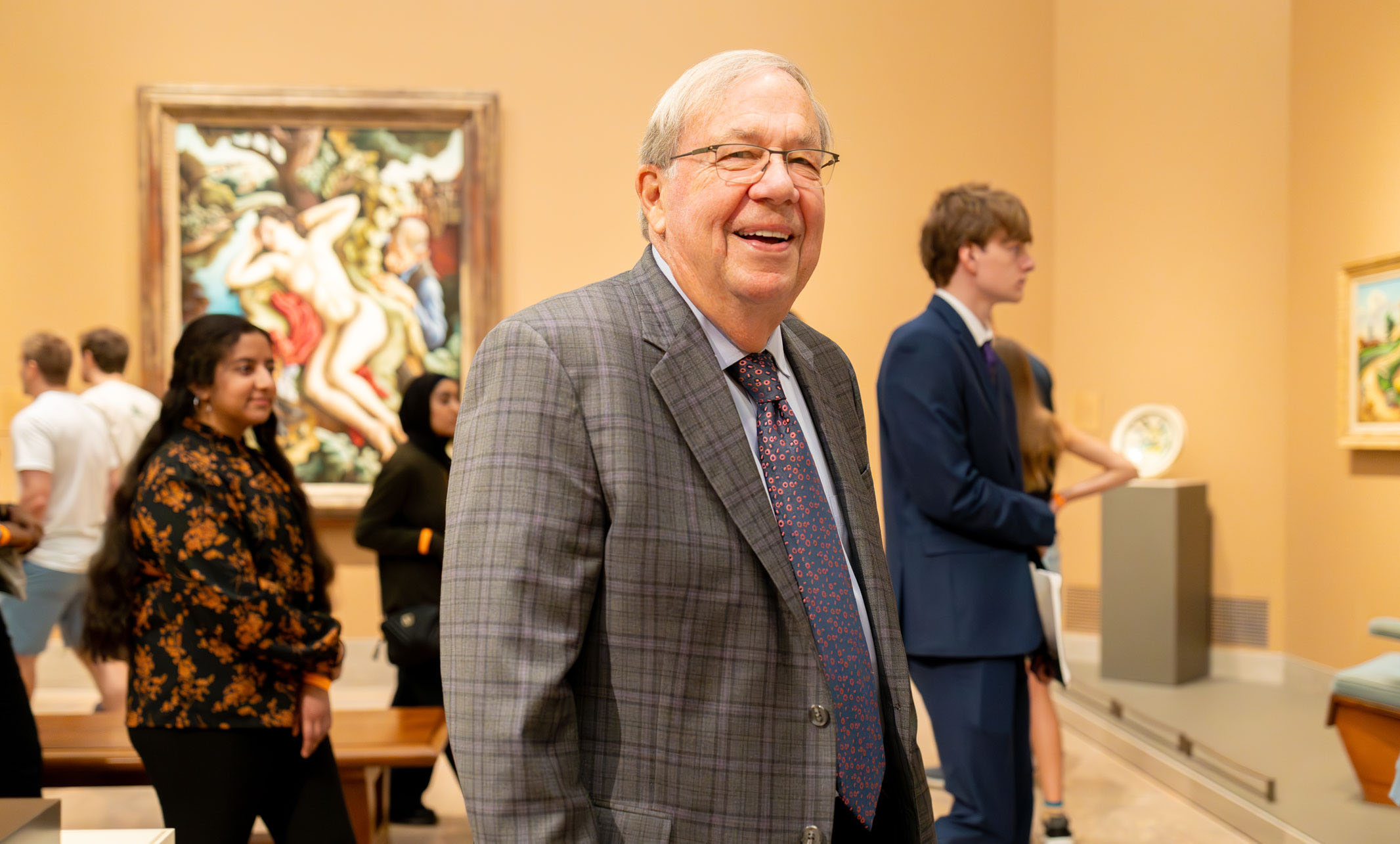
UMKC faculty member and alumnus helps medical students connect art and medicine
William Ritter, M.D., (M.A. ’18), looks at a painting or a sculpture of the human body by Michelangelo or Leonardo Da Vinci and sees more than a famous work of art. He sees a history of medicine. Every year, he shares his insights with students at the UMKC School of Medicine, describing the intersection of art and medicine and how one has spurred the other throughout the centuries.
“There’s a lot of commonality between art and medicine,” Ritter said. “Just go to Michelangelo and Leonardo -- they were the first anatomists. You go back and look at a lot of their paintings, it’s all anatomy. They were the first ones to dissect the human body, so the Renaissance is really the birth of anatomy, the birth of everything: art, the liberal arts. Art history is really the crux of early medical studies, medical thinking, dissections, and it keeps going on and on.”
This Fall, Ritter, who also holds a master’s degree in art history from UMKC, begins his sixth year in the School of Medicine’s Sirridge Office of Medical Humanities and Bioethics as course director of an elective in medicine and the visual arts. He also teaches the class in the Spring, and serves as a docent for first- and second-year medical students.
“We try to make it interesting,” Ritter said. “We give them a little medicine and how it ties to art history. I give them a lot of art history, actually, because I like doing it, and it’s a nice variation. It’s a way to do both art and medicine and get away from just medicine.”
School of Medicine Dean Mary Anne Jackson, M.D., said Ritter’s work is an ideal example of what Marjorie and Bill Sirridge, two of the school’s founding docents, envisioned when they endowed the office in 1992 to expand humanities course offerings for both premedical students and students in UMKC’s six-year B.A./M.D. program.
“I am so grateful for Dr. Bill Ritter, whose work at our School of Medicine embodies the vision of the Drs. Sirridge,” Jackson said. “Early clinical experience in medicine is foundational to our school, and as a Year 1 and 2 docent, Dr. Ritter teaches our students the fundamentals of medicine, but also allows them to experience the human side of medicine through the arts.”
Ritter realized his interest in art and art history while he was in school. But studying to become a doctor took precedence, and college electives in art history gave way to courses leading to a degree in chemistry, followed by medical school. Ritter graduated from Philadelphia’s Sidney Kimmel Medical College, Thomas Jefferson University in 1971. He trained in internal medicine at Emory University, followed by a cardiology fellowship at the University of Texas Southwestern.
“There wasn’t much art when I was in medical school for sure,” Ritter said.
But his passion for art never waned, even after he became entrenched in a career as a cardiologist. One night before dinner with friends, a member of the group, who also happened to be a guide at Kansas City’s Nelson-Atkins Museum of Art, took everyone on a tour of the museum. Ritter was immediately intrigued.
“My eyes really lit up,” he said. “I said, ‘I’d like to show off Monet, stand there with a Monet and tell everybody about it and what I know about it.’ I thought that was really cool. So I ended up joining the Nelson as a museum guide (in 2008).”
For nearly 10 years, Ritter walked the hallways of the Nelson-Atkins and the Kemper Museum of Contemporary Art on weekends and evenings as a guide and docent, sharing his love and knowledge of the fine arts with the museums’ visitors.
Several years ago, Ritter and his practice partner sold their cardiology practice after 30 years. With some free time, he decided to dive deeper into his art interest. Ritter went to the UMKC Fine Arts building, where he met art history professor Burton Dunbar, who would become a close friend and mentor. Over the next 2 1/2 years, Ritter studied art history, earning his master’s degree in 2018.
He began at the School of Medicine five years ago developing the arts and medicine course and serving as a docent, a role that allows him to introduce medical students to their earliest patient encounters.
“I’d never done much teaching before — a little bit clinically — but nothing formal,” Ritter said. “It turned out, I think maybe it was my calling. Maybe I should have been doing this sooner.”
His passion for teaching, just like his love for art history, blossomed, and two years ago medical students honored Ritter with the Outstanding Years 1 and 2 Docent Award, given annually by students to one instructor for his or her pursuit of teaching excellence in medicine.
“I think I have a natural interest in teaching students,” Ritter said. “That’s what helps in getting along with students and being successful. You’ve got to be one of them.”
Oct 23, 2023
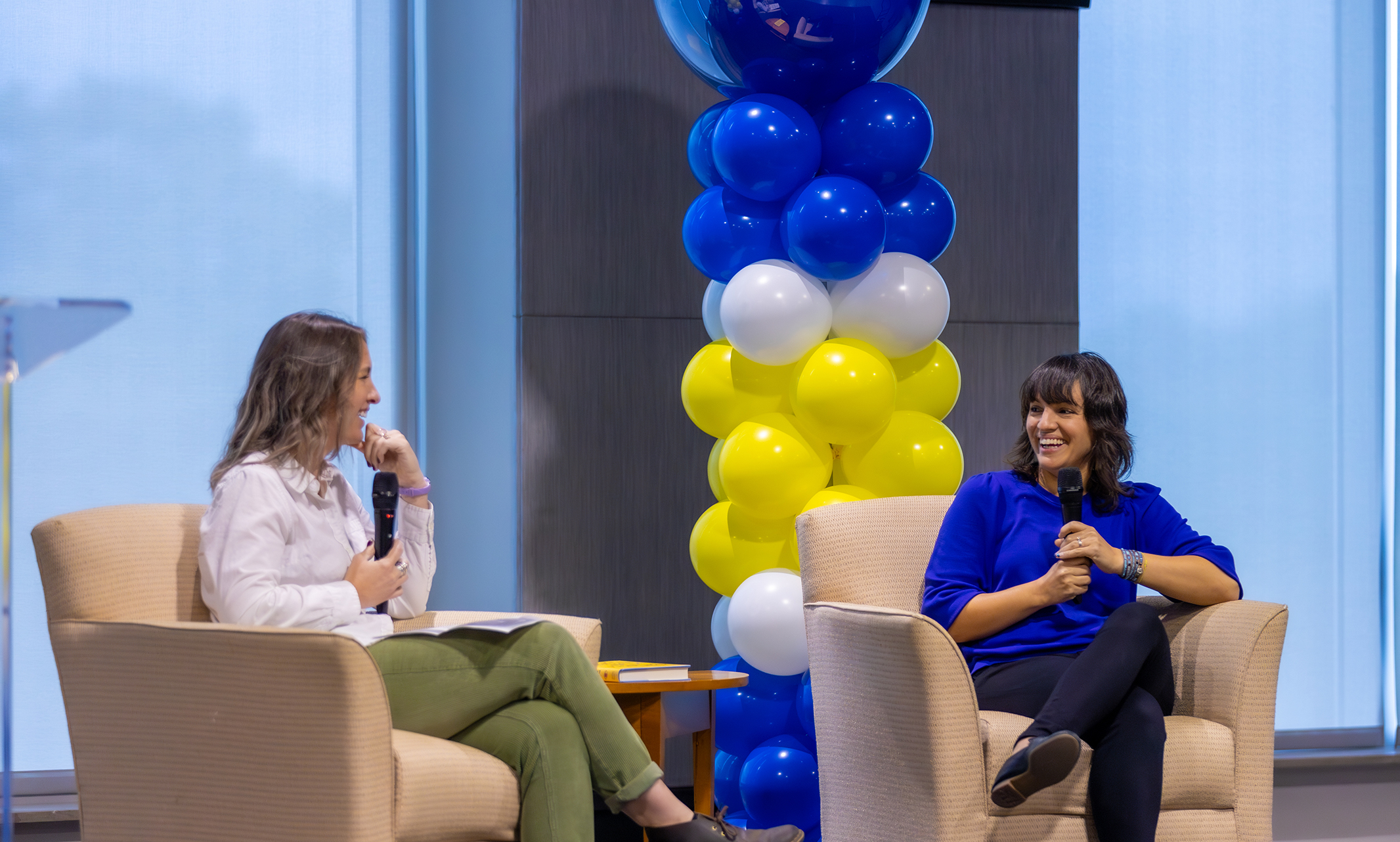
Roos Read selection writer visited campus to speak with UMKC community
Mónica Guzmán, author of this semester’s Roos Read selection, "I Never Thought Of It That Way: How to Have Fearlessly Curious Conversations in Dangerously Divided Times,” visited the UMKC Volker campus for an author talk this month.
Guzmán’s book offers insights and tools to connect with people whose views differ, a little or widely, from yours. Guzmán’s book aims to shed light on blind spots and bring people back together.
“Mónica is a journalist and storyteller who isn’t afraid to ask hard questions or to answer them,” said UMKC Chancellor Mauli Agrawal. “Her life experiences, both personal and professional, drove her to explore why our communities feel so divided. What she found is that one of our most powerful tools in breaking down barriers is our own curiosity. When we ask questions and lean on our natural curiosity, we can understand each other and even learn from each other.”
During the author talk, Guzmán answered questions from moderator Jessica Gantt-Shafer, Ph.D., assistant professor of communication at the UMKC School of Humanities and Social Sciences, as well as questions from the attendees. Here are five bits of wisdom she shared over the course of the talk.
“I was someone who wanted to get it right all the time. I was careful and cautious, but I also found people fascinating. At my internship right out of school, I was so scared to pick up the phone. My shyness went up against my need to know these people, and it lost.”
“Belonging is the most important call there is. Being understood and giving people understanding creates community.”
“Feel like you aren’t connecting? One thing you can try is a pivot: ‘I see it differently. Can I tell you how I see it?’ People will hear more when they are heard.”
“Need to challenge your thoughts? Try to figure out who you’re talking about but never with. If your views feel condensed and simple, look for the complexity.”
“How do you disagree with someone who thinks you shouldn’t exist? ‘Am I allowed to exist in a world you think is good?’ That gives them a lot of power. Who are they to say who exists? Maybe the most powerful way to argue against people who think you shouldn’t exist is to keep on existing. Existence is power.”
This is the inaugural year for Roos Read. The campuswide initiative was launched by the Office of the Chancellor and facilitated by the Division of Diversity and Inclusion. Its goal is to encourage UMKC students, staff, faculty and community members to read a recommended title that showcases a distinctive voice, perspective or theme and engage in discussions intended to generate action toward change.
Oct 23, 2023
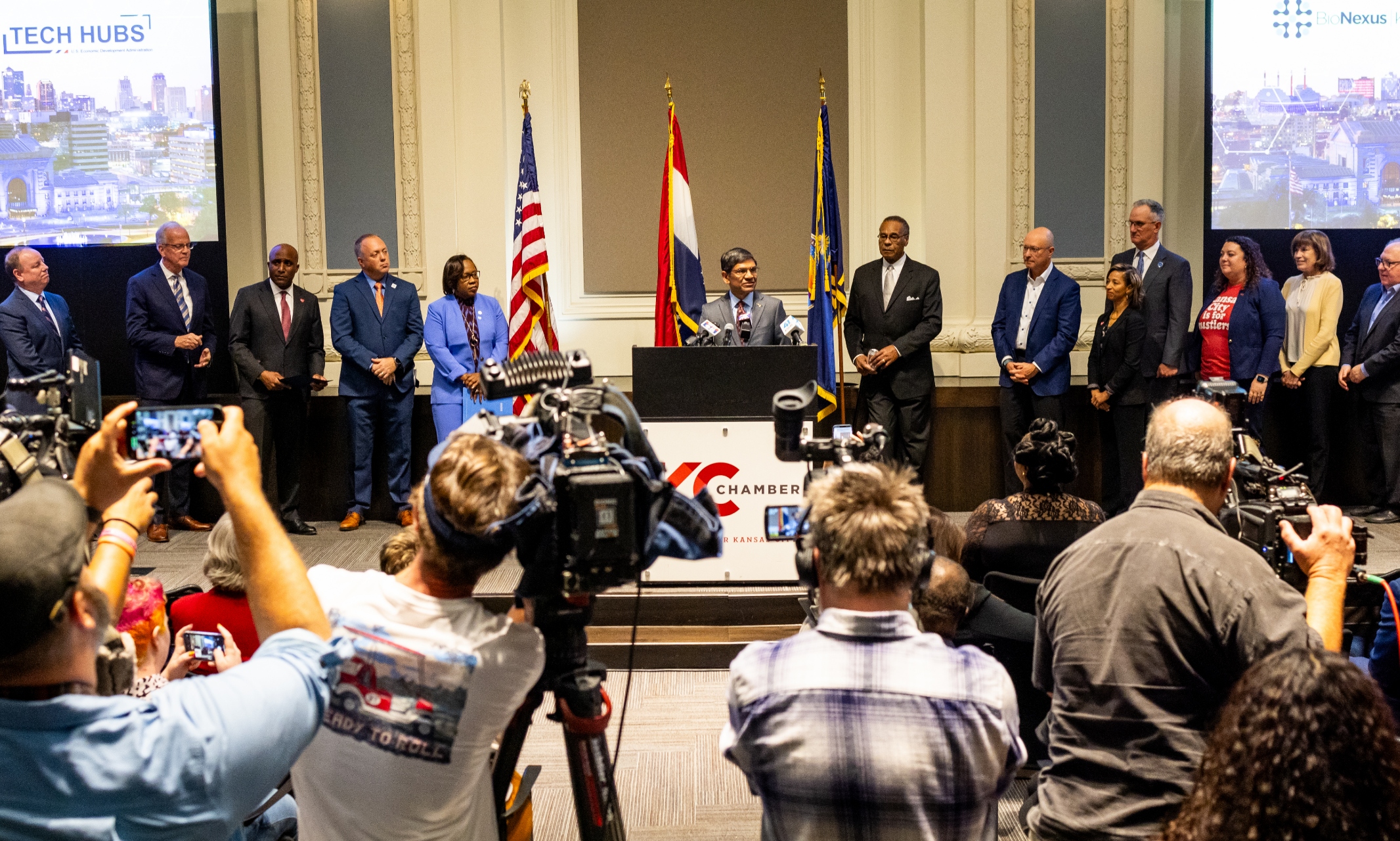
UMKC played significant role in U.S. Economic Development Administration designation
The U.S. Economic Development Administration has named the KC region and Missouri “Tech Hubs” as part of a historic investment to strengthen the U.S. economy and national security - and the University of Missouri-Kansas City played a significant role in this recognition.
UMKC Chancellor Mauli Agrawal, along with national and other local leaders, spoke at an announcement event at the Greater Kansas City of Commerce boardroom at Union Station.
"The new Tech Hubs designation provides great scope for innovation in Kansas City – and I can envision all the groundbreaking advancements to come as our UMKC students, faculty and staff work in collaboration with the many fantastic organizations in the greater Kansas City area," Agrawal said. "We at UMKC could not be more excited."
Maria Meyers, executive director of the UMKC Innovation Center, speaks with UMKC Chancellor Mauli Agrawal and Anthony Caruso, associate vice chancellor for research at UMKC.
The regional proposal, Kansas City Inclusive Biologics and Biomanufacturing Tech Hub (KC BioHub), led by BioNexus KC, of which the university is a member, UMKC and more than 60 partner organizations, will ramp up life-saving vaccine production and other preventative technologies to leverage regional assets and the existing ecosystem to become a global leader in biomanufacturing and life sciences. KC BioHub can now apply for phase 2 funding of up to $75 million.
"The Tech Hubs designation is not just a title; it's a reflection of the dedication and hard work of the entire Kansas City community," said Maria Meyers, executive director of the UMKC Innovation Center. "It highlights our shared commitment to innovation and our ability to harness our collective potential. The UMKC Innovation Center is excited to play a pivotal role in this journey, and we can't wait to witness the advancements that will emerge from this exciting collaboration."
Agrawal said the Tech Hubs designation and the opportunity that comes with it, is a natural next step for the community, and one UMKC has been preparing for.
In 2022, UMKC received a $12.97 million grant from the Kauffman Foundation to increase entrepreneurship programming and technology commercialization. This grant expanded existing programs and allowed for the creation of new ones, with the goal of reducing barriers to entrepreneurship and technology innovation and commercialization.
In 2023, UMKC unveiled the next steps in its planned expansion of the UMKC Health Sciences District with the Healthcare Delivery and Innovation Building, a physical space designed to fuel innovation. That $120 million building will house key assets for research, technology and engineering. One of these assets is the Data Science Analytics and Innovation Center, which is focused on creating new advances in data sciences to transform the way we personalize healthcare and contribute to new discoveries.
UMKC Chancellor Mauli Agrawal speaks about the Kansas City region - from Manhattan, Kansas to Columbia, Missouri - being designated a Tech Hub at an announcement event.
Across Missouri, UMKC also contributed to another Tech Hub. The Critical Minerals and Materials for Advanced Energy Tech Hub, led by the University of Missouri System, aims to position south-central Missouri as a global leader in critical minerals processing to provide the materials needed to support battery technology.
This Tech Hub will build on the region’s mineral-rich geography, expertise in hydrometallurgical refining and existing assets to increase processing capacity to convert minerals into materials necessary for advanced energy and critical goods, including lithium-ion and primary-lead-acid batteries. In doing so, the Tech Hub seeks to meet the demand of U.S. advanced energy manufacturers and reduce dependence on foreign critical minerals while creating thousands of good-paying jobs.
"The region possesses the natural resources, transportation infrastructure, workforce, workforce training, expertise and incumbent corporations necessary to build a thriving critical materials circular economy; the same is true of the foundational elements for biologics manufacturing," said Anthony Caruso, associate vice chancellor for research at UMKC. "In both cases, the impact is directed to the taxpayer and U.S. national and economic security."
Tech Hubs was passed with the CHIPS and Science Act of 2022 and has authorized $10 billion for the program over five years. The goal of the federal program is to give an economic push to communities like the KC region. It is expected to drive new technologies to provide the U.S. with a competitive edge against other countries, driving economic growth and training for tech workers.
The KC region and Missouri were two of the 31 Tech Hubs chosen from more than 370 applications.
In 2025, the U.S. Department of Commerce’s Economic Development Administration (EDA) announced that it plans to award an additional $29 million to The Critical Minerals and Materials for Advanced Energy Tech Hub as part of a new round of funding from Congress.
Oct 23, 2023
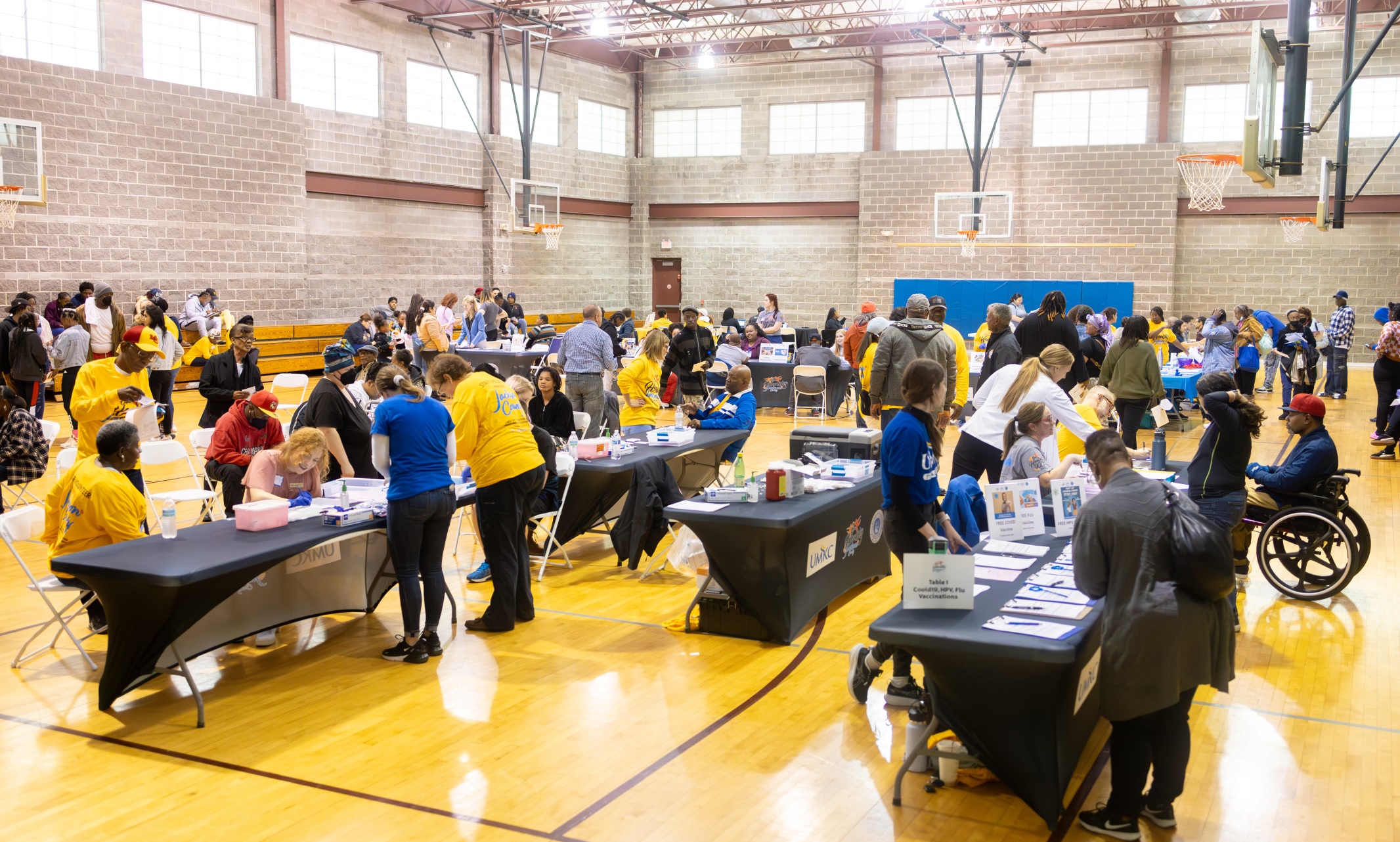
Our Healthy Jackson County is bringing health care to the people
The Gregg/Klice Community Center in Kansas City was buzzing on a recent Saturday afternoon with a DJ, free food, balloon animals and a bounce house, thanks to community initiative Our Healthy Jackson County. Amid the family fun, residents also received cancer screenings, vaccinations and a variety of other free health services.
Led by Jannette Berkley-Patton, M.A., Ph.D., director of the UMKC Health Equity Institute, the community initiative is dedicated to promoting equity and access to vaccinations and other health and community services. Formerly Our Healthy Kansas City Eastside, the program has expanded its services and community footprint to all of Jackson County, thanks in part to Jackson County, which awarded $5 million in funding for the next phase of the program.
According to Berkley-Patton, it’s a great example of collaboration among UMKC, Jackson County, neighborhood leaders and the business sector.
“First and foremost, it speaks to County Executive Frank White and the rest of the Jackson County Legislature recognizing that there are significant health disparities in Jackson County that need to be addressed,” Berkley-Patton said. “We have underserved populations that have told us how valuable these services are to them.”
White attended the event Saturday and noted that the initiative has become a valuable resource for the community.
“Dr. Berkley-Patton and the groups she works with have done a great job getting people to come out and take ownership of their health,” he said. “This is a legacy for us all that we can be proud of. When you see how many people have turned out here today, it tells you how many people lack access to health care.”
The kickoff event for the expanded initiative offered a variety of free health services, including COVID-19, flu and HPV vaccinations; blood pressure and blood sugar checks; mental health, STI, cancer and dental screenings; and smoking cessation resources. Those taking advantage of these services received cash incentives for participating.
One community member who showed up for his COVID-19 and flu shots Saturday was Kansas City civic leader and former City Council member, Alvin Brooks.
“I’m 91 and I want to stay healthy,” Brooks said. “God has been good to me, and this is me trying to be good to myself. I’m glad to see so many people from the African American community here. I know so many of them. This is certainly a success. There was a line out the door.”
Indeed, the success of the first phase has been clear. Our Healthy Kansas City Eastside provided 12,942 vaccinations and delivered 4,152 instances of health services in 2021 and 2022. At the most recent Our Healthy Jackson County event, nearly 170 community members attended and 141 received vaccines. But the proof of success also has been evident in the feedback Berkley-Patton received directly from community members.
“I remember talking to one woman who was a new grandmother,” Berkley-Patton said. “She was so excited to get her COVID-19 vaccination because she knew that not only was she protecting herself, but also protecting her grandchild that she was so eager to see.”
Kansas City home health-care worker Latonya Drew echoed that sentiment Saturday as she received her vaccine. She had her clients’ health and well-being in mind as she got her shot. She said she appreciated that the initiative is brought to the neighborhoods where people live.
“This is good for people who don’t have transportation to get here,” Drew said. “Coming here, you get a lot of information, and you get to know your community.”
UMKC health sciences students and faculty play an integral role keeping these essential services free for Jackson County residents. Students and faculty from the Schools of Dentistry, Medicine, Nursing and Health Studies and Pharmacy were on hand providing screenings, vaccinations and answering health questions.
“How often can you just walk up to a doctor and ask a question, no waiting for an appointment?” Berkley-Patton asked. “It can make a world of difference having this level of access to health-care providers in a setting that folks frequent and trust.”
According to Berkley-Patton, the experience is pivotal for UMKC health sciences students, providing them with a better understanding of the importance of preventive care. Through providing screenings and health-care education, students see how a small intervention in someone’s life can have lasting effects for overall health. The event also provides students an opportunity to work in the community, where they hear first-hand the effects of social determinants of health, such as transportation issues, food insecurity or lack of insurance.
Student Micah Anderson (Pharm.D. ’24) first encountered the program by chance at her local grocery store. She was shopping and happened across one the organization’s original events. She has lived all her life in Jackson County, and seeing people from UMKC giving back to her community was transformative.
“It was really impactful,” Anderson said. “Seeing my classmates and faculty at UMKC helping the people I see at the grocery store and the pharmacy.”
As soon as the opportunity to volunteer with the organization came up, Anderson jumped at the chance to help her community.
“These are the people who have motivated me, encouraged me in my pursuit of pharmacy,” Anderson said. “This opportunity is really important to me, using the skills and clinical knowledge that I’ve developed at UMKC to give back to the people that have poured so much into me.”
On Saturday, Anderson conducted blood sugar and blood pressure screenings for three straight hours.
“We’ve been really busy,” she said. “We haven’t stopped the entire time.”
Third-year pharmacy student Jessica Thomas spent the event giving vaccinations.
“It makes me feel like pharmacists really have a role in our community,” Thomas said. “We are having an impact on the health of the community, and I love that.”
The health-care providers involved with Our Healthy Jackson County are also helping to address the rising rates of diabetes in Kansas City as well as the area’s high infant mortality rates, an issue Missouri Gov. Mike Parson has identified statewide. Berkley-Patton is excited to launch the organization’s new maternal health program, which supports women of reproductive age with family planning counseling and an immediate appointment with an OB/GYN in the University Health Women’s Care Clinics.
The organization uses a unique approach in building the structure of Our Healthy Jackson County, pairing community stakeholders with UMKC experts who are established in these communities.
“I have been doing community-engaged research at UMKC now for almost two decades,” Berkley-Patton said. “I am born and raised in Kansas City, so to be able to do this work in my own backyard gives me goosebumps. Seeing thousands of people get the COVID-19 vaccination and much-needed health screenings, seeing the hundreds of volunteers coming together, that’s the stuff that gets me excited and increases my passion for the work we are all doing.”
Oct 18, 2023
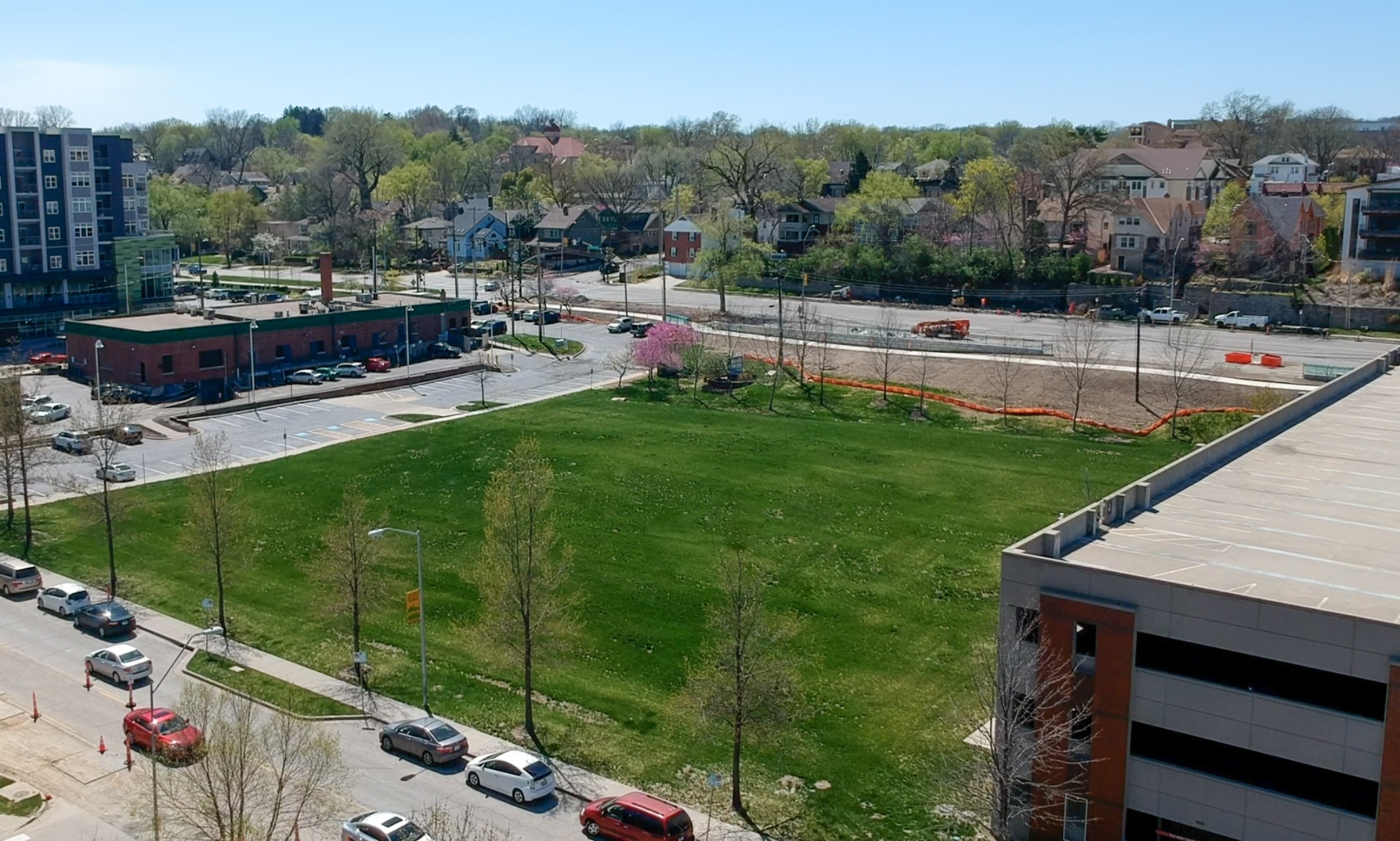
A feasibility study will be conducted on land near the future streetcar terminus
UMKC has paused the request for proposals (RFP) process to develop a five-acre parcel of land next to the south terminus of the Kansas City Streetcar at 51st Street and Brookside Boulevard. University leaders said the proposals came in higher than expected based on the specifications in the RFP and higher than anticipated project costs.
Sean Reeder, vice chancellor of Finance and Administration, said the university isn’t tabling the project. It is simply hitting pause to revise the parameters for the proposed development that would bring a small arena to campus along with retail and other possible uses. The university envisions the project as creating a destination spot for the campus and surrounding community.
UMKC will be conducting a feasibility study in the next few months to determine the right combination of size and programming for the proposed arena and will re-evaluate the opportunity for private development and non-university uses of the available land given current and anticipated market conditions.
Based on current specifications, an analysis of the proposals showed that the proposed private development included in the plans wouldn’t generate enough revenue to cover project costs, Reeder said.
The current RFP will remain open while UMKC completes this analysis. Upon completion of the analysis, the university will re-engage the RFP process with the responding firms this coming spring.
“We still believe the project can be feasible with revised parameters,” Reeder said.
Oct 18, 2023
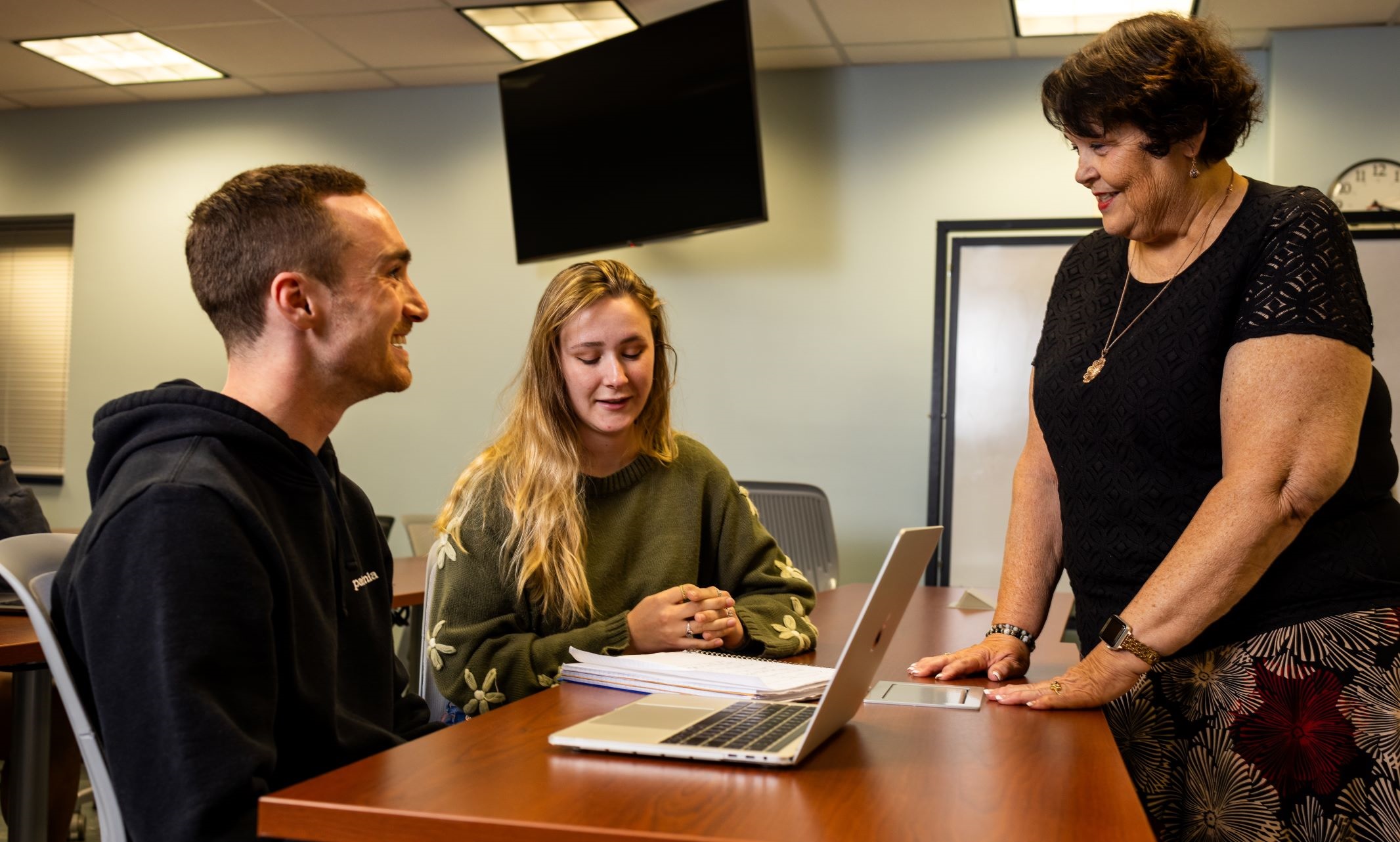
Commercial program and in-person bar preparation course are now included in tuition and fees
Beginning with December 2023 graduates, every juris doctorate student from the UMKC School of Law will receive access to Helix Bar Review, a premier online bar-prep program, as part of their tuition and fees.
The in-person bar preparation course, currently taught by Wanda Temm, a nationally recognized expert on bar passage, is now also free for these graduates.
UMKC School of Law is one of few in the country to provide both a commercial bar preparation program and a supplemental in-person course at no cost to students beyond tuition and fees.
“This is a game-changer for our students,” UMKC School of Law Dean Lou Mulligan said. “Law school is probably the most challenging intellectual exercise they’ll engage in, and the bar exam is the top of that mountain. This initiative ensures that every student has access to these important resources and the best chance to be successful.”
Reputable commercial bar preparation programs cost an average of $4,000, a high expense to ask students to pay before many of them have full-time jobs and one that cannot be paid for with a student loan. This leaves many students to make the difficult choice to take out a commercial loan to pay for a program or try to pass the bar exam without using a program to prepare.
“The reality of bar prep is that some people have to make an economic-driven decision,” said Alexis Denny, a UMKC law student graduating in December. “So they choose the cheapest or free option, don’t enroll in the in-person class and try to go it alone. With this initiative, no student has to choose between paying for bills or a bar prep program.”
Some large law firms pay for bar prep expenses, but students with ambitions in areas of law that don’t pay for bar prep, and likely don’t start at high salaries, are now able to pursue those ambitions with less concern regarding expense. UMKC School of Law prides itself on its ties and service to the Kansas City community, and this is one more way it provides value to that community, as well as its students.
“This initiative is deeply in line with our mission,” Mulligan said. “First-generation and other students with fewer economic means now have access to that resource to succeed. We’re helping to create lawyers who seek a career outside of the private sector such as in public defense, district attorney offices and public service work.”
“I think this is a really great way to help equalize the bar prep experience,” Denny said. “It’s so helpful for everyone, but especially for those who will be in the public or nonprofit sector where there is no support for bar prep costs.”
Faculty and staff at the Law School anticipate that this initiative will increase passage rates for first-time bar takers and inspire confidence from employers that UMKC graduates are prepared to begin work.
“Our students will have all of the resources they need,” Mulligan said. “We support our students from their first day at law school all the way through the bar exam. We’ve got them covered.”
Oct 18, 2023
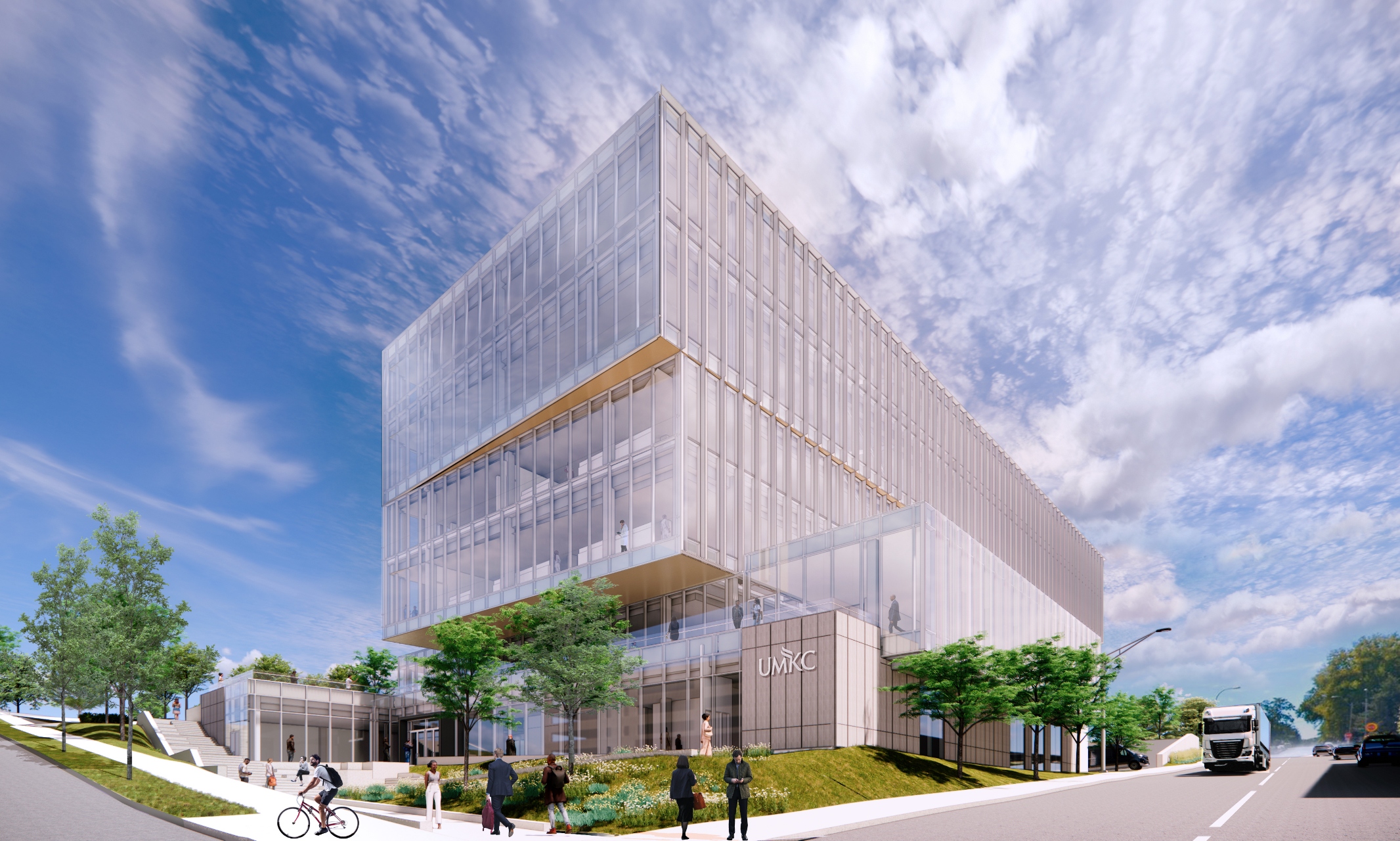
Renderings unveiled for $120 million Healthcare Delivery and Innovation Building
The University of Missouri-Kansas City at a Tuesday event revealed the design of its largest capital investment to date: the $120 million Healthcare Delivery and Innovation Building.
UMKC expects to break ground next year on this new building, with key funding from the state of Missouri and visionary Kansas City donors coming together to support this cornerstone project that will launch a new era for the UMKC Health Sciences District and healthcare access.
The five-story 200,000-square-foot building will be constructed on what is now a parking lot at 25th and Charlotte streets. The project will enable the university to provide state-of-the-art education for the next generation of healthcare providers, find newer and better ways to serve patients in need, strengthen collaborations with surrounding neighborhoods and facilitate greater interdisciplinary partnerships to fuel innovation and research.
UMKC Chancellor Mauli Agrawal speaks at the rendering reveal event. Photos by Brandon Parigo, UMKC
“The new Healthcare Delivery and Innovation Building will be one of a kind,” said UMKC Chancellor Mauli Agrawal. “We know of only one other combined medical and dental education building in the nation, and none other that will include what ours will with a unique combination of collaborative programs focused on elevating healthcare.”
UMKC will house key assets in the building for the following programs:
UMKC School of Dentistry. UMKC is a regional leader in dental education with the only public dental school in the states of Missouri and Kansas. The new building will provide leading-edge pre-doctoral dental clinics, enhancing our ability to graduate top-notch dentists. The new space also means students can serve more patients in need through advanced equipment, greater efficiency, expanded hours for acute dental care and the ability to implement teledentistry. Currently, the School of Dentistry provides $750,000 annually in uncompensated dental care for the community. The new facility will house UMKC acute dental care programs – such as oral surgery, endodontics and emergency procedures – plus program space for radiology, lab work and a high-tech dental design lab to produce crowns, bridges and implants.
UMKC School of Medicine. UMKC has the highest-ranked public medical school in Missouri for primary care. The new facility will allow the School of Medicine to provide cutting-edge simulation labs, including dedicated space to practice essential medical procedures; a full-scale operating room and patient exam rooms to practice patient communication and care. The collaborative learning spaces for students encourage a culture of communication and better prepare them to work with colleagues in their professional lives.
UMKC Health Equity Institute. The institute brings together researchers, government and community organizations to improves the lives of the underserved and bridge healthcare gaps. The institute combines its research strengths with community groups’ grassroots involvement to identify, quantify and reduce those gaps. In the new building, researchers will collaborate to tackle health disparities and provide access to healthcare with initiatives including Our Healthy Jackson County that brings free vaccines, health screenings and other resources into neighborhoods and places of worship. The institute’s new space will include a kitchen lab to teach healthy meal preparation.
UMKC biomedical engineering. In the new building, doctors, dentists and engineers will work side by side, creating faster, more effective collaboration between science, engineering and the medical world. Product development will accelerate in areas such as medical implants, imaging technology and surgery tools, and UMKC can expand access to the in-demand biomedical engineering degree program with potential global impact. On average, a single engineering position creates 1.5 staff jobs and brings 2.5 households to the Kansas City area, positively impacting Kansas City’s economy.
Data Science and Analytics Innovation Center. In partnership with MU and other University of Missouri System universities, UMKC leads a center focused on creating new advances in data sciences and analytics. The new space in the building will provide the center opportunities to focus the power of data science on transforming the way we personalize healthcare. The data center within the new facility will provide high-performance computing for industry, government and nonprofit organizations within our region to solve data-intensive computing problems.
University Health. Our clinical partner will occupy two floors of the new building for office space.
The project is close to being fully funded:
Included in the last two budgets from Governor Mike Parson and passed by the Missouri General Assembly, the state of Missouri has committed $60 million,
The Sunderland Foundation has pledged $30 million,
The Hall Family Foundation will contribute $15 million and
$10 million will come from federal funding secured by former U.S. Senator Roy Blunt.
Groundbreaking will occur in 2024 with project completion expected in 2026.
Oct 17, 2023
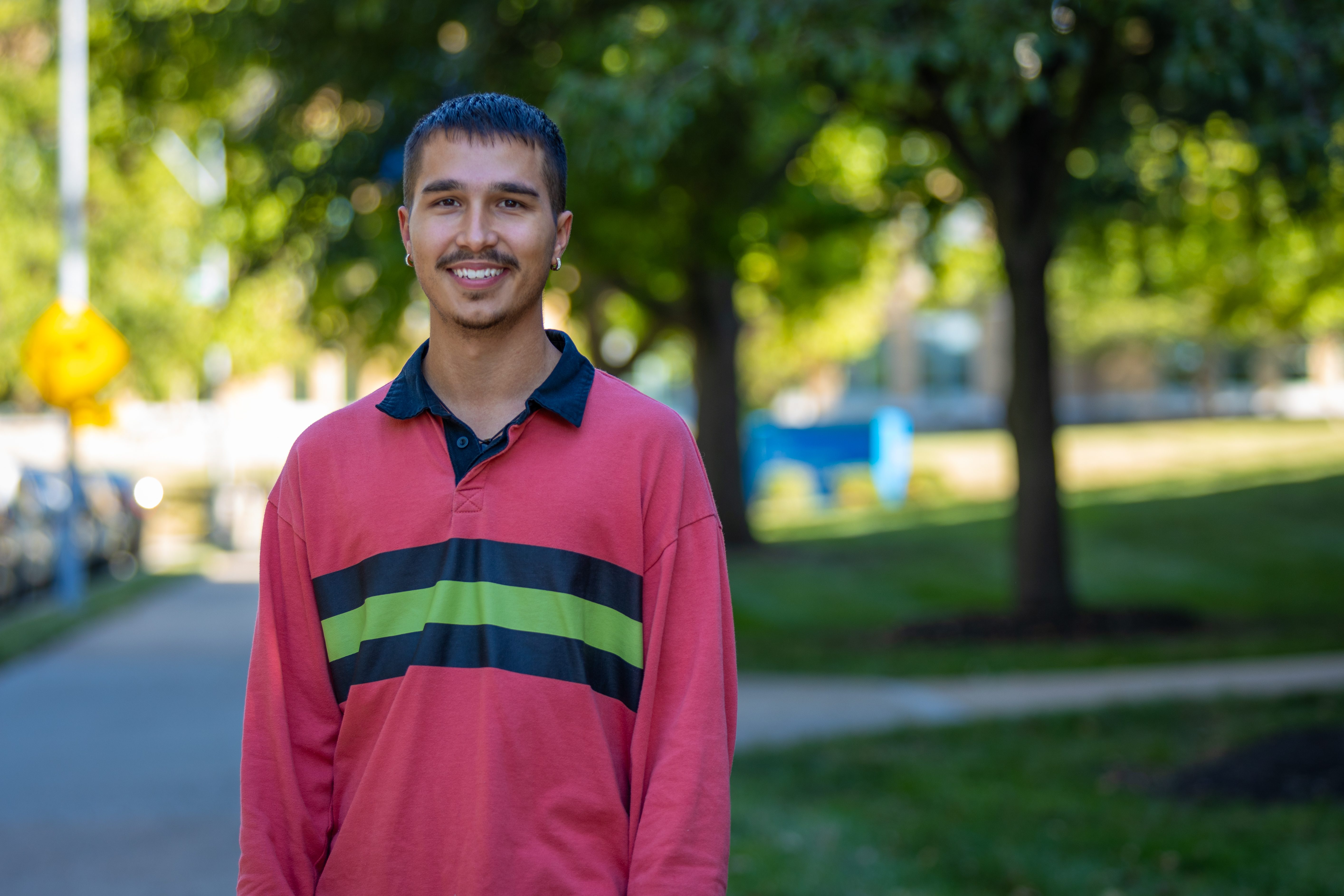
The Institute for Urban Education trains educators who are diverse and inclusive
At UMKC students write their own stories, form their own definitions of success and chart innovative career paths. With Kansas City as their classroom, they turn dreams into reality every day.
Isaia WilcoxenAnticipated graduation: 2024UMKC degree program: B.A. Elementary EducationHometown: Kansas City, Kansas
Isaia Wilcoxen thought he wanted to be a doctor, but his high school teacher’s high expectations and interest in his personal well-being made him change his path.
“My choir director in high school sparked my desire to stay in school,” Wilcoxen said. “She took the time to know who I was and invest in my life. By attending extracurricular activities I participated in and getting to know my family, she truly made an effort to understand who I was as a person. Because of her, I decided for myself that I wanted to do the same for other students.”
Wilcoxen’s mother is also a teacher, and she inspired his choice as well.
“Growing up, she pushed me and my siblings to work hard and never quit, especially in our academics,” he said. “In addition to being a great mom, she was also a great teacher to me. Her warm demeaner and high expectations pushed me to keep trying and keep learning.”
The influence of both women inspired Wilcoxen to aspire to spark that same focus in other students. He started college at a small school in a rural area that lacked diversity, and had few students who shared his experiences.
“I noticed there was no discussion of race and equity,” Wilcoxen said. “Because of this, I quickly realized how necessary diversity is in education.”
Then he learned about the Institute for Urban Education (IUE) at UMKC and decided to transfer.
“The IUE’s mission is to create inclusive and responsive teachers. I knew that I needed to be here,” he said. “I understood what it’s like to not have teachers who look or think like me. In addition, IUE focuses on preparing teachers for urban schools, which is where I want to teach.”
Being on campus at UMKC reaffirmed his decision.
“The IUE’s mission is to create inclusive and responsive teachers. I knew that I needed to be here.” - Isaia Wilcoxen
”My first day on campus, I felt welcomed and accepted to be myself,” Wilcoxen said. “UMKC offers so many clubs, organizations and services for students of color, LGBTQIA students, religious students and so much more. Coming from a small, private school, I was amazed at how inclusive UMKC is. I immediately wanted to get involved and meet new people.”
Currently, Wilcoxen is participating in a paid apprenticeship program teaching at the Academy for Integrated Arts (AFIA.)
“IUE has a lot more practicum opportunities for education students,” he said. “The first semester of our senior year, we're required to go three days to practicum, where other education students usually do one. And we also have more opportunities in the community through volunteering. I've gotten to work at AFIA with their after-school program, which is a paid practicum. It has been a great experience.”
He says people ask him why he chose to focus on urban education.
“The main reason is because urban schools have statistically been underserved and have fewer resources than suburban school districts, or even rural school districts,” Wilcoxen said. “So, there's a lack of teachers, specifically in urban schools because a lot of teachers migrate toward the suburbs, because of better funding and resources. That’s what makes me want to teach in urban schools.”
Oct 17, 2023
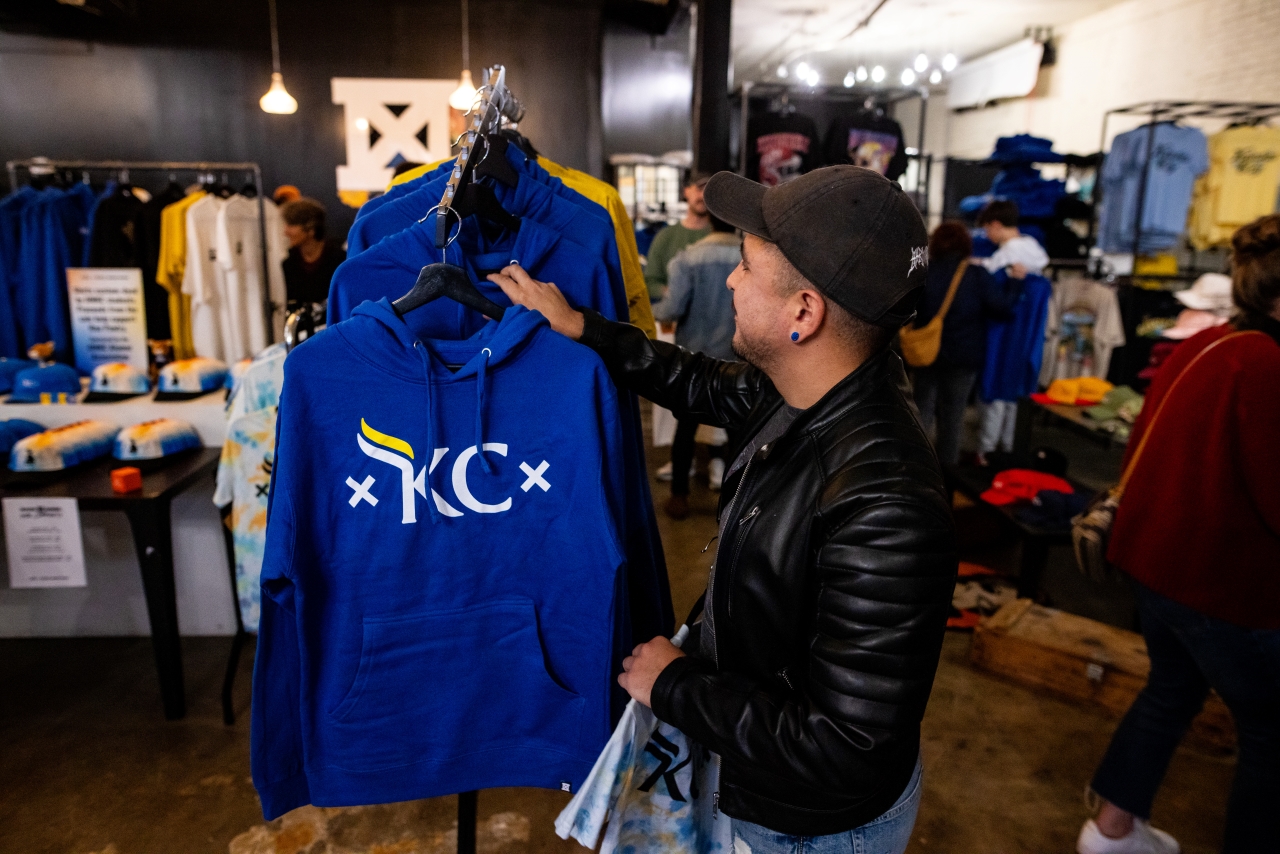
The collaboration includes exclusive Roo-inspired streetwear and UMKC alumni-owned businesses at a pop-up event
The Kansas City community was invited to celebrate the inaugural Roos Mobb collaboration between UMKC and MADE MOBB on October 13 at MADE MOBB’s space in the Crossroads Arts District.
The capsule collection included hats, shirts and sweatshirts with exclusive UMKC designs.
Vu Radley, one of the founders of MADE MOBB, is a UMKC alum. He was joined by over a dozen alumni-owned businesses at the event.
Similar to First Fridays events at their space, there were also performances by various UMKC alumni.
Roos Mobb collection pieces are available for purchase in-store at MADE MOBB’s location until October 31.
Oct 16, 2023
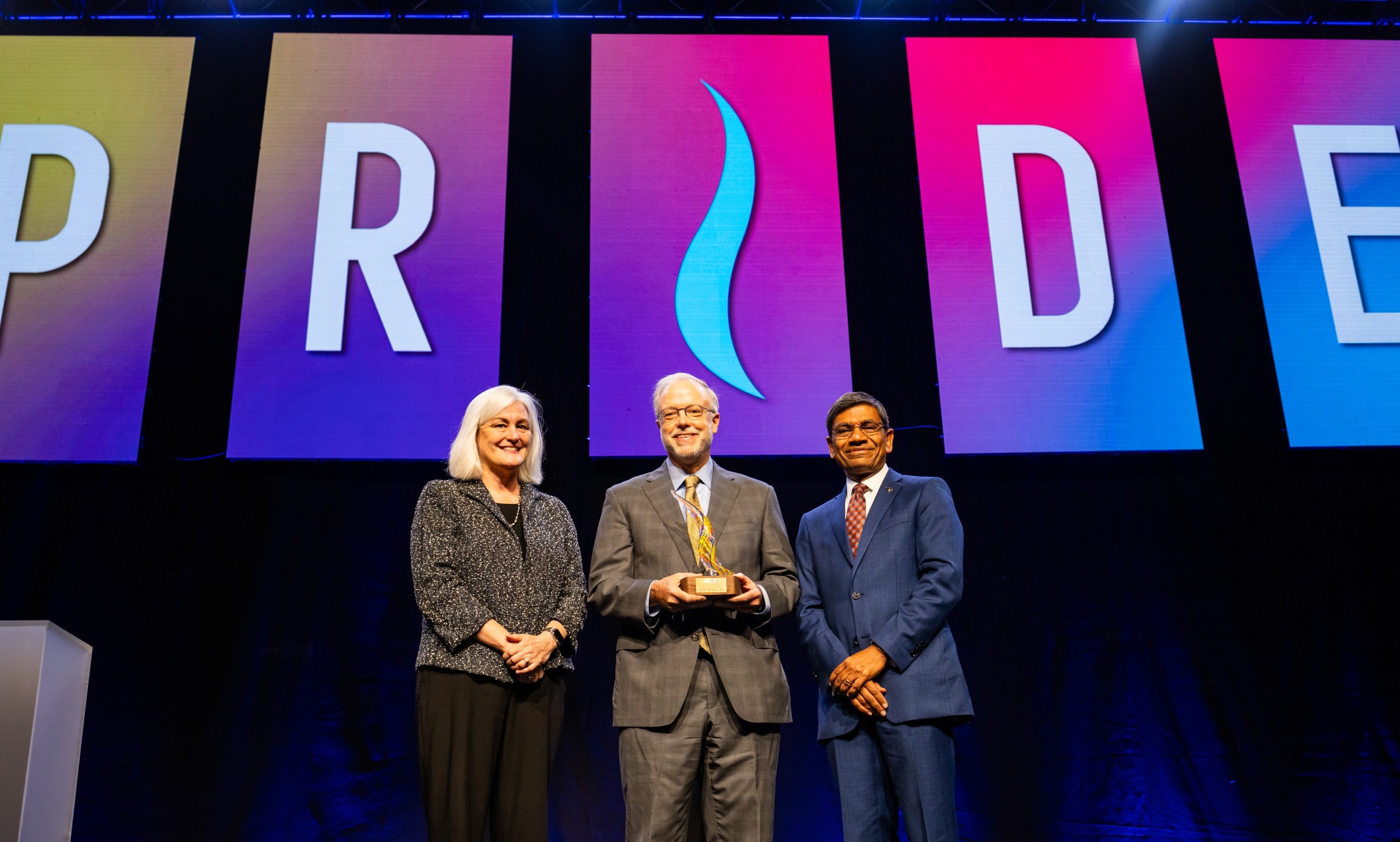
Hall received the inaugural Stephen Metzler Pride Champion Award at the annual event
The annual Pride Breakfast at UMKC is a fundraiser, but it’s also a place to celebrate community and allyship. That’s never been more clear than at this year’s breakfast where the inaugural C. Stephen Metzler Pride Champion Award was given to Hallmark’s Don Hall Jr.
Metzler, a UMKC alumnus, was a noted philanthropist, HIV/AIDS activist, patron of the arts and business leader in the Kansas City community. He was involved in numerous Kansas City non-profits and organizations, including the Mid-America Gay and Lesbian Chamber of Commerce, AIDS Service Foundation of Greater Kansas City and AIDS Walk of Kansas City. A believer in the power of community and connections to create change, Metzler often said he was “saving the world one cocktail party at a time.”
Don Hall Jr., executive chairman of the board of directors and former CEO at Hallmark, was awarded the Metzler Pride Champion Award for his support of the LGBTQIA+ community. During his tenure as CEO, Hall made Hallmark the founding corporate partner of the Mid-America Gay and Lesbian Chamber of Commerce. He was the first CEO to walk in the AIDS Walk of Kansas City and was instrumental in bringing diverse voices to the table across the civic landscape.
Leading a company that serves to foster and celebrate relationships made Hall even more conscious of the need to celebrate people from all walks of life.
“This awareness underscores for me how much harder we have to work for all people to feel valued,” Hall said. “All people need to love and be loved, laugh, celebrate, reach out to others.”
Hall credits Metzler with inspiring him from a young age. He knew Metzler as the older brother of a classmate when he was a child and said that Metzler was kind and affirming even back then.
“I drew inspiration from Steve my whole life,” Hall said. “He was enthusiastic and determined to build understanding. I can’t think of a better example at creating inclusiveness, building humanity and encouraging empathy.”
Since 2008, the Pride Breakfast has raised more than $600,000 to support LGBTQIA+ students at UMKC and serves as a way for the university to show support for, and commitment to, LGBTQIA+ students on campus. Funds from the UMKC Pride Breakfast are critical to support programs and scholarships for LGBTQIA+ students — including the Pride Empowerment Fund, which provides emergency assistance to students who experience financial difficulty due to the loss of family support.
“This event serves as a meaningful reminder that you have champions,” said Chancellor Mauli Agrawal to students. “UMKC and our community see you, we care about you and we support you as you develop as students and valued individuals.”
Oct 10, 2023

Supplemental Instruction helps universities around the world
University of Missouri-Kansas City junior Grace Miller remembers taking Computer Science 101 last year and feeling apprehensive. She’d never coded before.
But then Miller was introduced to Supplemental Instruction, called SI for short, a student-led learning approach UMKC invented 50 years ago. Not to be confused with peer tutoring that’s typically one on one and by assignment, SI is built upon collaborative learning. Research shows that students who study in groups retain 2.5 times more than students who study on their own.
“SI focuses on reinforcement of knowledge,” says Miller, who is majoring in media, art and design. “SI also fosters connection with other students and takes away the loneliness from studying.”
SI proved successful for Miller because not only was she advised she should be an SI leader, she received a 97% in the course. Indeed, a major bragging point of SI is that participating in sessions will boost your grade a half letter to a whole letter.
Read more
Inside Higher Ed: UMKC Has Offered Supplemental Instruction for Five DecadesThe Kansas City Star: This Learning Method Boosts Social Skills - and It Started at UMKC
UMKC junior Grace Miller is an SI leader and participant.
History and global reach
The International Center for Supplemental Instruction is based at UMKC and offers SI resources, training and accreditation to universities throughout the U.S. and around the world.
“I believe that SI has made such an impact in higher education because of the community the collaborative learning environment creates,” says Jessica Pearson, executive director of the International Center for Supplemental Instruction and director of UMKC Academic Support and Mentoring. “Students do not just learn course content and study skills, but they also develop friendships and lasting connections with their classmates and campus.”
In 1973 at UMKC, then-doctoral student, Deanna Martin, created SI out of a critical university need to retain students, keep academic standards high and help students reach their goal of graduating. Martin piloted the first SI program in a human anatomy class at the UMKC School of Dentistry. SI had elements that were attractive to faculty and students. With a budget increase, SI was placed in additional courses.
Other universities started their own SI programs and by 1981, the U.S. Department of Education named SI an Exemplary Education Practice. UMKC has trained faculty and staff from more than 1,500 institutions, including other universities in Missouri and Kansas, from 34 countries around the world.
“I take great pride in the fact that SI originated at UMKC and has now made a significant global impact,” says Kristi Holsinger, Ph.D., senior vice provost for student success at UMKC. “While data clearly demonstrates the positive effects of SI participation on students’ performance in specific courses, its far-reaching influence on nurturing enduring skills, such as effective learning strategies, critical thinking abilities and enhanced study habits, is truly immeasurable.“
Key components and results
Programs around the world share fundamentals.
SI:
Targets historically difficult courses, those that have a high percentage of D, F and withdraw
Does not identify struggling students; all students in each course are highly encouraged to attend SI sessions.
Is voluntary, and students can choose when they want to attend.
Employees are trained extensively, and the program supervises SI leaders throughout the semester.
Among the accredited universities is Georgia College and State University, which this year celebrated its 10th anniversary of SI and nearly a third of the university’s students use it. In the spring of 2023, 50% of Georgia College students attended SI sessions for classes that are difficult to pass. Of the students who attended SI sessions, only 11% dropped, withdrew or failed the class compared to 27% of those who did not participate in SI.
Purdue University uses SI and says this about the approach: “SI is a low-stakes environment (you won’t be graded!), so don’t be embarrassed to make a mistake or be confused. The leader will use several tools to give you the opportunity to think more critically about course content and develop a deeper understanding of how different concepts connect to one another. This could include small group discussions, games and other hands-on activities to make content practice more fun. Although the leader might not directly answer a question you ask, they will help you to find the answer yourself, which in the long run will be more beneficial to your learning.”
SI now at UMKC
UMKC sophomore Shekhar Gugnani is an SI leader and participant.
Sophomore Shekhar Gugnani, who is pursuing the six-year B.A./M.D. from the UMKC School of Medicine, says SI is his favorite part of the day at UMKC, both as an SI participant and leader.
“It makes learning fun,” he says. “It provides limitless creative freedom to reinforce the content.”
Gugnani credits SI for his success in the historically challenging Anatomy 219 course his freshman year. This semester, he’s both an SI leader for Anatomy 219 and an SI participant in Medical Biochemistry BMS 9265.
During each SI study session – typically an hour twice a week – SI leaders like Gugnani and Miller provide strategies for notetaking, organization and test preparation. They lead discussions and activities over lecture material to review and prepare students for higher levels of success in the class.
To prepare for sessions, SI leaders attend all class meetings, take notes, read and understand assigned materials and communicate with the respective professor and SI supervisor. SI is designed to be collaborative, involving all members of the session in hands-on, participatory learning.
For example, Miller plans to lead an SI discussion in Computer Science 101 about CSV (comma-separated values) files with large datasets of Netflix programming and students will learn how to organize them by cross referring them with their favorite actors. Gugnani led a recent Anatomy 219 SI session by having teams draw bones in a race.
“Students are excited, and they engage with SI,” Gugnani says. “Because of the non-remedial approach, there’s no stigma to it. It’s good for all students.”
So why is SI still strong 50 years later?
“SI has not stopped working all these years later because the challenges it was designed to address remain the same,” Pearson says. “Many students entering colleges and universities do not understand how to learn effectively in a college setting. We need a space for students to learn how to learn. SI offered that 50 years ago and it still offers it today.”
Oct 10, 2023
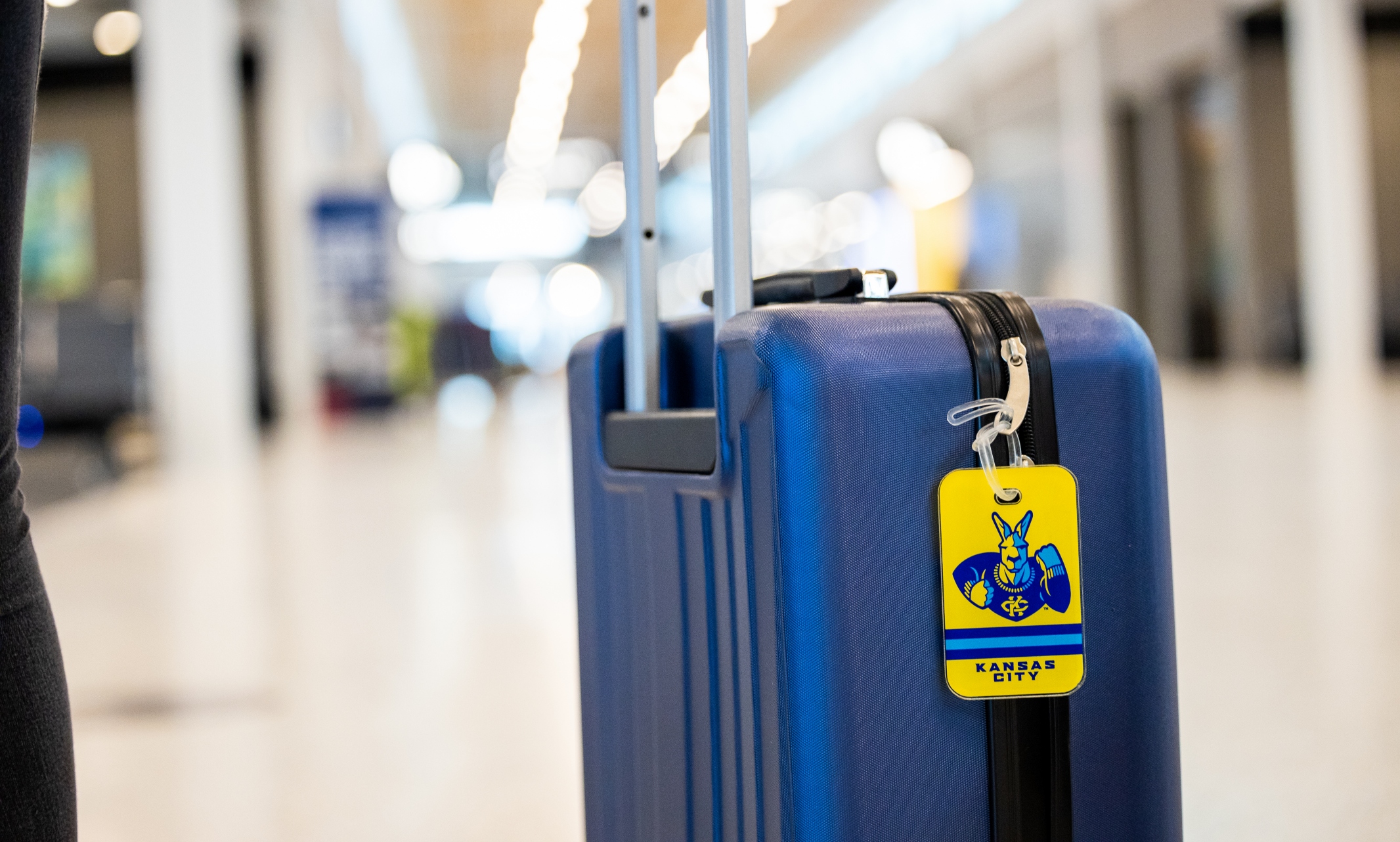
UMKC professor’s KC connection provides once-in-a-career opportunity to students
Msgana Zegeye recalls the moment she was asked to assemble the dream team.
“Validating, that's the word,” she recalled, describing when Bloch Consulting Lab adviser Marvin Carolina asked her to form a team in her image to work with Vantage Airport Group, the concession developer and manager for the new $1.5 billion Kansas City International Airport terminal.
“I think Marvin really saw my passion for leading, managing and operations,” said Zegeye.
She got to work and landed on a four-person team to help advise the company. At first they worked on staffing solutions for the new terminal, but they were so successful, the general manager, Lovell Holloway, kept the team on board and expanded their scope of work.
Zegeye had never worked with any of the peers she selected, but she’d seen them in action in the mock consulting activities in the Consulting Lab. From that, she was able to recognize each of their strengths and envision how those strengths could be deployed to help Vantage Airport Group.
“Nicolas, I felt like would be really good at marketing. He's very innovative.” “With Erik, he is super analytical, and finance is his avenue.”
“Henry really likes like logistics. He likes making sure we do everything by the book and in order.” The team got to work, helping vendors at the airport navigate all their business licenses, airport-specific safety regulations and hiring and retainment strategies for their employees.
As time went on, Holloway entrusted more responsibilities to the team, including conducting an economic impact study and developing an internship program for Vantage Airport Group to further its work with students. Despite the group’s youth, Holloway said he never doubted their capabilities.
“I'm very fortunate and humbled to be working with these students in the Bloch school," Holloway said. "They've been very great to work with, they've been willing to learn, they have educated us. They add value and have great energy. They're easy human beings to work with, and I'm fortunate as a leader to be able to be entrusted with their careers and their vision of where they want to go in life in the future.”“It was a really cool experience because we got to see how we're helping them firsthand, and that they were actually going to take our advice and learn from it,” Hartung said.
Everyone on the team agrees, the guidance, support and trust from Vantage Airport Group and Holloway, and being allowed to take risks and make mistakes on a real-world project taught them invaluable lessons. “The experience itself is something I would never have thought I would have been able to get at any university because this type of project doesn't really happen all that often,” said Klaas. “UMKC has provided a tremendous amount of opportunity,” Hartung agreed. “I think that's all Kansas City’s about, all the opportunity that it holds for students.”
Oct 03, 2023
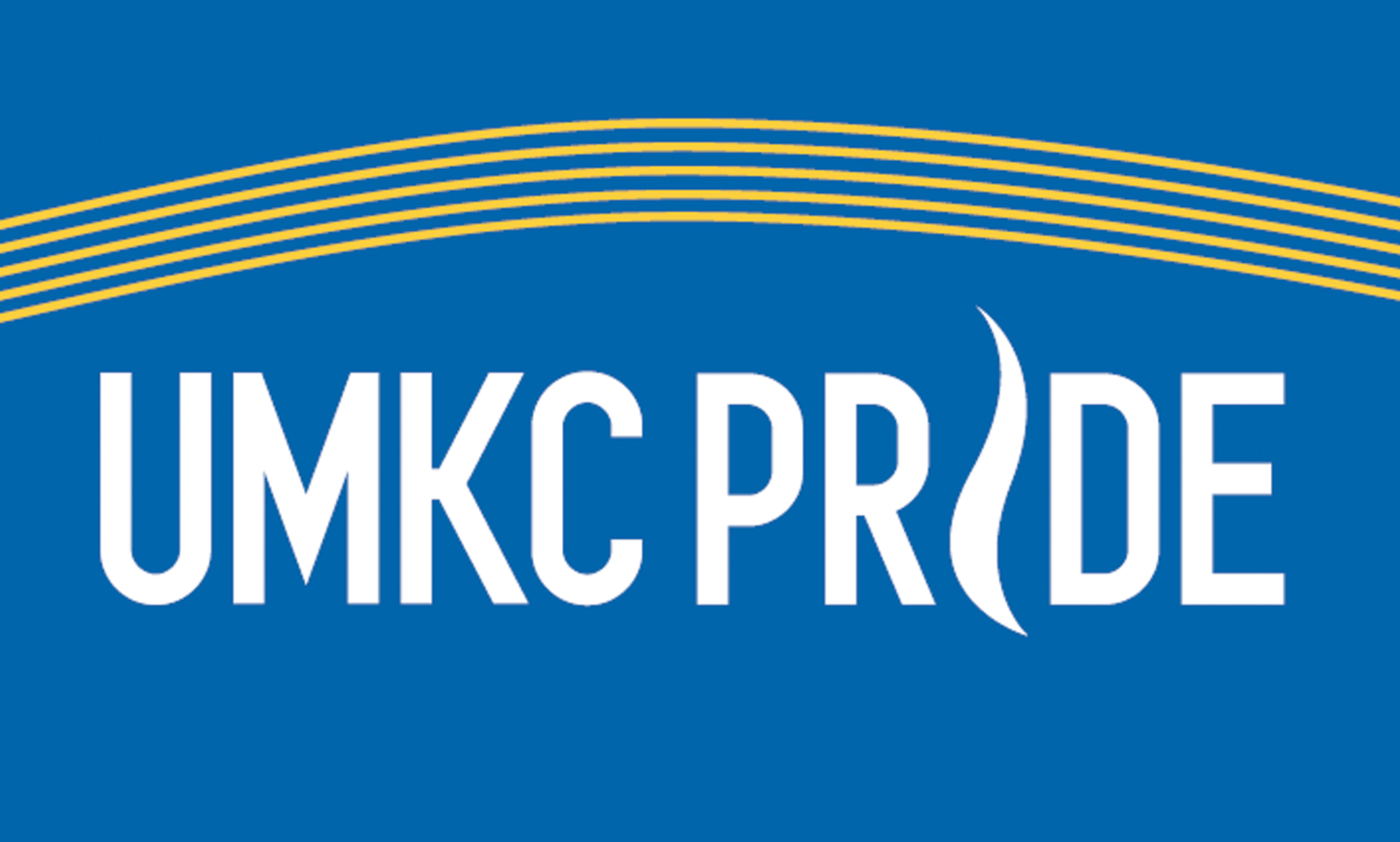
Hall has supported the LGBTQIA+ community throughout his tenure as a Hallmark leader, including his time as president and CEO
The University of Missouri-Kansas City will honor Don Hall Jr., executive chairman of the board of directors at Hallmark, with the inaugural C. Stephen Metzler Pride Champion Award at the annual UMKC Pride Breakfast.
This award recognizes an individual (LGBTQIA+ or ally) who embodies Steve Metzler’s legacy of making Kansas City a better place for the LGBTQIA+ community through volunteerism, philanthropy and leading by example.
Don Hall, Jr.
Hall was president and CEO of Hallmark, serving in that role from 2002 to 2019 when he became executive chairman. During his tenure as CEO, he made Hallmark the first founding corporate partner of the Mid-America Gay and Lesbian Chamber of Commerce (now Mid-America LGBT Chamber of Commerce) in Kansas City. He was instrumental in bringing diverse voices to the table across the civic landscape to champion support for the LGBTQIA+ community.
Hallmark’s commitment to inclusion is part of its long-standing beliefs and values; it has consistently ranked as a top company to work for as acknowledged by the Human Rights Campaign (HRC) Corporate Equality Index – the nation’s foremost benchmarking survey and report measuring corporate policies and practices related to LGBTQIA+ workplace equality.
“We’re thrilled to present Don Hall Jr. with the inaugural C. Stephen Metzler Pride Champion Award,” said UMKC Chancellor Mauli Agrawal. “Don is truly an example of what it means to be inclusive, and his efforts have made Kansas City a better place for our students and all of us to live. We are proud to honor his legacy here.”
The 2023 Pride Breakfast is 7:30 to 9 a.m. Oct. 10 in Swinney Center. Tickets can be purchased at umkc.edu/pride.
Since 2008, the UMKC Pride Breakfast has raised more than $600,000 to support LGBTQIA+ students at UMKC and shows our university’s support of, and commitment to, LGBTQIA+ students on campus. Funds from the UMKC Pride Breakfast are critical to support programs and scholarships for LGBTQIA+ students — including the Pride Empowerment Fund, which provides emergency assistance to students who experience financial difficulty due to the loss of family support.
Sep 25, 2023
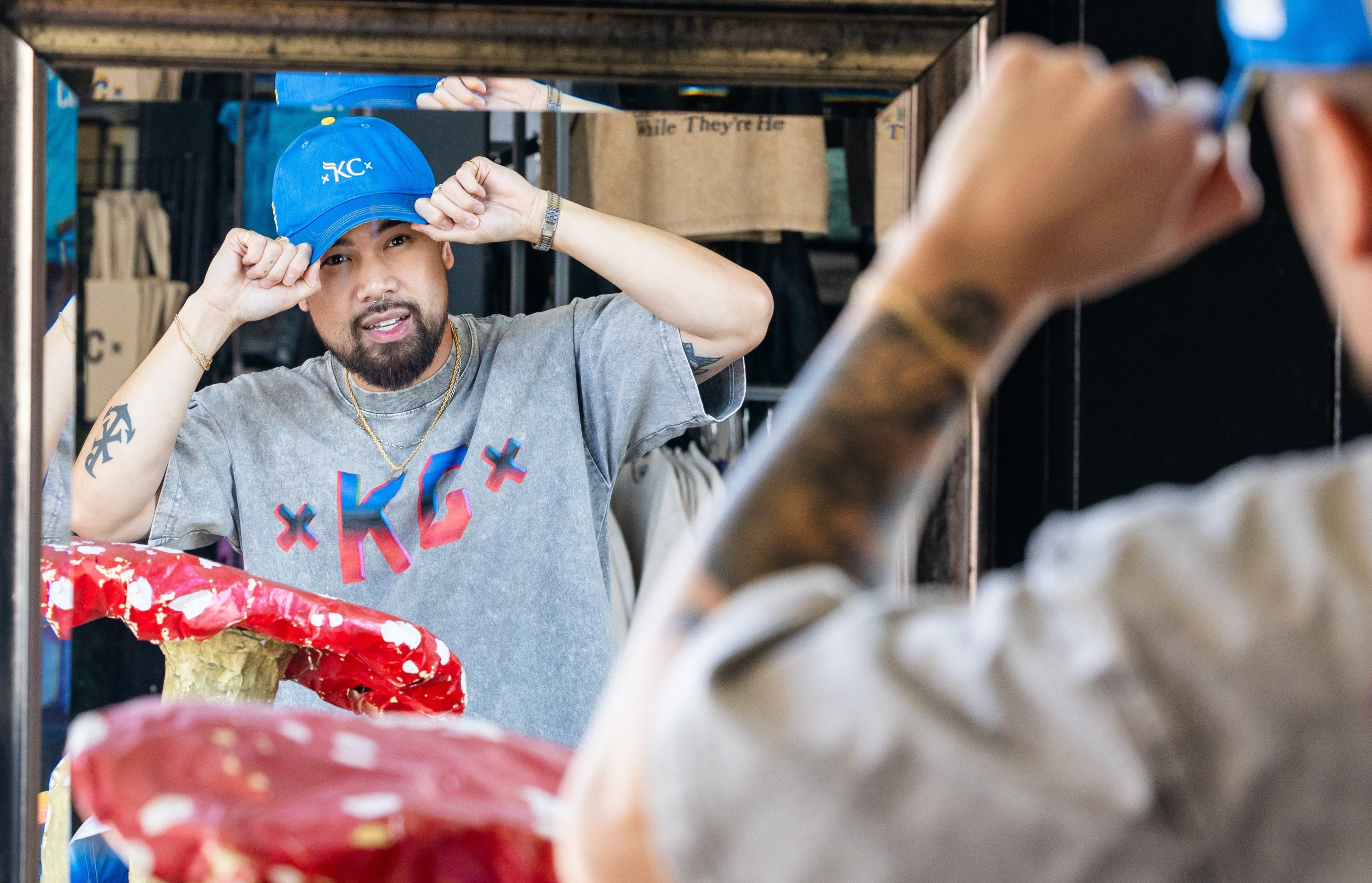
UMKC alum releases exclusive UMKC merch only available at inaugural Roos Mobb event
Did you know that a group of kangaroos is called a mob?
Well, UMKC alum Vu Radley (B.A.’12) had no idea when he started MADE MOBB with his friends 10 years ago.
The streetwear brand is known for its collaborations with various Kansas City businesses, including the Chiefs (now a UMKC partner), KC Current and Café Ca Phé.
Like kismet, the brand is now collaborating with UMKC for its very first Roos Mobb event. The vendor market event, featuring various alumni-owned businesses, took place on Fri., Oct. 13 at MADE MOBB’s space in the Crossroads Arts District.
Now that Vu has come full-circle with UMKC merch and an exciting event partnership, we sat down with him to reflect on how he and MADE MOBB grew to where they are now.
How did MADE MOBB start?
MADE MOBB started in 2012, although we did not drop our first capsule collection until 2013. It was right after I finished my degree in Studio Art at UMKC.
I was working at a corporate job when I met two guys (Mark Launiu and Jesse Phouangphet), and we all came up with the idea to start a business. The financial background and events experience from the two, combined with my experience of printing DIY shirts in high school, formed the foundation of MADE MOBB.
We started working weekly on it as a passion project to simply celebrate our love for streetwear and design. It was what we did after we clocked in our 40 hours at the jobs we were in at the time. But now, it’s what we live off of as a full-time business.
Did the streetwear initially start off as KC-based?
Our x KC x design created in 2013 was one of our first KC products, and is now one of our signature designs. But, it wasn’t until 2015 after the Royals win when wholesalers began to pick up our products and focused specifically on our KC designs. That was also when the KC local-wear scene started to kick off, and we started incorporating more Kansas City elements into our pieces.
How did your experience at UMKC impact the success of MADE MOBB?
Although I grew up with the arts, I never really thought about the digital side of it, which was why I took classes like introduction to graphic design and typography at UMKC. These classes changed my view on graphic design and made me realize it was a space I could get into and build a career.
UMKC was also where I was able to sharpen my design chops and learn important skills, such as how to put a design together that goes to print. The classes I took, from drawing classes to art history classes, made me realize that I might have found my career path.
There is a lot of KC influence in your collaborations. Could you talk more about that and where you see it going in the future?
MADE MOBB has always been about collaboration. There is a lot of talent in Kansas City, and it is fulfilling to be able to support the community and elevate Kansas City businesses, especially small businesses, whether that is with a capsule collaboration or having them pop up in our space. I want to continue doing this and also focus on collaborating with not just businesses, but also local Kansas City creatives.
With the community, we want to continue hosting events. First Fridays was one of the first events we held, even back at our Grand Street location. It’s our favorite time of the month. We have food trucks outside and 15-20 local vendors that pop up in our shop and sell their own stuff. We have local artists performing their own sets too. We want all our people in our space to show us what they are working on, while also sharing what we are working on.
What were you most excited about with the Roos Mobb event?
Graduating from UMKC and then being able to do a collaboration with them 10 years later is just a full-circle moment. A lot of things have happened in my career that have made sense, and this is definitely one of them. So, I was excited to see this event come to life.
Also, having businesses that I did not know were UMKC-alum owned popping up at the event was exciting.There is a lot of talent from UMKC alumni who are still in the city, and it’s something not a lot of people are aware of unless an event like this happens.
As part of 2024 KC Design Week, Vu and some of the UMKC staff invovled with Roos Mobb had a chance to speak on a panel to discuss how the collaboration came to life.
Sep 19, 2023
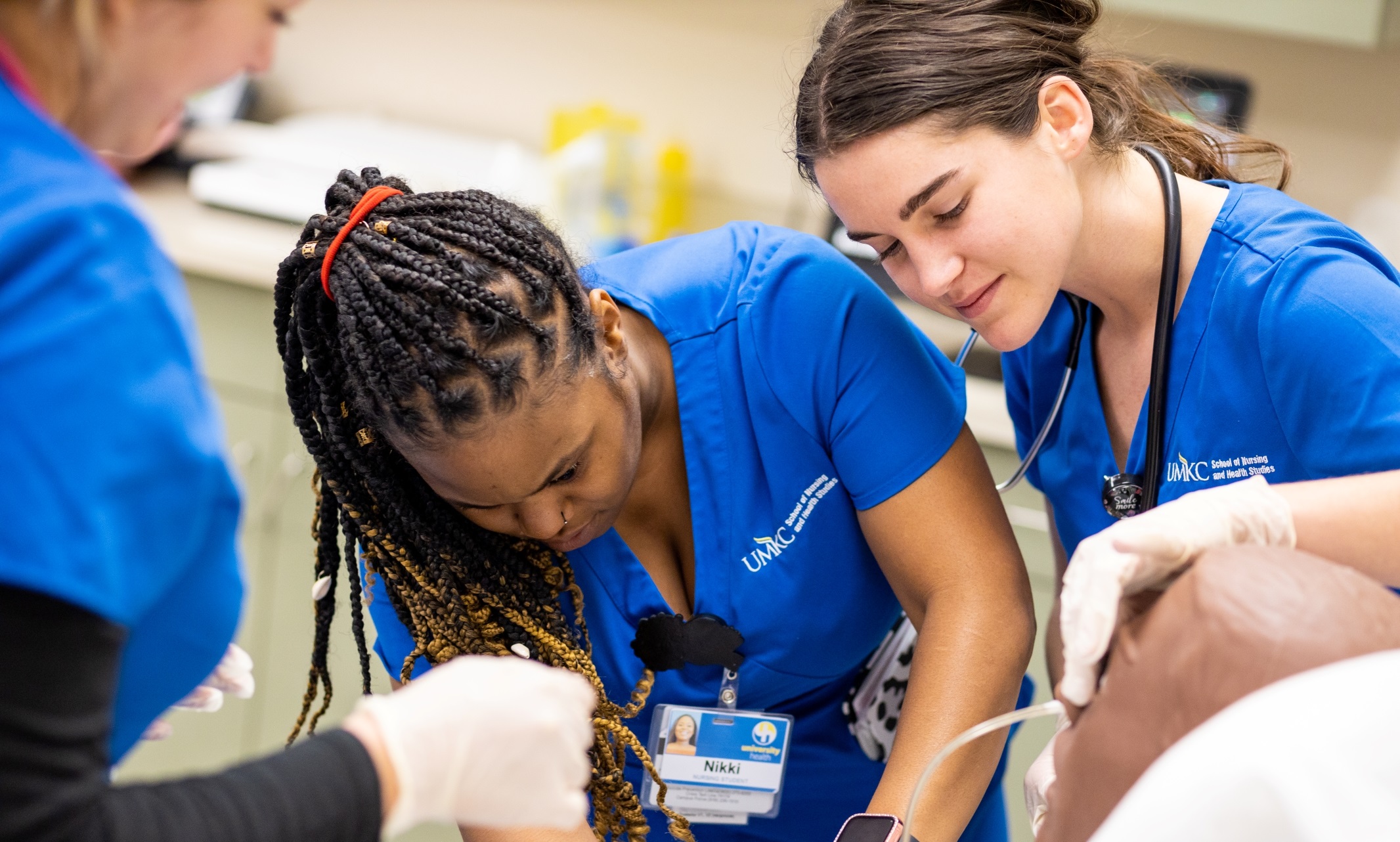
U.S. News and World Report releases annual undergraduate program rankings
The University of Missouri-Kansas City had two undergraduate programs rank among the Top 100 programs in the country, according to the U.S. News and World Report 2024 Best Colleges rankings.
The undergraduate nursing program from the School of Nursing and Health Studies and the undergraduate engineering program from the School of Science and Engineering each placed at No. 86 on the list in their respective categories. In total, more than 650 nursing programs and more than 270 engineering programs that offer only bachelor’s and master’s degrees were considered in the U.S. News and World Report rankings.
The School of Nursing and Health Studies is proud of their ranking, said Joy Roberts, dean of the school.
"The UMKC School of Nursing and Health Studies is proud that our Bachelor of Science in Nursing program has been recognized in the Top 100 undergraduate nursing programs in the U.S,” Roberts said. “Our hardworking, well-prepared BSN graduates are quickly hired by health-care institutions in the Kansas City metro as well as across the country. Our faculty, staff and administration are proud to support our students and we applaud their success!"
School of Science and Engineering dean Kevin Truman is glad for the recognition of the university’s four engineering programs – biomedical, civil, mechanic, and electrical and computer.
"We are thrilled to have received this ranking and continue to elevate and expand our offerings," said Truman. "With our biomedical engineering program that just started this fall and the $120 million Healthcare Delivery and Innovation Building that is currently planned for the UMKC Health Sciences Campus, we are constantly thinking of new ways to enhance the learning experience at UMKC."
Two more programs were recognized by the U.S. News and World Report as well. The undergraduate business degree from the Bloch School of Management was ranked No. 159 out of 520 programs. The School of Science and Engineering had their computer science and information technology program ranked No. 192 out of 550 programs.
Sep 18, 2023
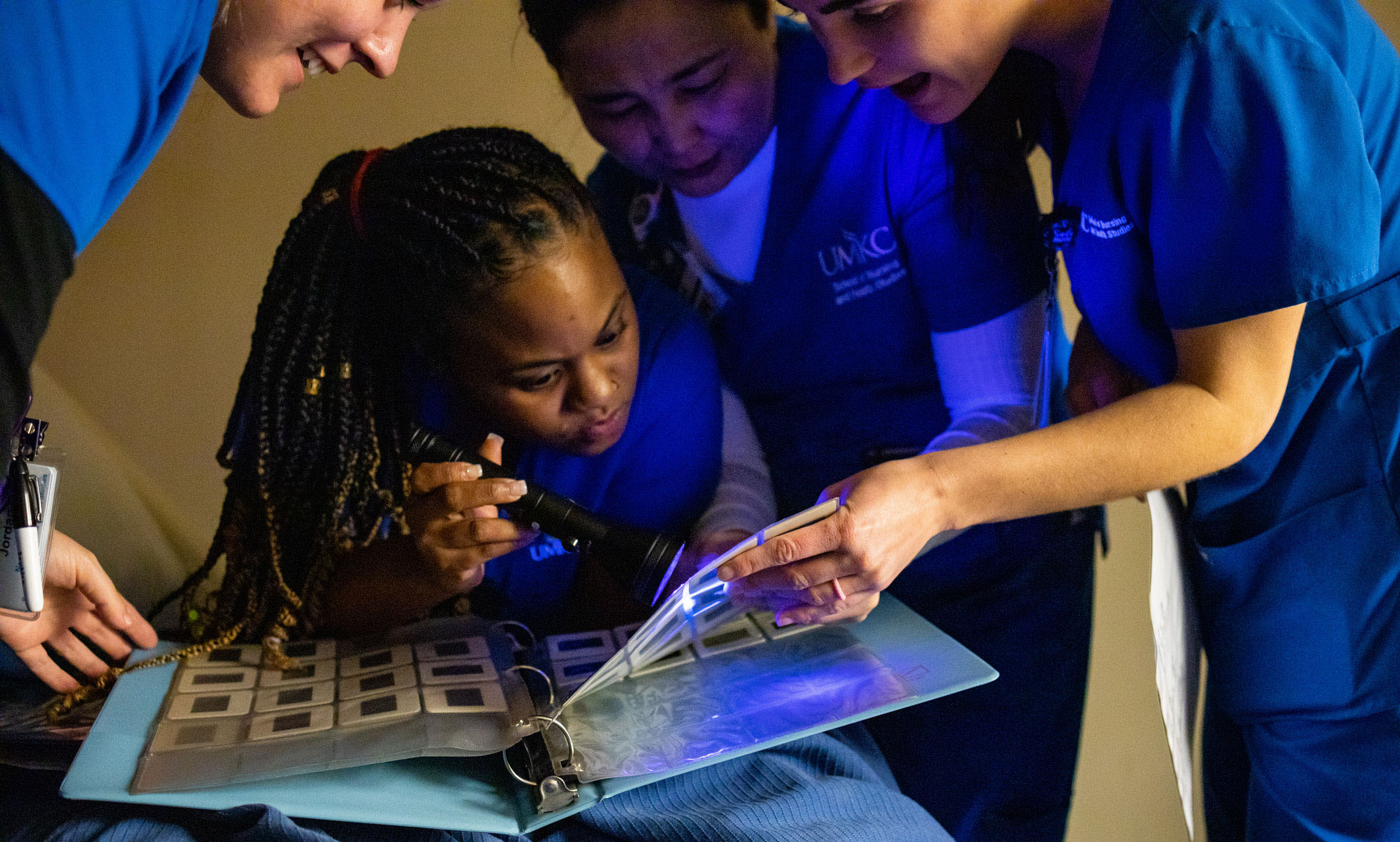
Simulation lab trains future nurses to provide care under pressure
For Christine Zimmerman, R.N., Ph.D., everything is a teachable moment for her nursing students, even escaping zombies. As director of clinical simulation at the UMKC School of Nursing and Health Studies, she designs and implements patient scenarios for the school’s simulation lab.
In the latest scenario, Zimmerman combined an escape room experience with a zombie apocalypse. Students solve puzzles and follow clues while competing for the best time to get the medical equipment they need to provide a blood transfusion to their “patient.” To complete the training and escape the room, the students need to complete each task of the procedure, which prevents their patient from becoming a zombie.Over the years, Zimmerman and her team have created a wide variety of simulations for students, from helping a woman give birth to treating gunshot wounds. The simulations are designed to provide students the opportunity to practice their clinical skills and decision-making abilities in a managed environment that reduces some of the pressures involved in a traditional clinical setting. In the simulation lab, students can focus on the training at hand without the worry of keeping a patient alive or navigating interpersonal dynamics of coworkers.The lab, on the fourth floor of the UMKC School of Nursing and Health Studies, mimics the layout of a hospital, with six patient rooms, a nurses’ station and a medication storage area. The school has nine manikins — models used for medical training that act as patients during the simulations. Zimmerman and her team operate the manikins from a nearby control room in the lab, speaking as the patient through a microphone during the simulation. They take their acting seriously, using different voices and incorporating sound effects.According to School of Nursing and Health Studies Dean Joy Roberts, simulation is a critical experience for nursing students as they progress through the program. “Typically, our undergraduate nursing students are given hands-on experience in hospitals and community health settings,” Roberts said. As an added layer to their training, the simulation lab “ensures that all of our students get experience with certain health issues, while ensuring the patient interaction is as close to real life as possible,” she added.Zimmerman keeps up with the latest advances in nursing simulation education. She said research shows that a competitive gaming environment helps students learn by adding fun while lowering stress. A few years ago, she noticed a growing trend using escape rooms in simulation labs, and decided to try it. Setting it up was a daunting process, she said. She spent almost two years getting it right, and launched it the spring semester of 2023.“We learned that getting the clues together was the hardest part,” Zimmerman said. “You have to think about how each clue builds to the next one, and how the students are going to progress through the steps to solve it.”
As in all simulations, students in the escape room exercise are into divided into groups of four. The groups then compete for the shortest time in finishing the required steps. Competition means the groups need team names picked by the students. “Public Enema” and “N’Syncope” are just two of the many clever team name selections.For nursing student Joyce Young, who is in the final year of the program, the escape room required more teamwork than previous simulations in which she had participated. A former police officer, she was happy to bring her investigative abilities to the team.“With the escape room, I had to really rely on my other team members, and we worked really well together,” Young said. “Everyone brought their own personality and skill sets, because one person’s strength was another person’s weakness.”According to Zimmerman, she focused on blood transfusions because the procedure can be necessary in emergency situations, but also during routine care for a slow bleed or low hemoglobin. The steps never change, and they must be administered in a very specific order. If a student team competing for the best time during the exercise misses a step, a minute is added to their overall time.
Zimmerman said students don’t often get experience with blood transfusions during clinical rotations. “With this simulation, they tell us they feel more confident with the procedure, and have at least received hands-on experience that makes them feel more prepared to address the issue when it comes up during their nursing career,” she said.When Zimmerman and her team started testing the zombie escape room simulation, they were surprised that they needed to create many rules about what the students can and can’t touch.“The students went absolutely insane,” Zimmerman said. “They were going through the sharps (needle disposal) container, digging in the trash and climbing up on sinks to lift up ceiling tiles.”Since the students are competing for the best time, Zimmerman wanted to limit distractions. She’s added a list of what’s in play for the escape room and what’s off limits. Although it helped to keep the students on task, mishaps still occur occasionally. For the blood transfusion, students are required to transfer fake blood from an IV bag through tubing connected to the patient. Clamps on the tubing help control the flow of blood.
“One group who was running out of time, started opening all the clamps to speed things up,” Zimmerman said. “Blood was running everywhere in the room; it was absolute chaos.”
After each simulation session, Zimmerman sits down with the students to debrief, evaluating what went right and what could be improved. For the escape room, she uses the time to focus in on the lessons in each clue and puzzle. In a recent debrief, she praised the group on how quickly they picked up that certain letters were underlined on the back of the IV bag.
“I like to talk about their focus on the small details, because there are so many things in health care that you have to be attuned to,” Zimmerman said. “Your patient can say something that seems tiny, but could be part of the bigger picture.”
The escape room simulation challenges the students to put a puzzle together to see the big picture. When it comes together, it’s one of Zimmerman’s favorite moments.
“I love listening to them when they solve a clue and scream in the room,” Zimmerman said. "It absolutely makes me happy if they have a good time and are engaged.”
Sep 15, 2023
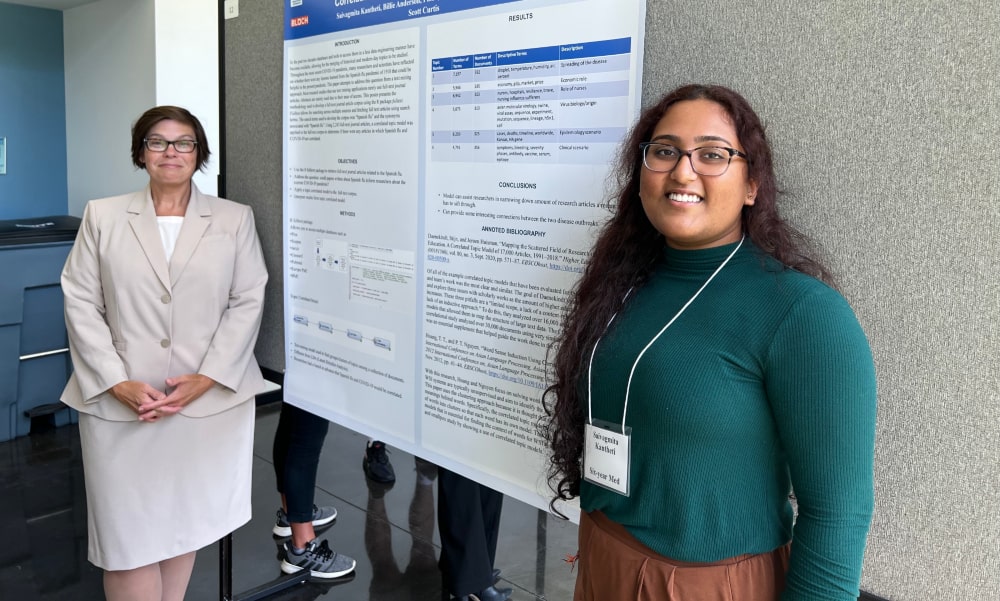
Undergraduate Research Success Inspires Additional Projects
UMKC offers a unique undergraduate experience for students looking to get involved in research projects across all academic units.
Through several different programs and grants, Roos can take part in meaningful research that can not only improve their resumes, but give them skills and tools they can use in the future.
Medical student Vagmi Kantheti received a Summer Undergraduate Research Opportunity (SUROP) grant in 2022 where she worked with Billie Anderson, Ph.D., assistant professor of applied statistics, Majid Bani-Yaghoub, chair of the mathematics and statistics department and Scott Curtis from the UMKC library to develop a corpus of full-text journal articles related to the Spanish flu of 1918.
“It has been a real pleasure to work with and introduce our undergraduate students to a research project,” Anderson said. “Many undergraduate students are not aware of all the details and hard work that goes into a research project. By working with undergraduate students, it allows them to obtain exposure to another part of university life that they may not always be exposed to. This exposure to undergraduate research could spark interest in a student to attend graduate school. Students get to experience meeting deadlines, following specific instructions, and creating a final product, all of which will assist them in their professional careers. “
The project, which is divided into two parts, went on to be presented at regional and national conferences. The first part, which focused on developing the methodology for using the statistical language R, was presented at the Mathematical American Association Missouri Section meeting in April 2022. This work was also published in the Journal of Information Science.
“I am so happy for Dr. Anderson who has been working very hard at this project and many others and believe she very much deserves to be published and recognized for her work,” Vagmi said. “I am very happy with the outcomes of my work and am so grateful that she decided to let me be a part of this work.
”The second part of the project entailed applying a textmining algorithm to determine any connection or “lessons learned” from the Spanish flu that could be applied to the COVID-19 pandemic using a text mining model. That research was presented at the Joint Statistical Meetings of the American Statistical Association in Washington, D.C. in August 2022.
“Dr. Anderson was truly an amazing mentor and she helped me be not as fearful of doing further research in fields that I have better knowledge in, like biological research,” Vagmi said. “It was clear that the people I worked with were very capable and were more than willing to help me grow as a part of the research team. Dr. Anderson even let me make and present the work that I did in a math and statistics conference that was held on UMKC campus.”
SUROP recipients present their findings every year at the Symposium of Undergraduate Research and Creative Scholarship. It gives each student, like Vagmi, the opportunity to share their projects among their peers and colleagues.
The success of the project through SUROP inspired Billie Anderson to put together a group of undergraduate Bloch students and lead a summer project to put together another corpus focusing on reject inference.
“Before this summer, the idea of undergraduate research was very intimidating to me. And, with no prior experience, my only hope was to learn more about research and what it looks like at UMKC,” Hunter Meisner, a student who worked on the research, said. “Not only did I achieve that, but I achieved it with help from the people here at UMKC.”
Anderson received $8,000 in funding for the project to be split up amongst four students, $2,000 each, as part of a Strategic Investment in Applied Statistics grant from the Office of Undergraduate Research and Creative Scholarships.
The corpus of over 100 documents will be used to then develop a literature review of the loan outcome status for rejected applicants, in turn developing a credit score model without bias of only accepted applicants.
The consolidation of the information and documents will allow for a text mining model to be used to uncover potential areas where more research on rejected applications is required.
The opportunity to conduct undergraduate research provides students with valuable experience where they can learn and develop research skills than can help them in the future.
“While I am not a finance major, this experience was incredibly valuable because it was my first time conducting undergraduate research,” Meisner said. “But, more than a learning experience, it was an opportunity to show myself and others that I can contribute to the world of academia.”
“If you don’t take opportunities that are in front of you, you may miss out on future opportunities,” Cody Harman, who participated in the research, said.
Sep 15, 2023
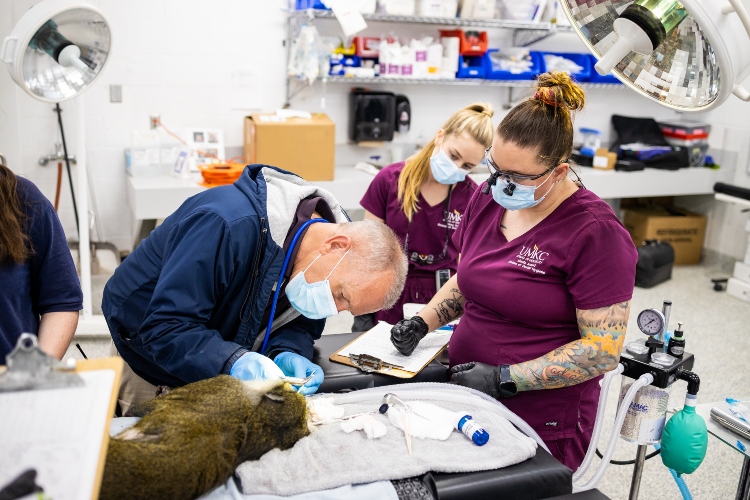
UMKC School of Dentistry offers clinical experience at the Kansas City Zoo and Aquarium
Macila Arnold knew it was an unusual day for her as a UMKC dental hygiene student. First off, the day started at the Kansas City Zoo and Aquarium.
“We came in to work on some swamp monkeys,” Arnold said.
“We got to watch the doctors do their annual visits, do the physical with swamp monkeys and then we got to scale and clean their teeth, and polish them up, just like we would with our human patients.”
Arnold is taking advantage of an opportunity with the UMKC School of Dentistry. Through a partnership with the Kansas City Zoo and Aquarium, the dental hygiene program offers students the Zoo Practicum.
Each spring semester, senior dental hygiene students like Arnold, who was joined by her classmate Sidney Dennis, spend time cleaning the teeth of all kinds of zoo animals.
“The experience has been very unique. I know it’s something that I’m never going to forget,” Dennis said.
The collaborative partnership between the School of Dentistry and the Kansas City Zoo and Aquarium started in 1994. Dr. Wm Kirk Suedmeyer, the Zoo’s director of animal health and conservation research, sees great value in the expertise the students provide.
“It really helps, and they do a good job providing good dental hygiene for our animals,” Suedmeyer said.
The UMKC School of Dentistry provides students with a wide variety of clinical experiences across the Kansas City metropolitan area and beyond. “We have different rotations here at the School of Dentistry: We go out to local elementary schools to give fluoride and sealants and do all kinds of screenings with them,” Dennis said. “There’s a lot of real-world opportunities at the School of Dentistry.”
Originally from Springfield, Missouri, Dennis appreciates how much of Kansas City she’s seen through her rotations.
“Being able to get involved in the community through hygiene has been just so much fun,” she said. “I’ve loved my experience here in Kansas City.” All that time in the community helped Arnold find her niche of public health within the dental field.
"Kansas City has definitely been our classroom by giving us the opportunity to go outside the School of Dentistry and just our patients. We get to go out and do the rotations where we get to go out and work with a diverse population." — Macila Arnold (B.S.D.H. '23)
“I feel like having that exposure and getting to work in the Kansas City area has helped me find my own passion within dental hygiene.”
Sep 12, 2023
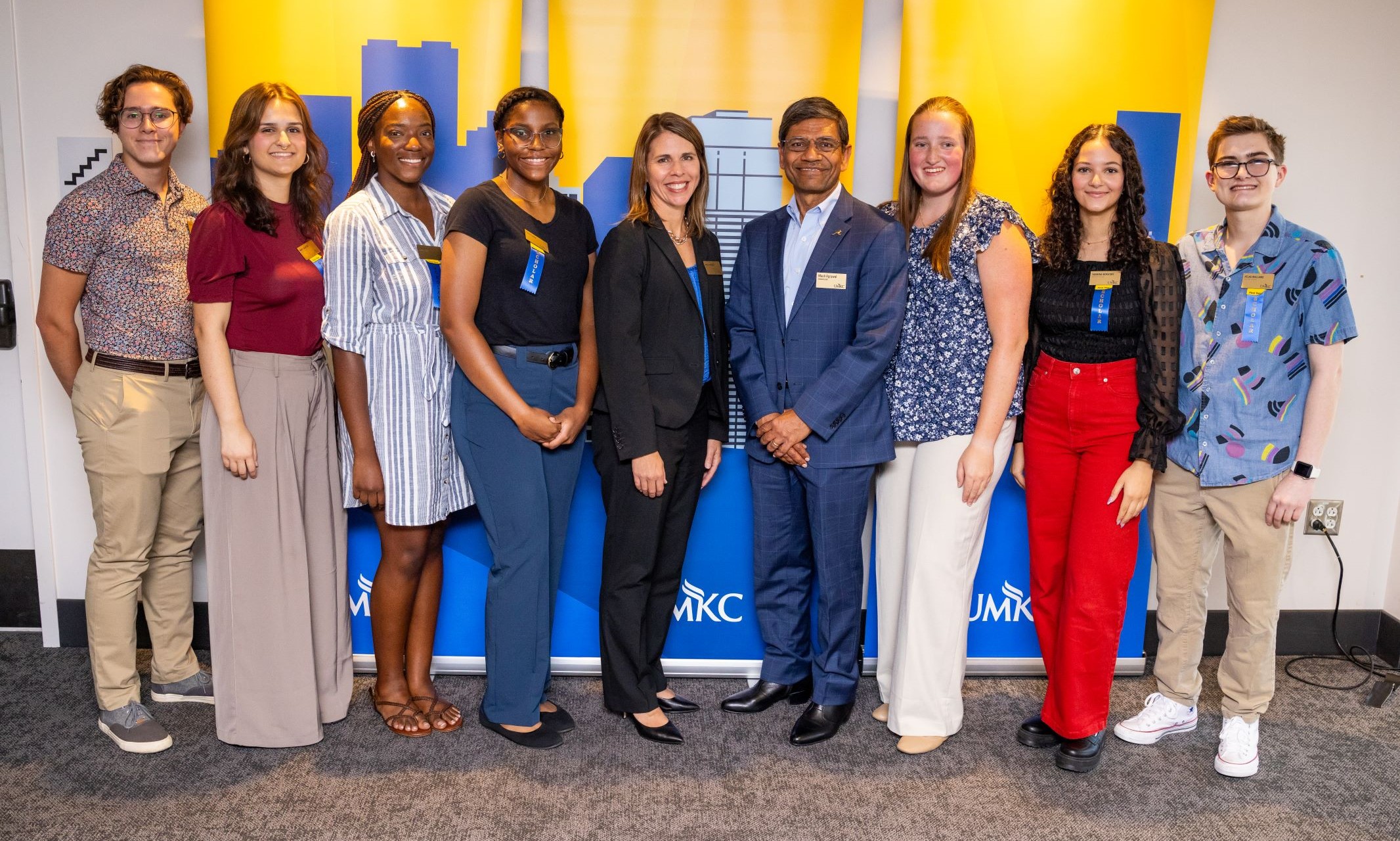
Prestigious program for outstanding scholars launches college careers
The newest class of UMKC Trustees’ Scholars took their first steps toward outstanding college careers and bright futures at their welcome reception. The seven recipients were part of a pool of 200 applicants, and many will become campus leaders.
The UMKC Trustees’ Scholars Program provides a fully funded educational and experiential program for a select group of first-time students at UMKC. The scholarship is a collaboration between the university and the UMKC Trustees. The program gives students access to UMKC Trustees’ knowledge, experience and mentorship as well as specialized guidance from key UMKC staff.
UMKC Trustees Chair Debby Ballard welcomed the scholars at a reception August 18.
“The Trustees’ Scholars program is very close to my heart,” Ballard said. “I have mentored two scholars in the past, and I am currently a mentor to a scholar who is a dance major at the Conservatory. Meeting with my scholars was always inspiring. I learned a lot from their perspectives, and their optimism and enthusiasm are uplifting.”
Suzanne Shank, chair of the Trustees’ Scholars Committee, serves as a mentor.
“The scholars program is the signature program of the Trustees,” Shank said. “The students we are celebrating today were handpicked from almost 200 applicants who represented the best of the best in our region. We know they will be extraordinary representatives of the Trustees, the program and the university.”
UMKC Provost Jennifer Lundgren welcomed the incoming scholars.
“You are now part of the Roo family,” Lundgren said. “Being a Trustees’ Scholar is an incredible and unique opportunity that few students are awarded. The connections you’ll make and the rigorous course work you will undertake, will help prepare you to shine in the careers you’ll pursue when you graduate.”
Lundgren assured the scholars’ parents that they were in the right place.
“Thank you for getting them here,” she said. “We have developed a culture of care that will help them build resilience and responsibility. I assure you, that if they need someone, I’m here.”
Each student had the opportunity to share their story of what brought them to UMKC and their aspirations.
Laila Atkins
Atkins is from Grandview and is studying political science. Driven and focused, she feels fortunate to have the opportunity to be a Trustees’ Scholar at UMKC and getting to know the other scholars. While she’s a little nervous, she’s excited to challenge herself. Her Trustee mentor is Donald Maxwell, an attorney with his own private practice.
Maisy Blanton
Blanton is from Benton, Kansas and is studying communication and digital media, with a minor in race and gender studies. In high school, Blanton wrote an essay about being queer for Young Queer America and received pushback from the school board. She chose UMKC because of the loving and supportive atmosphere. She is preparing for a career in public relations and journalism. Her Trustee mentor is Steve Doyal, a retired executive with Hallmark Cards.
Andrew Custis
Custis is from St. Louis and is studying earth and environmental science. When he toured campus, he met faculty who had worked in Africa at Lake Chad and another who had studied volcanology and geology. “I valued the effect I could have on the world. That’s why I chose UMKC.” His Trustee mentor is Kyle Vena, vice president of new campus development with the American Royal Association.
Atlas Mallams
Mallams is from Liberty and is studying computer science with a minor in sociology. “When I visited UMKC I had a feeling of community. I felt safe and welcome. I could see the school welcomed diversity and different economic backgrounds. Also, there’s a Cheesecake Factory down the street!” Their Trustee mentor is Leigh Anne Taylor Knight, executive director and chief operating officer at the DeBruce Foundation.
Yasmina Mokhtar
Mokhtar is from Joplin and is studying sociology and Spanish. She has a small hand-embroidery business and plans to go to law school. Her family is Muslim and from Egypt, and the diversity at UMKC was appealing. “I wanted to meet other people of color,” she said. Her Trustee mentor is Heather Humphrey, senior vice president, general counsel and corporate secretary at Evergy.
Alexis Reed
Reed is from Kansas City and attended school in the Center district. She is pursuing a degree in biology, with an interest in pathology; she is minoring in Spanish. She chose UMKC because she wanted to be close to her home and family. “And I love the diversity,” she said. “I like to learn about new people.” Her Trustee mentor is Joseph Reuben, chief medical officer at Menorah Medical Center.
Micaela Richards
Richards is from Lee’s Summit and is pursuing her degree in business administration, with a minor in political science. She was DECA president in high school and is proud of her work ethic. She plans to pursue a career in law. “I chose UMKC because I felt heard.” Her Trustee mentor is Donna Ward, senior vice president of the administrative services division at the Federal Reserve Bank of Kansas City.
Sep 11, 2023
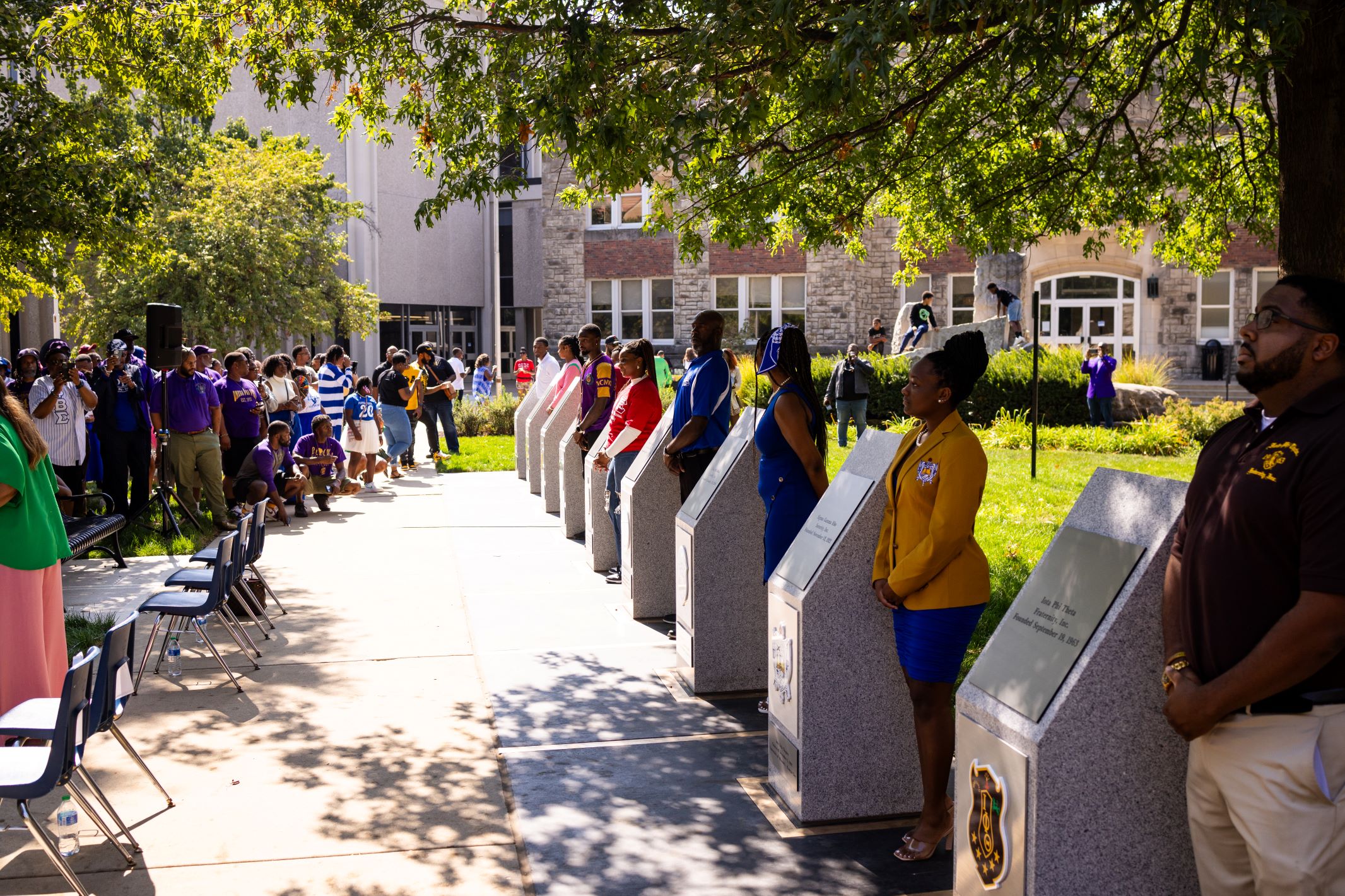
Placement in the heart of campus reflects an environment of invigorating multiculturalism, globalism and inclusion
The University of Missouri-Kansas City celebrated the new Divine Nine gardens in the heart of campus with a ceremonial unveiling.
Hundreds of people from across the Kansas City region representing the Divine Nine Black Greek organizations that make up the National Pan-Hellenic Council gathered in the Quad, proudly dressed in the colors – crimson, emerald, gold, royal blue, black and beyond – that represent their fraternity or sorority.
A tribute to the contributions and presence of the Divine Nine fraternities and sororities, the garden is also a gathering place for students and alumni to reflect on and celebrate the achievements of their respective organizations.
For more than a century, the Divine Nine have championed progress, tackling challenges from civil rights to racial justice and leadership cultivation. Those who are members of this council know their membership goes far beyond college years, offering lifelong chances for networking and leadership.
“I am humbled to be here today to share in and witness the unveiling of the UMKC Divine Nine Garden monuments,” said Michele Smith, Ph.D., vice provost for Student Affairs and dean of students.
“The UMKC Divine Nine Garden celebrates the work of our hands and the legacy of kinship, allyship,
interdependence and impact the Divine Nine inspires across our campus and within our communities.”
Groups stood next to the tall granite monument emblazoned with the Greek letters of their organization.
Alpha Phi Alpha Fraternity
Alpha Kappa Alpha Sorority
Kappa Alpha Psi Fraternity
Omega Psi Phi Fraternity
Delta Sigma Theta Sorority
Phi Beta Sigma Fraternity
Zeta Phi Beta Sorority
Sigma Gamma Rho Sorority
Iota Phi Theta Fraternity
Increased visibility of the Divine Nine organizations was one initiative developed with Chancellor Mauli Agrawal’s work with student leaders in the African American Cultivating Excellence Program to generate positive change on campus. Contributions by the Sunderland Foundation, the UMKC NPHC students, the Chancellor and Provost offices, Hollis and Miller Architects, among others, supported the conception and creation of the garden.
“Establishing this garden on the Quad – the very core of our campus – is symbolic of our recognition of these important fraternities and sororities, their significant national contributions, across the Kansas City area and here at UMKC,” Agrawal said. “We are proud to commemorate the opening of the Divine Nine Garden, with recognition for each organization.”
Calvin Flemons, Alpha Phi Alpha Delta Rho chapter president, addressed the crowd and recognized the support of the UMKC community in the garden’s creation.
“I speak for us all when I say, with so much gratitude and joy in our hearts, that being a part of this history at UMKC will be unforgettable,” Flemons said. “So let it be known that today and for years to come, NPHC will continue to make an impact on this campus and in our community.”
Keichanda Dees-Burnett, assistant dean of students and director of Multicultural Student Affairs, expressed her pride in being a Divine Nine member and a UMKC alumna.
“When I reflect on my experiences as a UMKC Black Greek alum and staff member, I am proud to have been able to contribute and witness how far our university has come,” Dees-Burnett said. “The campus has grown and there are now so many more people and spaces where Black students can find their sense of belonging. Starting today, the Divine Nine Garden will serve as an additional space and a symbol to current and future African American students at UMKC that they belong here.”
Following the dedication, participants visited the Miller Nichols Library and Learning Center lobby to view, “Legacy in Bloom,” a Divine Nine exhibit designed to coincide with the opening of the garden, which showcases each of the nine Greek organizations’ history and their connection to UMKC. The exhibit will run throughout this academic year ending in May. It is on display in the lobby of Miller Nichols, as well as on the fourth floor in the Dean’s Gallery.
Sep 11, 2023
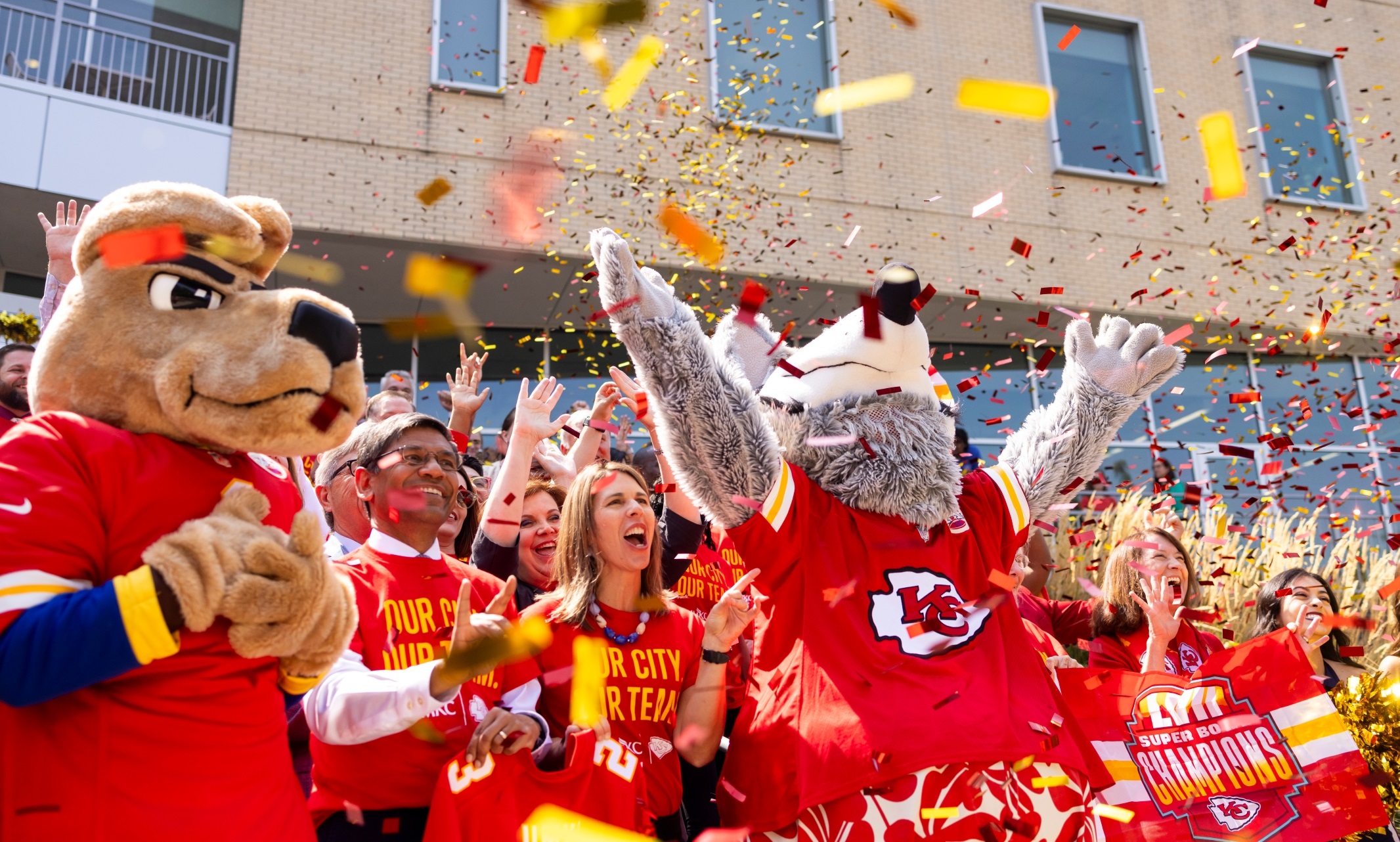
Five-year partnership centers on student recruitment, scholarships and success programs
The University of Missouri-Kansas City announced today that it is an official higher education partner of the Kansas City Chiefs, the 2022 World Champions.
“Kansas City’s university is thrilled to join with Kansas City’s football team to bring exceptional real-world learning experiences to our students,” said UMKC Vice Chancellor of Strategic Marketing and Communications Anne Hartung Spenner. “There is great forward momentum in our city and our university, and we look forward to building on this continuing wave of excellence in our community through this partnership.”“We’re very excited to roll out this new education partnership with the administration, faculty, staff and students at UMKC,” said Chiefs Vice President of Partnership Strategy and Development Kim Hobbs. “We think the relationship between the team and the university will present extremely unique opportunities and access for their students moving forward and will reinforce the idea that Roos should ‘Never Choose the Norm.’”The five-year partnership between UMKC and the Kansas City Chiefs focuses on student success and recruitment efforts. Opportunities for UMKC students include scholarships as well as leadership, mentorship and career-shadowing within the Chiefs organization. Events for prospective students include stadium tours and other programs.The partnership between the two organizations - both pillars of the city - is a natural one. Each founded by innovative entrepreneurs and pioneers - William Volker (UMKC) and Lamar Hunt (Chiefs) - the two organizations each have worldwide stakeholders. UMKC attracts students from more than 75 countries and the Chiefs’ fanbase spans the globe.
The Chiefs and UMKC also share many connections through alumni, students, faculty and staff, including:• Amy Patel, M.D., professor of the UMKC School of Medicine and an alumnae, was the 2022 Kansas City Chiefs NFL Fan of the Year.• Chiefs Safety Justin Reid created a coding camp hosted this summer at UMKC.• Union Station is the site of Chiefs fandom in large part thanks to UMKC alumni George Guastello, its chief executive officer, and Michael Tritt, its chief marketing officer.• Jerry Blanton, associate director of UMKC Student Union, is a former Kansas City Chiefs linebacker and his son, Kendall Blanton, was a member of the Chiefs in the most recent Super Bowl.• Numerous UMKC alumni work for the Chiefs including Ishmael Shumate (BBA ’20, MBA ’22), philanthropy and community programming coordinator, or have worked for them, including dental hygienist Ashley Hobbs (B.S.D.H. ’11), who was a Chiefs Cheerleader.To commemorate the new partnership with the Kansas City Chiefs, UMKC is planning a campuswide celebration Sept. 7 ahead of the season opener that evening, and a Red Friday Roos Tailgate on Sept. 22.Yet another thing the two organizations have in common: mascots named for their beloved hometown. Both KC Wolf of the Chiefs and KC Roo of UMKC will attend the celebrations.Earlier this year, Kansas City’s university entered into a partnership with another city favorite, the Kansas City Zoo & Aquarium. The five-year partnership funds improvements to the Australia new habitat, where kangaroos live, and provides learning opportunities from UMKC students. The university’s mascot was inspired by kangaroos at the zoo, and the classic Roo was drawn by Walt Disney. UMKC also is a longtime partner of Sporting KC, and the campus community has enjoyed that relationship for more than a decade.
Sep 06, 2023
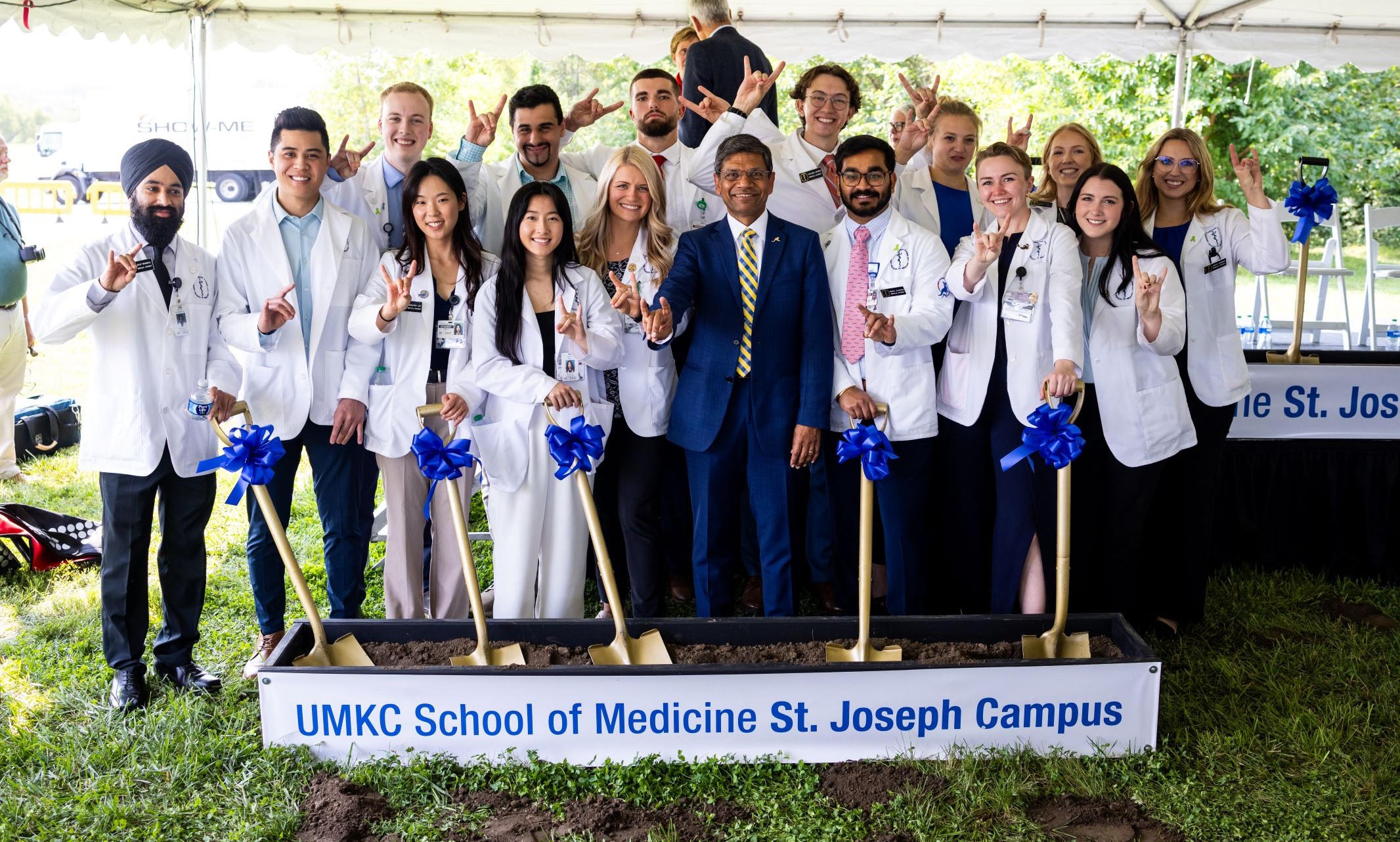
The expanded footprint in St. Joseph, Missouri is designed to train rural healthcare providers
The University of Missouri-Kansas City broke ground on a new $14.5 million medical building for its School of Medicine campus in St. Joseph, Missouri.
“Through our investments in the St. Joseph campus, UMKC is answering the call to help ensure all Missourians have access to the health care they deserve,” said UMKC Chancellor Mauli Agrawal. “Today’s groundbreaking ceremony marks a catalyst in our state and region that will be felt for decades to come.”
The 22,000-square-foot building will transform healthcare access for Missourians by training future healthcare providers who are committed to rural medicine, supporting research and providing care to people in St. Joseph and the surrounding area.
The building will feature the latest medical teaching and learning technology. There will be four exam rooms designed to simulate real-world patient interactions and dedicated study and meeting spaces to support student collaboration. It’s expected to open in 2025.
Rendering provided by Clark & Enersen
“The physical environment for medical students is important: Using cutting-edge architecture and technological best practices, this new building creates physical spaces that advance active learning, teamwork and interdisciplinary collaboration,” said UMKC School of Medicine Dean Mary Anne Jackson. “This campus will give UMKC the tools to train hundreds of talented medical professionals so that they can go on to provide the highest-quality care to our neighbors throughout Missouri.”
Missouri is facing a severe physician shortage, with nearly half of the rural counties in the state lacking adequate access to hospital healthcare. Research shows medical students who have experience in rural medicine during their residency programs are more likely to practice medicine in rural settings.Physicians who practice in rural areas face numerous challenges. They care for a population of patients with increased risk for many conditions compared to urban and suburban patients, Jackson said. These include higher levels of chronic diseases such as COPD and heart failure, addiction and cancer diagnoses. At the same time, rural physicians encounter limited access to needed specialists, including cardiologists, oncologists and addiction specialists. To help fill healthcare gaps, the UMKC School of Medicine partnered with Mosaic Life Care in 2021 to train physicians at its St. Joseph location, but the program has since outgrown its space.“We are excited to see our partnership with the University of Missouri-Kansas City School of Medicine grow and prosper on our St. Joseph campus,” said Chief Executive Officer Mike Poore, Mosaic Life Care. “We have the opportunity to shape the future of rural healthcare and address the shortage of physicians in our region. This extended footprint for the UMKC School of Medicine bridges that gap, especially knowing that students training in rural programs are three times as likely to remain in practice in those areas.” The new building will incorporate design elements to symbolize the statewide impact of the UMKC St. Joseph campus. A large artistic map will be installed near the entryway, pinpointing UMKC medical program partners throughout Missouri and Kansas. This installation is meant to showcase the strength of the existing system and will include the ability for UMKC to add future partners as it expands its rural education network.So far in three years of the UMKC School of Medicine program in St. Joseph, students have logged 19,764 clinical contact hours in medically underserved areas. In addition to Mosaic, they have practiced in other clinics in St. Joseph, Albany, Cameron, Chillicothe, Maryville and Mound City, Missouri.Emma Smith is part of the program’s first cohort of students. She said doing rotations in Chillicothe gave her unique experiences in understanding and overcoming barriers to care in rural areas.“I have learned so much during my time at UMKC, and some of my strongest learning experiences have been during my rural family medicine and internal medicine rotations,” Smith said. “Expanding the UMKC School of Medicine St. Joseph campus is a benefit to the region because it provides additional resources for students to live, work and train in a community with unique patient needs.”This new medical education facility represented strong support and help from federal and Missouri leaders. Of the total $14.5 million cost, $13 million was designated from federal funds and $1.5 million came from state funding. Former Senator Roy Blunt was instrumental in championing federal funds for the new building in a 2022 spending bill, which also included $2.5 million for the UMKC School of Medicine to expand its behavioral health training at the St. Joseph campus.
"Missouri is facing a physician shortage, creating major challenges for rural communities," Blunt said. "As the former chairman of the appropriations subcommittee that funds the Department of Health and Human Services, I was a strong advocate for the UMKC School of Medicine St. Joseph campus expansion and its important work in training physicians who will be uniquely qualified to provide care where it's needed most. I am glad to see UMKC breaking ground on the new building today that will strengthen our rural communities by providing quality care to families in underserved areas across the state."
In addition to the contributions from Blunt, Missouri State Rep. Brenda Shields was instrumental in the creation of the UMKC School of Medicine St. Joseph campus and spoke at the groundbreaking event. “It has been exciting to be involved in this project from the very beginning. When I spoke to the students at the first white coat ceremony and heard their passion for rural medicine, it was clear to me we were accomplishing what we set out to do—to bring better healthcare to rural Missouri,” Shields said. “This school will be the premier location for rural medical training in the United States, and it is right here in northwest Missouri.”
UMKC has a strong history of expanding access to rural healthcare education programs in Missouri. In addition to the School of Medicine program, the university operates satellite campuses for the UMKC School of Pharmacy at the University of Missouri in Columbia and Missouri State University in Springfield.
Here's what other supporters who spoke at the groundbreaking event had to say:
“This expansion is a game changer for rural healthcare in the region," said U.S. Congressman Sam Graves, a sixth-generation family farmer who grew up in northwestern Missouri. "Healthcare access in north Missouri depends on the availability of rural doctors. If we want more rural doctors, we need more rural training. I’m thrilled that UMKC and Mosaic have come together to make this happen in St. Joseph and I can’t wait to see the impact this will have on north Missouri.”
“This is a textbook case of how our communities and the University of Missouri System should be collaborating," said Michael Williams, chair of the Board of Curators. “These partnerships will lead to improved healthcare across the state, and that means a better quality of life for every Missouri citizen.”
“This project is a tremendous example of how the University of Missouri System is transforming our state’s critical workforce and supporting rural health,” said University of Missouri President Mun Choi. “The new campus will increase access to essential care for all Missourians while preparing the next generation of providers to serve close to home and address the shortage of rural health care providers.
Aug 28, 2023
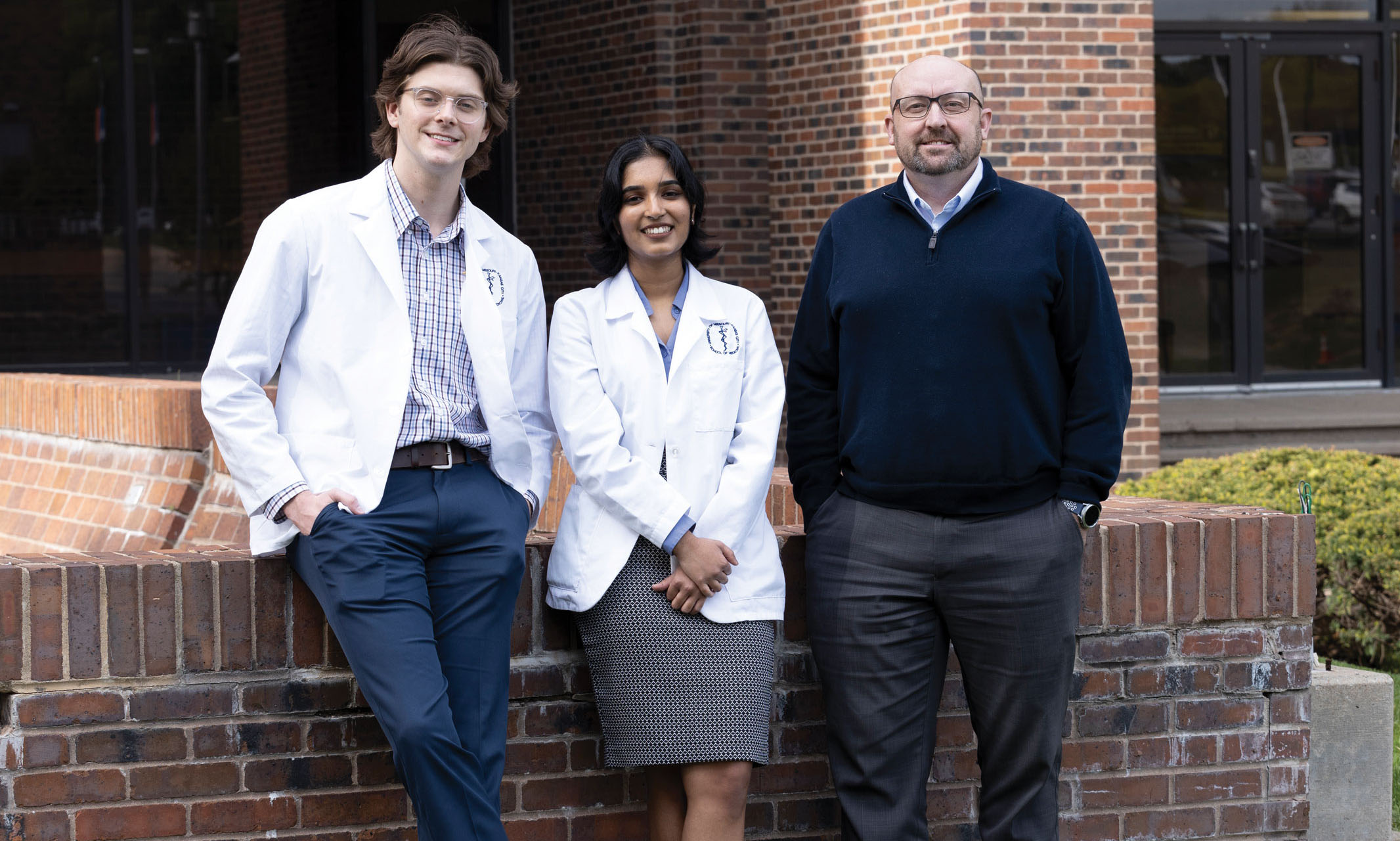
UMKC medical students continue school’s tradition of earning prestigious NIH research fellowships
As the pace of medical research continues to escalate, the UMKC School of Medicine has kept up, placing students nearly every year in the past decade in distinguished National Institutes of Health (NIH) programs.
Again this year, two UMKC School of Medicine students have been accepted to the yearlong NIH Medical Research Scholars Program. The highly respected program is also quite competitive, as only 40 to 50 students are chosen from accredited institutions across the U.S. and Canada for this rare opportunity to train at the largest biomedical research facility in the world.
“These programs help shape the futures of our medical students and make them highly competitive for the best residencies in the nation,” said Michael Wacker, Ph.D., associate dean of academic affairs. “Students returning from these programs are also more highly trained in research, which is valuable for faculty working with them on projects.”
This year’s fellows from UMKC will begin their NIH program this summer. Both share a passion for healing and helping others.
Manasa Gadiraju plans to be a cardiothoracic surgeon and pursue research aligned with her specialty.
“I like that medicine combines science with interpersonal relationships to improve people’s lives,” said Gadiraju, who will graduate in 2025. “As a doctor, I want to be a leader in my field, work with a team and provide a constant source of support for my patients.”
The NIH program can open doors of opportunity that speak to Gadiraju’s and other fellows’ dreams and aspirations.
“I’d love to do something involving translational therapies for congenital heart conditions and work with stem cells,” Gadiraju said. “The (program) is a perfect complement to my overall career goals. At the NIH, our mentors are physician-scientists, so we learn from the best. This fellowship will be a crucial step in preparing me for my career.”
UMKC’s other Medical Research Scholars Program fellow, Jacob Tribble, also will graduate in 2025.
“My interest in medicine stemmed from biomedical classes in high school,” said Tribble. “I loved math and science and knew human connections would be an important part of my future career. The ability to help people is an amazing privilege and responsibility.”
With plans to eventually work as a physician-scientist at an academic institution, Tribble looks forward to the spectrum of possibilities offered by the NIH. He’ll spend much of his time this summer in their Division of Cancer Epidemiology and Genetics, where he’ll be researching cancer in immunocompromised people and those living with HIV.
“Research and teaching are both aspects of medicine I love and want in my future,” Tribble said. “One aspect of the program that attracted me was that they offer free classes through the FAES (Foundation for Advanced Education in Sciences) graduate school. These courses range from covering applications of artificial intelligence to advanced cancer biology and the neuroscience of addiction.”
Student Research Programs
In 2014, the UMKC School of Medicine launched an initiative to introduce an array of research opportunities to its students. This initiative began as a conversation between then-dean, Steven Kanter, M.D., and Wacker.
“Our students have always looked for unique and challenging opportunities to learn and train,” Wacker said. “We formed a research group, created a webpage and mentored students who participated in these year-long and summer research programs.”
In that inaugural year, only a few students applied. Since then, the number of accepted applicants has increased exponentially.
During the past nine years, more than 100 UMKC medical school students have participated in nearly three dozen research programs with universities and medical organizations around the world. Nearly 40 of these have been NIH programs, including its Clinical Research Training Program, the Summer Internship Program in Biomedical Research and the Medical Research Scholars Program.
“Initially, students were hesitant to take a year off and extend their graduation,” Wacker said. “But as I talk with students and participants who’ve come back and shared their experiences, they realize what a difference this opportunity can make in their careers.
“Every year, I offer a seminar detailing these programs, and we help students through the application process. As our participation increases, there’s more awareness about the value of these programs, and the enthusiasm grows.”
Gadiraju’s enthusiasm reflects that of her fellow NIH program participants.
“I’m so excited to spend a year improving my research skills at the NIH,” she said. “I applied to this program because I want to learn to think more scientifically, create and implement study designs and gain hands-on experience working with some of the best scientists in the world.”
Tribble shares Gadiraju’s excitement.
“I applied to this program because research is a career goal, and the NIH is one of the most robust research institutions in the world,” he said. “The resources and training they provide are unmatched, and living on the NIH campus with students from medical schools across the country will be a once-in-a-lifetime opportunity.”
The NIH Journey: Learn, Discover and Contribute
With an emphasis on biomedical research, NIH programs parallel the School of Medicine’s mission to improve the health and well-being of people through innovative medicine and cutting-edge biomedical science and research.
“The NIH sponsors these programs, in part, to increase the number of physician-scientists conducting research as part of their practice,” Wacker said. “Research training not only helps students become part of the process to create new knowledge but also helps them approach clinical problems with a different mindset and to practice evidence-based medicine.”
During the Medical Research Scholars Program, scholars contribute to groundbreaking solutions through a process known as bench-to-bedside treatment. This approach, in which laboratories are located near patient units, puts research scientists and students near those receiving care. Through collaboration, these teams translate scientific observations and laboratory discoveries into pioneering diagnoses and treatments.
Medical Research Scholars Program fellows receive a stipend, plus expenses, to conduct this research at the NIH main campus in Bethesda, Maryland. This transformational year also helps guide the direction of these future leaders in biomedical research. At the NIH, biomedical research includes behavioral and social sciences biology, chemistry and physics, mathematical modeling, biostatistics and other focus areas.
The program includes seminars by world-renowned researchers who teach not only the science of medicine, but the art of clinical care. Students acquire cutting-edge analytical skills and knowledge while learning from expert, supportive mentors how to lead their own investigations. Workshop topics include work-life balance, written and verbal communication and the critical evaluation of medical literature.
Achieving Goals and Making a Difference
For many participants, the Medical Research Scholar Program also presents an opportunity to define their vision for future service to community and those in need.
Yen Luu (M.D. ’23), who graduated in the spring with a specialty in dermatology, completed an NIH Medical Research Scholars Program in 2022. Experiences early in her life influenced her decision to pursue a medical career.
“When I was growing up, I volunteered with children whose family members had cancer,” she said. “I saw how physicians supported families through their most vulnerable times and created long-lasting, meaningful impacts.”
Luu’s research is focused on skin cancer risk factors among underrepresented communities, in particular those who identify as LGBTQ+. At the NIH, her project examined skin cancers in people living with HIV.
“I applied to the (program) to immerse myself in collaborative research,” said Luu, who will begin her residency at Stanford University in the fall. “The NIH was the perfect place to develop essential research skills of coding, writing and collaboration. My mentor, Dr. Michael Sargen, also sparked my love for dermato-epidemiology and reaffirmed my passion for conducting research that includes underserved communities.”
Benefits of Research Programs
During the NIH programs, research mentors guide scholars, support their work and inspire innovative discoveries. Participants also meet colleagues who become lifetime mentors and friends.
“My biggest goal during the program was to engage in a close mentorship experience, and this goal was far exceeded at the NIH,” Luu said. “I’m incredibly thankful to Dr. Sargen. He not only nurtured my career goals, but also introduced me to fantastic physician-scientists who are now also close mentors.”
Tribble looks forward to similar opportunities for collaboration and connection at the NIH.
“Team science is a concept that’s exemplified at the NIH, and this attitude of collaboration is something I hope to bring to my future practice,” he said. “I believe we’re at our best when we work with one another and take everyone’s thoughts into account. The NIH has created a healthy environment where this is encouraged, and the researchers and mentors I’ve interacted with there are amazing people.”
Wacker believes student research programs deliver positive, far-reaching outcomes for participants, the School of Medicine, the university—and the people UMKC students and graduates care for and serve.
“Ultimately, these students will go on to make significant contributions to the way health care is practiced, and this benefits our entire community.”
Aug 25, 2023
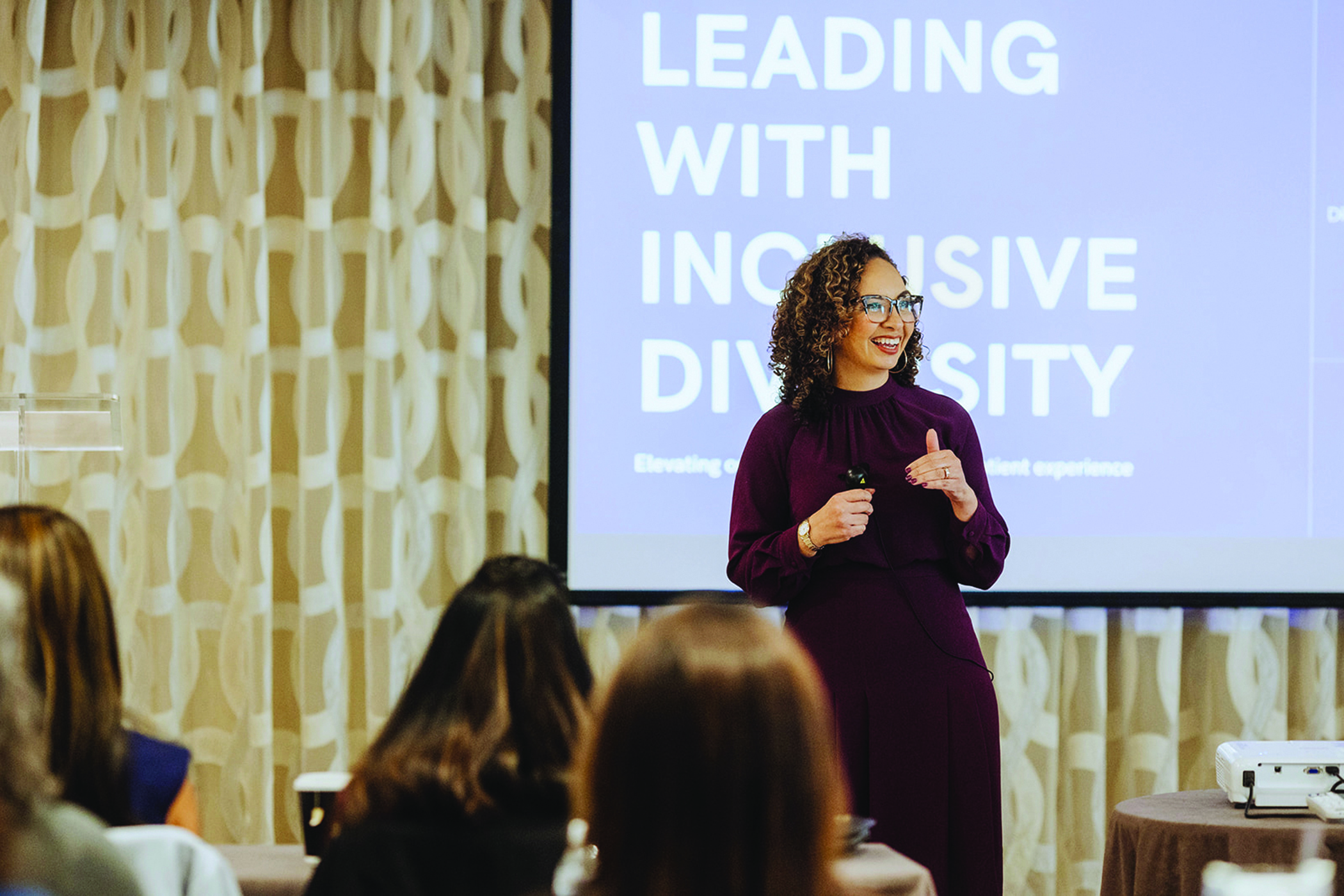
Alumni use their education to open doors beyond the dental clinic
When graduates leave the UMKC School of Dentistry, they’re ready for the rigors that come with working inside a dental clinic. But they’re also prepared for a multitude of other opportunities where they can put their degrees to work. Alumni Nathan Suter, William V. Giannobile and Laila Hishaw may have taken their knowledge in different directions, but they all share the common goal of making a lasting impact on the field of dentistry.
Suter (D.D.S. ’13) wears many hats in his dental career. As owner and clinician at Green Leaf Dental Care in House Springs, Missouri, Suter treats patients one day a week. The rest of the week is filled with his responsibilities as a small business owner, software developer, corporate executive, public health administrator and board member.
“What made me a little different than a traditional dental student was that I had a business degree coming into dental school, and that allowed me to see things differently,” Suter said. “I just like to solve problems. That's probably the biggest thing.”
Suter began his dental career in a community health center, which ignited a passion for population health and strategizing to solve big problems that affect a lot of people. Outside of Green Leaf, he’s also the chief innovation officer for Enable Dental, where he oversees technology and quality assurance for the company, which provides portable dentistry for geriatric and special needs patients across the country.
Suter believes his rotations as a UMKC dental student opened his eyes to the full range of possibilities that come with a D.D.S. degree.
“I didn’t really know there was more to dentistry than private practice until I went on my rotations, and I started really liking public health,” Suter said. “That let me zoom out from looking at dentistry as the tooth and the person attached to it, (and start looking) at an entire population.”
For Suter’s third-year research project in dental school, he worked with Delta Dental, evaluating onsite dental care for companies in terms of portable dentistry and teledentistry. Through that work, he began to see patterns of disparity in dental check-ups related to levels of education.
Michael McCunniff (D.D.S.’83), who was UMKC School of Dentistry’s department chair in Public Health and Behavioral Sciences at the time, helped Suter realize the broader public health ramifications of his research. By making dentistry more accessible through portability and teledentistry, dentists can break down some of the societal barriers to oral health care.
That research became the catalyst for Suter’s consulting work, as many dentists began reaching out to him about the different ways to utilize portable equipment and teledentistry. He also worked with Delta Dental (he is a current board member) to develop software for clinic care coordination specific to dentistry. Enable Dental would go on to acquire that software and bring him on in his current executive role.
Suter’s advice for his fellow alumni is to expand their network beyond the dental clinic.
“Have the courage to put yourself in a room where you’re the only dentist,” Suter said. “Offer yourself up, create a space to listen and see what opportunities come.”
Ivy League Alumnus
As dean of the Harvard School of Dental Medicine, William V. Giannobile (D.D.S. ’91), doesn’t get to practice dentistry much anymore, but keeping up on those skills is still a priority.
“I consider myself a clinician scientist, really trying to bring together translating discovery or basic science into the clinic,” Giannobile said. “And it’s always been important, as a clinician scientist, to continue seeing patients.”
Since his time at UMKC, Giannobile has become a leader in periodontology, with research interests in regenerative medicine, tissue engineering and precision medicine. The seeds for his prestigious research career were planted during his time at the School of Dentistry, particularly by three of the school’s former faculty: Charles Cobb, J. David Eick and George Revere. During Giannobile’s second year in dental school, they urged him to take a research opportunity with the National Institutes of Health. They explained the research would not only help him with his current degree, but could also make him a pioneer in the field of dentistry.
“I was basically the first dental student (at UMKC) to engage in a combined D.D.S. program with a Master of Science in Oral Biology,” said Giannobile. “So, my time at UMKC was certainly a transformative experience that prepared me very well for my time at Harvard University.”
After graduation from UMKC, Giannobile earned a Ph.D. in molecular biology and a certificate in periodontology, both from Harvard, where he was also a faculty member for two years. He left Harvard for the University of Michigan, where he worked from 1998 to 2020. All the while, he continued to advance his research interests. Now that he’s back at Harvard, Giannobile is excited for his future research into patient stratification for losing teeth and using artificial intelligence to identify patients at risk of developing pain after certain dental procedures.
Giannobile is grateful for every opportunity that helped create his path forward.
“When I look back, I feel blessed at how many doors have opened in my career and enabled me to do so many different things,” said Giannobile, who is from St. James, Missouri. “Growing up on the farmlands of Missouri, I never thought I would be able to travel internationally to collaborate on my work.”
Mentoring clinicians of color
A mindless scroll of her Facebook feed is what inspired Laila Hishaw (D.D.S. ’00) to start a national dentistry nonprofit, an effort she claims has rejuvenated her as a clinician.
In 2018, after 18 years in dentistry, burn out began to settle in. One night, while she was scrolling through Facebook posts, she saw a statistic on the racial disparities in oral health. As a Black woman, she felt compelled to do something. She started with her own social media post, just asking if anyone she knew had a child who needed mentorship in dentistry. That one post kicked off a broader conversation among her dental friend group. Hishaw found that many other dentists were interested in mentoring, and there were quite a few parents seeking mentors for their kids. So she created a Facebook group that became a space for parents and students to connect and ask questions with real dentists on topics such as interviewing at a particular school or navigating the application process.
“Once people started getting connected, they started asking about donating and whether it was a nonprofit,” Hishaw said. “Then I realized, I need to make this organized.”
She called it Diversity in Dentistry Mentorships, got the organization incorporated and formed a board of directors. The nonprofit took off from there, and now has 3,370 members and more than 100 mentees. In 2021, the group held its first in-person event for middle and high schoolers, where the students received hands-on experience in dentistry. They invited 30 students to attend the first year and 50 the following year. Although the organization is focused in Arizona for now, Hishaw’s vision is to one day have these pockets of mentorship across the country.
“Mentorship really did reignite my love and passion for dentistry,” Hishaw said. “When you’re talking to mentees, it reminds you of why you (chose dentistry) in the first place.”
Hishaw is proud of the programs and the mentors that helped her get where she is today. Before she was a student at the School of Dentistry, she took part in the Summer Scholars program at the school, now called the STAHR program, which stands for Students Training in Academia, Health and Research. She used her experience with STAHR to help guide her while she was organizing her non-profit’s Youth Summit.
“In STAHR, we had experience with impressions, learning vocabulary and instrumentation,” Hishaw said. “We’re mirroring that, giving our students the same hands-on learning and giving them the realization that they too could be a dentist.”
Many of Hishaw’s former UMKC classmates are now a part of Diversity in Dentistry Mentorships, and some of her own mentors are still at UMKC, including John Cottrell, the school’s director of minority and special programs. While she was a student at UMKC, Hishaw said she was in Cottrell’s office probably every other week. He’s been a sounding board for many of the ideas she has surrounding her nonprofit.
While Hishaw is still a practicing pediatric dentist with multiple locations around Tucson, she acknowledges it’s her passion outside the dental office that’s kept her going.
“This helped me find true joy beyond the four walls of my practice,” Hishaw said. “Our identities as dentists are tied so tightly to being a practice owner, it’s so important for us, as dentists, to have hobbies and outside interests.”
Aug 25, 2023
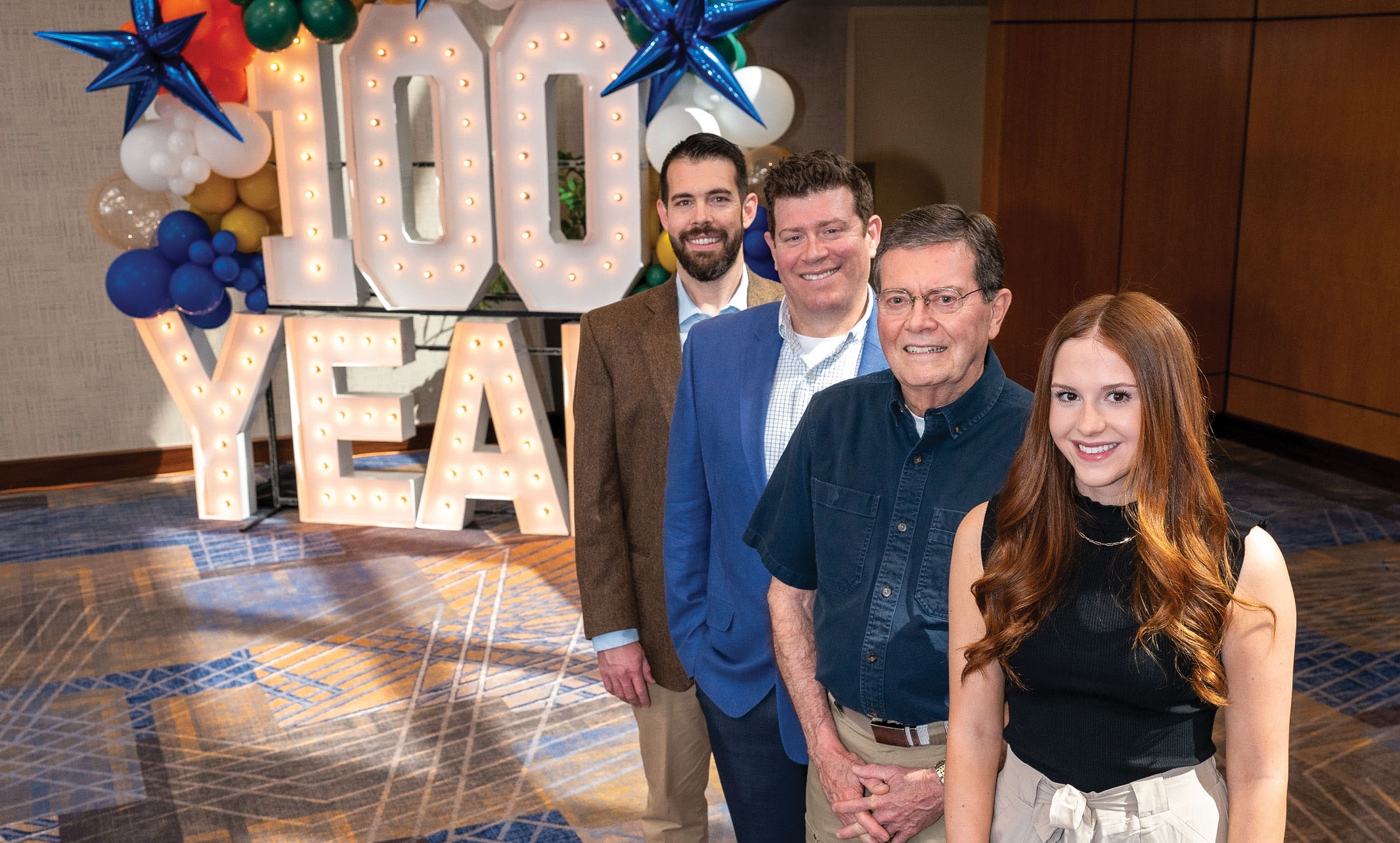
Legacy families come together for centennial celebration
This year at the Midwest Dental Conference, the UMKC School of Dentistry celebrated 100 years of gathering for an annual alumni meeting. For some alumni, their first experience at the conference wasn’t as a dentist, or even as a dental student – but instead, as a kid, tagging along with their parents or grandparents. Those childhood family trips to MDC are often just the beginning of a deep connection with the School of Dentistry that the school’s alumni share.
Mark Mosier (D.D.S. ’85) remembers attending the alumni meetings with his dad, Richard Mosier (D.D.S. ’54), and grandfather, Harry Mosier (D.D.S. 1922), in the 1970s. According to Mark, Harry was close friends with Roy Rinehart, former dean of the School of Dentistry and the namesake of the Rinehart Foundation. Harry liked to tell a story about an alumni meeting in the 1930s where the two friends and their wives were seated together at the banquet. It was a table for six people, but it was just the four of them. Harry looked around and noticed another couple sitting by themselves, while everyone else was cliqued up, lost in their own worlds, catching up with their buddies.
“My grandfather and Dean Rinehart were not the kind of people to ignore others,” Mosier said. “They were very inclusive and social.”
The two men went over and introduced themselves to Albert and Ruth Mizzy, who had traveled to the conference from New York City. They later learned the Mizzys owned a dental supply company that would later become the worldwide manufacturer of medical and dental supplies, Mizzy, Inc. Harry and Roy insisted the couple join their table. The new group quickly formed a close connection.
“They all became great friends,” Mosier said. “The Mizzys would come visit for the holidays, they’d go hunting together. And they came back to that meeting year after year.”
Mark Mosier started attending MDC when he was just five years old. Now 65, this year’s meeting is a special one for him. He attended with his niece Kiralyn Mosier, who graduated from the School of Dentistry in May.
“Kiralyn will be the fourth generation Mosier graduating from UMKC,” Mark Mosier said. “I am so proud she is continuing the legacy we have. We’re all very excited.”
The Samples are another legacy family that had a strong turnout for this year’s MDC. Kyle Samples (D.D.S. ’11) and his brother, Stuart Samples (D.D.S. ’07), are partners at McCoy Samples Mattingly Dental Clinic in Carrolton, Missouri. The two have been attending MDC with their dad, James Samples (D.D.S. ’71), for as long as they can remember.
“I remember going when I was six years old, hanging out with the kids of Dad’s alumni buddies,” said Kyle Samples. “Now, my kids love doing that too. They look forward to it all year.”
This year, another generation joined the mix as Stuart’s daughter, Emily Samples, attended MDC with him. Now a sophomore at the University of Missouri, Emily plans to apply to dental school after undergrad. Kyle’s wife, Krystal, and their two children also made the drive down to Kansas City, making this year’s conference a little bit of a family vacation.
“In 50-plus years, I’ve only missed one (MDC), when I was serving in the military,” James Samples said. “I love having my boys with me at the meetings. It’s wonderful. I’m so proud of them.”
James remembers the earlier years he attended the conference fondly. He and his classmates would compare notes on the continuing education each day, trade clinical stories and share memories about dental faculty. According to James, his classmates would go out on the town, but he and his wife Maggie would forgo the partying to have a quiet dinner with other married classmates.
“It’s about reconnecting with special friends,” James said, “and shooting the bull.”
Technically, the name Midwest Dental Conference was adopted in 1994. But UMKC alumni have connected over oral health education and comraderie since at least 1923, when the UMKC Dental Alumni Association first met. The Dental Hygienists’ Alumni Association eventually joined the conference in the years that followed.
This year’s conference, held April 13–16, celebrated those 100 years of meetings by welcoming 2,500 attendees and exhibitors to the heart of Kansas City. Presented by the UMKC Dental and Dental Hygienist’s Alumni Associations, the conference featured nearly 40 lectures and hands-on sessions across two Crown Center hotels.
The enthusiastic screams of alumni could be heard across the Sheraton lobby as old classmates greeted each other. By the class composite displays, friends hugged and laughed over photos from their college days. Alumni agree that the way the event brings people together is one of the reasons it’s so special and has had such a long tenure.
Current students also took part in the conference, as they do each year. In the exhibit hall, fourth-year dental students presented their research during table clinics. Mosier remembers that time in his life fondly. He earned first place when he was in school, and later went on to judge the competition.
On Friday, the exhibit hall opened to attendees, and more than 90 companies displayed cutting-edge oral health technology and services. It’s a particular highlight for Stuart Samples.
“I always end up getting some new equipment,” he said. “It’s great because we’ve gotten to know a lot of the reps, and it’s fun to see them as well.”
The opportunities to connect are plentiful, with the UMKC Dental Hygienists’ Alumni Association Celebration Luncheon, Recent Grad Party, Orthodontic Meeting and more. This year, the Samples were particularly excited for the Pierre Fauchard Academy Regional Meeting. Kyle was inducted into the academy, while Stuart and their practice partner, David Mattingly, watched on.
While the reunions may have drawn participants to MDC, continuing education was also a big part of the weekend for the Samples. Sessions ranged from the effects of vaping to homeopathic trends and included hands-on workshops for endodontics and composite dentistry.
James Samples has long been a champion of the educational aspect of the conference. Both Kyle and Stuart call their dad the “furious note taker” of the family. They’ve even adopted their own family strategy for tackling the day.
“We’ve learned over the years that if we split up, we can each learn something and share it,” Stuart explained. “Dad always says, ‘You’ll always get that one pearl of wisdom you can take back home with you.’”
After all educational sessions and alumni celebrations were said and done, attendees traveled back home Sunday afternoon with yet another weekend’s worth of memories and a new breadth of knowledge to put into practice.
“Anytime a meeting can go on for 100 years, somebody's doing something right,” Mosier said. “I’m proud of my school. I’m proud of my family.”
Aug 25, 2023
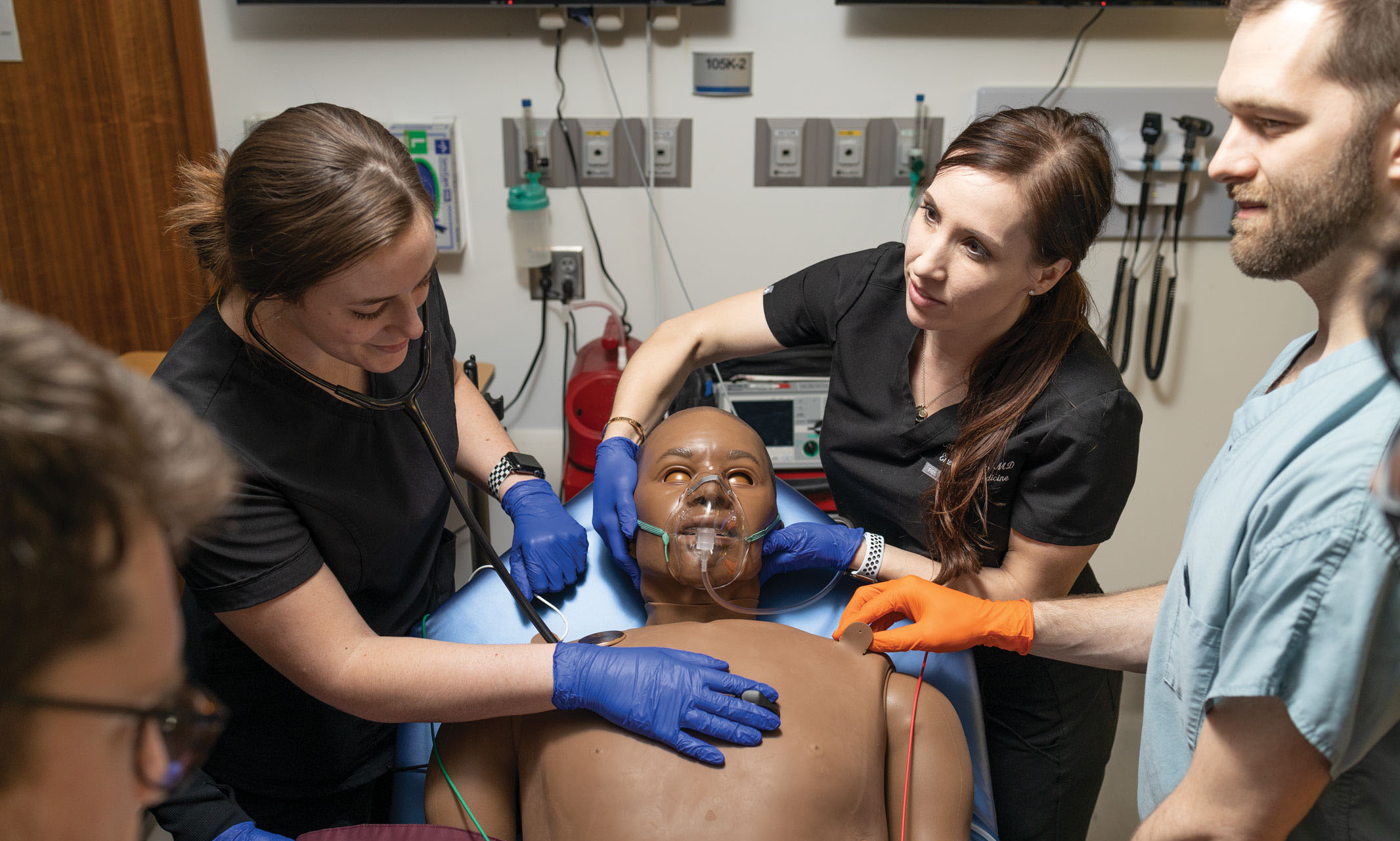
Simulation training is a growing and expected part of medical education and UMKC has plans to expand their program
Emily Hillman was a fifth-year medical student, still deciding which direction her career as a physician would take, when she walked into the School of Medicine’s simulation lab for the first time.
Long recognized for delivering a cutting-edge curriculum, the UMKC School of Medicine opened its Clinical Training Facility and the Youngblood Medical Skills Laboratory in the basement in 2007 with a small assortment of full-body manikin simulators and specialized models called “task trainers,” designed to teach and practice skills.Hillman (M.D. ’08), returned to the lab repeatedly throughout her final years of medical school, and throughout her emergency medicine residency, to learn procedures in a way that wasn’t possible before the evolution of simulators. “I found it so helpful and impactful learning to do things on a simulator rather than reading a textbook or listening to a lecture because it brought out my knowledge gaps,” said Hillman, an emergency medicine physician who now serves as director of simulation education at the School of Medicine. “I realized I thought I knew something, but actually doing it was different.”Today, the school is looking forward to a new $120 million Healthcare Delivery and Innovation Building planned for the UMKC Health Sciences Campus. The building will provide additional classroom space and state-of-the-art educational facilities, including more simulation labs, which school leaders say will lead to better training for students and better care for the community.Before simulation training, medical students learned by reading textbooks, examining and working with static plastic models and watching others perform procedures before they practiced on real patients. At the School of Medicine, students often prepared for exams by flooding the school’s second-floor media center, a large room filled with skeletons, an assortment of plastic model body parts and rows of monitors on which they could view videos describing everything from human anatomy to specific medical procedures. Hillman said today’s students come in with the expectation simulation training will be an essential part of their education. “That was not the case in the past because it was new and novel. It was an emerging thing,” Hillman said. “The available technologies today have changed and improved their realism.”Manikins and task trainers used today mimic the human anatomy and physiology and perform with such realism that not only can they talk and move, but they can go so far as to bleed, vomit and even give birth. With life-like skin, they allow learners to practice skills in real time, such as inserting breathing tubes and using catheters to actually remove fluids.Ashraf Gohar, M.D., an associate professor of medicine, is assistant program director of the pulmonary/critical care fellowship. He has utilized the clinical training facility for the past 10 years, teaching medical students and residents.“Every program today, if they don’t have a skills lab, they’re developing one,” he said. “And if they do have one, they’re expanding it.”Such is the case with the School of Medicine’s Clinical Training Facility. Today, the facility has moved out of the basement. Taking up a suite in a building across the street from the medical school, the facility has two classrooms, four examination rooms with exam tables and diagnostic tools and three patient care bays that can be set up as emergency department or intensive care bays.Last year, the school’s second-floor media center was remodeled to house a new Experiential Learning Center, a 30-seat hybrid simulation/classroom space that serves as an extension of the simulation lab across the street. And the growth doesn’t end there. In addition to the current simulation facilities, the Healthcare Delivery and Innovation Building is expected to provide training space that will nearly triple the Clinical Training Facility’s footprint on the Health Sciences Campus. “For the volume of simulations we do, the size of the team and the space we operate in is small,” Hillman said. “The plus side of that is that we’ve had to do a great job of being creative with our resources and with solutions to those challenges. We do need the physical space that allows us to optimize the way these simulation events are meant to run.”Current scheduling for faculty who want to use the Clinical Training Facility is a minimum of two weeks out, said Garren Fraser, assistant director of administration for the center.With the increased use of the training center, Fraser and his staff now require instructors to submit a complete learning plan outlining goals and objectives for the students.“Our goal is that you give us your teaching plan and we’ll give you the tools to teach it,” Fraser said. “We want to get as close to clinical (reality) as possible.”An entire simulation suite in the new building will help meet that goal. A dedicated room for procedure training will also have equipment that allows for distance learning, so an instructor can connect from another campus to conduct training of procedures. A full-scale operating room will allow for different virtual simulations. A high-fidelity simulation room will be designed to meet today’s best practice standards. There will be additional office and storage space as well.The biggest positive to come out of the new space may be the addition of 14 new exam rooms, more than triple the number of rooms currently available for the school’s standardized patient program.Standardized patients are actors hired by the school to portray patients in a clinical exam setting or family members during virtual training sessions. They allow students to practice basic examination and communication skills. Standardized patients are also trained to help assess, and in some instances, correct simple mistakes students make while they are learning to conduct basic examinations, something Hillman said sets the UMKC standardized patient program apart from others.As part of their training, a new class of medical students is required each year to examine four standardized patients for 30 minutes each. That requirement, which is part of the students’ mid-term exams, takes a full week to complete for an entire class of up to 130 students with the spaces currently available. In the new Experiential Learning Center, the standardized patient program also provides students with after-hours opportunities to meet with standardized patients and spend more time practicing their basic physical exam skills. “We need a space that delivers the best environment for our student learners and our standardized patients,” Hillman said. “Instead of a student reading a textbook after hours to prepare for an exam, they’re meeting with a standardized patient. It’s all about having a flexible learning model for students who learn in different ways. We look at how we can adapt simulation for that.”The key to simulation training, she said, is to remember that the patient isn’t the focus.“In simulation, the learner is the focus,” she said. “They’re free to air their mistakes or things they don’t understand because they’re not endangering a real patient.”There are, however, times when a simulation event can become a very lifelike and stressful experience.Ameen Awad, a sixth-year medical student, has been through several simulation events and experienced both the comfort of learning in a safe environment and the pressure of a high-stress situation.“You can be working on the manikin, looking at the heart monitor and all of a sudden, it flat lines and you have to do something immediately,” Awad said. “You have to figure out, ‘What are we going to do? What are we going to inject them with? Are we going to start compressions?’ That is stressful, but it’s also good practice because in the real world, seconds are precious.” Gohar brings a new group of medical students and residents to the Clinical Training Facility about every six weeks.On a recent spring day, a class of nearly 20 medical students gathered for comprehensive skills training in thoracentesis and paracentesis, procedures in which a long catheter is inserted through the patient’s back or chest to obtain a body fluid sample. Having already watched a recorded video of the procedures, the students line up to perform the procedures on one of two task trainers.“They come here to practice the hands-on part before they start working on the real person,” Gohar said. “This is important because they make mistakes, they learn from their mistakes. After a certain number of procedures, everyone will get more comfortable.”As the school’s simulation program continues to grow, Hillman said, the goal is for the Clinical Training Facility to become an accredited simulation center through the Society for Simulation in Healthcare within the next five years. Accreditation proves a simulation center has established the processes, procedures and oversight that are best practice, Hillman said.“We believe that process is going to ensure we’re following best practices,” she said. “We’ve been doing things program-wise to set the stage for that in a way that may not be apparent to the learners but is very apparent to people who ask to use our center now.” Today’s simulation training is a high yield learning experience, Hillman said. For that reason, it’s now embedded in the school’s curriculum, which includes the school’s Physician Assistant and Anesthesiologist Assistant programs as well.“It's an expectation now as a medical school that we provide simulated experiences,” Hillman said. “Students can encounter different problems (in simulations) that they wouldn’t in the clinic. You can’t guarantee every student is going to see every patient problem. But you can with simulation.”
Aug 24, 2023
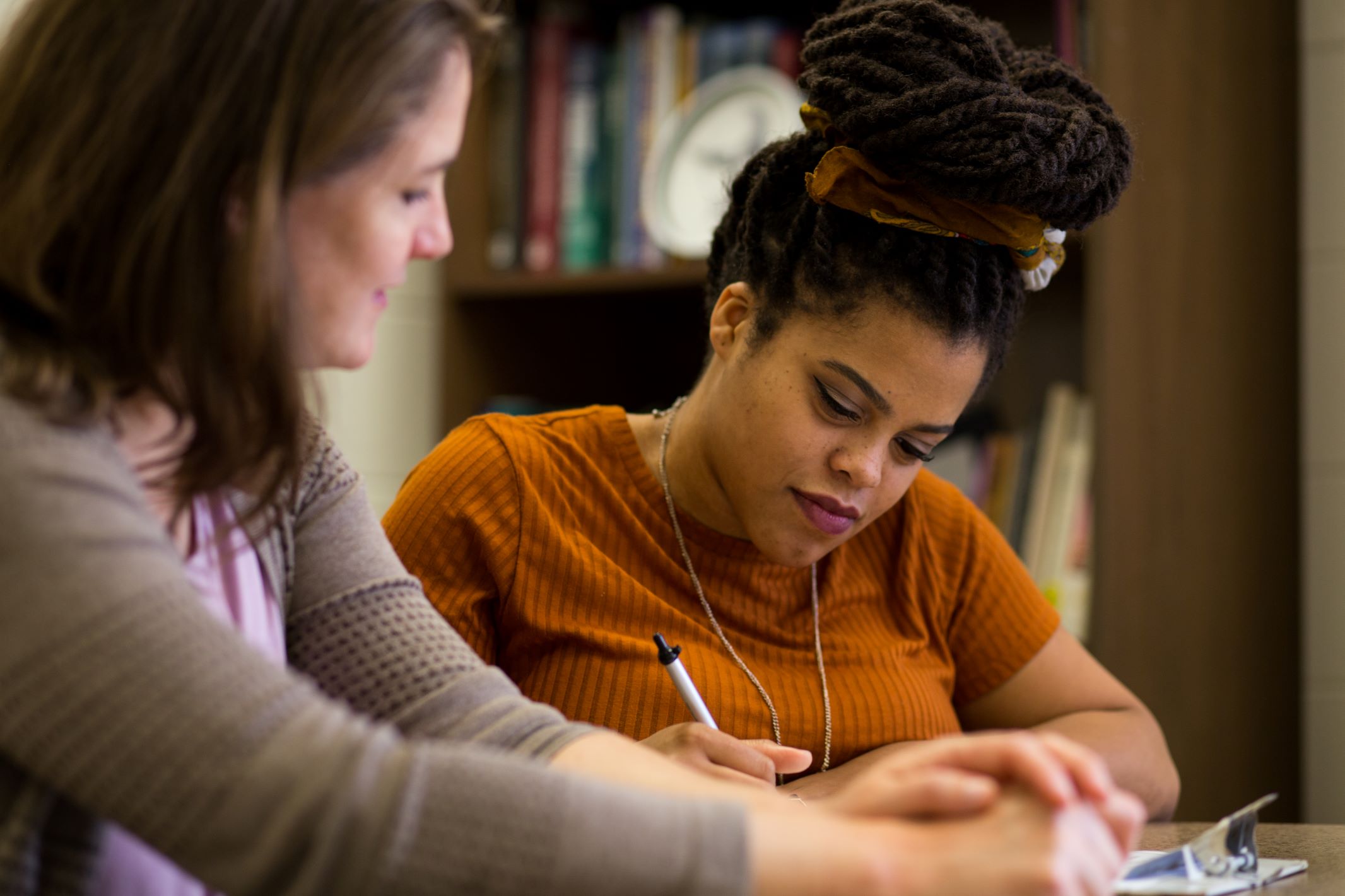
From summer camps to assisted living facilities, department helps students find the right fit
The UMKC psychology program is committed to identifying internships for its undergraduate students. The results of the students’ experiences are stronger skills, clearer understanding of the profession and possible job offers.
Angel Williams is a senior who decided to be a counselor based on the prevalence of mental health issues.
“I just decided that if people need help, I should be a person that they can look to. That way they can lean on me with the problems that they may have."
At Jumpstart, an outcome-based program that promotes children’s school success and builds family engagement, Williams worked two days a week developing lesson plans, conducting reading activities and providing lessons to expand vocabulary.
The internship gave Williams perspective on how broad the field of psychology is, as well as the diversity of the audience.
“I want to work with young adults, but my internship gave me the experience of putting myself in someone else’s shoes. It helped me realize where other people are coming from even better.”
Growing up, school was a place that Yami Blas, a senior in psychology, felt secure and supported.
“My teachers and counselor instilled a deep appreciation for the work that they do. Their influence encouraged me to pursue a career in an educational setting. My internship at Campfire made my interest in school counseling become clearer.”
During her internship, she went to two schools and worked with diverse groups of students.
“We taught them conflict resolution and emotional regulation skills,” Blas says. “I created lesson plans that would outline ways to resolve conflicts that students may have faced, but we made these activities so students would have fun while learning.”
Blas plans to earn her master's degree in counseling with an emphasis on school counseling.
“At Campfire I interacted with school counselors, which provided invaluable insights into their roles and responsibilities. Their insights instilled a sense of confidence in my career choice.”
After graduation, Blas plans to be a school counselor within her community.
“I am well aware of the pressing need for increased representation of Latine professionals in mental health and education. I want to make a meaningful impact and contribute to fostering inclusive and equitable support systems for all students!”
Sarah Welte, (B.A., 23) psychology major with a minor in race, ethnic and gender studies, is an academy director at Rockhill Manor thanks to her internship through UMKC.
Welte was hesitant about her internship with Rockhill Manor, an assisted living campus for adults with a chronic mental illness, because she was concerned that it may be too focused on the nursing side of health care, rather than the mental health side, which interested her more.
“Dr. (Kym) Bennett encouraged me to try it because she thought I might like it. I’m very thankful for her patience and for motivating me to give it a shot!”
Rockhill Academy is a non-profit organization run by Rockhill Manor that offers classes focusing on life skills, educational opportunities and community engagement for their residents.
“I help design and facilitate these classes, including Mental Health Awareness, and organizing trips to Starlight Theater,” Welte says. “In addition, I am in charge of facilitating the internship program we have with UMKC.”
“The best case scenario is that students get into the internship, and they love the time working one-on-one with people. If they don’t, we can course correct.” - Kym Bennett
Welte says working at Rockhill has been the perfect job for her after graduation.
“It allowed me to shift into the psychology field in a place where I was already comfortable because I had had months of exposure to the place and the residents before I began working here. Now I get to continue to work with residents that I had already formed relationships with, providing them a continuance of classes and opportunities that will hopefully enhance their lives.
Kym Bennett, Ph.D., director, Undergraduate Psychology Program and Mentoring Office helped each student secure an internship. She and Ricardo Marte, Ph.D., associate clinical professor, maintain a list of sites that provide opportunities for meaningful experiences, but they can identify other sites if a student has a specific interest. It’s important to them that the internship is a good fit.
“The best case scenario is that students get into the internship, and they love the time working one-on-one with people,” Bennett says. “If they don’t, we can course correct.”
She says seeing a student take a job at an internship placement is energizing.
“It’s one of the best parts of the job to see our students complete their degree and begin down the path of helping others. There’s no better feeling.”
Aug 18, 2023
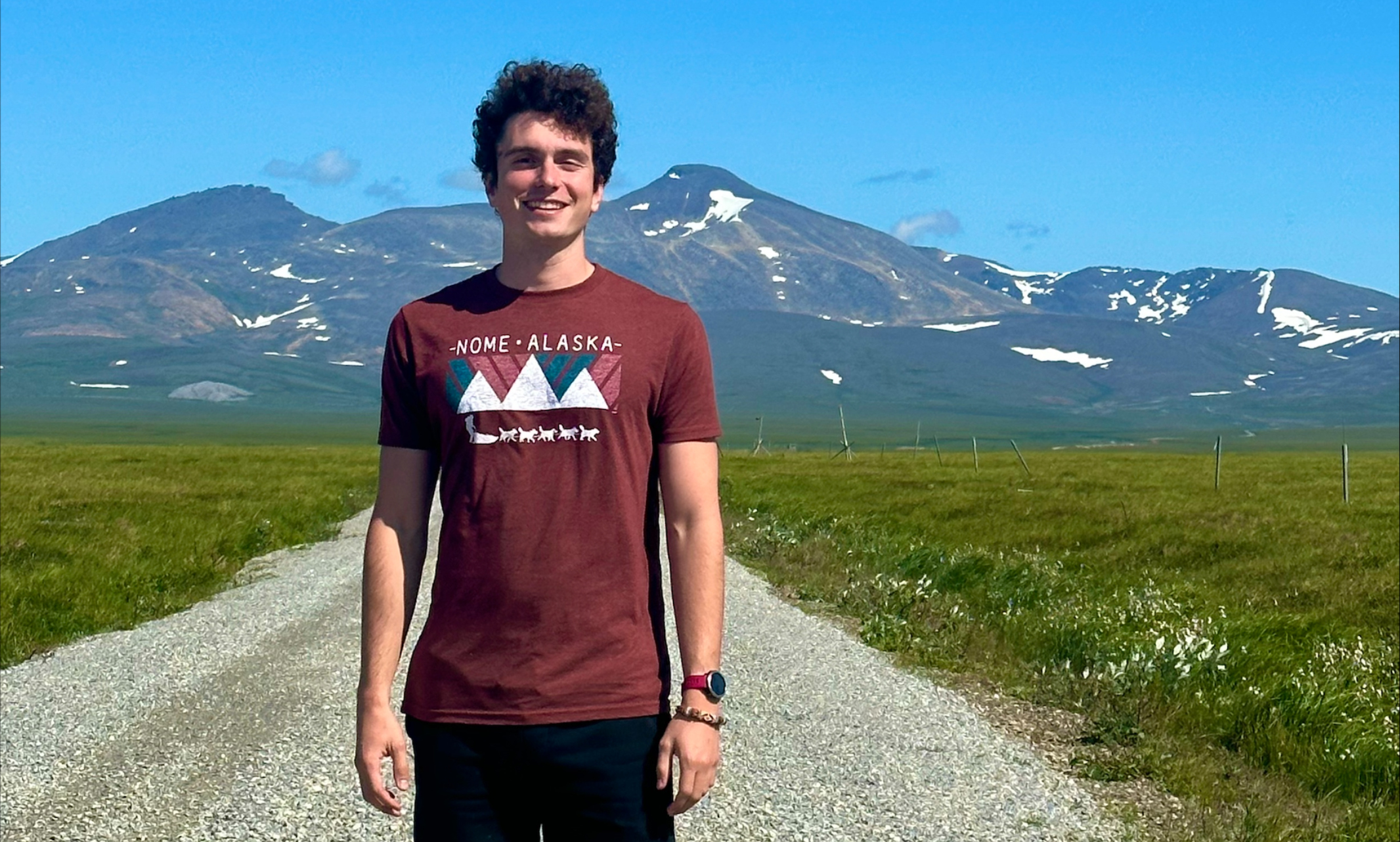
Caleb Feuerbacher completed monthlong psychiatric rotation in remote Alaska
Roos don't just dream, they do. Our students turn ideas into action every day. Get to know our people, and you'll know what UMKC is all about.
Caleb FeuerbacherAnticipated graduation year: 2025UMKC degree program: BA/MD, School of MedicineHometown: Maryville, Missouri
It took persistence, and Google Maps, for med student Caleb Feuerbacher to find the ideal place for a monthlong psychiatry rotation.
Norton Sound Health Corporation in Nome, Alaska, isn’t easy to spot from the lower 48. But it was a magnet for Feuerbacher, who has long dreamed of seeing the more remote regions of the world.
With three psychiatric rotations in easier-to-reach locations already on his resume, he decided in early 2023 it was time to go long.
“I just started clicking on hospitals that showed up on Google Maps in remote areas of Alaska,” he said. He found Norton Sound in Nome, went to the website and discovered that they already had a medical student rotation program established with Tulane University. The website included a name and phone number for a contact person for the program. He picked up the phone and called.
“The man said, ‘We’re having a Zoom meeting tomorrow with applicants from Tulane. Want to join?’ And I did.”
On June 23, he stepped off the plane and into another world. For the first two weeks, the sun never set.
“The culture is rooted in subsistence hunting,” he said. “The people are all super nice and friendly. They were always inviting me into their homes.” He spent a lot of his free time exploring and sightseeing in the tundra and mountains.
He also encountered professional challenges.
“According to the CDC, the suicide rate in Alaska is about 1.5 times that of Missouri,” Feuerbacher said. “I don’t think the issue is as simple as remoteness or weather. There’s been a lot of challenges for Native Americans and Alaska Natives with European colonists from the very beginning. Many challenges continue to exist today.”
His thinking is influenced by more than just a month in Alaska. He spent an earlier rotation in a place much closer to Kansas City, but almost as remote: White Cloud, Kansas, population 115, in the reservation of the Iowa Tribe of Kansas and Nebraska, where he dealt with similar issues.
“I think it is really important for medical students, or really anyone, to learn more about native Americans and Alaska natives, to see things from their perspective.”
“I really like the extremities of the world. I like to explore things that few people in the world have seen, see how other people live. I want to experience other cultures, other lifestyles.” — Caleb Feuerbacher
What’s next for Feuerbacher? He will spend the 2023-2024 academic year at Harvard pursuing a master’s degree in public health, then return to UMKC for the final year of medical school. Then a residency, and eventually a psychiatric practice.
Just where that will be remains to be seen. Utqiagvik, Alaska (formerly Barrow), one of the northernmost towns on the planet, is on his bucket list. He’s also eager to visit U.S. territories in the Pacific, such as Guam and the Northern Marianas.
“I really like the extremities of the world,” Feuerbacher said. “I like to explore things that few people in the world have seen, see how other people live. I want to experience other cultures, other lifestyles.”
“I think it’s really important to see how medicine is practiced in different areas of the United States,” he added. “I believe it helps you understand on a deeper level the issues you’ll be dealing with in your practice.”
Why did you choose UMKC?
I visited it as a high school student. It had a great campus and was close to home, along with the program I wanted and great support.
Why did you choose your field of study?
The six-year BA/MD program was perfect for me as it was in-state and gave me admission into a great medical school.
What are the benefits of the program?
Getting your M.D. and undergrad degree in only six years, with lower cost than most other medical schools for in-state students. The students here are awesome, and I’ve met a lot of friends on campus. I also like the flexibility on choosing away rotations.
Who do you admire most at UMKC?
Dr. Wacker (Michael Wacker, Ph.D., associate professor and associate dean - Academic Affairs, vice-chair, Biomedical Science) has been an amazing role model and person to seek guidance from, especially for rural/away rotations.
Do you have any scholarships?
I am on an athletic scholarship for NCAA Division I cross country. I ran competitively here at UMKC for three years with my last season being this past fall, and was UMKC’s third-fastest cross country runner this year at conference.
What’s your favorite social media channel?
Geowizard on Youtube. He’s a funny personality and has lots of cool videos about challenges where he walks across countries in straight lines and loves geography, which I love as well.
What’s your favorite spot on campus?
Bloch Executive Hall; there are lots of little places to explore in that building.
Aug 17, 2023
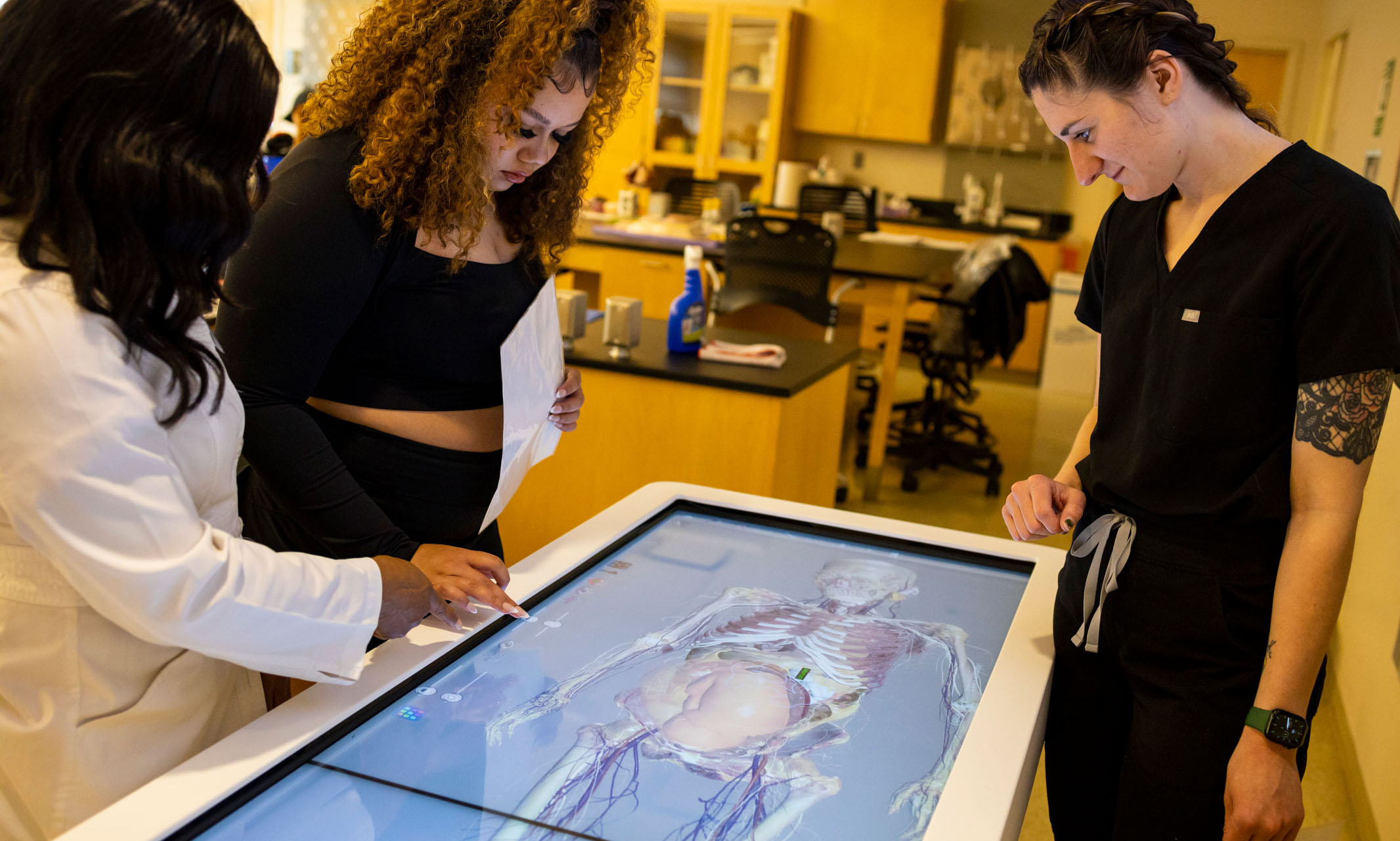
Virtual anatomy table takes the gross out of anatomy
The Anatomage Table, a 3D anatomy visualization and virtual dissection tool, is about the size and height of a traditional hospital bed.
The top of the table features two integrated touch-screen glass monitors connected to a powerful computer housed in the base of the machine. At first glance, the screens look like any other computer interface, except the screen spans 7 feet.
The school acquired the table in the fall of 2019 through a state technology grant. Trainings were delayed because of the COVID-19 pandemic, and the school was able to start using the table in the Fall of 2021.
Shelley Hunter, Ph.D., a clinical assistant professor who teaches anatomy and physiology, is the resident expert on the inner workings of the impressive piece of technology. She said that even though Anatomage provided extensive training for faculty and staff, the technology was still daunting at first.
“At first I was really intimidated because the table is enormous, and it can do so many things,” Hunter said. “The students, though, are immediately comfortable with it. They just walk right up, and it doesn’t bother them since they were born into this age of technology.”
According to Hunter, the table presents a more “cleaned-up version” of the human body than students would experience in a traditional cadaver lab. With the Anatomage Table, if a student wants to see behind the kidneys, they just digitally move the organs out of the way. With a cadaver, those same kidneys would need to be removed by hand with considerable effort. For Hunter, the capabilities of the virtual anatomy table far outweigh the lack of tactile sensation that traditional dissection involves.
“For the cardiovascular unit we were studying, we pulled up the heart and it pulled up an EKG,” Hunter said. “Right beside it, and we could see the muscles, we could see the nervous system and the valves working while the ECG was going on and the students can relate the electrical with the mechanical.”
School of Nursing and Health Studies Dean Joy Roberts believes that UMKC is the only university in the Kansas City area offering this technology to its students. Roberts also knows first-hand that other area schools are interested in the table.
“I was on the board for North Kansas City School District. They called and said, ‘We hear you have this new machine and it’s really cool,’” Roberts said. “Leadership came to UMKC to check it out. They were so impressed they got one for the district, and plan to have them at all four of the North Kansas City high schools.”
Although the table itself is expensive, it’s still much cheaper than a cadaver lab.
“To operate a cadaver lab, you have to get people to donate their bodies,” Roberts said. “Then you have to store the cadavers, preserve them in formaldehyde and keep them secure. This table gives us access to cadavers without the terrible smell of formaldehyde burning our eyes.”
The school received the funding for the $80,000 table from a grant through the Nursing Education Incentive Program with the Missouri State Board of Nursing. According to Roberts, having access to cadavers, even if virtually, makes a world of difference for the students, providing them with more than a the traditional plastic model or picture in a book. For Roberts, those tried-and-true learning tools will always be useful, but the Anatomage Table provides a more complete picture.
Take, for example, the voice box. Hunter can zero in on that organ and remove related systems, such as circulatory or nervous systems, providing an unencumbered view of what students are focusing on for that particular lesson. The machine shines when Hunter takes a clear view of the voice box and rotates the entire organ.
The ability to do this is critical, because the muscles associated with the voice box are hidden behind the organ itself. Hunter can then show students the muscles that support the throat, the bone and cartilage, the Adam’s apple and the epiglottis, the flap that covers the windpipe. That full understanding is important for future nurses and their patients.
“Because most nurses will have to intubate a patient, we look at those muscles that control the opening and closing of that flap,” Hunter said. “We talk about what happens if any of these things are compromised. If the nerves or muscles aren’t functioning properly, the patient can die because there’s no way for air to get through.”
Hunter’s anatomy and physiology classes are comprised of pre-nursing students and health studies students. Classes consist of 20-35 students each, and Hunter has groups of five working at the table at one time. On any given review day, students can be found studying a unit, such as the cardiovascular system, watching the entire system work in real-time. Other groups quiz each other on terminology as they wait their turn at the table, where they’ll see a fuller picture of how circulation works.
Ashley Hanners is pursuing her bachelor’s degree in health studies, and she spent the past two semesters in Hunter’s class working with the Anatomage Table. Hanners came into the class from high school with some experience in dissection, which she said was helpful in working with table. There was one crucial difference between the virtual anatomy table and the mouse she dissected, however: the odor.
“The smell of chemicals and decomposition were potent,” Hanners said. “It made a lot of my high school classmates nauseous.”
Instead, Hanners appreciates that the table removed that distraction and enabled her to focus on diving deep into anatomy. She said that each person within her small group got better at identifying organs and systems, as well as dissecting and reconstructing those systems.
During a class in which Hunter reviewed the reproductive system, she showed students how uncomfortable pregnancy can be for expectant mothers. The students saw first-hand the pressure the baby puts on the surrounding organs, an exercise that elicited a variety of reactions from the students, including, “This is so cool,” “That is kind of scary,” and “You can see the baby’s heart beating!”
Aug 16, 2023
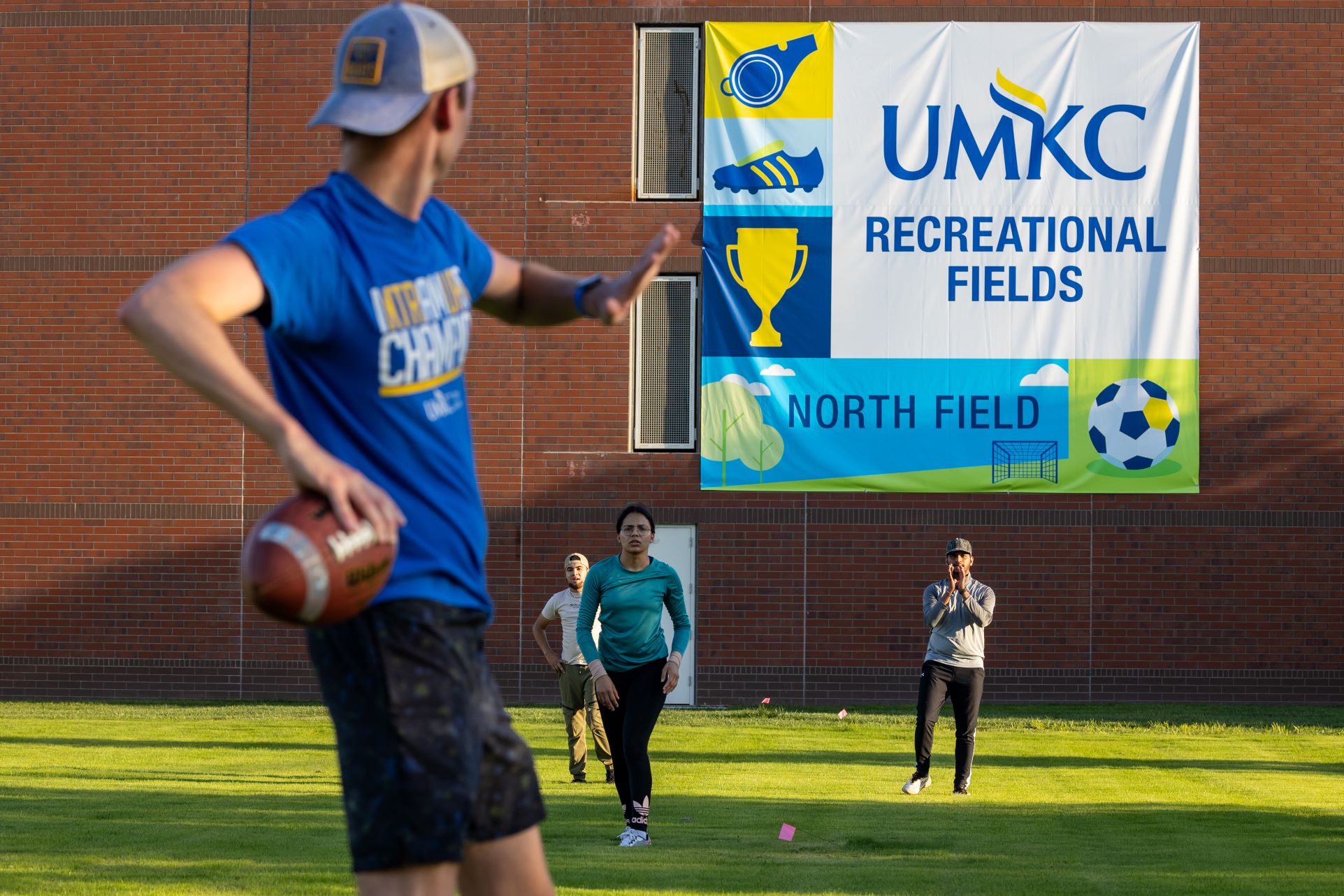
Plenty! The Divine Nine Garden and two new recreational fields are just the beginning
We’re excited to welcome everyone back to campus! You might have noticed some new additions (like the Roo blue and gold chairs) on campus. We’ve made it easier for you with a guide to what’s new here at UMKC this fall.
Divine Nine Garden
This dedicated space on the UMKC Volker Campus honors and recognizes the nine Black Greek organizations that make up the National Pan-Hellenic Council, also known as the Divine Nine. It will also serve as a gathering place for students and alumni to meet, celebrate, host events and reflect on the importance and achievements of their respective organizations. The Divine Nine Garden unveiling will happen 10:30 a.m. Sept. 9 at the Quad.
Murals in Welcome Center
The Welcome Center at the Atterbury Student Success Center has a new look. New UMKC murals are designed by Ruthie Ozonoff, who shared the process of designing the murals on her Instagram.
View this post on Instagram
A post shared by Ruthie Ozonoff📍KCMO (@designedbyruthie)
Recreational Fields
UMKC Campus Recreation has introduced two recreational fields on Oak Street to the UMKC community. The North Field is equipped with two sets of soccer goals and bleachers while the South Field is a cricket field.
“We hope students, faculty, and staff will enjoy these new offerings to campus, especially with cricket being a sport that is growing in popularity on campus,” said Liz Hoffman-Shrout, director of Campus Recreation.
Students, faculty, and staff can also reserve the fields for various sports, recreation and leisure activities. Also, lots of fun events are happening this fall on the fields.
Roo Wellness
UMKC Health and Wellness is combining all services and rebranding itself as Roo Wellness, which will consist of health services, counseling services and student accessibility services.
“With Roo Wellness, we’re taking a holistic approach by having one department to increase student success and life-long wellbeing,” said Obie Austin, administrator of Student Health and Wellness.
Roo Wireless
We've partnered with Public Wireless to introduce Roo Wireless, an opportunity for qualifying students to get a free tablet with internet hotspot.
You may qualify for Roo Wireless if your household income is at or below 200% of the federal poverty guidelines, or if you meet at least one of these criteria:
Recipient of a federal Pell Grant in 2023 Participant in a government assistance program such as SNAP, Medicaid, housing assistance or a free or reduced lunch program
Meet the eligibility criteria for a participating provider’s low-income internet program
Bioengineering Program
The School of Science and Engineering has officially rolled out its Biomedical Engineering degree program. The high-demand major is based on a broad approach, combining electrical engineering, mechanical engineering, computer science, chemistry, biology, physics, medical training, pharmacology and pure biomedical engineering courses. In the future, the program will have space in the $120 million Healthcare Innovation and Discovery Building, located at the UMKC Health Sciences Campus.
More Campus Parking
There are 63 metered parking spots plus three ADA spots on the first floor of the Oak Place Parking Garage. A map of all other parking spots can be found here.
Blue and Gold Chairs
Looking for a spot to relax between classes? The new blue and gold chairs in the Quad are calling your name!
New Starbucks
The Student Union officially has a Starbucks! The location offers an order-ahead option using the Starbucks app, and will accept Starbucks giftcards. The option to pay using a meal plan is coming soon.
Aug 14, 2023
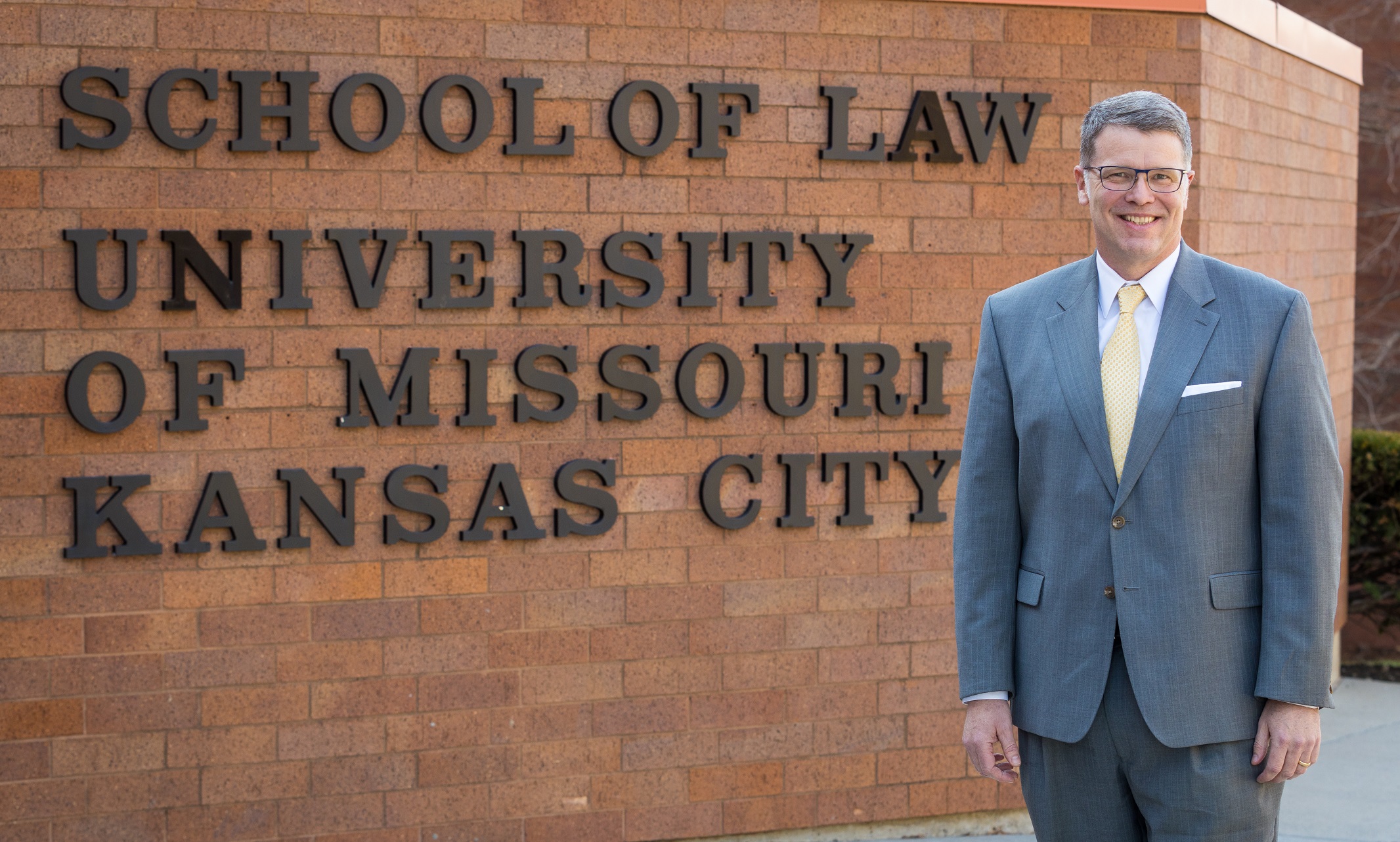
Meet Lumen Mulligan
Lumen (Lou) Mulligan, J.D., M.A., joined the School of Law as dean in July.
He was previously the Interim Vice Provost for Faculty Affairs at the University of Kansas, as well as the Earl B. Shurtz Research Professor of Law. A Kansas City native, Mulligan understands the importance of UMKC School of Law to the greater community.
What attracted you to UMKC School of Law initially?
The mission and the people. UMKC Law has a deep commitment to being a best-value law school. We offer outstanding student success at an affordable price. When you look at our most recent employment numbers (96.6% employed for the class of 2022), the career arcs of our graduates and our low tuition, you can see the school’s commitment to being a premier law school. I was also inspired by the outstanding faculty, staff, students and alumni. They have all greeted me so warmly. It’s a privilege to be on a team with such a special group.
What are you most looking forward to in your first year as dean?
Meeting all our stakeholders and launching new initiatives. In my first month alone, I met with scores of alumni and friends, visited several law firms and worked closely with our entire team in the law school. I value creating these relationships and working with folks to further empower our community.
I am also excited for all the new programs we are launching in the next year. As of this December, all J.D. graduates will have access to a post-graduation bar prep course, which will be paid for from their tuition and fees. At most law schools, the entire cost of bar prep is borne by graduates in addition to their tuition.
I am also looking forward to the opening of our new Center for Law, Entrepreneurship and Innovation this year, which is a groundbreaking interdisciplinary project. And by next summer, we’ll have started our new online Master of Legal Studies degree, which will provide legal education for those working in law-adjacent fields such as HR and compliance.
You’ve previously worked in Kansas City as an attorney. Now that you’re back in Kansas City, what are you most excited about?
I not only practiced here, “back in the day,” but I grew up in the KC metro. So it’s been a ton of fun already running into so many old friends, former students and new friends in the KC legal and civic community. It truly is a great place to practice law!
Why did you originally pursue law school and being an attorney?
Well, it was not a straight-line path for me. I went to college and studied civil engineering for a while. Then I earned a philosophy degree and went to graduate school. I spent a while coaching swimming, working construction, waiting tables and hiking in Colorado. My eventual draw into law came later as I knew I wanted to be a profession where I could serve others, be challenged and work with great people. It’s been a wonderful career choice for me.
What is something about you that may surprise people?
I am an amateur guitarist, and with my daughters’ long-time engagement with dance, I can do a solid ballet bun and pull off a mildly acceptable fouetté turn myself.
Aug 14, 2023
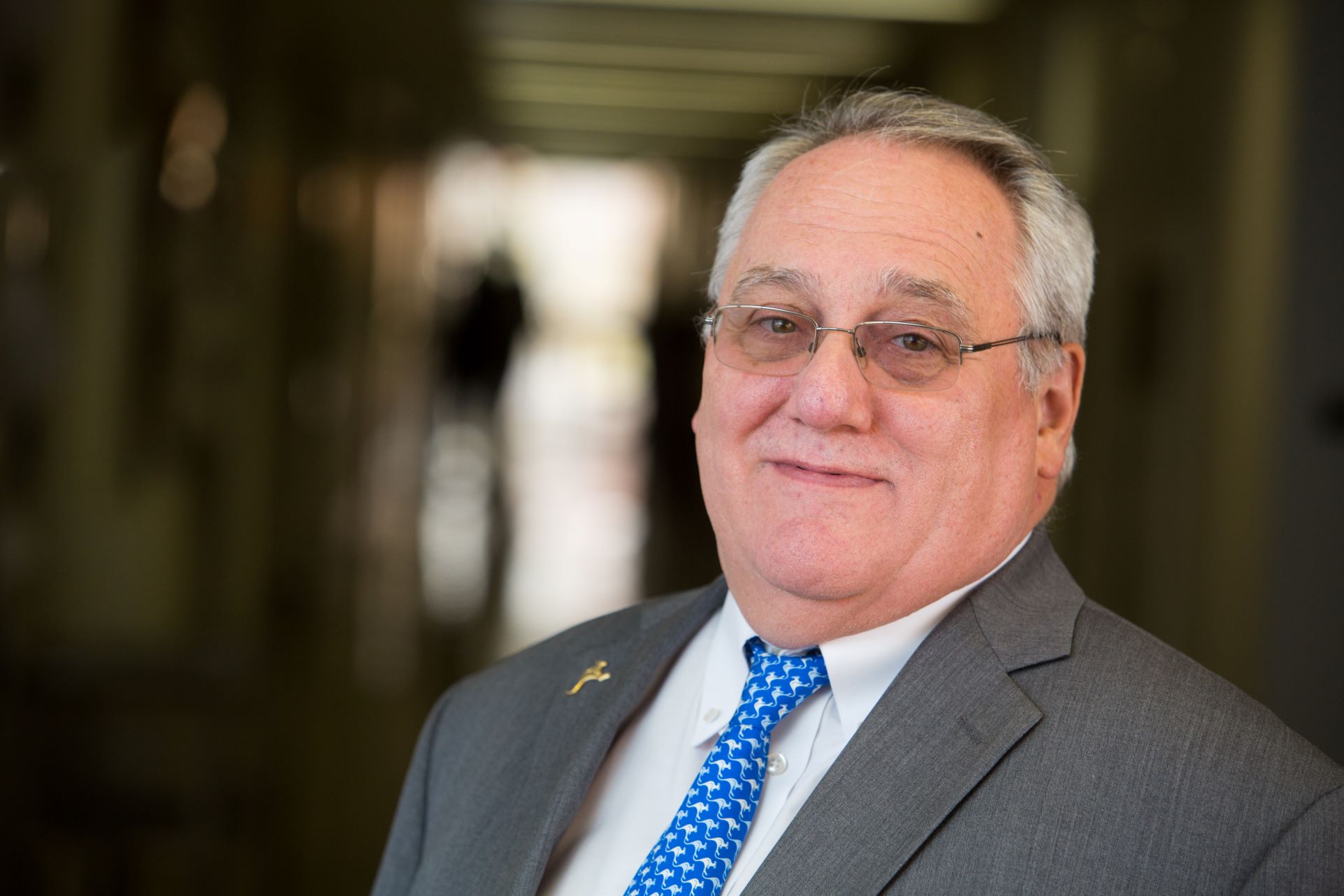
Research focuses on using massive electronic health records database to estimate the impacts of climate change on fungal disease spread in the U.S.
Theodore White, Ph.D., division director and Marion Merrell Dow Endowed Professor in the UMKC School of Science and Engineering, was recently awarded a five-year $3.96 million National Institutes of Health grant to study fungal infections in the United States.
Common fungal diseases in the United States include blood stream and lung diseases as well as athlete’s foot, vaginal yeast infections and oral thrush. These infections have been increasing in numbers and spreading globally for many years, with blood, brain and lung fungal infections having a 50% or more mortality rate. The lack of current data on the number of fungal infections in the United States, and the correlation to socioeconomic status, has precluded a deeper understanding of the role of climate change and extreme climate events on these fungal infections. White’s research aims to change that.
“Over the last 10 years, we have been seeing increasing fungal infections, as well as significant climate changes,” White says. “Our grant will try to determine if there is a correlation between the two.” he said.
White and his team will use a new database to better estimate the number and type of fungal infections across the United States on a yearly basis. The database can track information from the last 15 years or more to examine the role of socioeconomic status of de-identified patients with these fungal infections, and determine if there is a correlation between those infections and climate change or extreme weather events.
This project is a collaboration among the University of Missouri Kansas City, University of California, Berkeley and Children’s Mercy Kansas City.
Aug 11, 2023
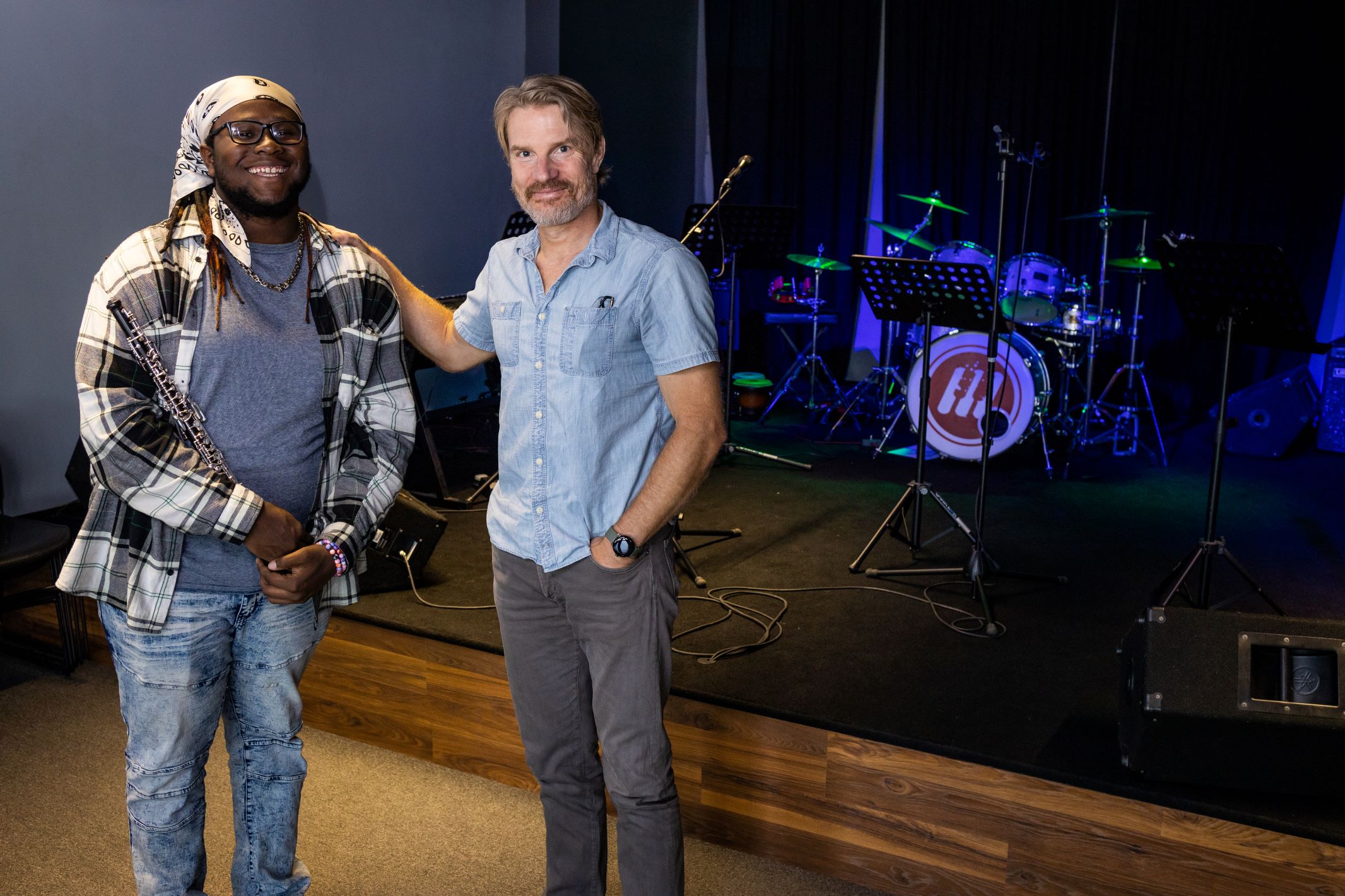
UMKC Conservatory students benefit from family’s generous gifts
Katrinka Sizemore’s mother remembers that her daughter was so determined to play an instrument as a young child, that Katrinka convinced her aunt to give Katrinka her piano.
“We never had to encourage her to play,” Kathy Riggs says of she and her husband, James Riggs. “Music was her.”
In high school, Sizemore took oboe lessons, and her instructor told her she could compete at the state level.
”She used her independent study time in school to practice oboe. It was music, music, music with this child and we just watched from the sidelines.”
Sizemore attended UMKC and earned her B.A. in music in 2001; she graduated from the University of California – Los Angeles with a master’s in music in 2003.
As an adult, Katrinka married Aaron Sizemore, a musician who began playing professionally when he was 15 years old. They started Music House, School of Music in Overland Park, Kansas, for children to learn to play instruments and perform in a collaborative setting. Aaron and Katrinka believed that music is made to be shared and developed a teaching method they felt was more collaborative and avoided an arrogance that was sometimes present in music education.
“They sparked each other,” Riggs says.
The concept and business was a success from the start. In two years, they had 300 students. Currently Music House has three locations.
“Katrinka handled the business side, and she was inspired by the process,” Aaron says. “She was so smart and had so much grit and integrity.”
Katrinka was diagnosed with stage IV breast cancer when she was 30 years old.
“She approached it as a learning opportunity,” Sizemore says. “She continued to teach, and she wrote an oboe book. The doctors told her she had two years to live. She survived for seven.”
Aaron donated her oboe to UMKC, and with her parents established the Katrinka Marie Sizemore Music Scholarship to support students with financial need who are studying oboe performance. Katrinka’s lifelong friend, Megan Shumaker, makes regular contributions to the scholarship through the Shumaker Family Foundation.
“I knew Katrinka my whole life,” Shumaker says. “We were in cribs together. I thought a scholarship was a good way to remember her. Katrinka would have wanted something to help students go into the arts.
"Katrinka would appreciate Antwone having the oboe, and that the fund will affect a lot of people over time who may have missed the opportunity for education because they couldn’t afford it.” — Aaron Sizemore
Antwone Moore, a junior who is pursuing his bachelor’s degree in music education, is one student who has benefitted from Katrinka’s legacy. As with Katrinka, he is passionate about the oboe. He says that with the help of his 6th grade teacher, Bronwyn Short, “The oboe chose me.”
When he began to think about college, UMKC seemed to be the perfect fit. A Kansas City, Kansas native, he didn’t want to be too far from home, and he was comfortable at the university.
“I was familiar with the music department from being in the UMKC Conservatory Bridges program. After doing my research, I felt this was the right choice. I wanted my freedom,” he says. “But I didn’t want to be too far from home. The culture here is so nurturing.”
Celeste Johnson, associate professor of oboe, was an advocate for Moore’s receiving Katrinka’s oboe.
“I was thrilled that Antwone received this oboe – it could not go to a more deserving student. I am so happy that this generous donation makes it possible for a talented, hard-working student like Antwone to pursue his goals and dreams to become a music teacher.
Moore did not know that Johnson was working on his behalf, or that the gift of an oboe was even a possibility.
“I don’t talk about this often, but I come from a very low-income family and have never owned my own instrument. I almost broke down crying when I received the news that Professor Johnson had done this for me. I’m still careful when I play it. I want to do my best to do right by Katrinka and Aaron.”
“I think she’d be happy about the scholarship and the oboe donation,” Sizemore says. “As part of dealing with her mortality she became mindful of what really matters. Katrinka would appreciate Antwone having the oboe, and that the fund will affect a lot of people over time who may have missed the opportunity for education because they couldn’t afford it.”
Aug 08, 2023
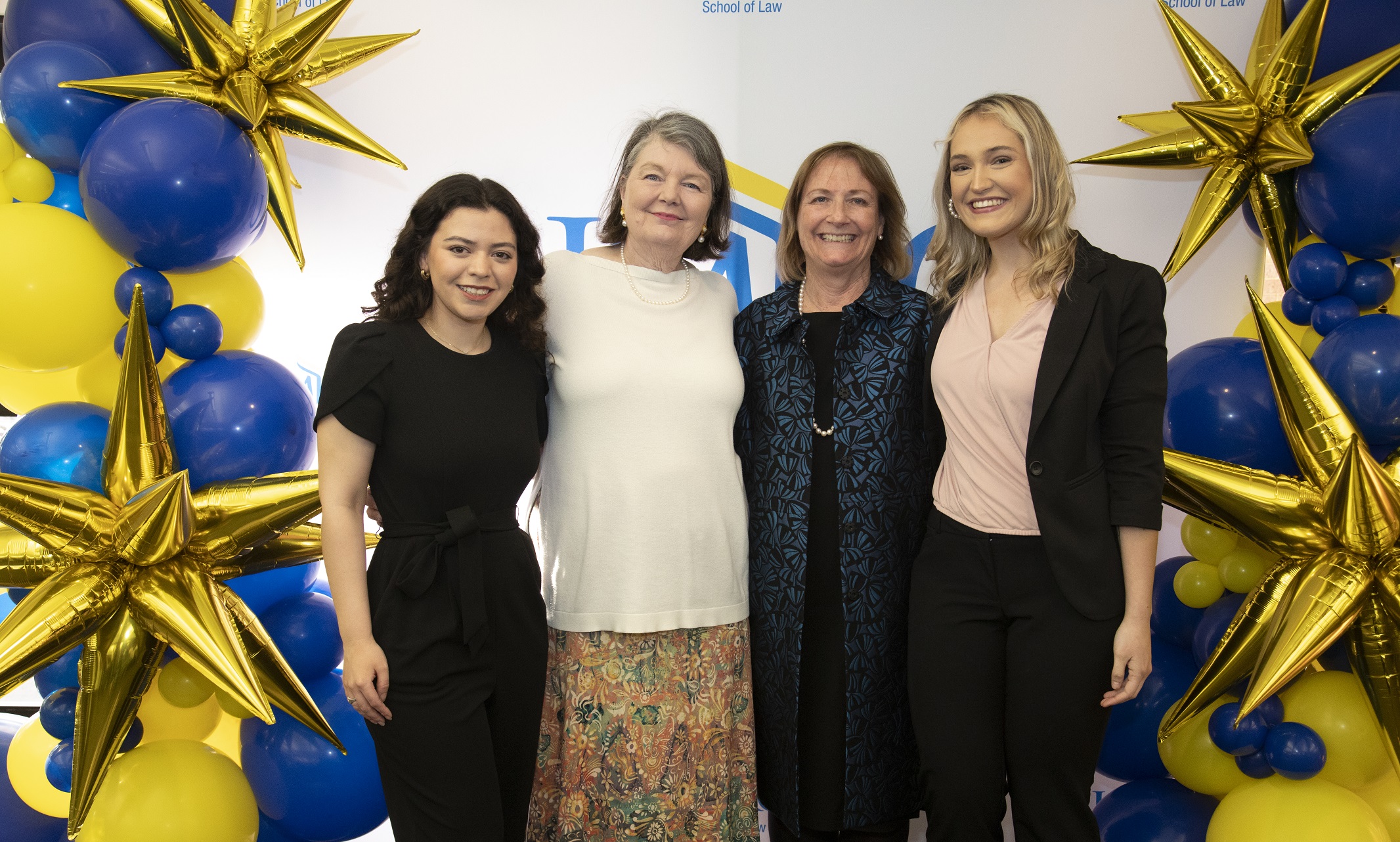
How one man’s final gift will inspire generations
It was an unusually warm and sunny late January day in Kansas City the day that David Westfall, Jr. (J.D. ’55) died. Those who knew him still remember his pleasant manner and giving spirit. At UMKC, his generosity is his legacy, though few here ever knew him at all.
Westfall died in 2015 at the age of 89. The next year, the UMKC School of Law was contacted about an incredible, unexpected $1.1 million gift left behind in his estate.
“It was a complete surprise,” says Kirk Baughan, who was the School of Law’s director of development at the time. He recalls how little anyone knew about Westfall at the time and says there wasn’t much more to be discovered.
A native son of Kansas City, Westfall’s obituary reveals he was a proud Army veteran, serving a tour of duty in Europe during the second World War. Upon returning home, Westfall spent decades working as an attorney in the Argyle Building at 12th and McGee, later moving his practice to the historic Livestock Exchange Building in Kansas City’s West Bottoms. His personal life was dedicated to his faith in God and service to community, but never once is there mention of a spouse, children or any family at all.
“He seemed to make his estate plan close to the time that he passed away,” says Baughan. “He knew that many of his assets were in his owned real estate. Gifts from his estate supported the UMKC School of Law, the University of Kansas and Saint Elizabeth’s Catholic Church in Kansas City.”
Traditionally, a gift of $1 million or more made to a university is the result of a careful cultivation process. A dean and philanthropic impact professional will sit down with a company or individual to discuss detailed plans about the impact they want to make and how they want their money to be used.
Not only was Westfall’s gift a surprise, but it was also completely unrestricted. Law School leadership and trustees knew they wanted to make the most of the windfall but weren’t immediately sure how to do it. Together, they decided on the idea of creating what they called The Westfall Matching Fund in support of law school scholarships, allowing donors to immediately double the impact of their contribution.
“There was a lot of excitement around the arrival of this gift,” says J.R. Hobbs (J.D. ’81), then-president of the Law Foundation. “The trustees agreed that $300,000 would be used immediately to fund student scholarships. The remaining gift would be invested into the Law Foundation’s endowment and used to energize alumni and friends to create scholarship endowments to help students pay their tuition and fees.”
The plan worked. The availability of matching funds was enough to convince donor after donor that their gift would go further through the School of Law.
That was exactly the case for Ann Holmes, who established an endowed scholarship in honor of her father, Marvin Chester Holmes (J.D. ’37), who was once the president of his freshman class at then-Kansas City University.
“I felt it was terribly important to honor my father with a named scholarship,” Holmes recalls. “As far as I know, my father never practiced law, but he used his education in many jobs — including that of a real estate appraiser.”
Holmes admits the School of Law wasn’t necessarily her top charitable priority.
However, after several meaningful conversations with the dean and learning that her gift would be doubled, she was convinced it was the right way to honor her father.
Students were quick to join the excitement, too. The Diverse Student Coalition recently used the funds to grow its endowed scholarship to more than a quarter-of-a-million dollars through fundraising at its annual Diversity Banquet.
The Campaign for Advocates, an effort to raise $1 million for UMKC Law’s advocacy programs, also benefited from the Westfall Matching Fund. Scott Bethune and Kent Emison established lead gifts for the campaign. The Westfall Matching Fund program encouraged several alumni and firms to join the campaign by creating their own named scholarships to support students who show talent and interest in pursuing trial advocacy careers. Those donors include the DanaJames Charitable Foundation; Wagstaff & Cartmell, LLP; The Hyde Family; and the Lathrop GPM Foundation.
Westfall likely made a bigger impact than he could have known. The matching fund was so popular, it only took six years for the entire gift to be matched dollar-for-dollar. The final matching gift creates the Professor Julie M. Cheslik Merit Scholarship Endowment, an annual “full ride” scholarship expected to attract some of the brightest aspiring attorneys to UMKC.
From the beginning, the Law Foundation knew the funds wouldn’t last forever. To honor his investment and ensure his legacy at UMKC, the Foundation renamed the endowed fund that supports academic achievement scholarships for law students the David I. Westfall, Jr. Merit Scholarship Endowment.
Aug 04, 2023
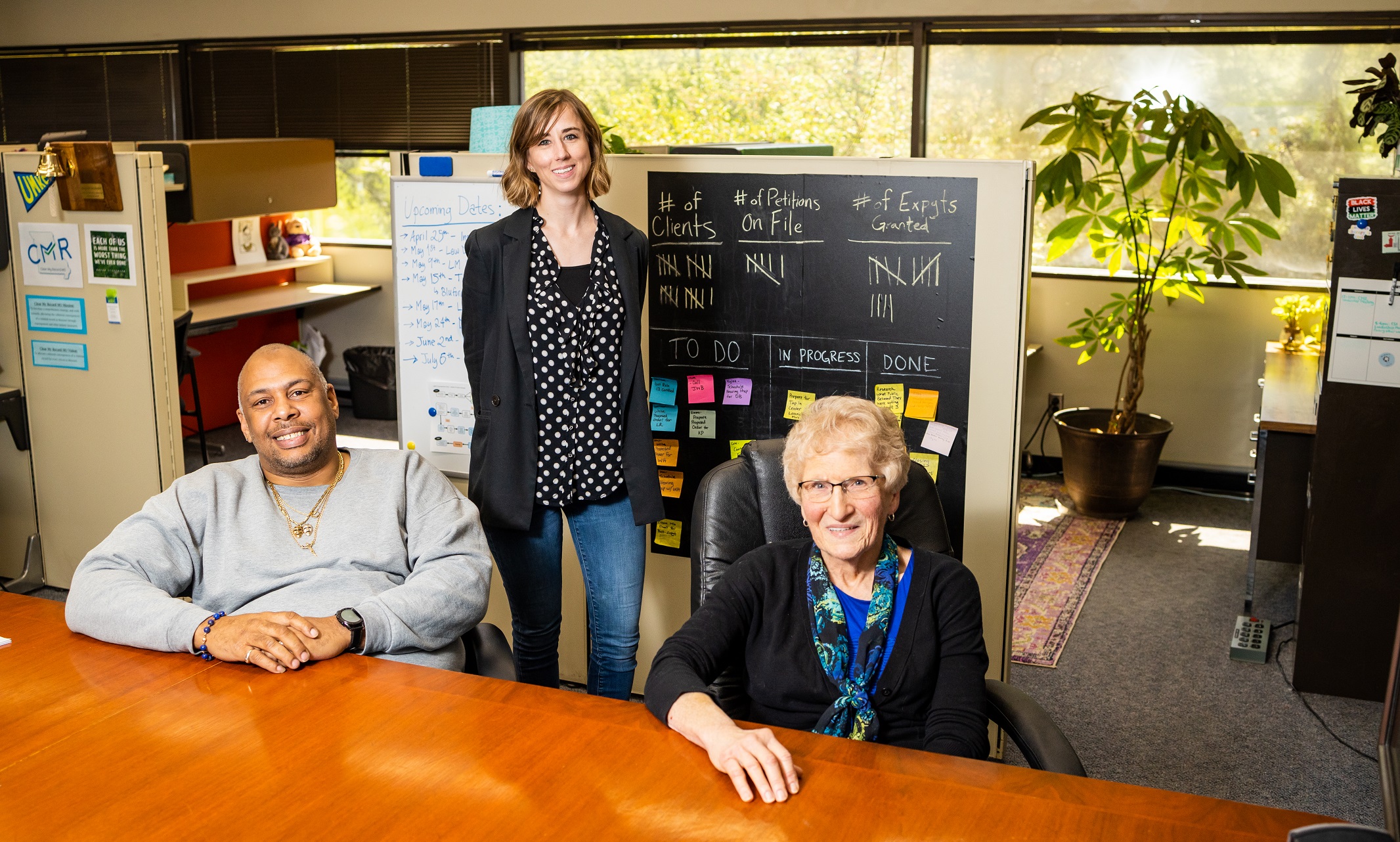
UMKC Expungement Clinic helps Missourians find fresh starts
When Johnny Waller, Jr., was 18 years old, he was tried, convicted and sent to prison in Nebraska. He served his time and returned to society, but quickly learned that although he was no longer behind bars, he also wasn’t truly free. Living with a criminal record was like carrying around a heavy weight all the time.
“It’s not like you can successfully reintegrate back into society like people tell you,” Waller says. “You’re lucky if you can find a decent job or a place to stay.”
When you have to check the box on every job or housing application that says you have been convicted of a crime, doors close. That’s why Waller has dedicated his career to helping people open those doors once again. Waller, who holds a bachelor's and master's degree, serves as program manager at the School of Law's Clear My Record Expungement Clinic.
The Clinic, founded in 2017 by retired law school dean, Ellen Suni, advocates for legislative changes to make expungement — the process of sealing past criminal records — more widely available in Missouri. The UMKC Expungement Clinic, which is affiliated with the project, represents low-income clients seeking expungement.
If someone qualifies under Missouri law, a judge can grant an expungement of their convictions. With their record cleared, past convictions will not show up during background checks and they need not disclose their convictions on applications.
“With the bang of a gavel, you can do all kinds of different things you couldn’t do before because you don’t have to check those boxes, ” Waller says.
Waller himself was granted an expungement in 2018, 22 years after his initial conviction. The decision opened opportunities for him to pursue his education, start a business and work as an advocate to ease the collateral damage he says too often follows people after they leave prison.
“Drug charges and theft offenses are the most common expungement cases at the UMKC Expungement Clinic,” says Sydney Ragsdale (J.D. ’18), a Truman Fellow who helps oversee the student lawyers who handle cases through the clinic.
The mission behind the Expungement Clinic’s work has less to do with the details of clients’ past convictions and focuses more on the burdens imposed by those convictions, even years after fines are paid or a prison sentence is completed.
“People are being wrongly held back from living their lives,” Ragsdale says.
Since UMKC’s clinic began, its student lawyers have successfully assisted nearly a dozen clients.
One such client is a man from New York who was caught with marijuana while passing through Missouri on a cross-country trip. That unfortunate pitstop led to a drug charge on his record and prevented him from getting a promotion he needed to support his family.
Another client couldn’t rent an apartment or secure a mortgage to buy a house because of a DUI conviction. That mistake from his past kept him struggling to survive in low-income housing.
A third client, a former childcare worker, had been charged with child endangerment after she momentarily left a student behind on a field trip. Although the child was unharmed, the mistake caused her to struggle both financially and emotionally for years afterward.
“She was out in the world doing her best,” Ragsdale says. “She loved these kids, but made a mistake most parents have made at some point in their lives.”
As with most clients the clinic represents, a mistake was still wreaking havoc on the woman’s life years later. Fortunately, like the man from New York with the drug charge and the man with the DUI conviction, she was granted an expungement and given the opportunity to finally start moving on.
“The collateral consequences of convictions are just brutal,” says Suni, who continues to oversee the Clear My Record Project and teaches student lawyers working for the clinic. “There are the obvious things; people have trouble getting jobs, housing, public benefits and loans. The consequences cut across all areas, such as a parent not being permitted to go on their kid’s school trip. It affects every aspect of their lives.”
When the Clear My Record Project started, Suni hoped the expungement process in Missouri could be almost automatic. She thought perhaps a computer program could efficiently find eligible clients and help push through the required paperwork to help them get a fresh start. But as quickly as that idea arose, it became clear that Missouri’s expungement statute, substantially revised in 2018, was written far too narrowly for such automation.
“The statute was very complex and confusing,” Suni recalls. “It became clear that this attempt to digitize the process to help people who don’t have lawyers wasn’t going to work.”
A key issue was finding anyone who met the law’s narrow qualifications. For example, only certain non-violent and non-sex crimes are eligible for expungement. Furthermore, the law allows for the expungement of only one felony in a lifetime, and only two misdemeanors. As the 2018 law was written, a person had to wait seven years after completing a felony-related sentence or three years after a misdemeanor before applying for expungement. Moreover, having a pending case, even for a traffic violation, or owing fines or fees can prevent obtaining expungement.
While hundreds of potential clients desperately needed a clean record to move forward, these strict requirements put expungement out of reach for most.
“We discovered that very few people were fully eligible,” Suni says.
Suni and others affiliated with the Clear My Record Project began using their experience with clients to push for changes that could open the process to more people and they’ve found some success. For example, the law was amended to shorten the waiting period to three years from seven for a felony, and to one year from three for a misdemeanor, and a few new crimes were made eligible.
Suni says the changes are an improvement, but more is needed. She and others across the state are advocating for additional legislative changes, including increasing the lifetime limit of convictions eligible for expungement to two felonies and three misdemeanors. Additional potential changes include providing more leeway for people who committed crimes between the ages of 16 and 25, and for those whose offenses occurred when they were addicted to drugs.
Advocates also are pushing for the abolishment of a $250 surcharge currently assessed to anyone seeking expungement. Ragsdale says that fee, on top of other required court fees, puts expungement out of reach for many low-income clients who earn too much to receive a fee waiver, but will still struggle just to pay for food and housing.
“It is way too expensive,” she says.
Down the road, advocates would like to see the expungement process in Missouri become automatic. Once someone qualifies under the law, the state would initiate the process with no lawyer or court filing required.
While advocates say the Missouri expungement process is still too complex and narrow, it has improved since UMKC’s clinic began. The clinic is seeing a bigger pool of qualified clients and the process is more efficient for hundreds of potential cases.
Of the dozen expungements obtained through UMKC’s clinic, ten of those were granted during the last six months. In January, four of the clinic’s clients obtained expungement on the same day.
“It was extremely exciting,” says Kylee Gomez, a third-year law student who works as a research assistant at the clinic. “Until that point, we’d only had one or two happen.”
“In every case, expungement is a second chance the client desperately needs,” says Bailey Baker, a second-year law student who also serves as a research assistant in the clinic.
“I’ve seen how deeply the past mistakes someone makes, particularly when they were younger, can haunt them,” added Baker, a former social worker. “Expungement is a way to move on.”
Some are hopeful for the future. Many of the provisions supported by the clinic passed both the Missouri House and Senate and will become law if signed by the governor.
Aug 04, 2023
Practicing attorneys, most of whom are alumni, volunteer their time and expertise as adjunct faculty for the School of Law
In 1895, the UMKC School of Law was founded by volunteer attorneys. Today, practicing attorneys, most of whom are alumni, volunteer their time and expertise as adjunct faculty to prepare the next generation of attorneys.
During Spring Semester 2022, more than 35 attorneys served as adjunct instructors for the School of Law, teaching courses that ranged from federal trial practice to estate planning to disabilities and the law.
The generosity of adjunct faculty allows the School of Law to offer more courses for students than most larger law schools. This also means that the student-faculty ratios in these courses are often quite low — about 12:1 — so students have an opportunity to develop strong mentoring relationships with local practicing attorneys.
Throughout the 2022 academic year, volunteer adjunct faculty generated 1,301 student credit hours. Adjuncts taught or co-taught with more than 900 total enrollments across the courses. Considering that no adjuncts teach in the first-year program, Dean Barbara Glesner Fines estimates the average upper-level student is taking at least two-and-a-half courses with adjunct professors. UMKC Law is recognized as a top school for practical skills training. Fines comments, "a big part of that is the expertise and experience our adjuncts bring to the classroom."
Adjunct faculty can enrich all aspects of the school’s curriculum. Many enjoy teaching in the law school’s innovative “mini-term” courses. Offered in an intensive one-week format between regular semesters or over Spring Break, these one credit-hour courses may introduce students to a specific area of practice. Course examples include: State and Local Government Law in a Nutshell, taught by Steve Moore (J.D. ’77); or Introduction to Workers Compensation Law and Practice, developed by Joan Klosterman (J.D. ’88) and the Honorable Lisa Meiners (J.D. ’96).
Other mini-term courses explore a very specific problem in law and give students hands-on training to address those issues in practice. For example, Paul Anderson (J.D. ’12) established a course focused on concussion litigation, just as society was first becoming aware of the problems caused by sports concussions. He currently teaches a course in Missouri marijuana regulation. Mira Mdivani (J.D. ’99) and Danielle Atchison (J.D. ’14, MBA ’19) train students to help businesses obtain visas for international personnel. In alternate semesters, they guide students through the skills necessary to represent immigrant victims of domestic violence. Kendall Seal (J.D. ’08) explores the problem of human trafficking with his students.
“As far as I know there is only one other law school in the nation, the University of Cincinnati, whose alumni and community members all volunteer as adjuncts,” Glesner Fines said. “Given the competitive market for top talent, adjuncts may see their teaching as a recruitment opportunity for their law firms. Volunteer teaching fulfills most of an attorney’s requirement for annual continuing education, saving that expense.”
“But these reasons are not what keep adjuncts coming back to the classroom year after year,” she continued. “Probably the most common reason adjuncts teach is because they simply enjoy interacting with students and view their teaching as a way to fulfill the duty all attorneys have to provide pro bono service to the profession. Others see teaching as the best way to stay current and hone their expertise in their field, making them better attorneys.”
Some adjuncts teach their courses for decades. Adjunct Professor Jim Wyrsch (LL.M. ’73) first taught his Criminal Trial Techniques class in 1981. He was assisted in early years by the Hon. Charles Atwell (J.D. ’78) and soon after by his law partner J.R. Hobbs (J.D. ’81). Wyrsch and Hobbs still offer the course today.
Some of the school’s most highly ranked programs were originally staffed by adjunct faculty under the supervision of a single full-time professor. The nationally ranked Trial Advocacy Program was limited to only 12 students each year until UMKC Law alumni, including Tim Dollar, approached Dean Jeffrey Berman to advocate for an expanded program. Today, a team of 13 adjunct faculty members teach the Trial Advocacy I course under the direction of Professor Michaelle Tobin. The Family Law Program, ranked in the top four nationally, benefits from dedicated alumni who teach the Family Law Practice course. Clinical Professor Mary Kay O’Malley supervises this course, taught by a team of nine adjuncts; the course was first developed by adjunct professor Betsy Ann Stewart (J.D. ’67).
Glesner Fines said some clinic-based programs require a significant time commitment from volunteer adjuncts.
“Not only do the faculty have to train the students in the doctrine and skills," Fines says, "they then have to take on actual cases for clients and supervise students representing those clients.”
One example is the Abandoned Housing Clinic, founded by Adjunct Professor David White (J.D. ’82). Students in the clinic represent the Kansas City Land Bank, clearing property titles so the city can move them to productive uses. Currently that clinic is directed and taught by Adjunct Professors Brandon Mason (J.D. ’16) and Angelo Banks (J.D. ’19).
Glesner Fines is grateful for the contributions of her adjunct faculty. “I’m so proud of their willingness to step up and take on this big job.”
Aug 04, 2023

Container farming program plants seed for training as a pathway to economic viability
There’s something special growing inside a cluster of shipping containers outside the Veterans Community Project at 89th and Troost Avenue in Kansas City.
Inside three independent-model container farmhouses, U.S. military veterans are learning how to use controlled-growth environments for crops such as basil and mushrooms, and eventually strawberries. While there’s no soil inside the massive containers, there is an abundance of opportunity for the military veterans who are learning agribusiness skills that can improve their lives, as well as help feed the community.
They're part of the From Seed To Table program, a pilot program between the University of Missouri-Kansas City and the Veterans Community Project (VCP), a nonprofit organization focused on ending military veteran homelessness. The VSP team recruits, selects and trains military veterans on container-farm processes, hydroponic systems, food safety and technological innovations combining farm and STEM for increased specialty crop production. Veterans also receive financial, marketing, entrepreneurship and private pesticide applicator training. The coalition’s overarching goal is to establish a pathway to economic viability and independence for veterans.
The program has three main objectives:
Recruit and retain 50 military veteran beginning farmers
Transition at least 50% of these veteran farmers to agricultural or farm-STEM part-or full-time employment opportunities
Develop a veteran, urban, organic and sustainable-focused pilot program that can be replicated at future VCP site locations by guaranteeing a market for specialty crops
Led by Angela Cottrell, Ed.D., director of research and institute programs for the Missouri Institute for Defense and Energy and adjunct instructor in the UMKC School of Education, Social Work and Psychological Sciences, the program is funded by a three-year, $600,000 grant from the USDA and a $63,000 grant from the UMKC Entrepreneurship Innovation Program through the Kauffman Foundation.
Cottrell partnered with U.S. Marine veteran and VCP CEO Bryan Meyer, J.D. ’06, whom she advised while he was studying law at UMKC.
“I met with Bryan and just tossed out the idea, ‘What do you think about training veterans on controlled-environment agriculture?’” Cottrell said.
Meyer didn’t need much convincing. His enthusiastic response to the idea, “All about it. Let’s go!’ planted the seed for forward movement.
Cottrell said controlled-environment agriculture (CEA) has grown exponentially in recent years and is expected to be a $170 billion industry by 2025. She envisioned a program where veterans could gain a new skill set, be compensated for their time and enter into a workforce development pipeline where they can find additional employment, and start their own farm or utilize that skill set to transition into a farm STEM-related position.
Faculty from across several UMKC academic units joined to contribute their expertise.
Juan Cabrera-Garcia, Ph.D., assistant research professor at UMKC and state vegetable specialist at University of Missouri Extension, serves as the team’s holistic horticulture expert and leads efforts to get the hydroponic systems up and running.
JJ Lee, Ph.D., in earth and environmental sciences is helping to optimize sensors and water treatment systems.
Jeff Hornsby, Ph.D., Henry W. Bloch Endowed Chair of Entrepreneurship and Director of the Regnier Institute for Entrepreneurship and Innovation leads entrepreneurship training for the veterans.
Charles Murnieks, Ph.D., associate professor and the A. Gottlieb Chair of Strategic Management in the Department of Entrepreneurship and Management leads the entrepreneurship training for the veterans.
Karin Chang, Ph.D., associate director and associate research professor in the School of Education, Social Work and Psychological Sciences, ensures the primary objectives are being met in her role as the external evaluator for the project.
Controlled-environment techniques offer several advantages over traditional farming.
“This is a solution, particularly for cities like Kansas City, and for areas where growing traditionally is just not possible,” Cottrell explained. “You’re reducing that footprint, yield 10 times the amount that you would on an acre of land, and you can grow year-round. Even if it’s 10 degrees outside we’re still able to farm, produce and train our veterans.”
Not only are veterans learning how to grow the crops, but they’re also gaining other marketable job skills, including pesticide application and produce safety, according to Cabrera-Garcia.
“We give them certificates to ensure that they have the ability to get hired in any agricultural enterprise,” Cabrera-Garcia said.
Meyer said the partnership with UMKC appealed to him not only in terms of the growth and development it could offer local veterans, but also the shared goal with VCP to expand outreach beyond Kansas City.
“This couldn’t have happened without community support,” Meyer said. “Now that we’ve established this model, we can grow into other locations."
The first two cohorts of veterans have gone through the training program, and the next started in July. Their produce is available at Everyday Produce in Kansas City, as well as in local restaurants.
While the education component remains at the forefront of the program, Cottrell says the team is “thinking big,” with plans to eventually distribute the produce to local neighborhoods in need.
“We want to have a multimillion-dollar controlled-environment agriculture facility in Kansas City, where we are hyper-focused on serving impoverished neighborhoods where we know food deserts exist, where we know access to nutritional food is expensive and very difficult to find,” Cottrell said. “We want to try to utilize this CEA system to provide that for Kansas City.”
To further their efforts, Cottrell and Cabrera-Garcia are exploring interest and opportunities to develop a formal curriculum on CEA to attract new UMKC students and expose current students in other programs to urban agriculture. They received a $29,998 grant from National Institute of Food and Agriculture to survey the industry and UMKC students to assess the potential viability of a developing a minor degree.
“There are individual classes and certificate programs available elsewhere. We want CEA to be the entire focus,” Cottrell said.
Beside the educational component, she sees community benefits.
“This could be students helping students. I could see students working the containers and we could provide fresh produce to the food pantry at the Dr. Raj Bala Agrawal Care Center at UMKC. It could go to Sodexo to be used in the university’s cafeteria.”
In addition to the actual production, Cottrell sees opportunities for faculty as well.
“There’s the opportunity for faculty engagement through biology, chemistry and medicine. We know there’s an interest in this type of programming in Kansas City. The students are excited about it. If we were able to move forward, we would be early adopters from an educational perspective.”
Aug 03, 2023
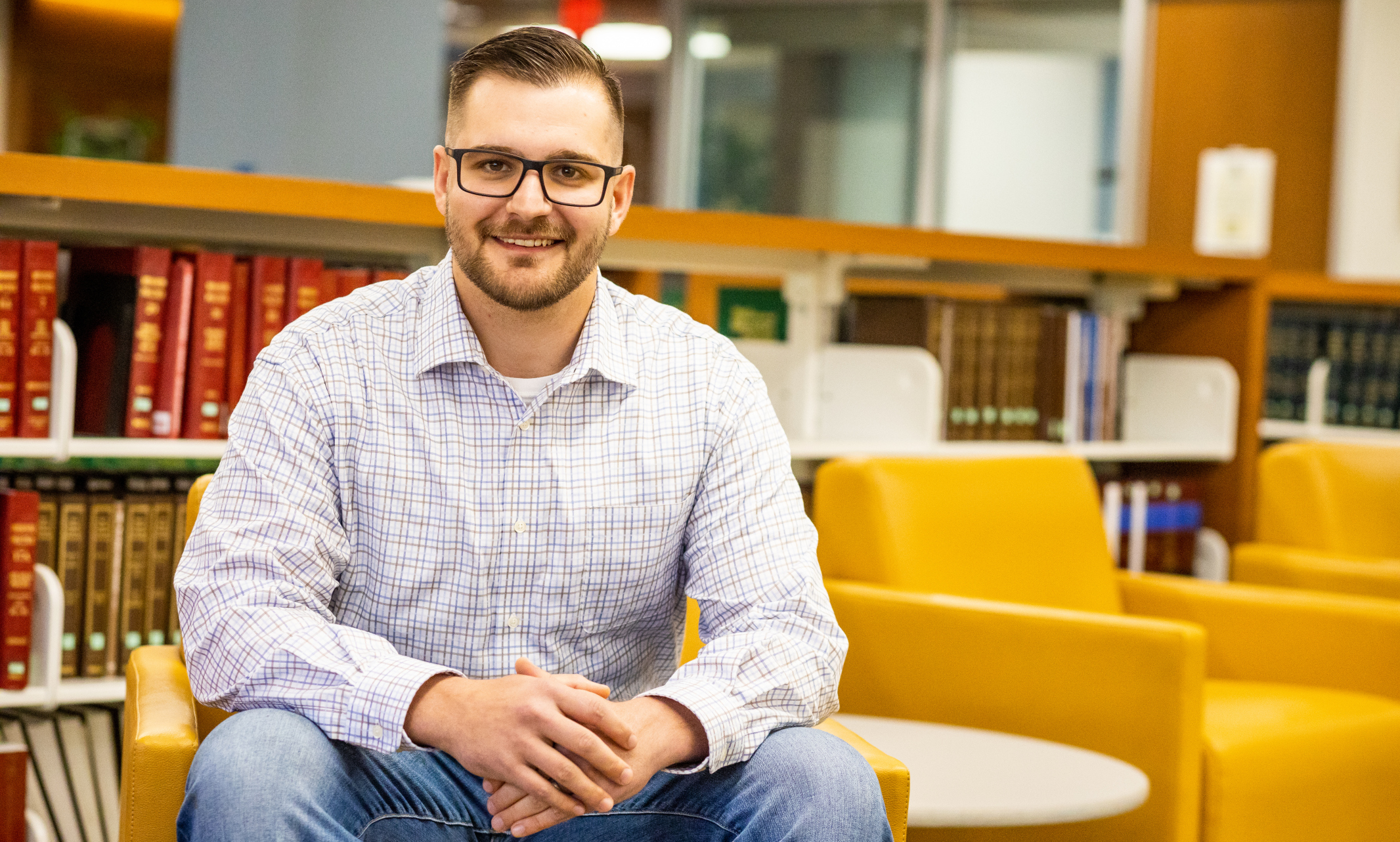
Daniel Foose found an affinity for agriculture while working at a hog farm; now he wants to focus his future law practice in that industry
Roos don't just dream, they do. Our students turn ideas into action every day. Get to know our people, and you'll know what UMKC is all about.
Daniel Foose
Anticipated graduation year: 2023
UMKC degree program: Juris Doctor
Hometown: Marshall, Missouri
Given his chosen career arc, you’d be tempted to assume that Daniel Foose grew up on a farm. Not so.
“While my family did not own a farm or have anything to do with farming, I was fortunate enough to grow up around farming and agriculture,” he said. “In high school, I was very involved in FFA (a national agriculture education and leadership program) and earned my American FFA Degree. While in high school and even through college, I worked at a hog farm in Marshall.”
While earning his undergraduate degree at Northwest Missouri State University, he set a course for a career in criminal law. He interned for the Nodaway County prosecutor, shadowed the Nodaway County associate circuit judge and eventually worked for the Saline County prosecutor in Marshall.
A local internship convinced him to make a course correction.
“During the summer after 1L year, I had the opportunity to work as an intern for Seaboard Corporation, a Fortune 500 agribusiness company located just outside of Kansas City in Merriam,” Foose said. “Seaboard is a major producer of pork, and I knew about them from my time working at the hog farm in high school and college. After interning for the summer, Seaboard graciously offered me the opportunity to stay and work as a law clerk for Seaboard Foods.”
Long term, he plans to begin his career in general business litigation, then move to a focus on litigation involving agribusiness.
“My education at UMKC has been challenging, yet fulfilling,” he said. “I have enjoyed learning from professors who are passionate about the law and the areas they teach, and I appreciate the variety of classes that are offered. Both the professors and the law school take seriously the charge of preparing the next generation of lawyers, which is a huge benefit to myself and all who attend UMKC School of Law.”
Why did you choose UMKC?
I chose UMKC because it is relatively affordable and close to home. Additionally, I have known and admired several attorneys that went to UMKC School of Law.
Why did you choose your field of study?
I chose the legal field because I knew it would put me in a great position to help others. Additionally, I had an absolutely wonderful advisor and mentor, Dan Smith, Ph.D., at Northwest Missouri State. Smith and the other great professors helped me in my decision to pursue a law degree.
What are the challenges of the program?
Law school is demanding – mentally, emotionally and financially. For me, the biggest challenge has been balancing my time so that I am able to fulfill my personal obligations while in law school.
What are the benefits of the program?
My law school peers are some of the most talented and intelligent people I have ever met. I have had professional opportunities that I would have never thought possible. Most importantly, I have made lifelong friendships in law school.
How has your college program inspired you?
I have achieved far more than I anticipated when I first started law school at UMKC. Finding academic success in law school gave me the confidence to go and seek out opportunities, both personally and professionally, that I otherwise wouldn’t have.
Since entering college, what have you learned about yourself?
I have learned that the difficulties and hardships you endure will only prevent you from being successful if you let them. No matter where you are from or what you have been through, you can accomplish anything.
Are you a first-generation college student? If so, what does that mean to you?
I am not a first-generation college student. My mother made the brave decision to go to college after my father passed away and successfully graduated with her bachelor’s degree. I am, however, the first person in my family to go to law school (or graduate school in general) and will be the first lawyer in my family.
Who/What do you admire most at UMKC and why?
I admire my classmates. My class started law school while the pandemic was in full swing, and, even through Zoom classes, and never having a snow day, we made it through.
Jul 31, 2023
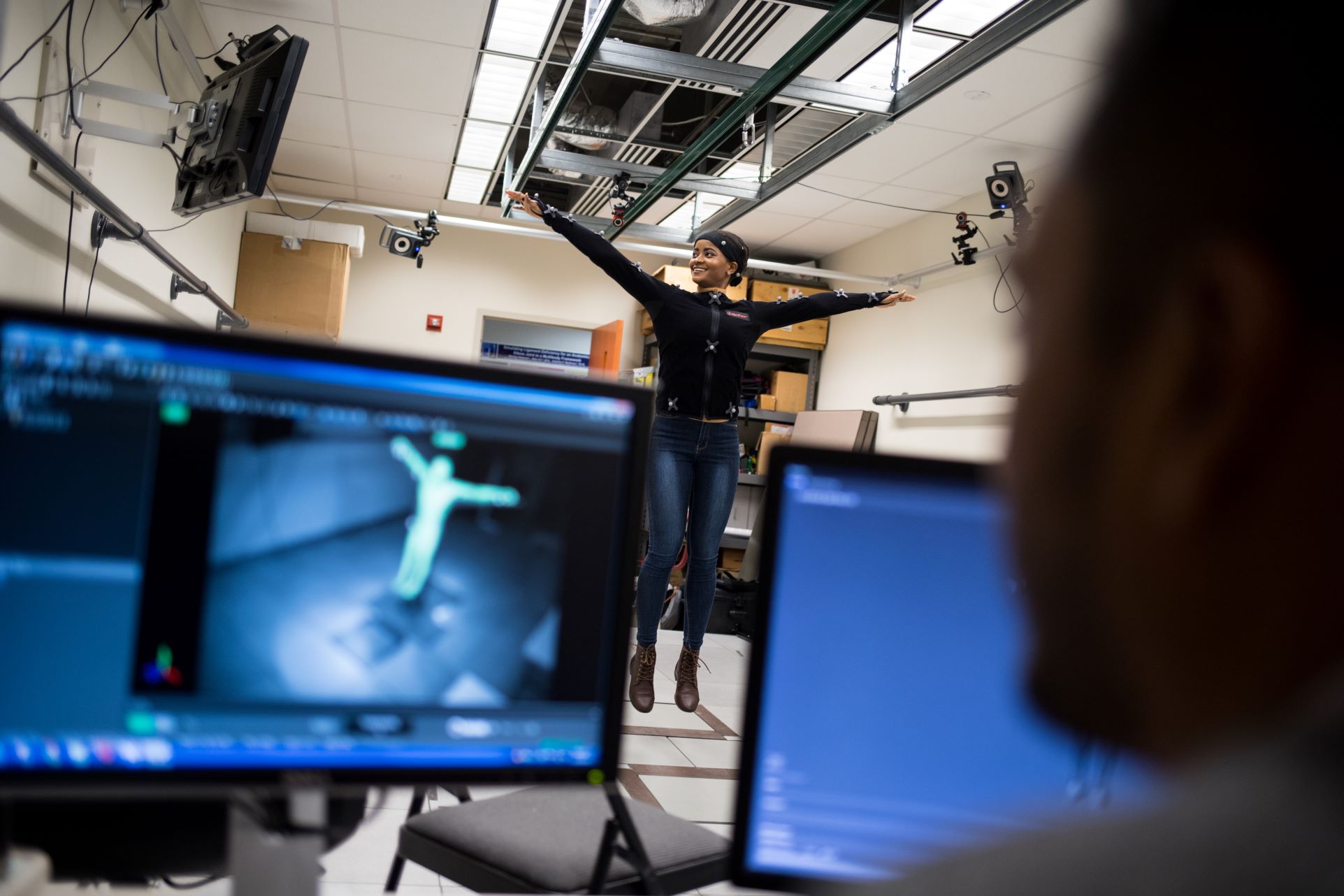
Includes undergraduate and graduate degree options as well as an accelerated five-year combined degree
The University of Missouri-Kansas City School of Science and Engineering has officially rolled out its biomedical engineering program.
The program introduces students to both medicine and engineering principles to support innovation and discovery in biomechanics and orthopedics, imaging, bioinformatics, biotransport, bioelectronics and medical devices.
“The program will also expose students to clinical aspects of biomedical engineering through collaborations with our medical school, which is not always the case in many undergraduate programs,” said Antonis P. Stylianou, Ph.D., who will be teaching as an associate professor as part of the biomedical engineering faculty.
The program is designed based on a broad approach, combining aspects from electrical engineering, mechanical engineering, computer science, chemistry, biology, physics, medical training, pharmacology and pure biomedical engineering courses.
The faculty reflects this diverse field, with professors from multiple disciplines teaching courses including engineering, medicine, pharmacy, dentistry, nursing and biological sciences. This multidisciplinary approach puts UMKC in a unique position to lead new breakthroughs in bioengineering.
“Research related to bio and health technologies have increased at an astounding rate within the School of Science and Engineering at UMKC over the past few years ,” said Katherine Bloemker, assistant dean of academic affairs. “This research focus provides the perfect foundation for our biomedical engineering degrees. Plus, the UMKC Health Sciences Campus and the proximity of local research hospitals such as Children’s Mercy, University Health and Saint Luke’s provide unique opportunities for students to explore this field.”
With the $32 million state-of-the-art Robert W. Plaster Free Enterprise and Research Center, students will be able to utilize facilities such as the Innovation Studio and the research labs. The building is equipped with cutting-edge technology, such as 3D printing labs, that will prepare graduates to excel in fields like careers in engineering, health care, medicine, dentistry, biotechnology, bioinformatic and pharmaceutical fields.
Employment of bioengineers and biomedical engineers is projected to grow 10 percent from 2021 to 2031, faster than the average for all occupations, according to the U.S. Bureau of Labor Statistics.
Atlas Sizemore came to UMKC as a freshman, before the bioengineering degree launched, with the intent to enroll in the program when it launched. Now a sophomore, Sizemore is excited to join the program.
“I plan on getting my graduate degree in prosthetics and going on to be a prosthetist,” Sizemore said. "I think that the biomedical engineering degree at UMKC will really help to prepare me with skills in design as well as the medical foundation of my work." Sizemore is particularly looking forward to taking 3D printing and design.
In the future, the program will have a dedicated space in the $100 million Healthcare Delivery and Innovation Building, located at the UMKC Health Sciences Campus. Construction for that building is expected to begin later this fall, with a projected opening in 2026.
Jul 31, 2023

Amy Patel, M.D., championed a new law requiring medical insurers to cover all costs
Amy Patel, M.D., of the University of Missouri-Kansas City School of Medicine, played a leading role in bringing about a new law in Missouri that requires health insurance companies to pay the full cost of diagnostic breast imaging without charging patients a co-pay or deductible.
Patel is an assistant professor of radiology at UMKC, medical director of the Breast Care Center at Liberty Hospital and a 2011 alumna of the UMKC School of Medicine. She worked closely with State Rep. Brenda Shields and the Susan G. Komen organization to get the legislation drafted and passed. The legislation also had support from The Missouri State Medical Association, Missouri Radiological Society and the Missouri Society of Pathologists. Gov. Mike Parson signed the bill into law in July, and it takes effect in January 2024.
Diagnostic imaging tests, such as 3D mammograms, MRIs or ultrasound exams, play a critical role in getting patients an early start in treating breast cancer, which greatly improves odds of overcoming the disease.
This was not Patel’s first foray into advocacy on behalf of patients. In 2020, she campaigned for a new law that requires insurance companies to pay for breast cancer screenings for patients ages 25 to 29 if they are at higher risk, as well as screenings every six months from age 30.
In 2022, Patel was named the Kansas City Chiefs Fan of the Year in recognition of her role as a leading community advocate for access to breast cancer treatment care.
We caught up with Patel on the new legislation.
What is the primary significance of this new law?
This law requires Missouri insurance carriers to cover diagnostic breast imaging for patients without co-pay or deductible. This means that if a patient is called back for additional breast imaging testing such as a diagnostic mammogram, ultrasound or MRI, it must be covered without co-pay or deductible. Diagnostic breast imaging also encompasses patients who present with a lump or pain, or who have had prior surgeries for breast cancer which necessitate a diagnostic mammogram follow-up for a number of years.
Have you had experiences with patients who delayed diagnostic breast imaging because of the cost? What are the implications of that?
Unfortunately, yes. We have had patients who do not return for additional diagnostic breast imaging testing when we know they have a breast cancer we need to address, and/or they return or present when the cancer has spread to the lymph nodes in the armpit and even other parts of the bodies at times.
Is that why you worked so hard on this?
I worked hard on this because I live and breathe this every day in clinical practice. Patient access and bridging the gap of breast care inequities has become a life's calling and a focus of my career. I felt that I was in a position to advocate for change, and although we were not successful in getting this legislation passed last year, we soldiered on this year and were successful. Too many lives depended on it for us to not continue to fight for patient access.
How does advocating for important changes like this demonstrate your commitment to your mission as assistant professor of radiology at UMKC School of Medicine?
As much as I do have an avid interest in education and research, I feel that it is equally imperative to commit efforts to boots-on-the-ground advocacy and access. As I always say: what good is the research we do if we are not going to take that information and do something about it to positively and directly affect our patients? Through evidence-based care, we can bridge the gap of breast care inequities, and I am so appreciative that I am able to do this type of work, which is valued and respected by the UMKC School of Medicine.
Jul 28, 2023
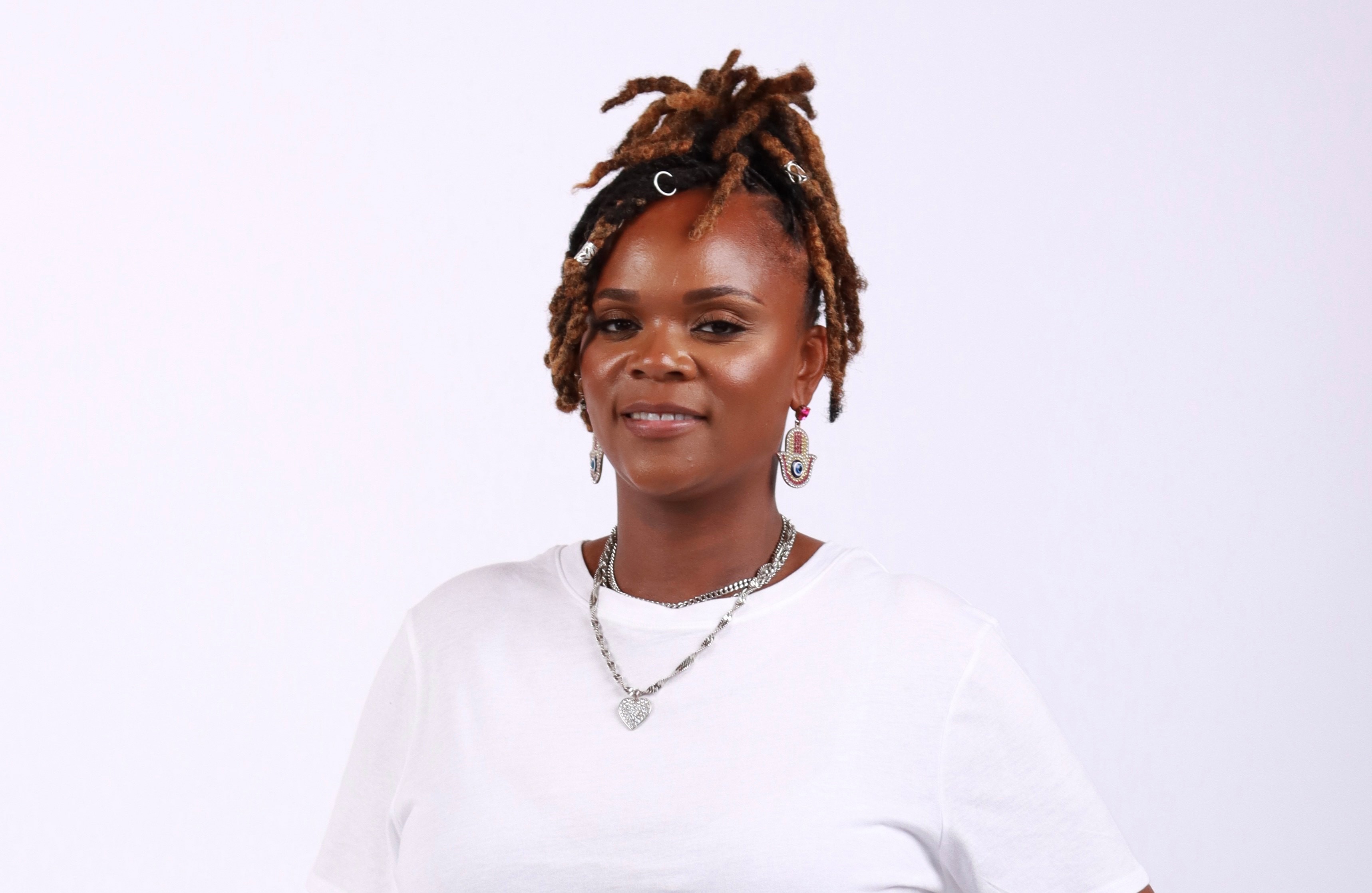
UMKC Institute for Urban Education prepped her for teaching, classroom management, commitment and fun
Tanya Jones knew she wanted a career that enabled her to be a part of something bigger than herself.
“I wanted to be a part of shaping young children’s minds and laying the foundation for generations to come,” Jones says. “I had many teachers who encouraged and guided me to become a better student, and coaches who taught me important lessons about being on a team.”
An alumna of Westport High School, Jones came to the University of Missouri-Kansas City Institute of Urban Education because she wanted to partner with families to ensure their children succeed academically, socially and emotionally.
“I wanted to be a role model for students who did not have that in their lives.”
As part of the UMKC curriculum, Jones was a student teacher at the Academy for Integrated Arts (AFIA) in Kansas City. She says it was a great opportunity to experience the culture of the school, understand what it takes to make a school run and see the benefits of teachers and staff who really look out for each other.
“It was a great experience. They welcomed me with open arms.”
In addition, her cooperating teacher allowed her to be hands-on in the classroom.
“She was warm and welcoming, and was a great role model for someone like me, who is fresh in the field, to see what teaching is like on a day to day basis.” Jones says.
Jones learned a lot from student teaching.
“I learned classroom management skills, how to lesson plan and to never take things personally. Now I understand a student’s behavior is telling me something and it’s my job to proceed in a way that will benefit the student.”
Even though she’d done her student teaching there, she was nervous when she received a call from AFIA to set up a job interview.
“I was excited and nervous at the same time. We’d done role playing and acting out scenarios in class at UMKC, but I’d never had an interview like that before. I put my best foot forward and then I got a call that they wanted me to teach at AFIA.”
On her first day she was nervous, but confident.
“I knew that UMKC prepared me for my first day and the years to come. I was excited to implement what I’d learned in the classroom and student teaching.”
Jones found that she had made a good career choice. She loves building relationships with her students and their families. In addition, she received the Outstanding Beginning Teacher Award from the Missouri Association of Colleges for Teacher Education.
With her first year behind her, she has some advice for people who want to be teachers.
“Go slow to go fast. Don’t take anything personally,” Jones says. “Have fun and the intention to build a strong foundation in your classroom. A strong classroom culture will develop positive habits. Make sure you enjoy being around kids, and that you have enough patience for them and their families. It’s better to keep an open mind and be ready to lead.”
Jul 20, 2023
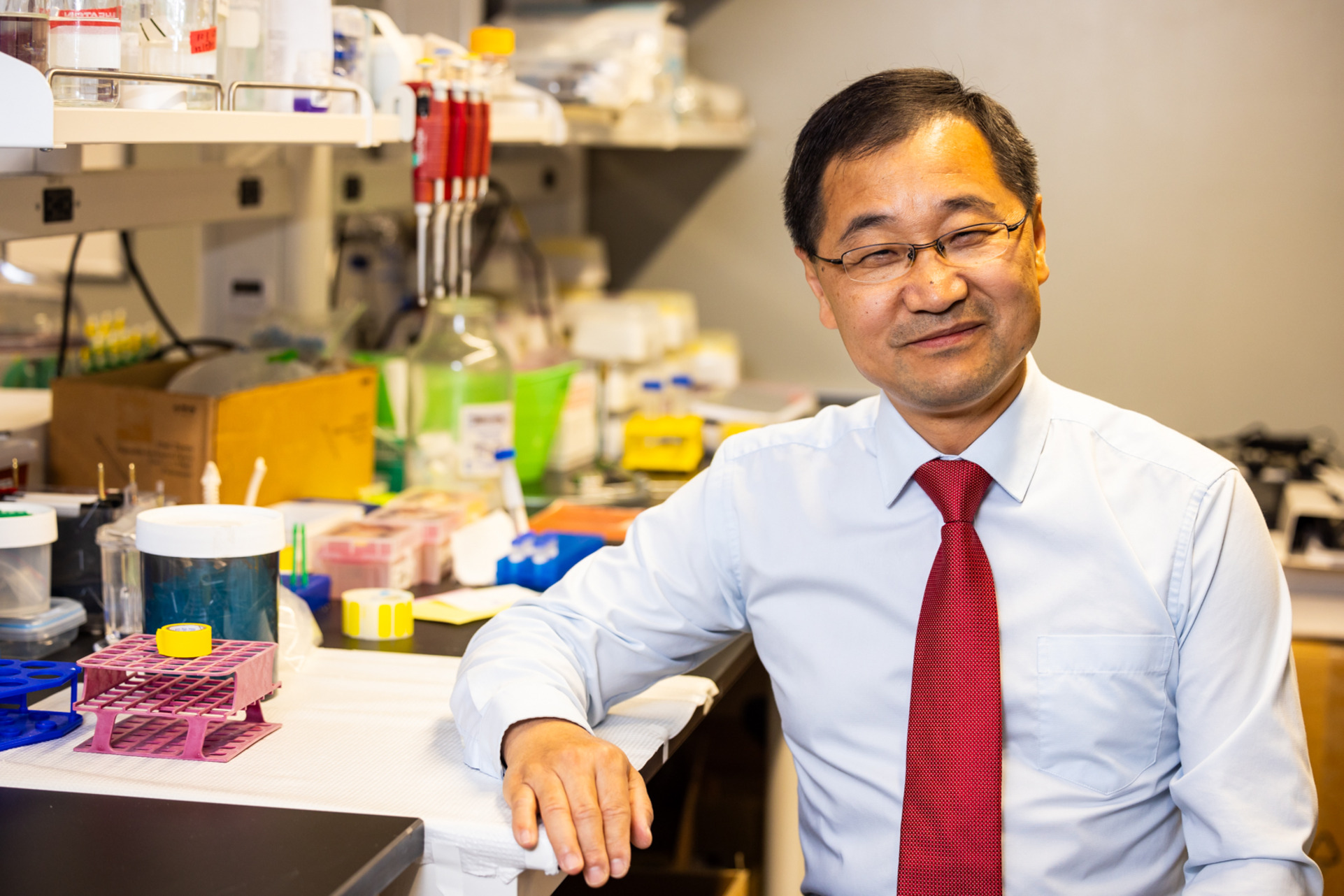
Shizhen “Jeff” Wang’s project will be funded for up to four years
Shizhen “Jeff” Wang recently received the R01 grant, a research project award from the National Institutes of Health (NIH), which will support his research for up to four years with about $1.3 million.
Wang credits the UMKC Center for Advancing Faculty Excellence (CAFÉ) program for help in securing the funds.
The CAFÉ program is currently in its second year. By providing comprehensive resources and support under four pillars (teaching and learning, service and engagement, research and creativity and faculty life and leadership), the program aims to advance faculty excellence.
One of the resources under research and creativity include workshops. During the workshop Wang attended, Chris Liu, Ph.D., Yong Zeng, Ph.D. and Alexis Petri, Ph.D., shared their experiences applying for federal grants and, more importantly, as grant reviewers.
“This was especially helpful for me as a junior faculty member without grant-reviewing experience. Developing the ability to write grant applications from the standpoints of reviewers is a key point to impress scientific reviewers and get their endorsements on my research project,” Wang said.
The CAFÉ workshop that Wang attended also featured experienced senior faculty Mark Johnson, Ph.D., professor at the UMKC School of Dentistry. His talk on preparing compelling grant applications to the NIH and effective ways to communicate with program officers to get their help and support was extremely helpful for Wang as he prepared his grant summary proposal. Feedback from other workshop attendees and the seed money that supported Wang’s quest to obtain his research’s preliminary data were additional benefits the CAFÉ workshop provided him as he worked on his grant application.
The grant will help support Wang’s project to understand the structure, function and drug modulation of cardiac voltage-gated sodium channel Nav1.5.
Wang’s lab will research how the Nav1.5 channel opens or closes in response to electrical stimuli and how genetic mutations alter the structure and function of the Nav1.5 channel that could lead to life-threatening diseases. These studies will pave the way for developing novel drug molecules to treat arrhythmias with higher specificities.
Jul 18, 2023
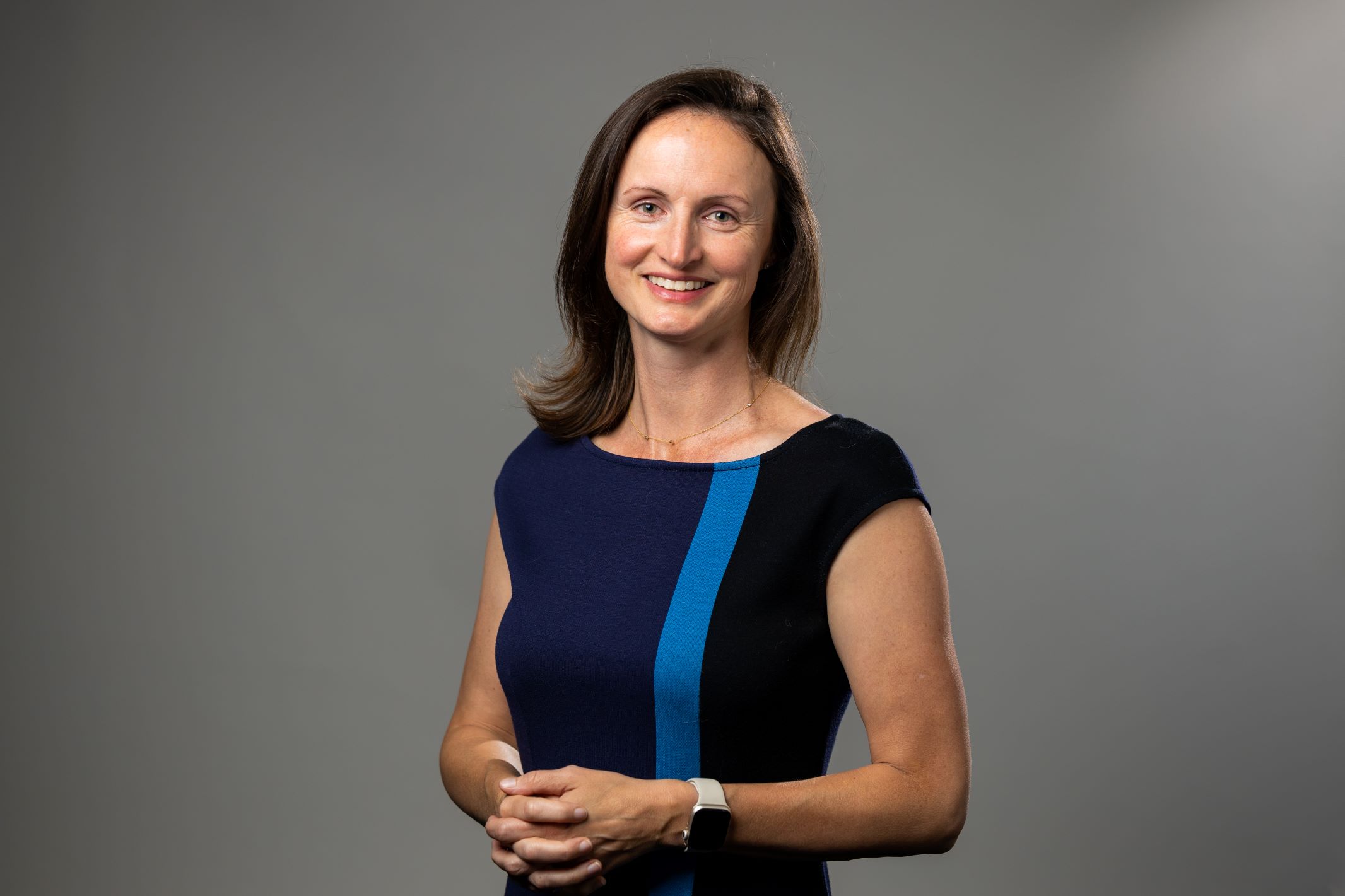
Meet the new UMKC School of Education, Social Work and Psychological Sciences leader
Sara Helfrich has joined the UMKC School of Education, Social Work and Psychological Sciences as inaugural dean.
Previously, Helfrich served as the interim dean of the Patton College of Education at Ohio University, where she oversaw four departments: Counseling and Higher Education; Recreation, Sport Pedagogy and Consumer Sciences; Educational Studies; and Teacher Education. In this role, she oversaw 125 faculty and staff at six campuses, serving nearly 2,000 undergraduate and graduate students. She received a Ph.D. in Instruction and Learning, Reading Education Cognate from the University of Pittsburgh.
Did you have teachers who inspired you?
I did, though not at the time. My third-grade teacher was terrifying. When I look back on it, it’s not how we would teach today, but she was a fantastic teacher of the whole person. She taught us to speak up for ourselves. The professor of my introductory education course my freshman year of college really challenged us to think about things that, at that time, were not talked about like they should have been and are today, like the gender assumptions we make about children, the toys we give them and how we expect them to play and act. She was very inspiring.
Why did you become a teacher?
From a young age, I just knew I wanted to be a teacher. I was drawn to it naturally. I liked working with people to help them learn and become better at something. My first teaching position was as a special education teacher. I loved the students, but I realized that I was unprepared to work with them because they all struggled with reading in different ways. As a second or third-year teacher, I didn’t know the best way to be helpful.
I decided to get my doctorate in literacy education. Pretty quickly I realized that I could have the most impact working with pre-service teachers. Teaching teachers meant that I wasn’t only helping the children in my classroom, but helping the children in all of my students’ classrooms.
What attracted you to UMKC initially?
When I was looking into the dean’s position, UMKC Forward was in process. I thought the programs that were coming together in the school were a really magical combination. They speak to each other, and they can stand alone. I was amazed at the possibility of the future career paths for our students and the opportunity for the faculty and the students to work together.
In addition, from the beginning, I was attracted to the university’s connection to Kansas City and its commitment to urban areas of the city. I grew up in an urban public school system. In college, I did some of my teacher training in urban schools, and it was great. I was excited that UMKC was intentionally focusing on placing students and graduates into urban schools and other clinical settings in the city. It’s a great give-and-take relationship. The things our faculty and students offer to the city are valuable, but the community offers as much to us.
My goal is to spread the message of our outstanding programs and the opportunities available to our students and alumni. We are helping to create talented professionals in education, counseling, research and social work who are making significant contributions in their communities. In addition to their success, they are role models for the next generation.”
Jul 18, 2023
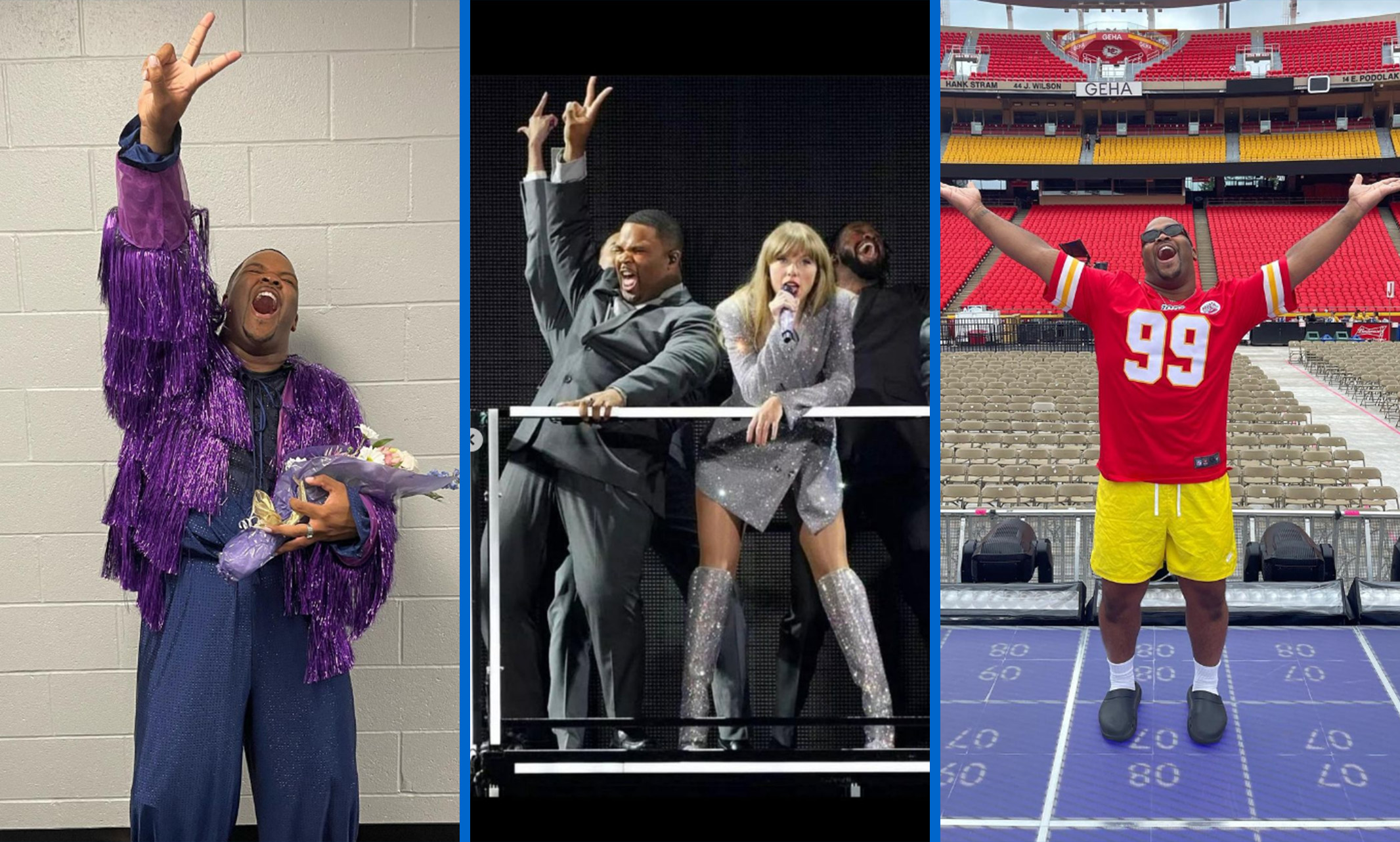
Conservatory alumnus Kameron Saunders even had the chance to ‘make the whole place shimmer’ in Kansas City recently
Kameron Saunders (B.F.A.) is currently on the Eras tour with Taylor Swift as a backup dancer. Although originally from St. Louis, Saunders considers Kansas City a second home.
Ahead of Swift’s Kansas City concerts, Saunders posted a picture on Instagram sporting a Khalen Saunders Chiefs jersey. It just so happens, the dancer and the former Chiefs defensive tackle are brothers! In the post, Saunders stood in Arrowhead Stadium with open arms and a gleeful smile.
“I graduated from UMKC, I lived here on and off for the past 4 years, my brother played for the Chiefs (2019-2023) and I’ve been to games at this stadium way more times than I can count to support my brother but never been on the field. Full circle!!!” Saunders wrote in the caption.
View this post on Instagram
A post shared by Kameron N. Saunders (@kamnsaunders)
The announcement of Saunders’s booking came on social media after the tour’s opening night in Glendale, Arizona.
“I can finally announce that I am one of 15 dancers (the only plus size) on the Eras world tour with Taylor Swift. I have been holding onto this since December when I got the call. We opened last night in Arizona and I am just overwhelmed by all the love messages and DMs.”
View this post on Instagram
A post shared by Kameron N. Saunders (@kamnsaunders)
It’s not the first time Saunders has shared the stage with a mega star. The choreographer and dancer also performed with Lizzo at the BET awards last year.
View this post on Instagram
A post shared by Kameron N. Saunders (@kamnsaunders)
Jul 17, 2023
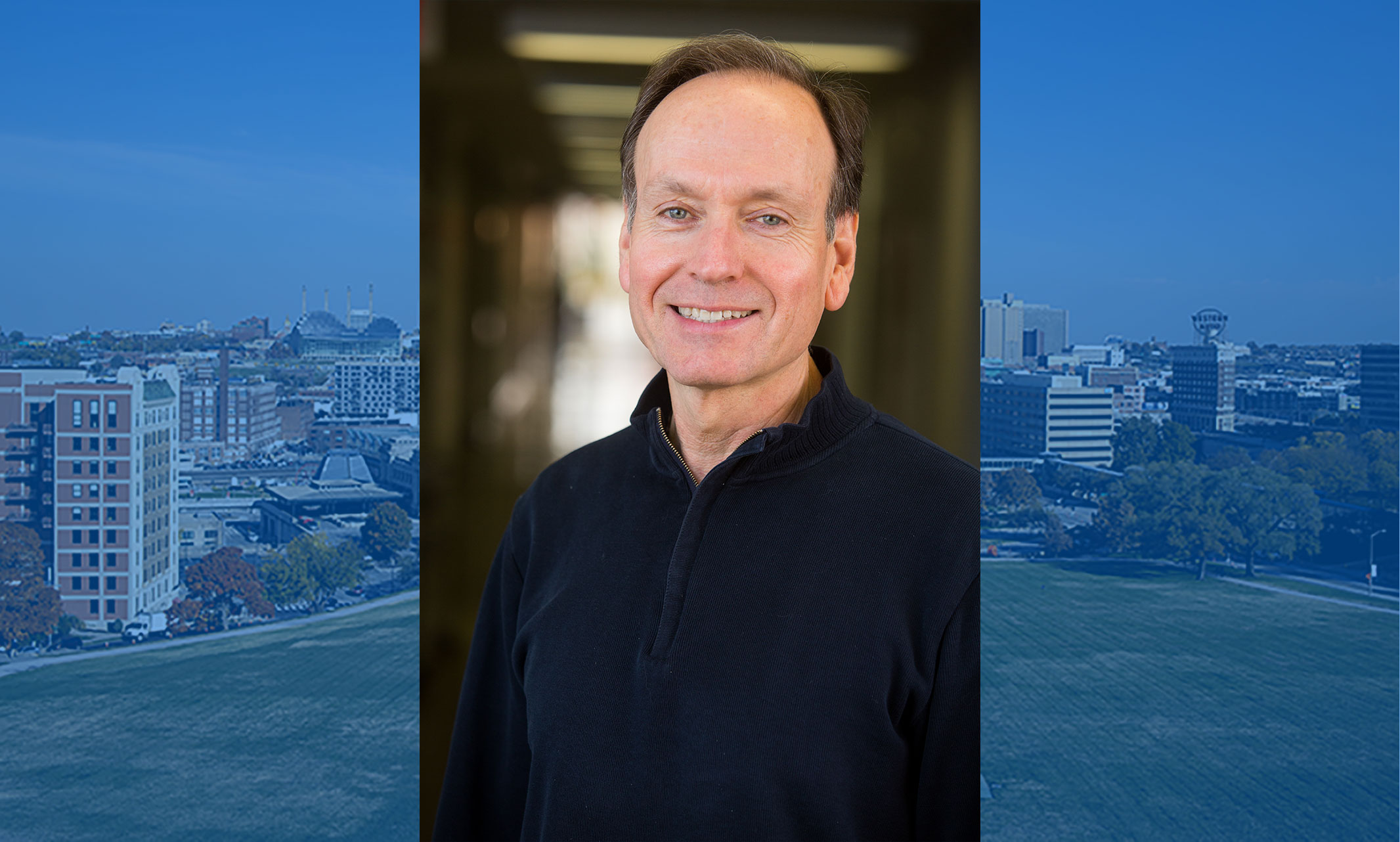
The award will fund promising research on a treatment for ALS
A University of Missouri-Kansas City researcher has secured funding for a project which could significantly improve the lives of people diagnosed with the deadly neurodegenerative disease ALS, commonly known as Lou Gehrig’s disease.
Thomas Menees, an associate biology professor, and his collaborator, Aaron Gitler from Stanford University, received the Frontiers Trailblazer Pilot award to further their research, which advances a promising drug therapy for the disease. Currently, there are no treatments that significantly alter the course of this disease, and death typically occurs within two to five years of diagnosis.
Most ALS cases are associated with clumping of the RNA-binding protein TDP-43 inside motor neurons of the brain and spinal cord, which leads to motor neuron death.
Gilter and Menees were both studying enzymes that suppress TDP-43 aggregation, and thus decided to collaborate to identify these enzymes that could help treat ALS and HIV infection when inhibited. Menees plans to carry the work forward by using the best inhibitor to develop a drug for ALS.
“We’re in the ‘Valley of Death’ stage right now in the drug development process,” Menees said. “This is where basic research discoveries that could help patients have advanced to a point where targeted, applied research funding is important, but hard to get. Our project will take our best inhibitor and design novel, more effective inhibitors that could slow or stop the progression of ALS.”
This project is a collaboration among UMKC, Stanford University and the University of Kansas.
Jul 13, 2023
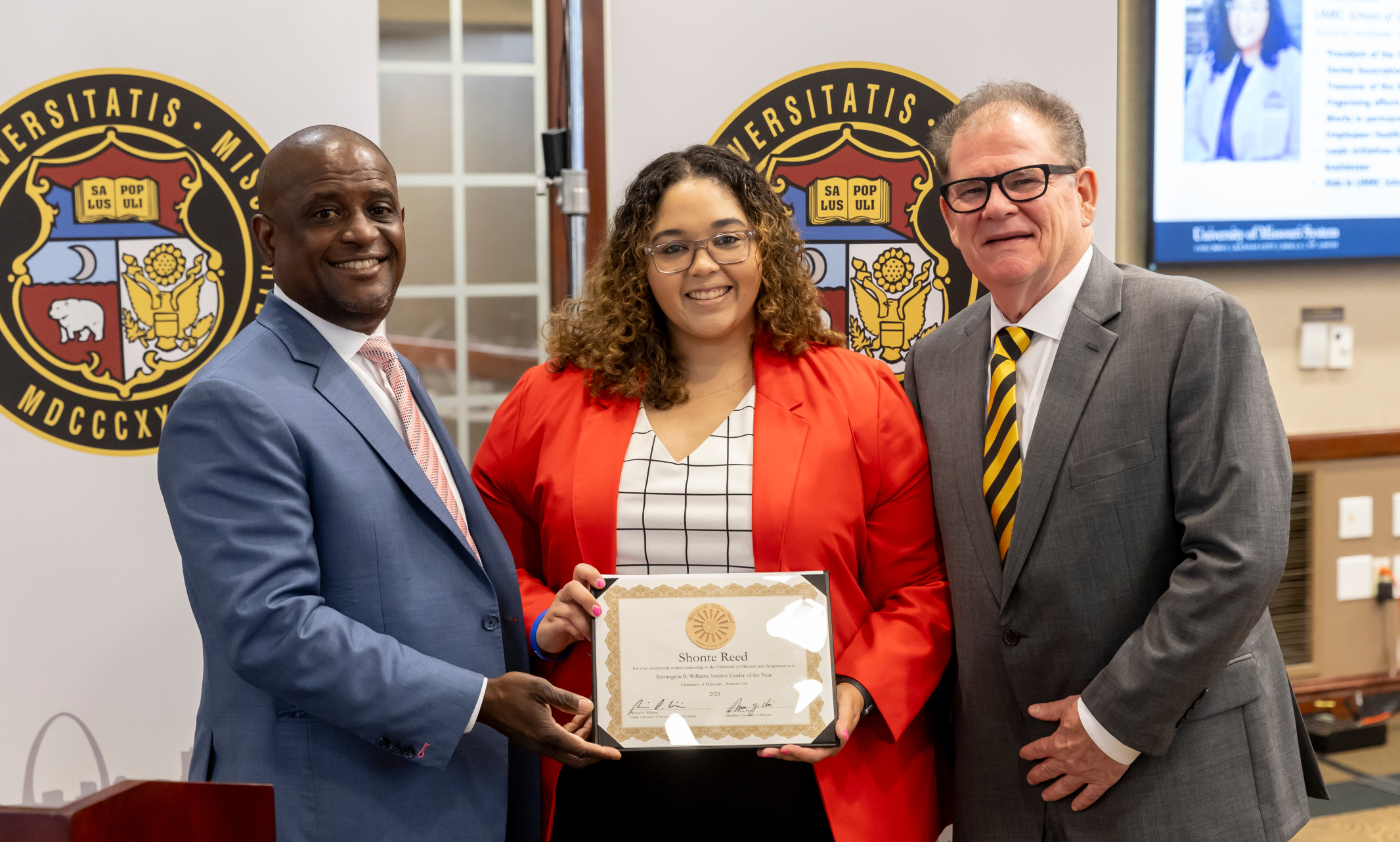
Remington R. Williams Award, named in honor of late student leader and UMKC alumnus, recognizes outstanding character and collaborative spirit
Shonte Reed, a rising fourth-year DDS student at the UMKC School of Dentistry, has been chosen to be the inaugural UMKC recipient of the Remington R. Williams Award.
She will be recognized at the June 29 Board of Curators meeting for maintaining an outstanding academic record while providing exceptional leadership and service.
UMKC alumnus Remington Williams (J.D. ’22), the student representative to the University of Missouri Board of Curators, died in a car accident last year. He was revered as a natural leader and caring human being who accomplished much, driven by a passion for helping others.
“Shonte Reed has demonstrated exceptional leadership and commitment to her classmates, and to her community,” said UMKC Chancellor Mauli Agrawal. “Her tireless efforts to encourage more young people of color to pursue careers in dentistry and other health professions are a testament to her character, and exemplify the spirit of Remy Williams.”
During her time at UMKC, Reed has served as Student Council vice president of the class of 2024; president of the UMKC Student National Dental Association/Hispanic Student Dental Association; national vice president of the Student National Dental Association; treasurer for the UMKC Dental Anesthesiology Club; and a representative on the School of Dentistry Diversity, Equity and Inclusion Council. She established a national network of prospective and current minority dental students through her social media platform and business, Black Dental Students & Pre-Dents, LLC. Faculty and staff turn to her often to counsel prospective students from underrepresented backgrounds as an ambassador for the UMKC School of Dentistry.
She mobilized the organizations she led to participate in recruitment efforts at historically Black colleges and universities; led efforts by the organization to support Black-owned businesses in Kansas City; and organized holiday toy drives for Children’s Mercy Hospital in 2021 and 2022.
Reed also has served as a mentor in the Students Training in Academia, Health, and Research (STAHR) Partnership, a collaborative of the UMKC schools of medicine, dentistry and pharmacy. The program is designed to increase the number of students from disadvantaged backgrounds entering health care programs and better prepare them for success academically and professionally.
In a letter of recommendation to the scholarship committee, Richard H. Bigham, assistant dean for student programs, wrote: “In my twenty plus years of working in higher education, she is the most exceptional student I have ever supported and has become a transformational leader for our community.”
In addition to multiple recommendations from School of Dentistry faculty and staff, her nomination was also endorsed by Laila Hishaw, DDS, a UMKC alumna and president of the board, Diversity in Dentistry Mentorships Inc.; and Melissa Robinson, president of the Black Health Care Coalition in Kansas City.
The Remington R. Williams Awards are the highest non-academic award bestowed on students by the Board of Curators and are given in memory of his outstanding service as Student Representative to the Board (2020-2022). Recipients will be selected annually from among the four UM System universities and will receive a leadership medal to wear at graduation, a $1,000 award and an invitation to be recognized at a Board of Curators meeting.
The awards recognize exceptional student leaders who have also made an impact on their respective institution, inspired growth and development of fellow students in both academics and extracurricular activities, and exhibited outstanding character and collaborative spirit at all times.
Jun 28, 2023
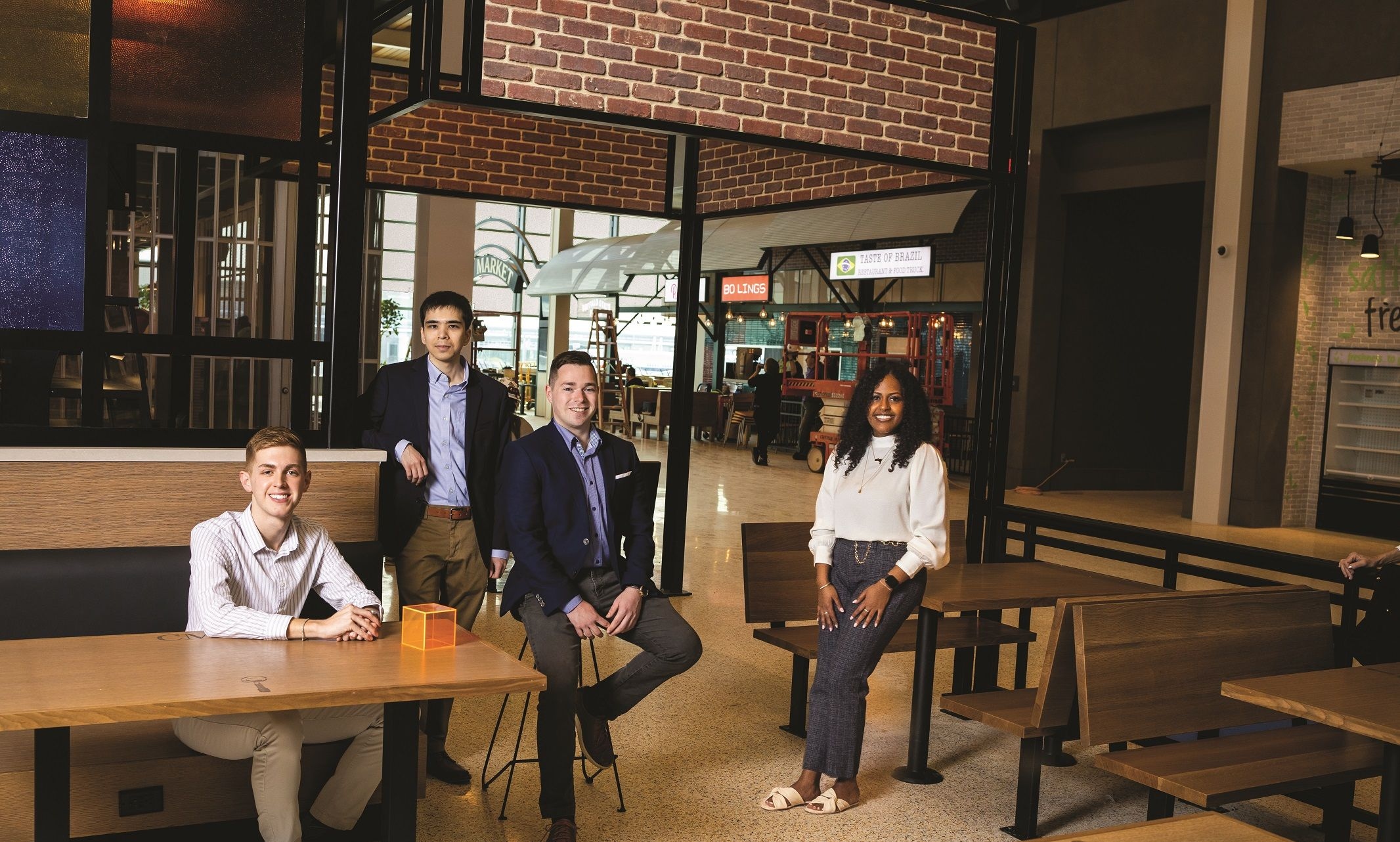
Bloch Consulting Lab creates lessons from real-world experiences
As MBA student Msgana Teklebrhan Zegeye sees it, a business consultant’s job is to learn whatever a client needs them to learn.
That’s exactly what she’s done in her job as a student consultant employed with the Consulting Lab, a new Regnier Institute initiative at the Bloch School. With generous donor support, the Lab hires students like Zegeye to serve as pro-bono consultants for Kansas City-area entrepreneurs and small businesses. Working under faculty supervision, student consulting teams provide a range of services, including market research, business plan development and financial modeling. The lab is designed to both provide opportunities for experiential learning and valuable consulting resources for the community, with a particular focus on entrepreneurs and small businesses from under-served communities. It also helps students develop critical thinking and problem-solving skills, analytic capabilities and communication skills. As part of this effort, the Lab has partnered with several organizations that work with entrepreneurs from underserved communities. These partners have been instrumental in identifying clients that might bene-fit from the Lab’s consulting resources. AltCap, G.I.F.T., the Urban League, Pipeline Pathfinders and Pathway Financial Education have all been working with the Lab to create connections with potential clients.
The Lab also partnered with Vantage Airport Group, the company overseeing concessions at the new Kansas City International Airport. During this project, Zegeye and the other students on the consulting team worked with the local businesses preparing to open inside the new concourse. For all of the Bloch Consulting Lab projects, the consulting team must first understand the client’s business and the nature of the problem that they are being asked to address. Then they must develop a thorough understanding of any unique aspects of the client’s operation.
Photo by Brandon Bland | UMKC
Working with concessionaires at the Airport, the consultants learned about special security precautions that affect how a business operates. They learned that restaurants can have knives, but only if the knives are tethered to a wall. They learned that employees must live at the address printed on their official ID and about other security requirements that might affect the available pool of employees. They learned about how the business model for a restaurant or store may need to change when operating inside an airport. They also learned about the challenges of attracting workers given the distance to the airport from where many potential employees live. “I’m not going to say problems didn’t arise,” Zegeye says of her consulting work leading up to the airport’s grand opening. “But, figuring out how to manage them has been one of the best things.” The Consulting Lab is a relatively new Bloch School initiative, opening just last summer. Friends of the school have provided both philanthropic support and creative ideas about how the Lab can be most impactful, both for students and the community. Mike Plunkett, co-founder of PayIt and chair of the Bloch Advisory Board, led productive brainstorming sessions with the Bloch Advisory Board about how to launch and support the Lab. Young Sexton, founder of WingGate Travel and the Sexton Family Foundation, advocated for leveraging student expertise to help underserved entrepreneurs accelerate growth at key stages of the entrepreneurial development cycle. Roger Nelson, former deputy chairman of Ernst & Young, developed processes for the Lab to support application-based learning and to enhance the effectiveness of consulting services. Jeffrey S. Hornsby, director of the Regnier Institute and the Henry W. Bloch Endowed Chair of Entrepreneurship, is one of the faculty members overseeing student consulting teams. According to Hornsby, “This is the perfect project for a school with a strong commitment to community engagement, one that reflects Henry Bloch’s long-standing vision for the school.” In addition to their work at the airport, consulting teams worked with several clients identified through other organizations. This included projects for an entrepreneur with a strong, on-going business who wanted to expand via diversification into a related line of business, a technology firm in early startup mode who needed assistance with its business plan and a new venture that needed assistance with brand development.While working with the Consulting Lab, students are assigned to teams and supervised by a Bloch School professor. The Lab, which plans to employ between 30 and 40 students annually in future years, is open to students from across business disciplines, which means the Lab will be able to offer a variety of services.“It really offers great experience for students,” says Marvin Carolina, Jr., an assistant teaching professor who worked with the team of students assigned to the airport. “This is real time. This is real business. This is real life.” With every project, student consultants start by listening to what their client is looking for and understanding their business goals. From there, they consider how best to provide support. The student consulting team also highlighted how their work with other clients helped prepare them for the work with the airport vendors. Erik Klaas suggested that, “Over the summer, I was able to work with businesses and entrepreneurs in their early start-up stages. Those early experiences in working with small businesses provided me with a great foundation for taking on the airport project.”“Most of these students have worked in jobs where they’ve earned a wage and gotten a W-2,” says Bruce Snyder, a faculty advisor to the lab who spent more than 30 years at Ernst & Young, a business management consultant firm based in Kansas City. “But to talk to a business owner and understand what it takes to succeed is not something out of a textbook where you’re given the facts and the numbers. These are not, by any means, textbook cases. They’re very fluid.” “Helping businesses in urban, underserved communities overcome obstacles, to become stronger and cre-ate jobs will make communities stronger,” says Snyder. “Economic growth is the key to any successful urban community.”
From the Bloch students’ perspectives, the Consulting Lab is also designed to provide hands-on experience that will help them compete for top jobs when they’re ready to enter the business world.Henry Meeds, who is majoring in management and accounting, says the experience he gained while working with the Consulting Lab helped him land a permanent job in New York City. When he graduates this spring, Meeds will step into a consulting position with PwC, one of the country’s top consulting firms.“We’re getting hands-on experience during every part of the project,” Meeds says of his team’s work at the airport. “We’re doing things that maybe a partner would be doing at PwC.”Nicolas Hartung, another student on the airport project, says the consulting work has made him a more confident communicator.“In January, we went (to the airport) and delivered our project to all of the concession owners and opera-tors there,” he says. “It was a really cool experience because we saw how we’re helping them firsthand, and that they were actually going to take our advice and learn from it.”As part of the experience, students learn to sell themselves, Snyder says. Although the lab doesn’t charge clients, students need to persuade clients to give them the time it takes to provide consulting for their businesses. Some clients realize that the students’ ages and perspectives can offer perfect measure for how their business plan will be received.“Being candid, we’ve had some businesses come to us with what they think is a good strategy or a good development, but we’re scratching our heads and wondering how this would work,” Snyder says. “Then the businesses realize that if the students, who represent the demographic group they may be targeting don’t understand, it’s unlikely the general public will.”Gaining a new perspective was a big reason Vantage’s general manager, Lovell Holloway was excited for the opportunity to work with Bloch’s student consultants. “This is a once-in-a-generation opportunity and our vision was, how do we bring more people along?” Holloway recalls. “We have legacy behaviors around staffing, economic impact studies and internships. We wanted to break the norm.”Holloway asked students to get involved in each of those areas as his company opened concessions at the airport.“Having the perspectives of people from a younger generation only made sense,” he says. “They’d have fresh ideas and help us look at this from a better point of view.”
Jun 23, 2023
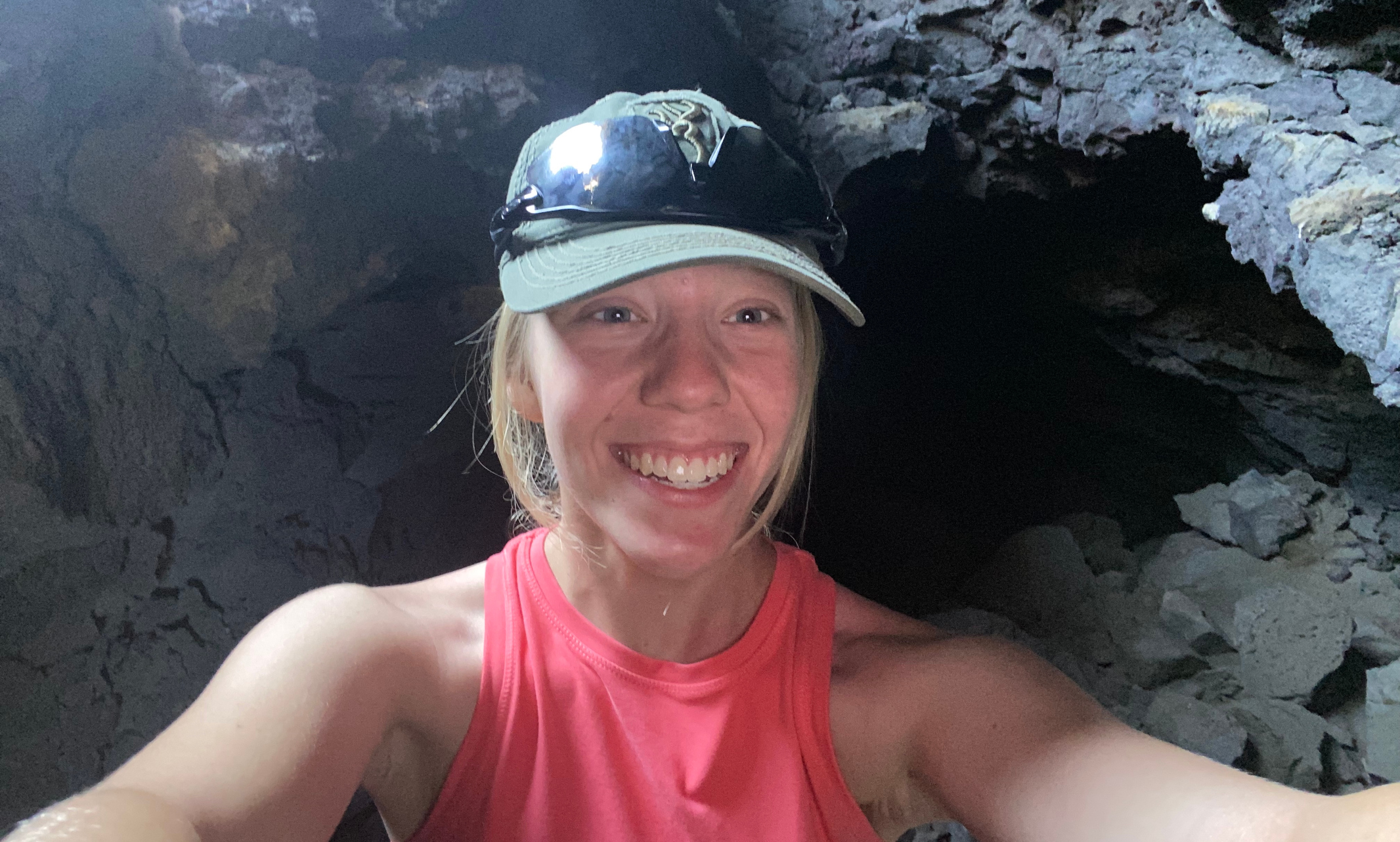
Tyler Center for Global Studies funds student research projects in Argentina, Iceland and Jordan
Three UMKC undergraduate students have received $2,000 grants from the Tyler Center for Global Studies to fund research projects in foreign countries.
Yasmeen Hanon will study international issues such as Arab-Israeli relations, regional conflicts, politics, international relations, environment and more in Amman, Jordan. Maximus Reeds will research media bias involving news coverage of the indigenous Mapuche people in Puerto Madryn, Argentina. Mya Thomas will work on creating a safer and more accurate modeling system for volcanic lava tubes at the Askja volcano in Iceland.
They are the first UMKC students to receive research funding from the Tyler Center, which works to advance global education through funding organizations and programs that support international education, innovation and research, with priority given to Pell-eligible students.
Maximus Reeds, Argentina
Reeds, of Lee’s Summit, launched his project in the capstone seminar program in the UMKC Department of History. His ethnic background is Welsh-Argentine, and he has been following the struggles of the Mapuche people in Chile and Argentina and the Welsh people in the United Kingdom for several years.
In his preliminary research, he found significant differences in media coverage of these issues between media outlets with a nationwide audience, and those primarily serving local communities. In Argentina and Chile, he said, the national media tend to portray these issues through the lens of their individual political leanings. He also noted that violent interactions dominate coverage.
“These interpretations disregard the daily, peaceful interactions between Mapuches and Argentine and Chilean citizens, which is the focus of local newspapers.”
Mya Thomas, Iceland
Thomas is from Columbia, Missouri and is majoring in earth and environmental science with an emphasis in geology; she is also enrolled in the UMKC Honors Program and is pursuing a minor in astronomy and a certificate in geographic information systems. She will be traveling to Iceland with her research mentor, Prof. Alison Graettinger.
The basis for her research is that volcanoes are dangerous places, and not just when they erupt. Scientists often have to navigate dangerous terrain, including caves and lava collapse features, lava tubes and holes. Thomas is working on a method to create accurate digital models of features such as lava tubes.
“Understanding the nature of lava tubes is important to my academic path because my interest falls in planetary science,” Thomas said. “Studying cave environments is important to planetary science since they may be considered as living quarters for astronauts on extraterrestrial lands.”
Yasmeen Hanon, Jordan
Hanon recently received a Benjamin A. Gilman International Scholarship for her research project in Jordan. Hanon, from Kansas City, will spend this summer at CIEE in Amman, Jordan, conducting an analysis of how western and Middle Eastern media outlets perceive and portray conflicts in the Middle East. She is pursuing a double major in political science and environmental science, with an international studies minor.
Jun 23, 2023
Lessons in business for the arts, history, science, medicine and more
The Bloch School has a unique campus-wide mission: spread an entrepreneurial mind-set and business thinking across UMKC’s campus and into the broader community.
Bloch academic partnerships range from specific examples, such as the Graduate Certificate in Performing Arts Management, a joint program with the Conservatory; to more general, such as the Entrepreneurship Innovation Grant program, which supports student, faculty or staff initiatives in entrepreneurship across all academic units. These initiatives can include curriculum development, technology commercialization, school and department innovation, community engagement and ecosystem building.
The Entrepreneurship Minor, which is open to all UMKC students, brings an entrepreneurial perspective to a student’s major field of study. Students from outside the Bloch School have the option of replacing up to two electives with discipline-related entrepreneurship electives.
In addition to course work, Enactus, a student club focused on entrepreneurial public-service projects, is run from Bloch but open to students in any major.
“Only about half the students in Enactus are business majors, and the Entrepreneurship minor is the most diverse program in the Bloch school,” said Jeff Hornsby, Curators’ Distinguished Professor, Henry W. Bloch/Missouri Endowed Chair of Entrepreneurship and Director, Regnier Institute for Entrepreneurship and Innovation. “I really feel that the effort to spread entrepreneurial thinking to all corners of UMKC has been greatly reinforced by all of the cooperation we’ve received from the schools across campus.”
The Cross Campus Advisory Board works to promote a culture of entrepreneurship throughout UMKC. The group includes faculty from seven different academic units outside Bloch, plus staff from the UMKC Innovation Center.
The School of Law maintains longstanding partnerships with Bloch through the Business and Entrepreneurial Law emphasis area, including the Law, Technology and Public Policy course at the law school and the Entrepreneurial Legal Services Clinic. During the clinics, law students, who are overseen by faculty, provide legal support for startup efforts.
Students completing a B.A. degree in Urban Studies may pursue early admission to the Bloch Master of Public Administration (MPA) program while simultaneously reducing the total number of hours required to complete the MPA. Similarly, students enrolled in an undergraduate program at the School of Science and Engineering may apply for entrance to the Professional Master of Business Administration (PMBA) program at the beginning of the final year of their undergraduate program.
Students in the B.A./M.D. program at the School of Medicine can pursue the PMBA during a leave of absence after the completion of year four. Students in the School of Dentistry DDS program or the School of Pharmacy’s Pharm.D. program can pursue the PMBA simultaneously. Because the UMKC PMBA can be completed online, Pharm.D. students at any one of the three campus locations (Kansas City, Columbia, Springfield) may apply to the this program.
Jun 23, 2023
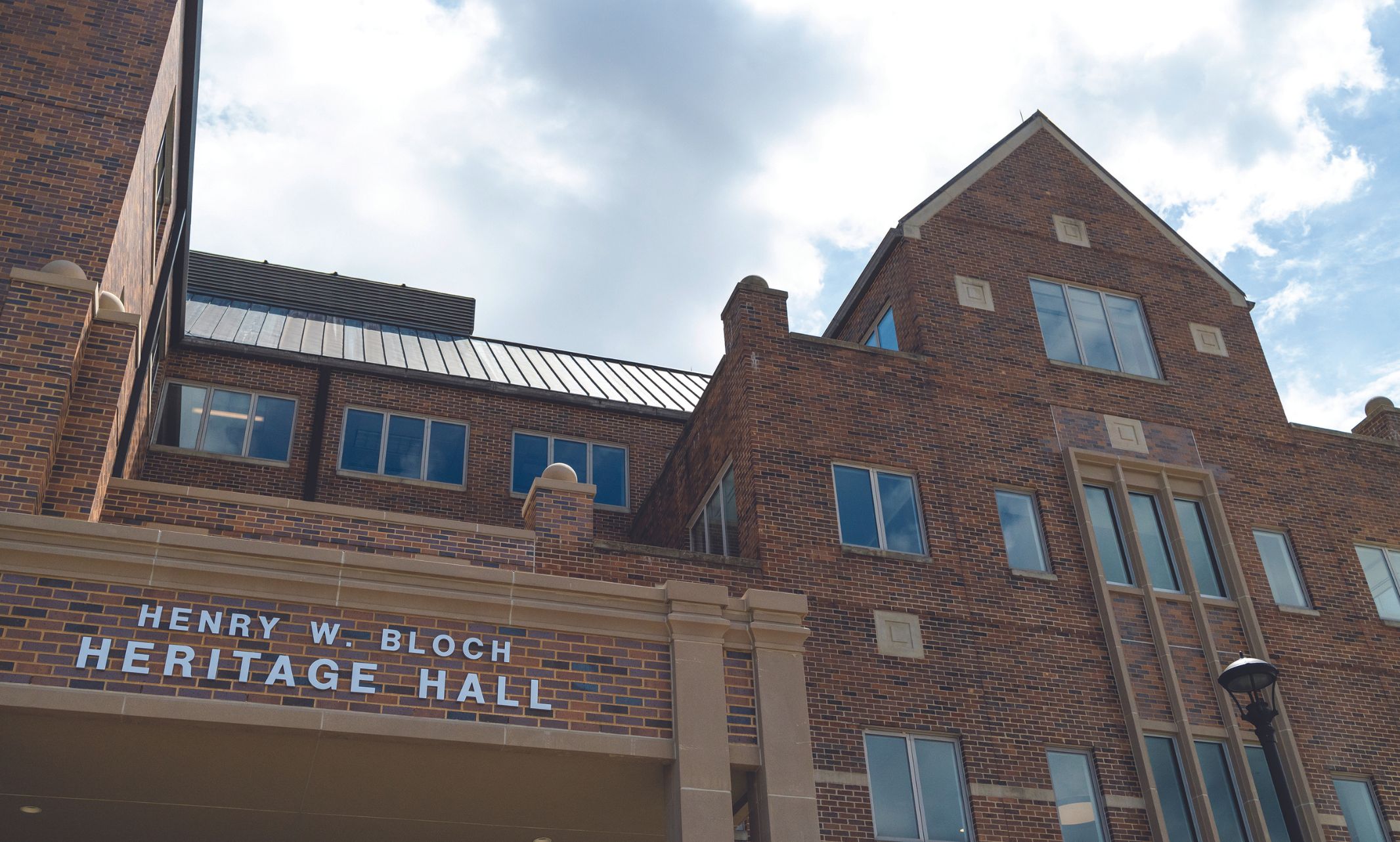
Improved Heritage Hall reopens to high praise
Last summer’s grand reopening of Bloch Heritage Hall marked a two-fold celebration, remembering Henry W. Bloch on what would have been his 100th birthday and the revitalization of a campus cornerstone. Alumni, students, university leadership, city officials, donors and members of the Bloch family all gathered for the celebration and ribbon cutting.
But now that the party is over, it’s back to class.
Bloch Heritage Hall is an amalgamation of the historic Shields Mansion, an estate built in the early years of the 20th century for grain magnate Edwin W. Shields and his wife, Martha, and a sprawling addition the university completed in 1986 with a $1 million contribution from Henry Bloch himself. With the opening of Bloch Executive Hall in 2013, Heritage Hall’s $17 million upgrade was necessary to keep up to date with the evolving school.
“The recent renovation of Bloch Heritage Hall has been a game changer, not only for our students, but for our faculty and staff as well,” says Scott Ezzell, manager of undergraduate admissions and recruitment. “Students now have a variety of indoor and outdoor spaces in Heritage Hall available to use for individual study, group collaboration or simply just to relax and socialize between classes. More students stick around between classes than ever before, and there’s a distinct energy throughout the building that wasn’t as noticeable before the renovation.”
As part of the project, the Marion H. Bloch Terrace and Park also went through a transformational beautification and enhancement, providing outstanding space for students, faculty and staff to gather and collaborate. It has also been, and will continue to be, the site for many events at the school, helping to build connections and community.
The multi-year project sought to maintain the aesthetics of the building’s historic exterior, while moving dated sections of the building’s interior into the 21st century with new offices, gathering spaces and classrooms entwined with modern technology that fosters flexible learning environments for students.
Only accelerated by the COVID-19 pandemic, the need for remote learning options has grown in recent years, as more students demand hybrid learning models to balance classwork with outside obligations. Each classroom touched by the renovation now includes such amenities as video screens, cameras and microphones, allowing access to lessons and lectures from virtually anywhere.
“The new designs and renovations make it easy for students to collaborate and work together in class to solve problems,” says Brian Klaas, dean of the Bloch School. “They give students new options for how to engage, with some joining in-person and others opting to participate virtually.”
The renovation not only improves technology but also centralizes previously hard-to-find resources into a single student services hub. From the building’s main entrance, students can now directly access valuable assets, including undergraduate advising, the career center, recruiting, tutoring and student organizations.
Designed by PGAV Architects, the hub was created by filling in two floors of an atrium — the centerpiece of the 1986 addition. Newly created floor space on the first floor created an open common area where students can mingle and meet.
“In addition to the renewed energy, students, faculty and staff are now even more accessible as a result of the new Bloch Student Services Hub. Students can now just come to the hub’s front desk to find help with anything they need,” Ezzell added. “It could be a prospective student wanting to learn more about Bloch and our programs, a current student needing class or career advice or someone wanting to visit their professor during their office hours. With most of Bloch’s faculty and services offices centrally located, we’re able to serve our students and collaborate with one another more efficiently and effectively.”
Jun 23, 2023
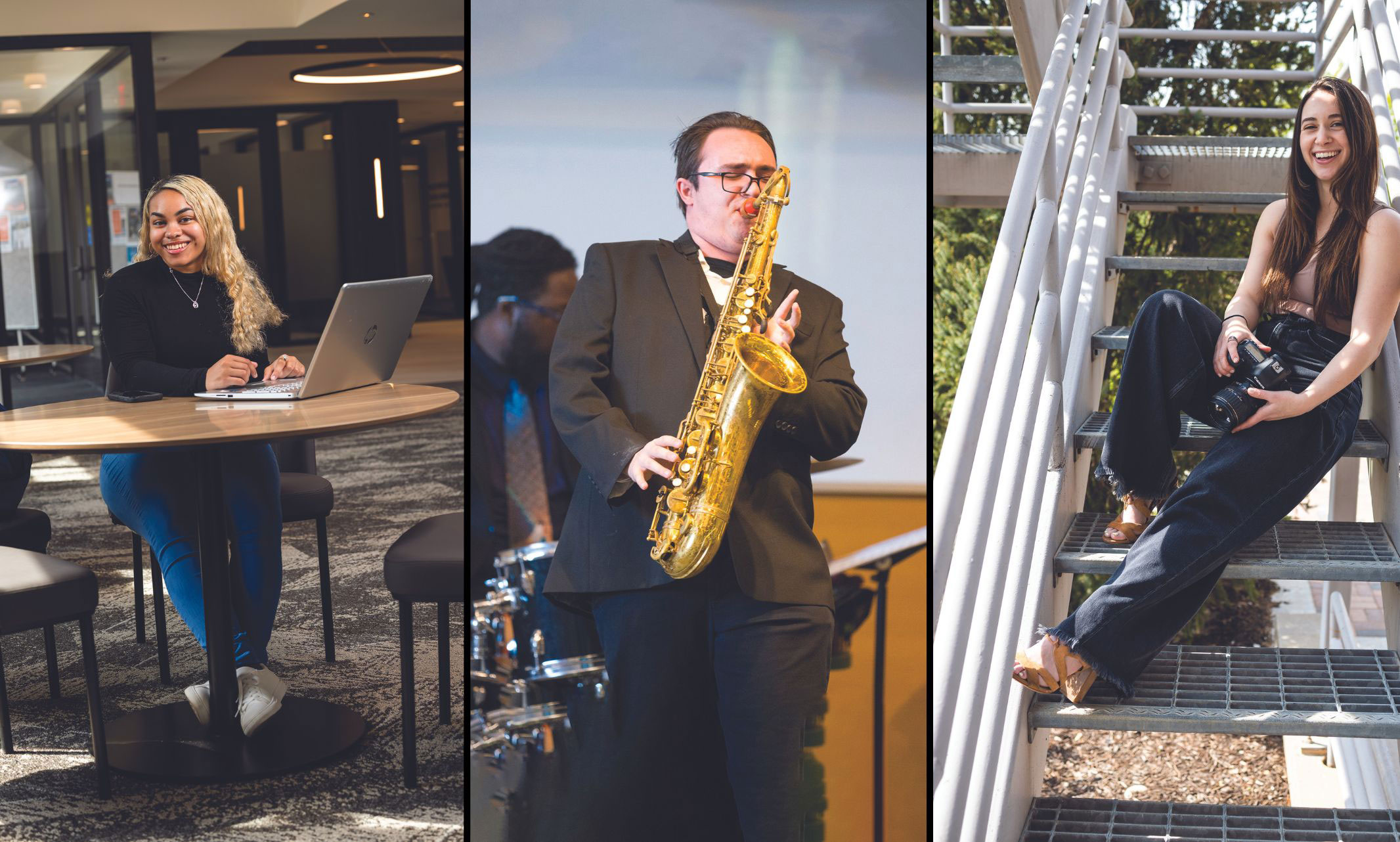
Student entrepreneurs champion the side hustle
In 2022, Americans started 400,000 new businesses every month, according to the U.S. Census Bureau. Of those, nearly 300,000 were side hustles.
Between 40 and 45 percent of Americans have a side hustle or “moonlight” at another job, and those numbers have increased significantly during the past five years. Financial gain, creative expression, autonomy and altruism are some of the many goals and objectives that motivate these entrepreneurial ventures.
“The economy, COVID-19, ownership over one’s career and individual creativity has made more people pursue side hustles,” says Alex Krause Matlack, director, Entrepreneurship Scholars (E-Scholars), assistant teaching professor and assistant director assistant director for UMKC’s Regnier Institute for Entrepreneurship and Innovation. “Some studies indicate that by the end of this decade, nearly half of individuals will be entrepreneurs because of the type of portfolio careers emerging from the gig economy industry.”
The entrepreneurial spirit that has propelled this “golden age of the side hustle” flourishes at UMKC.
UMKC Launches a Side Hustle Challenge
In 2022, the Henry W. Bloch School of Management and Regnier Institute for Entrepreneurship and Innovation introduced the first Side Hustle Challenge for UMKC students. The challenge was initiated, in part, as a response to this thriving national trend.
“We learned, through a cross-campus survey, that while only a small percentage of students were interested in being entrepreneurs, many already have side hustles,” says Matlack. “Sometimes it’s hard to self-identify as an entrepreneur, but that’s exactly what these students are doing. We wanted to find a new way to connect with students who might not think of themselves as entrepreneurs but who are doing something very entrepreneurial.”
The Side Hustle Challenge, which mirrors real-world side hustle development, both differs and dovetails with existing Bloch School and Regnier Institute programs.
“This is the first of our programs specifically targeting side hustles, or smaller businesses, students may be launching on the side,” says Matlack. “The challenge also connects to the E-Scholars program where students can launch their projects over the course of a semester.”
The challenge is an opportunity for students to pursue their entrepreneurial initiatives at a scale that allows them to continue with school. They gain knowledge and skills to develop their ideas and connect with audience wants and needs.
“Getting to know customers as a path to growth rather than riskier forms of entrepreneurship are benefits of side hustles,” Matlack says. “A venture funded by the growth of customers, rather than venture capital, is a great way to know you’ve reached product-market fit and have product customers are excited to pay for.”
Student Entrepreneurs Embrace the Side Hustle Challenge
Elle Domann, Tate Berry and Olivia Gray explored those strategies and were the inaugural Side Hustle Challenge winners.
Domann placed first in the Side Hustle Challenge with her project, Studio L, a rentable studio and coworking space for photographers and creative businesses.
“After moving to Kansas City to attend UMKC, I’ve been able to further my photography career immensely,” says Domann, who will graduate this spring with a degree in business administration, with a double emphasis in entrepreneurship and innovation and finance.
“In my hometown of Springfield, there wasn’t access to affordable resources for creative businesses like in Kansas City. Last year, I made it my mission to develop a space in Springfield where creators can work without the costs of typical studios.”
After extensive work on the space, Domann launched Studio L last October.
“I had no experience owning a brick-and-mortar store,” she adds. “It came with a lot more challenges and learning opportunities than a service-based business, like photography. The space needed renovations which was a challenge, as I had no carpenter experience. I wanted to save money, so this meant doing the work myself.”
“My favorite part of this experience is that I learn something every day. It’s a continual process of problem-solving and making changes.”
Like Domann, Berry also developed a business focused on creative professionals. His project, Musician Value Elevation, is an online platform for music business and entrepreneurship.
“Music Value Elevation is an alternative to paying thousands of dollars for music school but not acquiring the skills needed to survive,” said Berry, who will graduate this spring with a double degree in jazz studies and business marketing. “Musicians will learn how to make their ideas sustainable and provide value to others.”
Berry began developing his idea in Fall 2021 during the Bloch School Entrepreneurship Class. He refined his plans during the 2022 New Product Development course.
“The idea brought my music and business interests together,” said Berry, the 2022 UMKC Bloch School Student Entrepreneur of the Year. “My entrepreneurship classes were creative incubators that made it easier to determine my goals and find resources.”
“I learned to use design thinking in my approach and interviewed musicians and educators about music school and what they wish they’d learned. I also researched the overall value of the music industry and its untapped potential.”
After he graduates, Berry will continue to develop Musician Value Elevation and his other business ventures, including Tate’s Burnin’ Big Band.
“I need to get the capital and develop the materials and website,” he said. “Then, I’ll prototype the product so I can launch.”
In early 2022, Gray acquired her real estate license, so she could enter the challenge.
“I had no experience in real estate but taught myself the ins and outs of the industry over Christmas Break and passed the tests before Spring Semester,” recalls Gray, who will graduate with an accounting degree in 2025. “I launched this side hustle because I didn’t want to be a broke college student. Real estate seemed like a good way to make money while also being flexible, so I could still focus on my studies.”
The Side Hustle: A World of Opportunity and Discovery
In contrast to the challenge promoted by Bloch and the Regnier Institute, entrepreneurial initiatives are not always encouraged in the workplace. Until recent years, employees with side hustles, or those who “moonlight,” have been compelled to keep their pursuits under wraps. However, this mindset has seen a shift. Many organizations have recognized employee side hustles are positive for the work environment and boost employee well-being. New terms, such as “daylighting” instead of moonlighting, reflect this change.
“Some company policies still don’t allow employees to take on outside work,” Matlack notes. “However, research from Adam Grant [a nationally known organizational psychologist] supports that side hustles make employees more productive and creative.”
At UMKC, entrepreneurial explorers bring their ventures to life, and they learn about themselves in the process. As these discoveries unfold, their initial vision may transform.
“Initially, my side hustle goal was just to make money, but that has changed,” reflects Gray. “I’m now finding ways I can use my side hustle to help other people and plan to implement those within the next couple of years. My plans include renovating and selling affordable houses to people who may not have adequate funds.”
Jun 23, 2023
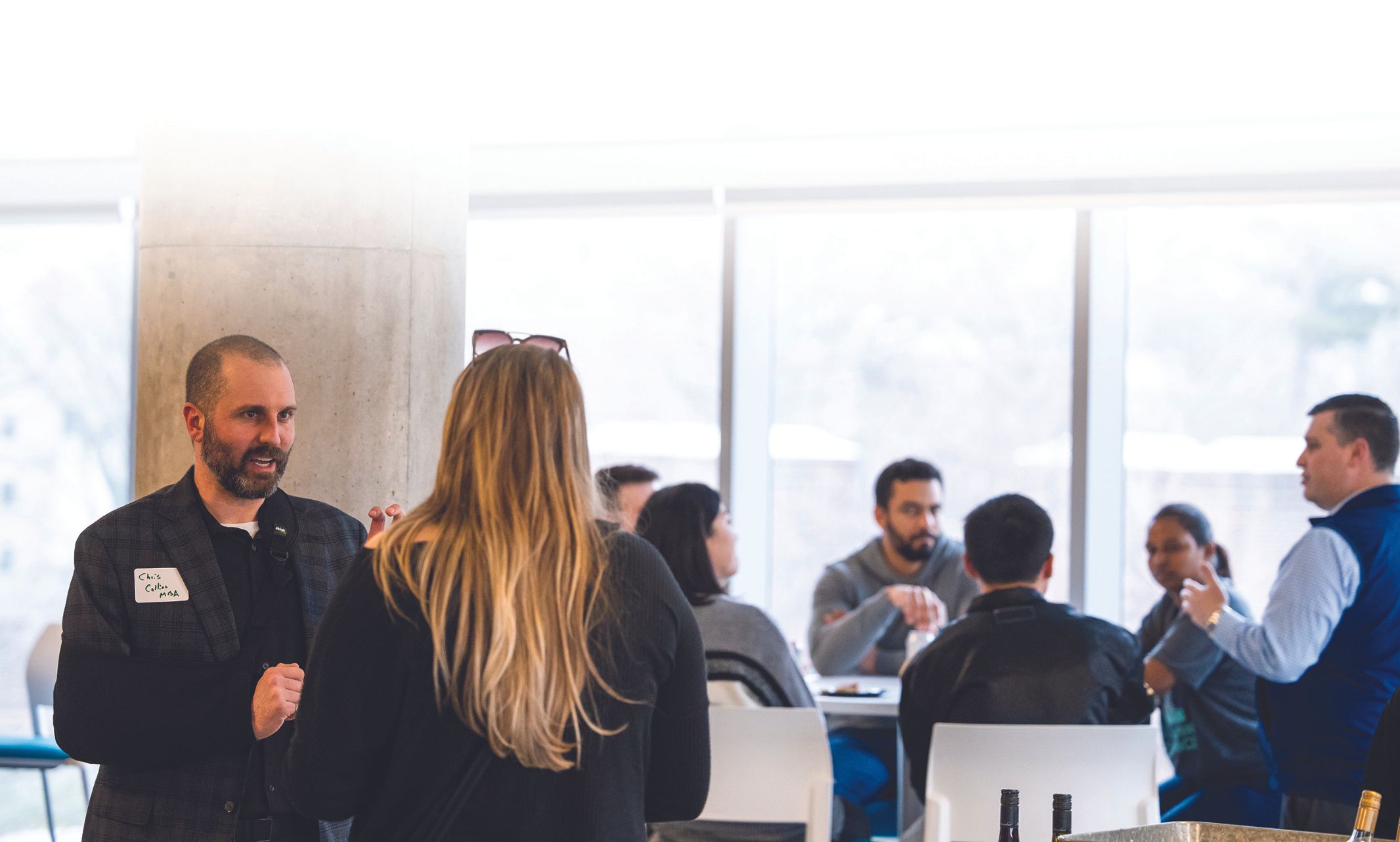
Program allows working professionals in Kansas City’s key industry sectors to customize their educational experience
The new Bloch LEAD program offers working professionals in Kansas City’s key industry sectors with the opportunity to customize their MBA. With the LEAD program, students tailor their MBA experience to allow for additional attention to the skills and competencies most critical to success in their specific industry.
As part of this new initiative, LEAD Scholars work with an executive coach to identify these skills and competencies. With their coach, they then develop a customized learning plan, drawing upon specialized coursework and curated instructional material. The structure of Bloch LEAD is also designed to provide students from a given industry with unique opportunities to build connections with leaders and working professionals in that industry.
“We are a collection of our experiences and perspectives,” remarks Stacy Cahalan, a LEAD Scholars coach. “Coaching these young professionals has been a great reminder of the incredible talent we have across so many industries and what human connection can do in our awesome city.”
“The coaching process has really been a pleasure,” says Kyle McAllister (EMBA ’21), who mentors several students. “Every student has been eager to talk and engaged in the conversation.”
Program participants also receive a scholarship and, as part of this, they create and maintain a portfolio documenting their efforts to build skills and industry connections.
Across the Fall and Spring Semesters, there are 54 scholars actively enrolled.
“I was nervous about returning to graduate school as an older student,” recalls Chris Collins, a member of the LEAD Scholars. “I was worried I wouldn’t be able to balance the coursework against responsibilities of a full-time job and family life, but I took the leap and I’m glad I did. Two semesters in and I am already applying the skills and lessons from my coursework to make a difference in my professional role.”
The LEAD Scholars program has quickly become a cross-section of knowledge, talent and ambition, bringing together early to mid-career professionals who are still hungry for more.
“Not only has the program provided me with essential tools and insights,” says LEAD Scholar Jesus Cervantes, “but it has also connected me with a group of ambitious and motivating peers who share a common enthusiasm for creating positive change in our communities.”
Jun 22, 2023
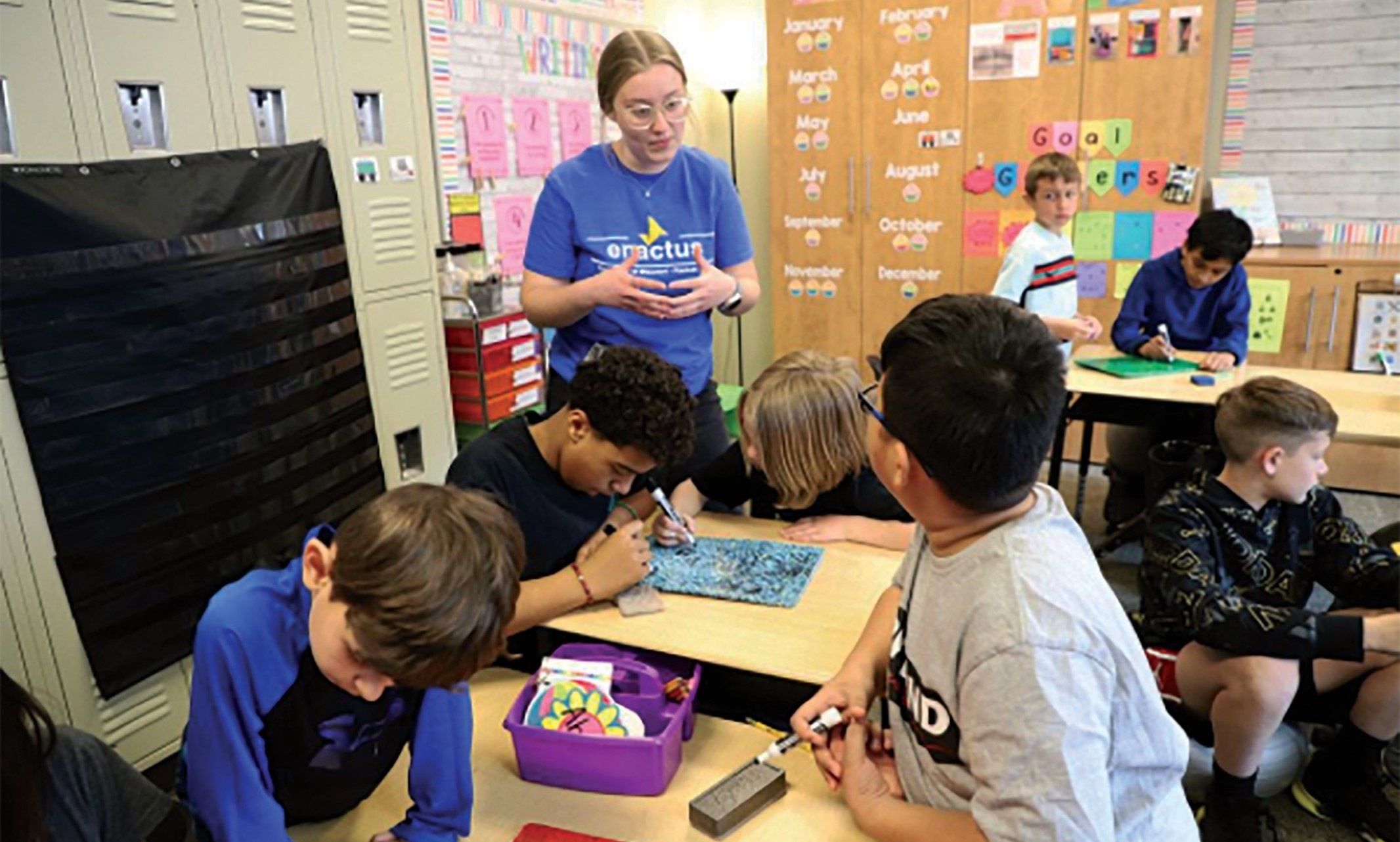
Sustainable projects carry team to eighth in the nation
For a second year in a row, the UMKC Enactus team has broken into the semi-final round of the Enactus USA Competition, beating dozens of teams from across the country to place eighth in the overall competition.
The competition, held in mid-April, drew more than 500 students from 51 American universities to the University of Texas at Dallas. Each team was given 12 minutes to share their innovative new business ventures, with an emphasis on how those projects are affecting positive change.
“Our students answer needs in a community using social entrepreneurship and create projects that are supposed to be sustainable,” says Erin Blocher, faculty advisor and assistant teaching professor for business communication at the Henry W. Bloch School of Management. “They’re using the entrepreneurial process to find a need and uncover solutions using human-centered design.”
Blocher says many teams focus their efforts around answering one or more of the United Nations’ 17 sustainable development goals. The UMKC team focused their presentation around two sustainable projects, Generation Green and Cultura En Tus Manos.
Generation Green is a startup founded by UMKC Enactus in partnership with Shatto Milk Company of Kearney, Missouri. Team President, Marineth Ordinal says the team was inspired by Shatto’s reusable glass bottles but saw room for improvement.
“The one thing that can’t be reused is the bottle cap,” Ordinal says. “One of our team members saw that and asked, ‘what can we do with all of that plastic?’”
Through research, they learned that the caps are made from plastic with a relatively low melting point and that those lids could be turned into reusable dry erase boards for students. So far, they’ve sold more than to several school districts around the Kansas City area.
Cultura En Tus Manos, Spanish for “culture in your hands,” aims to empower Mexican artisans by providing a platform where they can sell their beautifully hand-crafted goods to businesses in the United States. Blocher says inspiration for Cultura came as a product of the pandemic.
“Artisans weren’t getting the same traffic in places like city squares, because tourism had halted. Now part of the students’ roles is to figure out, now that we’re out of the pandemic, does that project move forward? Are there still ways to help and platform those artists and connect them with merchants here in Kansas City?”
UMKC Enactus will continue to work on projects through the summer months, but not all members of the 2023 competition team will be there. The team held its end of year celebration on May 2, saying goodbye to senior members, including Ordinal, who leaves the team in the hands of a new president for a new year.
“I’m really super proud of what we’ve accomplished,” Ordinal says. “I think we’re a team that could make it to finals and maybe go on to represent the United States at the Enactus World Cup. They had better watch out for the team next year because they’re going to be doing a lot of things.”
Jun 22, 2023
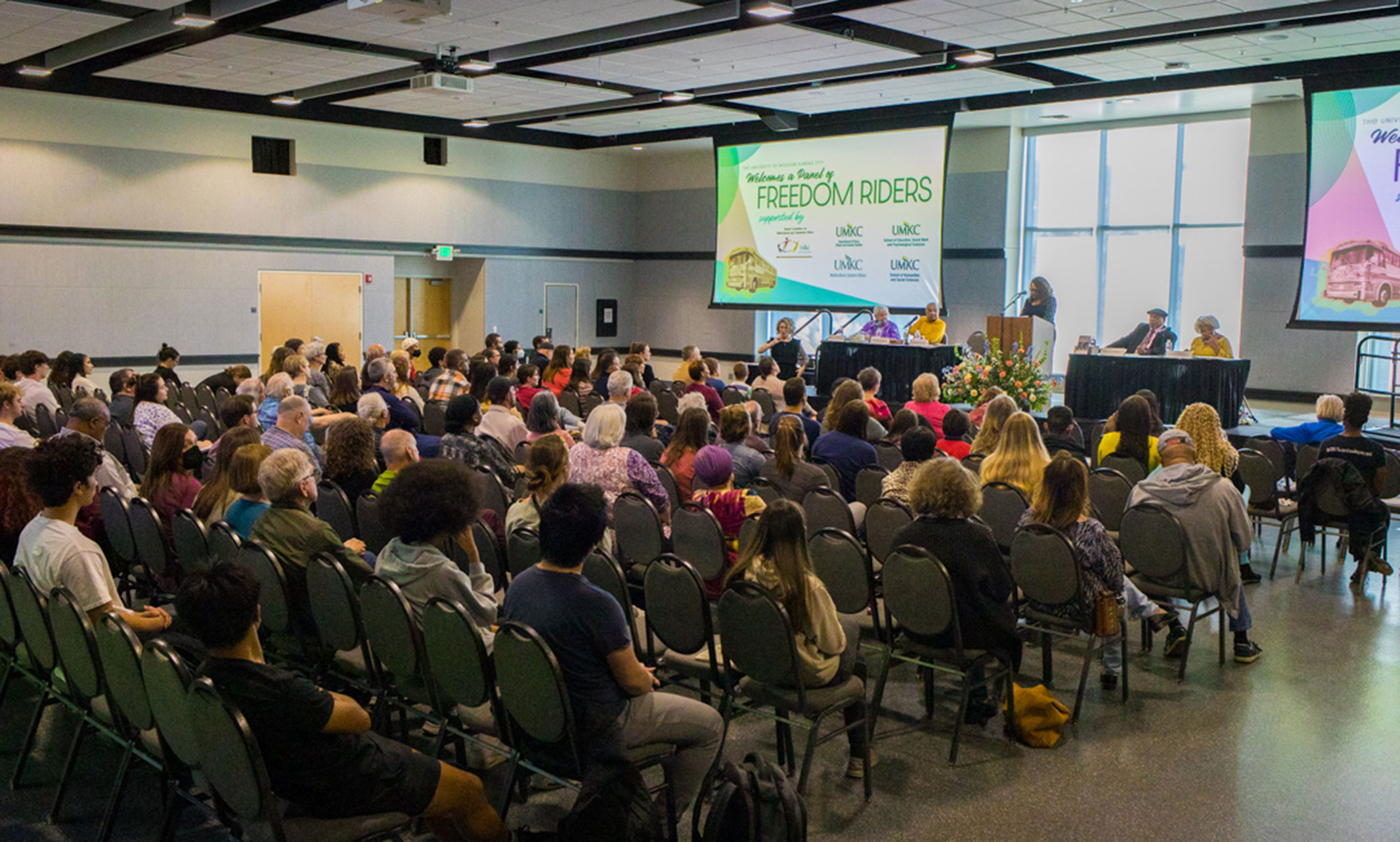
The renowned civil rights activists spoke at panel as part of School of Humanities and Social Sciences Showcase
Four Freedom Riders, civil rights activists who participated in bus trips through the American South in 1961 to protest segregated bus terminals, spoke to their experiences at multiple events around the city, including the UMKC Volker campus.
Here are just a few of their stories:
Dion Diamond began conducting sit-ins as a teenager in his hometown of Petersburg, Virginia. His activism continued at Howard University. He participated in a Freedom Ride from Montgomery, Alabama to Jackson, Mississippi.
“How naive we were,” Diamond said. “We thought the cops and the national guardsmen were there to protect us a little bit. We know that many of them, as soon as they got off the bus , put on their robes, white sheets over their bodies. I have to tell you that it's like the change of the guard at Buckingham Palace with the cops in front of the bus, cops behind the bus, National Guardsmen on the bus and helicopters flying overhead. Let me tell you, we felt safe. As soon as we’d get off the bus, we were arrested under the charge of breach of peace.”
Joan Browning participated in the sit-in movement, picketed segregated stores and facilities, and was the “last Freedom Rider,” the final person selected to join the last Freedom Ride of 1961.
“I never speak without quoting Miss Ella Baker, who was one of those most prominent teachers of young people,” Browning said. “One of the things that she taught me was that social change really comes from ordinary people. You don't have to be rich or famous or go halfway around the world to make the world better. You start right where you are with the people that you are associated with. That’s the key to expanding social justice.”
Lenora Taitt-Magubane, Ph.D., became involved in the civil rights movement while attending Spelman College in Atlanta, where she became a member of the Student Nonviolent Coordinating Committee. Her first sit-in occurred in March 1960 when she participated in an attempt to integrate the Atlanta Municipal Auditorium. Two weeks later, Taitt-Magubane was arrested at a lunch counter sit-in with 77 other students and Martin Luther King Jr.
“It's interesting how things happen,” Taitt-Magubane said. “I was involved in the movement while I was an undergrad, and we planned the movement. One of the house mothers, for example, because we were going out to meetings and coming in very late, gave us the key to the dormitory so we wouldn't wake anyone up. We could go and come as we pleased. And if we were going to do anything, we would confide in her and let her know. We had our books, and we got our assignments. I remember drawing up a schedule, which had study periods, so we weren't just sitting in jail. We had a period of time where we had to study so that when we got out, we could continue classes. And what the faculty did was, they had special classes in their homes and in the school in order to help us catch up and to make sure that we were prepared for our exams. So somehow, all of us graduated.”
Bernard LaFayette Jr., LHD, has authored several works about his long involvement in the American Civil Rights Movement, and his new memoir is “In Peace and Freedom: My Journey in Selma.” The book shares the story of his work as one of the primary organizers of the Selma voting rights movement and the Selma-to-Montgomery marches.
“I needed to get parental permission,” LaFayette said. “So what I did was I wrote to my father down in Florida, and I sent the papers to be signed for him to send them back. And I was the first one in my family to go to college. I assumed he might think it was something related to, you know, financial aid or something like that. I didn't hear anything from him, and time was running out for me to be able to get the application in on time. So, I call on the phone, and I say, ‘Daddy, did you get that letter sent to you that I sent special delivery?’ And he said, ‘Yes, I did get a letter.’ I say, ‘Oh, I'm glad you got it. I thought I got lost in the mail. Could you sign it and send it back right away?’ There was a moment of silence before he said, ‘Do you think I didn't read it?’ I said, ‘Could you just sign it and send a special delivery back so I could get it in right away?’ And you know what his response was? ‘Do you think I'm going to sign your death warrant?’ That's the way he interpreted getting on a Freedom Ride.”
Carmaletta Williams, Ph. D., Chief Executive Officer of the Black Archives of Mid-America, moderated the panel. The event was co-sponsored by the School of Humanities and Social Sciences; the School of Education, Social Work and Psychological Sciences; the Department of Race, Ethnic and Gender Studies; and the UMKC Alumni Association Multicultural and Community Affairs Committee. It was cohosted by Multicultural Student Affairs.
The full panel can be viewed online.
Jun 12, 2023
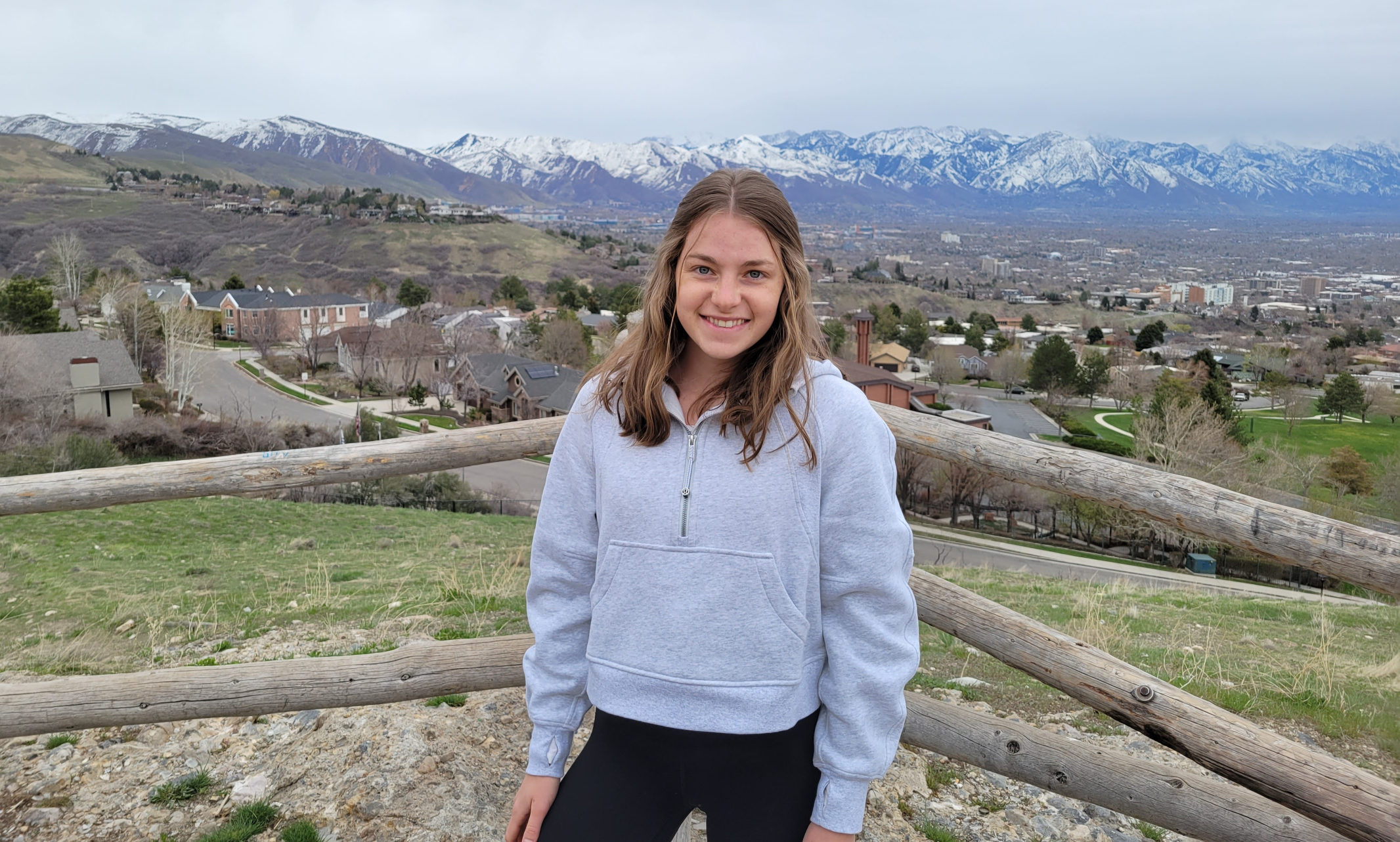
Three receive scholarships to study in Spain, Scotland
Three more UMKC students have received federal grants worth thousands to study abroad this year through the Benjamin A. Gilman International Scholarship program.
The latest grants come in the wake of two earlier study-abroad grants for UMKC students announced in April. The congressionally funded Gilman Scholarship provides financial support to outstanding undergraduate Pell Grant recipients who, due to financial constraints, might not otherwise study abroad.
This latest round of grants includes the first two UMKC recipients of the John S. McCain International Scholarship for Military Families (Gilman-McCain Scholarship), named after the late senator John S. McCain of Arizona. Those scholarships are reserved for children and spouses of active or activated United States military personnel.
Nuria Telles of Kearney, Missouri and Elizabeth Stepp of Kansas City are both participating in a six-week summer program at the University of Málaga, located in southern Spain on the Mediterranean coast. Alison Scobee of Fort Leonard Wood, Missouri, will attend the four-week Honors Summer Program in Scotland.
Stepp, a nursing major, is scheduled to graduate in spring 2024. She is a McCain scholar.
“My dad, Col. Ryan Stepp, has been a C-130 pilot in the Air Force and a member of the Missouri Air National Guard since 1998,” she said. “Along with my mom, he has been the most influential person in my life. I truly would not have the desire to constantly better myself and continue learning Spanish without him. He has traveled extensively throughout his career and knows the importance of learning about other cultures. He encourages me to seek every opportunity to improve my Spanish-speaking abilities.”
Her long-term career goal is to become a certified registered nurse anesthetist. She believes becoming fluent in Spanish will be a career asset, allowing her to care for a wider patient population in the hospital and take part in medical missions.
She said the Gilman-McCain scholarship made the trip a realistic goal.
“It helps me to spend my summer developing my Spanish-speaking abilities by exploring another country rather than working,” she said. “It also allows me to put more money towards furthering my education in the future so I can accomplish my career goals.”
Telles, a Languages and Literatures major who plans to graduate in 2024, also views her study abroad opportunity as a key career driver. She hopes to become a U.S. Foreign Service officer.
“I hope to gain a new perspective on my own culture and my host country’s culture,” she said.
The scholarship has made her experience possible, and she wants to pay the grant forward.
“I would also like to one day have my own scholarship foundation, helping others from underrepresented communities.”
Fellow Gilman-McCain recipient Scobee is a freshman majoring in psychology and chemistry with a minor in medical ethics. She is enrolled in the UMKC Honors Program and is an ROTC cadet.
“I have a huge interest and passion for anthropology, so I'm hoping to gain insight into what studying other cultures is actually like,” she said. “The trip is meant to fully immerse us, so I'm hoping that I learn a lot and can add some anthropological strategies to my toolbelt.”
Her career goal is to become a doctor or a neuropsychologist.
“The Gilman Scholarship is so important to this trip,” she said. “Without it, I definitely would not be going. I'm so excited to have received it because I came into college wanting to study abroad and now I have that opportunity. Honestly, it hasn't quite sunk in yet that I'm going.”
Jun 09, 2023
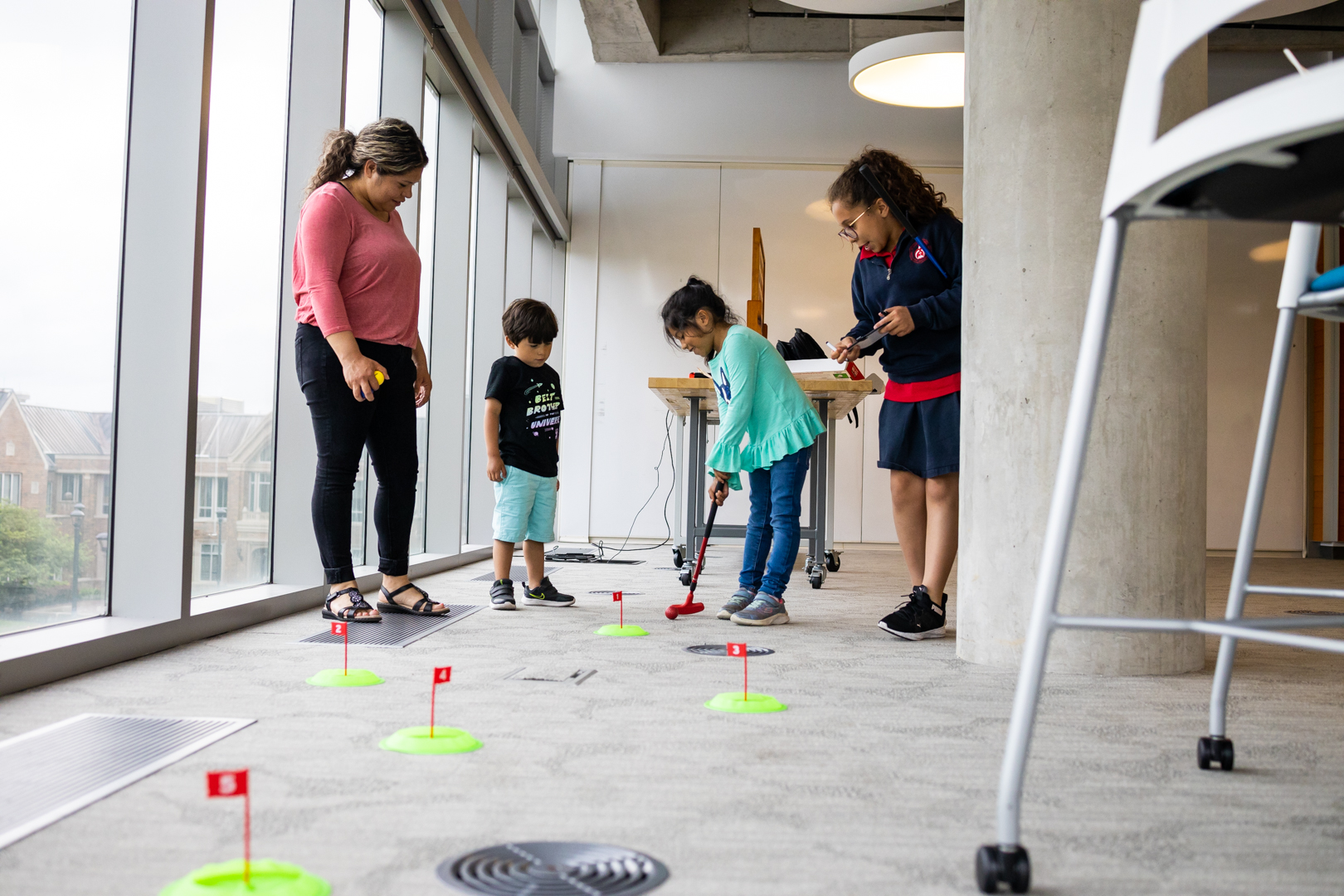
College is a family affair for the De La Cruzes
Roos don't just dream, they do. Our students turn ideas into action every day. Get to know our people, and you'll know what UMKC is all about.
As a real estate agent and a mother of three young children, balancing time is something Angelica De La Cruz has had to master, especially after she added going back to school to pursue a degree in business administration in real estate. Her dedication has inspired her daughters who attend campus events by her side.
“What did I get myself into?” thought 38-year-old De La Cruz as she embarked on a journey to earn her bachelor’s degree from the Henry W. Bloch School of Management.De La Cruz applied for a KC Scholars scholarship in November 2021, not thinking it was a realistic goal. She earned an associate’s degree in 2008 from Donnelly College in Kansas City, Kansas, and joined the workforce without completing a bachelor’s.The scholarship did come through, and as a mother of three at age 37, she decided to attend UMKC part-time as a non-traditional student. She decided to work toward a degree in business administration in real estate, and in her first semester was introduced to the Bloch Launchpad Scholar program. The program offers students professional and leadership development and up to $5,000 in scholarship funding.The only issue: De La Cruz would have to be a full-time student.Already with a full plate, she began having conversations with her family to decide whether going back to school would be worth it as a student with children. They told her she would regret not taking the opportunity.
“It was scary, but I was excited at the same time,” De La Cruz said.The support she received from her family and from faculty at UMKC allowed her to budget her time and finances as she worked toward her goal.“I chose UMKC for its convenient location. When you are a college student, mom, wife and arealtor, you have to juggle several tasks. Convenience is top priority for any decision. In addition, I found a welcoming and supportive environment,” De La Cruz said.She has been a real estate agent for a decade and her goal is to help underserved communities become homeowners by providing education and tools to secure housing and contribute to family wealth.
Born in Villa Madero, Michoacan, Mexico, De La Cruz believes earning a degree is about more than just advancing her career; it’s a chance to honor her parents and inspire her seven and nine-year-old daughters. “I am a first-generation college student. My dad never attended school and my mom only finished third grade. For me to be attending college now, is a way to honor my parents’ hard work and sacrifices they made for me and my siblings to better ourselves,” she said.Balancing school with being a mom means making adjustments and sacrifices. Some days, De La Cruz calls on her family support to help watch her children. But sometimes, thanks to the support system at Launchpad, they’ve gotten the chance to experience college first-hand.“My college program has inspired my daughters to go to college. When they accompany me to a UMKC event, such as Launchpad cohort meeting, basketball game or Honors Program party, they get excited,” she said. “Both leave the campus saying how much they love my school and can’t wait to go to college. Listening to my daughters talk about college, at their young age, brings joy to my heart.”
Jun 08, 2023

UMKC Institute for Human Development and the Missouri Department of Elementary and Secondary Education launch a training and coaching program to en...
Beginning this year, approximately 2,000 early childhood educators in the state of Missouri will have the opportunity to receive training and coaching to improve the quality of early childhood learning programs.
The University of Missouri-Kansas City Institute for Human Development and the Missouri Department of Elementary and Secondary Education are launching a two-year project to enhance early childhood education by building leadership and business skills of early childcare administrators in family childcare businesses and independent learning centers across the state of Missouri. UMKC Institute for Human Development will partner with the UMKC Midwest Center for Nonprofit Leadership, the University of Missouri-St. Louis Community Innovation and Action Center, University of Missouri Extension, the Missouri Small Business Development Centers and Child Care Aware® of Missouri in the project.
Despite their dedication to the field and the families they serve, many family childcare business owners do not have backgrounds in finance and operations, and can face challenges managing a business as they provide outstanding care and support. But fiscally sound, well-run childcare programs are a critical core component of healthy communities and family well-being. In addition, small, independent learning centers may lack support staff, and many directors are former teachers who do not have management training. The Missouri Department of Elementary and Secondary Education program will provide participants training in whole leadership, organizational sustainability and leading change.
Additional resources will be available for both large and small center administrators.
“Large center administrators will receive training in supervision and human resources, strategic financial management and strategic communications strategies, while small center administrator sessions will focus on writing a business plan, understanding financial statements and QuickBooks Online for childcare businesses,” says Mike Abel, UMKC Institute for Human Development associate director, who directs the Early Childhood Innovation Center.
All participants will receive four on-site coaching sessions and eight virtual coaching sessions with trained quality specialists over a one-year period.
“High quality early learning programs are more likely to identify and address developmental delays and learning disabilities at an early age, which may increase the probability for the child’s success in life,” Abel says. “This program will drive a higher level of professionalism among these childcare administrators and lead to an overall higher quality in delivery of their services.”
The Missouri Department of Elementary and Secondary Education program is designed to address these issues through assessment, leadership and business training, on-site and virtual coaching, and the supply of tools and materials across seven regions in Missouri through more than 200 training sessions.
“This training would not be possible without the help of our partner organizations,” said Abel. “They’re providing critical expertise and resources that will greatly enhance the training and coaching to administrators. It is only through their support that the program will ultimately elevate the quality of childcare and enhance the lives of children across our state.”
Jun 07, 2023
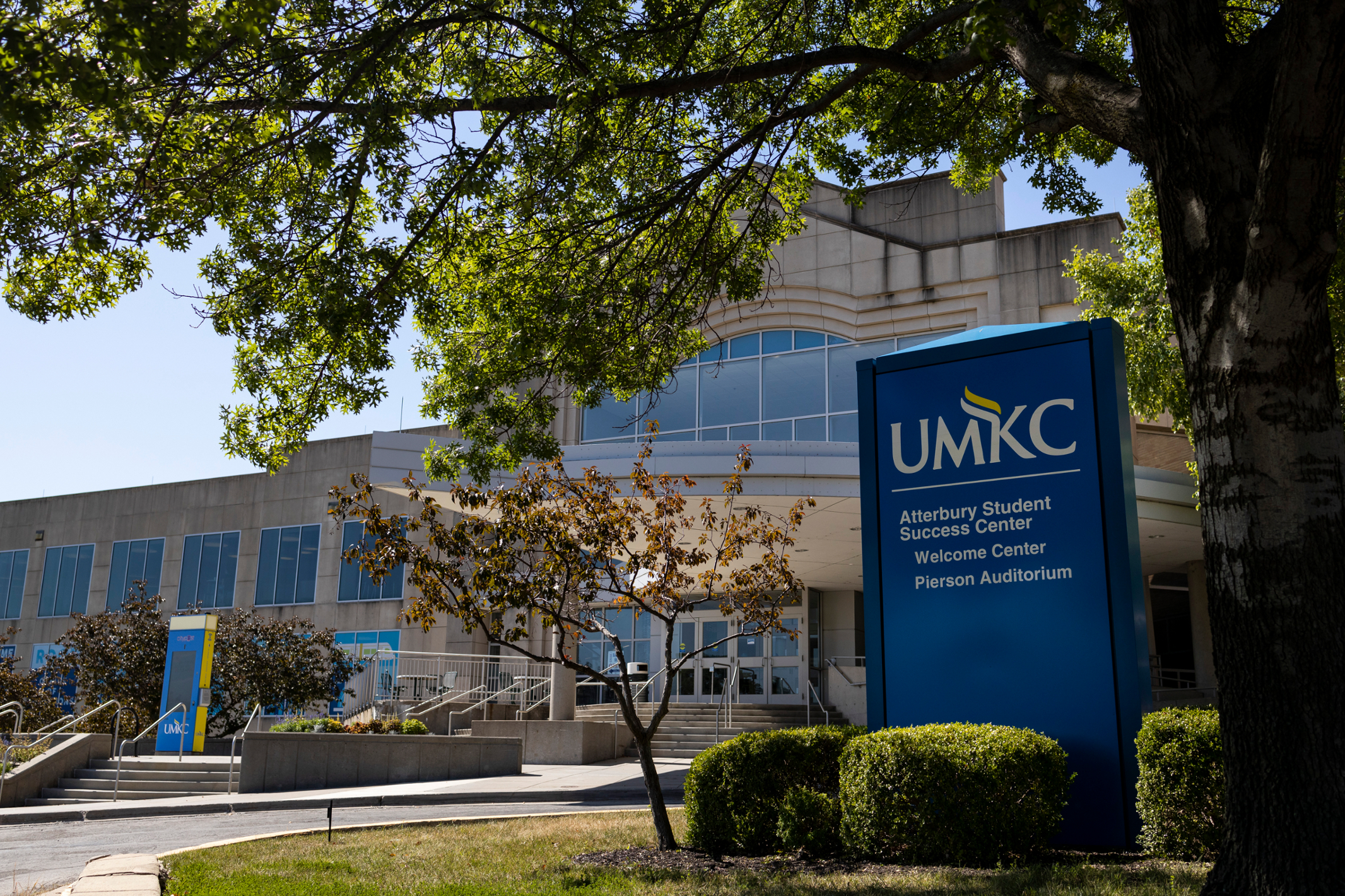
A total of $500,000 was awarded to students, faculty and staff.
The UMKC Entrepreneurship Innovation Grant Program announced 12 recipients out of 28 submitted proposals, totaling $500,000 in awards.
UMKC students, faculty and staff submitted proposals including 13 technology commercial and 15 program and professional development requests in the amount of $1,041,564.Seven grants were awarded to Technology Commercialization projects and five were awarded to Program and Professional Development projects.
The Entrepreneurship Innovation Grant Program is funded by the Kauffman Foundation and is a joint effort by the UMKC Innovation Center, the Regnier Institute at the UMKC Bloch School of Management and the UMKC School of Law.These are the projects awarded grants starting June 1, 2023.
Technology Commercialization
De-risking the Commercialization of a Novel UMKC-Owned Technology to Diagnose Pediatric Glaucoma
An interdisciplinary collaboration between School of Medicine and School of Science and Engineering (SSE) faculty and a talented SSE graduate student. UMKC Tech Transfer has protected the IP with a non-provisional foreign patent application and is actively working with the inventors to commercialize the technology. The first-in-class software technology has the potential to significantly disrupt the field of glaucoma health care, a growing market exceeding $5.5B billion in 2021.Designing a Health IT Prototype to Improve Clinician Communication Across Care Settings
The goal of this project is to identify a feasible, viable, and desirable design for improving efficiency in communication between healthcare entities that do not currently have interoperable health records. By the end of the project, design plans will be prepared to build a minimum viable product and will request more funding to expand testing to additional hospitals, clinics, pharmacies, and LTCFs across Missouri.WeListen: An AI-Empowered Scalable Solution to Obtaining Consumer Insight for Business Development
The primary objective of the proposed project is to conduct consumer discovery research that informs the concurrent development of data querying and visualization tools tailored for our target clients, which include doctors, nurses, practitioners, physicians, and healthcare administrators and managers. Gaining insights into population health and patient experiences is crucial for addressing health disparities and promoting value-driven healthcare. The broader impact of this project is the development of a solution for qualitative consumer data analysis in consumer insight studies across various industries.4-dimensionally printed biodegradable implants for safer membrane elevation in sinus lift procedures
This project includes the design and manufacturing of 4D-printed implant prototypes, well- investigated and FDA approved biodegradable materials for tissue engineering.
Prototype storage in simulated body fluid and testing of mechanical properties at various time points will capture influence of material degradation.
Determination of the implant’s biocompatibility and potential of bone formation on and around the implant via cell culture lab testing
Suitable material compositions will be identified and used in an animal study outside of this EIG project grant
Improving the Capacity of the UMKC Office of Technology Commercialization
This investment creates appealing opportunities for business development by enhancing the process of transferring university technologies to businesses. This project provides opportunities to recruit a graduate assistant from the UMKC School of Law, Henry W. Bloch School of Management students seeking their MBA, and students from the School of Science and Engineering schools, with each student expected to approximately forty (40) hours per month. Leveraging the graduate-level expertise of these students will enhance various aspects of the disclosure review process, market review and planning, and prior art review.
Strengthening Intellectual Property Protections for Drug Development in Diabetes and Other Diseases
Securing patents for the intellectual property that is resulting from National Institute of Health research, as well as new developments that will enable the translation of academic results into groundbreaking therapies, and that has the potential to be extremely lucrative for the university.
UMKC SSE Senior Design Far Field Wireless Power Transfer Project
Funding supports UMKC E&C department senior design class focused on training students to design, implement , and meet milestones and deliverables toward a relevant and timely engineering problem. This project includes the design, implementation and demonstration of wireless power transfer (WPT) systems that operate at 1-5 meters with goals of charging compact batteries to perpetually charge a rotor wing UAS mid-flight for the UMKC E&C senior design project.
Program and Professional Development
Creating a pipeline for Pharmacy Business Entrepreneurship
To create a pipeline of students from high school through professional programs to support student entrepreneurs in getting their PharmD/MBA at UMKC. The grant supports student recruitment beginning in high school and through their pre-pharmacy experience with an emphasis on the business/entrepreneurship FACT program at UMKC School of Pharmacy, to increase in the number of students completing the PharmD/MBA program.Fostering An Entrepreneurial Mindset for Students and Faculty in UMKC’s Digital and Public Humanities Program
Create workshops and an internship program in the School of Humanities and Social Sciences that will inspire participants in the Digital and Public Humanities Program to bring an entrepreneurial mindset to their work. It will help them think about themselves not just as potential employees of arts and humanities organizations but also a s entrepreneurial thinkers who can start their own companies or bring an entrepreneurial mindset to existing positions within arts and cultural heritage organizations.Digital Toolkit, a Course in Creative Entrepreneurship
Create a course in the School of Humanities and Social Sciences called Digital Toolkit to allow entrepreneurs to learn the basic skills to create professional online content with training in design, video and audio production and content creation.Creating Resource-Guiding Relationships in Kansas City's Entrepreneurial Ecosystem
Funding will support the development of a series of master classes designed to introduce aspiring entrepreneurs, including UMKC students, to Kansas City's entrepreneurial ecosystem. Leveraging the expertise of Porter House KC and KC SourceLink, a cohort of entrepreneurs will be given the opportunity to learn from and network with regional experts.UMKC Enactus - Venture Competition Accelerator
Create a “Competition Accelerator Program” for the UMKC Enactus team. The Enactus team develops several student-led social entrepreneurship ventures every year as part of the team’s normal activities. In recent years, Enactus has entered select projects into national entrepreneurship competitions. Participation in these types of events, along with the national Enactus USA competition, are beneficial to the team. and funding enables Enactus to formalize the process for preparing for, applying for, and attending competitions with a Competition Accelerator Program.
Jun 07, 2023
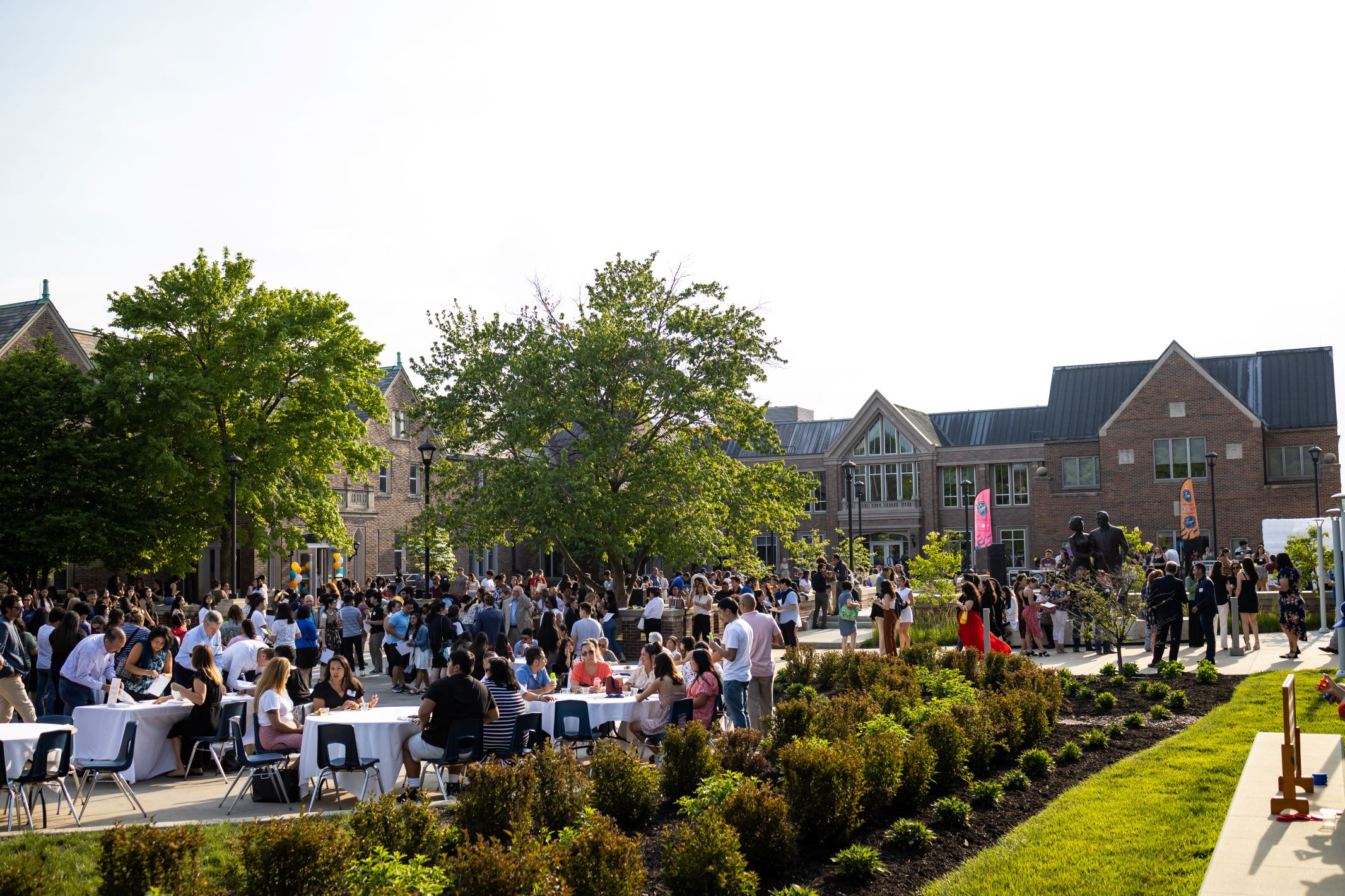
Campus event at Henry W. Bloch School of Management provides information, celebration
The University of Missouri-Kansas City is the No. 1 choice for 60 high school students and 50 current students who received Hispanic Development Fund scholarships for the next academic year.
The event recognizing the scholarship recipients was both informational and a celebration.
“Family and community support is encouraged at the event,” says Scott Ezzell, manager of admissions and recruitment for the Henry W. Bloch School of Management. “This support is such a critical part of the Hispanic Development Scholars’ success. HDF encourages family involvement in all aspects of their programming.”
The Hispanic Development Fund (HDF) awarded its first scholarships in 1984, providing $100 each to 100 students through a separately named Hispanic Scholarship Fund. This year, in partnership with local and regional higher education institutions, HDF awarded more than $1 million to 550 scholars.
UMKC hosted the scholars and their families at the Bloch School of Management for the first time in several years due to the pandemic. Students received detailed information about their opportunities and the partnering organizations, but one of the most important elements of the event was the opportunity for the students and their families to celebrate their success.
Gabriela Urrea is a sophomore pursuing her bachelor degree in nursing.
“The scholarship makes a difference. I’m able to worry less about tuition. Alleviating that burden helps me to stay focused on school,” she says.
Phillip St. John is a junior pursuing his degree in business administration.
"I'm in my third year and I’ve received this scholarship the entire time I’ve been at UMKC. It makes a huge difference and takes a lot of stress off of me and my parents.”
Erik Betancourt is a junior pursuing a degree in engineering.
“I wanted to stay close so I can continue to be a part of my community and family. The affordability makes that possible.”
Jazmin Romo, Frida Rodriguez, Leslie Romo
Jazmin Romo is a sophomore pursuing her degree in marketing. “Because of the scholarship I am able to study here and live in the dorm. It provides me an opportunity to really focus on school.”
Frida Rodriguez is pursuing degrees in business and theatre. "This last quarter they really worked with me to help afford school."
Leslie Romo is a sophomore pursuing her degree in business administration and marketing. "Bloch brings great opportunities. Brittany Bummer in Enactus has been very helpful."
Daisy Garcia Montoya is a senior pursuing her masters in public administration. “The scholarship alleviates my worry about financial aid and allows me to focus on school and work full time. I’ve felt seen. If I ask for help, I receive it. It’s a whole different support system.”
Jun 05, 2023
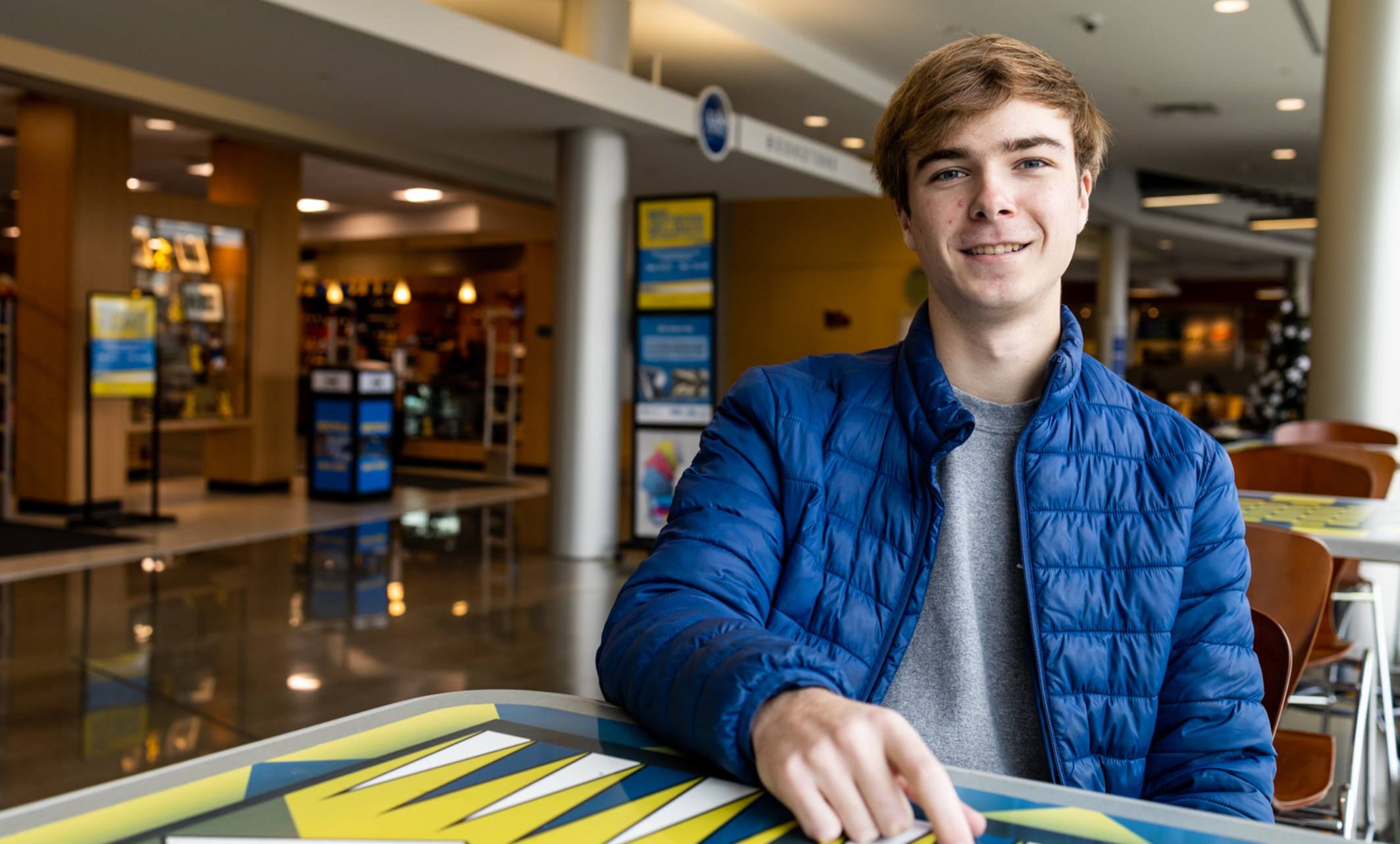
Meet Alexander Rose, a member of the first-ever class from UMKC Professional Career Escalators
Roos don't just dream, they do. Our students turn ideas into action every day. Get to know our people, and you'll know what UMKC is all about.
Alexander RoseAnticipated Graduation Date: 2026Academic Program: health care track, Professional Career EscalatorsHometown: Wentzville, Missouri
Alexander Rose is a career-focused freshman, and the prize that draws his eyes is practicing medicine. That’s why he enrolled in the new program that provides a direct pipeline from campus to professional success, UMKC Professional Career Escalators.
The Professional Career Escalators program provides him with special mentoring opportunities, career-focused advising, extra financial aid and, most importantly for him, a spot in an on-campus living-learning community with other Professional Career Escalators students.
“I believe that the ability to engage with individuals who are pursuing a path similar to your own, especially those wishing to go on to a professional school, is a very valuable opportunity that the Professional Career Escalators program offers,” Rose said. “It also pulls from a diverse range of individuals within a track. Like health care, for example. There are pre-med students, nursing students, and pre-physician-assistant students, all of whom have different processes and aspirations.”
The Professional Career Escalators program is a unique, trademarked system of personalized support and services unlike anything being offered across the U.S. It is designed to propel students from their academic studies to high-paying careers by providing a defined and guided path from enrollment to workforce.
The program prepares students for careers in four key areas of workforce demand: law and justice, engineering and business, education and health care. Each semester, students participate in the five Professional Career Escalators core experiences: career guidance and development; experiential learning opportunities (such as job shadowing and internships); mentoring with faculty experts and community professionals; graduate and professional school preparation; and leadership development.
Why did you choose UMKC?
I appreciated many factors about the school, from the many professional schools under the UMKC name, to the price tag compared to some other universities. I also liked that it provided me some space from my family while also knowing that they aren’t more than three hours away.
Why did you choose your field of study?
I saw it as a good fit for me since I’ve never really enjoyed math, and while a good portion of math is still required, the focus is on biology and chemistry.
How has your college program inspired you?
My program has inspired me to talk to more individuals in other degree programs, and to consider leadership positions inside and outside of the Professional Career Escalators.
Since entering college, what have you learned about yourself?
That I value connections with people, especially family, but also friends and mentors. These connections can help me and empower those involved more than if they’d not been made.
Do you have any scholarships?
I have financial aid through the Professional Career Escalators that goes towards my housing in the living-learning community. That helps me feel as though I belong in this community, and it provides a recognition for being a part of the Professional Career Escalators. I also have an academic scholarship through UMKC, another factor that drives me to devote mass amounts of time to my studies and my grades.
What other extracurricular activities are you involved in at UMKC?
I am currently a member of Pre-Med Prep, UMKC Pre-Medical Society, Biological Sciences Society, Christian Medical and Dental Association, Emergency Medicine Interest Group and Facilitating Awareness for Rural Medicine (FARM).
What do you hope to take from your experiences at UMKC into your professional career?
I hope to take what I have learned about diversity and leadership to my professional studies and career.
Jun 01, 2023
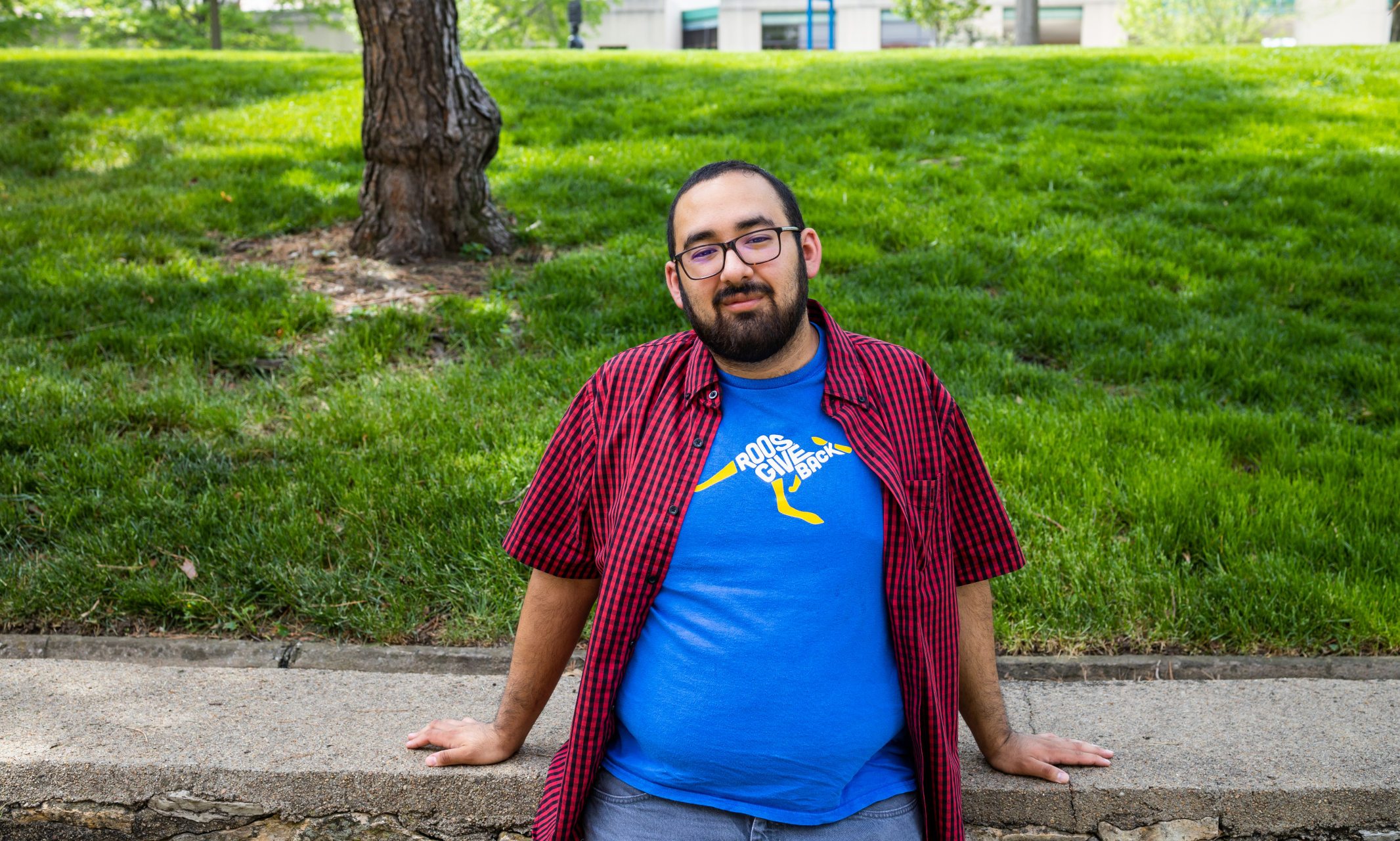
Black male victims tend to be younger than average victim
A UMKC graduate student’s research into fatal and non-fatal shootings in Kansas City found that Black males are significantly more likely to survive gunshot wounds than other demographic groups.
Alejandro Cervantes, who completed his master’s degree in criminal justice and criminology in Spring 2023, presented his findings at the annual meeting of the Midwestern Criminal Justice Association in Chicago during the fall semester. He won first place in the graduate student poster competition at the meeting. The research forms the basis of his master’s thesis.
His study examined all shooting victims in Kansas City between 2015-2020. This included more than 760 homicides and 2,900 instances in which a victim was struck by a bullet but survived. His research documented a steady increase in both fatal and non-fatal shootings, particularly in 2020, when gun violence in Kansas City increased by 33%. He also discovered a unique interaction between race and sex, noting that Black male shooting victims were significantly more likely to survive than other victims.
Black victims were the highest demographic group in both fatal (76%) and non-fatal (75%) shootings. Males of all races were the victims in more than 80% of both fatal and non-fatal shootings. Black male victims tended to be younger than other groups in both categories overall, with younger Black male victims being more likely to survive a gunshot wound than older Black males.
Pursuing plausible explanations for these rates, Cervantes focused on community-police relationships in different neighborhoods. Lack of trust and confidence in police tends to make people more prone to taking matters into their own hands.
“Strained relationships with law enforcement results in retaliation becoming normalized when seeking retribution for being wronged in resolving interpersonal problems,” Cervantes said. He added that these same neighborhoods where trust in police is lacking also suffer serious socioeconomic problems, high rates of poverty and a lack of services.
The inspiration for the study, he said, came while - assisting with data entry for his thesis chair, Prof. Ken Novak.
“Reviewing and recoding the raw data gave rise to the questions presented in my thesis,” Cervantes said. “The greater goal in my work here is generating data that can be utilized by future researchers to enhance this field of study.”
“Alejandro’s research is timely, locally relevant and important,” Novak said. “This sheds further light on the fact that Black males are significantly overrepresented among shooting victims, and further demonstrates that the harm associated with firearm violence is not distributed equally throughout Kansas City.”
Cervantes, originally from Reseda, California, earned his bachelor’s degree in criminal justice and criminology from UMKC in 2019. He was able to attend the conference in Chicago thanks to a graduate student travel award from the UMKC School of Graduate Studies.
He is unsure at this point whether he will pursue a doctorate or go immediately into a career. His ultimate goal is to work for the FBI or the Bureau of Alcohol, Tobacco and Firearms as a data analyst analyzing firearm-related crimes.
Cervantes is grateful for the travel grant that allowed him to attend the conference, which had value beyond the first-place award.
“With those expenses covered I had the opportunity to explore and experience something new,” he said. “Attending and presenting at a conference like this gave me not only greater confidence in my skills, but feedback from others in my field helped shape my thesis into a better product.”
“This experience is a major highlight in my time at UMKC.”
May 26, 2023
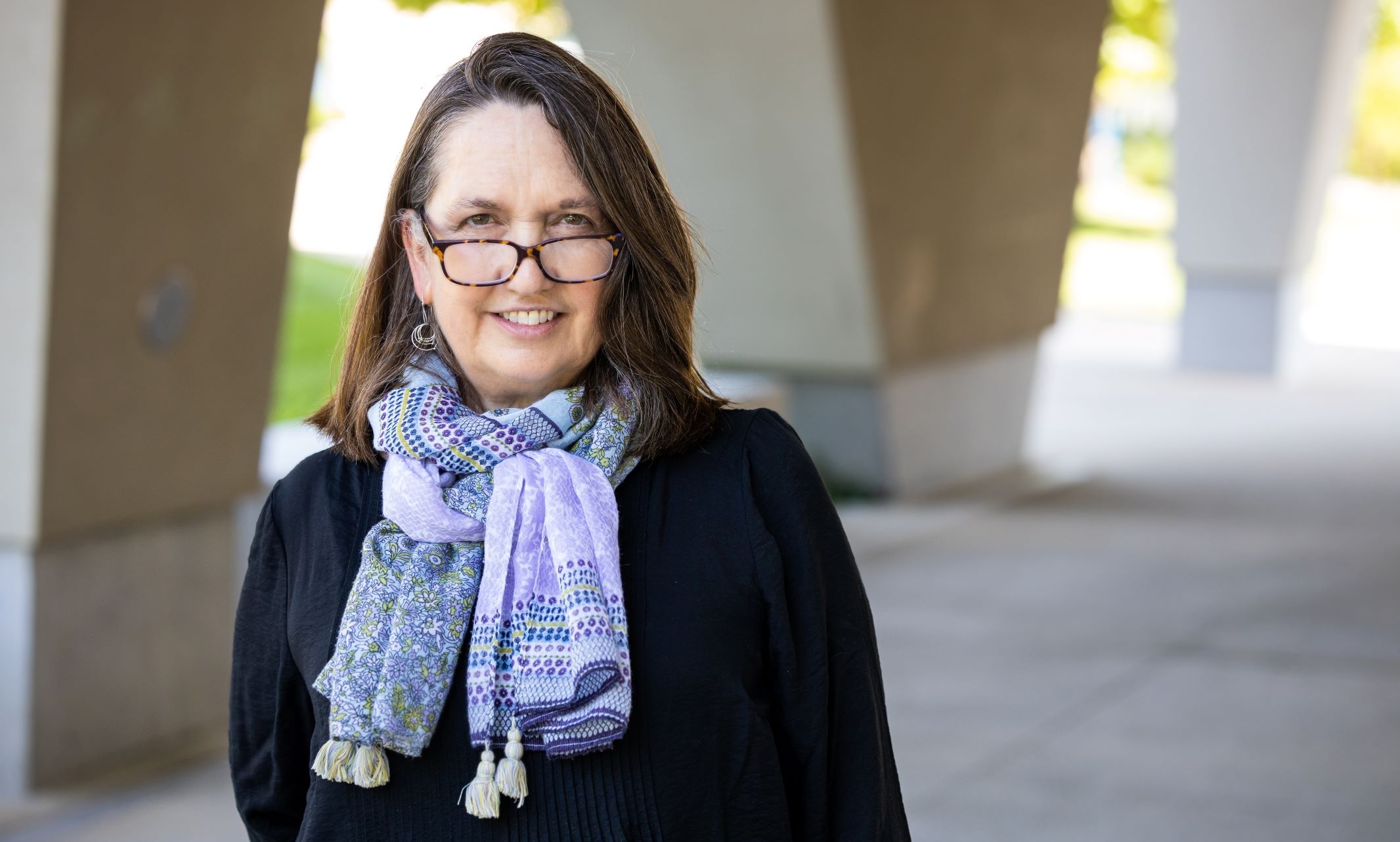
New book examines women’s entry into the industrial workforce
Jane Greer, Curators’ Distinguished Teaching Professor at the University of Missouri-Kansas City is a champion of the rich opportunity of undergraduate research. She’s leading by example with her new book, “Unorganized Women: Repetitive Rhetorical Labor and Low-Wage Workers, 1834-1937.”
Through four case studies, Greer’s book examines women who worked for low wages – and sometimes no wages – and how they used their writing skills to empower their economic lives.
“I used four case studies and prioritized the diversity of women’s working experiences,” Greer says. “I started with women’s experiences in the 1830s and 40s, when they began working in factories. These women were some of the first who were working in ways other than some kind of home production. This was the first time women were working together in an industrialized setting.”
From the Lowell, Massachusetts “mill girls,” Greer proceeds to explore the lives of household workers, farm workers and finally, Kansas City’s own Nell “Nelly Don” Donnelly and the development of the International Ladies Garment Workers’ Union.
“There’s an amazing collection of 718 letters in the State Historical Society of Missouri that women workers wrote to Nelly Don about how they felt about how their jobs allowed them to lead lives they wanted to lead beyond the factory, and why they weren't necessarily interested in unionization. It’s an unusual and different kind of story.”
As were the women in her book, Greer was open to exploring new paths toward success. After completing her undergraduate studies at a small liberal arts college, and then earning her graduate degree at Ohio State University, she did not anticipate teaching at an urban research university.
“I was thrilled to have the opportunity to come to UMKC and Kansas City, and I fell completely in love with the students here. We have the most interesting, fantastic, wonderful-to-work-with students anywhere. And I think a lot of our faculty will tell you this.”
As director of undergraduate research at UMKC, Greer is committed to creating a rich research experience for UMKC undergraduates. One of her recent efforts is working in conjunction with a colleague to oversee student research in her “Women and Rhetoric” class to contribute audio tours for the Kansas City Women’s History Trail on the Clio app. Her partner in the effort is David Trowbridge, Ph.D., William T. Kemper Associate Research Professor in Digital and Public Humanities, who developed the Clio app.
“The opportunity and the content is so rich,” Greer says. “There's an educator who helped battle segregation in Johnson County before Brown v Board of Education; Eliza Burton Conley, an alumna of the Kansas City School of Law, who was a member of the Wyandotte nation who helped protect a tribal cemetery and was the first Native American woman to argue before the Supreme Court of the United States; and Nell Donnelly Reed, who is this interesting entrepreneur from the early 20th century. There's just a really wide range of women whose stories need to be told.”
The relevance and accessibility of a mobile history app is in line with Greer’s undergraduate research responsibilities.
“With undergraduate research, we find ways to bring our research mission and our teaching mission together,” Greer says. “If students are attending a public research institution, they should have the opportunity to do the research and be involved. That's part of what makes us unique. You wouldn't get this opportunity at a small liberal arts college or a regional teaching institution in quite the same way.”
“Unorganized Women: Repetitive Rhetorical Labor and the Low-Wage Workers, 1834-1937” is available in hard cover, Kindle and Nook.
May 24, 2023
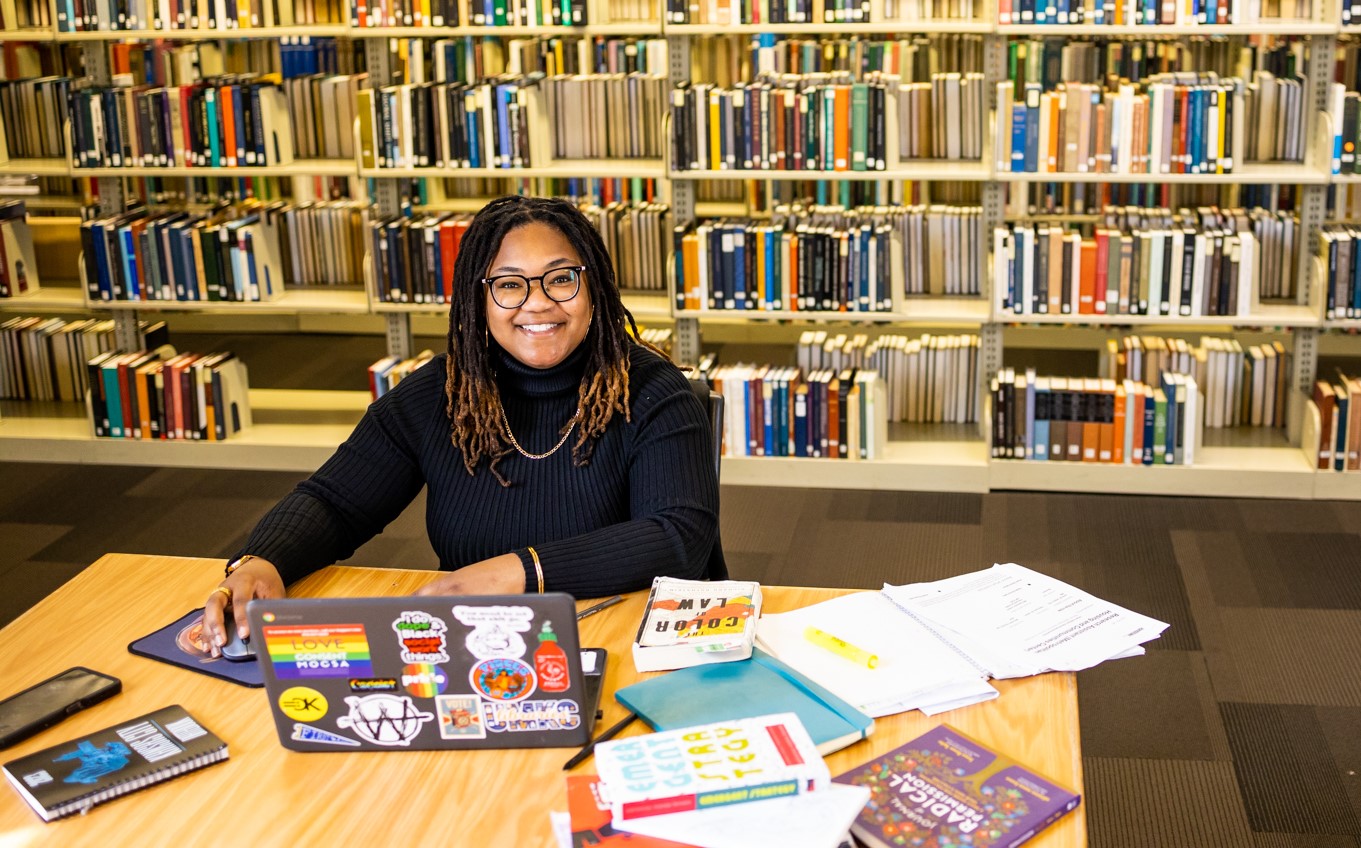
DaVonna Williams is pushing the needle towards a more progressive, fresh take on social work
Roos don't just dream, they do. Our students and alumni turn ideas into action every day. Get to know our people, and you'll know what UMKC is all about.
DaVonna Williams (M.S.W. ’23) Pronouns: She/Her/HersUMKC degree program: Master of Social WorkHometown: St. Louis, MO
DaVonna has always been passionate about social work advocacy. After returning to UMKC to pursue her Master of Social Work, her experiences on and off campus allowed her to further explore this passion while adopting a fresh, new take on the field.
Why did you choose UMKC?
I chose UMKC because I had a really great experience here for my undergraduate degree and knew it would be the best choice for me when I decided to go back to school.
How has your college program inspired you?
My program has inspired me to continue to speak truth to power no matter my position or status in the world. It has lit a fire in me to continue to advocate for communities that have been historically excluded due to biased systems.
What does advocacy mean to you?
Working with an individual, group or organization to provide the means for them to gain agency over their own lives and help them better understand the systems that perpetuate unhealthy patterns and beliefs that can diminish their quality of life.
Have your experiences at UMKC helped define your career goals?
Definitely. During my field work, I realized that I would like to work with neighborhoods and help them be more involved in decisions that impact their communities. They need to be aware of everything that is going on and have a say in it. I've also realized that as social workers, we need to attack issues at the root a lot more. Getting involved in policy and supporting organizations that are doing that liberatory work is crucial to social change.
Are you a first-generation college student? If so, what does that mean to you?
Yes, I am. It is important to me because I have been privileged enough to further my education and take advantage of everything my parents worked so hard to provide for me.
What has been your favorite memory at UMKC so far?
Presenting at the 2023 UMKC Social Work Conference. I was able to present my capstone work, which involved community organizing around the issue of unpaid field work for social work students. I am very passionate about economic injustice so being able to speak about our organizing and awareness building efforts was empowering.
Who/What do you admire most at UMKC and why?
I admire Center for Neighborhoods because they are doing a lot of important work by equipping neighborhoods with the tools they need to address their own needs and meet their goals. I like that they visit and connect with members of the community.
You were president of the Master of Social Work Student Organization. What did that role mean to you?
It meant taking the lead to empower my cabinet and other students to speak up on issues that we see as social workers out in the community, as well as within the MSW program. My vision is for this organization to be engaging and fun while cultivating a sense of community within the MSW program. For instance, we created a newsletter called “Not Your Grandmother's Social Work” (NYGSW) because we wanted to promote a more refreshing, progressive take on social work.
What's your favorite fun fact about Kansas City?
Kansas City is the hometown of one of my favorite artists, Janelle Monáe.
Do you have a favorite spot on campus?
My favorite spot on campus is Miller Nichols Library. It’s pretty chill and quiet, so I'm there when I want to brainstorm or work on a project.
What are three words you'd use to describe Kansas City?
Resilient. Inspiring. Fun.
May 23, 2023
Clancy Martin and Gwen Nally showcase their expertise in the national publication
Two University of Missouri-Kansas City philosophy professors have recently appeared in the New York Times.
Gwen Nally, Ph.D., was one of two authors of the guest essay, "Fear of a Black Cleopatra" about the new Netflix docudrama. Nally has taught at UMKC since 2016. Her work focuses primarily on Plato’s ethics, epistemology and metaphysics.
Clancy Martin, Ph.D., was featured for his new book “How Not to Kill Yourself.” His work focuses on nineteenth century philosophy, existentialism, moral psychology, applied ethics and Buddhism. Martin has taught at UMKC for almost two decades.
May 22, 2023

New partnership showcases a nine-decade history based on mutual admiration for the Roo
The University of Missouri-Kansas City and the Kansas City Zoo are announcing a five-year partnership centered around their shared love of kangaroos. The relationship between the two Kansas City institutions dates back almost 90 years.
“Not many universities can claim a Roo for a mascot but, thanks to inspiration from the Kansas City Zoo all those years ago, UMKC embraced that unique identity,” said UMKC Chancellor Mauli Agrawal. “At UMKC, we have an amazing Roo history, complete with a touch of Walt Disney magic.”
“Our partnership is a natural fit because the mission of the university and the Zoo is the same, and that is to educate and continually elevate our community through our work,” said Sean Putney, executive director and CEO of the Kansas City Zoo.
Venture into the Australia section of the Zoo, and one of the first things you’ll notice on a deck overlooking the kangaroo habitat is a UMKC-sponsored sign that chronicles the story of why a university in the middle of the United States chose an animal from the other side of the world as its mascot, and how famed local resident and animator Walt Disney became involved.
New signage chronicles the relationship between the Kansas City Zoo and UMKC's beloved mascot, KC Roo
In 1936, the three-year-old university had yet to establish an athletics program, but the debate team was about to begin competing with other universities. Students eagerly got on board with the idea of creating a university mascot.
At the time, the city of Kansas City was eagerly anticipating some very exciting news at the Zoo. Jigger the kangaroo was pregnant and the whole town was awaiting news of her little one’s arrival. Inspired by the excitement and believing the mascot would stand out, students chose the kangaroo.
In 1938, Walt Disney responded to a student request to illustrate a Roo for the cover of a student-published humor magazine. Nearly a century later, the Disney Roo is still one of the best-known versions of KC Roo and is credited with solidifying the mascot’s history with UMKC. A cutout of the Disney Roo is at Bluey’s deck in Australia at the Zoo, perfect for selfies. A display on the history of the Roo shows its evolution over the decades, from its classic Roo to today’s bold Division I athletics Roo.
The UMKC sponsorship at the Zoo also has funded new accessible pathways throughout Australia, where the kangaroos and other animals from Down Under live.
The new displays and walkway are just the beginning of a beautiful partnership, according to Anne Hartung Spenner, UMKC vice chancellor of Strategic Marketing and Communications.
“Our sponsorship at the Zoo celebrates more than just inspiration for a beloved mascot,” Spenner said. “Both UMKC and the Zoo celebrate education and engagement in the community – so in our second year, we will be hosting interactive displays for children to learn about kangaroos and their habitat and will be looking for opportunities for our students to intern or volunteer at the Zoo.”
Spenner also looks forward to further highlighting how the Zoo and UMKC have partnered on the academic front as well. For example, UMKC School of Dentistry students regularly use their dental hygiene skills by cleaning the teeth of Zoo animals up to weekly each spring, a relationship that benefits both UMKC and the Zoo. And biology students watch animals at the Zoo to learn anatomy.
Roos are everywhere at the Kansas City Zoo. From Bluey's deck in the Australia section, to the carousel near the entrance
To kick off the partnership celebration, UMKC students, faculty, staff, alumni and leaders are holding a UMKC Roos at the Zoo Day on May 20. UMKC students and employees will receive discounted tickets and memberships as part of the kickoff celebration.
Kangaroo fun facts: UMKC and the Kansas City Zoo
Kangaroos can only move forward and not backwards. You can observe the red kangaroos at the Zoo to see for yourself! Taking inspiration from their movement, the university named a set of its major initiatives UMKC Forward.
A group of kangaroos is called a mob. The Zoo has a mob of 14 red kangaroos. This year, UMKC renamed its athletics pep band, comprised of UMKC Conservatory students, The Mob.
A red kangaroo can reach speeds of more than 35 miles per hour, allowing them to clear 25 feet in a single leap. You can watch the kangaroos in action at Bluey’s deck at the Zoo. Their agility and swiftness are why UMKC kept the Roo mascot when the university joined the NCAA Division I in 1987.
May 17, 2023

Projects could include a mix of retail, housing and a small arena for community events, concerts and UMKC Division I athletics
The University of Missouri-Kansas City has issued a request for proposals (RFP) to develop a five-acre parcel of land next to the south terminus of the Kansas City Streetcar at 51st Street and Brookside Boulevard. The streetcar stop is expected to be operational in 2025.
In his recent State of the University address, UMKC Chancellor Mauli Agrawal announced his intention to explore options to develop that parcel into a campus and community destination. The project could include a mix of retail, housing and a small arena perfect for campus and community events, concerts and, of course, UMKC Division I athletics, including basketball and volleyball.
“A destination development at the southern terminus of the streetcar is an appropriate addition to the community by UMKC, Kansas City’s university,” Agrawal said. “The development from this RFP will elevate the area for our city, our neighbors and our campus community.”
The university has two plots of land between Brookside and Oak Street, vacant except for a parking garage. The goal is to integrate the existing parking structure into whatever new development might be envisioned. UMKC plans to open the garage to public use when the streetcar stop opens in 2025 and will build a pedestrian walkway from the streetcar stop to the parking garage.
In addition to seeking a development that could include retail, housing and arena amenities, UMKC envisions this project as a highly visible gateway to the UMKC campus from the west. The deadline for proposals is Friday, July 21.
The RFP presents an evolution of the university’s 2021 Master Plan, which initially called for development of student housing on the site. Based on decreased demand for on-campus housing and the imminent opening of a new streetcar stop, the priority has shifted to increased space for campus and community amenities to enhance the student life experience on campus and to further engage with the broader Kansas City community.
The site, next to the streetcar terminus, has the potential to become a multi-modal transit hub. The Kansas City Area Transportation Authority is conducting a comprehensive redesign of its transit service, which will include stops on the Main and Troost MAX lines every 15 minutes. The Troost MAX provides the most direct connection between the UMKC Volker Campus and downtown Kansas City.
To create this project, UMKC would provide a ground lease to the developer and then would lease back the arena to meet its athletics and event needs, while allowing the developer to use the facility for other programs and events during available times. A shared operating agreement between UMKC and the developer will govern use of the facility.
The UMKC Division I Athletics program anticipates that the arena would be home to Kansas City Roos basketball and volleyball. That means 40-45 home games per season, plus 550 practice sessions per season. The university’s existing athletics and recreation facility, Swinney Center, currently supports the Division I programs as well as campus recreation. A new arena with expanded seating capacity and more training space is expected to provide a significant boost to UMKC Athletics’ fan experience and would aid in recruiting outstanding student athletes.
May 15, 2023
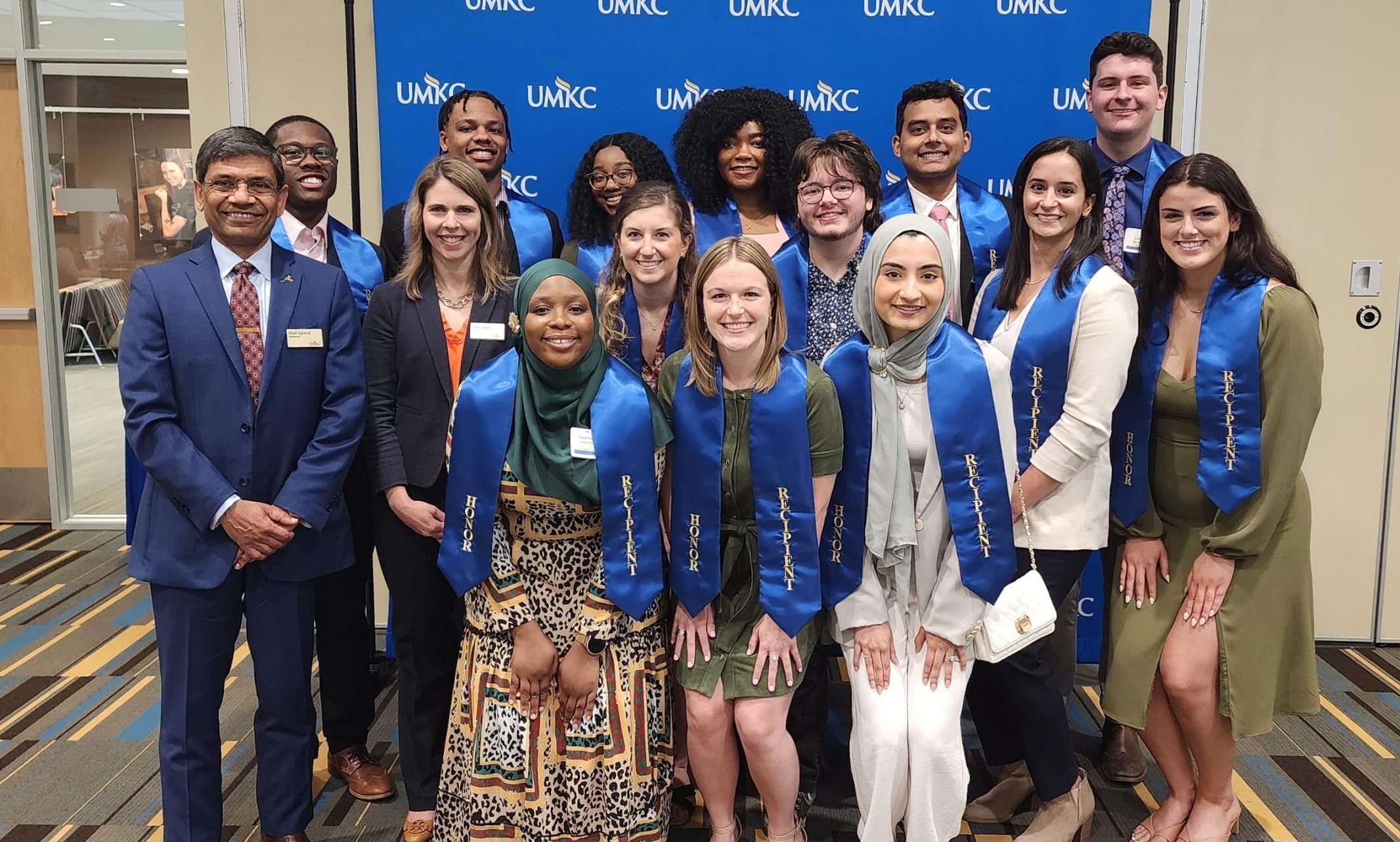
Graduating students are recognized for their outstanding academic performance, community leadership and service
Thirteen graduating UMKC students have been named Dean of Students Honor Recipients in recognition of their accomplishments on campus and in the community.
Every semester, exceptional graduating students are honored with this designation. These students maintain excellent academic standards while actively participating in university activities and community service outside of the classroom.
The Spring 2023 honorees’ accomplishments include founding new service organizations, being published in peer-reviewed journals, holding leadership positions in student organizations, volunteering in the community and more.
“These students embody what it means to be a Roo with their dedication to academics, service and community," said Michele D. Smith, Ph.D., vice provost for student affairs and dean of students. “I am thrilled to recognize them for their many accomplishments and look forward to the bright futures ahead of them.”
Students shared reflections on their time at UMKC at a special breakfast celebration in their honor. Some excerpts:
Shaan Patel: “UMKC has taught me so much about what it means to be a good physician, student and person. One of my attending (physicians) once said that being a physician is not just about treating the disease, but it is about treating the person. Through my clinical experience at UMKC, I have learned so much about caring for the underserved and how quality of health is impacted by so many factors separate from disease pathology. I have been inspired by my attendings who have been critical in helping patients beyond the hospital setting.”
Emily Puthawala: “I am a non-traditional student, and tomorrow will be the first time I hold a diploma since my high school graduation eleven years ago. I would like to recognize one very special group of people. This group has not only made my time at UMKC special, but I believe they are what makes the UMKC experience so unique and inspiring: my fellow non-traditional students. One will be attending medical school in the fall, one will be interning at the World Health Organization, and another will be taking the MCAT (Medical College Admissions Test) with me this September. With an average student age of 26, UMKC is dedicated to supporting and nurturing students like us as we strive to achieve our wildest dreams, something for which I am forever grateful.”
Meredith Clark: “One of the most important things UMKC has taught me through my program is that you won’t have to go through the experience alone. The last four years have been no easy feat by any means, but my faculty, classmates, staff and administration have all been there to help me be the best dentist I can be. I have been shaped by the people at the dental school in more ways that I can count. I am continually awed by the time and energy the faculty put into investing into my future as a dentist but also by the energy they put into getting to know me and my personal life as well. It’s a true testament to the environment created within the dental school.”
Congratulations to the Spring 2023 Dean of Students Honor Recipients!
Olaide Bankole, School of Science and Engineering
Meredith Clark, School of Dentistry
Erin Galakatos, School of Medicine
Jordan Grimmett, School of Medicine
Jordan Held, School of Medicine
Faith Kapp, School of Medicine
Mahnoor Malik, School of Medicine
Darryl Monroe II, School of Pharmacy
Sage Morgan, Conservatory
Christy Nwankwo, School of Medicine
Shaan Patel, School of Medicine
Emily Puthawala, School of Science and Engineering
Lanisha Stevens, School of Education, Social Work and Psychological Sciences
May 15, 2023
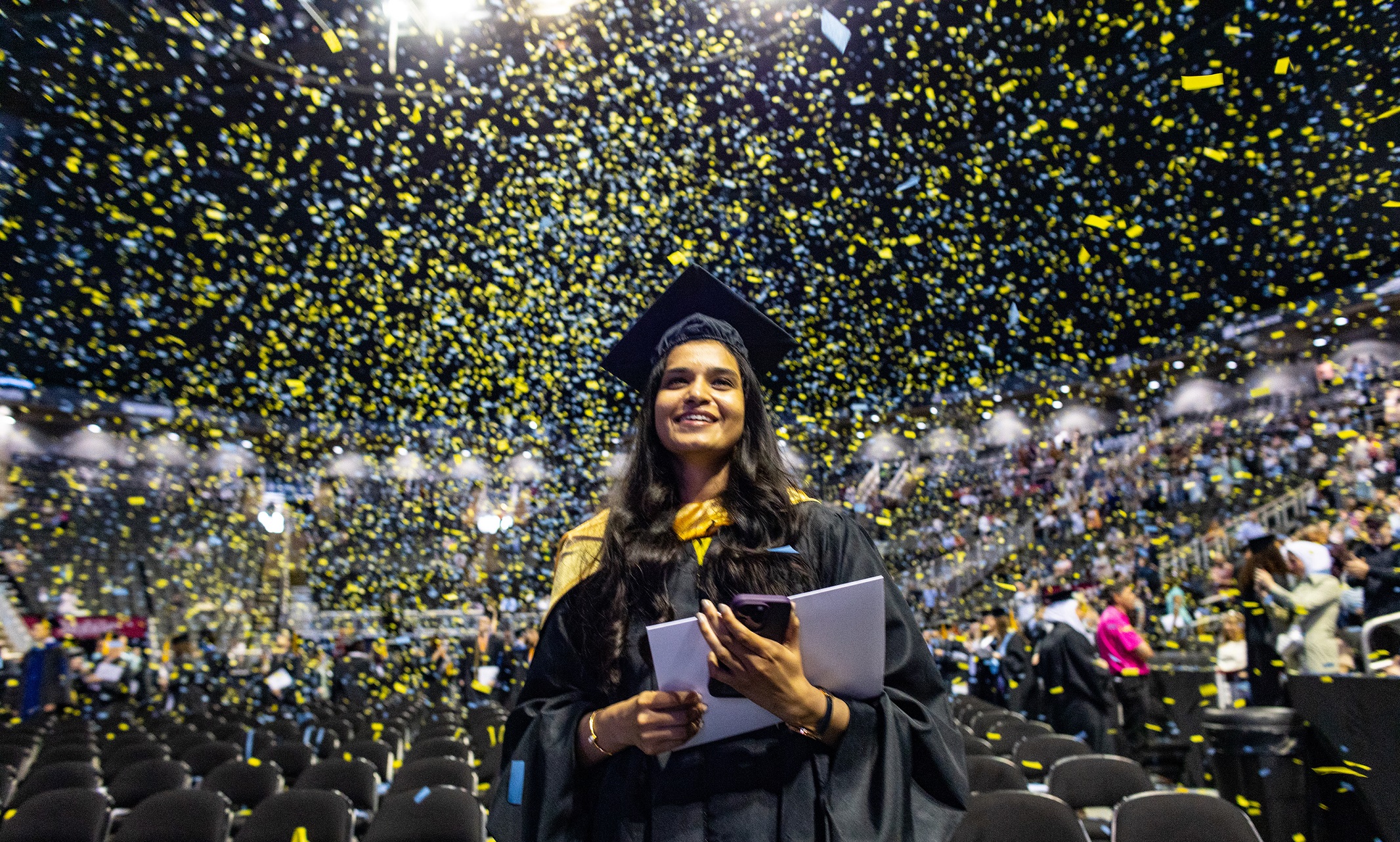
The ceremonies were held on May 13, 2023
More than 2,000 students became alumni on Saturday as The University of Missouri-Kansas City had its May 2023 Commencement ceremony in the heart of Kansas City.
“You have acquired the knowledge, skills and the confidence to navigate an ever-shifting landscape in the days and years to come. Chart your future in pencil because more challenges surely await you,” said Chancellor Mauli Agrawal. “But I know that you are up to those challenges because you have a degree from UMKC. You are ready for whatever comes next.”
National ABC News Anchor and UMKC alumna Rhiannon Ally (B.A. ‘05) congratulated the new graduates. The Raytown, MO native's almost 20-year career included a front row seat to history, documenting events including the Boston Marathon bombing, the war in Ukraine, Hurricane Katrina and the Ghislaine Maxwell trial.
“If you find what you love, push through those hard days. Things will get better if you are committed to improving every single day,” said Ally. “You hold the power to change the future, no matter what your profession is.”
Following Ally’s address and the recognition of individual graduates, the class enjoyed taking part in the tradition of moving the tassels from the right of their caps to the left to symbolize the individual's movement from candidate to graduate.
May 13, 2023
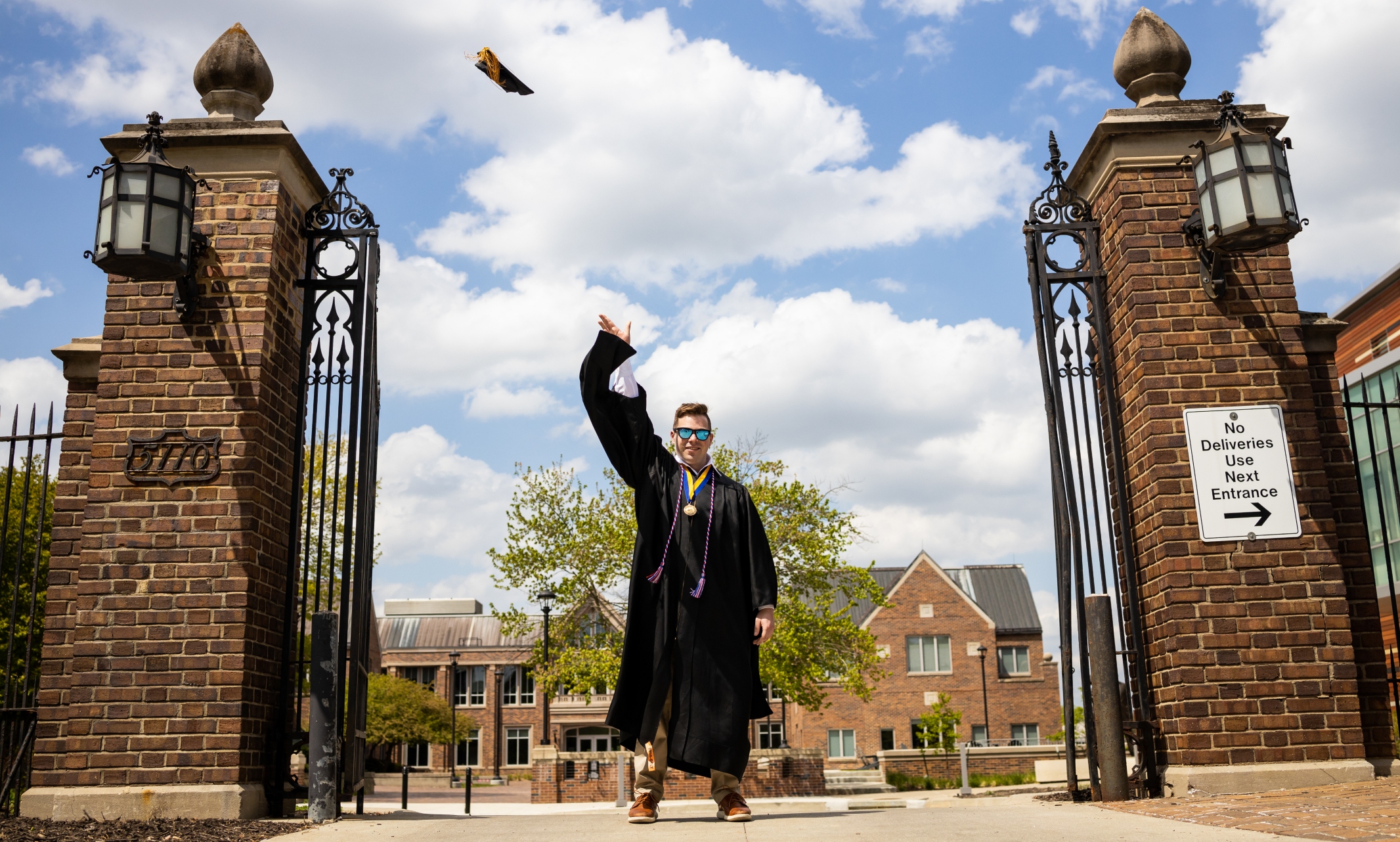
Business student and Missouri Air National Guard staff sergeant Henry Meeds reflects on the UMKC opportunities that have prepared him for post-grad...
Roos don’t just dream, they do. Our students turn ideas into action every day. Get to know our people, and you’ll know what UMKC is all about.
Henry Meeds Graduation year: (BBA ’22, B.S. '23)UMKC degree program: Dual Degree, Business Administration and Accounting Hometown: Fairway, KS
Fresh off the completion of his accounting program, Henry Meeds is starting a new adventure. The May 2023 graduate is headed to New York City to work at the Big Four accounting firm, PwC, a job he had lined up months before graduation. “My experience at the Bloch school has definitely helped me get into this position with PwC,” Meeds said. “The reason I went into consulting is because I don't want to be stuck in the same industry, doing the same job every day.”Meeds became connected with PwC after participating in the company’s diversity-based internship program in 2021. He learned about the company, the technology they use and developed an action plan for a nonprofit organization. He returned for a second internship in the summer of 2022, where he focused on technology consulting and implemented the rollout of Workday for a health care company. By the time the summer was up, he had an offer to come on full-time after graduation as a technology consultant. “I think my experience at the Bloch school has definitely helped set me up,” Meeds said. “Being in a smaller class allowed me to ask questions and get mentorship from those professors. I have a lot of professors that I've been able to talk to you about certain aspects of business. For that reason, I think I bring something new to the table for the company.”
Despite having a full-time job lined up, Meeds didn’t rest on his laurels the last year of his accounting program. He was one of four Bloch Consulting Lab students to work with Vantage Airport Group, the vendor management company for the recently opened single-terminal KCI – the $1.5 billion terminal is considered Kansas City’s largest infrastructure project. Meeds and his peers helped support the company with hiring, developing an internship program and conducting an economic impact study. Meeds said after all the work he’s put in with the airport, taking off from there for New York will be a moment to remember, knowing that what he’s worked towards will have a big impact on his hometown, KC citizens and his career moving forward. “It’s really symbolic,” Meeds said. “Working with the airport and helping implement this great amenity for Kansas City was great. When I leave this month, it will make me feel great just having a piece of KC, while leaving a little bit of myself behind.”
He said the mentorship from experienced professors and participating in the Bloch Consulting Lab helped sharpen his understanding of consulting services and information technology in a way that will benefit him as he begins his career. “Working in this consulting position definitely helped me improve my consulting skills before heading out to New York City,” Meeds said. “We’re getting hands on with every part of the project, similar to what a partner might be doing at PwC. And we’re doing it all ourselves.”While balancing his commitments as a staff sergeant in the Missouri Air National Guard, he didn’t fall short on his academic responsibilities. Last spring semester, Meeds received notice of being deployed to Germany and took the initiative to complete course work and exams ahead of schedule. Following his return, he headed straight to New York City to complete his internship with PwC. His advice to other active military students is to always be ready to be called to duty."Being a military student, and have having done this for the past four years, I am fully aware that things happen,” Meeds said. “I get a step ahead of all my classes to make sure that I'm ready to go.”
May 05, 2023
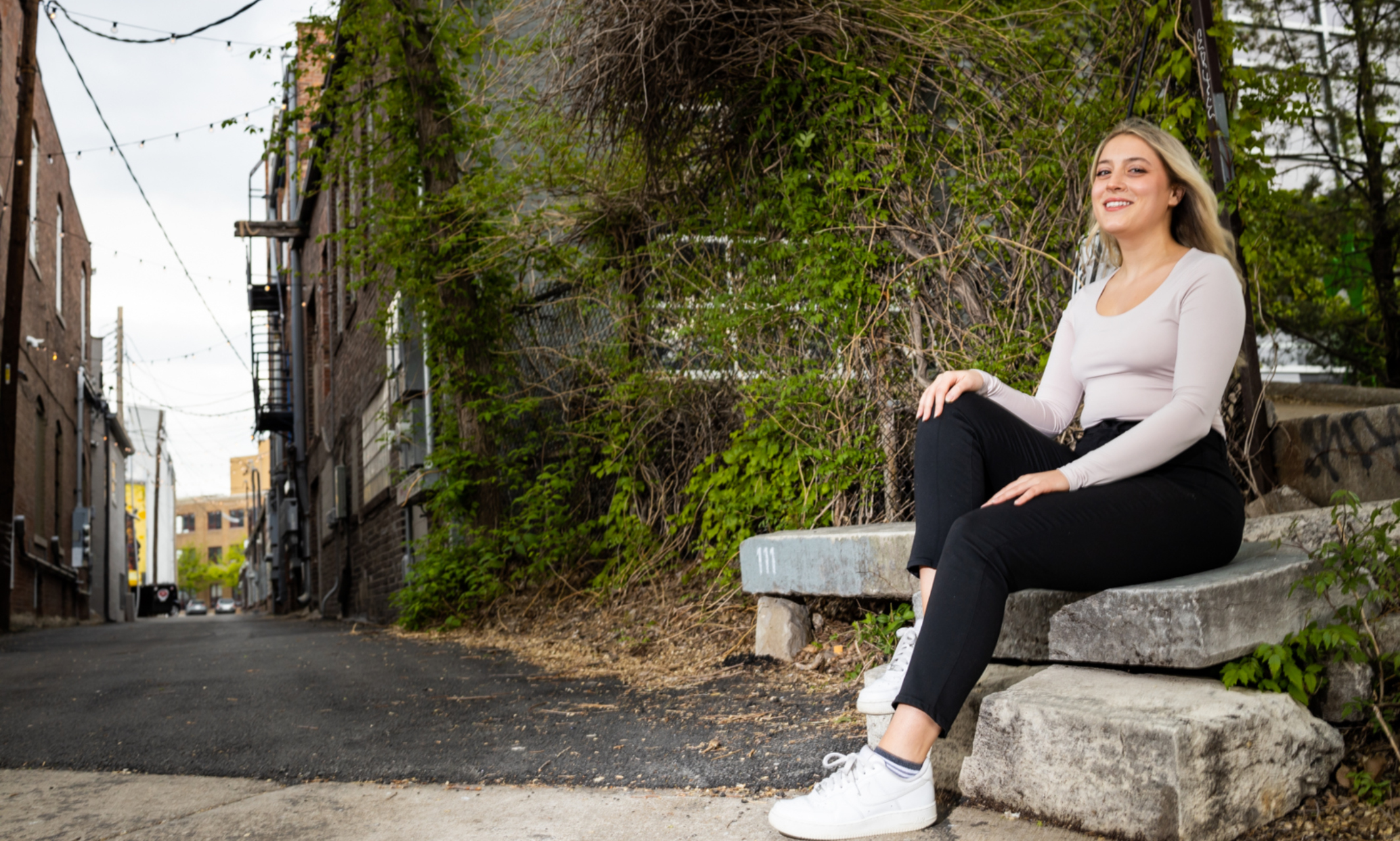
Poem by MFA candidate Shannon Moran will be published in Hayden’s Ferry Review
Shannon Moran, a Master of Fine Arts student in the English department Creative Writing Program, is a winner of this year’s AWP Intro Award in poetry for her poem, “Sadie.”
The national award, open to all U.S. MFA students, is sponsored by the Association of Writers and Writing Programs. Moran, originally from Baltimore, is one of eight winners in the Poetry category. According to the association, the Intro Journals Project is a literary competition for the discovery and publication of the best new works by students. “Sadie” will be published in an upcoming edition of Hayden’s Ferry Review.
“This award means so much to me because, to be considered, your institution's faculty must first nominate your work,” Moran said. “Being nominated by the MFA faculty here at UMKC, all incredibly brilliant and accomplished writers, felt like a testament to both my work and the program overall.’
She described “Sadie” as an epistolary poem in offset couplets.
“The poem addresses themes of addiction and the guilt that comes from recovering and moving on while a loved one continues in the cycle, as well as the complex feelings one has toward the person who initially introduced them to that world,” Moran said. “There is a certain grief that comes from losing someone who isn't gone, from feeling like you've both escaped and abandoned them, from mourning a love that feels everpresent and yet absent--a ghost of itself. This piece is incredibly close to my heart, which made sending it out into the world a bit scary. I am grateful that it has been received well and will find life on the page.”
English Professor Hadara Bar-Nadav, Ph.D., is Moran’s thesis advisor.
“Shannon Moran’s ‘Sadie’ is a breathtaking elegy for a friend,” Bar-Nadav said. “With striking language and imagery, Moran’s poem crosses time and space in this tribute of both love and loss.”
Students in the UMKC Creative Writing Program have won the award multiple times since the program was founded in 2008. Most recently, Mary Henn won in 2020 and Emily Standlee won in 2021.
May 03, 2023
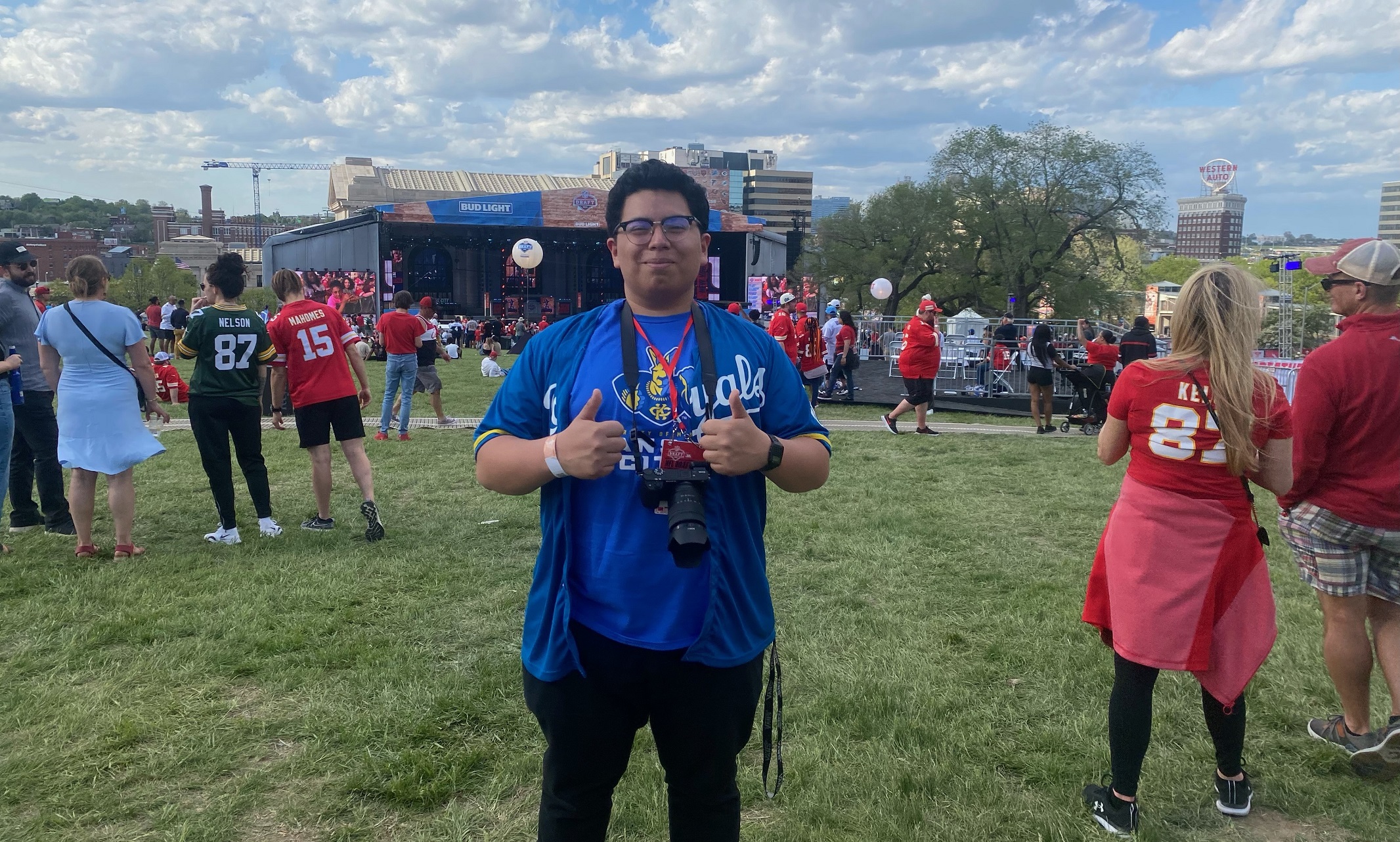
Cristian Martinez had the once-in-a-lifetime opportunity to cover the NFL Draft as a student journalist
Cristian Martinez stands on the football field at Central Middle School, microphone in hand. He looks over at Roo News photographer Julia Kapros and gives her a thumbs-up.
Martinez is with sports journalists from all over the country, waiting to interview prospect Will Levis for the NFL Draft in Kansas City. Unlike other journalists in the crowd, he’s still in college. Martinez is the sports editor for the UMKC student newspaper, Roo News.
“Being at the NFL Draft is a dream come true,” Martinez said. “I’ve always dreamt of covering big events. That I can go to this and learn from some of the best in the business at such a young age is spectacular.”
Covering three days of events for the NFL Draft in Kansas City didn’t just give Martinez the opportunity to interview top draft prospects such as Levis and Zay Flowers, an experience he described as “surreal.” He also got to learn from nationally known sports journalists, both by watching them and talking with them.
“I spoke with Daniel Jeremiah, Joel Klatt and Charles Davis,” Martinez said. “I asked them about their careers, and Davis gave me advice about doing play-by-play and color commentary. Getting to ask them for career advice was amazing and something I’ll never forget.”
"Opportunities will always present themselves, but you have to chase them." — Cristian Martinez
In high school, the Raytown native knew he wanted to attend college in Kansas City. Although he initially considered a university traditionally known for its journalism program, the opportunities that come from being in the heart of the city won him over.
“When I think of the opportunities I’ve had at UMKC, I don’t even know where to begin,” Martinez said. “I attended the groundbreaking for the Kansas City Current, I’ve worked for ESPN to cover Kansas City Chiefs home games, I did play-by-play for the Summit League Basketball Tournament in Sioux Falls and I cover UMKC sports. Sometimes I think about all the things I have done up to this point and it just blows my mind.”
Martinez wants to be a sports broadcaster and writer, but he is working hard to learn all aspects of the journalism field. In his words, he wants to be a “Swiss army knife” when he graduates, prepared for wherever his career may take him. He credits the opportunities and professors at UMKC, including Steve Kraske, Bill Bell and Jeffri Chadiha, for helping him become an accomplished sports journalist already.
Martinez has one piece of advice for students considering UMKC: take advantage of what the city offers.
“There’s so much you can do here, no matter what career you’re pursuing. Opportunities will always present themselves, but you have to chase them. They won’t just come to you.”
May 01, 2023
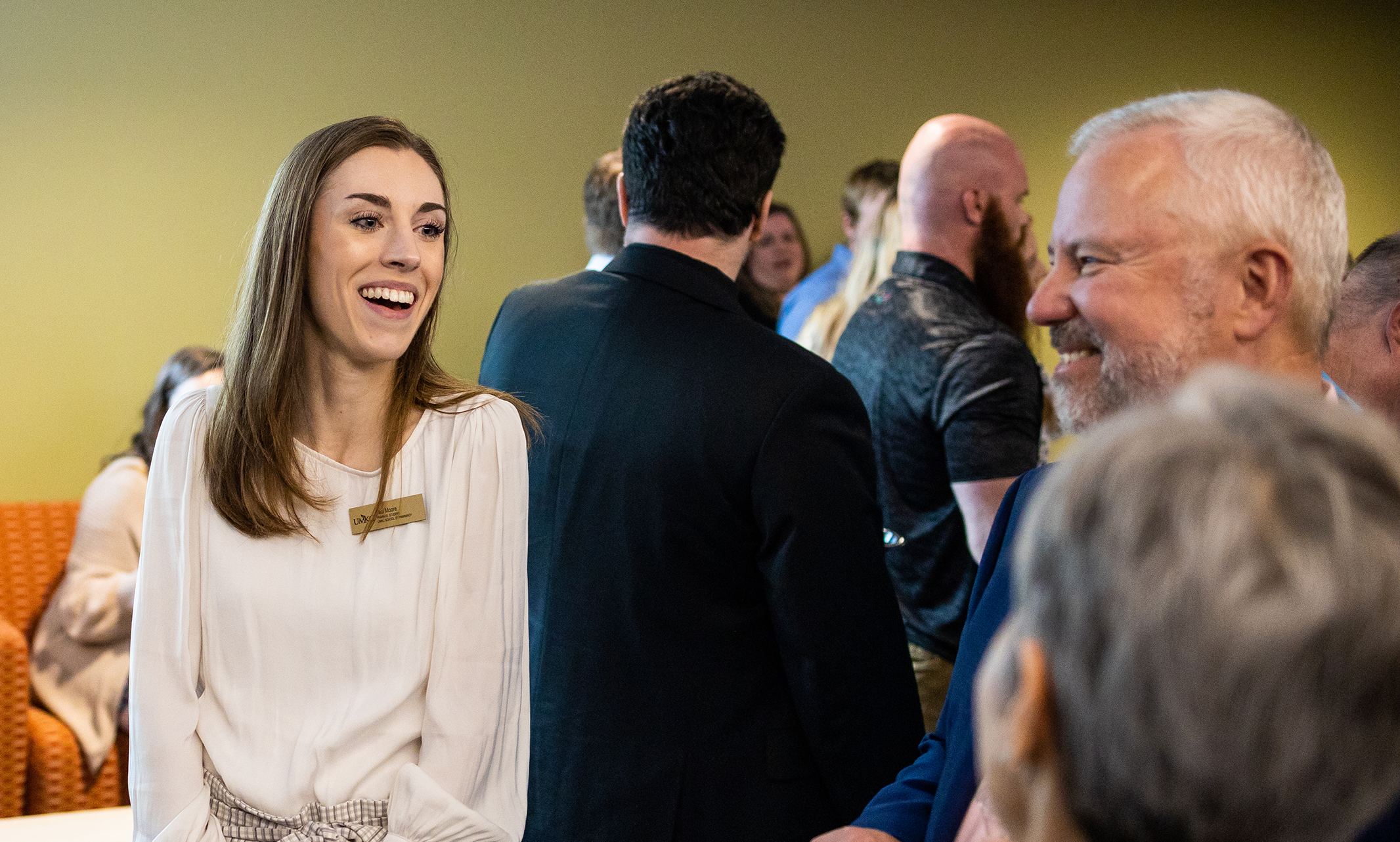
Two new scholarships, one that funds research opportunities, were highlighted at the annual scholarship award ceremony
Steve Stoner knows the financial burdens that college students carry. As the UMKC School of Pharmacy’s associate dean for student affairs, he works with them on a regular basis.
That is why he and his family recently established the Stoner Family Scholarship, recognized along with the school’s Pharmacy Predoctoral Fellowship as its newest student awards during the annual Achievers of Excellence Scholarship Awards program on April 21.
The ceremony acknowledges students who have received scholarships or awards from the school, its constituent groups and the university. Almost 90 students were recognized as having received financial support in the past year from one of more than 50 different awards.
“Working with students on a daily basis, I am well aware of the financial and other insecurities they experience,” Stoner said. “I never want financial roadblocks to be a hurdle to one’s education and being able to achieve their professional dreams.”
A pharmacy educator at the UMKC School of Pharmacy since 1996, Stoner practiced in psychiatric pharmacy and served as chair of the Division of Pharmacy Practice and Administration before his student affairs appointment. With a father who was a middle and high school teacher and middle school principal, a commitment to education, learning and mentoring students is part of his DNA.
Steve and Tiffany Stoner with scholarship recipient Alex Mills
“I have been very fortunate in the profession of pharmacy to help patients live better lives and to train students to do the same and make an even bigger difference,” Stoner said. “This scholarship is just a small way for my wife Tiffany and I, and our children, Peyton and Mallory, to give back to the profession and our pharmacy students. The UMKC School of Pharmacy has been a part of my life for almost 30 years and this is a way to have a lasting impact in helping others.”
The school also celebrated its new Predoctoral Research Fellowship program, a summer research opportunity for students that launched last year with support from a group of generous donors who provided the initial stipends.
“While we learned lessons that will help the program move forward, we were able to provide significant research experiences for pharmacy students who otherwise may not have considered the possibility of a career in research,” said Russ Melchert, dean of the School of Pharmacy.
With Ph.D. programs consistently ranked in the top half of U.S. pharmacy schools in extramural funding, UMKC School of Pharmacy students have enjoyed excellent job placement for decades. But Melchert said that most Pharm.D. students don’t have the opportunity to experience research projects because of curriculum requirements or the need to spend summers in pharmacy technician jobs to financially support their education.
The research fellowship program is designed to overcome those challenges. Last summer it provided funding to four students who gained hands-on research experience, collaborating with a faculty mentor.
“We are hopeful that the students will continue engagement in research and perhaps even enter research careers upon graduation,” Melchert said. “Now we look to build on this success and to double the size of the program in the coming years.”
Apr 26, 2023
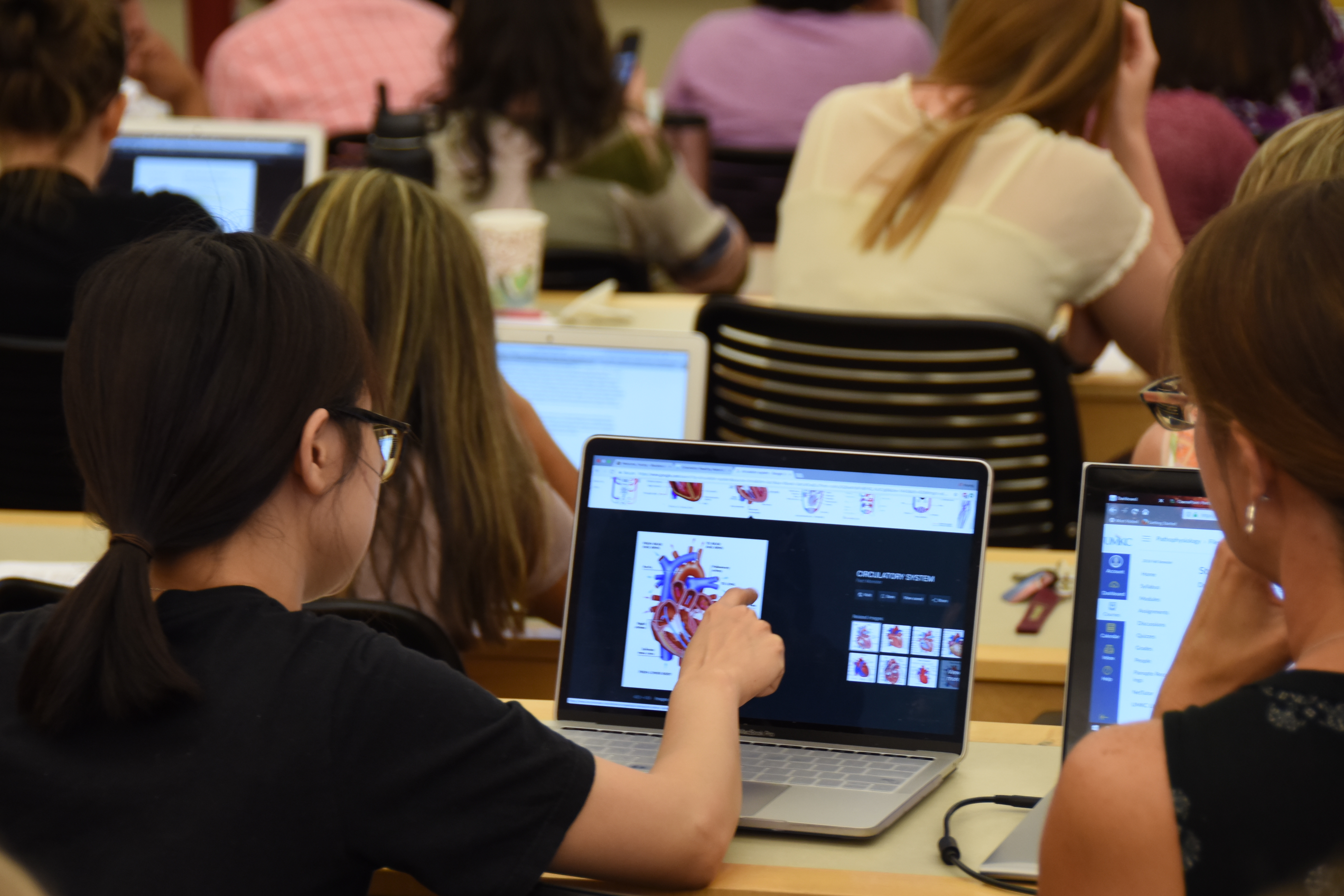
Programs are medical/primary care, medical/research, Doctor of Nursing Practice, professional MBA and public administration
Five UMKC graduate school programs were ranked among the top 100 in the nation in the rankings released today by U.S. News & World Report.
Updated May 2023
The Doctor of Nursing Practice program in the School of Nursing and Health Studies was ranked 49th in the nation, out of a total of 169 ranked schools. Rankings for other regional schools included Mizzou 45th, University of Arkansas for Medical Science 66th, University of Missouri-St. Louis 74th and Saint Louis University 106th.
“We are very pleased by this affirmation of our outstanding doctor of nursing practice program,” said Joy Roberts, interim dean of the School of Nursing and Health Studies. “Our graduates play a significant and vital role in our health care system.”
The UMKC School of Medicine was ranked 71st in the country for primary care, and 88th for research. The school was also ranked 90th in the category of most diverse, 93rd for graduates practicing in rural areas and 99th for graduates practicing primary care.
The professional MBA program in the Henry W. Bloch School of Management was ranked 89th in the country, out of 299 ranked schools, ranking it the highest among public universities in the region.
Another Bloch School graduate program, public administration, ranked 98th out of 269 ranked schools. This places it among the top three programs in Missouri and Kansas.
“Our focus is on developing talent for this region and providing an outstanding experience for students,” said Brian Klaas, dean of the Bloch School. “We are pleased that the quality of our programs is recognized by rankings such as U.S. News & World Report.”
The UMKC School of Law was ranked in the nation's top 100 in six sub-specialty categories, led by legal writing at 13th in the nation. Other legal specialty rankings included trial advocacy, 59th; business/corporate law, 87th; criminal law, 94th; health care law, 94th; and contracts/commercial law, 95th.
Apr 25, 2023
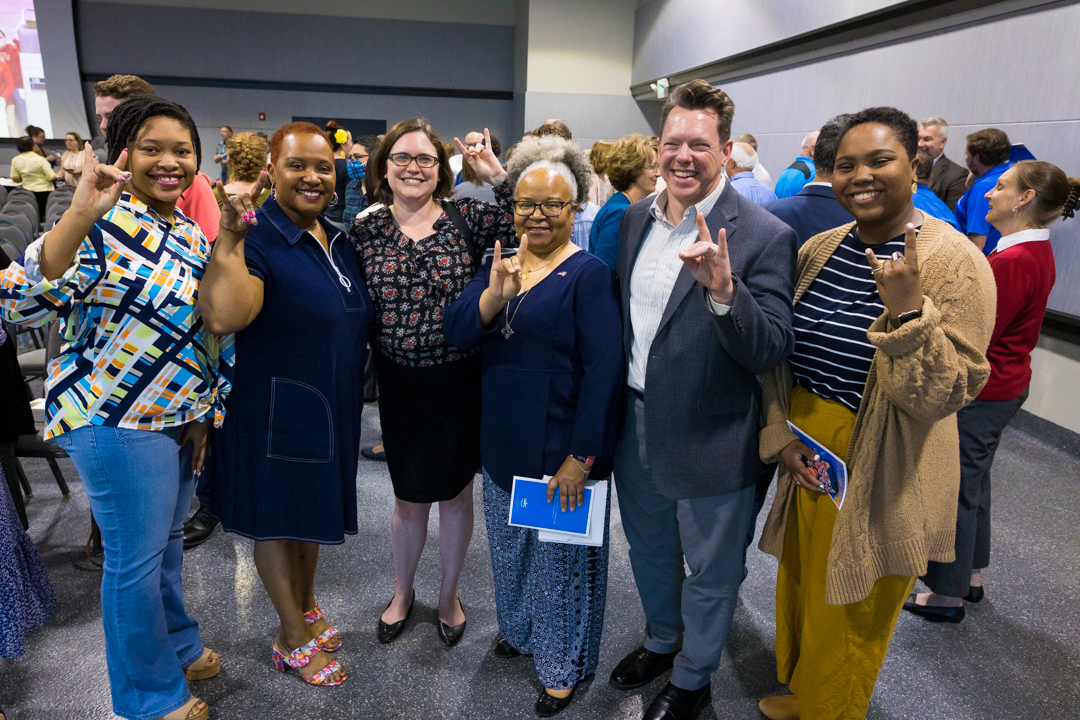
Awards recognize staff milestones and excellence
The University of Missouri-Kansas City recognized more than 200 employees at the 2023 Staff Awards ceremony in March. The annual event celebrates staff members who have demonstrated extraordinary commitment to service, achieved personal and professional milestones, and led efforts to achieve UMKC goals in student success, diversity and inclusion, engagement and research.
Chancellor Mauli Agrawal opened the event by saying the work of staff is integral to the university’s mission and essential to UMKC success.
“Know that whether or not you are called to the stage today, our faculty and university leadership recognize your dedication to the programs and services you provide,” Agrawal said. “Each of you enable UMKC to maintain a reputation of excellence.”
Congratulations to the 2022 awardees:
Staff Awards
Staff Council Dedication Award
Karen King, Senior Program/Project Support Coordinator, School of Education, Social Work, and Psychological Sciences
Living the Values Award
Cara Bradley, Senior Dental Assistant, School of Dentistry
James Bradley, Senior Assistant Director Craft, Service & Maintenance Operations, Finance and Administration
Yolanda Branch, Senior Executive Assistant, School of Education, Social Work, and Psychological Sciences
Kristian Brennon, Financial Literacy Counselor, School of Medicine
Sharon Breshears, Office Support Assistant IV, School of Pharmacy
Karen Campbell, Senior Advancement Officer, KCUR
Angela Cottrell, Director Research and Institutional Programs, Missouri Institute for Defense and Energy
Maria DeSimio, Business Operations Associate II, Information Services
Jennifer Dierks, Law Professional & Career Development Center, Director, School of Law
Michelle Heiman, Student Service Coordinator II, School of Graduate Studies
Diana Jones, Grants and Contracts Administrator, Office of Research Services
Rebecca Markley, Senior Executive Assistant, Provost Operations
Jill Masson, Senior Executive Assistant, Henry W. Bloch School of Management
Hope McMorrow, Athletics Senior Marketing Coordinator, Intercollegiate Athletics
Jeni Mills, Executive Assistant, University Libraries
Wayne Nagy, Assistant Director, Undergraduate Advising, Student Success and Academic Assurance
Brandon Parigo, Strategic Communications Consultant, Strategic Marketing and Communications
Brandy Roberts, Human Resources Business Partner, School of Nursing and Health Sciences
Stella Szymanski, Office Support Assistant IV, School of Science and Engineering
Joseph Tesoro, Electronics Technician III, UMKC Conservatory
Alexa Troyer, Talent Navigator, UMKC Innovation Center
Jennifer Underwood, Office Support Assistant IV, School of Humanities and Social Sciences
Todd Wells, Assistant Dean of Student Engagement and Director of Office of Student Involvement, Student Affairs
Excellence in Student Success Staff Award
Sharon Breshears, Office Support Assistant IV, School of Pharmacy
Excellence in Research and Creative Works Staff Award
Alexis Petri, Director Research Development, Office of Research Services
Excellence in Engagement and Outreach Staff Award
Kim Kushner, for her work as Assistant Director of New Student and Family Programs, Office of Student Involvement
Excellence In Multiculturalism, Globalism, Diversity and Inclusion Staff Award
Erin Gauer, Academic Advisor of Numbers, Engineering, Technology, and the Cosmos, Undergraduate Academic Advising
Excellence in Planning, Operations and Stewardship Staff Award
Kristina Shultz, Senior Office Assistant, Henry W. Bloch School of Management
Rising Star Award
Anna Zimmerman, Financial Literacy Coordinator, Student Financial Aid and Scholarships Office
Chancellor’s Staff Award for Extraordinary Contributions
Tammy Welchert, Director of Undergraduate Academic Advising, Undergraduate Academic Advising
Supervisory Development Series Graduates
Rosana Challacombe
Jamie Charles
Elsa Evans
Nathan Jacobs
Doretta Kidd
Davlon Miller
Julie Myer
Joseph Rucinski
Linda Thornburgh
Thomas Willoughby
Dr. Elson S. Floyd Administrative Leadership Development Program
Casey Bauer
Megan Elsen
Megan Gonzalez
Jeremy Schliesman
Elora Thomas
Series on Leadership Essentials Program
Karey Brantley
Harry Brewster
Mandy Farrow
Kimberly Johnson
Brandon King
Petra Kralickova
Christiana Rangel
Sarah Richardson
Krisana West
Sandy Wilson
Kaitlin Woody
Anna Zimmerman
Organizational Perspectives and Leadership Program
David Babcock
Annie Carr
Joe Constantino
Della Damon
Peter Dulin
Katherine Garey
Susan Hankins
Kimberly Johnson
Leigh Kerwin
Kim Kushner
Jamie Locke
Andre Logan
Dea Marx
Tanya Moore
Eugene Pegler Jr.
Christiana Rangel
Gabriela Sa Teles
Staff who graduated with a UMKC degree in Spring 2022, Summer 2022 or Fall 2022
Casey Bauer
Elizabeth Duarte-Rios
Leigh Kerwin
Hannah Litwiller
Kyle Morehead
Mark Pederson
Ryan Pierce
Craig Reay
Mallory Snyder
Layne Viets
5 Years of Service
Racquel Adams
Rise Ashcraft
Obie Austin
Darchel Ballance
Ayleen Bashir
Jesse Beaudin
Scott Canon
David Cawthon
Austin Chevess
Allan Davis
J Collin Foster
Robert Gambrill
Christopher Garcia
Kathleen Growney
Elizabeth Hoffman-Shrout
Hannah Hohenstein-Flack
Bethany Jordan
Debra Kacirek
Leigh Kerwin
Sarah Key
Loretta Klamm
Randal Krahulik
Jonathan Krajack
Petra Kralickova
Alia Krzyzanowski
Alicia Lawlor
Thomas Lindsey
Grace Lotz
Kelly McDonald
Amy McKune
Nathan Milburn
Mousami Mohanty
Leta Moler
Laura Moore
Ryan Murphy
Huong Nguyen
Amy O’Connor
Lora Owens
Bonny Parsons
Jennifer Pennington
Curby Piehl
Emily Reeb
Sarah Richardson
Marny Robinson
Rachel Robinson
Dawn Schnake
Penny Sisson
Amber Soto
Casey Stauber
Adalynn Stevenson
Bailey Tennesen
Audriana Thompson
James Verzella
Cory Welter
10 Years of Service
Barbara Adkins
Alma Alcantara
Dinah Bounds
Huan Ding
Jeremy Ferguson
Hartzell Gray
Michelle Heiman
Nathan Horn
LaShan Johnson
Karen King
Kristen Kleffner
Kathryn Kraske
Susanne Krulewich
Mary Lackamp
Keanon Liggatt
Jill Masson
Martha McCabe
Daniel McDonald
Jerry Murray
Julie Percival
Edward Wallman
15 Years of Service
Anne Allen
Cynthia Brown
Maryjane Bruning
Alvin Couts
Scott Ezzell
Tian Fu
Mark Galeassi
Mary Garrett
Abelardo Gonzalez
Kendell Hale
Susan Hankins
Michael Harris
WM Jonathan Hern
Alia Herrman
Tusha Kimber
Jennifer Lyles-Maqsood
Tomasina Martinez
Wayne Nagy
Lorena Ortiz
Alexis Petri
Dennis Priest
Bryce Puntenney
Shunda Reeves
James Taylor
Katherine Taylor
Ramona Uranga
Kaitlin Woody
Scott Young
Xiao Zhou
20 Years of Service
Bonita Baxter
Michael Byars
Calleen Carver
Karen Cole
Andrew Goodenow
Justin Guggenmos
Monica Houston
Mark Jeffries
Camille Johnson-Arnold
Andry Joswara
Brandon King
Maria Meyers
John Morrissey
Eugene Pegler Jr.
Polly Prendergast
John Ramsey
Julie Silkman
Claire Tira
Katherine Wozniak
25 Years of Service
Danielle Bishop
Cynthia Brown
Kelly Edwards
Francis Magrone
Cassandra Nedblake
Harvey Phillips
Scott Powell
Carrie Schmalz
Jennifer Smith
Elliott Stockert
Douglas Swink
30 Years of Service
Thomas Gracey
Thomas Green
James Laughlin
Dana Linville
35 Years of Service
Cherie Burton
Debbie Keeton
Rachelle Leutzinger
40 Years of Service
Marie DeSimio
Anita Valdovino
45 Years of Service
Todd Hanna
Apr 19, 2023
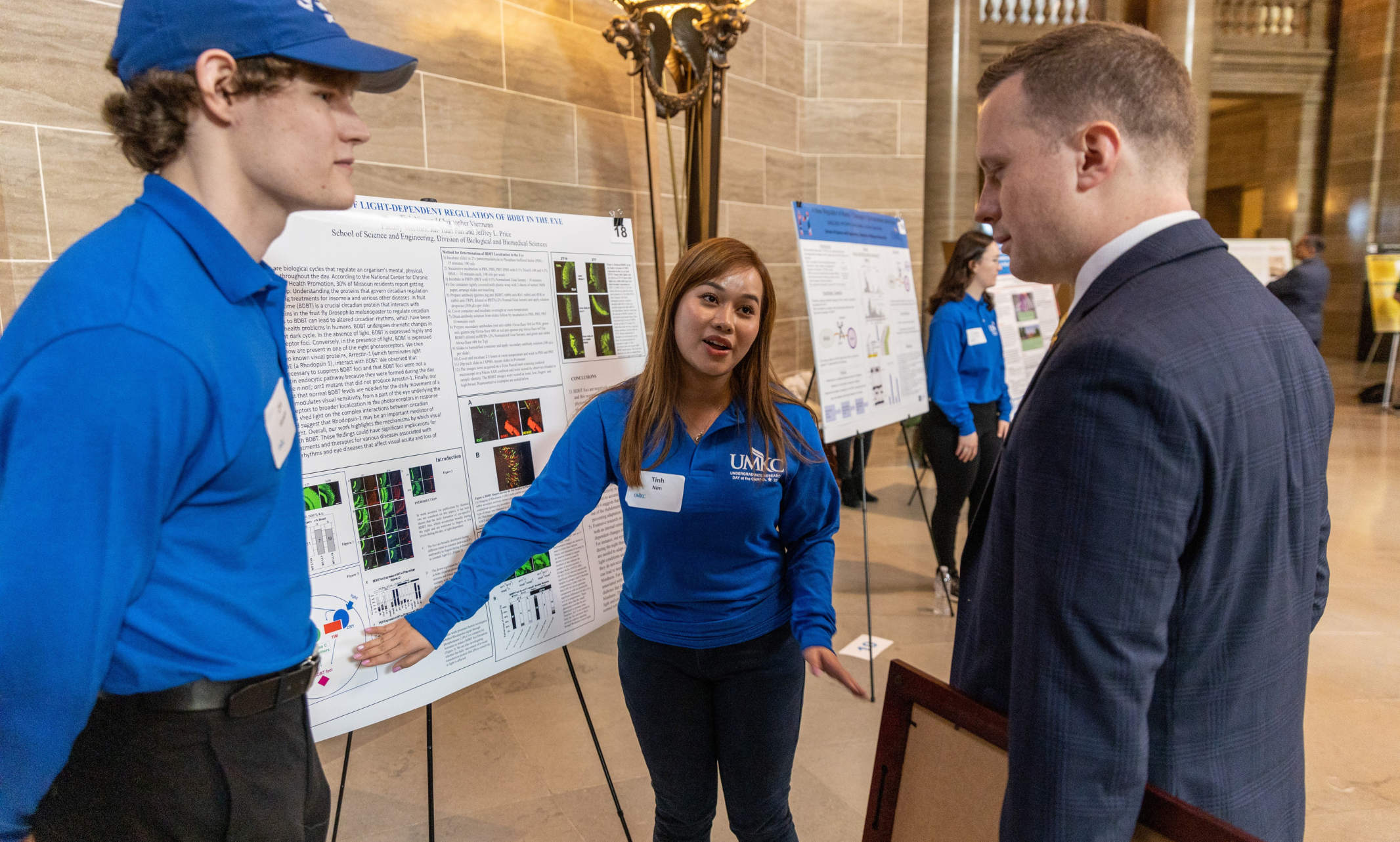
UMKC students who presented are from the Conservatory, School of Humanities and Social Sciences and School of Science and Engineering
A group of UMKC students presented their research on music therapy, childhood mental disorders, Missouri history and more in front of elected officials at Undergraduate Research Day at the Capitol.
The annual event highlights the unique research opportunities available to undergraduate students at all UM System schools in front of lawmakers and the general public.
Research: Diagnosis Differences in Childhood Mental Disorders
Zalyia Carr is a senior from Overland Park majoring in psychology.
As of 2022, 13% of Missourians have a cognitive disability, according to the CDC. Among children, accurate detection of mental disorders can lessen the result of prescribing unnecessary medications or being left untreated. Historically, Black children have been underdiagnosed and misdiagnosed due to a lack of representation in research studies. Pinpointing trends across demographics remains a challenge. Because symptoms display differently relative to white counterparts, Carr predicts that Black women and young girls have an increased risk for delayed diagnosis of common early childhood disorders. Carr is researching early appearances of mental disorders in Black females, because unaddressed issues can manifest to impair other aspects of their lives.
Research: The Clio App — Your Guide to the History and Culture Around You
Sarah Herndon from Lone Jack, Missouri, is a senior majoring in history.
Missouri is rich with history that reflects its impact on our nation’s growth. Herndon contributed over 50 entries to Clio, a free, nonprofit app created by UMKC David Townbridge that features more than 39,000 entries detailing the distinct types of history spanning across Missouri. The Clio app fosters conversation about the state’s history. Herndon’s entries are comprised of documents from the National Register of Historic Places, archived audio files and interviews and curated content based on subject matter. The app provides knowledge that can make Missourians more informed and engaged citizens.
Research: Music Therapy as a Nonpharmacological Treatment for Post-Stroke Depression
Hannah Edwards from Independence a senior majoring in music therapy.
Of the 8,000 Missourians that experienced a stroke in 2020, post-stroke depression (PSD) is a lingering effect for upwards as 30% of survivors, according to the CDC. The astounding effects on everyday living exceed lower quality of living, forgetfulness and heightened anxiety.
Music therapy helps rewire the brain, improve motor functions and regulate mood. Although music therapy has been used to address stroke recovery, research on using it to treat PSD is limited. Traditional recovery has entailed a pharmacological approach, however they have not been found as an effective alternative for complete remission.
In this research, Edwards discussed a clinical framework for using music therapy as a nonpharmacological treatment.
Research: A New Regulator of Ataxin-7 Cleavage in Spinocerabellar ataxia type 7
Lindsy Todd is a junior from Grain Valley, MO, majoring in biology.
Spinocerebellar ataxia type 7 (SCA7) is a disease of the nervous system that impairs the sending and receiving of messages between the brain and muscles. Individuals that inherit it experience the loss of motor function and blindness. Todd used an innovative method that successfully identified a regulator of the pathway causing SCA7. This research not only helps Missourians understand the effects of SCA7 but focuses on protein-protein interactions that contribute to the disease and possibly others. One interaction is with the deubiquitnase module (DUBm) which regulates protein levels in the body.
Her follow-up study tested the Ataxin-7 (ATXN7) pattern in the presence and absence of the regulator previously mentioned to determine its function and therapeutic possibility. Furthering this research could lead to treatments for SCA7.
Research: The effects of visual and circadian proteins on BDBT and of BDBT on visual proteins
Chris Viermann is a sophomore biology major from Lee Summit, MO, and Tinh Nim is a senior biology major.
Viermann and Nim observed Bride of Doubletime (BDBT), a protein produced from circadian rhythms, 24-hr cycles that impact a person's mental, physical and behavioral state throughout the day. The pair studied the effects of protein genes like Arrestin-1 and their relation to ninaE mutants, which plays a major role in light detection and vision. Both have been associated with eye disease. This research builds upon similar UMKC published works from 2013. This analysis of the biological “clock” impacts the future of health research conducted, as well as work efficiency spanning across Missouri. Bodily response to light impacts the level of alertness, response time, and energy regulation for individuals completing any task.
Research: Development of weed detection robot using deep learning
Suha Cho is a senior information technology major from Seoul, South Korea.
Cho’s research looks to generate Deep Learning (DL) techniques for a weed detection robot to help Missouri Farmers grow crops efficiently. The techniques are derived from image processing-based framework that will identify and classify weeds from crops. With this techno-efficient method for weed detection, it will result technological improvements in Missouri’s agriculture production, and allow the residents to have better green environments.
Research: Foxg1a regulates craniofacial development in the zebrafish
Nusaybah Ibrahim is a senior from Kansas City, MO, majoring in biology with a chemistry minor. Laylah Liwaru is a senior from Kansas City, MO, majoring in biology.
Nusaybah and Laylah used the zebrafish as a model to study the development of the jaw and how this relates to human development. Foxg1 is a gene that is critical for embryonic development. In particular, Foxg1 regulates the development of the forebrain as well as ear and eye formation. Foxg1 regulates cellular proliferation, differentiation and morphogenesis.
The research aims to help understand how the foxg1 mutation affects human development.
Research: Developing skills with big data: Colonel Greene’s antiphonal collection as a resource
Maah Kyi is a senior history and English major from Kansas City, MO.
Maah digitized, measured and recorded data from 12 volumes of antiphonals made in 1562. She also transcribed the lyrics of the Gregorian chants that were to be destroyed, but saved when Colonel Howard Greene bought them and brought them to the US in 1931.
The importance of inventorying the antiphonals is to make them accessible for research by musicologists, historians, and others invested in cultural heritage and eventually all of the antiphonals’ images will be uploaded in the CANTUS database.
Research: A secondary data analysis of the Child Obesity and Health Messaging Preferences among Missouri Policymakers (CHAMNP) study
Judy Vun is a senior nursing major from Kansas City, MO.
Enacting policy changes which promote nutrient-dense foods and daily physical activity can play an important role in addressing childhood obesity. Little is known how the framework and delivery of health messaging to policymakers influences the development of obesity-related policies.
Vun studied the inclusion of visual media in health policy messaging and how it may positively impact the promotion of child and obesity-related policies.
Apr 18, 2023
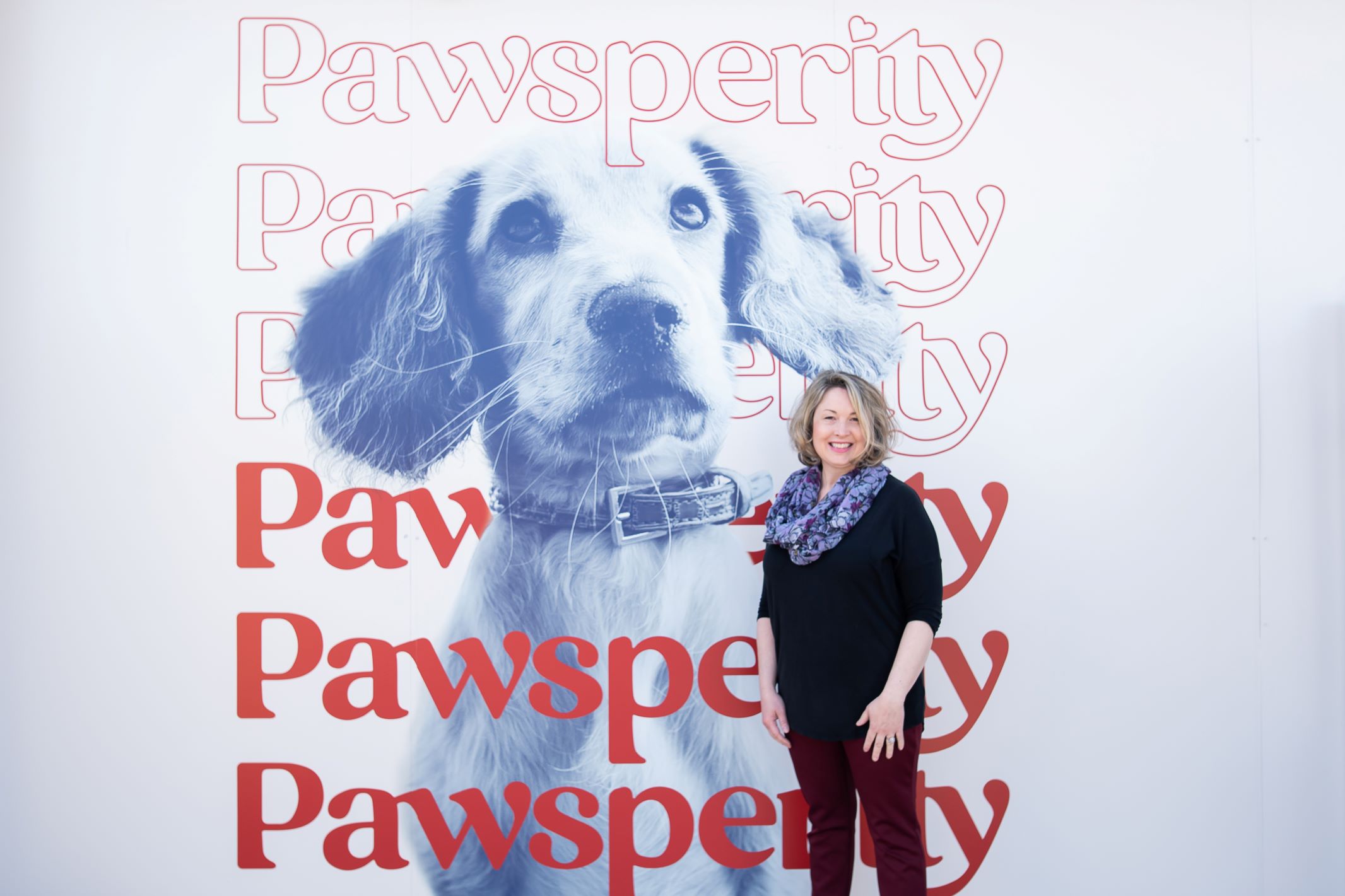
Public administration program, faculty fuel business success with Pawsperity
Natasha Herdman (EMPA '14) is the founder and executive director of Pawsperity, a nonprofit that trains and mentors single parents living in poverty to pursue living wage jobs. The organization's first job training program is in animal grooming.
Early in her career, Herdman lived in Washington D.C., and faced the challenges of finding affordable childcare.
“It was nearly impossible,” she said. “So, I quit my job and opened a childcare center in my home. To become licensed, I had to go through a lot of training in early childhood development.”
In this training, she learned about brain development and the importance of verbal stimulation on brain development and future reading levels.
“In addition, I learned that high school dropout and incarceration rates can be predicted by those reading levels.”
When she began working in homeless shelters, she gained more knowledge about the effects of neglect and abuse including dropping out of school, poverty, drug and alcohol abuse, prostitution and early parenthood.
“It was clear to me that poverty spanned generations and to break the cycle we needed to work with multiple generations at a time.”
Herdman started her executive master’s degree in public administration at the Henry W. Bloch School of Management knowing the challenges she wanted to address, but she had not formed a strategy yet. She began by researching programs that worked to help people get and keep good-paying jobs.
“I was clueless, but willing to help and learn, so I became friends with the clients we served,” Herdman said.
As she developed those relationships, her clients began to share the details of their lives and educate Herdman about the challenges of their situations.
“I would work to help homeless moms get full time jobs, only to learn they would lose housing, childcare and food subsidies because they were earning $10-$12 an hour,” Herdman said. “They’d end up quitting their jobs to go back on welfare so their kids could eat and have a place to sleep.”
As her professors allowed their students to choose their own topics for research paper and projects, she was able to tailor her assignments for a nonprofit business she wanted to launch, training single parents for specific in-demand jobs. That led to Pawsperity.
Pawsperity graduate at work in her salon
“As far as I know, we are the only nonprofit grooming school in the country,” Herdman said. “We are one of the few nonprofits that trains for a high-wage trade with social workers participating side-by-side with students and instructors.”
The money the organization earns through grooming supports each student’s $2,875 stipend.
“Most students are living on $3,500 a year while they are with us, so any little bit helps.”
Herdman’s focus and determination are paying off. Understanding the need to diversify revenue streams, Herdman has grown Pawsperity in big ways. She opened a market-rate grooming salon in Lee's Summit a few years ago. This salon is now completely staffed and managed by six program graduates.
Recently, Pawsperity launched two business in a new facility located near Troost Avenue. A dog daycare opened in February 2023, and a new market-rate grooming salon which opened in March. Profits from all three businesses feed the mission of the nonprofit grooming school. Over the next few years, the goal is for income from pet services to support 50% of the budget. Herdman anticipates that as the businesses grow, the number of families within the community that Pawsperity can help will also increase.
Herdman says her experience at the Bloch School was integral to Pawsperity’s success. Bloch taught her how to manage a nonprofit, read financial statements, build a team, partner with other nonprofits and most importantly, she says, it taught her how to focus, which ultimately led to her success.
“Originally, I planned to open a grooming school, childcare center and housing facility for students and their kids. In the EMPA program, my executive coach, Gene Dooley, suggested I pick one service, but not all three.”
Herdman says she cannot imagine her organization coming together without the support she received from her professors and classmates at UMKC, because she learned so much: how to write budgets for grants, how to conduct a program evaluation and why multiple revenue streams and earned income are so important.
“The greatest value of my education at Bloch was the access to my professors, including David Renz, Brett Never and Scott Helm, who helped me mold and shape the organization we have today.”
Apr 18, 2023
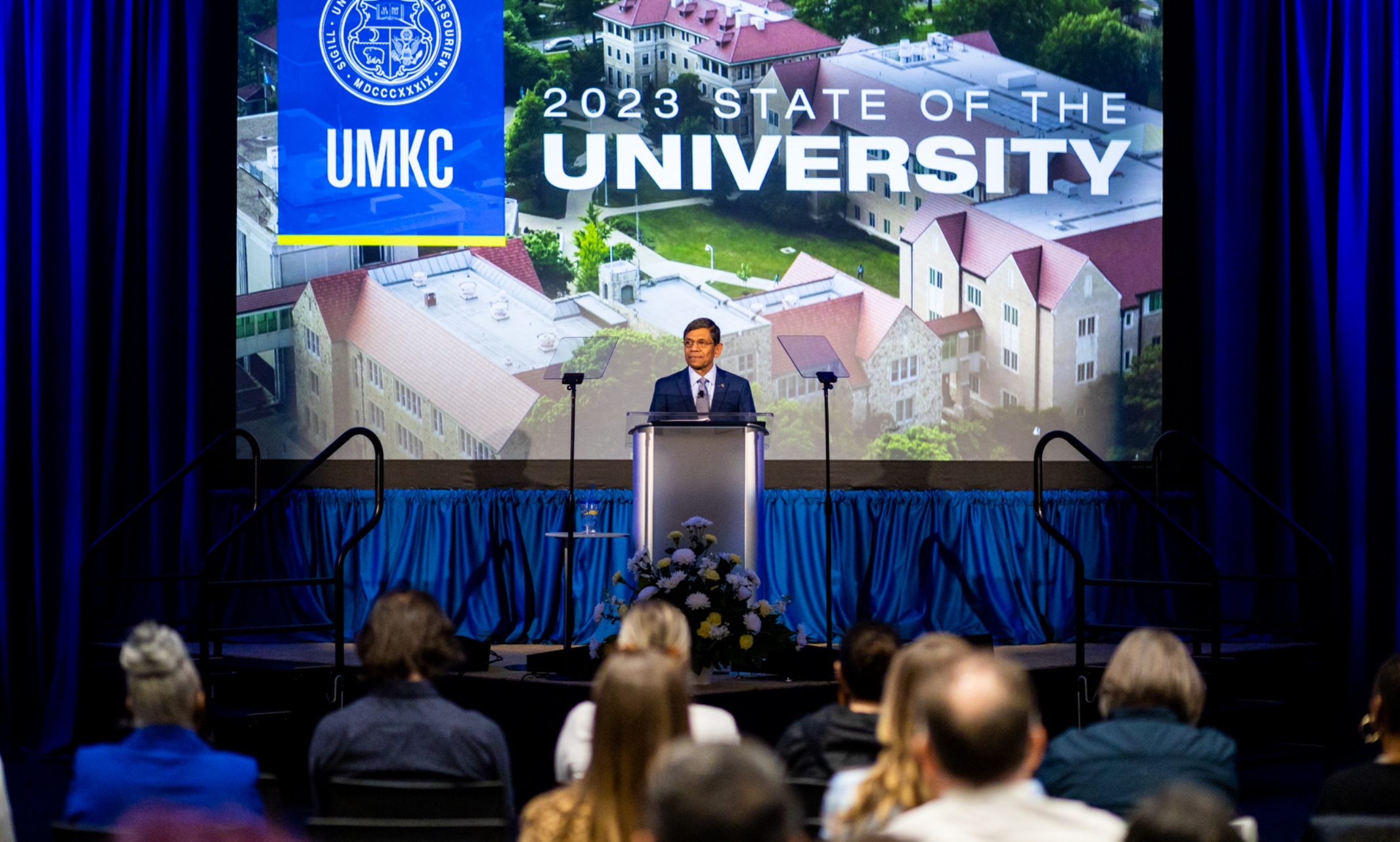
Chancellor announces student success, streetcar-stop expansion, new buildings, campus upgrades and research advances
Celebrating five years as the leader of the University of Missouri-Kansas City, Chancellor Mauli Agrawal delivered the annual State of the University on April 17 to students, faculty, staff and the community. In addition to recognizing student success, he announced news about new facilities development, campus upgrades and research advances along with other promising details about Kansas City’s university.
“We have real proof of what we are capable of, our successes and positive momentum – and people are paying attention more than ever before,” Agrawal said. “To quote a certain two-time Super Bowl-winning quarterback from Kansas City: ‘We’re just getting started.’”
1. Student success
UMKC achieved its highest retention and graduation rates in the past decade, successes that stemmed from new initiatives focused on propelling the academic achievement of students.
One of those, UMKC FirstGen Roos Scholars, provides a series of programming and supports for first-generation college students. As a result, scholars in this program outperformed the student body as a whole. Because of this wrap-around support and the determination of the students, the UMKC First Gen Roo Scholars, outperformed the entire UMKC student body as a whole in the fall of 2022 earning an average GPA of 3.26 and an 81% retention rate for the first year. Compared to other first gen UMKC students, who didn’t participate in the program, the Scholars achieved a 22% higher GPA and a 10% higher retention rate.
Success of the scholars program has led UMKC to be recognized as a First-Gen Forward Institution by the Center for First-Generation Student Success, which recognizes colleges and universities that have demonstrated a commitment to improving experiences and advancing outcomes of first-generation college students.
2. Streetcar-stop development
The university is making plans to capitalize on a new streetcar extension that will stop on the campus’s doorstep, at the intersection of Brookside and 51st Street in 2025. The university will begin exploratory work this spring that could turn vacant land near the proposed stop into a campus and community destination. The project could include a mix of retail, housing and a small arena perfect for campus events, concerts and athletics.
3. New buildings
UMKC has nearly acquired full funding for the Healthcare Innovation and Delivery Building, including a $40 million grant from the state, a $10 million federal grant plus a $30 million lead gift from the Sunderland Foundation and $15 million from the Hall Family Foundation. This building will bring much-needed relief to the schools of Dentistry and Medicine. Currently, architects are working on the designs, and the building should be ready in Fall 2026.
UMKC will soon break ground on a new School of Medicine building in St. Joseph, funded through federal and state dollars, that will house the UMKC program for rural healthcare already operating there. It’s on schedule for an opening in Fall 2025.
4. Campus upgrades
This summer, UMKC will open student recreational fields for soccer and a cricket pitch along Brookside, between Johnson Hall and 51st Street.
“We want students to be able to enjoy that greenspace until we determine final future plans for that university land,” Agrawal said.
Also, UMKC is close to being able to transform 51st Street from Cherry to Rockhill into a pedestrian-only corridor.
“I can just imagine the transformation: plantings and greenery, string lights, places to sit and gather,” Agrawal said.
Other renovations:
The university has invested $4 million in renovations at the UMKC Conservatory – transforming Grant Recital Hall, improving student practice rooms and more. This fall, Dean Courtney Crappell will reveal plans for further phased renovations and expansion of the Conservatory to meet future needs.
Work will begin this fall to house student-success programs in the Miller Nichols Library and Atterbury Student Success Center.
A new faculty lounge in Newcomb Hall in the fall of this year, a place where faculty can gather for discussion and engagement.
5. Research growth
UMKC is Kansas City’s only public research institution, creating new knowledge through discovery and developing game-changing innovations across the research spectrum. That benefits not only UMKC students, but the entire Kansas City metro area and beyond.
Agrawal committed to hiring additional faculty in FY24 to continue its stellar growth in the research enterprise.
One example: In the UMKC strategic plan in 2018, leaders set a 10-year goal of bringing in $85 million annually in total external awards. This year, five years ahead of schedule, UMKC has already blown away that metric, with more than $118 million.
“The recent exceptional research growth has elevated us to a level where I believe we are close to the R2-R1 cusp and can realistically envision attaining a Carnegie R1 status in the near future,” Agrawal said. The R1 designation would make it easier to hire additional excellent faculty and attract high-quality students. It also helps with national prestige leading to enhanced collaborations with other R1 institutions and more research funding.
UMKC is leading ground-breaking research – from the work going on at the Health Sciences Campus to Humanities and Social Sciences to the School of Science and Engineering.
Innovative research is what brought U.S. Secretary of Transportation Pete Buttigieg to UMKC in February. That’s where Buttigieg announced a new $10 million federal grant awarded to UMKC to develop innovative approaches to improve the sustainability and equity of transportation infrastructure.
At its meeting this month, the University of Missouri System Board of Curators will recognize researcher Rose Wang from the School of Dentistry for her work using AI and infrared technology to identify cancer risks in patients. She received a $430,000 developmental research grant from the National Institutes of Health to help develop this research.
Apr 17, 2023
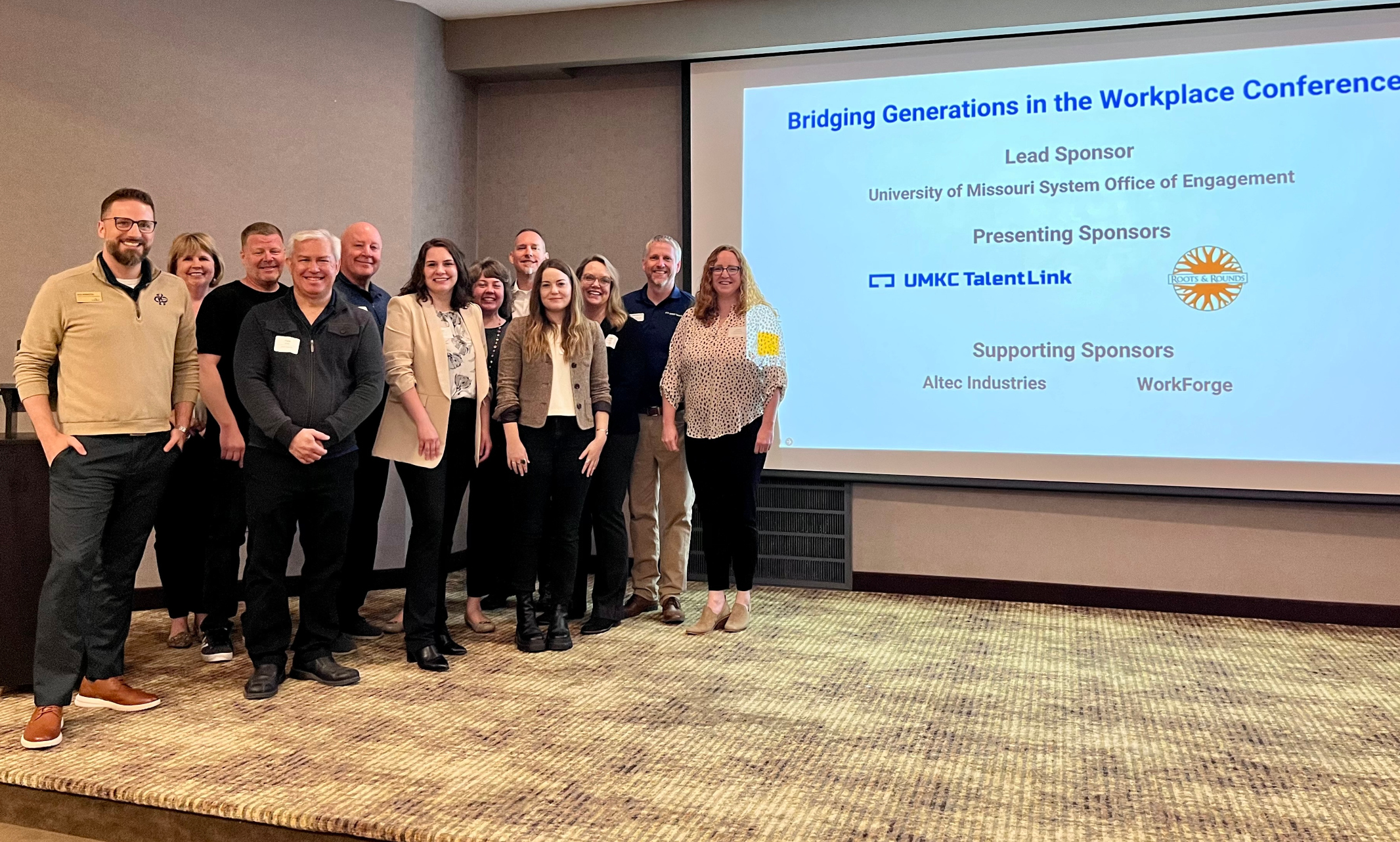
UMKC TalentLink sponsors workforce development conference in St. Joseph
The UMKC commitment to workforce development goes well beyond educating individual young professionals. UMKC TalentLink convened a panel of experts in St. Joseph for a discussion of how those recent graduates interact with older generations in the workplace.
The Bridging Generations in the Workplace Conference offered helpful workshop tools and takeaways to help managers lead and work with multigenerational workforces. The April 11 conference was held at the Stoney Creek Hotel.
The idea for the conference grew out of 2021 UM System Extension and Engagement Week programming. A statewide working group identified multigenerational communication as a significant workforce development issue.
Presenters included Erin Blocher, assistant teaching professor of management at the UMKC Henry W. Bloch School of Management; EAG Advertising and Marketing Chief Marketing Officer Jeff Randolph; and Christel Gollnick, founder Roots and Rounds, a nonprofit focused on respectful and inclusive communication across different age groups.
In workshops on Intergenerational Awareness, Communication and Employer Brand Strategy, presenters said coworkers from different generations in a shared workplace possess different communication styles, expectations, levels of experience, expertise and perspectives. They shared strategies for bridging differences while working toward a common goal by adapting to the ways different people work with others.
Apr 11, 2023
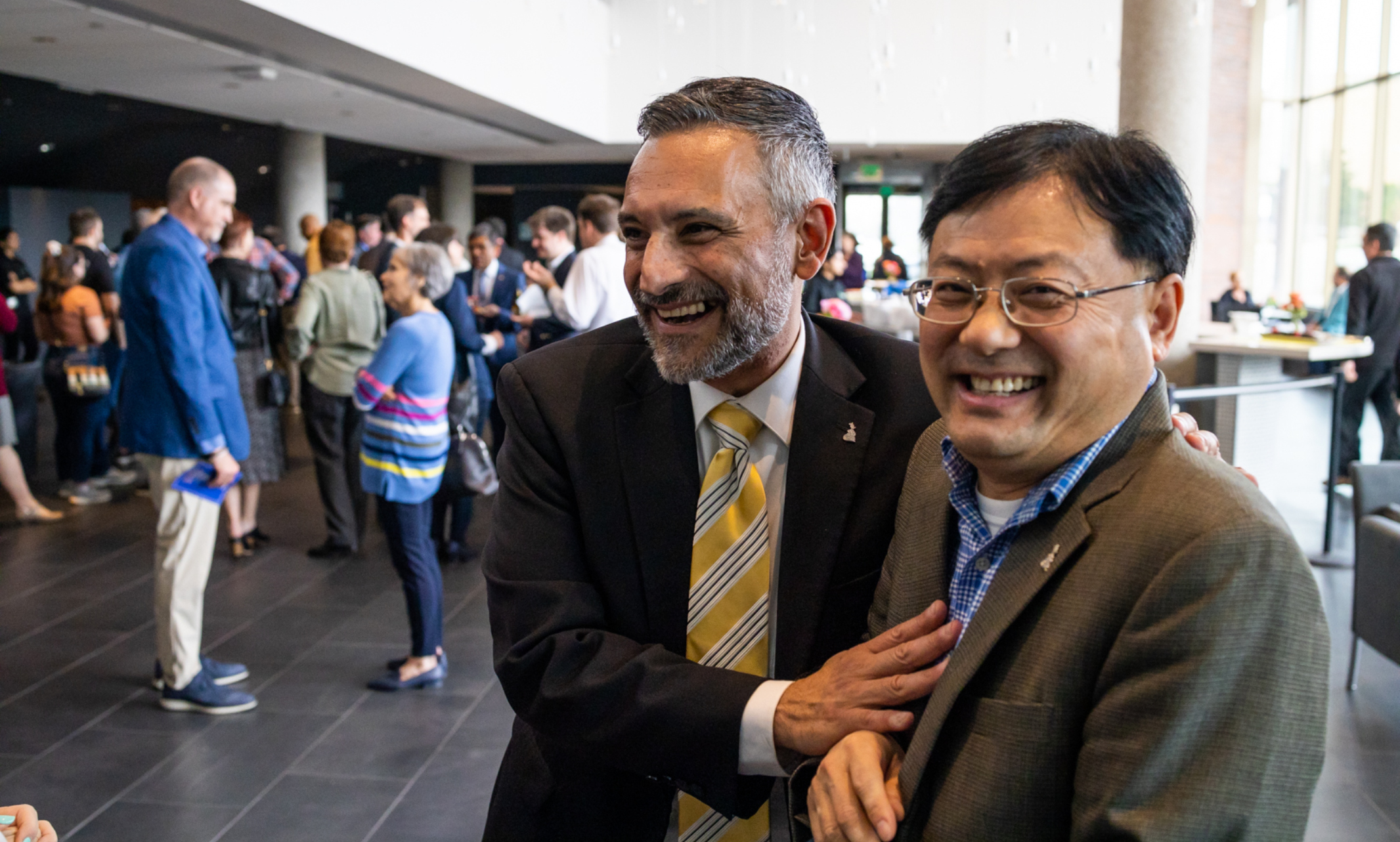
Annual awards program recognizes outstanding teaching, research and service
The University of Missouri-Kansas City celebrated the achievements, contributions and dedication of outstanding faculty at the annual Faculty Recognition Event April 4 at the Olson Performing Arts Center.
“Your contributions and success reach beyond the classroom, lab and stage,” said UMKC Provost Jenny Lundgren. “As involved as you are here on campus, you contribute to the community in a way that reflects our philosophy that we are ‘Kansas City’s university.’ ”
“In addition to your teaching and research, many of you have been the closest resource for a student who was struggling – either academically or personally,” she added. “We know that many students will look back and realize the value of your time and dedication. They will recognize that they couldn’t have done it without you.”
UMKC Chancellor Mauli Agrawal also spoke and praised all the award recipients.
“Our faculty are critical to the success of UMKC,” Agrawal said. “Just look at how we have been able to increase our research awards and how we have improved our student retention and graduation rates. To give you an idea – we have doubled our research expenditures to $53 million over the past four years and we anticipate that we will almost triple the annual external grants over this same period. We have the highest student graduation rates and student retention rates in more than a decade. Let us not forget that it is you, along with our staff, who has made this happen. Be proud.”
The faculty awards presented were:
The N.T. Veatch Award for Distinguished Research and Creativity
Masud Chowdhury, School of Science and Engineering
UMKC Trustees Faculty Fellowship Award
John Spertus, School of Medicine
Elmer F. Pierson Good Teaching Awards
Catherine Boles, School of Dentistry
Ryan Copus, School of Law
Emily Hillman, School of Medicine
Karen Landay, Henry W. Bloch School of Management
Provost’s Award for Excellence in Early Career Teaching, Tenure Track
Owen Belcher, Conservatory
Provost’s Award for Excellence in Early Career Teaching, Clinical and Teaching Faculty
Jessica Magaña, School of Science and Engineering
Provost’s Award for Teaching Excellence in the Mid-Career/Senior Career, Tenured Faculty
Candace Schlein, School of Education, Social Work and Psychological Sciences
Provost’s Award for Teaching Excellence for Mid-Career/Senior Career Faculty, Clinical and Teaching Faculty
Darla McCarthy, School of Medicine
Provost’s Award for Excellence in Mentoring
Yugyung Lee, School of Science and Engineering
Awards for Excellence in Mentoring Undergraduate Researchers, Scholars and Artists
Alison Graettinger, School of Science and Engineering
Paul Rulis, School of Science and Engineering
Jeff Rydberg-Cox, School of Humanities and Social Sciences
Chancellor’s Award for Embracing Diversity
Jennifer Waddell, School of Education, Social Work and Psychological Sciences
Gail Williams, University Libraries (posthumously)
Chancellor’s Award for Excellence in Community Engagement
Stefanie Ellison, School of Medicine
Joe Parisi, Conservatory
Chancellor’s Award for Exceptional Leadership
Gerald Wyckoff, School of Pharmacy
Chancellor’s Award for Career Contributions
Roger Sommi, School of Pharmacy
Apr 05, 2023
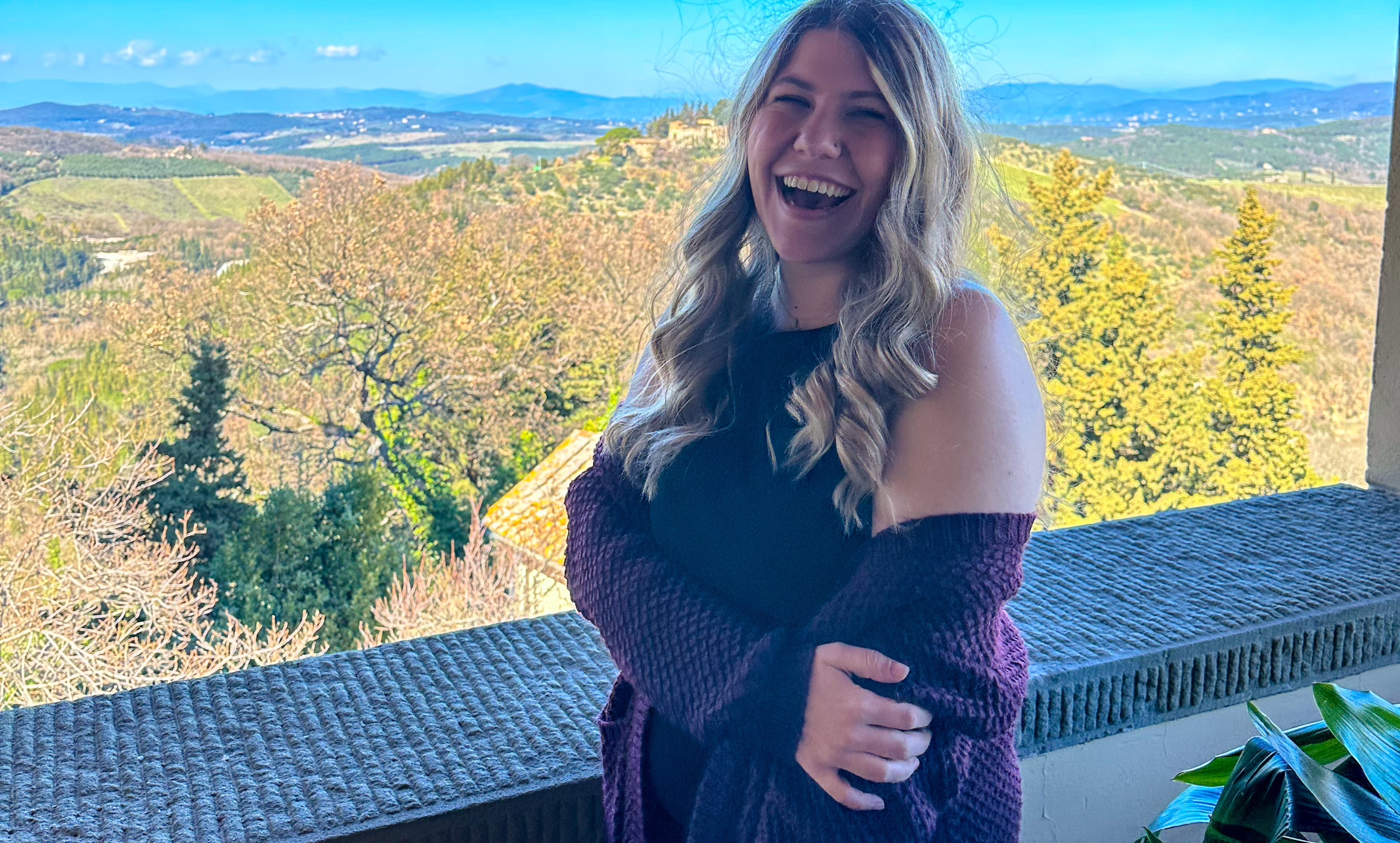
They earned scholarships from federal Gilman program providing foreign-study opportunities for lower-income students
Two UMKC students have received $4,000 federal grants to study abroad this year through the Benjamin A. Gilman International Scholarship program.
The congressionally funded Gilman Scholarship provides financial support to outstanding undergraduate Pell Grant recipients who, due to financial constraints, might not otherwise study abroad. For more information, visit the office of Study Abroad and Global Engagement.
Yasmeen Hanon will spend this summer at CIEE in Amman, Jordan. CIEE, formerly the Council on Student Travel, is a consortium of 32 U.S. nonprofits and cultural agencies promoting study- abroad programs. She will study international issues such as Arab-Israeli relations, regional conflicts, politics, international relations, environment and more.
Lilly Kamler is spending the current semester in Rome, studying business, communications, international relations and liberal arts at the American University of Rome.
“I am thrilled to be able to study abroad this summer in Amman, Jordan. I plan to do research and data collection for my undergraduate research projects,” Hanon said. “It will be a wonderful experience to study my area of interest, Middle Eastern politics, while also partaking in day trips and external research.”
Hanon, of Kansas City, is pursuing a double major in political science and environmental science, with an international studies minor and an anticipated 2025 graduation. She is currently working on two research projects.
“My primary project revolves around the analysis of factors that shape the perception of conflict in neutral western media sources,” Hanon said. “I constructed a dataset to analyze some factors and their presence in media. This summer, I plan to collect more data consisting of Jordanian newspaper sources so that I can conduct a similar analysis through the Jordanian perception of conflict. My second project revolves around analyzing the correlation between resource wealth and conflict in the Middle East and North Africa. I use case studies to research this topic.”
“This trip has provided me with the space to learn a new way of life. Without the support from the Gilman program, coming to Italy and exploring the world would still be a dream for me, not a reality.” —
Lilly Kamler, UMKC chemistry student
Kamler is a senior from Cuba, Missouri, majoring in chemistry with minors in psychology and business with plans to become an anesthesiologist assistant. She said her experiences in Rome will strongly impact her future health-care career.
“Since arriving in this beautiful city, I have had the opportunity to emerge myself into a culture other than my own,” Kamler said. “I have tried new cuisine, attempted to learn a new language, met people from all over the world and much more.”
While Rome has been her base, she has traveled to Venice, Florence and Riomaggiore in Italy, plus trips to London and Spain.
“Before my time in Italy is over, I will be visiting Pompei, Capri and Sorrento,” Kamler said. “This trip has provided me with the space to learn a new way of life. Without the support from the Gilman program, coming to Italy and exploring the world would still be a dream for me, not a reality. I will forever be grateful and thankful that I have had this opportunity.”
Apr 04, 2023
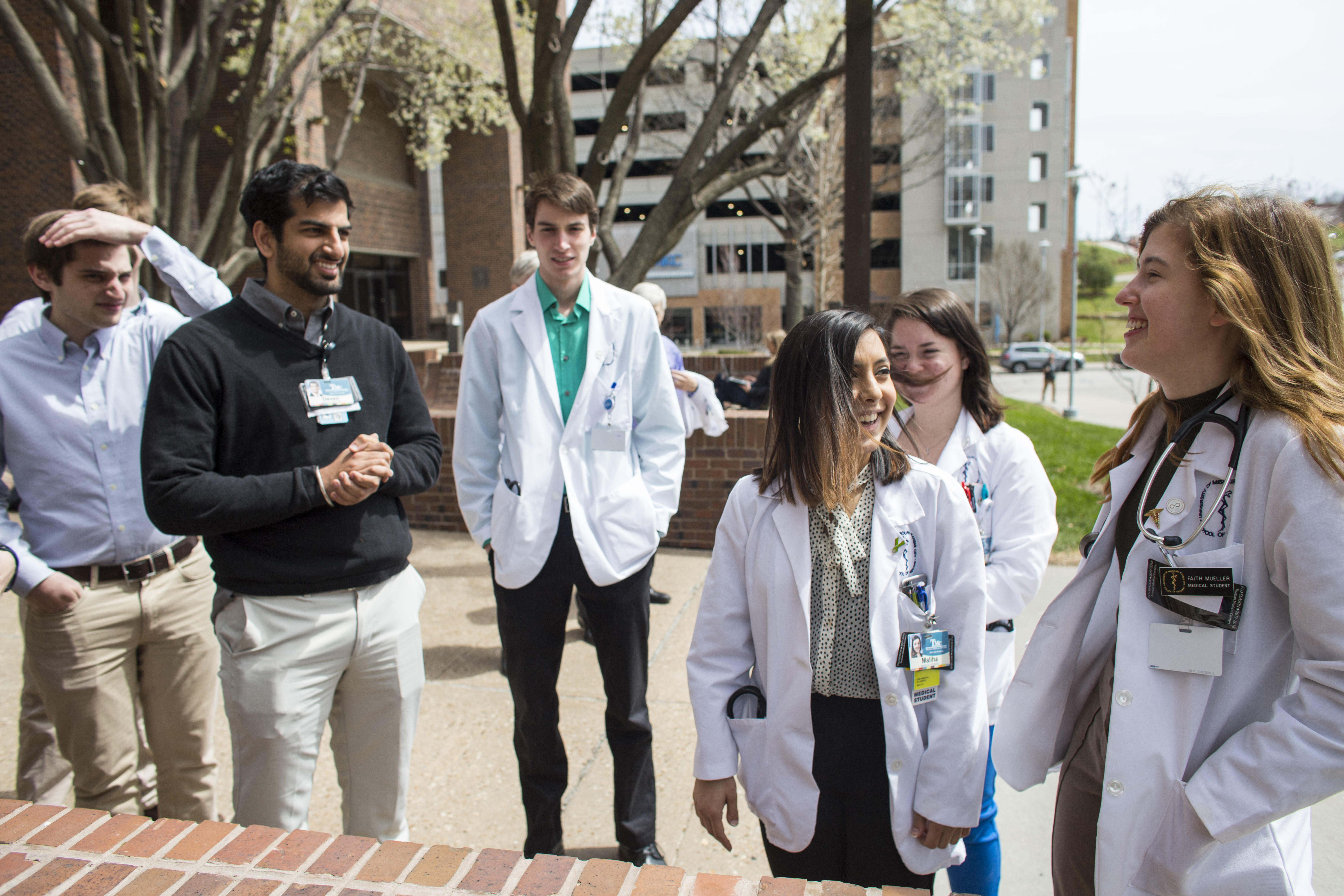
Leader will guide innovative six-year B.A./M.D. program, extensive research portfolio and further development of UMKC Health Sciences District
The University of Missouri-Kansas City has launched a national search for a new dean for the university’s acclaimed School of Medicine. The new dean will replace Mary Anne Jackson, M.D., who has announced her pending retirement from the deanship.
The new dean will lead one of the nation’s top urban-serving medical schools as it drives transformative change to improve and innovate medical education and health care in the region.
The UMKC School of Medicine has been an innovator in medical education since its opening in 1971, when it launched its unique and innovative six-year dual BA./M.D. degree program admitting students directly from high school. The school also offers a traditional four-year program for students who have completed an undergraduate degree.
The school has two campuses: one in Kansas City, Missouri, in the heart of the UMKC Health Sciences District; and one in St. Joseph, Missouri, where students receive a rich clinical education at a premier rural health system.
The next dean will be charged with shaping a broad strategy for the UMKC Health Sciences District. The district, formed in 2017, set its goal to become a premier academic health district, engaging in cutting-edge biomedical research and entrepreneurship, delivering state-of-the-science health care and educating the next generation of health-care professionals. Central to that strategy will be leveraging the potential of the forthcoming UMKC Healthcare Innovation and Delivery building, designed to serve as a catalyst for developing the Health Sciences District into a major regional academic medical center that can generate billions of dollars in jobs and economic impact for the Kansas City region.
Expanding the school’s research mission will be another important responsibility for the new dean. With more than 20 core faculty and 40 endowed professors and endowed chairs, the school’s research strengths include vision science, neuroscience, prenatal addiction, trauma/shock, maternal fetal medicine, cardiovascular and metabolic diseases, surgical safety and implementation science. The school has received more than $23 million in NIH-sponsored research in the most recent year.
Co-chairs of the search committee are Charlie Shields, President and CEO of University Health, one of the school’s clinical partners; and Kevin Truman, dean of the UMKC School of Science and Engineering. The full committee includes representatives from other clinical partners, faculty from the School of Medicine and other health professions schools in the UMKC Health Sciences District, School of Medicine alumni and UMKC medical students.
The national health-care leadership firm Isaacson, Miller is conducting the search. For more information, contact managing associate Nicholas Strand, 617-933-1913, nstrand@imsearch.com; or search coordinator Lileana “Lily” Sethares, 617-933-1889, lsethares@imsearch.com.
Mar 30, 2023
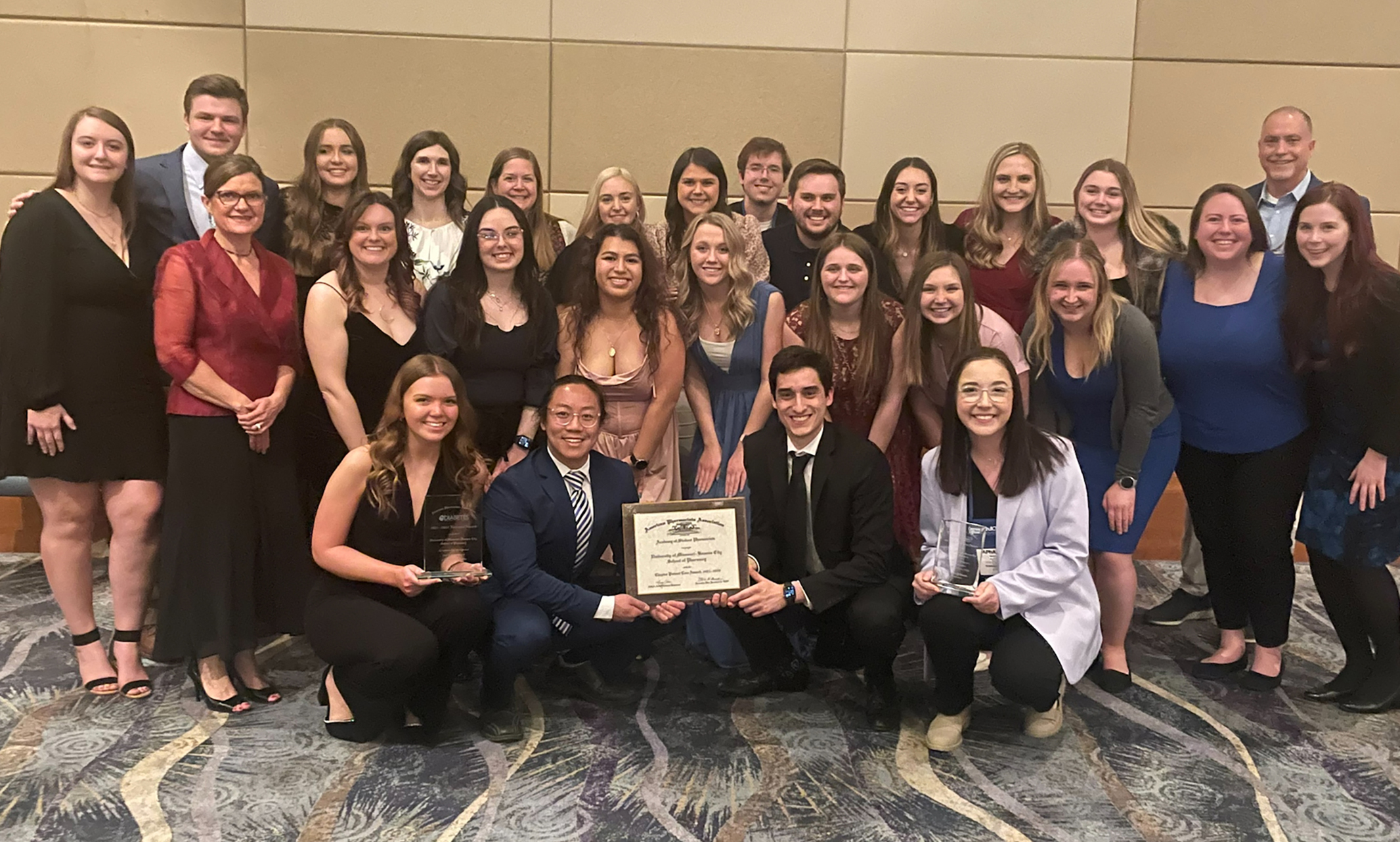
Student chapter of American Pharmacists Association recognized for its excellence in community engagement initiatives
The UMKC School of Pharmacy continues to draw national recognition for its excellence in developing programs that engage, educate and improve the health of the community it serves.
The American Pharmacists Association Academy of Student Pharmacists (APhA-ASP) selected its UMKC chapter from nearly 130 chapters across the country to receive the top national awards for the school’s local community engagement initiatives as well as a number of individual awards and recognitions, at a national meeting and exposition March 24-27 in Phoenix.
The school received the organization’s Patient Care Award for most outstanding local initiatives, the Over The Counter Medicine Safety Award that focuses on safe medication practices and the Operation Diabetes Award for efforts to raise awareness and reduce complications associated with type 2 diabetes.
“Many chapters only focus on the national initiatives, but not our crew,” said faculty advisor Cameron Lindsey, Pharm.D.
The awards acknowledge the combined efforts of students at the UMKC School of Pharmacy’s three campuses in Kansas City, Columbia and Springfield. They recognize pharmacy programs that excel in creating opportunities for student participation while raising the standards of leadership, professionalism, membership, patient care and legislative advocacy among student pharmacists nationwide.
Chapters are evaluated based on originality of their programs, the number of chapter members involved, impact on the community, benefits to student pharmacists and collaboration with other healthcare organizations.
UMKC received the Patient Care Award for student efforts in developing a ROOt 4 Health program that raises school-aged children’s awareness about healthy food and activity choices. The chapter also started Operation Self-Care, which strives to reduce the stigma around mental health and encourages good practices for wellness.
This was the second consecutive year that UMKC has received the No. 1 national award for Over The Counter Medicine Safety, based on students’ efforts to educate elementary, middle, and high school students about safe medication dosing and risks associated with over-the-counter medications. UMKC students also educate adults about safe dosing for children in their care.
As part of Operation Diabetes, students at all three of the schools’ campuses screened patients in rural, suburban and urban venues, and referred those found at high risk for further care.
“Our students never cease to amaze me with their innovative ways to reach patients where they are,” Lindsey said. “They continually provide health education, screening and vaccinations to audiences across our state from many backgrounds. This is on top of their busy academic and work schedules. They are an example to all of us to leave the world better than they found it. I am excited to see that their hard work is being recognized on the national stage.”
Lindsey also was honored with the Linwood F. Tice Friend of APhA-ASP Award, which recognizes an individual whose long-term services and contributions have benefited the APhA–ASP and student pharmacists in general.
Russ Melchert, dean of the School of Pharmacy and current president of the American Association of Colleges of Pharmacy, commended the school’s APhA-ASP chapter faculty advisors: Lindsey, Jordan Rowe, Kathryn Holt, Angela Brownfield, Sarah Cox, Brandi Bowers and Lisa Cillessen.
“Students clearly followed the excellent examples set by their mentors serving as advisors and all of our faculty and staff who assisted them in getting where they are,” he said.
APhA-ASP Individual honors and recognitions:
Allison Eppenauer, third-year student on the Kansas City campus, received the national APhA Student Leadership Award and an APhA Foundation Scholarship.
Hadia Malik, fourth-year student on the Kansas City campus, served on the APhA-ASP National Executive Committee as a member-at-large.
Karissa May, third-year student on the Kansas City campus, competed in the National Patient Counseling Competition.
Daphne Boggs, second-year student on the Springfield campus, served as chapter delegate to the APhA-ASP House of Delegates.
Alex Steury and Makaela David, second-year students on the Springfield campus, and Allison Eppenauer, third-year student on the Kansas City Campus, gave a platform presentation highlighting the chapter’s “Policy and Advocacy Literacy Certificate” that was a regional finalist in the Innovating Programming Award.
Megan Maetten, second-year student on the Columbia campus, presented a poster on “Evaluating student and graduate pharmacist perception of knowledge and confidence level when addressing topics related to the opioid epidemic at the UMKC School of Pharmacy.”
Faculty member Yifei Liu served as the APhA-APRS delegate to the APhA House of Delegates
Jordan Rowe presented a PharmTalk about “Lessons Learned Initiating an Interprofessional LGBTQ+ Clinic Providing Gender Affirming Care with a Safety-Net Health System.”
UMKC APhA-ASP Awards
2022 APhA-ASP Division A 2nd Runner-Up, National Chapter Achievement Award (Top 10 in the US)
2021 APhA-ASP Division A National Chapter Achievement Award (Top 4 in the US)
2020 APhA-ASP Chapter of the Year (No. 1 in the U.S.)
2019 APhA-ASP 1st Runner Up in Chapter Achievement (Top 7 in the U.S.)
2018 APhA-ASP Chapter of the Year (No. 1 in the U.S.)
2017 APhA-ASP 1st Runner Up in Chapter Achievement (Top 7 in the U.S.)
2016 APhA-ASP Chapter Achievement Award (Top 4 in the U.S.)
2015 APhA-ASP Chapter Achievement Award (Top 4 in the U.S.)
2014 APhA-ASP 1st Runner Up in Chapter Achievement (Top 7 in the U.S.)
2013 APhA-ASP Chapter Achievement Award (Top 4 in the U.S.)
2012 APhA-ASP Chapter of the Year (No. 1 in the U.S.)
Mar 30, 2023
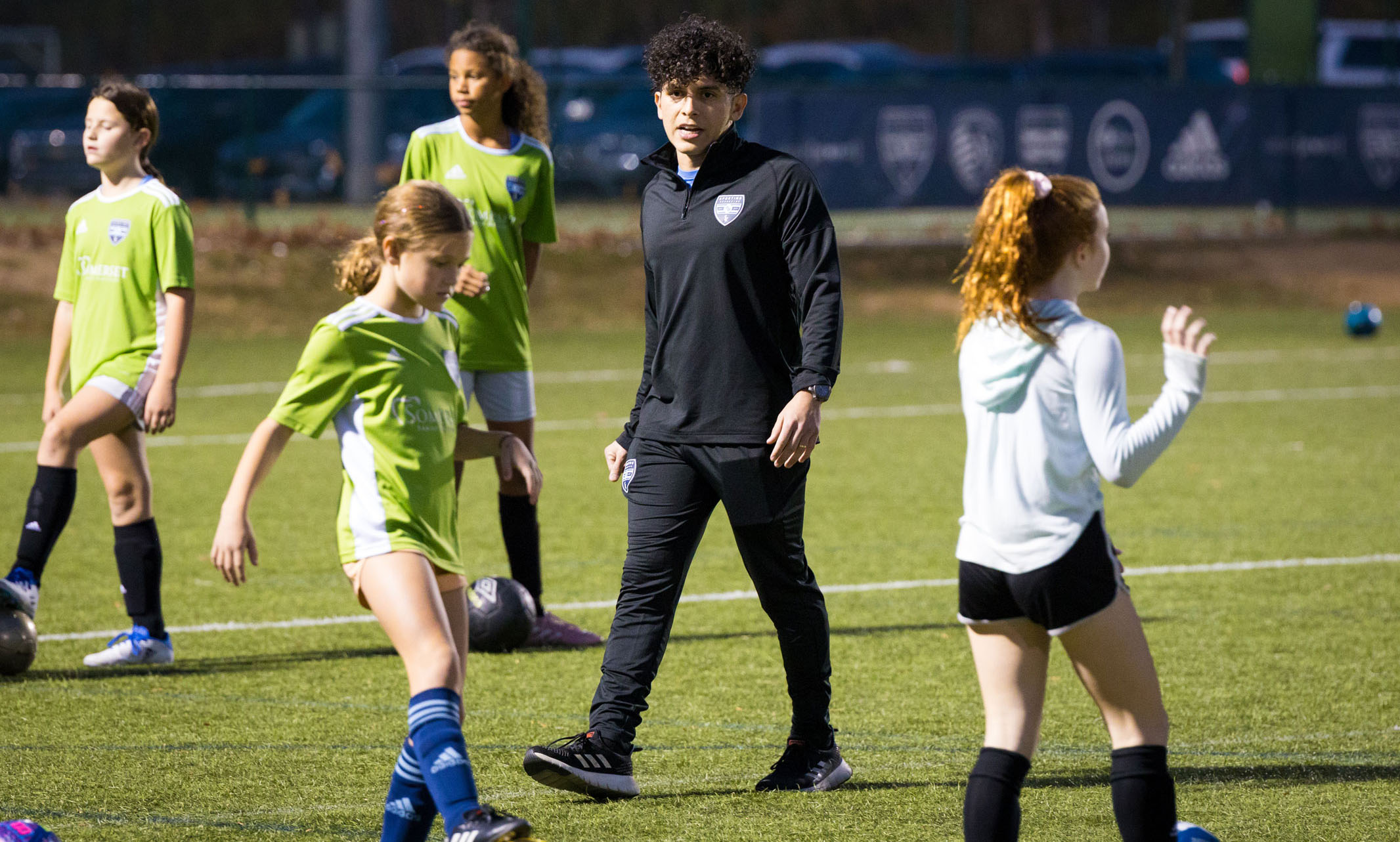
Dental student and soccer talent Edgardo Leiva needed coaches for his youth soccer business and his fellow students were the talent pool he needed.
Roos don't just dream, they do. Our students turn ideas into action every day. Get to know our people, and you'll know what UMKC is all about.
Edgardo LeivaAnticipated graduation: 2023Academic program: Doctor of Dental Surgery, UMKC School of DentistryHometown: San Pedro Sula, Honduras
Dental student Edgardo Leiva rose through the competitive ranks of soccer, from the Honduran National Team to college soccer in United States. His playing career came to an end as his career as a dental student ramped up. He soon transitioned to coaching in addition to his dentistry studies. His sought-after coaching skills were in such high demand that he formed his company, Soccer Roots, where he began hiring additional coaches, including many of his fellow dental students.
How did your soccer career begin?
I started playing competitively when I was 12 or 13, eventually participating in the developmental program for the Honduran national team. But the situation in Honduras became too difficult for my family, so my mom brought us to Miami, where my grandmother was living. When we first moved there, it was very difficult. My mom had to work multiple jobs.
What was your path to UMKC?
I played soccer at a couple of colleges in the Midwest, eventually landing at UMKC to play for the school’s soccer team. As my collegiate playing career was ending, I knew I needed to figure out something else to do. I always wanted to go into dentistry, but to do that I needed to put my focus on my academics.
What opportunities have come to you while at UMKC?
My academics really started taking off when I began working in the research lab of Ryan Mohan, a professor in the UMKC School of Science and Engineering. I met Ryan at a soccer camp where I was coaching his kids. Getting more involved in research really helped me focus on my academics but I always kept up coaching.
How did your coaching career develop?
I was coaching recreational teams for Sporting Brookside, a Kansas City soccer league. The league includes both recreational teams that are open to all and a competitive side where players try out to participate. The parents liked the structure of my recreational practices and were interested in me providing additional coaching to their kids who wanted to transition to the competitive side. That’s when I started my company, Soccer Roots, which now oversees the Elite Program within Sporting Brookside for players interested in additional training to help them continue to the higher levels of the sport.
How have your fellow dentistry students helped with that?
The workload grew to where I had seven teams. On the weekends I would coach 15 games, but it was getting out of hand. I started with hiring our class president and a close friend of mine, Morgan Engelbrecht, to help with the admin side of things. Also, I always need coaches, and I was meeting dentistry students who had soccer experience, even a few who played at the collegiate level. I thought, what better people to coach these kids than my friends in the dental school? I’ve had as many as 14 coaches on my payroll, with eight being dentistry classmates.
How has soccer shaped you as a person?
I’m so grateful to soccer because I would not be where I am now. It provided me a pathway to becoming a dentist by molding my character. It taught me discipline, responsibility and how to work hard. I owe soccer a lot, and I’ll always be involved in the sport.
How did the structure of coaching help you in your academic pursuits at UMKC?
When you’ve been in soccer for so long, teaching someone to kick a ball is not something that comes naturally. You have to think back on how to dissect the process to be able to teach it. It’s the same in academia, where you learn the process and are able to dissect everything you learn.
What can you take from soccer that will help you as a dentist?
Playing soccer -- and especially coaching -- has helped me in dealing with my patients. Dentistry is basically coaching. We coach our patients to keep good oral hygiene and teach them the skills to achieve that.
Do you have any plans to incorporate soccer into your dentistry career?
One of my goals before I graduate is to create a nonprofit soccer camp that incorporates oral health. I’m coordinating with the pediatrics department at the UMKC School of Dentistry, where we would offer free soccer camps. One of the rotations is going to be an oral health screening. Ultimately, I would like something that connects my two passions while making an impact on the next generation.
Why is it important for students to cultivate interests outside of the occupation they’re working towards?
It’s important to have balance. I learned from one of my mentors that you can’t just look at teeth all day. You’ll be so much more fulfilled when you’re engaged in things you’re passionate about.
Mar 28, 2023
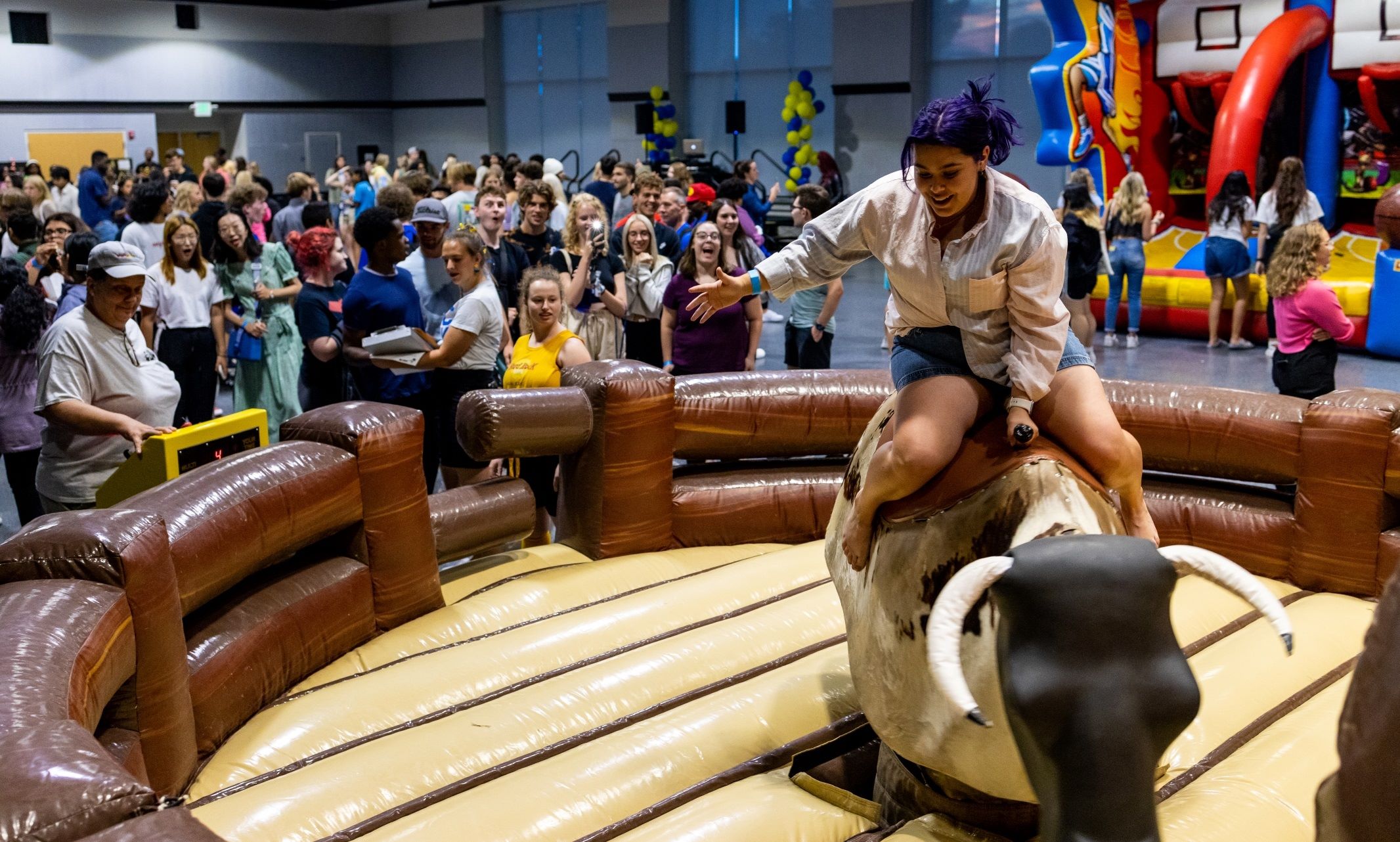
She’s part of UMKC Professional Career Escalators in the business track
Roos don't just dream, they do. Our students turn ideas into action every day. Get to know our people, and you'll know what UMKC is all about.
Ariela LaraAnticipated graduation year: 2026UMKC degree program: engineering and business track, Professional Career EscalatorsHometown: Ozark, Missouri
Ariela Lara, a first-generation college student emerging from the foster-care system, arrived on campus with no idea what to expect, or what was expected of her.
That changed quickly though, thanks to her participation in the Professional Career Escalators program at the University of Missouri-Kansas City. It’s a comprehensive career-development program designed to propel students from their academic studies to high-paying careers by providing a dedicated, GPS-guided path from enrollment to career success.
“Here at UMKC, they really care about you being able to succeed,” Lara said. “There are so many resources to help you. I really benefit from having a mentor to help me not only navigate college, but help me understand how I can be successful in my career. And the program really helps you make connections.”
The Professional Career Escalators program provides students with a unique, trademarked system of personalized support and services, preparing students for careers in four key areas of workforce demand: law and justice, engineering and business, education and health care.
Each semester, students participate in the five Professional Career Escalators core experiences: career guidance and development; experiential learning opportunities (such as job shadowing and internships); mentoring with faculty experts and community professionals; graduate and professional school preparation; and leadership development.
The program is helping Lara narrow her focus.
“Business is such a broad field, and it can be hard to narrow down to what you really want to do,” she said. “I wanted to go into a program that would let me be creative, but I didn’t want to go into the arts. In high school I took a business class, and I joined DECA (formerly Distributive Education Clubs of America). I realized that I was good at it, and I loved it. And as I started to learn more about business, I fell in love with marketing.”
How has your college program inspired you?
Seeing so many people working so hard to be successful really motivates and inspires me to want to be that way and do that.
Since entering college, what have you learned about yourself?
That I am more ambitious than I thought. All I can think about is how much I want to succeed, and that I will do anything I have to.
What are your feelings about being a first-generation college student?
It is something I am immensely proud of. I am the first in my family to explore this realm. They never had this opportunity.
Do you have any scholarships?
Coming from the foster-care system, I am paying for all my college costs. I have been fortunate to be able to receive many scholarships for this year and they mean a lot to me. I worked really hard in high school to be able to receive scholarships.
What other extracurricular activities are you involved in at UMKC?
I am in First Gen Roo, Bloch Ambassadors, Bloch Launchpad and Enactus.
Mar 28, 2023
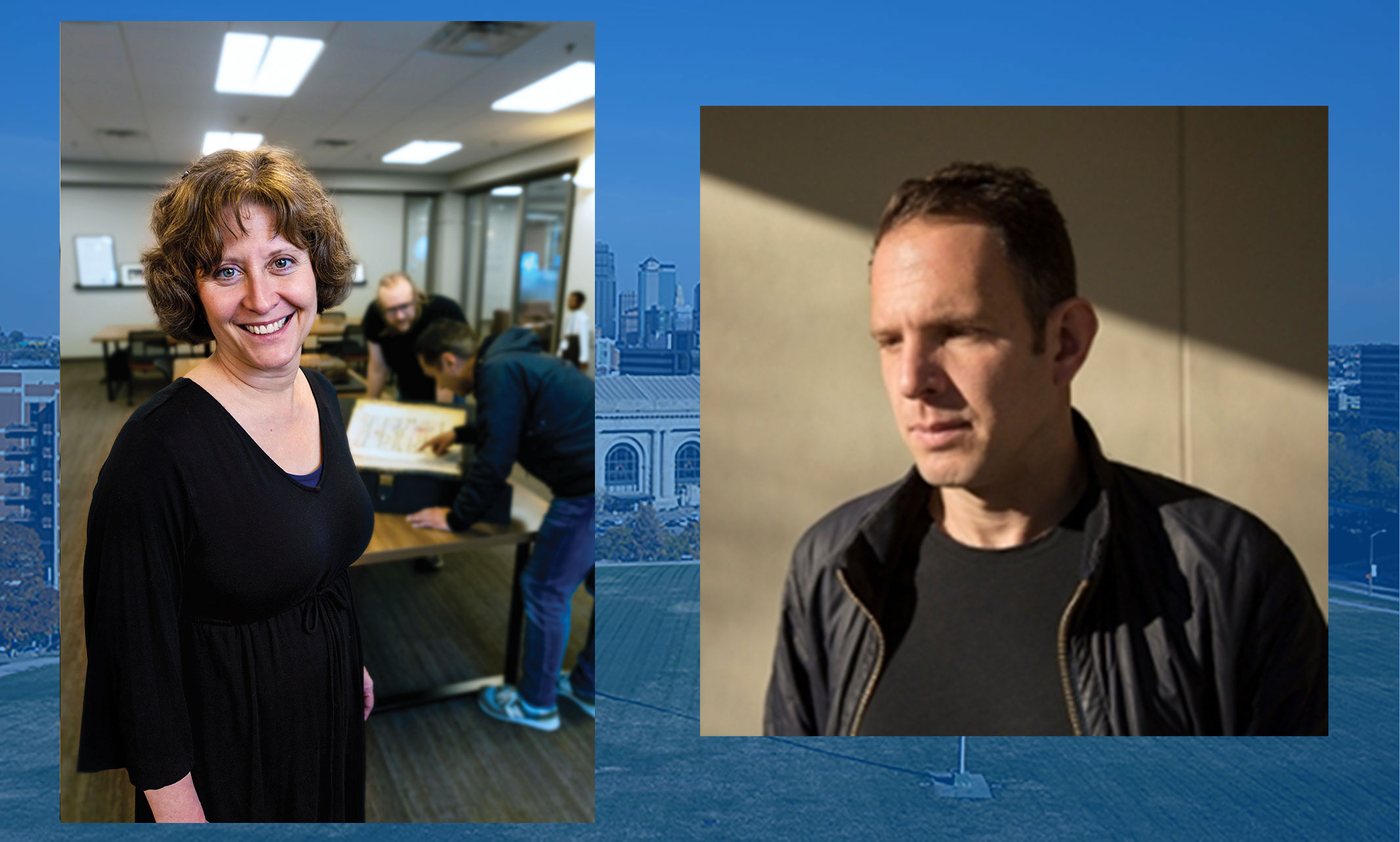
Blanton and Haber to spend research year abroad
Two UMKC faculty members have been selected to work abroad as Fulbright Scholars for the 2023-24 academic year.
Virginia Blanton, Ph.D., Curators' Distinguished Professor, will go to the Ruusbroec Institute in Antwerp, Belgium, to research English nuns who sought refuge in Catholic Flanders during the Reformation.
Yotam Haber, D.M.A., associate professor of music composition in the UMKC Conservatory, will go to the Jerusalem Academy of Music and Dance in Israel to further develop the cross-fertilization of his creative work with traditional Jewish liturgical cantillation practices.
The Fulbright Program, the flagship international academic exchange program sponsored by the U.S. government, has fostered mutual understanding between the United States and other countries since 1946. The Fulbright U.S. Scholar Program sends American scholars, artists, faculty and professionals abroad to lecture and/or conduct research for up to a year.
Blanton has had a long-term research focus on medieval women and their relationship with books. In Antwerp, she will focus on the Birgittines of Syon, a wealthy and influential community near London, who refused Henry VIII’s directive to close their community and went to Flanders.
“They cultivated and circulated devotional reading material, and yet no one has investigated Belgian repositories for their lost books or for evidence of their time in Antwerp and the surrounding region,” Blanton said. “I will be working in various archives and libraries across Flanders to identify books and other materials, as well as organizing a series of workshops that will bring together researchers who focus on Birgittines in Sweden, England, Belgium, Italy, Spain and beyond.”
“One of my career goals was to secure a Fulbright to a multilingual country, and Belgium – where there are speakers of Dutch, French, German as well as multiple other immigrant languages – is ideal,” she said. “I was a French major in college and my daughter attends a French-immersion school, so it was important that I seek out an opportunity where we could be immersed in a culture that is not primarily Anglophone.
“I am incredibly grateful for this opportunity, and I look forward to representing UMKC in my time abroad.”
Haber was born in the Netherlands but grew up in Israel until the age of 5, when his family relocated to Africa.
“Most of my family is in Israel, and I have visited many times for short periods since my childhood, but have never stayed for an extended period,” Haber said. “For the last decade or so, I have been focused on writing music that intermingles Italian Jewish liturgical practices with my own contemporary musical voice. This fascination with Italian Jewish traditions, rather than ‘straight from the source,’ is born from my own nomadic existence. The Fulbright allows me to finally spend time in Israel, learning about how those liturgical cantillation practices originated. In addition, I am excited to immerse myself in the new music community of Israel.”
“I am honored to receive this award,” he said. “I’m very curious to engage with composition students in Israel and learn about the cultural, political, religious and other factors that drive and inspire them.”
Mar 23, 2023
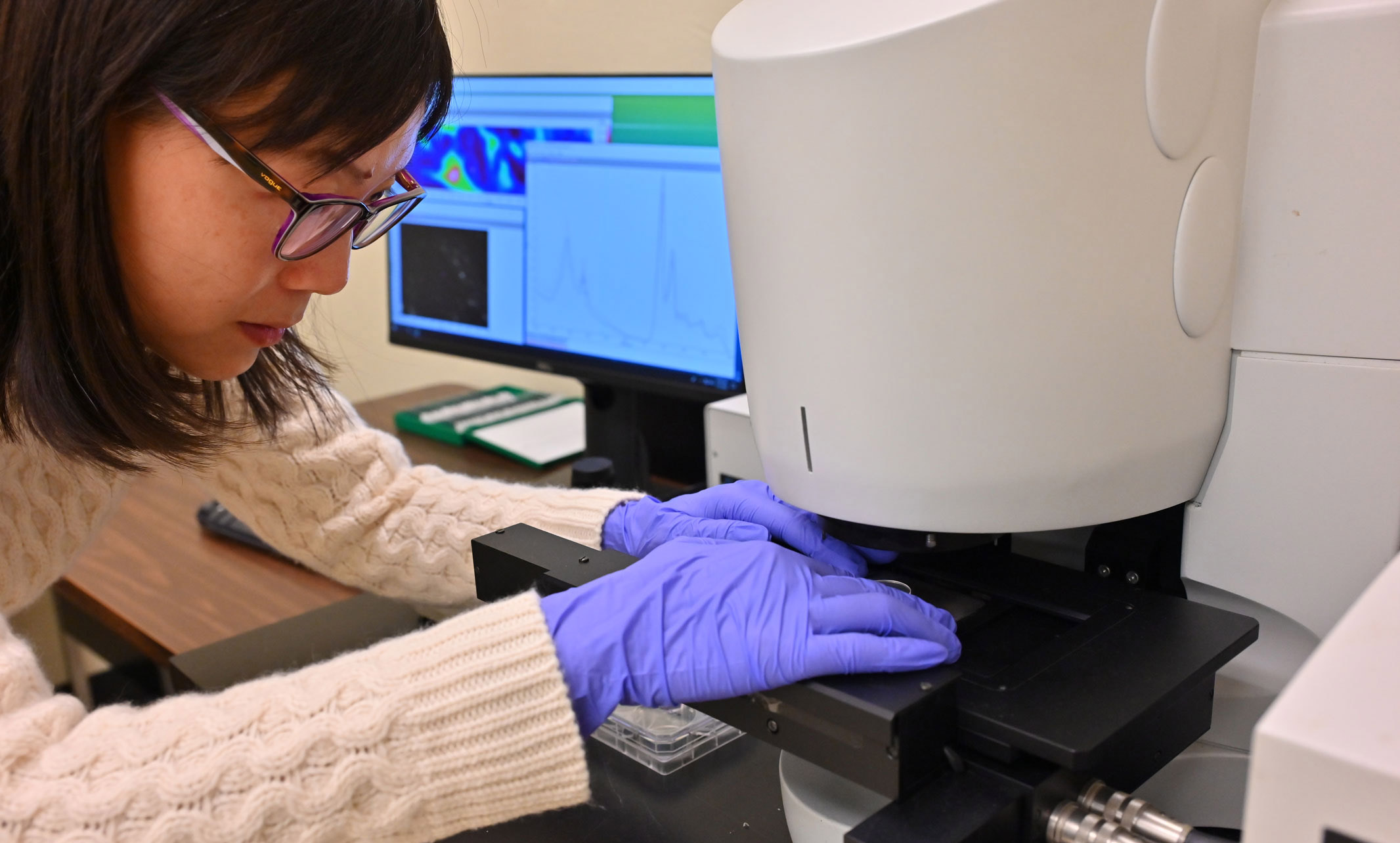
Rose Wang’s research received grant funding from the National Institutes of Health
The traditional tissue biopsy method of cancer diagnosis has been around for more than 50 years. The method finds the presence of cancer, but frequently too late to treat it successfully.
As a researcher at the University of Missouri-Kansas City School of Dentistry, Rose Wang, Ph.D., focuses on establishing a system to identify the risk of cancer through artificial intelligence and infrared technology. She is confident that this method, designed to intercept precancerous lesions before they become a deadly form the disease, can be applicable to other forms of cancer as well.
The scientific community has taken note of the promise behind Wang’s research. She received a $430,000 developmental research grant in January for her innovative research from the National Institutes of Health (NIH).
“We’re not trying to diagnose cancer itself,” Wang said “We are creating a system to detect high-risk precancers and to prevent them from becoming cancer. If we’re able to detect it early on, there’s more we can do about it, and the treatment is more effective. I’m very excited about that.”
Wang is studying the application of artificial intelligence, such as machine learning, to analyze the biochemical data from tissue samples using infrared spectroscopic imaging, a device that provides higher dimensional data than traditional imaging methods, such as a microscope. She uses both specialized software and open-source computer programs to train machine learning models to extract the most important information from what the spectroscopy shows. The level of detail is immense, with each pixel providing thousands of variables across different wavelengths.
“Manually reviewing the data is almost impossible,” Wang said. “that’s why we need to use machine learning to extract the important information and to train models for automatic risk stratification.”
Wang has pulled together an impressive research team from not only the UMKC School of Dentistry, but also the UMKC School of Science and Engineering as well as the University of Kansas Medical Center. Her multidisciplinary team covers a wide range of expertise: infrared spectroscopy and imaging, clinical pathology, artificial intelligence, oral biology and cancer biophysics.
The current gold standard for cancer detection is the histopathological diagnostic approach, cutting tissue sample for a biopsy. The sample is then sent to a pathologist to be visually evaluated for the presence of cancer. "Pathologists spend years to train their eyes to see those morphological anomalies and say cancer or no cancer,” Wang said.
The pathologist looks for what is called morphological changes of cells and tissues. Unfortunately, these changes don’t show up until the cancer is already progressing. According to Wang, the problem is that 70% of all oral cancers are diagnosed at late stages, leading to a low 50% survival rate at the five-year mark.
Precancerous lesions are not cancer but have increased risk of becoming cancer. According to Wang, pathologists don't yet know how to differentiate which precancerous lesions, known as dysplasia, will transform into cancer. Sometimes the cells just stay in the precancerous state without becoming cancer. If the pathologist finds mild or moderate abnormalities, frequently clinicians will opt to observe the problem area over time.
"But what if the patient did come back in a year and suddenly they have cancer from even mild dysplasia?" Wang said. "Right now, there is no reliable way to determine which precancerous lesions will become cancerous."
The other issue is the subjectivity of the traditional process. Wang said two well-trained pathologists can provide different diagnoses for the same tissue biopsy.
“The system we are developing will provide objective and quantitative diagnostic information and facilitate clinicians to make better management plans for their patients,” Wang said. “Oral cancer survival is highly stage-dependent, and early detection can significantly improve patient survival rate. If we can catch them early, we can save lives.”
Mar 23, 2023
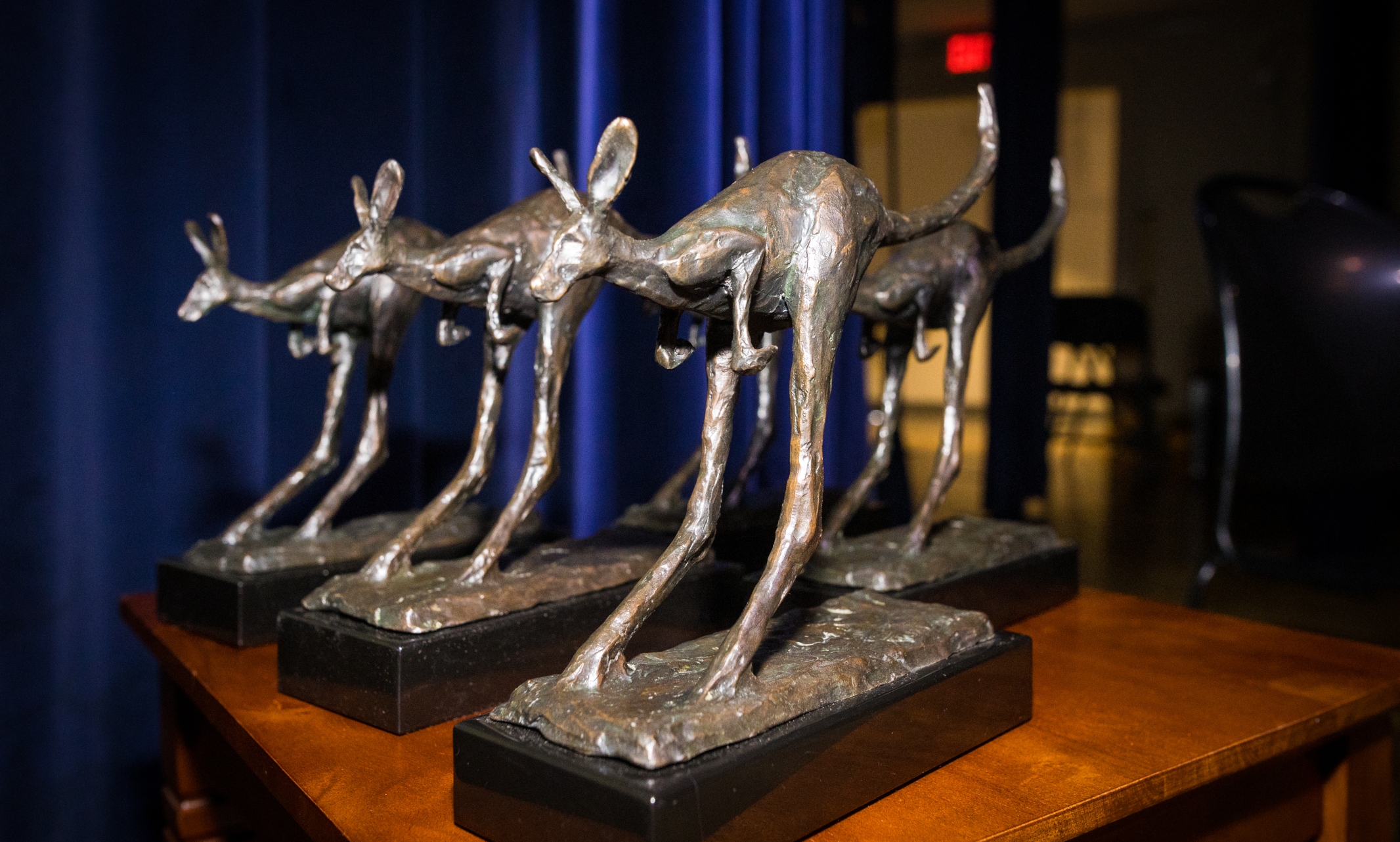
15 alumni and one family honored
The University of Missouri-Kansas City Class of 2023 Alumni Achievement Awards ceremony celebrated and recognized the accomplishments of UMKC alumni.
In addition, the ceremony generates funds to supports student scholarships. In the last decade, the Alumni Awards event has garnered more than $1 million in scholarships and immediate student aid for UMKC.
“I am always excited for the Alumni Awards because they recognize hard work, dedication and resilience,” Chancellor Mauli Agrawal said. “No one achieves this level of success without tenacity – and excellent preparation. It’s an honor to recognize our alumni’s achievements, and it’s always a joy to be with you for this event.”
Alumnus Sean O’Brien, (J.D. ’80) was recognized as the Alumnus of the Year. He received the highest honor bestowed by the UMKC Alumni Association for his career of freeing the wrongly convicted. After directing the Missouri Capital Punishment Resource Center for 15 years, he returned to UMKC as a visiting professor and later became a full professor. He credits his education at the UMKC School of Law for providing the foundation for his success.
“UMKC School of Law prides itself on producing practice-ready lawyers, and that was true in my case.”
Complete list of awardees:
Alumnus of the year: Sean O’Brien (J.D. ‘ 80)
Bill French Alumni Service: Patricia Macdonald (B.L.A.)
Defying the Odds: Rev. Carl Moore (B.M.E. ’68)
Spotlight Award: Bruce Bubacz
Legacy Family: The Accurso Family
School of Biological and Chemical Sciences*: Beth Harvill (Ph.D. ’95)
Henry W. Bloch School of Management: Ramin Cherafat (MBA ’02)
School of Computing and Engineering*: Ken Gerling (B.S.C.E. ’91)
Conservatory: Charlie Corcoran (M.F.A. ’01)
School of Dentistry: Cesar Sabates (D.D.S.’87, A.E.G.D. ’88)
School of Dentistry-Dental Hygiene: Heather Samuel (B.S.D.H. '90, M.S.D.H. '91)
School of Education*: Chris Brown (Ph.D. '93)
School of Law: Scott Bethune (J.D. '88)
School of Medicine: Arif Kamal (B.L.A., '04, M.D. '05)
School of Nursing and Health Studies: Shweta Palakkode (B.H.S. '15)
School of Pharmacy: Craig Norman (B.S. '83)
If you were unable to attend the event, but would like to donate to student scholarships, contributions can be made online.
*Nominations were collected before UMKC Forward realigned academic units. Next year, awardees will be named in their new academic units: School of Science and Engineering, School of Humanities and Social Sciences and School of Education, Social Work and Psychological Sciences.
Mar 23, 2023
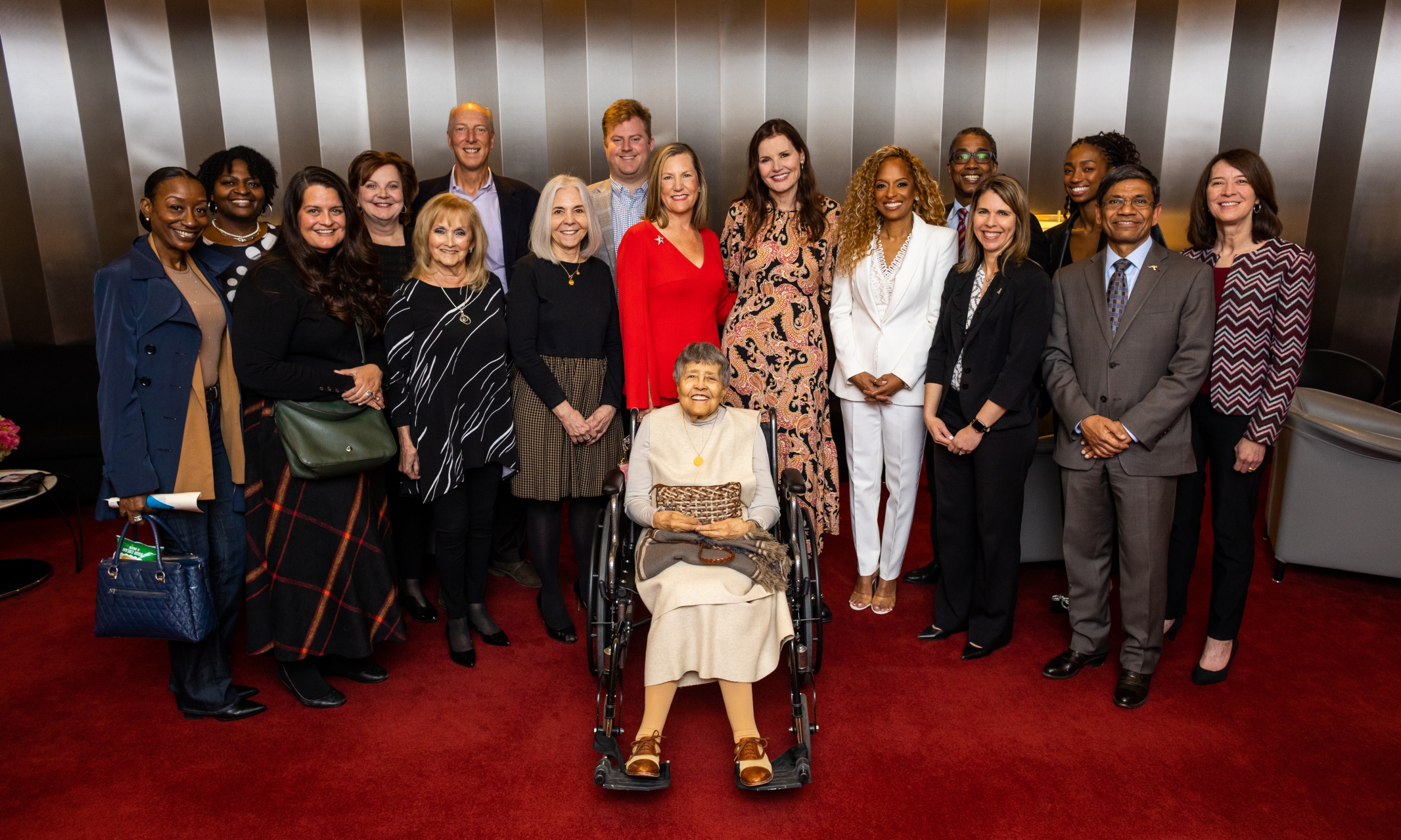
Speaker celebrates the work of women at induction ceremony
The University of Missouri-Kansas City welcomed Geena Davis, actor and founder of the Geena Davis Institute on Gender in Media at this year’s Starr Women’s Hall of Fame event at the Kauffman Center for the Performing Arts. She highlighted the institute’s influence on raising awareness of gender parity in conversation with Madeleine McDonough, moderator and chair of Shook, Hardy and Bacon.
The Starr Women’s Hall of Fame inducted eight women who have been catalysts for positive change in Kansas City and beyond at the event.
Alicia Starr, event co-chair, opened the celebration with Curt Crespino, UMKC vice chancellor of External Relations and Constituent Engagement, and highlighted the significance of the Starr Women’s Hall of Fame archives in honoring outstanding women who have had an influence on Kansas City, and preserving their stories and accomplishments to inspire future generations of women.
Special guest and Kansas City Mayor Quinton Lucas recognized the significance of the inductees’ achievements and the importance of mentorship and recognizing the accomplishments of strong role models, noting that representation matters, and community-based recognition creates opportunities for women of all ages.
Toccara Cash (M.F.A. ’08), award winning actor, voiceover artist and public speaker, noted the importance of highlighting women’s achievements in her introduction of Davis.
“It’s important to tell women’s stories. Women don’t get enough attention for their accomplishments.”
Davis became more aware of gender parity in media when her daughter was 2. Noting the lack of women characters in movies and television, she decided to act. Through research, she realized awareness was the key to change as much gender bias was unconscious.
“We need to take charge of the message,” she said.
Davis noted first steps included making information available. The Geena Davis Institute on Gender in the Media researches and shares data on unconscious gender bias to raise awareness and measure change, noting that media depiction of parity is often worse than reality. She cited statistics that media depicts of men in STEM roles in a 15-1 ratio to women; law is 13-1. She noted that the ratios are better in reality, and that the media is creating a reflection that is worse.
“The United States makes 80% of media worldwide,” she said. “We can influence parity. If it happens on screen, it will happen in real life,” Davis said.
In addition to Davis, previous speakers at the Starr Women’s Hall of Fame events have included First Lady Laura Bush and daughter Barbara Bush, Ashley Judd, “Good Morning America” host Robin Roberts and Chelsea Clinton, daughter of President Bill Clinton and former Secretary of State Hillary Clinton.
2023 Starr Women's Hall of Fame Inductees
The Starr Women's Hall of Fame is held biannually at UMKC, and is dedicated to recognizing extraordinary Kansas City women and preserving the history of their accomplishments. These women are social reformers, volunteers, philanthropists, civic leaders, activists and educators. They are movers and shakers whose tireless commitment to community has made Kansas City a better place to live. This year’s inductees are:
Karen L. Daniel (MS ’81, accounting) is a recognized leader in Kansas City. The first African American woman to be a Major League Baseball owner since her addition to the Kansas City Royals ownership group in 2020, Daniel is retired executive director, CFO and president of Global Finance and Technology Solutions at Black and Veatch. She was the first African American female to chair the Kansas City Chamber of Commerce and has been a leader and advocate for restoration of the Liberty Memorial Tower at the National World War I Museum and Memorial. She has created a legacy fund for scholarships to support Black college students. President Barack Obama named Daniel vice chair of the Advisory Council on Doing Business in Africa in 2015.
Anita B. Gorman has been an advocate for area parks, recreation and conservation for six decades. She fought to save the Native American Hopewell archaeological site, which became a part of the Kansas City Parks system. In 1979, she was the first woman appointed to the Kansas City Parks and Recreation board. In this role she raised funds to establish a conservation center in the urban core of Kansas City. Gorman was the first woman to chair the Missouri Conservation Commission and helped establish the Missouri Conservation Heritage Foundation. She received the Pugsley Medal from the American Academy for Park and Recreation Administration in 2017 for her contribution to the promotion, development and conservation of public parks in the United States.
Lea Hopkins has been an advocate and activist for LGBTQIA communities for more than four decades. She co-founded the Christopher Street Association, a gay and lesbian advocacy organization, in 1977 and organized the first Pride parade in Kansas City in 1979. She founded the Kansas City Gay Injustices Fund, which provided legal support for LGBTQIA people who were arrested based on their orientation. She was a member of the inaugural leadership team of the UMKC Gay Students’ Union. Hopkins is an accomplished poet, watercolor artist and collagist.
Alice Kitchen (MPA ’89) has been a longtime advocate for human rights, healthcare and children and women’s issues. She is co-founder of the Women Quality Coalition and the Child Protection Center. A longtime director of social services at Children’s Mercy Hospital, she was a board member of the Kansas City Housing Authority who helped with neighborhood cleanups and worked to help young mothers obtain health insurance. She was honored by the White House as a Champion of Change for her work on education for the Affordable Care Act in 2015.
Margaret J. May, community activist and a leader for the Ivanhoe Neighborhood Council in Kansas City, Mo., served as the executive director of the Ivanhoe Neighborhood Council from October 2001 to December 2017. During her tenure, the council became a community development corporation that develops new housing and rehabilitates existing homes. The Downtown Council of Kansas City recognized May in their first class of Urban Hero Awards in 2005. She has served on the City of Kansas City Plan Commission and the Kansas City, Missouri Community Development Entity, which is now known as Alt Cap.
U.S Senator Claire McCaskill has dedicated her life to serving women, families and her community. An accomplished attorney, she was the first woman elected as Jackson County, Missouri prosecutor, and the first woman to be elected U.S. Senator from Missouri. In 2004, she defeated incumbent Governor Bob Holden in the Democratic primary, becoming the first candidate to defeat an incumbent Governor in a primary election in state history, although she lost in the general election. She served as a U.S. senator from Missouri from 2007 to 2019. During her term in the Missouri House of Representatives, she chaired the civil and criminal justice committees. She is currently a political analyst for NBC News and MSNBC.
Barbara Pendleton paved the way for Kansas City women interested in careers in finance. She started her career in banking as a messenger with City National Bank. She became chairperson of City Bank at Crown Center and retired as an executive vice president of United Missouri Bancshares, Inc. An active volunteer in community organizations, she was often the first woman member, officer or president. A founding board member of the Central Exchange, she also chaired the UMKC Women’s Center Advisory Committee. She worked for several mayors, including Mayor Kay Barnes, who appointed her to work on downtown Kansas City revitalization.
Freda Mendez Smith (BA ’80) is a champion and advocate for the Latino community in Kansas City. A current advisory board member for the Women’s Foundation of Kansas City, she has worked with MANA de Kansas City for four decades, serving as a board member of the national organization twice. Smith is an advocate and mentor to members of the Latino population who encourages people to become engaged in community service, including serving on local boards of directors. She has been a volunteer board member at many community organizations including the UMKC Hispanic Advisory Board, the UMKC Women’s Council, Greater KC Hispanic Heritage and Mattie Rhodes Center.
How the Starr Women's Hall of Fame archives work at UMKC
Mar 22, 2023
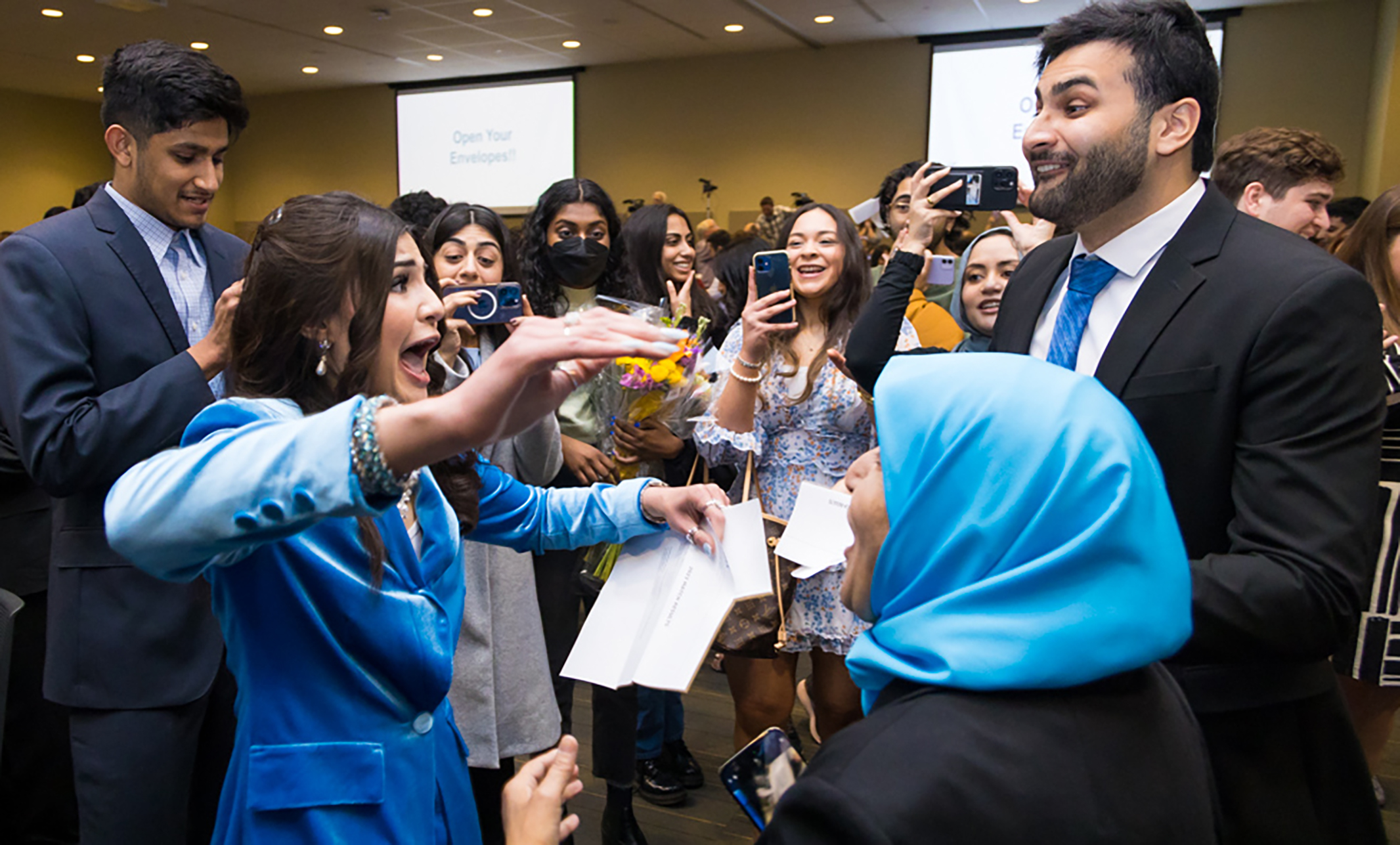
Stories of an untraditional medical student and two siblings who fulfilled their dreams
Tears flowed down his cheeks as UMKC medical student Keith Loftin embraced his wife on Match Day inside the UMKC Student Union, holding a letter in his hands that spelled out the next four years of their lives. His misty-eyed parents looked on as well as he read the news.
Loftin had matched in a residency position at Samaritan Health Services in Corvallis, Oregon, where he will enter his preferred specialty of psychiatry.
“It’s amazing to be here with all these people who have supported me, all the people who care about me,” Loftin said. “It’s all kind of surreal right now.”
Loftin was one of the 112 members of the UMKC School of Medicine class of 2023 that participated this year’s National Resident Matching Program. Like many in the class, he was elated at receiving his first choice of residency positions.
“I found psychiatry and realized how much I connected with it and how much I loved working with my patients and decided this is where I need to be,” Loftin said. “It felt like this is where I belonged.”
His journey to becoming a physician, however, took a different path than the rest of his classmates, most of whom are half his age.
UMKC medical student Keith Loftin celebrated his match in psychiatry with his wife and children.
Prior to moving with his wife and two children to Kansas City and entering medical school, Loftin was a high school science teacher in Jefferson City, Missouri. Before that, he spent nearly seven years in the Army working on Chinook helicopters, then returned to school to earn a master’s degree in education. All the while, Loftin, who earned a bachelor’s degree in nutrition and science at the University of Missouri before joining the Army, said he harbored a hidden desire to become a doctor.
“I was teaching a class for high school students who wanted to enter health care and they kept asking me why I hadn’t gone to medical school,” he said. “After about the 100th conversation my wife and I had about it, she finally said you know what you need to do and that started the ball rolling.”
With the backing of his wife, and while still teaching his high school classes, Loftin began the tedious process of studying for the MCAT exam and preparing to become a full-time student again for the first time in nearly 17 years.
“Medical school was a challenge, but doable,” he said. “I faced a lot of personal challenges.”
During his time as a medical student, Loftin underwent multiple surgeries for back injuries from his time in the Army and helped his wife through the loss of her mother. His efforts paid off on Friday. Loftin applied for residency positions in psychiatry at hospitals across the country from Oregon to Florida, knowing the day would come when he would have to move his wife, a 17-year-old daughter and a 7-year-old son again.
“It’s a little tough,” he said. “It’s not so bad for me. I moved six times to different duty stations when I was in the Army. It’s going to have its challenges, moving my family, but I know my son is excited about it.”
Brother and sister
While Loftin celebrated with his family, Mozammil and Sumaiya Alam were enjoying the day with family and friends as well. The brother and sister from Kansas City, Missouri, had the unique experience of going through Match together.
Mozammil received his desired match in neurology and will be headed to the University of Arizona College of Medicine in Phoenix. Sumaiya matched in internal medicine at Emory University School of Medicine.
“I’m going to Atlanta,” Sumaiya screamed. “ I started crying before I even opened my envelope. This is what I was dreaming.”
Mozammil was sharing a similar excitement.
“There is so much joy right now,” he said. “We both got the matches we wanted.”
While the two were able to lean on each other for support throughout medical school, they were also able to turn for advice about the residency process to their brother, Mobashshir Alam, a 2018 graduate of the UMKC School of Medicine and now a gastroenterology fellow at the University of New Mexico School of Medicine.
“He was really helpful in guiding us through the match process,” Sumaiya said.
Mozammil said having his sister by his side helped as they have gone through the same highs and lows of medical school together.
“We definitely have relied on each other for multiple things,” he said. “During the interview season we were always there to support each other.”
Nearly half of the UMKC students who matched will be entering residency programs in one of the primary care specialties. Internal medicine drew the largest number of students with 19, followed by family medicine with 11 and pediatrics with nine. A growing number of graduates will also be going into psychiatry, which had 11 matches.
Twenty students will remain in Kansas City to do their residencies at UMKC School of Medicine-sponsored programs. Overall, 33 UMKC grads – about a third – will stay in Missouri for their residency programs.
See the full list of UMKC School of Medicine students who matched in programs across the United States from Honolulu, Hawaii, to New York.
School of Medicine Dean Mary Ann Jackson, M.D., congratulated the class, calling Match Day a defining moment in their journeys.
“The lessons you learned here will carry you through your career,” Jackson said.
Mar 17, 2023
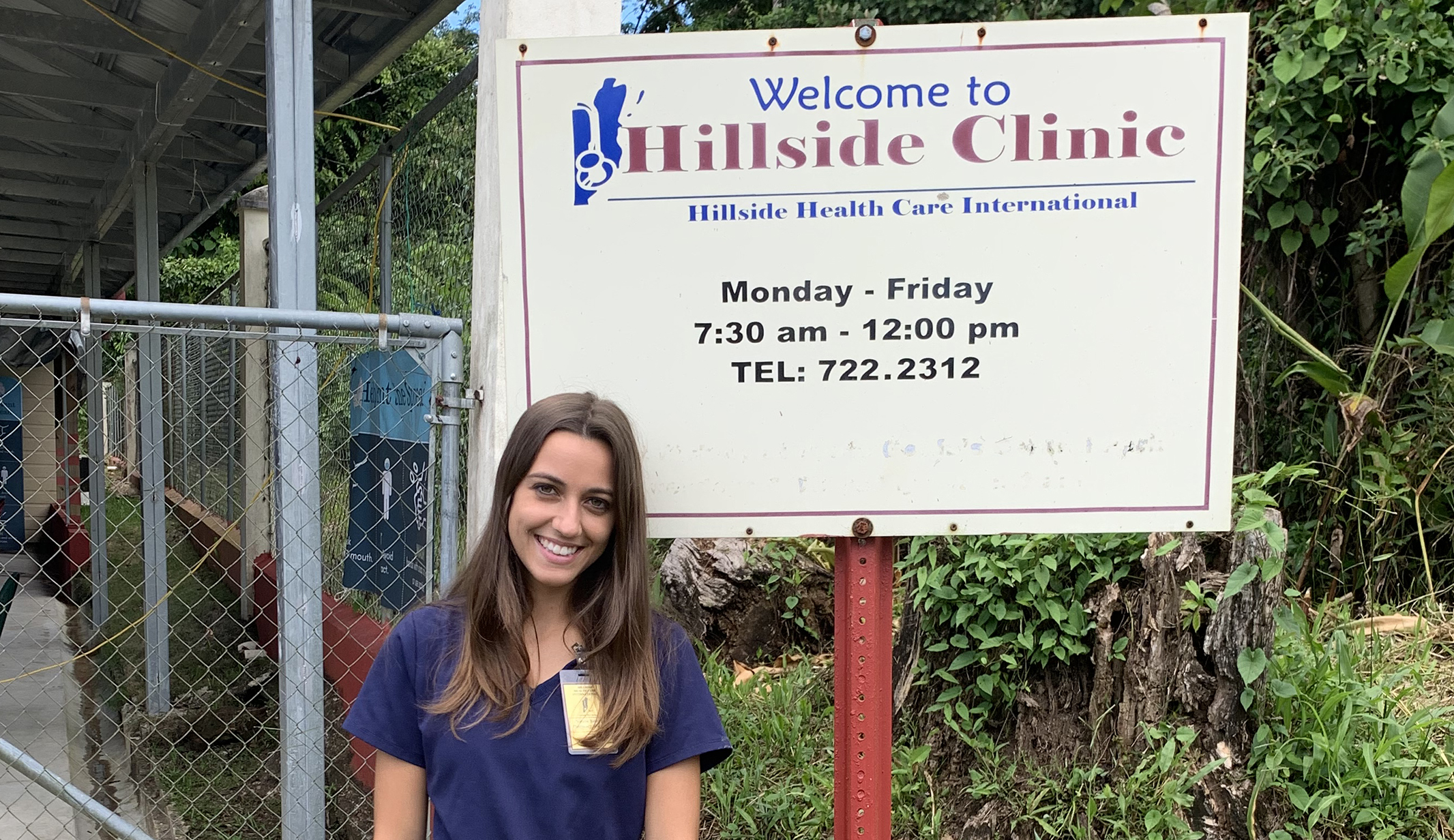
Students from all three of UMKC School of Pharmacy campuses participated in clinical rotations with nonprofit organization
Today’s pharmacists fill a multitude of roles as health care providers, but even this was a new one for UMKC pharmacy student Natalie Bishop.
Bishop is one of three UMKC pharmacy students who spent a month doing a clinical rotation at Hillside Health Care International, a small nonprofit clinic in Eldridgeville, Belize, a tiny community just miles from the port city of Punta Gorda.
During her stint at Hillside, a young boy suffering from acute asthma came to the clinic for a refill on his inhaler. Bishop and the clinic pharmacist explained to the patient how using a spacer, a short plastic tube attached the inhaler, would help deliver the medication to his lungs more effectively and help him better manage his asthma.
Seemingly simple resources, such as a spacer for an inhaler, can be a luxury in this part of the world. The clinic pharmacist and Bishop did the next best thing, cutting up a plastic bottle and strategically applying some duct tape to craft a needed spacer for their patient to use with his inhaler.
Lily Edwards in the pharmacy at Hillside Health Care International.
“They don’t have all the resources down there like we do here, so to be able to think on your feet and use what you do have is important,” Bishop said. “It was so cool seeing the pharmacist make one right there and help the patient moving forward.”
After Bishop, a pharmacy student on the Columbia, Missouri campus, returned home after completing her rotation, Lily Edwards, a student at UMKC’s campus in Springfield, Missouri, took her place in Belize. The two shared similar experiences. The clinic in Eldridgeville is largely made up of volunteers who support a small handful of physicians and one full-time pharmacist. That meant when Bishop and Edwards weren’t working side by side with the staff pharmacist, they found themselves working on their own.
“It really pushed me a lot to know things because resources are limited there,” Edwards said. “I didn’t get to look everything up before I had to answer a question. I really had to know my stuff and be ready to recall it.”
“It really pushed me a lot to know things because resources are limited there.” - Lily Edwards said.
Carlos Olivas, a student on the Kansas City campus, completed the same rotation in January. While Bishop, Edwards and Olivas served the same role at the clinic, collaborating with doctors, medical students and physician assistant students while dispensing medications and counseling patients, Olivas said their situations were different.
“I was actually fortunate enough to have two other pharmacy students there with me,” Olivas said. “We were able to kind of team up together where Natalie and Lily didn’t have other pharmacy students with them to help.”
That came into play on mobile clinic days.
Each week, doctors and students would load a van with essential medications and travel from 45 minutes to three-hours from their home clinic to remote regions and villages where they would see as many as 40 to 50 patients in a day. One long trip took Edwards and her team to a village that had not received medical care for three years.
Operating out of a building with no electricity or running water, Edwards was the lone pharmacist on the team, dispensing medications and counseling patients. Before the day was over, the team had run out of antibiotics before running out of patients. Edwards was forced into problem solving mode.
“Doctors are coming to me saying, ‘I want this antibiotic for an ear infection,’ and I’m telling them, ‘I’m sorry, what’s your next choice? I have this,’” said Edwards, who looked back on the experience as both stressful and extremely rewarding. “It was incredibly eye opening. It definitely pushed me further than I thought was possible.”
Problem solving became part of the regular routine for the student pharmacists as they were often dealing with limited supplies, answering questions about available medications and determining proper dosings.
"I definitely developed a lot of communication skills throughout the time I was there.” - Carlos Olivas
“That was really a neat experience getting to collaborate with (physician assistant and medical students) and show them what a pharmacist can do, the knowledge that we have,” Bishop said. “It was fun to work with them because they didn’t realize what we learn. We don’t diagnose patients, but we have to learn about the diagnosis so that we can recommend the right medications.”
Carlos Olivas working with a patient during a pharmacy rotation in Eldridgeville, Belize.
Those collaborations made for a rewarding experience that Olivas said he wasn’t expecting.
“The discussions were very open,” he said. “They would come to us whenever they needed any kind of expertise in our realm of ‘what is the dosing’ or ‘what do we have?’ Being able to have those open discussions was great and I definitely developed a lot of communication skills throughout the time I was there.”
Not all of their time was spent in the Eldridgeville clinic or the mobile clinics. The three also found themselves enjoying time in another public health service role, visiting local schools and participating in public health fairs, doing everything from blood-pressure checks to diabetes screenings.
Olivas spoke to a group of school children about the need for and benefits of good nutrition and exercise. While interacting with a particular classroom of 30 to 40 third- and fourth-grade students, all smiling and laughing with him, the students at one point began telling him what they knew about carbohydrates and cholesterol.
“I was like, you’re in third or fourth grade and you’re talking to me about that,” Olivas said. “It was really cool.”
Mar 16, 2023
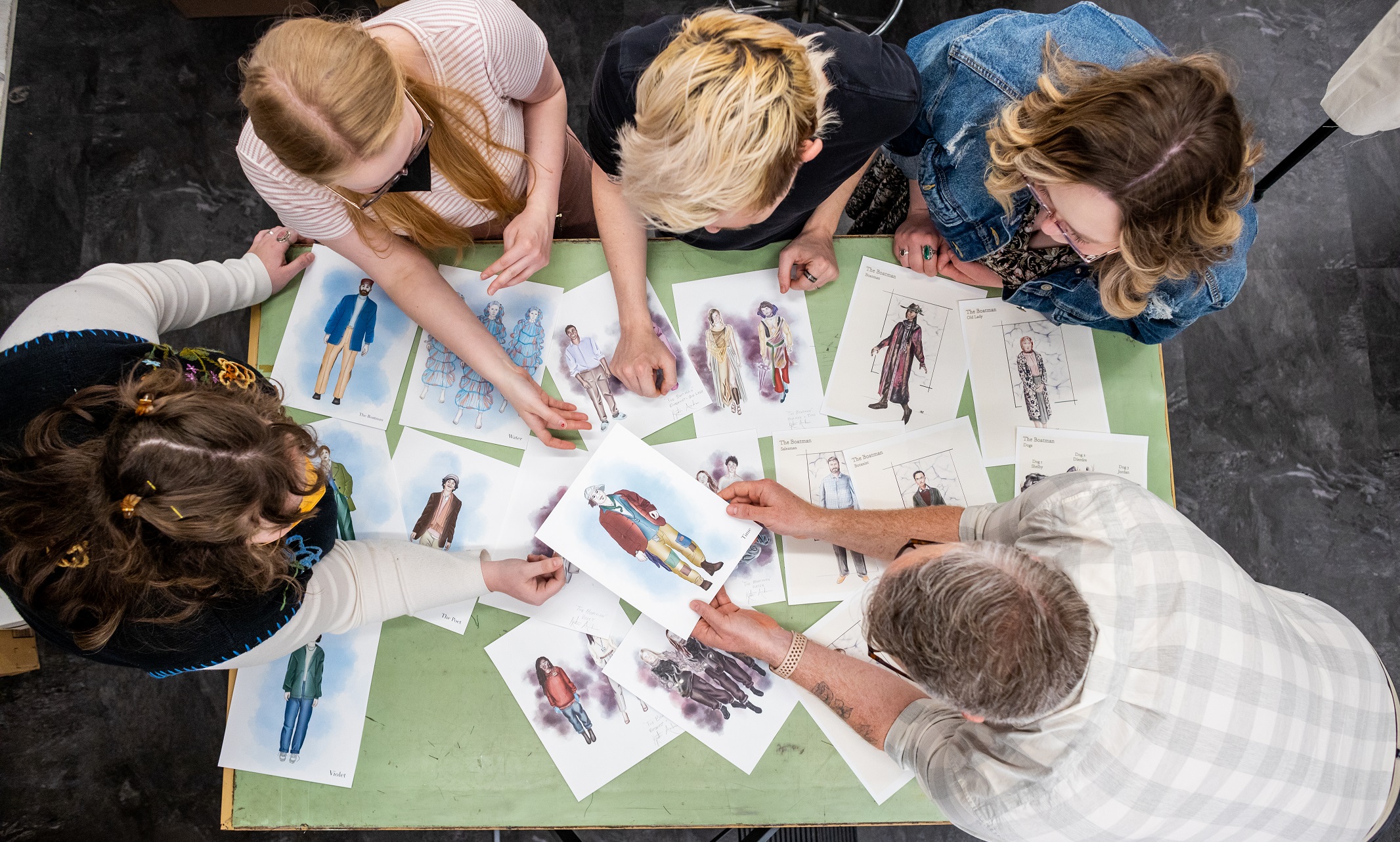
For the sixth year in a row, the program was ranked among Top 10 by The Hollywood Reporter.
The Master of Fine Arts in costume design program is noted in The Hollywood Reporter for its training in both costume design and production, its emphasis on digital graphic skills, entrepreneurial approaches to the field and environmentally conscious practices.
“We are thrilled that our outstanding costume design program is earning this well-deserved recognition,” Courtney Crappell, dean of the Conservatory, said. “When you see UMKC listed with these other top-10 schools, you get a much clearer understanding of the level of excellence and top-value we offer here in Kansas City.”
The Hollywood Reporter also made positive mention of the plan to completely revise the curriculum for Fall 2023. Program head Brandon McWilliams said the changes come from a desire to reflect current trends in live entertainment design.
“We’re making space in our coursework for emerging technologies and digital graphic skills, and we want to help our students develop entrepreneurial toolkits,” McWilliams said. “Our overall focus though remains the same – to prepare practitioners to be successful costume designers, managers and technicians.”
McWilliams arrived at UMKC in August 2022 and has been impressed with the program, particularly its students. An alumnus of another institution on the Top 10 list, Carnegie Mellon School of Drama, McWilliams appreciates the recipe for success at the Conservatory.
“It seems like this place has always offered students an experience so balanced in practical and theoretical approaches that it makes for a really well-prepared and adaptable artist,” McWilliams said. “It’s our students that set us apart, there is such a long-standing trend of success in the profession and in academia from our graduates.”
UMKC was ranked among the University of Southern California, David Geffen School of Drama at Yale and the Fashion Institute of Design and Merchandising.
Here’s the full list.
Mar 15, 2023
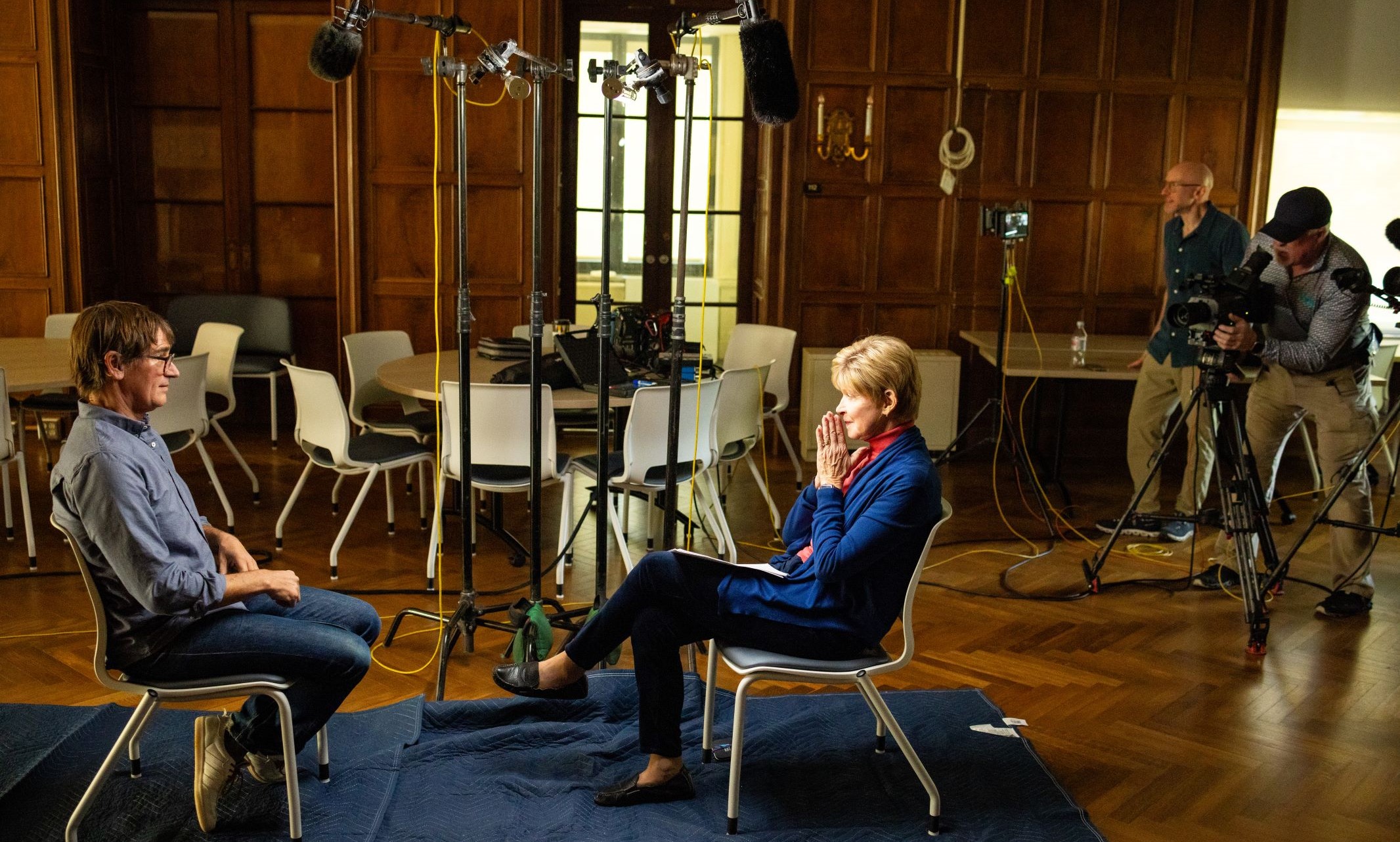
Martin was featured on CBS Sunday Morning, was a Kirkus nonfiction finalist and received the University of Missouri System Thomas Jefferson Award
Clancy Martin, Ph.D, is a well-known professor of philosophy at UMKC. His latest book: “How Not to Kill Yourself” was a 2023 Kirkus Prize nonfiction finalist.
Martin has talked about his personal story about suicide on "CBS Sunday Morning," NPR "Fresh Air" and in the New York Times and appeared at the Kansas City Public Library.
In April 2024, he was awarded the University of Missouri System Thomas Jefferson Award. Martin joins a distinguished group of award recipients who have demonstrated clear excellence and distinction in teaching, research, writing, creative activities and service to the university and humankind.
University of Missouri System President Mun Choi, Professor Clancy Martin, UMKC Chancellor Mauli Agrawal, UMKC Provost and Executive Vice Chancellor Jennifer Lundgren | Photo by Brandon Parigo
We wanted to get to know this popular professor a little better. Here are seven fun facts about Clancy Martin:
Philosophy was not his first major choice.
“I was a chemistry major, and I wanted to go to medical school,” Martin said. But how did he end up teaching philosophy instead of going to medical school? Like many students who end up on a new career path, he took a required elective.
“I didn't even know what philosophy was,” he said. “Then I just had this amazing professor and read a couple of philosophers in that class. I didn't realize that people thought and wrote like this. It made me completely crazy about philosophy.”
He was on the fence about going to graduate school.
When Martin wasn’t sure whether to continue to pursue medical school or a graduate degree in philosophy, he turned to his father.
“Normally, to be frank, he didn't give the best advice and I normally didn't listen,” Martin said. “But I called him and asked him ‘Should I go to medical school or graduate school in philosophy?’ He said ‘Son, all of my friends who are doctors, they complain about how they work all the time and have to deal with insurance. They have no home life. All of my friends who are professors, none of them are rich, but they're all really happy. So, I think you should go to graduate school in philosophy,’ and for once, I listened.”
He used to be in the jewelry business.
After Martin had his first child (bonus fun fact: she is currently getting her Ph.D. at her dad’s alma mater, University of Texas-Austin, but not in philosophy), he dropped out of school for a while. He had brothers in the jewelry business and decided to give working with them a try.
“I thought, maybe I should just make a lot of money rather than be a professor, and I did that for six or seven years,” he said. “I was miserable, and whenever I would get really down, I'd drive to a college campus, just to walk around the campus and see the students. It would make me remember that life was worth living, until eventually I knew I had to get up and go back to graduate school. I had to become a professor because it's just where my heart was.”
He's written for many popular publications, including the New York Times and Elle.
When asked how he started writing for such a large gamut of publications, Martin looked to his heroes, the 19th- and the 20th-century existentialist philosophers.
“Their driving idea is that philosophy should always be relevant to as many people as possible,” he said. “Basically, it should be relevant to the ordinary person on the street. And if we can't reach that person and speak to that person, then we're just not doing philosophy properly. I very strongly believe that.”
His favorite experience with his writing (so far) has been his latest book, “How Not to Kill Yourself.”
He says it’s because it was the hardest to write. It took him about five years.
“It was the most serious self-interrogation that I've done in any of my work,” Martin said. “I think that, as a philosopher, part of your job is to try to go as deeply as you can and ask the questions about the meaning of life. This is when I have done my most thorough attempt yet to investigate that question. It had a life affirming quality to it.”
His favorite part of Kansas City is Midtown.
“I love being able to walk to school,” Martin said. “I love the Nelson-Atkins Museum of Art. I love that Kansas City has everything you want in a big city, but it still feels like a normal size. You never feel overwhelmed, like you can in a lot of big cities. This is just a place that feels right to me. I've had other job offers since I've been here, and I've never been tempted to leave because I love the city, UMKC and our students.”
He wants the student body to know support is available across the UMKC campus.
“If they are having feelings of worthlessness, anxiety, stress or fear, anything like this, reach out, not just to me, but all the faculty and staff at UMKC,” Martin said. “I would like our students to know that we are here for them as human beings and as people to help them in every way that we can. We’re not just an educational resource for them. We're a human resource for them. After they graduate, too. I always tell my students ‘Hey, once you’ve had me as a professor, you're stuck with me for life now. Anytime you need me, send me an email and I'll be there for you.’ And I know that's not just true of me, that's true of all of my colleagues who are faculty at UMKC. This is how we run things at UMKC, and this is one of the best things about our university.”
Mar 13, 2023
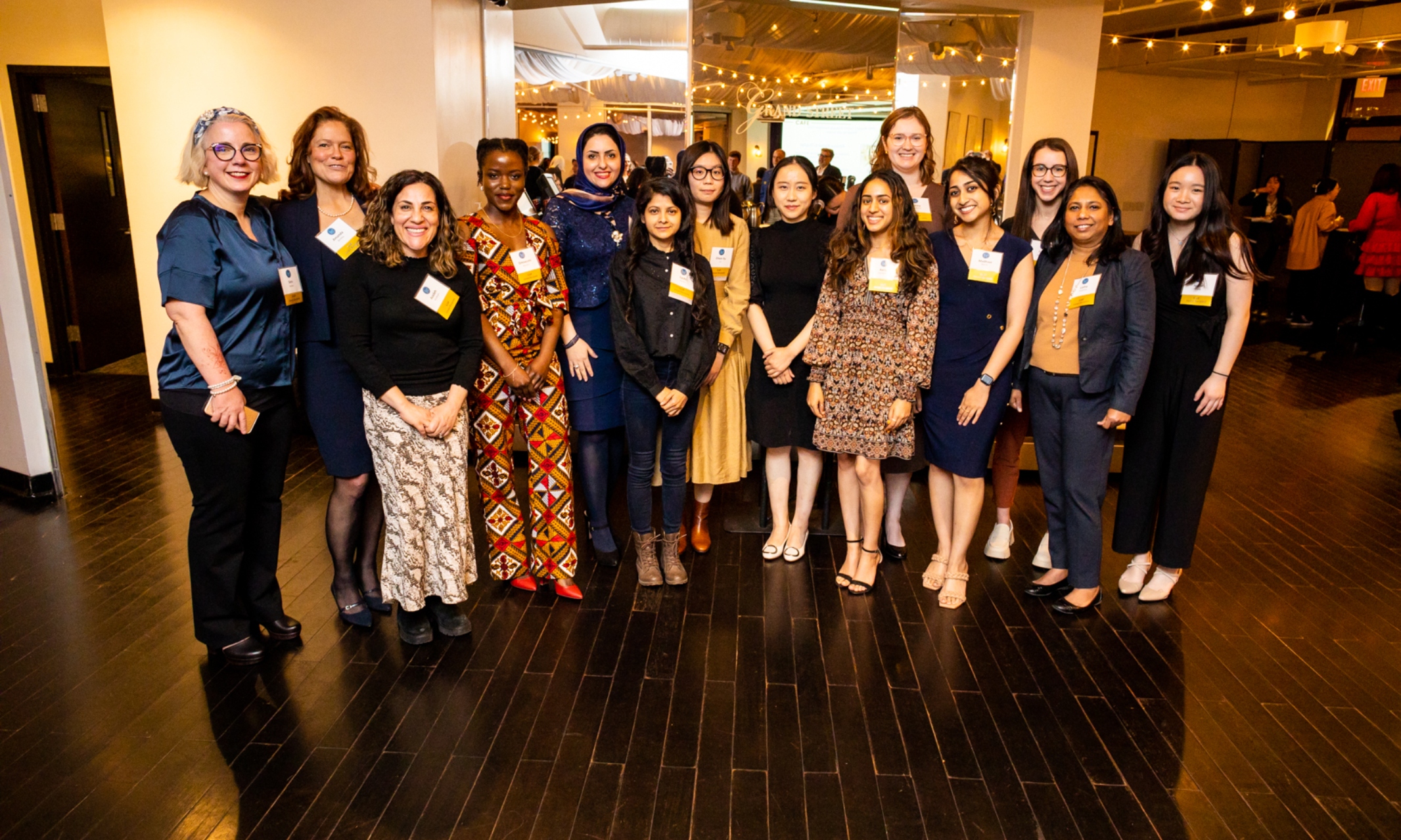
More than $2 million has helped enrich the academic careers of more than 2,000 women
The UMKC Women’s Council celebrated 52 years of supporting women in graduate studies and honoring the 2023 awardees with a reception on March 2.
This year, the group of 77 women received more than $100,000 from the Women’s Council Graduate Assistance Fund. Since its inception, the fund has supported the academic achievements of more than 2,500 women with more than $2.2 million in graduate fellowships.
Ghadah Almousa (Ph.D. ‘24) is researching deep learning solutions to detect and prevent cybercrime in social media. She’s interested in finding solutions to the spread of misinformation and malicious activities. These deep learning models can analyze large volumes of data from social media platforms and identify patterns that are indicative of cybercriminal activity, such as fake accounts, bots and malicious links.
“There is amazing work going on at UMKC. I’m honored to be part of the process.” - Leslie Boe
“Detecting and preventing cybercrime in social media is a challenging task,” Almousa says. “Cybercriminals are constantly evolving their tactics and using new techniques to evade detection. By using deep learning to detect and prevent cybercrime in social media, researchers can help to protect users from scams, fraud and other malicious activities. Also, I have kids, and I want to make the social media environment as safe as possible for them.”
Chancellor Mauli Agrawal with Bibie Chronwall, Ed.D., Ph.D. and Hazel Knutson.
Funding from the UMKC Women’s Council will further her work by allowing her to attend top conferences on cybersecurity and publish her research.
“I am very grateful for the people who provide this funding,” Almousa says.
Rhonda Cooksey, (M.F.A. ’18, GRCT ’18, Ph.D. ‘25 ) is writing her dissertation on representations of racial violence in 19th-century print culture. She received funding to present her research on 19th- century literature and society, and the print culture of the time, and attend a conference that focused on papers that were integral to research.
“The conference call for papers referenced Michael Foucault's concept of parrhesia as a means to interrogate truth--what is it--who tells it--and what are the consequences of telling the truth,” Cooksey says. “As editor of the Colored American Magazine (CAM), Pauline E. Hopkins spoke for agitation at a time when Booker T. Washington stood for accommodation. Hundreds of Black people were lynched every year, and he considered it safer for Black folks to accommodate segregation and not make waves.”
The Women’s Council Graduate Assistance Fund support enabled Cooksey to network with colleagues with similar interests, research archives in the area and further her work on her dissertation. She feels this experience will enhance her career.
Leslie Boe, ( J.D. ’01) is the current UMKC Women’s Council Board of Directors president, and has been on the board for five years. As a shareholder and director at Dysart Taylor McMonigle Brumitt & Wilcox, her work life is demanding. But after attending a Graduate Assistance Fund event, she was inspired by the graduate students and their groundbreaking work.
“I immediately reached out to a board member to let them know I’d love to be involved in supporting the UMKC Women’s Council and its work,” Boe said. “The first year I reviewed applications I was stunned and impressed by the work of our applicants. There is amazing work going on at UMKC. I’m honored to be part of the process.”
Established in 1971, the UMKC Women’s Council Graduate Assistance Fund supports UMKC women working toward post-baccalaureate degrees with up to $2,000 in funds that furthers their completion of graduation requirements and enriches their educational experiences.
Mar 07, 2023
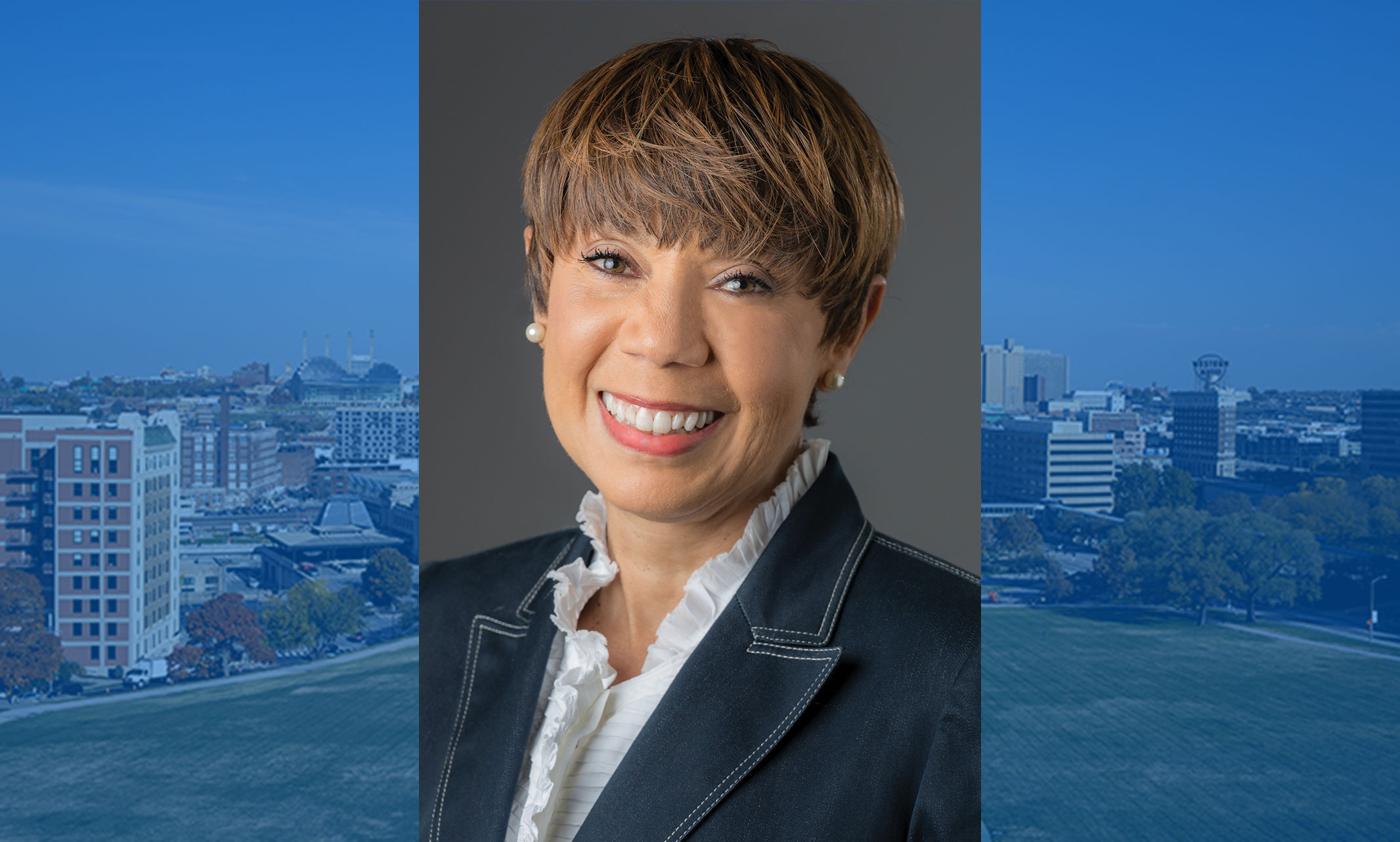
UMKC honors Patricia Macdonald for a lifetime of service
Each year, the UMKC Alumni Association recognizes the achievements of outstanding alumni with an awards celebration. UMKC is honoring Patricia Macdonald with its Class of 2023 Bill French Alumni Service Award.
Patricia (Pat) Macdonald, a UMKC alumna with a Bachelor of Arts in liberal arts and an American Cultures concentration, has always had a passion for urban public education. A product of New York public schools, Pat holds the conviction that “Great minds exist everywhere.” She has taken that conviction into service throughout her professional career.
Macdonald has served as president for the UMKC Alumni Association Governing Board, a UMKC Trustee Board chair, a volunteer for Kansas City Public Schools and Pembroke Hill School, among many other service and leadership positions. She is currently on the boards of KCUR, the Kansas City Ballet, the Missouri Arts Foundation and Visit KC. In all her spare time, she has managed to lead the Strategic Ventures and Operations at the Healthcare Institute for Innovations in Quality at UMKC as a director.
What inspired you to live a life of service?
I can’t say I had a conscious epiphany where I said “I am going to lead a life of service,” but most of us are shaped by what we see, hear and experience on a regular basis. My father never told me to volunteer but he always had messages that equated to “do the right thing,” and he modeled that. He passed away when I was just 9, and fortunately for me, there were a number of women in my life who took special interest in my development and whom, as a result, I quietly admired and I watched very closely. I can say with great gratitude that I am shaped, in part, by them pouring into me, and me, watching them pour into others without talk or fuss but in very special and important ways, when they did not have to.
You are involved in so many organizations – how do you manage your time?
I only consider causes and tasks that I care about, I thoughtfully assess my capacity and I am candid about my capacity before fully accepting a leadership role or new task. The candor is fair to the organization and allows the organization to plan better.
You say that taking opportunities to give back are opportunities to grow in your own personal and professional development; how have you grown?
Opportunities to give back affords me opportunities to interact and develop relationships with people I ordinarily would not, which expands my social and professional aperture. Service has increased my ability to fully analyze situations and conditions which has contributed to my ability to develop win-win and broad-serving solutions. Service has expanded my network of knowledge and professional friends on whom I can call when I need solutions that are not in my personal skillset or personal knowledge base.
What is your favorite UMKC memory?
Having been a UMKC volunteer for as long as I have, I developed tremendous respect and admiration for UMKC faculty and staff. They support volunteers’ efforts at every turn and make sure the volunteer experience is accessible, fun and rewarding. In the fall of 2021, and because of my tremendously rewarding volunteer experiences and esteem for UMKC employees, I was excited to accept a professional position within UMKC. I did not think my respect for UMKC faculty and staff could be any higher but it skyrocketed beyond anything I could have imagined once I began to serve in a professional capacity. I have new insight into what it takes to make UMKC operate with excellence and I bow very low to those who have been serving the university professionally for years.
What is your proudest accomplishment?
My kid! Allister Macdonald. He’s awesome. He’s funny, smart and just graduated with degrees in Kinesiology/Exercise Science and Spanish. He’s also an MMA competitor (I don’t like that part so much, thank goodness he’s good at it).
Where can you be found on the weekends? What are your hobbies?
On weekends, I can be found at the WERQ Dance Fitness studio in the northland having a blast in cardio hip-hop with friends, porch-sitting with my neighbors, reading and/or listening to a book and on Saturdays I am always tuned in to the Session and Soulsations on KCUR 89.3.
About Alumni Awards
Join us in honoring Patricia Macdonald and the other Class of 2023 awardees at an in-person event on the evening of March 10 at Plexpod Westport Commons. For more, visit UMKC's Alumni Association website. If you are unable to attend the event but would like to donate to student scholarships, contributions can be made online.
Mar 03, 2023
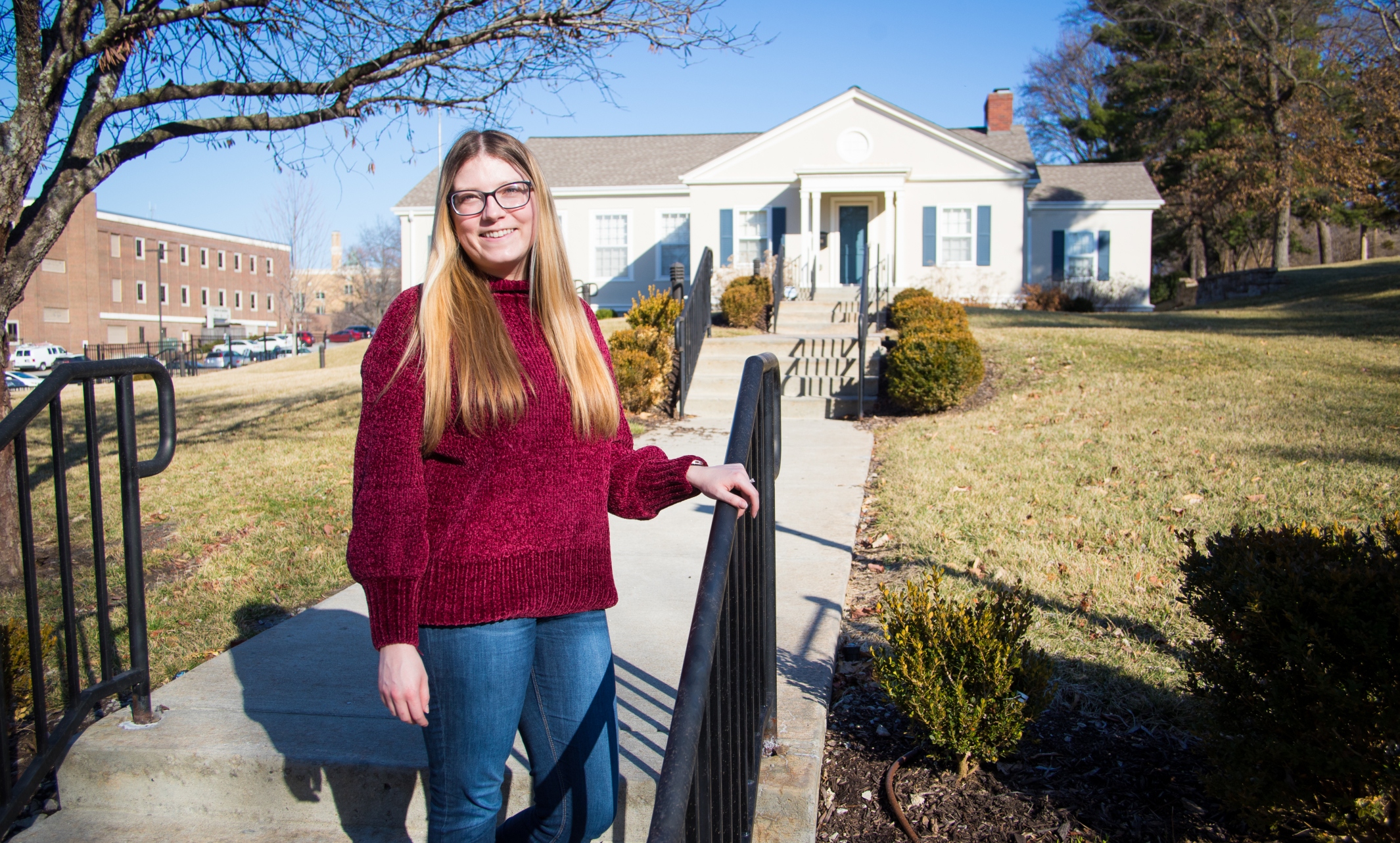
Paid internship provides experience, peace of mind
History student Katy Anielak (M.A.23) had created physical museum exhibits, but her paid internship to develop content for the Clio app led to unique opportunities.
Anielak had participated in undergraduate research, and she wanted to further develop those skills.
“I thought graduate research would be an excellent opportunity to do that while also focusing on topics I’m passionate about,” she says.
Anielak was working with David J. Trowbridge, Ph.D., William T. Kemper Associate Research Professor of Digital and Public Humanities, on content for Clio, a free mobile app that provides guides for history and culture, and he mentioned that the Kansas City Women’s History Trail had not been developed.
“I’m not originally from Kansas City, so the idea of the trail appealed to me to provide assessable information for others, but also to expand my knowledge of the city and the women who have shaped it over time,” she says.
“I don't think I could have found an opportunity that worked around my course schedule as smoothly as this internship, and it helped with my success in both my classes and the internship itself.” - Katy Anielak
Anielak had created physical exhibits before, but this research provided a unique opportunity to create digital content. She worked with UMKC faculty, public history organizations and nonprofits, such as the Midwest Center for Holocaust Education and Operation Breakthrough.
“These interactions allowed me to connect with professionals and broadened my understanding of what goes into both career paths,” she says. “This opened my eyes to the importance of expanding and maintaining public history and nonprofit programs.”
The flexibility of the internship worked well with her class schedule and enabled her to ensure that the quality of the exhibits were well-executed.
“I don't think I could have found an opportunity that worked around my course schedule as smoothly as this internship, and it helped with my success in both my classes and the internship itself.”
This is the scholarship and experience that the Digital Humanities programming was designed to encourage.
“Katy gained confidence and experience as she conducted research that supported her efforts to create virtual museum tours,” Trowbridge says. “We believe that Katy’s virtual tour of the Kansas City Museum will serve as a model and learning experience as we support other historical and cultural organizations in Kansas City.”
Mar 03, 2023
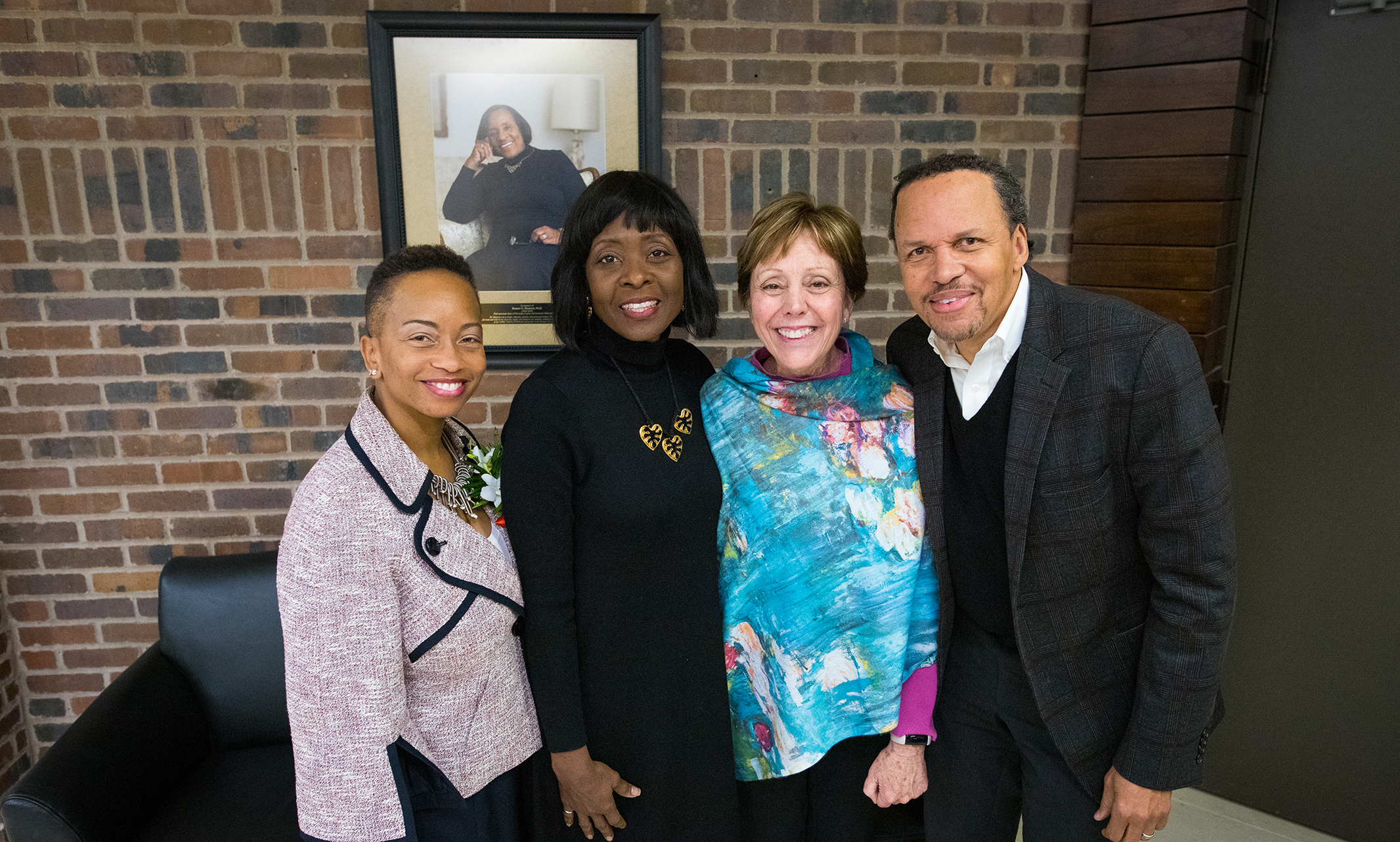
Reaner Shannon served 34 years at UMKC School of Medicine
UMKC celebrated the memory and legacy of Reaner Shannon, long-time director and associate dean of minority affairs at the School of Medicine, with a special tribute on Feb. 24.
Tyler Smith, School of Medicine associate dean for diversity, equity and inclusion; and Shannon’s daughter, Pamela, unveiled a portrait of Shannon, who was a staunch promoter of diversity and equity within the school and throughout Kansas City for 34 years before her retirement in 2008.
The UMKC School of Medicine is renowned for its unique six-year, combined BA/MD program that accepts students directly from high school, and its docent-based mentoring instructional model. Thanks in large part to the efforts of Shannon, it is recognized as a trailblazer in diversity and inclusion as well. Reaner Shannon died last July at the age of 85. Her husband, Henry Shannon, died just five months later, in December, at the age of 89.
The unveiling ceremony took place at the conclusion of the school’s annual Dr. Reaner and Mr. Henry Shannon Lectureship in Minority Health.
The Shannons established their annual lectureship that now takes place each February during Black History Month to create an awareness of health disparities and provide medical professionals, students, residents and the local community information about timely issues that affect underserved and minority communities.
The list of those who have delivered the Shannon Lecture over the years is filled with local, regional and national health leaders. They include leaders such as:
Jocelyn Elders, former U.S. surgeon general (2006)
Gloria Wilder-Brathwaite, founder of Justice Speaks (2008)
Louis Sullivan, former U.S. secretary of health and human services (2015)
Nadine Gracia, deputy assistant secretary of minority health and director of the Office of Minority Health at the U.S. Department of Health and Human Services (2016)
Altha J. Stewart, president of the American Psychiatric Association (2019)
Patrice Harris, past president of the American Medical Association (2021)
Pamela thanked Smith and School of Medicine Dean Mary Anne Jackson, M.D., for recognizing her parents and for the honor of keeping her mother’s legacy alive at the medical school.
“Hospital Hill meant so much to my parents,” she said. “It’s where their careers began and where they ended. This has been like home for us.”
Below the portrait that now hangs on a wall outside the School of Medicine’s theaters is a plaque honoring Shannon as “a leader, educator, scholar, researcher and mentor. She was a tireless advocate and activist for diversity, equity and inclusion for students, residents, fellows, faculty and staff at the UMKC School of Medicine and people in the Kansas City Community.”
Former School of Medicine Dean Betty Drees, M.D., said Reaner and Henry Shannon “were such pioneers in the work that they did and left such a wonderful legacy.”
Reaner Shannon began her career at the school as the main research lab technologist. In 1990, she left the laboratory to become the director of the School of Medicine’s minority affairs office. She became the school’s first associate dean for minority affairs in 1998, a post she held until she retired.
Smith served as the keynote speaker for this year’s lectureship, addressing the importance of mentorship, coaching and sponsorship of “underserved-in-medicine health professionals.” She spoke about how Shannon was a champion of supporting and advocating for students.
“Every medical school needs to have a person like a Dr. Shannon,” Smith said. “One of the joys she had was to serve as a mentor to students interested in science and in medicine.”
Mar 01, 2023
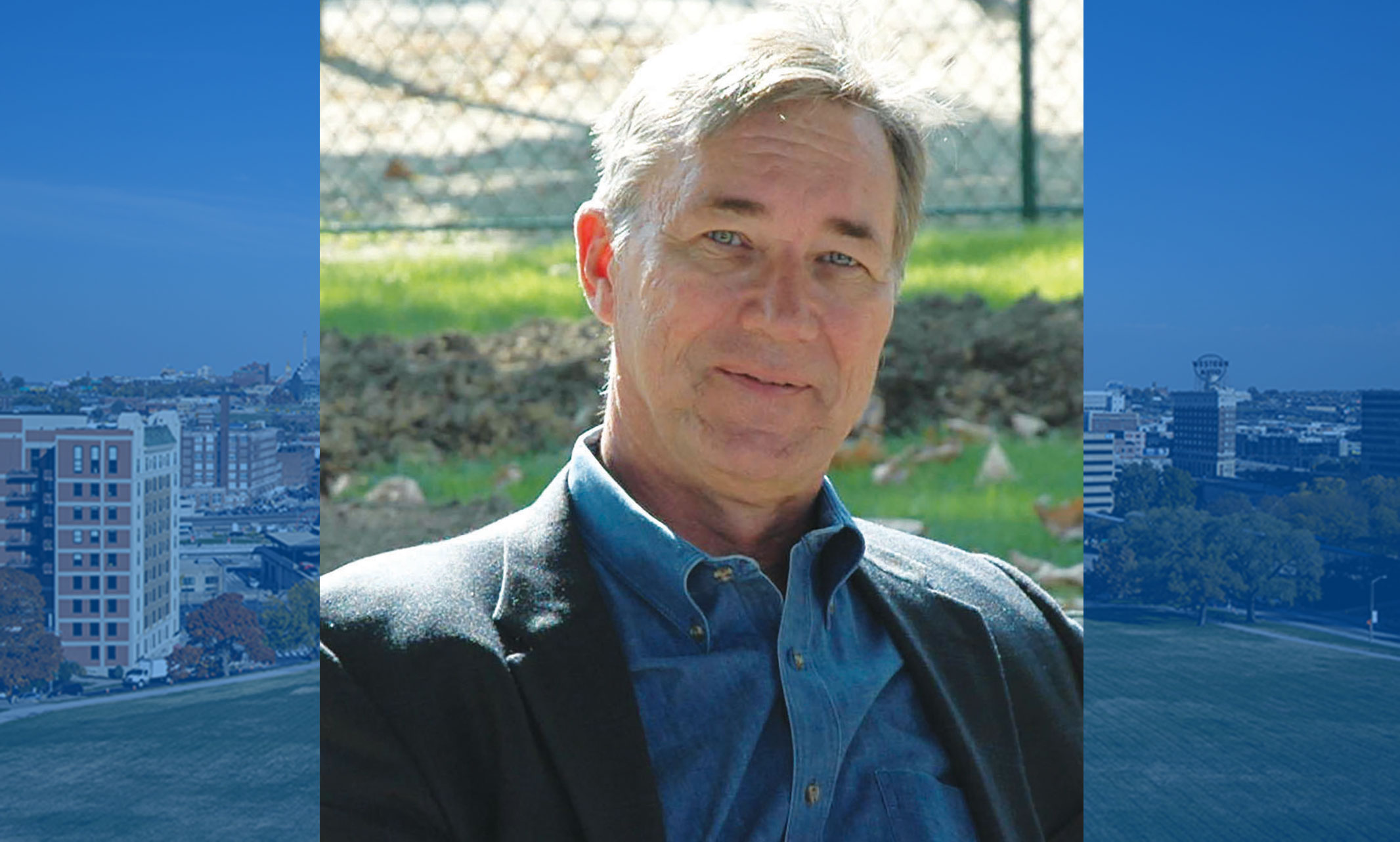
UMKC recognizes Bruce Bubacz with Spotlight Award
Each year, the UMKC Alumni Association recognizes the achievements of outstanding alumni with an awards celebration. The Spotlight Award is a little different, as it can recognize the excellence of almost anyone in the UMKC community whose accomplishments, leadership and public service have caused regional and national attention to be focused on the university and the metropolitan area. This year, the Alumni Association is honoring Bruce Bubacz, Ph.D., with its Class of 2023 Alumni Spotlight Award.
Bubacz is celebrating 50 years of teaching at UMKC this year. Currently serving as the chair of the department of philosophy, he has also served as a professor in the School of Law, as dean in College of Arts and Sciences (now the School of Humanities and Social Sciences) and even as provost of the university. He was also the driving force behind the university’s Honors Program.
“The positive impact Bruce has had on UMKC and, through UMKC, the greater KC community, cannot be overestimated,” said Bubacz’s colleague, Clancy Martin, Ph.D. “Every year he helps other colleagues get tenure, or win awards, or coaches them through work-life balance struggles, or advises others in the upper administration who rightly recognize his matchless experience, care and expertise.”
Bubacz had much to say on receiving this award.
As a non-alum, what drives you to be so dedicated to UMKC?
I have learned as much during the past 50 years as have my students. UMKC has become my home. There is not a place on the Volker Campus that does not hold a memory; there are memories of all kinds.
You have touched the lives of over 5,000 students during your tenure. How have your students inspired you?
About a year after joining the faculty, I was attending a professional conference. One of my graduate professors asked me what UMKC was like. You must realize that faculty at the University of Washington in Seattle considered Kansas City to be rather exotic. I answered, “I teach at a very serious place. The students are serious as are my colleagues.” Nearly all of our students are here for a reason, they are not just “going to college.” They deserved to be taken seriously, and I take that to be an important commitment.
What inspired you to start the Honors Program?
The Honors Program was in fact the brainchild of several people on the faculty. It was thought that students could benefit from an accelerated program of study. I agreed to manage it through the early years. After six years it was secure, and I decided that fresh eyes could take it in a new direction.
In addition to teaching, you also donate to the university. What drives you to give?
Two main reasons. Many of our students have limited means and must work in order to make ends meet. I like to think that I can give some help to them. And I have wanted to memorialize two people who were important influences: my mother (through the Graduate Assistance Fund) and my dear friend Hank Frankel, through a scholarship named for him.
What is your proudest accomplishment?
On several occasions I was asked to serve in a leadership role in a situation that badly needed calm stability. I think I succeeded.
Where can you be found on the weekends? What are your hobbies?
When you get to be my age you are expected to downsize. So, we bought 116 acres in Benton County, Missouri. Maintaining the property takes some effort. For example, about 65% of the property is forest, with many trails cut through the trees, some easy, some demanding. The trails need to be groomed, so Joan and I drive through towing a large mower. We also have a 6-acre stocked pond, and a very nice house. This has been a great place for photography, which has been my favorite hobby since I was 10. I also enjoy wood working of all sorts.
About Alumni Awards
Join us in honoring Bruce Bubacz and the other Class of 2023 awardees at an in-person event on the evening of March 10 at Plexpod Westport Commons. For more details, visit UMKC's Alumni Association website. If you are unable to attend the event but would like to donate to student scholarships, contributions can be made online.
Feb 28, 2023
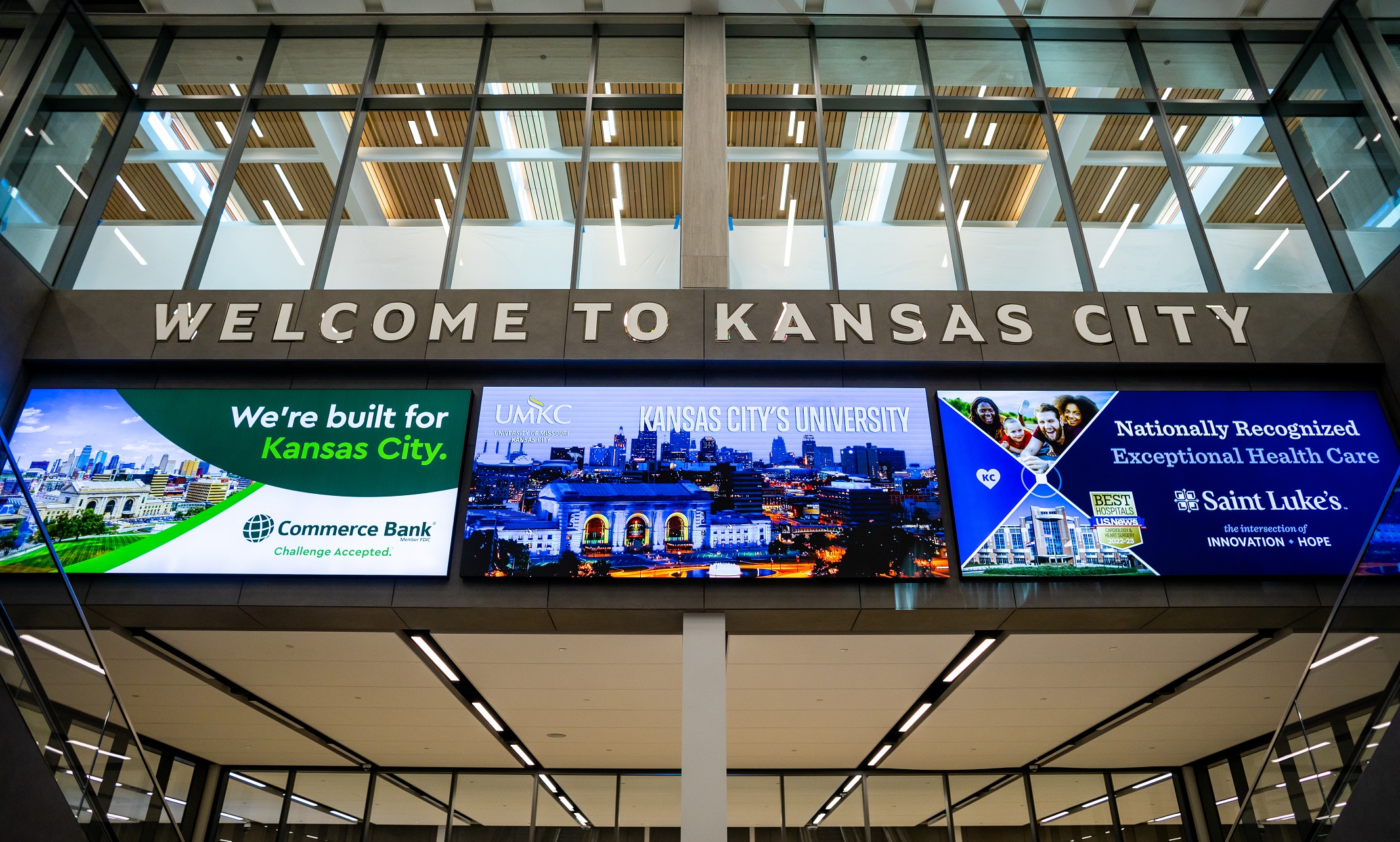
Students, faculty and alumni were involved in the project from start to finish
It’s only fitting that Kansas City’s university would be involved throughout the largest infrastructure project in the history of the city. The new KCI Airport terminal is open to travelers and UMKC students, alumni and faculty helped make it happen.
Communication
Before any construction happened, Joe McBride (B.A. ’86) had one of the earliest roles to play in the project: getting the community on board. As senior manager of communications for the Kansas City Aviation Department, McBride had to convince people of the need for a new terminal, a sometimes-uphill battle as many Kansas Citians liked the convenience of the old airport design.
“I was happy that people had a sense of ownership of it,” McBride says. “That’s good.”
After the project was approved, McBride monitored public meetings and comments to ensure that travelers’ concerns were taken into consideration during the design process. His role in the project was truly from beginning to end, as he also played a key role in planning the grand opening.
“I think after all the labor and toil it will be, ‘Wow, it’s finally here,’” McBride said. “And watching people come into the terminal, checking in with the wow and the awe in their eyes, that’s going to be a fun, long, proud day.”
Design
For Kimberly (B.S.E.E. ‘95) and Trent (B.S.C.E. ’95) Robinett, the chance to participate in the design of the new airport had as much personal significance as professional.
“The terminal project is one of those signature projects that impacts the entire city,” Kimberly said. “It is the first thing about our city that visitors experience. But beyond that, we are hopeful that the new terminal will improve the lives of Kansas City residents by making it more attractive for airlines to add additional connections out of Kansas City.”
The Robinetts cofounded TREKK Design Group. TREKK helped develop the infrastructure for the new airport. This included locating and surveying existing utilities.
“Our crews were challenged with untangling what looked like a bowl of spaghetti,” she said.
From there, they worked with subcontractors to design critical systems for the new terminal, including drainage and ground service equipment. These systems have a substantial impact on travelers, but unlike food vendors or retail, travelers are usually unaware of their existence. But, according to Kimberly, recognition has never been front of mind for the Robinetts.
“We are so grateful for the opportunities that we have had to work with leaders across Kansas City in building its future and making a meaningful contribution toward improving lives.”
Engineering
Led by CEO Hagos Andebrhan (B.S.C.E. ’78) and president Leonard Graham (B.A. ’74), Taliaferro & Browne Inc. is the lead landside civil engineer company for the terminal project. Although they’ve been involved in significant projects before, including renovations of Arrowhead and Kauffman Stadium and the Kauffman Performing Arts Center, they view this project as notable in its own way.
“It is the largest single infrastructure project in the city’s history, and the largest construction project in which our firm has lead-design responsibility,” says Graham. “The KCI new single terminal project is probably one our proudest efforts yet.”
The firm’s responsibilities included project management and coordination, design of roadways, including roundabouts and bridges, street and parking lot lighting, surface parking lots and utility relocation. And if that wasn’t enough, the firm was also responsible for designing the temporary traffic modifications that kept travelers moving to the old terminals throughout the project.
“The new $1.5 billion KCI single terminal is a project like no other,” says Andebrhan. “It is a once in a lifetime project for the city and everyone involved in its construction.”
Consulting
Four students from the Bloch School of Management, Msgana Zegeye, Nicolas Hartung, Erik Klaas and Henry Meeds, consulted with vendor management company Vantage Airport Group. The students researched how to attract workers and meet their needs, particularly employees of the restaurants and other airport vendors. They made recommendations regarding which employment websites to use, transportation needs of employees, and how to recruit workers from downtown Kansas City.
“Participating in a once-in-a-generation project and making a meaningful impact on my city has been an unforgettable experience,” Meeds said.
Hartung added, “Not only did we gain real-word experience, we were also given the opportunity to be part of Kansas City’s history. Working on this project has showed me that a classroom is not the only way to learn essential skills in college."
Art
Kati Toivanen, professor of studio art, was one of 28 artists selected out of more than 1,900 applicants to create a piece of art for the new terminal. This piece is Toivanen’s first permanent commission in the city, and it represents an experience she knows well: traveling with family.
Toivanen is from Finland and travels frequently to visit family. When her son was young, much of her luggage space was dedicated to his needs and entertainment. Her artwork, titled “I Spy Carry-on” is reminiscent of those days.
“The collection of objects in the project reflects this universal experience of family travel,” Toivanen said. “It is my hope that the project will provide entertainment for both parents and children as they explore and discover familiar objects in the images.”
Spoiler alert: look closely and you’ll find a kangaroo shape that signifies Kansas City’s university.
Feb 27, 2023
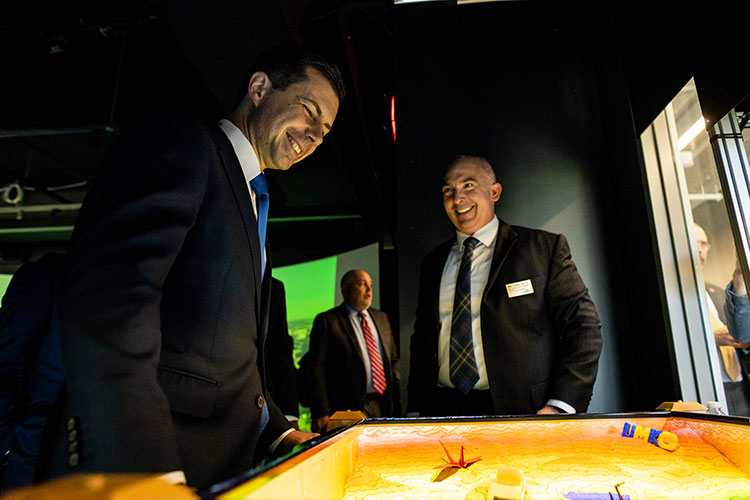
The grant will reinforce the university as an innovator in environmental transportation
U.S. Secretary of Transportation Pete Buttigieg visited the University of Missouri-Kansas City to discuss a new $10 million federal grant awarded to the School of Science and Engineering to develop innovative approaches to improve the sustainability and equity of transportation infrastructure. The grant will provide $2 million annually for five years.
"It's a big deal. To be among those selected really reflects well on this institution," said Buttigieg, who toured labs at the Robert W. Plaster Free Enterprise and Research Center at UMKC while he was in town to visit the new Kansas City International Airport terminal. He discussed the Bipartisan Infrastructure Law-funded grant with students. Robert Hampshire, deputy assistant secretary for research and technology, and chief science officer at the U.S. Department of Transportation, joined him.
The grant was highly competitive: UMKC was among 20 selected from 169 universities to lead Tier 1 University Transportation Centers for underserved and disadvantaged populations. UMKC will work in consortium with Tennessee State University, Texas State University, the University of Louisville and Washington State University, and focus on preserving the environment. UMKC was the only university in the state of Missouri to be selected in this round of funding and was chosen because of its transportation research and project expertise in a city environment. The Plaster Center, from roof to ground floor, is built with labs that work on transportation innovations, including:
Sidewalk technologies that won’t freeze in the winter and aren’t too hot in the summer
Improved bus-stop surroundings for all seasons
Drones that help inspect bridges and deliver packaged goods
3D printing that can simulate vehicle parts
Methods to make more durable concrete for highways and road
“With this grant, our urban, public-research university and its partner institutions will work collaboratively to perform cutting-edge research and to help build an environmentally responsible, 21st century U.S. transportation infrastructure,” said UMKC Chancellor C. Mauli Agrawal. “It is a great opportunity for our students and our community.”
UMKC is integrally involved in major transportation projects across Kansas City:
Bloch School of Management students consulted on new employees’ transportation needs for the $1.5 billion KCI Terminal opening Feb. 28. Faculty and alumni have served additional roles on the project including construction, communications and art.
The Kansas City Area Transportation Authority collaborated with the UMKC Center for Economic Information to better understand the economic impact of its zero-fare policy. The UMKC center’s analysis found the regional Gross Domestic Product will increase between $13 million and $17.9 million as a result of ZeroFare KC.
In two years, the Kansas City Streetcar will have its southern-most stop at UMKC upon completion, extending the existing route from the River Market straight to the university’s doorstop.
Ceki Halmen, UMKC associate professor of the natural and built environment, is program director of the grant. Hired in 2008 at the university, his research focuses on corrosion of steel and the breakdown of concrete, and finding ways to make more sustainable and durable materials to improve quality of life.“Transportation conveys substantial socioeconomic benefits but at the same time impacts the environmental systems,” Halmen said. “As transportation planners face the evolving challenges of aging infrastructure, funding constraints, climate change and shifts to multimodal transportation systems, guidance is needed on how transportation decisions impact the environment, especially for disadvantaged or overburdened communities.”
Feb 27, 2023
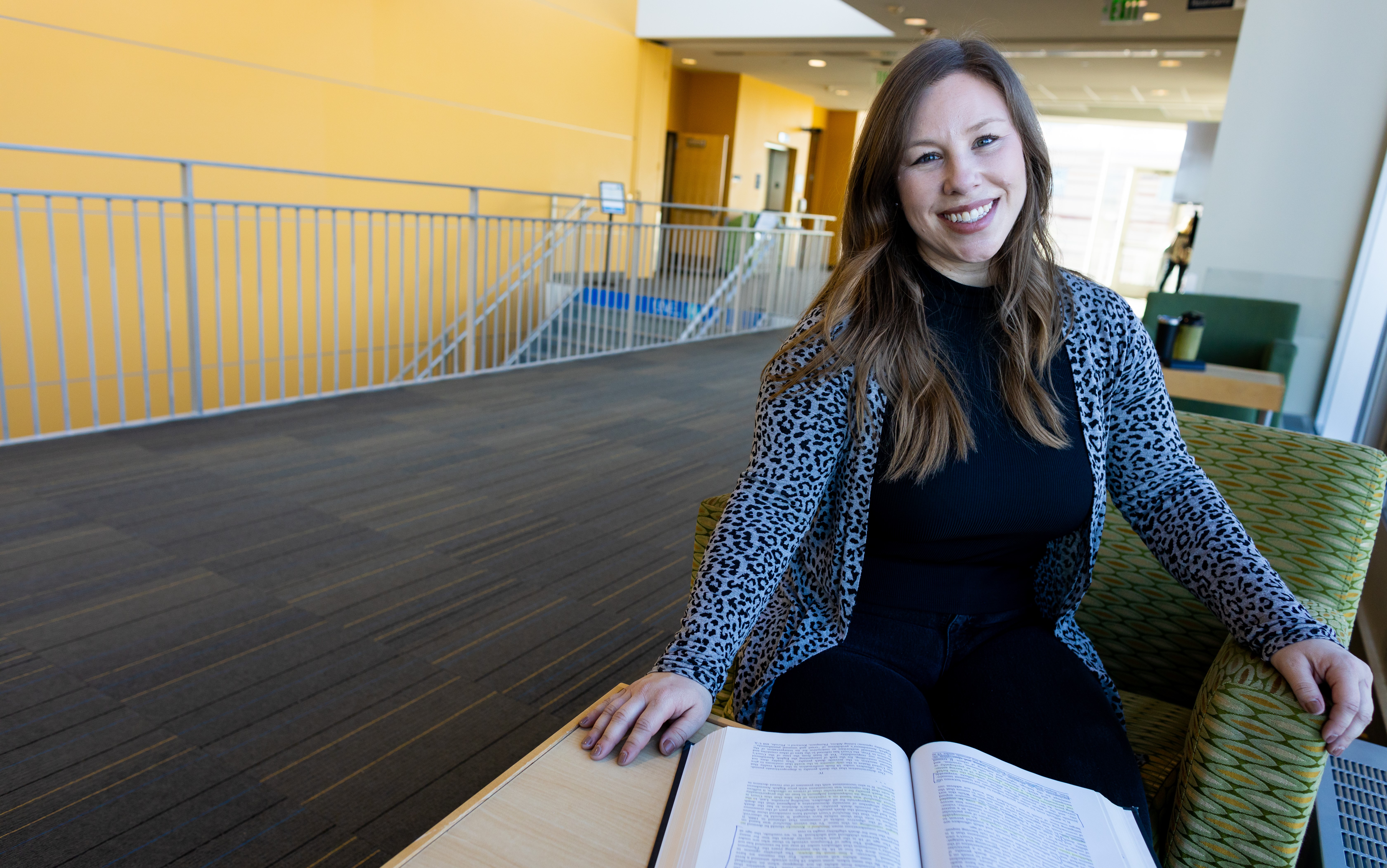
UMKC School of Law Campaign for Advocates is making a difference
The UMKC School of Law is recognized consistently for the education and preparation of students focused on advocacy.
The Campaign for Advocates is a $1 million campaign initiated to increase’ opportunities for students in this area through support of scholarships and advocacy competition travel and expenses. The campaign has raised more than $600,000; lead gifts supported a faculty fellowship to fund coaching for the trial advocacy teams. Scott Bethune (J.D. ’88) and Kent Emison (J.D. ’81), are campaign co-chairs, and David Mayer (J.D. ’92), managing partner Monsees & Mayer, P.C., and Jim Bartimus (J.D. ’77) created the first two endowed scholarships to support the Campaign For Advocates.
Mayer worked while he attended law school, and he knows the challenges that juggling school and employment present to law students. As a scholarship recipient during his time at UMKC, he is dedicated to supporting the Campaign for Advocates because of the assistance it provides.
“Many students come to law school with debt from their undergraduate education,” Mayer says. “I know that potential students consider the available scholarship funding when they are choosing a law school. The more talent we can keep or attract is a bonus to the law school and Kansas City.”
Stephanie Landers (J.D. ’23) is one of the first recipients of the Monsees & Mayer Endowed Scholarship. She was a teacher when she decided to go to law school.
“I have always had a huge heart for helping people who don’t have a voice,” Landers says. “After 10 years of teaching I wanted to make a career change where I could truly advocate for people every single day.”
Nervous about going back to school, Landers applied to 10 law schools and was accepted to all of them. One of the schools that accepted her offered her a full tuition scholarship.
“When I was deciding, I remembered touring UMKC and seeing professors and students in the hallways having conversations,” Landers says. “It felt like family, and it felt like home. I accepted the offer from UMKC the next day. I knew it was where I was supposed to be.”
Initially interested in family law, she participated in “Last Man Standing,” a mock trial challenge, her first year.
“I fell in love with litigation,” Landers says. “I love being in the courtroom and advocating. The whole reason I came back to law school was to give hope to people who didn’t have a voice. That part of advocacy is important to me.”
Even though Landers worked full time during law school, receiving the scholarship this year has been essential.
“I’m sitting for the bar and the help with bar preparation has been critical.”
Steve Leben, Douglas R. Stripp Missouri Distinguished Professor of Law, is committed to furthering opportunities for advocacy students.
“We provide critical support to all of our students, but establishing endowed scholarships ensures that we can recruit more effectively,” Leben says. “In addition, the support is important for advocacy students who are unable to work as much as they’d like because of the preparation for advocacy competitions. These funds help our students, but also the potential clients who need their skills.”
Mayer knows that the scholarship funding will make a difference for the students.
“I’m a firm believer in the quality of students who attend UMKC School of Law,” Mayer says. “We want to continue to attract the highest level of talent. It’s good for UMKC and the Kansas City legal community. That’s what made our firm want to give back – to UMKC and to the students at the School of Law.”
Feb 23, 2023
UMKC Alumni Association honors the Accurso Family with the 2023 Legacy Award
Each year, the UMKC Alumni Association recognizes the achievements of outstanding alumni with an awards celebration. UMKC is honoring the Accurso family with its Class of 2023 Legacy Award.
The Accurso family’s legacy at UMKC dates back to the 1940s when Joseph Accurso attended UMKC, then known as Kansas City University. Members of the family have graduated from nearly every program on campus, including the College of Arts and Sciences, Henry W. Bloch School of Management, School of Biological and Chemical Sciences, School of Education, School of Law and School of Medicine.
Left to right: Joseph Accurso and Tammy Dickinson
Alumni include Joseph’s nephew, Lou Accurso (B.A. ’78, J.D. ’81) and Lou’s sons Christopher (B.A. ’11, J.D. ’14), Anthony (M.D. ’12) and Patrick (J.D. ’18). Many other family members have attended, including Michael C. Accurso (B.B.A. '82), Melissa Accurso (B.A. '88), Joseph M. Accurso (B.A. '96), Tammy Dickinson (J.D. '98), Terri Accurso (B.A. '02, M.A. '12), Danielle Roy (M.S. '09) and Nicholas Accurso (B.B.A. ’20).
“I chose to study at UMKC because it allowed me to obtain a world-class education while being able to hold a job,” Lou said. “It turned out to be the greatest single investment of my life. Being a Roo brings a sense of bonding among my family; it’s part of our commitment to the community.”
Residents of Kansas City may recognize the name from the Accurso Law Firm, one of the city’s most well-known law firms. Founded by Lou in 1988, Lou and Christopher work in the firm as trial attorneys. Lou is a renowned attorney, with many successes in both state and federal courts.
Left to right: Patrick. Lou and Christopher Accurso, Photo by Brandon Parigo | UMKC
Lou’s son, Patrick, is currently an assistant prosecutor with the Jackson County Prosecutor’s Office, which has been a launch pad for several members of the Accurso family. Lou and Christopher both began their legal careers there, and Tammy Dickinson, sister to Lou, was an assistant Jackson County prosecutor for 15 years.
“I knew that I wanted to be a trial attorney when I started law school, it was my second profession,” Tammy said. “There really wasn’t any other institution that I would have considered attending. I knew that I could get an excellent education in my hometown and would have opportunities that I couldn’t get elsewhere.”
Tammy went on to become the United States Attorney for the Western District of Missouri, where she worked to create the intensive drug treatment court program to provide sentencing alternatives for those convicted of drug-related crimes.
The Accurso family’s impact goes beyond the courtroom. Anthony Accurso, Lou’s son, is an oncologist and hematologist in Hays, Kansas.
“My family’s legacy at UMKC proved to me that I didn’t need to go to a prestigious private university or Ivy League college to receive a great education,” Christopher said. “Our family’s legacy demonstrates that anyone can receive an excellent education and find success in any number of professions with a degree from UMKC.”
Feb 22, 2023
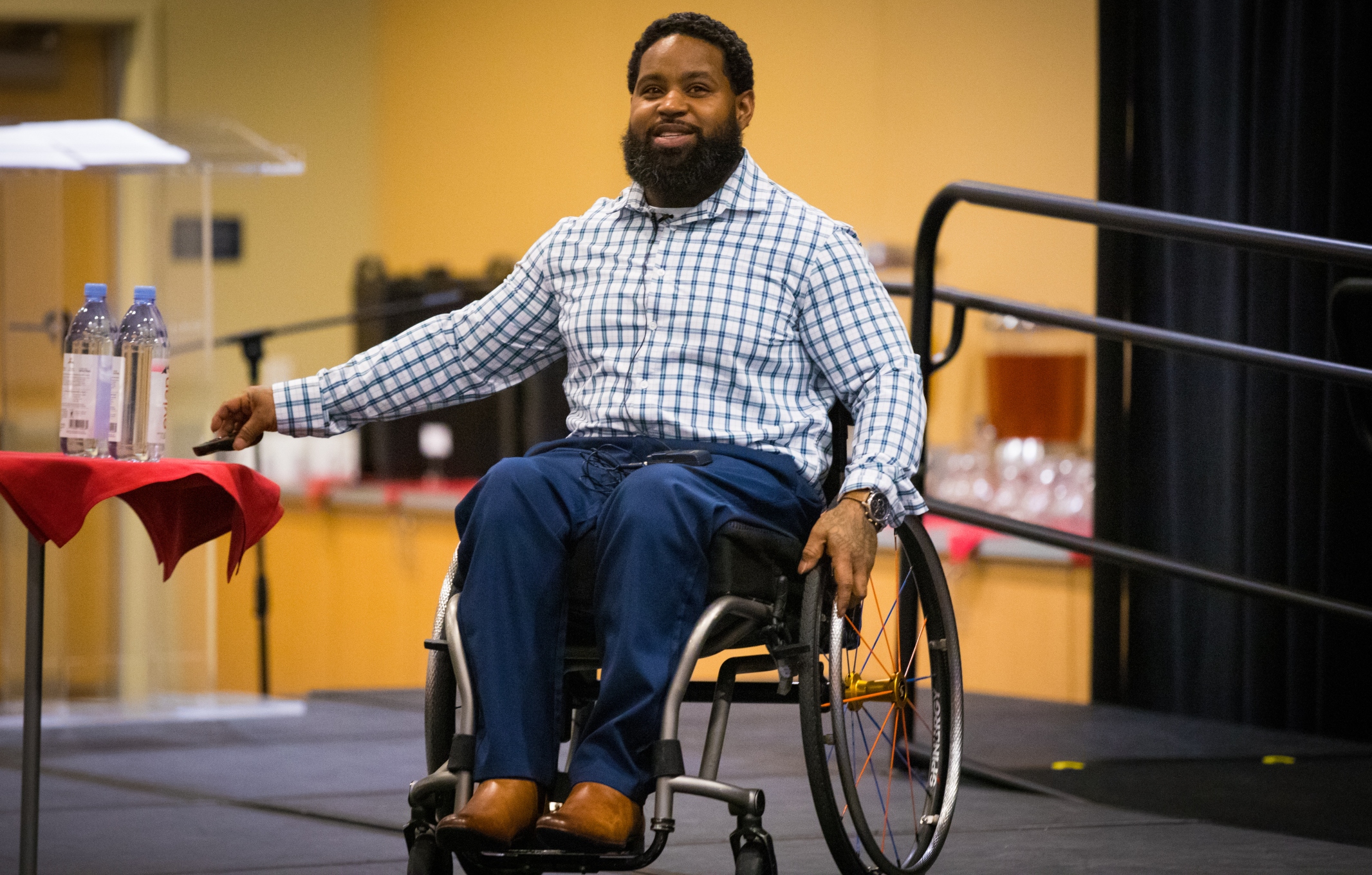
Disabled But Not Really founder Wesley Hamilton shares his path to empowerment
The African American Student Union (TAASU) Freedom Breakfast was created to commemorate the legacy of Martin Luther King Jr., promote unity and harmony within the UMKC community and celebrate the university’s values of diversity, inclusion and respect.
This year marked the 32nd anniversary of the breakfast and included student performances. Michele D. Smith, vice provost for student affairs, dean of students, recognized the importance of TAASU and the Multicultural Student Association.
“Love, peace and equity still have a way to go,” Smith said. “But we are committed to progress and change by developing and sustaining a culture of inclusion.”
Keynote speaker Wesley Hamilton, Disabled But Not Really founder, spoke about his life growing up on Kansas City’s Eastside. Hamilton moved out of his family’s house at 16 years old. A single parent at 22, he was shot three times in the back just after his 24th birthday.
TAASU Freedom Breakfast Contributors
Left to right: Keichandra Dess-Burnett, Malowa Mays, Makiya Carmons, Noma Ruben, Jalyn Williams, Khalil Shelton, Khyra Curtain, Ta'Sha Lumpkins
He spent three years in recovery from a spinal cord injury that left him paralyzed below the waist. His rehabilitation led to a focus on health, and competition as an adaptive bodybuilder. Hamilton founded Disabled But Not Really, an organization designed to bring positivity and hope to the disabled community.
“I have not had a lot of opportunity to celebrate my Blackness,” Hamilton said. “It’s good for people to see the journey.”
Hamilton, who was featured on “Queer Eye for the Straight Guy” in Kansas City, is focused on serving communities better to support mental health and self-esteem.
“Slavery, Jim Crow, high levels of stress, anxiety and depression have a profound impact on our daily lives. We need to do more.”
Feb 16, 2023
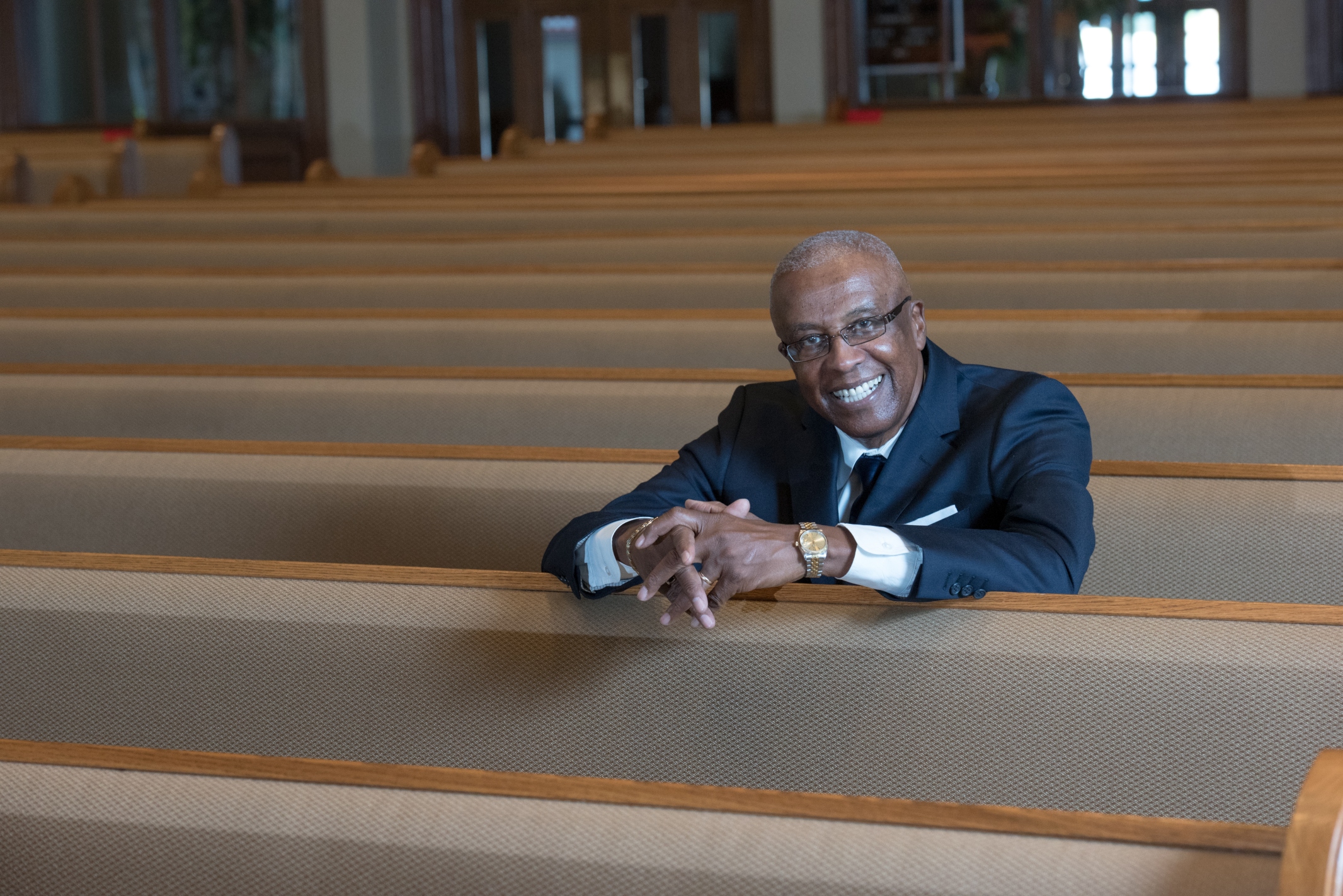
Rev. Carl Moore (BME ’68) shares his journey through music, business and faith
Each year, the UMKC Alumni Association recognizes the achievements of outstanding alumni with an awards celebration. UMKC is honoring Rev. Carl Moore (BME ’68) with its Class of 2023 Defying the Odds Award.
Rev. Moore arrived in Kansas City in 1960 after one year at Alabama State College. During his time there, he was arrested for protesting racially inequality and not allowed to return to school. His mother put him on a train to Kansas City which led him to enroll in the University of Missouri–Kansas City that fall.
Moore graduated from the UMKC Conservatory of Music with a degree in music education to embark on a career as a high school teacher, a business executive for IBM, as well as a senior pastor for over 24 years.
How did UMKC prepare you for/contribute to your success?
UMKC provided wonderful, caring and encouraging professors; I met great people and lifelong friends, assuring me that I had something to offer the world.
What has music meant to your life?
Music is a unifying force, generating love, happiness, a calming influence and a sense of joy. Music has stirred the deepest emotions in my life.
How do you believe young people can make a difference in their communities?
Young people can make a difference by focusing on education, making good choices, being role models and by setting high, but realistic, goals for their lives.
What advice do you have for students who would like to follow in your footsteps?
Students need to know “they can.” Paul, the Gospel writer, said, “I can do all things through Him who gives me strength.”
Feb 15, 2023

Sean O’Brien is also a School of Law professor
Each year, the UMKC Alumni Association recognizes the achievements of outstanding alumni with an awards celebration. The university and the association are honoring Sean O’Brien (J.D. ’80) with the Class of 2023 Alumnus of the Year Award.
O’Brien became interested in the practice of law at his first traffic stop.
“I was 16 years old and the man who was running for sheriff came to my car after the police officer left,” O’Brien remembers. “My dad’s car had the candidate’s sticker on it, and he told me that since I was a constituent, he could arrange for the ticket to disappear.”
When O’Brien recounted the story to his father, his dad was furious.
“He called the man and told him that law should work for everyone,” O’Brien says. “That was my first lesson in equal protection, and it stuck.”
Following law school, O’Brien experienced another defining moment in his career in the face of inequity.
“At breakfast at a local business organization, the keynote speaker used the appointment of the honorable Fernando Gaitan’s (J.D. ’74) appointment as a springboard to everything wrong with the justice system based on his race. I walked out and turned in my notice without another job to go to.”
“UMKC School of Law prides itself on producing practice-ready lawyers, and that was true in my case.” - Sean O'Brien
A month later, O’Brien interviewed with Chief Public Defender Jim Fletcher.
“It felt like coming home,” O’ Brien says. “They offered me a job on the spot. I took it and never looked back.”
In 1988 Senator Tom Eagleton, Robert Popper, dean, UMKC School of Law , professors Ellen Suni and Nancy Levit wrote a grant to create the Missouri Capital Punishment Resource Center to recruit and train good lawyers to assure that people sentenced to death have access to legal representation when they need it. Already recognized as a tireless advocate for the wrongly convicted, they hired O’Brien to run it.
In some ways O’Brien feels that he never really left UMKC. After directing the Missouri Capital Punishment Resource Center for 15 years, Dean Emerita Ellen Suni hired him as a visiting professor. After two semesters he applied to be the permanent criminal law professor. He finds that if someone finds work that they are passionate about, it’s not really work, it’s a calling.
“I am proud of the work I have done, but my feelings about it are complicated,” O’Brien says. “It is much harder to free an innocent person than it should be and much too easy to wrongly convict them in the first place. You never lose sight of how much these innocent men and women have lost during their years or decades of wrongful incarceration, and how deficient our social safety net is.
“It’s a struggle for them to find work, health care and housing. Some do find good jobs and create happy, productive lives, but they all suffer some degree of post trauma stress injury, especially people exonerated from death row. The day they walk out is just the beginning of a new struggle.”
O’Brien considers his most significant professional accomplishment the Supreme Court victory in Schlup vs. Delo, a landmark case which set the standard for innocence claims in federal habeas corpus proceedings.
“It’s impossible to brief an innocence argument anywhere in the country without relying on Schlup. It has helped free hundreds of people from prison.”
He credits his education at the UMKC School of Law for providing the foundation for his success.
“UMKC School of Law prides itself on producing practice-ready lawyers, and that was true in my case.”
But his proudest accomplishment is not related to his career.
“I have two amazing daughters who are brilliant, creative and curious,” O’Brien says “I am prouder of them than anything I have done professionally.”
Feb 14, 2023
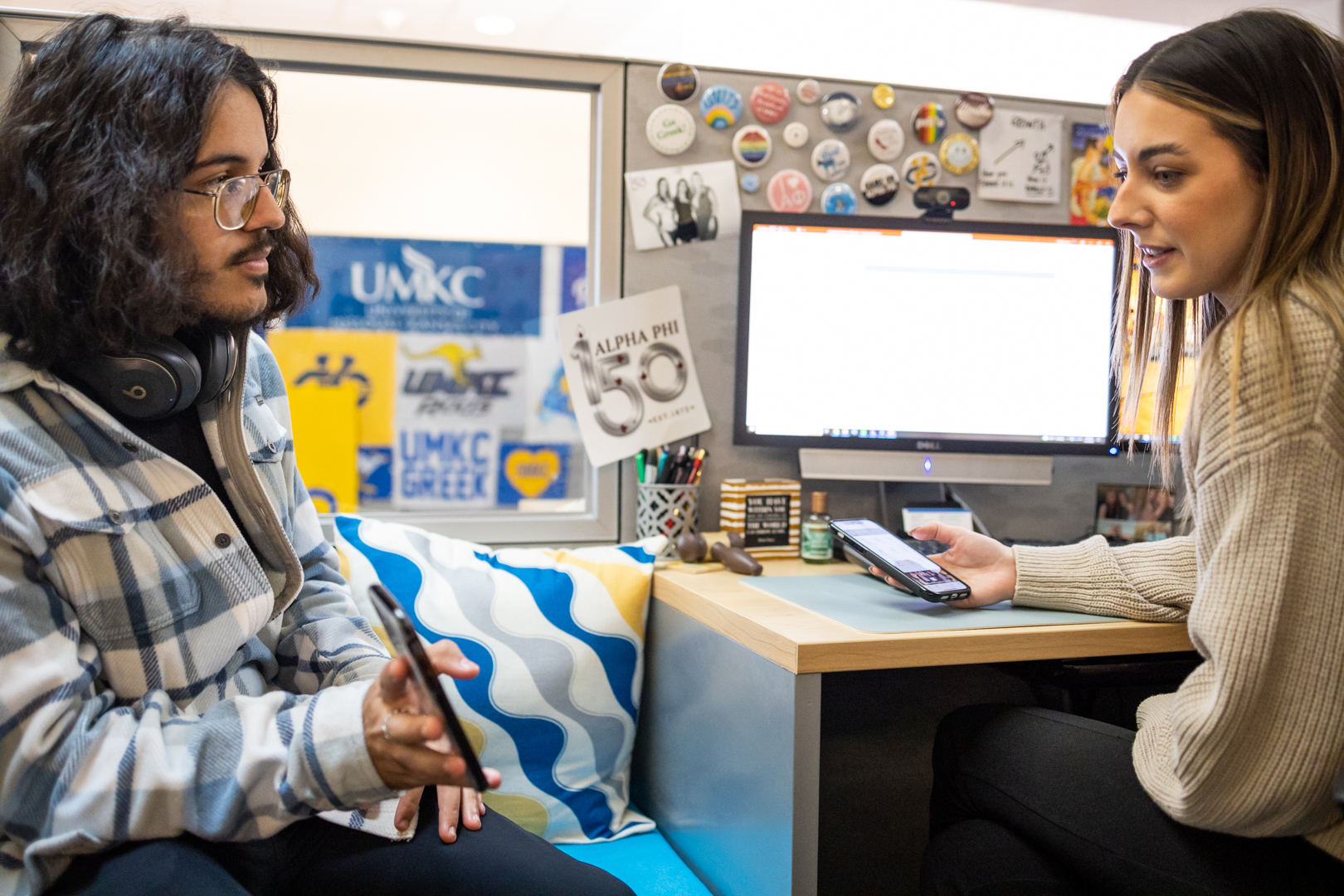
Colton Stewart is already meeting potential future employers through UMKC Professional Career Escalators
Roos don't just dream, they do. Our students turn ideas into action every day. Get to know our people, and you'll know what UMKC is all about.
Colton StewartAnticipated graduation: 2026Academic Program: law and justice track, Professional Career EscalatorsHometown: St. Louis
Colton Stewart understood early on the value of networking and making connections to long- term career success.
When he learned that such connections are one of the primary benefits of a new university program, he made the cross-state leap from St. Louis to Kansas City to pursue his career in criminal justice.
Stewart enrolled in the Professional Career Escalators program at the University of Missouri-Kansas City. It’s a comprehensive career-development program designed to propel students from their academic studies to high-paying careers by providing a dedicated, GPS-guided path from enrollment to workforce.
It didn’t take long for the program to deliver.
“I am being connected to opportunities I had no clue existed, like a huge police job fair which granted me the opportunity to speak with many police departments as well as FBI, ATF and the Missouri State Highway Patrol,” Stewart said. “The Professional Career Escalators might also connect me to a paid police internship this summer, so the benefits of the program are extensive.”
The Professional Career Escalators program is a unique, trademarked system of personalized support and services unlike anything being offered across the U.S. It prepares students for careers in four key areas of workforce demand: law and justice, engineering and business, education and health care.
Each semester, students participate in the five Professional Career Escalators core experiences: career guidance and development; experiential learning opportunities (such as job shadowing and internships); mentoring with faculty experts and community professionals; graduate and professional school preparation; and leadership development.
“UMKC has amazing connections to Kansas City and to the law enforcement field, so they can easily get their students paired to careers and opportunities,” Stewart said.
Why did you choose your field of study?
It has been something I always wanted to do as a kid. Criminal justice has always been a life long passion for me and now I am able to truly study it.
Why did you choose UMKC?
I chose UMKC for the unique opportunities it had for my field and was able to give me new life experiences in the heart of Kansas City. Its diversity and student involvement really attracted me to the University.
Since entering college, what have you learned about yourself?
I have learned the boundaries of my patience while in college and how much I am able to mentally multi-task at once. I have also learned that everyone's paths are different and that it's never going to be just straight forward.
Are you a first-generation college student?
Yes. It means a lot to me. It means that I can do much more than my family before me and give much more to the family after me. It means that I have accomplished a great deal in the family as well, and that I am making a name for us.
Do you have any scholarships?
I have multiple scholarships. One for the Professional Career Escalators program, one for being a first-generation college student and one for being multiracial. They mean a great deal to me because they made me feel secure and accomplished.
What other extracurricular activities are you involved in at UMKC?
I am involved heavily in Greek life within my chapter of Kappa Sigma to which I also serve on the Interfraternity Council as the Vice President. I am also heavily involved with the new campus program Men of Color Academy. I am also involved with many other organizations and programs like ASIA, FBI Academy, Professional Career Escalators and more.
Feb 08, 2023

These two super-proud alums lead the success
No doubt and nothing subtle about it, aside from Arrowhead Stadium, Union Station is Kansas City’s most popular spot for celebrating the Chiefs inside and out.
At night, the massive 109-year-old beaux-art limestone building exterior is illuminated in the team’s colors, a glowing red-and-gold beacon in the skyline. Step through the doors any time of day, and there’s a gigantic fan zone to match.
An enormous Chiefs flag hangs from the ceiling of Union Station’s Grand Plaza. And in other prominent spots, there’s a large screen with Chiefs season highlights surrounded by historic and modern artifacts, a store packed with red merchandise and a brilliantly lit AFC Champions marquee sign designed for seriously stellar selfies and photo ops.
Two Roos and their creative teams are at the center of it all. George Guastello (B.B.A. ’82, M.B.A. ’84) has been president and CEO of Union Station since 2008. Michael Tritt (B.S. ’86) has served as the Union Station chief marketing officer for the past decade.
George Guastello, president and CEO of Union Station, at left, stands next to Kansas City Chiefs CEO Clark Hunt and former Chiefs player Bobby Bell at Union Station.
“We add to the experience each year,” Tritt said.
Indeed, baby goats in Chiefs jerseys that appear on weekends have been added to the mix because, duh, the Chiefs have a quarterback destined to be the Greatest Of All Time.
Rewind to three years ago when Union Station was the rally center of the championship parade after the Chiefs won the Super Bowl in 2020.
“Union Station has the size, location and history to make it the most popular destination to host such festivities,” Guastello said. “For more than a century, the monument has been the scene of celebrations of every size and for every reason. Wartime reunions. Business gatherings. Proposals. Weddings. Civic events. And millions of moments that write personal stories to last a lifetime.”
KC Wolf, Kansas City Chiefs mascot, stands next to Michael Tritt, chief marketing officer of Union Station. The flag in the background mentions the 2023 NFL Draft, which will be held in April at Union Station.
Another Roo connection to Union Station: UMKC Chancellor Mauli Agrawal is on its board of directors.
“Union Station is happy to host every one of these special moments and humbled by the outpouring of gratitude we receive as a result,” Tritt said.
Attendance this year to Union Station’s fourth annual Fan Zone is expected to set a new record, with more than 160,000 guests visiting the lights, sounds and selfie opportunities made available by Union Station and its community partners. And yes, they’re ready to host another rally, fingers crossed, with even more crowds who are part of the devoted Chiefs Kingdom.
Feb 08, 2023
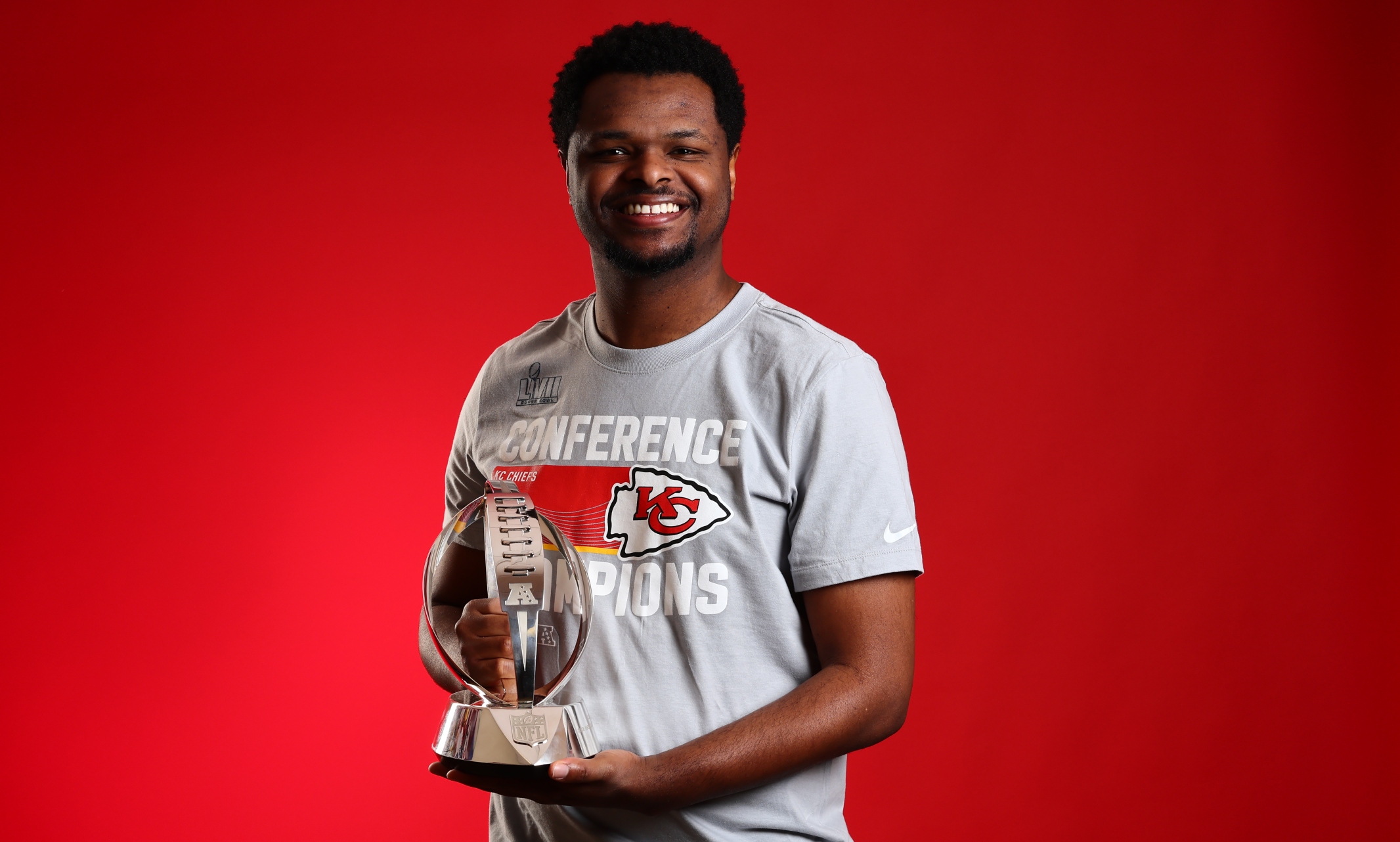
Working for the Super Bowl-bound team was first job for UMKC alumnus
All of Kansas City is cheering for the Chiefs’ Super Bowl victory. Ishmael Shumate, BBA ’20, MBA ’22 will be at the game as a fan and employee.
Why did you choose UMKC? And what made you decide to pursue your MBA?
I was born and raised in Kansas City, and I have always known UMKC has a reputation for excellence and high-quality education. I thoroughly enjoyed my undergraduate experience in and outside of the classroom and wanted to continue my education at UMKC.
How has it helped you pursue your career?
What I learned at UMKC continues to impact me in my career. I continue to use what I learned at UMKC in my day-to-day responsibilities at the Kansas City Chiefs. Another benefit is that the teachers were not only teaching, but truly engrained in the Kansas City business community. This led to a multitude of opportunities and connections throughout my short career.
Working with the Chiefs must be amazing! Tell me how that came about and how your Bloch MBA helped.
I always knew that I wanted to be in the nonprofit sector. While I was pursuing my MBA at UMKC, I was a nonprofit accountant and I learned about the financial components of operating a nonprofit. This helped me to connect with others in this sector and learn more about the management and fundraising components. When I learned about the opening at the Kansas City Chiefs, I had the skills they were looking for in an applicant. I applied, got an interview and the rest was history!
What do you do in your current position?
I am the coordinator of philanthropy and community programming at the Kansas City Chiefs. My job responsibilities include working with the Hunt Family Foundation, player foundations and Kansas City Chiefs community programs.
Last question, are the Chiefs going to win the Super Bowl?
On a daily basis, I see how the players, coaches, trainers and business staff at the Kansas City Chiefs give their all each day. You always want to win, so I hope this hard work will pay off and we will be crowned as champions at Super Bowl LVII!
Feb 06, 2023
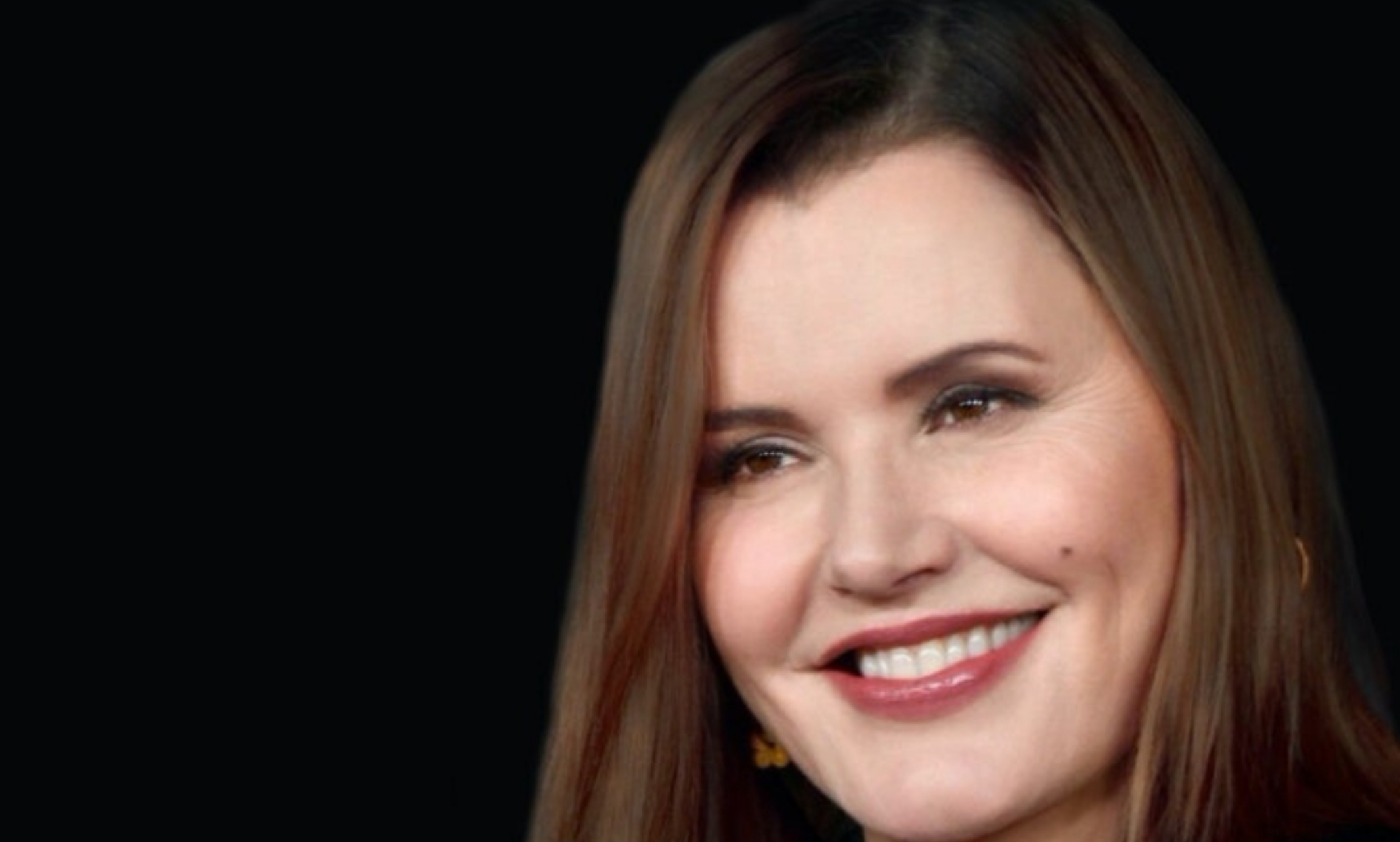
The Starr Women’s Hall of Fame induction to honor extraordinary women who have made their mark on Kansas City
Geena Davis, whose acting and activism have elevated gender parity, will be the featured speaker at the March 21, 2023, induction ceremony for the Starr Women’s Hall of Fame.
Geena Davis Interview on KCUR “Up to Date”
Transcript (DOC)
Download audio
Davis’s award-winning work in television and film and as the founder and chair of the Geena Davis Institute on Gender in the Media has established her as an industry leader in drawing attention to gender equality on screen.
“We are proud and honored that Ms. Davis is headlining this event,” Alicia Starr, co-chair of the hall of fame planning committee said. “She’s a shining example of the achievements that we honor through the Starr Women’s Hall of Fame – community enhancement, leadership and the development of opportunities and recognition for women’s accomplishments, as well as developing resources that further women’s opportunities. Her focus on research and empowering women and girls is directly in line with our objectives in honoring Kansas City’s influential women.”
Davis secured her first film acting role in “Tootsie” in 1982. She has been a working actor since, starring in popular movies like “A League of Their Own” and “Thelma and Louise.” She received an Oscar for her starring role in the “The Accidental Tourist” in 1988 and a Golden Globe for her turn as America’s first female president in the 2005 television series “Commander in Chief.”
In 2019, the Academy of Motion Picture Arts and Sciences honored Davis with a second Oscar, the Jean Hersholt Humanitarian Award, in recognition for her work to achieve gender parity in film and television. Beyond industry accolades, Davis’s work exemplifies the vulnerability and triumph of women’s successes professionally and personally.
The Emmy Awards presented Davis with the Governor’s Award in 2022 for her groundbreaking work with the Geena Davis Institute on Gender in the Media, which she founded in 2004 to create gender balance, foster inclusivity and reduce negative stereotyping within the family entertainment media. The organization uses data-driven research, education and advocacy to empower and inspire content creators to provide inclusive content. In addition, they have developed research tools for content evaluation: Geena Davis Inclusion Quotient (GD-IQ) and Spellcheck for Bias.
This year’s induction event is at the Kauffman Center for the Performing Arts, Tuesday, March 21, 2023, at 4 p.m. Tickets are available through the Kauffman Center for the Performing Arts.
The Starr Women’s Hall of Fame is dedicated to recognizing extraordinary women and preserving the history of their accomplishments. These women are social reformers, volunteers, philanthropists, civic leaders, activists and educators. They are neighborhood leaders and grassroots organizers, from yesterday and today, both famous and unsung. They are movers and shakers whose tireless commitment to community has made Kansas City a better place to live. The Hall of Fame is a repository for their legacies. By sharing their stories, the Hall of Fame encourages and inspires women everywhere. Biographies of the past inductees are available at Starr Women's Hall of Fame.
The Hall of Fame is named in honor of Martha Jane Phillips Starr, a legendary activist and philanthropist who blazed a trail for family issues and women’s rights. The Hall of Fame is made possible through the Starr Education Committee, Martha Jane Starr’s family and the Starr Field of Interest Fund, which was established upon her death through the Greater Kansas City Community Foundation. The idea for the Starr Women’s Hall of Fame stemmed from Starr Education Committee members.
A permanent display honoring Hall of Fame members is open to the public on the third floor of the Miller Nichols Library at the University of Missouri-Kansas City. The library is at 800 E. 51 St., Kansas City, Missouri.
The civic organizations that advocate on behalf of women and family issues and have signed on in support of the Starr Women’s Hall of Fame include: American Association of University Women, American Business Women’s Association, Association for Women Lawyers of Greater Kansas City, Central Exchange, CBIZ Women’s Advantage, Girl Scouts of NE Kansas and NW Missouri, Greater Kansas City Chamber’s Executive Women’s Leadership Council, Greater Kansas City Women’s Political Caucus, Jackson County Missouri Chapter of the Links, Inc.; Junior League of Kansas City, Missouri; KC Metro Latinas, Kansas City Athenaeum, Kansas City Young Matrons, OneKC for Women, SkillBuilders Fund, Soroptimist International of Kansas City, Soroptimist Kansas City Foundation, UMKC, UMKC Women’s Center, UMKC Women’s Council, UMKC Women of Color Leadership Conference, United WE, WIN for KC, win|win, Women Leaders in College Sports, Women’s Public Service Network, Zonta International District 7 and Zonta Club of KC II.
Buy Tickets Now
Feb 01, 2023
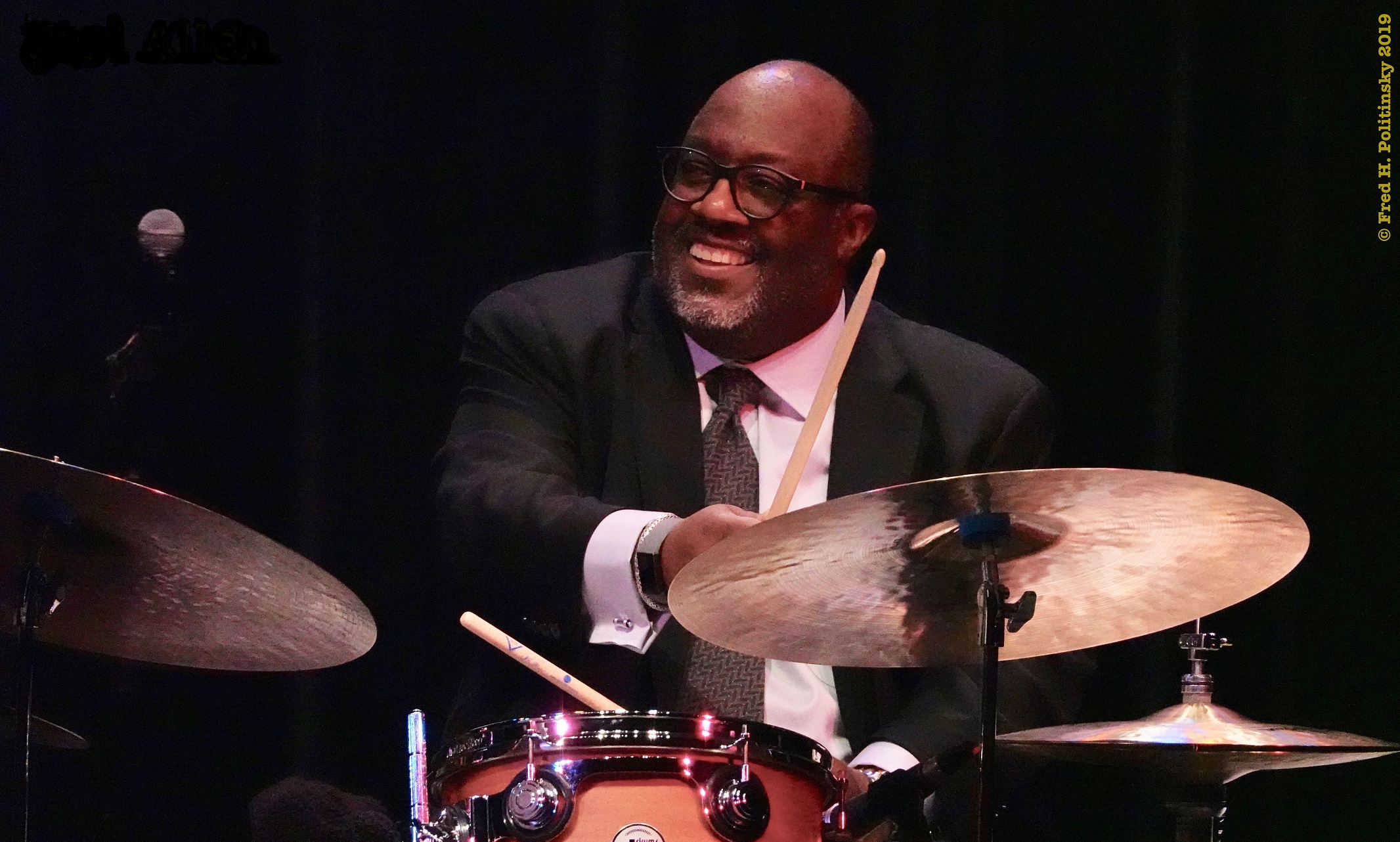
Carl Allen is the drummer on a record nominated for Best Large Jazz Ensemble
Carl Allen, William D. and Mary Grant/Missouri Endowed Professor of Jazz Studies, is the drummer on “Remembering Bob Freedman,” a tribute album to the celebrated music arranger nominated for a 2023 Grammy Award for Best Large Jazz Ensemble.
When asked about the Grammy nomination, Allen said it was a pleasant surprise. His casualness about the nomination could be because he’s been featured on Grammy-nominated ‑ and Grammy-winning ‑ records before. It could also be because Allen’s focus in music isn’t on awards, but the love and community involved in making it.
“Competition and music don’t always go together for me, I don’t like keeping score,” Allen said. “It’s the love and support – all of the awards and accolades should never overshadow the music itself.”
Allen’s belief in community is part of what drew him to teaching. He is in his second year at UMKC; prior to that, he taught at Juilliard for 14 years, including six years serving as artistic director of jazz studies.
“One of the reasons why I’m drawn to teaching is I really enjoy helping young people, “Allen said. “When you see a person who has a gift and burning desire to get better, you want to try and create opportunities for them. I’m trying to create a nurturing environment here where people feel supported.”
The environment is part of what drew him to UMKC. Allen’s predecessor as professor of jazz studies, Bobby Watson, is also personal friend of many years. When Watson retired, Allen knew the opportunity was worth pursuing.
“I knew I wanted to be part of a program that was respected by leadership. When the music is respected, you can get traction to really get things done,” Allen said. “When I came for the interview and met the dean and faculty, I felt that the music was really respected and part of a larger vision.”
“When you see a person who has a gift and burning desire to get better, you want to try and create opportunities for them. I’m trying to create a nurturing environment here where people feel supported.” - Carl Allen
In his time at UMKC, Allen has created more opportunities for students and faculty to be a part of that larger vision. He invites in faculty who may not traditionally be involved in the jazz program so that his students are exposed to more perspectives and teachings. He also brings in guest artists to teach workshops and master classes.
“Professor Allen has played with many of the greats, and he has countless anecdotes and information that he shares with students,” said Pete Fucinaro, UMKC Conservatory graduate student in music. “I don’t think there has been a single musician or record I have mentioned that he has not heard. He is deeply invested in the music and traditions.”
“Part of the jazz tradition is ‘each one, teach one,’” Allen said. “You should always try to help people because other people helped you, it’s how we further the music. Relationships and resources are cyclical, you’ve got to create relationships with people.”
Relationships have contributed to Allen’s success in music, including his most recent Grammy nomination. Allen has played with Ron Carter, legendary bassist featured on “Remembering Bob Freedman,” many times throughout his career. When asked to play with Carter at the Jazzaar Festival in Switzerland in a concert to honor Freedman, he knew he couldn’t pass up the opportunity. He didn’t know it would lead to a Grammy nomination.
“Playing with Ron, that’s history. He’s in the Guinness Book of Records as the world’s most recorded jazz bassist,” Allen said. “When I got the call to play at the festival, there was no talk of an album – it was just the festival and a couple of concerts. They recorded the festival performance and here we are.”
You might think that earning Grammy nominations and wins is a highlight of Allen’s career. But when asked about highlights, Allen told the story of a former student of his who went on to become a professional musician.
“When I think about all of things I’ve done and the people I’ve played with, making an impact on people is just as important to me,” he said. “The way I see it, I’m just a vessel. I’m just an instrument being used to try and help people.”
Jan 31, 2023
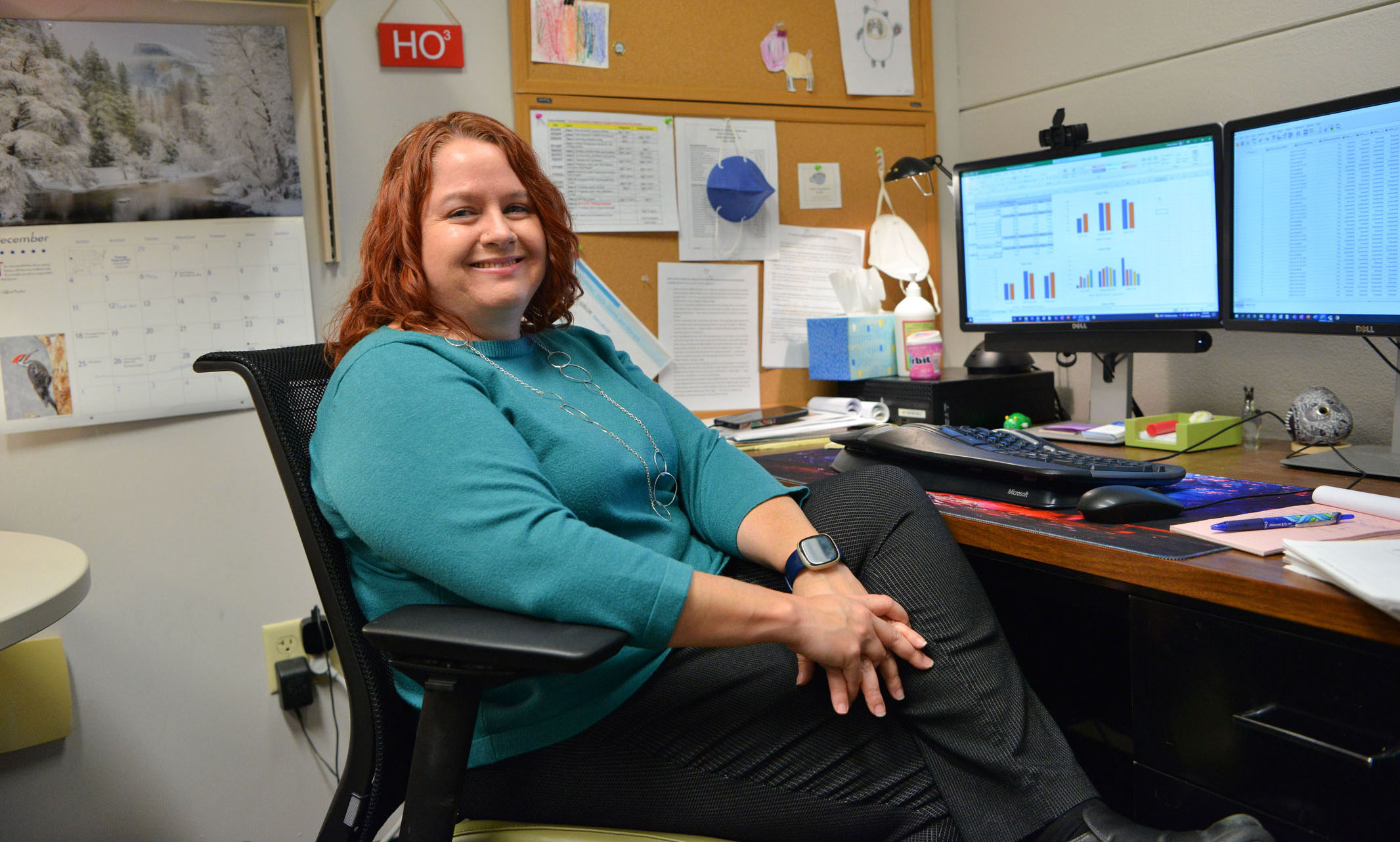
Joanna Scott shares love for numbers and helping people
Early in Joanna Scott’s career, she quickly saw the incredible opportunity dentistry offered her in affecting the health of patients. “I was in pediatric dentistry for a long time,” she said. “You see a 4-year-old child come into a clinic where they already need to have all their teeth extracted because they didn’t have the toothbrush training they needed for proper oral hygiene. It’s heartbreaking and you can really see how big of an impact you can have.”Scott earned her Ph.D. in biostatics from the University of Washington in 2008. She teaches research methodology and biostatistics to UMKC School of Dentistry advanced-education students who have already graduated from dental school and are pursuing specialty certificates in areas such as orthodontics or periodontics. “I grew up loving math, but I really wanted to use math to help people,” Scott said. “Biostatistics was a beautiful marriage of using mathematical skills to directly impact people.”Her students develop the abilities to fulfill the research requirements for their degrees and learn to utilize evidenced-based dentistry with their patients. Evidence-based care enables them to provide their patients with cutting edge care, whether that’s determining the best material or the best technique for any unique case they encounter. Scott’s passion for numbers is attracting recognition by the dentistry profession beyond UMKC. She received the Leaders in Evidenced-Based Dentistry award for Dental, Oral & Craniofacial Research from the American Dental Association (ADA) and The American Association. The national award recognizes significant contributions to the implementation and advancement of evidence-based dentistry.“These are skills the students can use for the rest of their careers,” Scott said. “They’ll be able to evolve with the industry and make connections with the causes of certain diseases while identifying specific risk factors.”
Jan 30, 2023
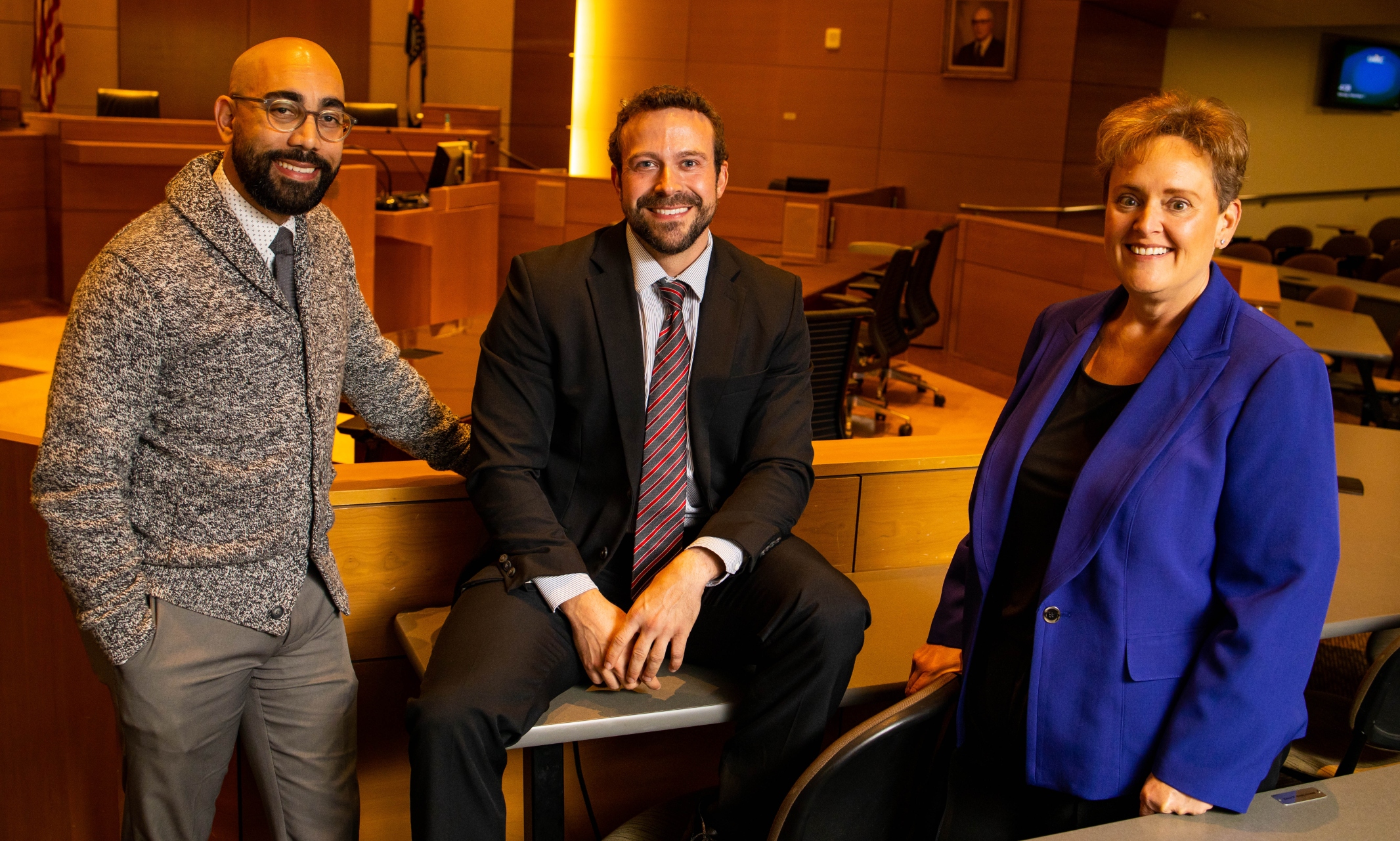
Alumni reflect on how mock trial prepared them for courtroom success
For many students at the University of Missouri-Kansas City School of Law, getting involved on campus helps to lay the groundwork for a successful career. For many alumni, getting involved in mock trial competitions during their time at UMKC has made for an especially easy transition from the classroom to the courtroom.
Anthony McDaniel (B.A. ’11, J.D. ’15) and Jared Frick (J.D. ’15) are two such alumni whose experience in mock trial prepared them for their practice today. Both competed on UMKC’s National Trial Advocacy Team, or mock trial, as it’s commonly known.
The team is a part of the UMKC School of Law Trial Advocacy Program, which is consistently ranked among the nation’s best by U.S. News & World Report, this year ranking #31 – up 23 places from 2021.
The program is designed for students who want to be a trial attorney and want to learn how to effectively represent clients in a courtroom environment without the pressure of a verdict.
McDaniel, now an attorney at Guin Mundorf, LLC in Kansas City, said his time on the team taught him skills he will carry with him for the rest of his life, both in his career and everyday interactions.
“In trial team, they teach you how to think like a lawyer. Then they teach you how to use those skills and present like a lawyer,” McDaniel said. “What makes a good trial attorney is the ability to capture a lot of information and then break it down to present it to someone in a way that is relatable and to take it to the next level — make it persuasive. That’s exactly what mock trial teaches you.”
McDaniel first became involved in mock trial competitions during his undergraduate years. That experience helped spark his interest in applying to law school. He described his time in UMKC's undergraduate mock trial as preparation for law school competitions.
“In trial team, they teach you how to think like a lawyer." - Anthony McDaniel
“It teaches you how to talk like a lawyer and how to present like a lawyer, whereas in law school, you get down to the finer points about courtroom presentation and rules,” McDaniel said. “But I always just loved the idea of standing in front of people and trying to persuade them to see things my way.”
Much the same can be said about his former teammate and friend, Frick, who was recently appointed partner at Young, Kuhl & Frick, LLC in Lee's Summit.
“What drew me to (mock trial) was the theatrics of it all. I was a musical education major for my undergrad, so I was into musical theatre and marching band and enjoyed the entertainment factor of everything,” Frick said.
Frick competed in the Last Team Standing Competition, the initial exposure first-year law students get to a mock trial environment, and he knew it was something he was going to continue.
“It was really helpful because when you enter the unknown of having to talk to opposing counsel or a client or presenting evidence, it can be nerve-racking,” Frick said. “So, participating in mock trial took the mystery out of that and showed me that there really is no magic formula to it – it just takes practice.”
The two went on to compete in several competitions, including the National Trial Competition. The competition, established in 1975, is the oldest and most prestigious trial competition in the country.
UMKC School of Law has attended the national tournament multiple times over the past ten years. The competition attracts more than 140 law schools and involves more than 1,000 law students each year. Students are judged on opening statements, direct examinations, cross examinations and closing arguments.
“You learn how to tell a story,” Frick said. “You learn how to craft a theme and theory in a case and how to hit that throughout your case. You learn how to control your witness and how to not ask questions you don’t know the answers to. You learn the appropriate impeachment techniques. That all translates into real life and real practice once you graduate.”
Their team was coached by Michaelle Tobin, clinical professor of law at UMKC. She has coached mock trial for the past ten years. Tobin said the competition looks like a “mini version of a real trial without the real-life pressure of client representation.”
Each team is given a case file to study and rehearse for six weeks. Tobin said teams practice and refine their arguments over that time, as well as scrimmage with one another. Competitions last about three hours from start to finish.
Tobin said the whole process is directly designed to prepare students for the professional world.
“Knowing how to analyze a case, knowing how to compose an opening and closing statement, how to do a direct and a cross – all of those are skills that you are going to directly use in ligation,” Tobin said. “We take it from opening to close, but what you learn about how to present yourself in the courtroom — how to ask questions, how to analyze a case — can effect everything that you do even if you never try a real case in front of a jury.”
Tobin said one of the most important lessons mock trial competitions teach students is the importance of listening.
“When you get into practice and you have real clients, if you don’t listen to them, you are never going to be a good attorney. Listening is an essential skill, even in mock trial, where you don’t have a client but you have a teammate, a witness and a judge,” Tobin said.
Frick said Tobin is the one who taught him that.
“She taught me how to be a more active listener and not just think about what I’m going to say next. You see that a lot in trials, and everyday life, where someone immediately responds when you make a statement. In the courtroom, if you are focusing on your next question, you are going to miss something,” he said.
"In the courtroom, if you are focusing on your next question, you are going to miss something.” - Jared Frick
For him, McDaniel said mock trial was all about understanding that being in the courtroom is more than just a show.
“A lot of people think it’s all about public speaking or presentation, but I think if you talk to most of us who participated in trial team, they will say that’s a peripheral skill. It’s more about the desire to help people and the ability to understand people,” McDaniel said.
In addition to listening, Frick said one of the most important things mock trial taught him that he frequently utilizes today is “rules of evidence and how to handle evidence.”
“Not only did I learn the full grasp and understanding of it, but it also helped me understand how to get things into evidence and how to make appropriate objections. I think a lot of young lawyers who are right out of school struggle with that, and I see it in the courtroom,” Frick said. “Because I had that experience in mock trial, right after graduation I felt really comfortable in the courtroom.”
McDaniel said his experience “unquestionably” made him into the trial attorney he is today.
“One of the things I love about being a lawyer is that we’re problem solvers before we’re anything else. Trial team really taught me, whether I’m putting together a grill at my house or I’m in a courtroom, it’s about taking a complex issue and breaking it down and building it back up. If you can understand the pieces, you can build anything.”
McDaniel said he uses that method of thinking – breaking down information and rebuilding it – in his time now as an undergraduate mock trial coach and adjunct trial advocacy professor.
“I love being able to share the things I learned and pass that on. I have had so many students who come up to me and say, ‘I loved what we talked about because I used it an interview, and it helped me get a job recently.’ That’s the kind of thing I’ve had the opportunity to pass on, and it feels really great.
Jan 27, 2023
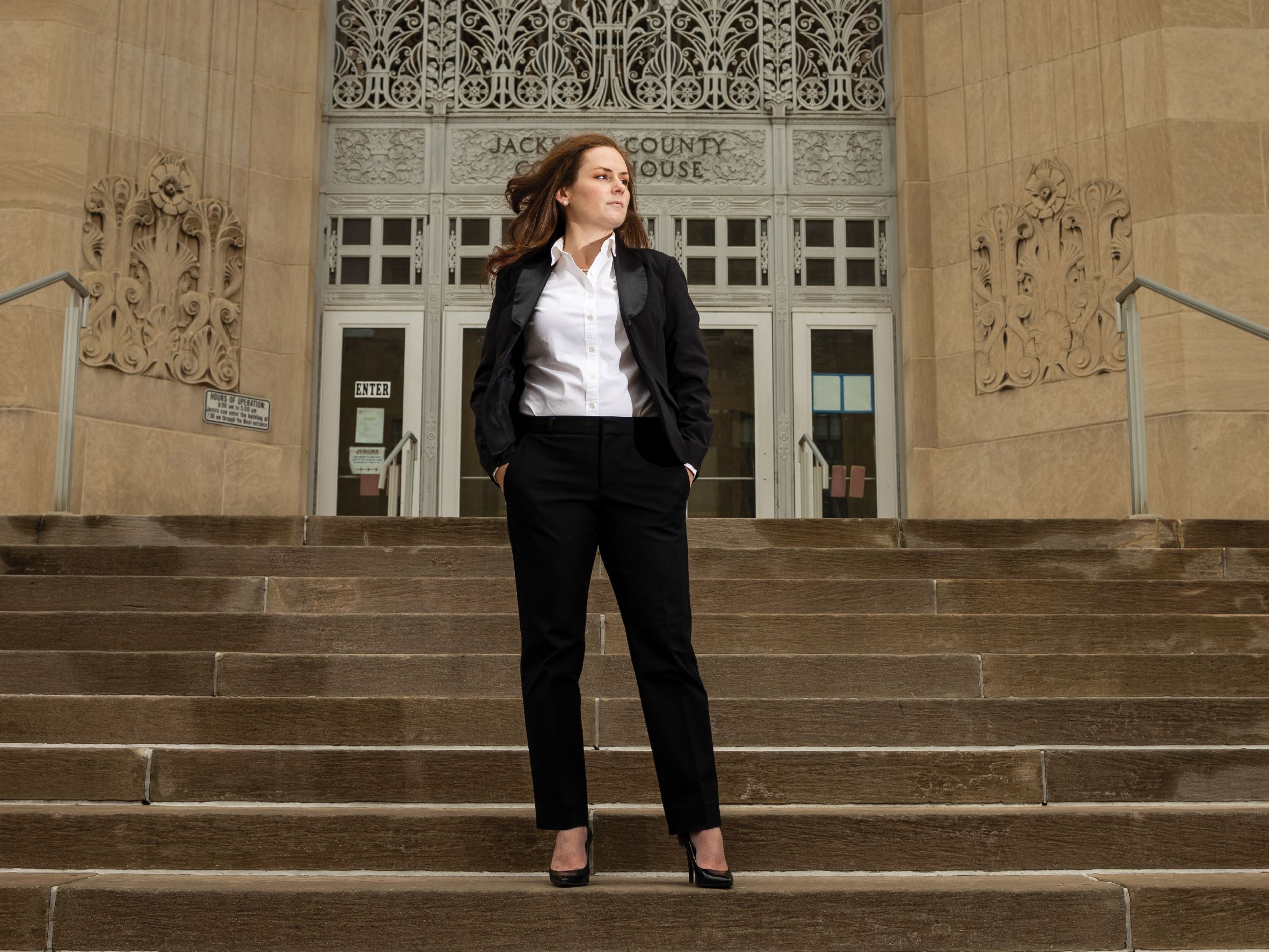
Prosecutor Audrey McCormick continues tradition of strong female advocates
Prosecuting cases involving child abuse and neglect, domestic violence and sex crimes takes a special type of person, according to Audrey McCormick (J.D. ’10).
“I think there are really only two kinds of attorneys when it comes to this subject matter,” McCormick said. “You either want to do it, or you want to stay as far away from it as possible, because it is just something that’s too overwhelming.”
Luckily for McCormick, she’s been able to find balance while pursuing her passion — advocating for children and fighting for victims — while also raising a family and mentoring her staff.
“This work is so important to me,” McCormick said. “If I didn't have it, I think I would just be so bored and unfulfilled that I wouldn't know what to do with myself. I’m happy to continue doing this work for as long as anybody will let me.”
McCormick, a 2020 recipient of the Missouri Bar Foundation’s prestigious Lon O. Hocker Award, began her career as an attorney for the Missouri Children’s Division. Since joining the Jackson County Prosecutor's Office in 2016, she has ascended the ranks to her current role of trial team leader in the special victim’s unit.
McCormick says her professional experience has been shaped largely by the numerous strong female role models she’s encountered as a young lawyer.
“It's a collective, and I think there is a sense of camaraderie between women in the law, particularly,” McCormick said.
McCormick said she’s thankful for those female colleagues who paved the way so young lawyers like herself could focus solely on the quality of their work as opposed to what they might be wearing in the courtroom.
“I can't say that I have ever felt I had to overcome anything other than just a legal argument,” McCormick said. “Maybe that's unique to me. Maybe that is more of a statement on how far things have come in the past decade or so.”
McCormick says she’s heard plenty of stories about women who felt pressure to answer phone calls from the maternity ward or didn’t even disclose that they had children.
“That's the type of stuff that I had heard from some of the older generations of female attorneys — you show no weakness. You work like you don't have a family. And you basically have to try to outwork all the men — and then some — in order to get ahead.”
Now a mother of three and mentor in her own right, McCormick feels compelled to provide that same level of support she received to upcoming young female attorneys in her unit.
“The majority of what I do right now is mentorship — supervising my staff and ensuring that they are supported in the work that they do, because it's obviously very important, but it is also very hard,” McCormick said. “I try to be mindful of that same thing — that work-life balance. There are attorneys working so hard that we'll have to say, ‘I think you are on the fast track to burnout.’ We try to prevent that from happening, too, because we like to keep good attorneys in the unit and in the office. We've got a lot of really passionate, really great attorneys that we work with.”
McCormick continues, “It’s nice to be able to step into those shoes and hopefully do as good of a job as my bosses have done for me in the past.”
One of McCormick’s current supervisors, Jill Icenhower, chief trial assistant of the special victim’s unit for the Jackson County Prosecutor’s Office, said McCormick’s “unmatched ability” in preparing children for trial sets her apart from her peers. Most often, those children are being brought in to talk about horrific experiences of abuse, so they're often terrified to come into a courtroom.
“She has got this innate ability to talk to children and make them comfortable and really relate to them and explain to them how a trial's going to work,” Icenhower said. “She shows them around the courtroom, and she meets them at their level and uses language that they can understand. She walks them through the entire process until they feel comfortable with what's going to be happening and does it in such an empathetic manner.”
Icenhower continues, “I've watched her do closing arguments that are astounding. But it is those quieter moments in watching her prepare a child for trial and seeing a child relax and feel like, ‘I can do this now.’ That, to me, is the hallmark of a fantastic attorney. You can't teach that to someone.”
Icenhower said that McCormick’s ability to relate to kids is so well known that she is routinely asked to go to trial by people outside of the special victim’s unit in cases involving child witnesses.
“It's just something to behold,” Icenhower said. “I know that one of the judges, after watching Audrey do a direct exam of a child, told her afterward that it was one of the best direct exams he has ever seen done in a trial.”
Navigating the heavy emotional toll of this type of work can be challenging, and that’s something McCormick has learned to manage over the years.
“I have a little compartment in my brain, and that's where that stuff goes, for the most part,” McCormick said. “Now, are there days where it is overwhelming? Absolutely. Are there days where you want to give up because the system is overwhelming, and it doesn't seem like you're making enough progress? You're not getting what you want to see happen for these victims. Of course, all of those things happen.”
McCormick stresses the importance of having a strong support system in place to serve as a safety net, especially in the inevitably difficult moments.
“You've put all this time, all this effort, all this emotion into your case and your victims, and you just pour your soul into it,” McCormick said. “If it doesn't go your way, that is crushing for a lot of trial attorneys. Having that support system there — family, friends, colleagues — is crucial to help build you back up and continue to work in this field, if that is what you're passionate about.”
Win or lose, McCormick says she marks the end of each trial in much the same way.
“I go home, I take off my trial attorney hat, I put my mom hat on, I put a smile on, and I have a good weekend with my family.”
Jan 27, 2023
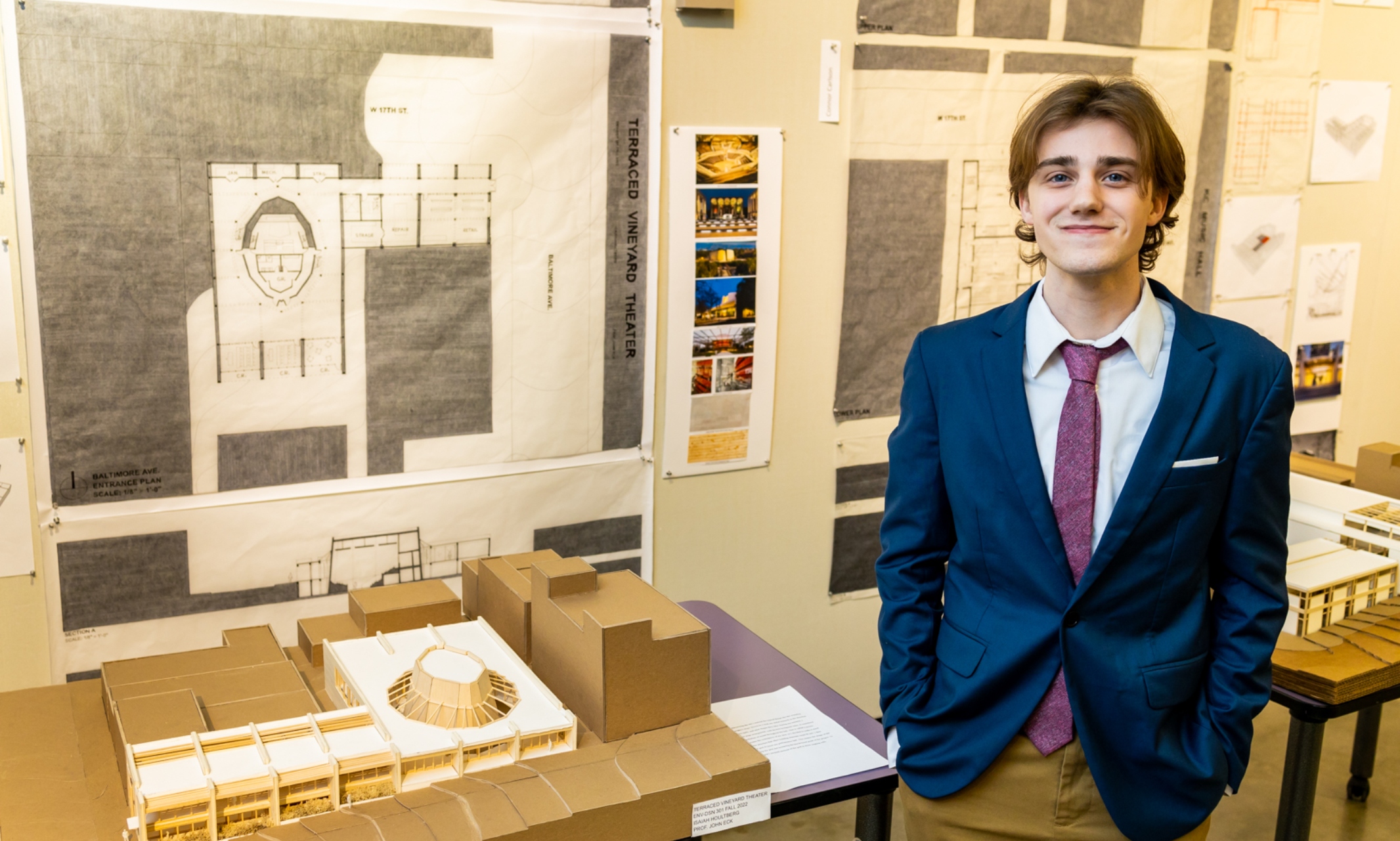
Helix Prize offers students challenges, opportunity
Roos don't just dream, they do. Our students turn ideas into action every day. Get to know our people, and you'll know what UMKC is all about.
Isaiah HoultbergAnticipated graduation: 2023Academic Program: Architectural StudiesHometown: Salina, Kansas
Isaiah Houltberg is this year’s winner of the annual UMKC Architecture and Urban Planning and Design Helix Prize competition and scholarship grant.
Every fall, Helix Architecture + Design sponsors the Helix Prize, a competition and scholarship for UMKC second-year Architectural Studies students. Professor John Eck teaches the studio, and faculty and members of the architectural professional community judge the competition. This year’s competition was to create a design for the “Kansas City Experience Music Project,” a concept based on a similar project in Seattle.
Houltberg has been interested in architecture as a child and had the unique opportunity to take architecture and drafting in high school that inspired him to pursue the field in college and as a career.
Houltberg and John Eck, practicing architect and associate teachng professor
Why did you choose UMKC?
I chose UMKC for its urban setting and its architecture program. UMKC has a sister program with Kansas State University. We did our first two years at UMKC and 3 years at KSU.
What are the challenges of the program?
Architecture is a very demanding program. On top of regular project deadlines and assignments, I commit many out of school hours to work. I will often spend all day in the studio and come in on the weekends. A higher-level understanding of design is also a challenge, whether that is coming up with three different design ideas in studio or creating a case study of a building. But at the end of the day, I enjoy it and it’s worth it.
What are the benefits of the program?
It's a very unique five-year fast track program, which is nationally recognized as one of the best. Plus, the added benefit of doing the first two years at UMKC is its urban setting.
How has your college program inspired you?
Seeing how much hard work it takes to be successful has really encouraged me to keep pushing through no matter how stressful it can get.
Since entering college, what have you learned about yourself?
Personally, I have used my experience so far to refine some of my learning strategies. I have been able to figure out where I excel and lack in when it comes to how I learn.
Are you a first-generation college student?
I am a second-generation college student. Seeing my extended family take their education in directions that they genuinely love and enjoy encouraged me to pursue an education.
Who do you admire most at UMKC?
I admire my architecture professors for their professionalism and the unique knowledge and views they bring to every lesson. Also, I admire my classmates’ creativity and talent and their perseverance to stay in such a challenging program.
What other extracurricular activities are you involved in at UMKC?
I am the head lifeguard at the Swinney Center.
What do you hope to take from your experiences at UMKC into your professional career?
Personally, I want to take the views and experience from the professors who work in an urban setting. I think this helps further my understanding of architecture and satisfy myself as a designer and architect.
Jan 24, 2023
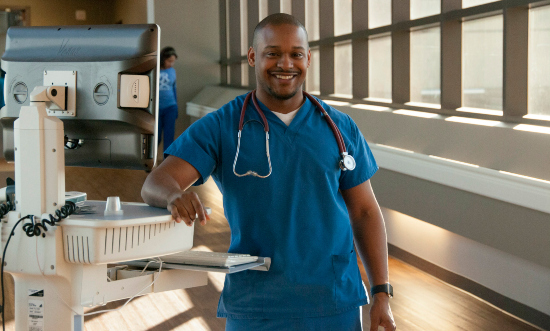
U.S. News ranks online master’s program nation’s 11th best
The online master’s program in nursing at the University of Missouri-Kansas City has been ranked among the nation’s best for military veterans by U.S. News & World Report.
The rankings released today placed the program offered by the UMKC School of Nursing and Health Studies at No. 11 in the nation.
“Veterans and active-duty service members gain the most from distance education that is affordable, accessible and reputable,” the organization stated. “The 2023 Best Online Programs for Veterans rankings measure these factors in consideration of financial benefits available specifically to people with military experience.”
The full list of U.S. News rankings is available at www.usnews.com/online.
“We are extremely proud that our programs have once again been recognized for educating top quality nurse practitioners and nurse educators. Only an exceptional faculty and strong community support can make that happen year after year,” said Joy Roberts, interim dean of the school. “The ranking for veterans demonstrates our commitment to serving those who have served all of us.”
The program’s overall ranking was unchanged from last year, remaining in the nation’s Top 50 programs at 46th in the U.S. – the 11th consecutive year the program has been ranked among the nation’s Top 50. The nursing category included 203 different schools.
To qualify, programs must have “performed well enough on a multitude of factors – including program reputation, faculty credentials, retention rates and graduate debt loads – to earn a qualifying Best Online Programs ranking.”
The UMKC School of Nursing and Health Studies is a pioneer in distance-learning programs, offering online advanced degree programs since 2002. The programs offer busy professionals a high-quality but convenient way to further their careers and meet the needs of an evolving health care system.
Online students are expected to participate in online discussions as if they are present in the classroom. Technology offers two-way communication in real time via multiple modes. Students also experience on-site learning through summer institutes where they are required to attend clinical training or dissertation work sessions, and deliver presentations to classmates and faculty.
UMKC offers a variety of online graduate nursing tracks, including Master of Science in Nursing (MSN) and other options:
Adult-Gerontology Primary Care Nurse Practitioner (AGNP)
Family Nurse Practitioner (FNP)
Neonatal Nurse Practitioner (NNP)
Nurse Educator (NE)
Pediatric Nurse Practitioner (PNP) Primary Care and Acute-Care (AC PNP)
Psychiatric Mental Health Nurse Practitioner (PMHNP)
Women’s Health Nurse Practitioner (WHNP)
Ph.D.
Doctor of Nursing Practice (DNP)
Jan 23, 2023
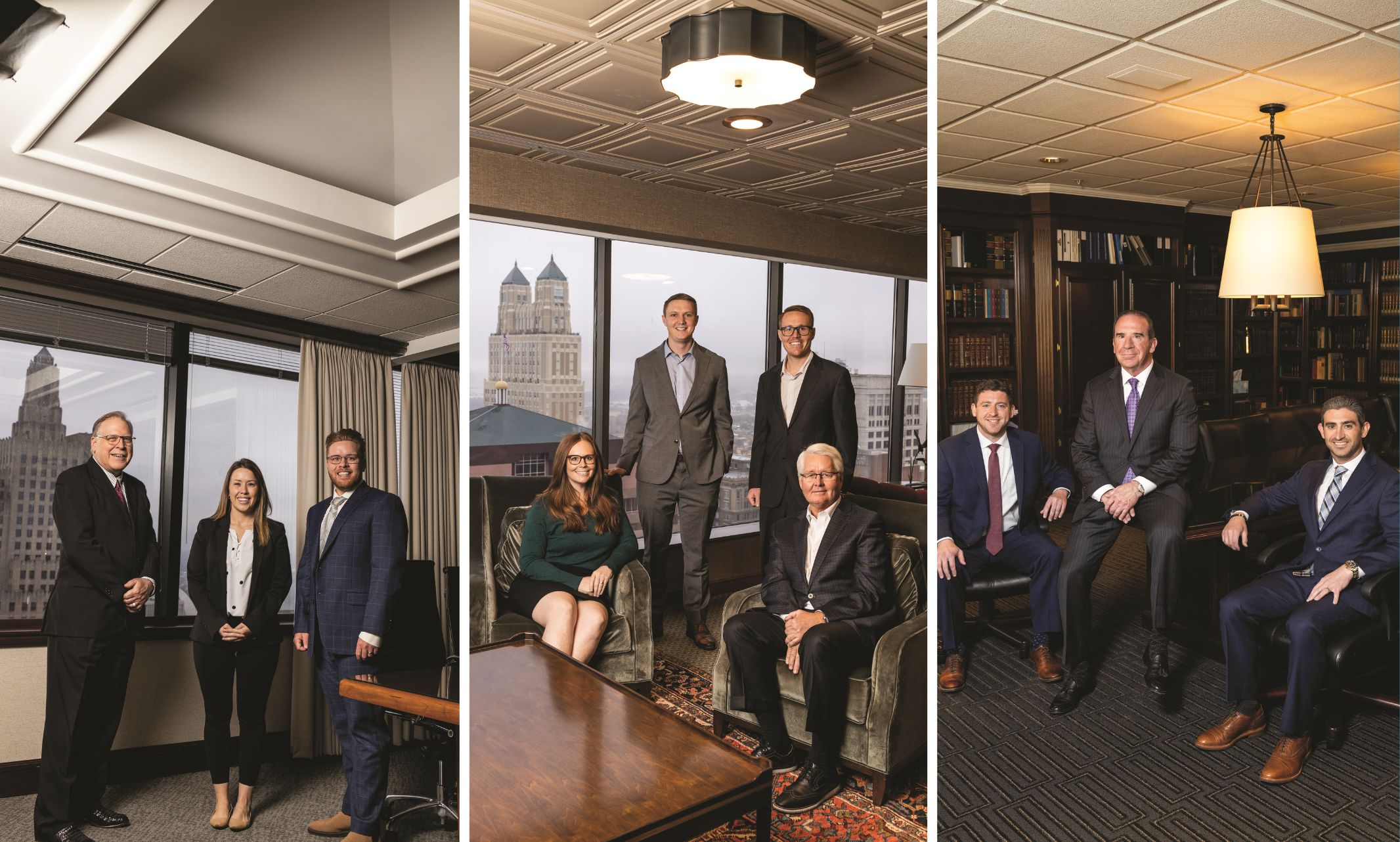
Families graduate from the Trial Advocacy Program and make their careers right here in Kansas City
Kansas City is known as the City of Fountains, as a soccer city and, of course, for its barbecue. But to many UMKC School of Law alumni, it is also known for being a great place to practice law.
The Trial Advocacy Program is elite, evidenced by competitive mock trial and moot court teams, and many alumni credit the city and the people for its success. We talked to three legacy families about what makes the Trial Advocacy Program so successful and why they’ve made law school at UMKC a family tradition.
Dollar Family
For the Dollar family, practicing law is a family affair. Tim (J.D. ’84) is a founding partner at Dollar, Burns, Becker and Hershewe. His son Joshua is currently in his third year of law school at UMKC. Two of his children, Lauren (J.D. ’17) and Jordan (J.D. ’19), have joined the practice within the last few years. The firm also boasts UMKC alumni in founding partner Tim Becker (J.D. ’91), whose son Josh Becker (J.D. ’15) is also a partner in the firm.
The Dollar family’s start with the legal profession began when Tim was a child and spent several summers in the office of his father’s attorney, Max Foust (J.D. ’54). Little did he know at the time, his journey through law school would open the same opportunity to many students down the road.
At the time Tim attended UMKC, the Trial Advocacy Program was limited to 12 students. He felt strongly that the program should be expanded to accommodate more students. After graduation, he and several classmates took action.
“We designed an expanded Trial Advocacy Program that would involve members of the legal community serving as adjunct professors — free of charge — to make the program available to any student who wanted to experience Trial Advocacy,” said Tim. “To our shock, the faculty adopted that program. That was the first time the Trial Advocacy Program expanded, and now it’s really made its mark nationally with all the work that’s been done since then.”
Lauren, Jordan and Joshua are three such benefactors of the expanded program. Lauren participated in the 1L Mock Trial Competition, Mock Trial team, and took moot court and trial advocacy classes. Jordan also took part in the 1L Mock Trial Competition, continuing with the team through his 2L and 3L years. Joshua took first place at that same 1L competition in 2021. They credit these experiences with preparing them for practice.
“You may get a great education somewhere, but you have to marry it with practical experience. Everything from trial skills, to moot court to negotiation — I think UMKC has set themselves apart in their focus on practical experience.” - Tim Dollar
“I felt like the competitions, both the oral arguments for moot court and the mock trial competitions, really helped develop my skills in trial advocacy,” said Lauren. “They were able to teach me more than I could learn in just a class. I’m very thankful for both the classes and the competitive side that gave you even more experience.”
Jordan added, “I feel like the competitions especially provide an opportunity to develop and hone your skills in ways that I don’t think are available in a classroom setting. Dealing with a case over a semester provides experiences that translate directly to practice more than any class I took.”
“You may get a great education somewhere, but you have to marry it with practical experience,” said Tim. “Everything from trial skills, to moot court to negotiation — I think UMKC has set themselves apart in their focus on practical experience.”
In addition to practical skills, the ability to build lasting relationships in the community is what drew the Dollars to UMKC.
“The alumni of the Trial Advocacy Program are invested in preparing the next generation for the practical world,” said Lauren. “They give back in teaching and educating our students. So not only do you get to network with these great attorneys and judges, but they’re the ones teaching you and making sure you’re prepared.”
“My advice to anyone, as it was to my kids, is if you want to practice in the KC area, then UMKC is the place to be,” said Tim. “In addition to academics and practical experience, you are encouraged to plug in with the legal community. You can start to develop those relationships while in law school, and I think you’re miles ahead of someone who might go to an Ivy League school and then drop into Kansas City without having that network.”
Accurso/Dickinson Family
Lou Accurso (J.D. ’81), founding partner of The Accurso Law Firm, knew in high school that he would become an attorney.
“I was influenced heavily by the Watergate hearings,” said Lou. “Those were broadcast my senior year, and I remember seeing these amazing senators and committee members who were all lawyers. It was captivating the way they could ask questions and follow up on investigations.”
Lou may have been the first of the Accurso family to attend UMKC School of Law, but he certainly wasn’t the last. His sister, Tammy Dickinson (J.D. ’98), nephew Michael Accurso (J.D. ’96) and sons Christopher (J.D. ’14) and Patrick (J.D. ’18) are all alumni.
The school’s numerous opportunities to get practical experience is part of what drew them all to UMKC.
In Christopher’s case, it changed his plans entirely.
“When I went to law school, I wanted to get my law degree and be some sort of sports agent,” he said. “Then a good friend, unbeknownst to me, signed me up to be his partner for the first ever 1L Mock Trial Competition. We had a blast, and that was the end of my Jerry McGuire moment.”
Lou, Tammy and Christopher all worked in the Jackson County Prosecutor's Office immediately after graduating law school. Tammy and Christopher credit the Trial Advocacy Program for preparing them for the courtroom.
“For me, the biggest tool UMKC offered was the prosecutor’s clinic (now called field placement),” said Christopher, who now works at The Accurso Law Firm. “I got my Rule 13 certification and spent a year and a half interning at the prosecutor’s office. I was trying bench trials and handling dockets and really using those tools I learned in mock trial in the real world. I had a lot of facetime with judges and attorneys, so by the time I graduated and got hired on, I was able to step right in.”
"....a good friend, unbeknownst to me, signed me up to be his partner for the first ever 1L Mock Trial Competition. We had a blast, and that was the end of my Jerry McGuire moment.” - Christopher Accurso
Tammy, former U.S. Attorney for the Western District of Missouri, added, “It’s almost like you have a head start on everybody who didn’t do that — especially if you want to be a trial attorney. I started interning under Rule 13 as soon as I could.”
For Lou, that real-world experience came in the form of trial practice, a course started by then-Dean Patrick Kelly that gave students the opportunity to prepare and conduct jury trials in insurance cases leading to binding verdicts.
“It was irreplaceable,” said Lou. “As a matter of fact, it even helped me on the bar exam. One of the questions they asked was to draft a lawsuit and include all the claims and parties. If I hadn’t practiced it, I don’t think I would have known what to do.”
Practical experiences, both in and out of the classroom, help form relationships that last through a career.
“My dad always told me that it's best to go to law school where you want to practice,” said Christopher. “I knew UMKC would give me plenty of opportunities to work with actual practicing attorneys. That’s one aspect of UMKC I really like; you have practicing attorneys giving you real world advice and experience while teaching you in your classes.”
Hobbs Family
The Hobbs family’s law school legacy begins with J.R. Hobbs (J.D. ’81), founding partner of Wyrsch Hobbs & Mirakian, P.C. and an adjunct professor. J.R.’s son and daughter-in-law Jackson Hobbs (J.D. ’18) and Sarah (Kanoy) Hobbs (J.D. ’18) followed. J.R. credits the environment at UMKC for fostering meaningful relationships that translate into effective networks in the legal community.
“I think there’s a collegial atmosphere that permeates the school,” said J.R. “People want to do well, but they want to do it parallel to each other and not stumble over each other. In the end, it’s about relationships.”
The Hobbs family is unanimously of the opinion that’s what sets UMKC School of Law apart: the relationships you build while in school.
“Those relationships you’re building in law school are the same relationships you’ll build on in practice. It is immeasurably beneficial.”
- Sarah (Kanoy) Hobbs
Those relationships are of particular benefit to students in the Trial Advocacy Program due to the geographic location of the school.
“We straddle two different districts in federal court that also happen to be in different federal circuits,” said Jackson. “If you want to practice here, there’s no better place to go to law school and get real-world experience. The proximity to a city like Kansas City just can’t be found anywhere else.”
As a legacy student, UMKC School of Law had always been on Jackson’s radar. But he said there were two primary reasons he was drawn to UMKC: the networking possibilities to start a career in Kansas City and the opportunities to participate in various mock trial and moot court activities. In his first year, he participated in the Last Team Standing Trial Advocacy Competition. Following that experience, he joined the trial team in his second and third years for competitions across the country, including the National Trial Competition and Tournament of Champions. Jackson also competed in the school’s Ellison Competition and on the national moot court team.
J.R.’s sons Jackson and Eric both married UMKC Law graduates: Eric met his wife Molly (Callender) Hobbs (LL.M. ’14) when they were attending law school at the University of Denver. Jackson (J.D. ’18) and his now wife Sarah (Kanoy) Hobbs (J.D. ’18) met at UMKC School of Law. Like Jackson, Sarah participated in the trial team. As the first in her family to go to law school, she didn’t have the background to understand how beneficial UMKC’s competitive teams could be for her as she looked at different law schools. The relationships among alumni are what drew Sarah to UMKC.
“That was one thing that struck home with me — the people that you’re going to be practicing with when you leave law school — there’s a good chance that they went to UMKC,” Sarah said. “Those relationships you’re building in law school are the same relationships you’ll build on in practice. It is immeasurably beneficial.”
Jan 20, 2023
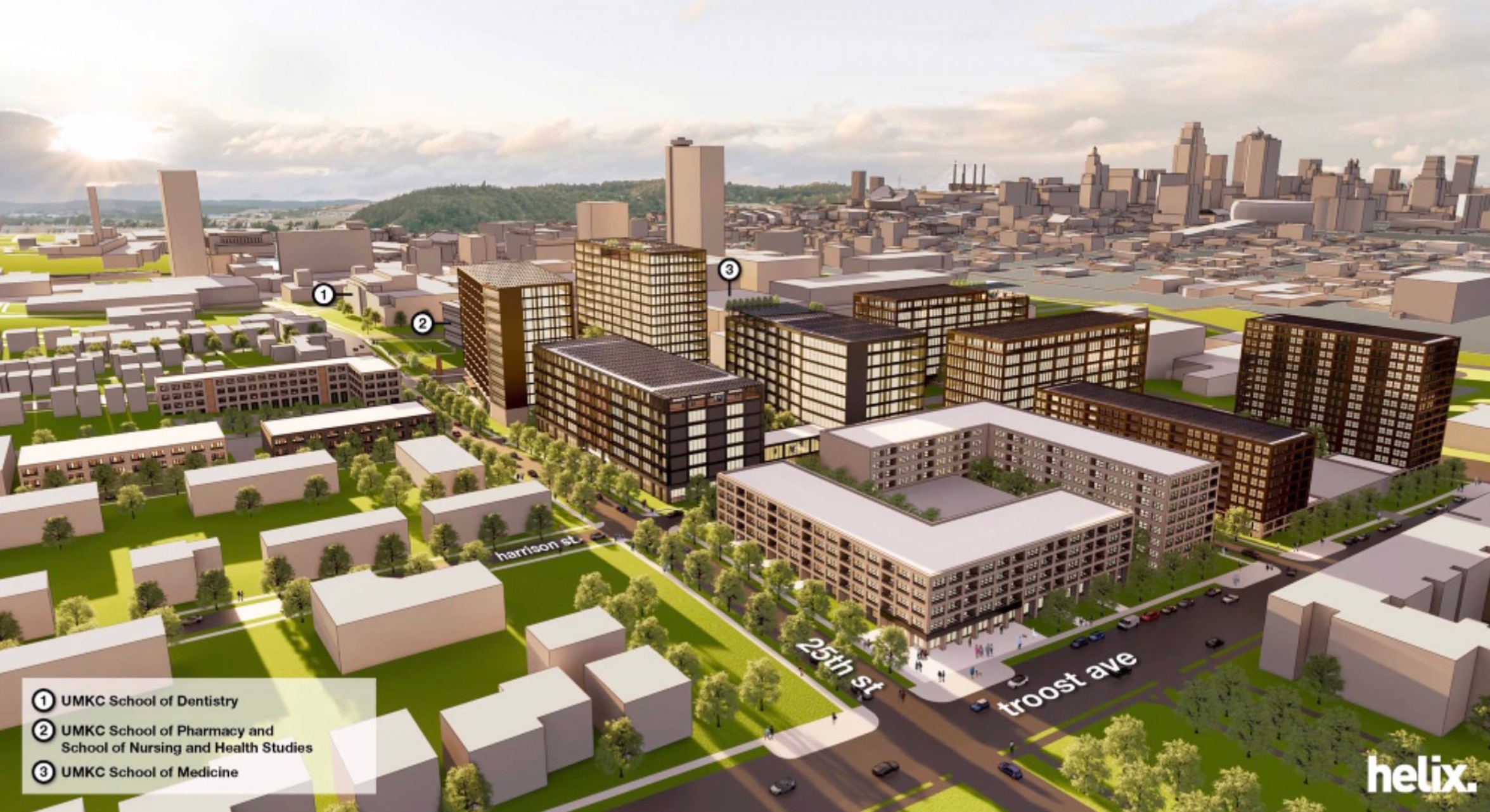
The state-of-the-art facility will position the district as a premier academic medical district and help propel health-care equity in the region
The University of Missouri-Kansas City announced a $15 million gift from the Hall Family Foundation, which will help fund an innovative new medical and dentistry building in the UMKC Health Sciences District.
The university has secured $95 million toward the $120 million cost of a new Healthcare Delivery and Innovation Building on the corner of 25th and Charlotte.
The new building will enable UMKC to provide leading-edge health-care education, attract top students and researchers and advance care for disinvested populations. In addition, the project will serve as a catalyst for developing the UMKC Health Sciences District into a major regional academic medical center that can generate billions of dollars in jobs and economic impact for the Kansas City region.
The new multi-story building will house dental teaching clinics and expanded medical school teaching facilities. In addition, it will provide space for the UMKC Health Equity Institute, the university’s Data Science and Analytics Innovation Center and its new Biomedical Engineering program.
"We are grateful to the Hall Family Foundation for its investment in our students and the Kansas City community,” said UMKC Chancellor Mauli Agrawal, Ph.D. “The Healthcare Delivery and Innovation Building will further solidify the UMKC Health Sciences District as a national leader in medical education and health care as well as support our mission of increasing health equity in the Kansas City region and beyond.”
U.S. News and World Report listed the UMKC School of Medicine as one of the top medical schools in the nation for primary care and it was the highest-ranked in Missouri in 2023. Its graduates practice in 71 counties in the state and its students and faculty members provide thousands of hours of free health screenings and services each year. The new building will provide advanced technology to enhance physician training and provide more doctors to meet a critical need of providers in the region. It will also house the new biomedical engineering program, providing proximity with doctors and engineers to support the innovation of new medical technologies.
The UMKC School of Dentistry is the only public dental school in the state of Missouri and is a major low-cost provider of dental care in the region. UMKC dentistry students serve more than 13,500 community members each year and provided more than $630,000 annually in free dental care to community members at its clinics from 2016-2022. The new building will allow UMKC to see more patients and update the technology at the clinics to streamline care and create more efficient visits for patients and provide industry-leading education to students. In addition, the new space will increase ADA accessibility for patients with physical limitations.
Furthermore, the building will house major community outreach and research initiatives, such as the UMKC Health Equity Institute, designed to identify and address health disparities, and the Data Science and Analytics Innovation Center, which supports innovation in personalized health care.
“The Healthcare Delivery and Innovation Building will provide immeasurable benefit to the Kansas City community for generations to come, and we are proud to support it,” said Mayra Aguirre, president of the Hall Family Foundation. “Our Foundation’s mission is to support and fund projects that enhance the quality of human life for all Kansas Citians. This new building will enable UMKC to expand its important work in equitable and inclusive health-care delivery and we are inspired by the collaboration between UMKC, Children’s Mercy Hospital and University Health that improves the lives of people in our community.”
The latest gift to UMKC is not the first investment the Hall Family Foundation has made in the UMKC Health Sciences District. In 2018, the organization provided $75 million in funding for the Children’s Mercy Research Institute dedicated to pediatric medical research.
Gov. Mike Parson signed legislation in July from the state of Missouri that appropriated $40 million for the UMKC Healthcare Delivery and Innovation Building, contingent on a funding match. Since then, UMKC has received $30 million from the Sunderland Foundation, $15 million from the Hall Family Foundation, and $10 million in federal funding secured by Sen. Roy Blunt for a total of $95 million to date.
“UMKC is a leader in the Kansas City community and that is thanks, in large part, to the support of our partners. We are thankful they share in our vision of creating a cutting-edge health-care hub that will provide state-of-the-art care to everyone in our community,” said Amanda Davis, chief advancement officer and president of the UMKC Foundation.
Formed in 2017, the UMKC Health Sciences District is a partnership among UMKC and 12 neighboring health-care institutions. The district houses the UMKC schools of Dentistry, Medicine, Nursing and Health Studies and Pharmacy in a single, walkable campus, allowing for greater interprofessional training and research collaboration.
Learn more about the Healthcare Delivery and Innovation Building.
Jan 19, 2023
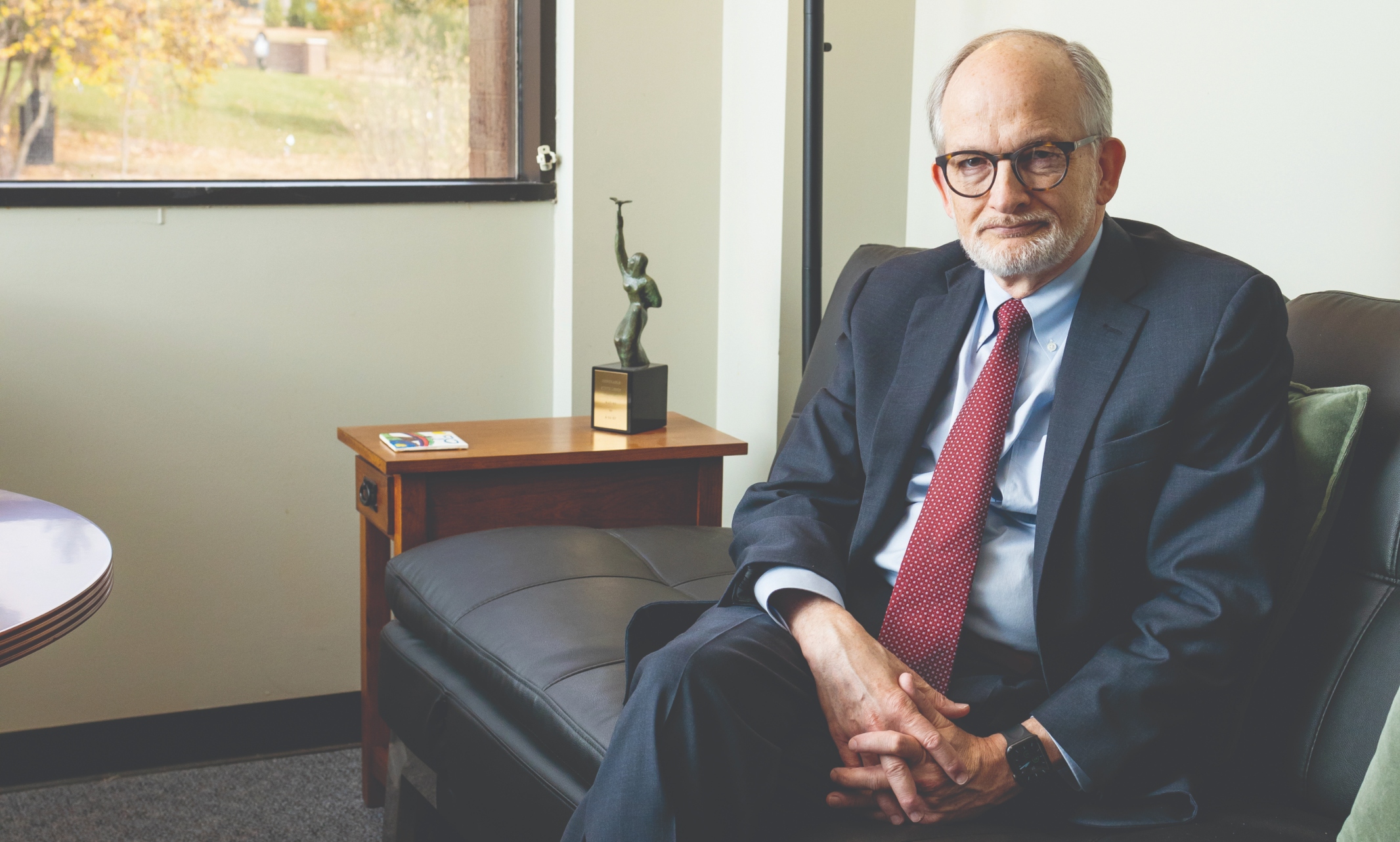
Leben is the fourth UMKC faculty member to earn the honor
The newest Douglas R. Stripp Missouri Distinguished Professor of Law Steve Leben brings a wealth of experience in the courtroom to the position.
Leben joined the UMKC School of Law faculty in 2020 as a visiting professor after 27 years as a Kansas judge – the past 13 as a member of the Kansas Court of Appeals – and 11 years of law practice in Kansas City.
“I’ve seen in the past two years the great training we give our students, and I’m glad to fully join UMKC’s well-recognized advocacy program,” Leben said.
Advocacy — essentially the art and science of persuasion — takes many forms. UMKC School of Law has long had a strong reputation in both trial and appellate advocacy education. The school’s advocacy program is A-rated by National Jurist magazine, and the school is ranked 31st in the country for advocacy by U.S. News and World Report. Professor Leben's leadership is already evident. Just this month, UMKC Law students competed in the national moot court regionals and both teams took away top honors and one team member was named Best Oral Advocate. As the undefeated winning team, UMKC Law will be heading to the national finals.
Leben brings both expertise and scholarship to elevate the advocacy program. He is a nationally recognized expert on procedural justice, and he has trained judges around the United States on how to improve perceptions of fairness in court proceedings. In 2014, the National Center for State Courts gave him its highest award for a judge, the Rehnquist Award for Judicial Excellence, in recognition of his work on procedural-justice issues. Leben is an elected member of the prestigious American Law Institute, an officer of the American Bar Association Judicial Division’s Appellate Judges Conference and past president of the American Judges Association.
He becomes the fourth faculty member to serve as the Stripp Professor of Law, following S. Rafe Foreman (2011-2019), Robert Klonoff (2003-2007) and Andre Moenssens (1996-2002).
In his role as the Douglas Stripp Professor, Leben said he would focus primarily on enhancing the school’s appellate advocacy program.
“I want to bring more appellate judges in from around the country to participate in our competitions and speak to our students,” he said. In addition to appellate advocacy, Leben teaches another important form of advocacy in his legislation course, in which students learn about public policy advocacy and the legislative process.
The Douglas Stripp Professorship was created and funded by Bebe and R. Crosby Kemper through the R. Crosby Kemper Charitable Trust and Foundation. It is named for Bebe Kemper’s father, a lifelong Kansas City resident and internationally known trial lawyer, who practiced law in Kansas City for more than half a century until his death in 1983.
Stripp worked alongside Charles Evans Whittaker (J.D. 1924) in Kansas City before Whittaker was appointed to the U.S. Supreme Court. Stripp’s passion was mentoring young attorneys in the art of persuasion and advocacy. Professor Leben will carry on this legacy as the Stripp Professor.
Jan 17, 2023
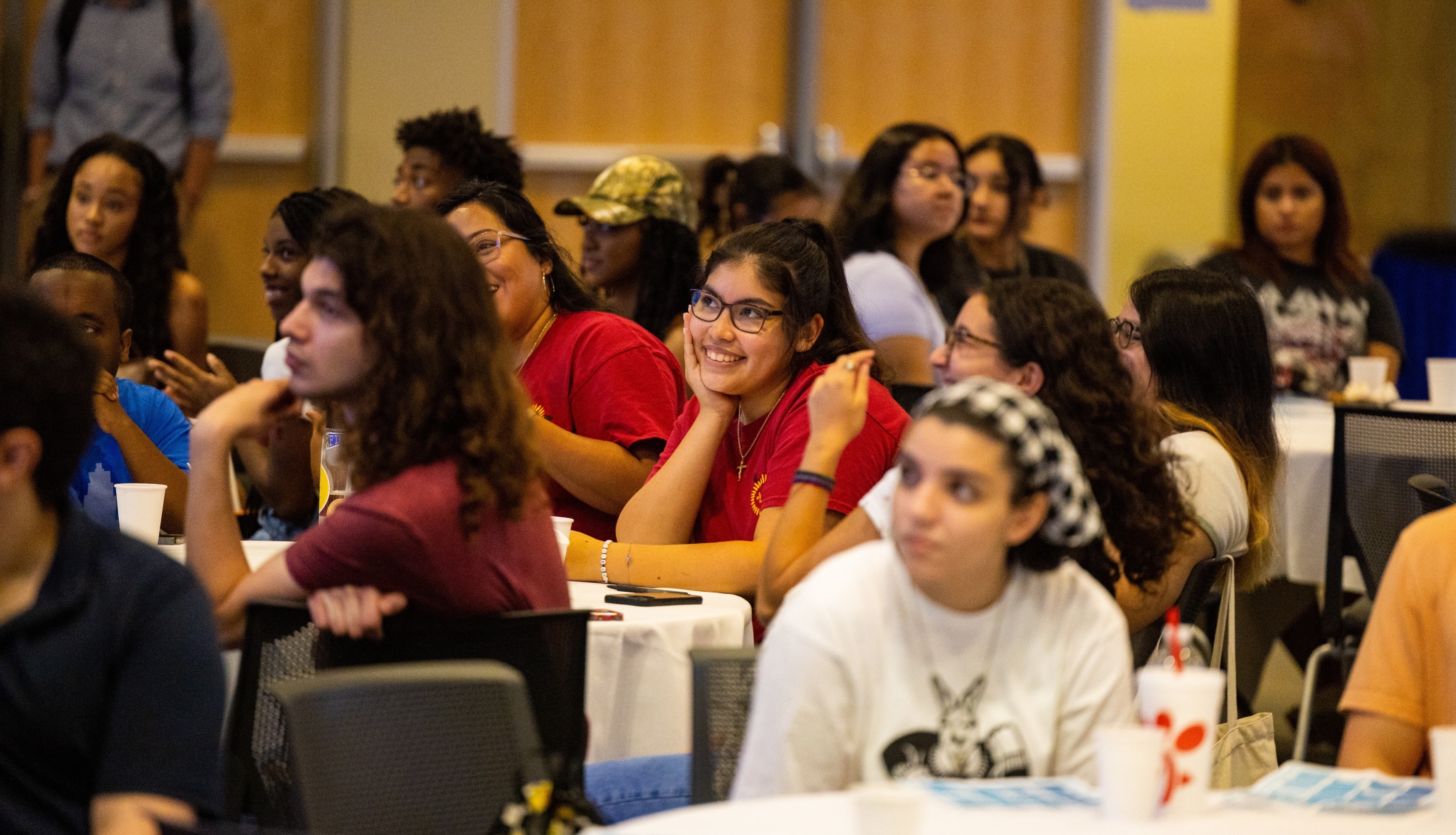
Consistent and significant funding enhances student success, degree completion. Photo by Brandon Parigo | UMKC
For the past decade, the Patricia and John Morgan Academic Advancement Fund has supported UMKC programs that help students successfully navigate their college experience.
The fund’s most recent gift of $60,000 over two years supports students from the time they are introduced to UMKC through the transitions that follow – from acceptance to enrollment and beyond – with graduation as the goal.
Summer Bridge Scholars, an intensive eight-week program for incoming first-year students to help prepare them for college at UMKC, is one of the programs the Morgan Fund supports. In addition to their classes, students participate in programming on careers, culture, academic skill-building and community engagement.
“Funds from the Patricia and John Morgan Fund help our students become connected to the Kansas City community,” Megan Elsen, associate director of Academic Support and Mentoring, says. “We work in conjunction with our Multicultural Student Affairs office to develop programming that expose students to the city’s history and the different cultures that Kansas City offers, including tours showcasing the city’s varied food, music and art opportunities, to give them a taste of the community. Tuition, room and board and the extracurricular activities are possible because of the support from the Morgan Fund.”
Laura Casey, academic success coordinator for Summer Bridge Scholars, notes that the fund supports a broad range of students.
“A large majority of our students are first-generation and low-income,” she says. “We see lower (high school) GPAs and ACT scores, if students submit them, so they may need additional academic support, which we provide.”
Summer Bridge students may have more basic needs as well.
“We provide backpacks, school supplies, and put together welcome packages that include sheets, towels and a laundry basket, because a lot of students who live in the dorms don’t have what they need. Literally, we have students show up with just a duffel bag.”
In addition, new students are introduced to established UMKC programs within the Office of Multicultural Student Affairs including Avanzando, a support and resource program for Latinx students; African Americans Cultivating Excellence (AACE); and Emerging Research Scholars, which offers high-achieving, historically underrepresented students research projects in their field of study with faculty mentors.
These programs are based on the belief that connecting students to the UMKC community is essential to their success.
“It’s important to get students engaged early in their college experience, and the majority of the Morgan funding goes toward helping our scholars in the AACE and Avanzando Mentoring Programs get connected to the community as a whole,” Keichanda Dees-Burnett, assistant dean of students for student support and director of Multicultural Student Affairs, says. “We want them to be knowledgeable about the resources available to them and have a good start so that they can succeed.”
The AACE and Avanzando Programs are designed to increase persistence and graduation rates for first- and second-year students by providing individualized support to help not only support the cultural identity of scholars, but to also help them reach their academic and career goals.
Roland Hemmings, Jr., assistant director of Multicultural Student Affairs, knows that students who don’t become connected early may wait too long to ask for help – if they ask at all. His approach to student support is not a set formula.
“Every year the needs of students change, so there isn’t a cookie cutter approach,” Hemmings says. “We have general programming that addresses common barriers to student success, but we take the time to talk with students individually about what help they need and help them find the right direction,” Hemming says.
Dees-Burnett notes that staff spend a great deal of time with students reinforcing that there are people and resources at UMKC who are eager to help them.
“They may be intimidated, but we tell them, ‘Everybody here is working for your success.’ We encourage them to ask questions so they don’t find out they are making a mistake that could have been avoided.”
Hemmings agrees.
“We are reinforcing that it is better to ask questions early, so we create a safe space where they understand that everyone is here to help and support them .”
The support of the Patricia and John Morgan Advancement Fund has been critical to student success.
“Significant and consistent support from the Morgan Fund is providing life-changing opportunity for UMKC students,” Jennifer Lundgren, Ph.D., provost and executive vice chancellor, says. “The success of these students will impact their futures, their families and our community for generations.”
Jan 10, 2023
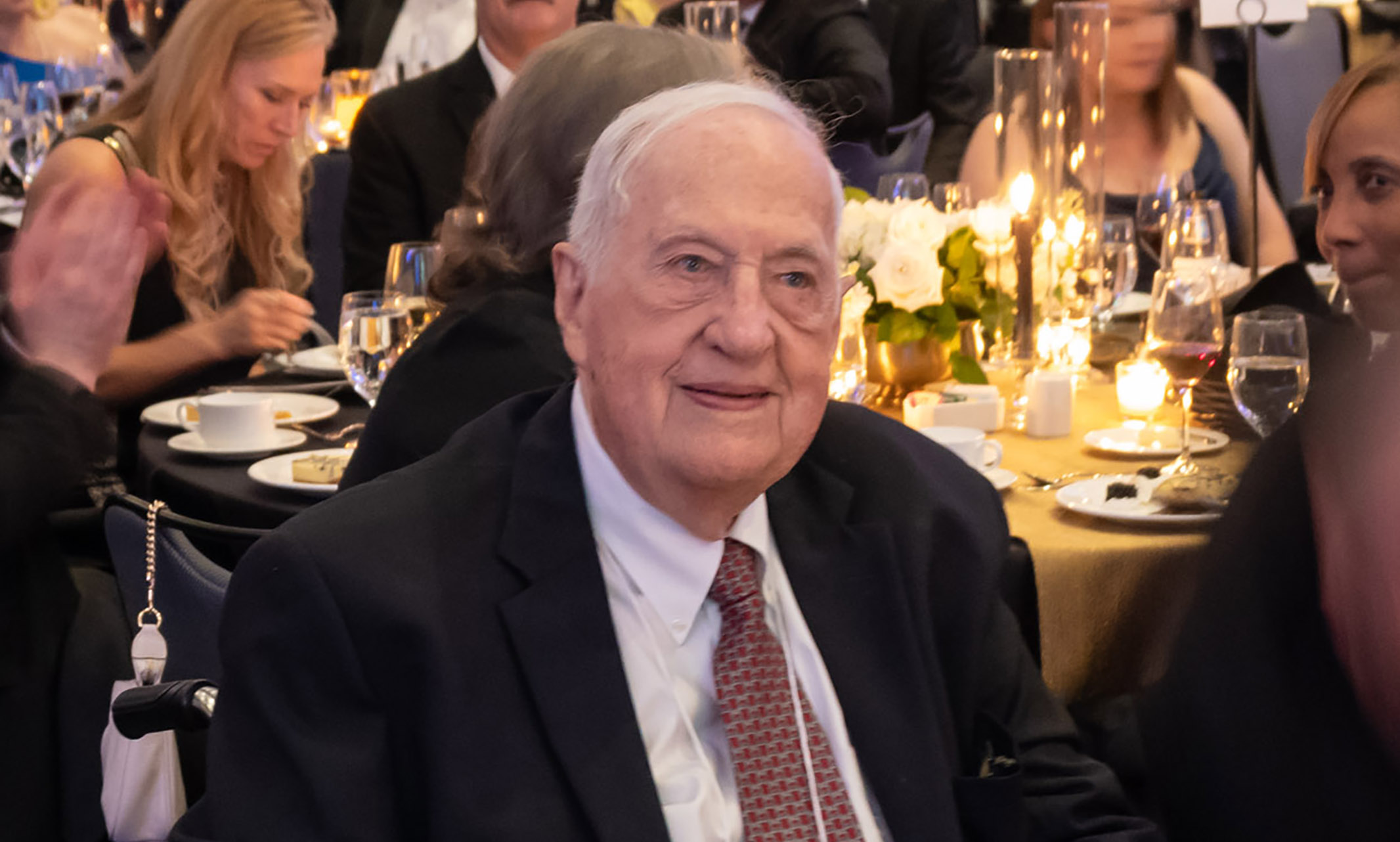
Harry S. Jonas served as second dean of the UMKC School of Medicine
Harry S. Jonas, M.D. (1926-2022), the second dean of the UMKC School of Medicine, helped establish the school’s unique six-year B.A./M.D. program and successfully defended the model against significant challenges.
As an administrator, Jonas effectively guided the fledgling medical school through serious early doubts from the Liaison Committee on Medical Education (LCME), the national accrediting organization for medical schools, which questioned the school’s unconventional six-year program that accepted medical students directly out of high school. Today, the model is generally accepted as a means to educate outstanding physicians.
Jonas was also known as a champion of those under his watch. Students and faculty who knew him well remember him as an extraordinary instructor and mentor who valued his students. In return they held him in equally high esteem.
Jonas, dean from 1978 to 1987, died just before Christmas.
Nearly 700 physicians earned their medical degrees from the school during his tenure as dean. One of them, Michele Kilo, M.D., ’84, remained in close contact with Jonas following his time at the medical school. Kilo said she and many of her fellow alumni shared similar experiences and fond memories of their former dean.
“Dr. Jonas’ impact on my life and my career and my years at the UMKC School of Medicine will always be remembered,” Kilo said. “His legacy of warmth, true caring and excellence in all endeavors will live on and never be forgotten.”
Mary Anne Jackson, M.D., ’78, current School of Medicine dean, met Jonas for the first time as a medical student in 1974. Jonas served as chair of the Department of Obstetrics and Gynecology at Truman Medical Center, now University Health, at the time.
“His passion for teaching students and residents was exceptional, and I knew with him at the helm we were learning the state-of-the art practices in all aspects of women’s health,” Jackson said.
Jonas served two years in the Navy during World War II before returning home to complete his undergraduate and medical degrees at Washington University in St. Louis. He moved to Independence, Missouri, in 1956 to become a private-practice physician and found himself drawn to academia.
His work in academic medicine started as a volunteer instructor in the residency program at Kansas City’s General Hospitals 1 and 2. He was recruited to serve as the hospitals’ first chairman of the Department of Obstetrics and Gynecology, a role he continued to serve when Truman Medical Center replaced the old General Hospital.
He took on a new role in 1978 when he was chosen to become the second dean of the UMKC School of Medicine, where he had also served as both an assistant dean and chairman of the Council on Evaluation.
“Different deans do different things,” Jonas said in a publication celebrating the school’s 25th anniversary. “Some are researchers, some are planners that go inside their office and close the door and plan for the future and then there are others who are very externally oriented. I was probably in that category.”
Kilo said, “He was approachable to School of Medicine students in ways that are remarkable and not typical of most deans, including greeting us by name, holding wonderful dinners at his home that always included medical students in a warm and inviting environment, and showing his interest in each of us personally, not just our grades or our career goals, but how we were doing as human beings and whether we were thriving socially.”
Following his tenure as dean, Jonas spent more than a decade with the American Medical Association in Chicago where he served as assistant vice president, and as secretary of the LCME, the body that once questioned the UMKC model.
He returned to Kansas City in 2000 to play another key role in the development of the School of Medicine’s curriculum. As a special consultant to the dean, Jonas was instrumental in creating a new geriatrics curriculum for first-year medical students. That program continues today, pairing students in a year-long mentoring experience with residents of John Knox Village, a Kansas City-area retirement community.
Kilo said Jonas served as her mentor, listening and providing guidance recently as she was in the midst of making a major career change. Likewise, when Jackson became interim dean of the medical school in 2018, Jonas made a point of connecting with her to share his experiences and wisdom for achieving success in her new role.
“He invited me to lunch to impart his knowledge and advice,” Jackson said. “He continued to come in person to important School of Medicine events and attended our 50th anniversary gala in June of 2022. All who knew Dr. Jonas could be confident that he was promoting our school locally, regionally and within national circles. He will be greatly missed.”
Jan 09, 2023
Grant provides support to continue and expand entrepreneurship programs on the UMKC campus and across the Kansas City region.
The University of Missouri-Kansas City has received a historic five-year, $12.97 million grant from the Ewing Marion Kauffman Foundation to build upon its national leadership in entrepreneurship programming and impact in the Kansas City region.
The grant funding will support a variety of efforts, including new and existing programs across campus. UMKC and the Kauffman Foundation have a shared mission of supporting diverse communities, and the grant will help each continue to reach underserved groups that may not traditionally have access to entrepreneurial resources.
“UMKC has a number of programs designed to help reduce barriers to entrepreneurship,” said Philip Gaskin, vice president of entrepreneurship at the Kauffman Foundation. “We believe that expanding and aligning these programs will drive interest and success in entrepreneurship and result in a diverse pool of new businesses in the region.”
The grant is a result of a partnership among nationally recognized programs at UMKC: UMKC Innovation Center, the Henry W. Bloch School of Management Regnier Institute for Entrepreneurship and Innovation and the UMKC School of Law.
“This grant from the Ewing Marion Kauffman Foundation is a clear endorsement of the work we’re doing across the university and in our surrounding communities to support entrepreneurship,” said UMKC Chancellor Mauli Agrawal.
The initiative will accomplish a variety of goals. It will build on and expand the university’s existing commitment to interdisciplinary collaborations, allowing increasing numbers of undergraduate and graduate students to explore entrepreneurship across campus. Additionally, it will increase community connections, expand the availability of impactful educational resources for diverse entrepreneurs, implement a stronger technology commercialization system to move UMKC research innovations to market and provide more avenues for all areas of campus to participate in entrepreneurial activities.
“This grant allows UMKC to grow our programs and invest even more in both cross-campus and community entrepreneurial initiatives,” Agrawal said. “We are thrilled to work with the Kauffman Foundation and current and future partners to build upon our strong foundation and create more opportunities for the region’s innovators and entrepreneurs.”
Jan 05, 2023
